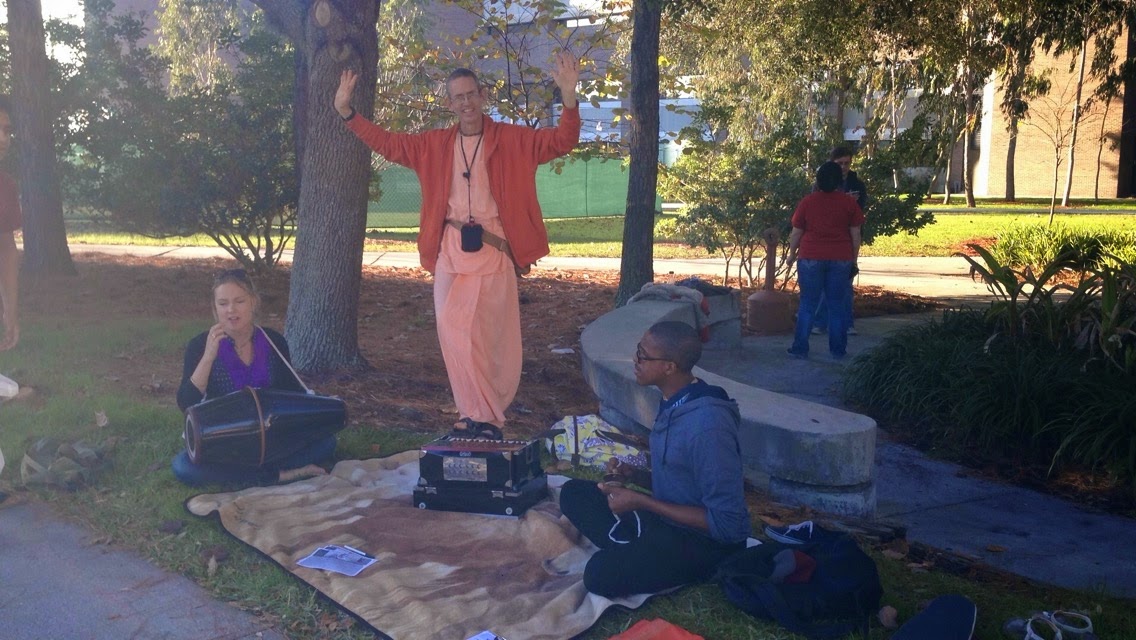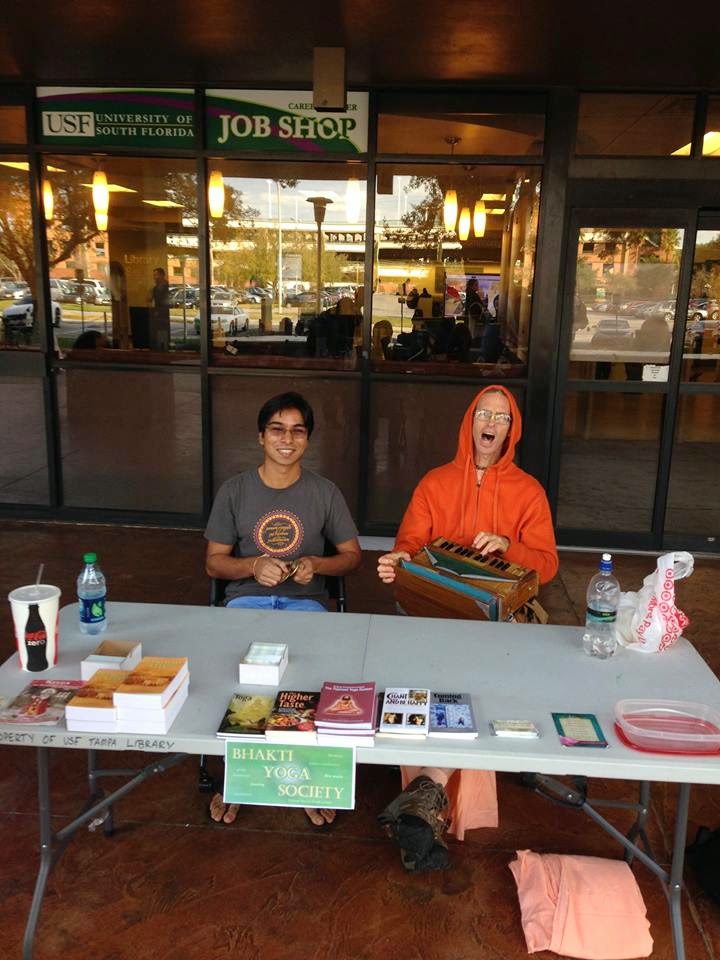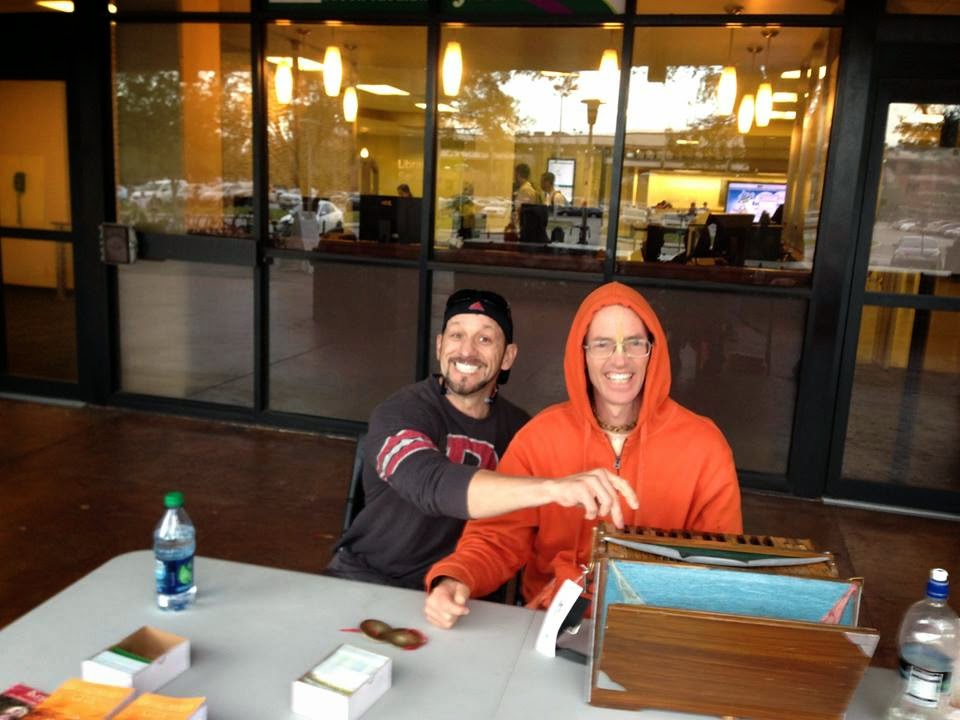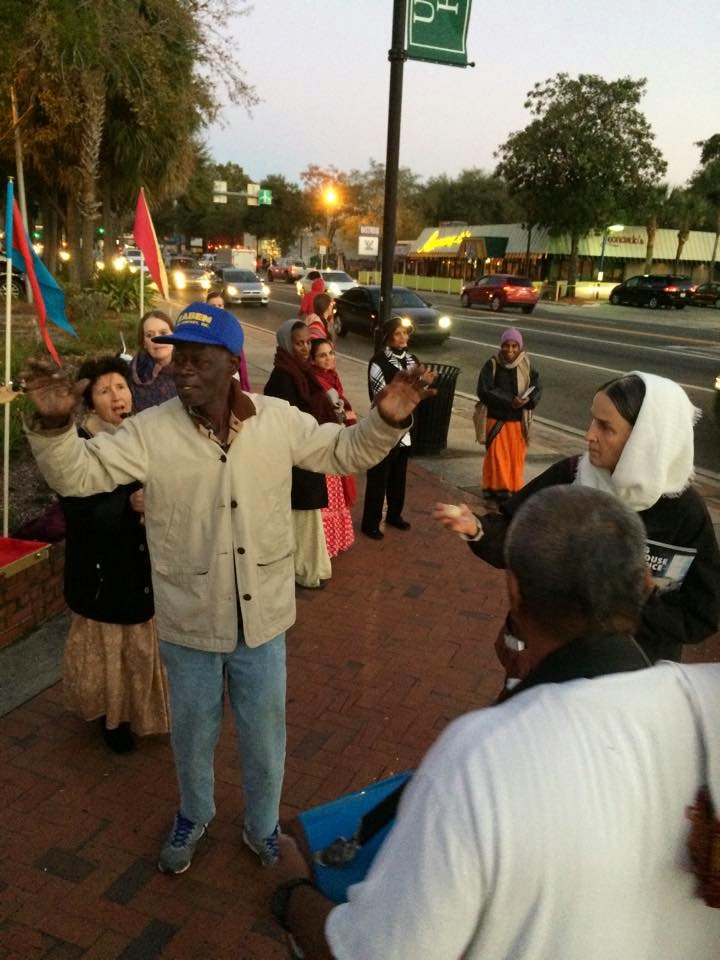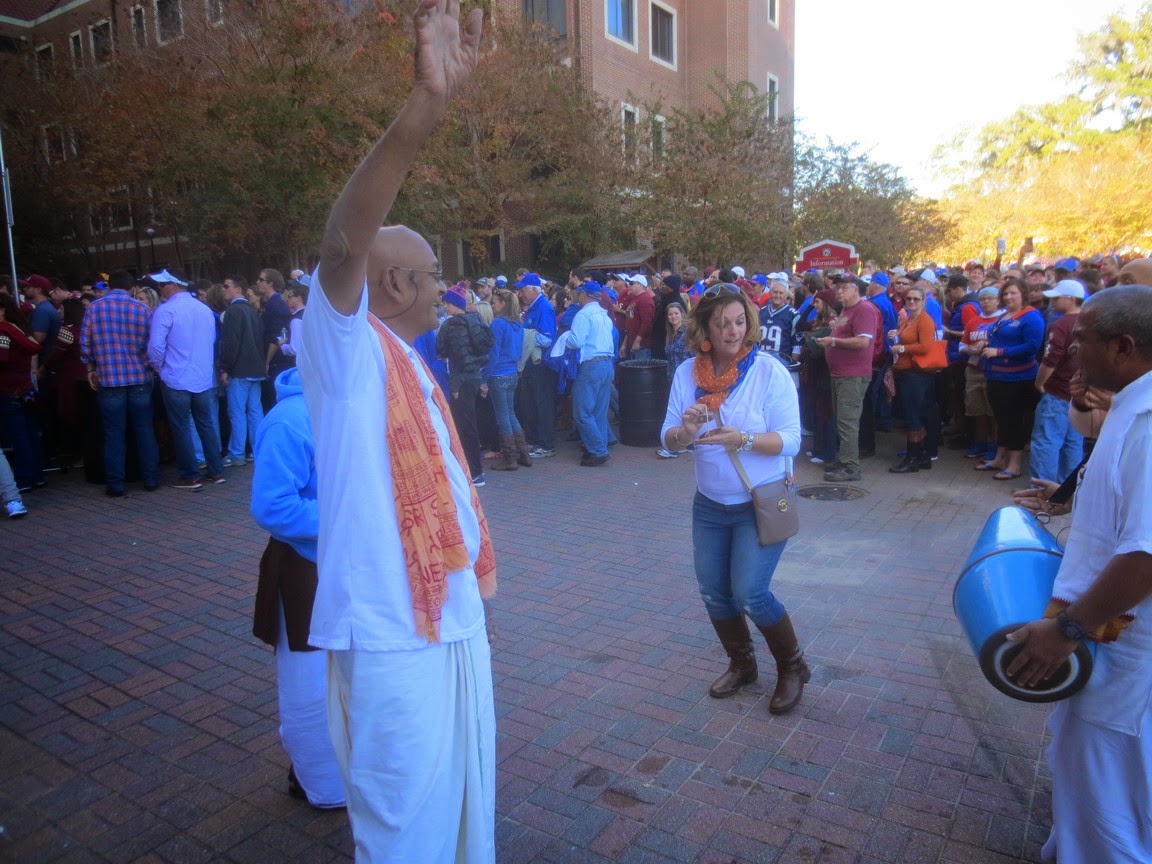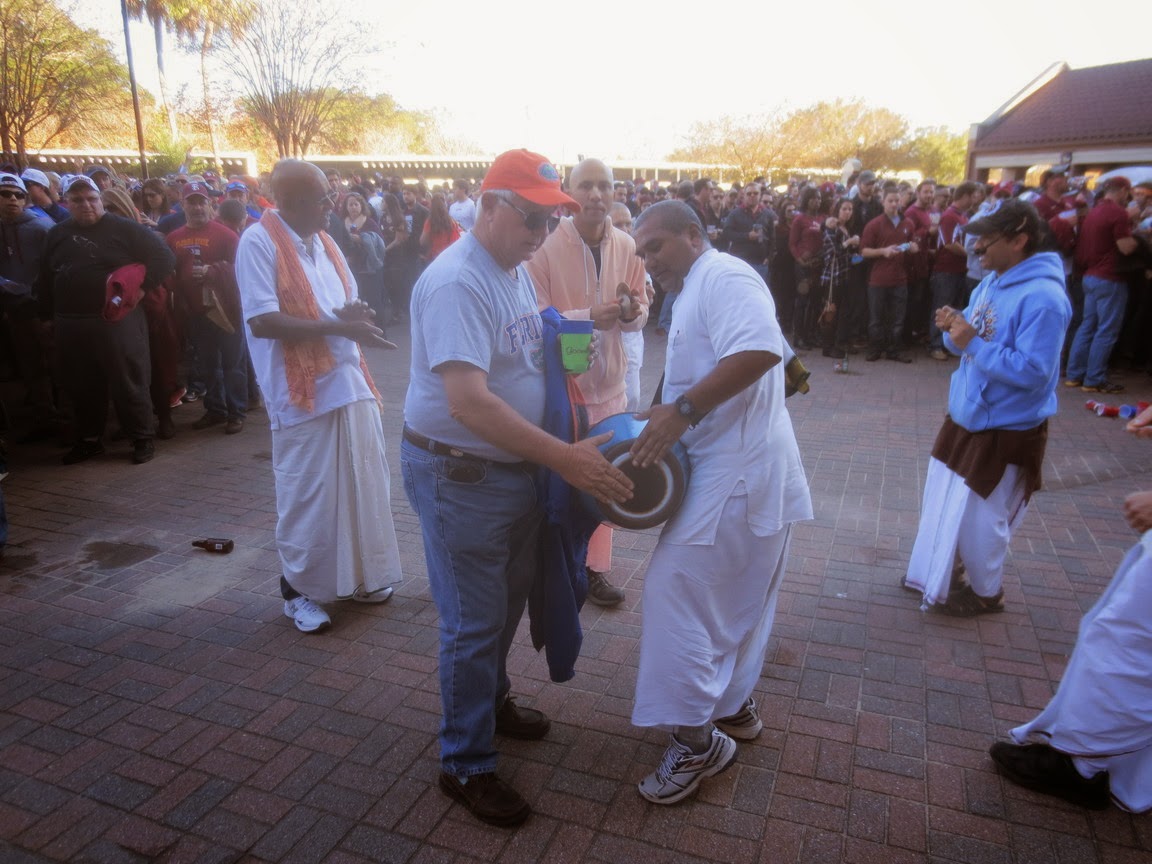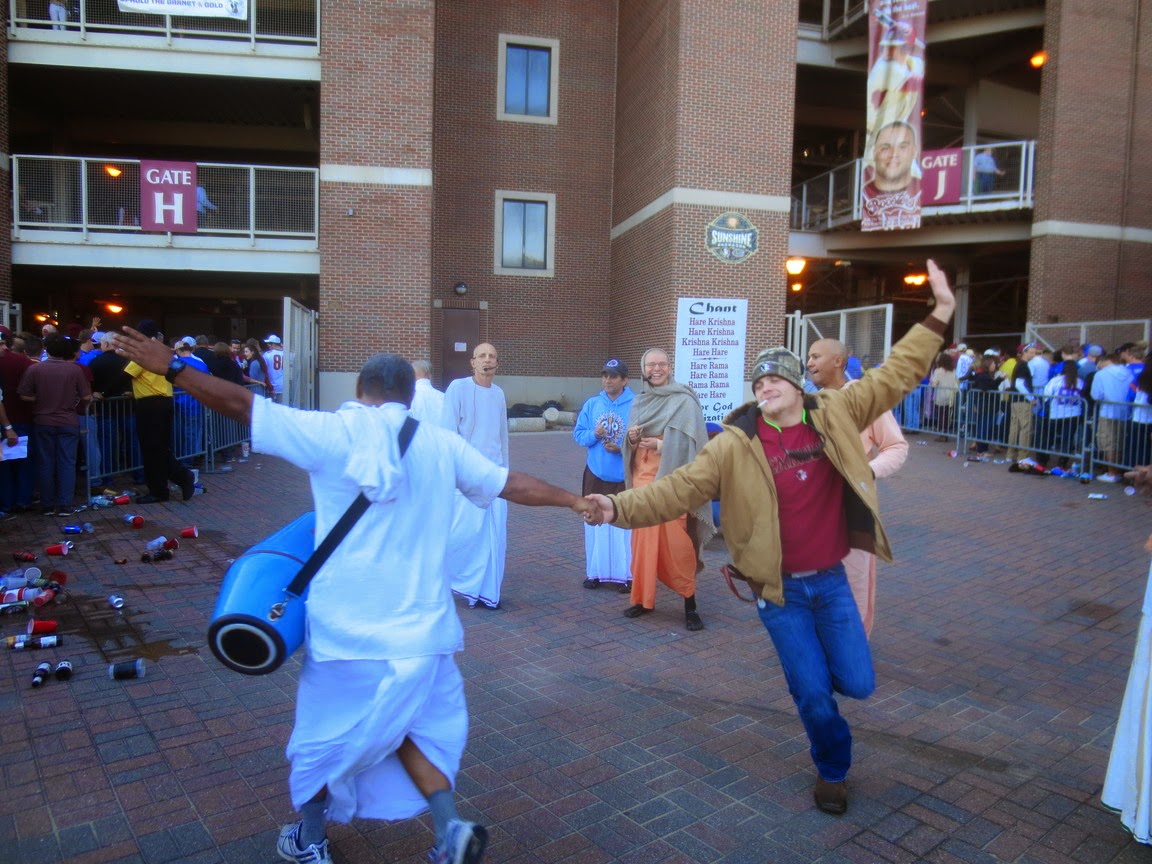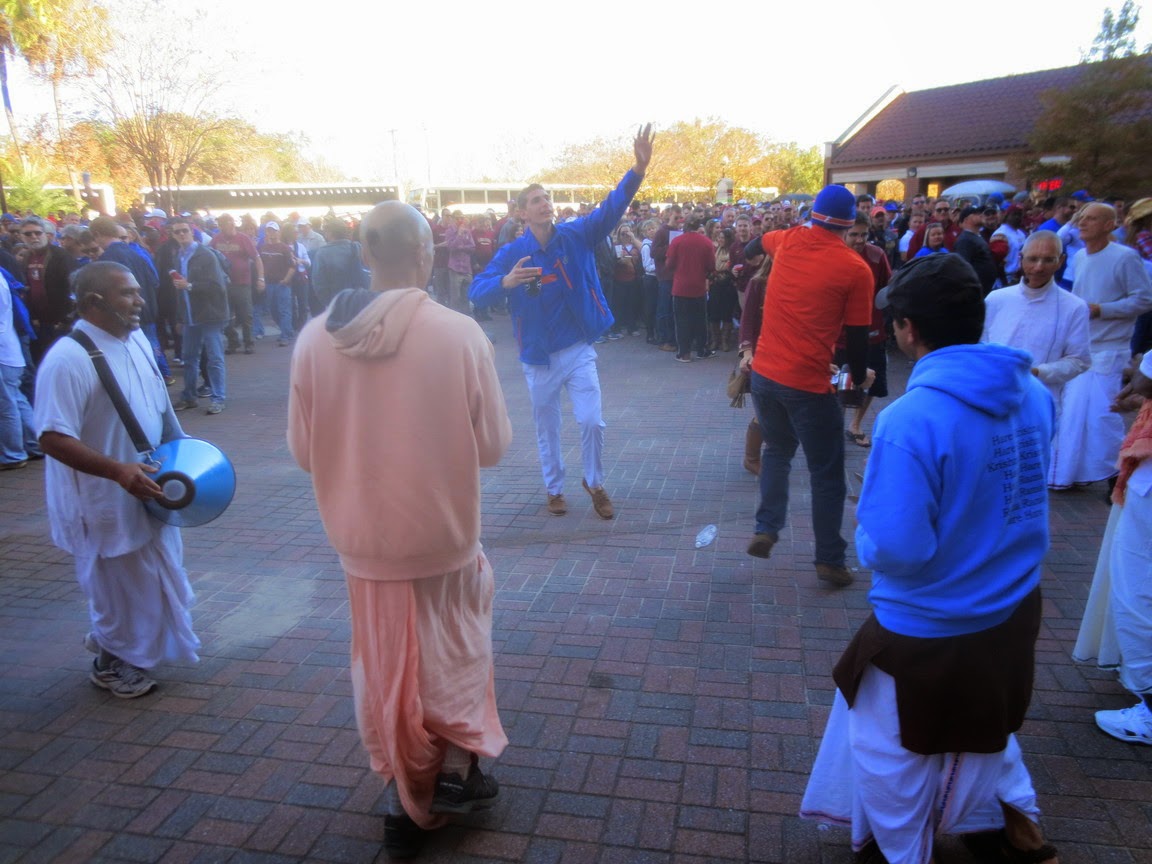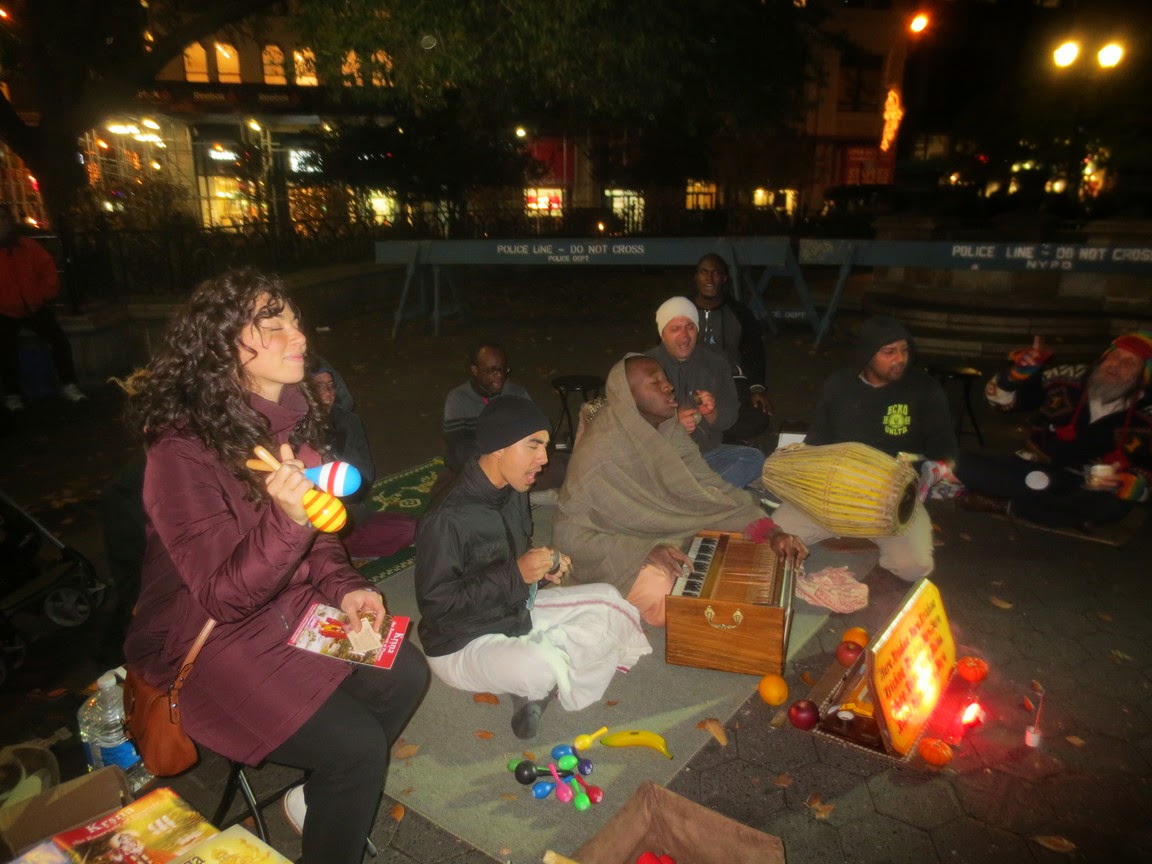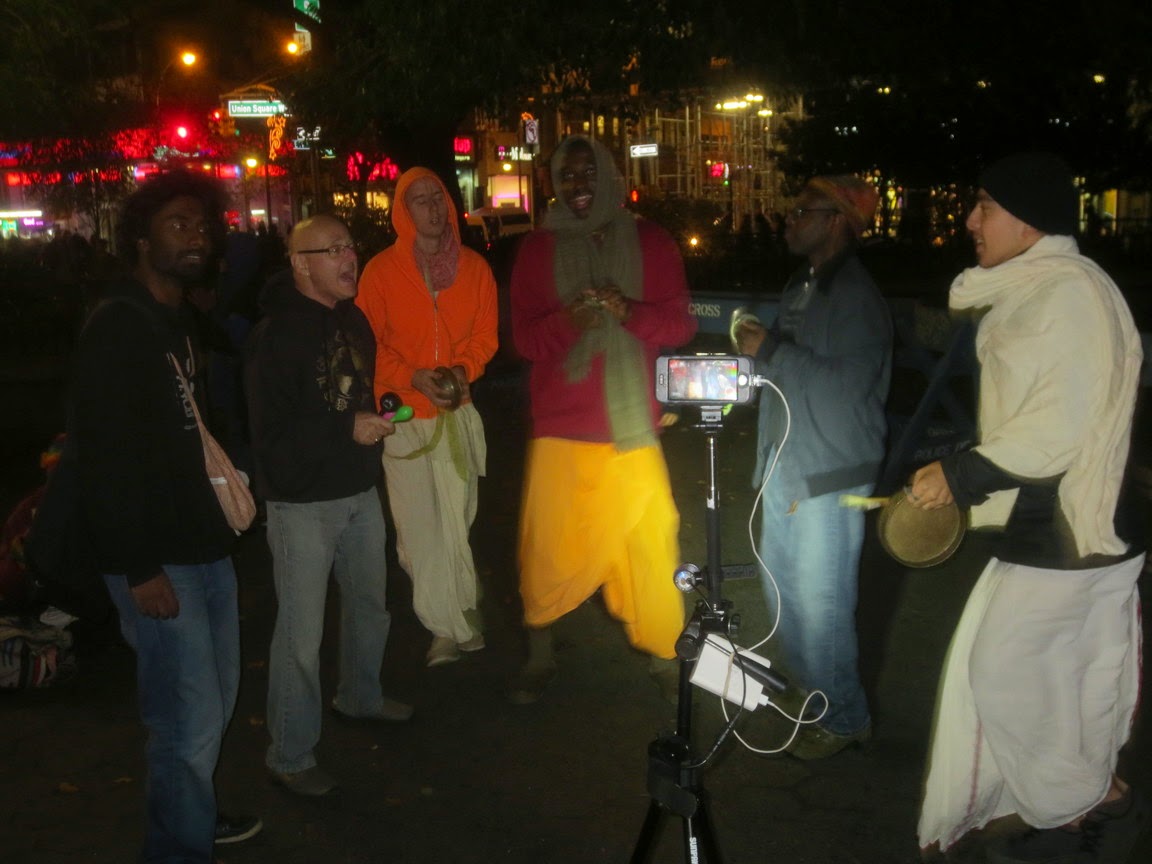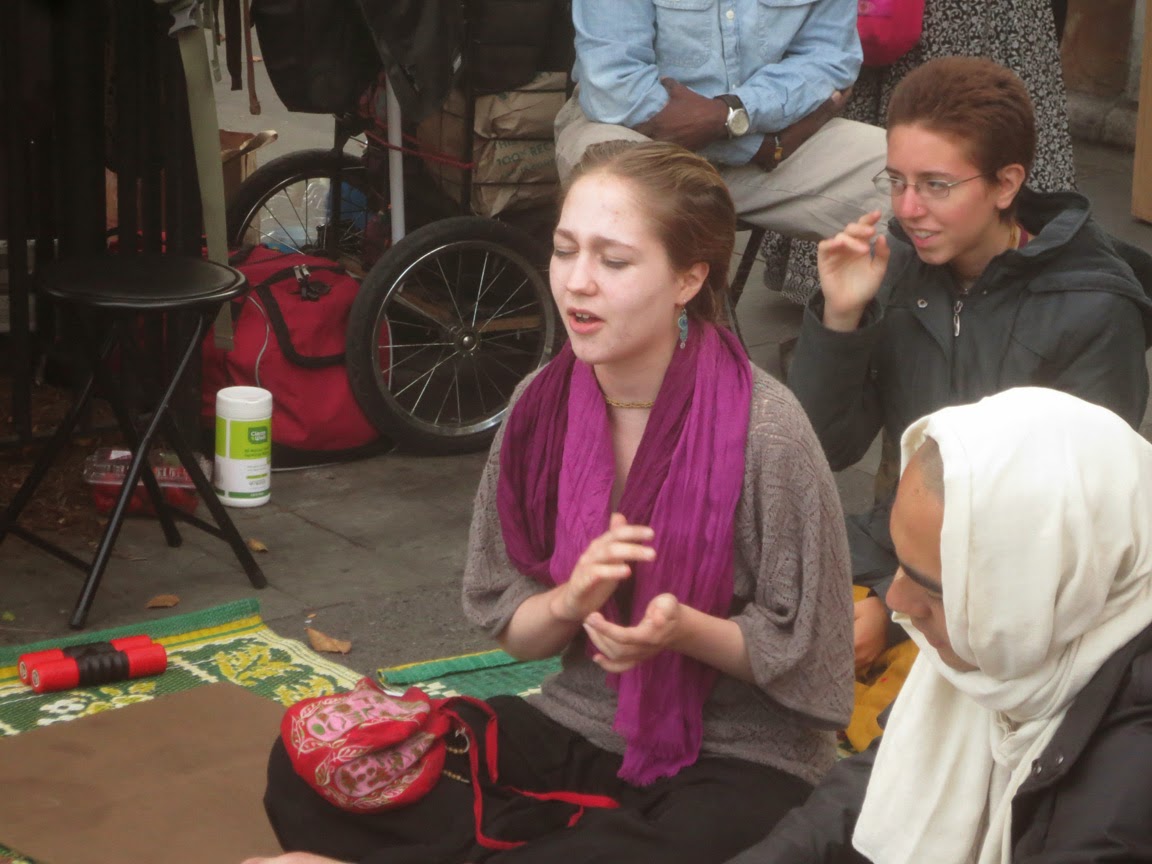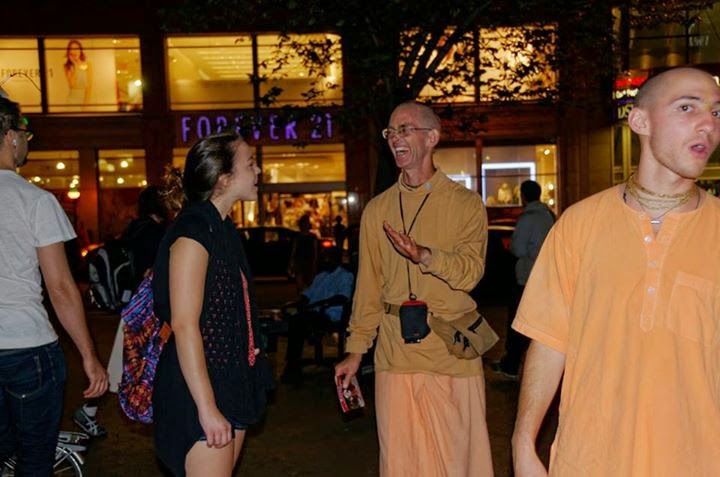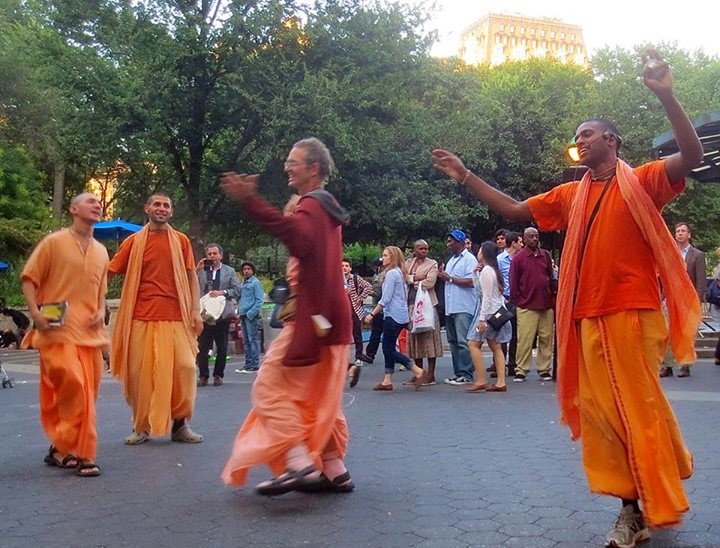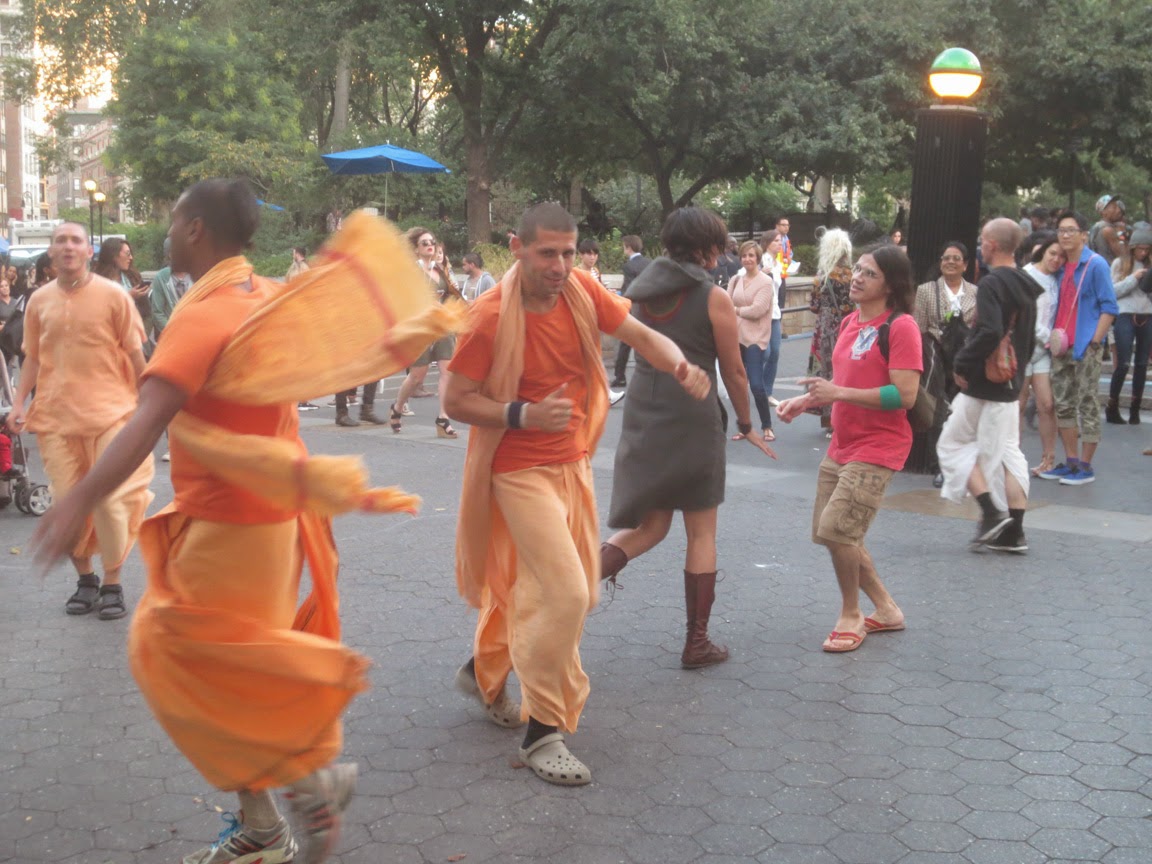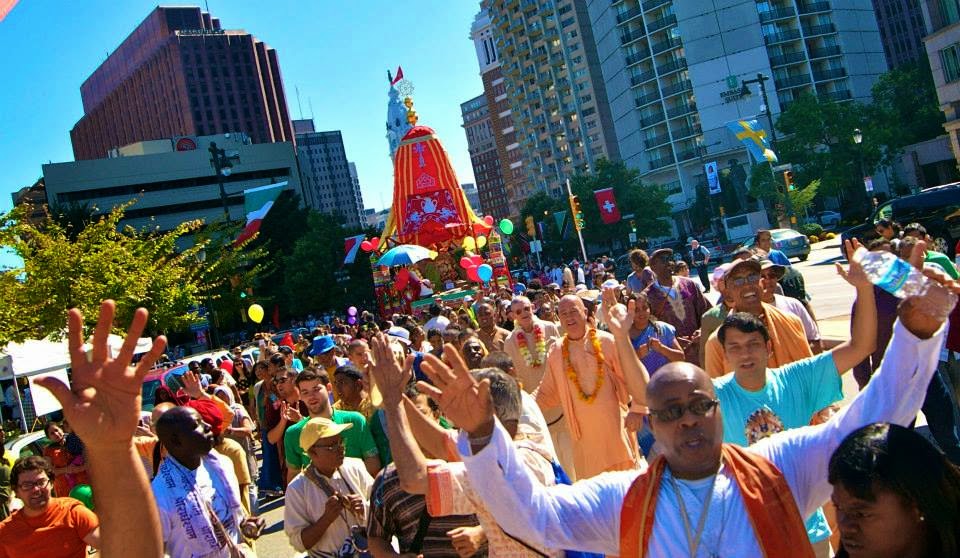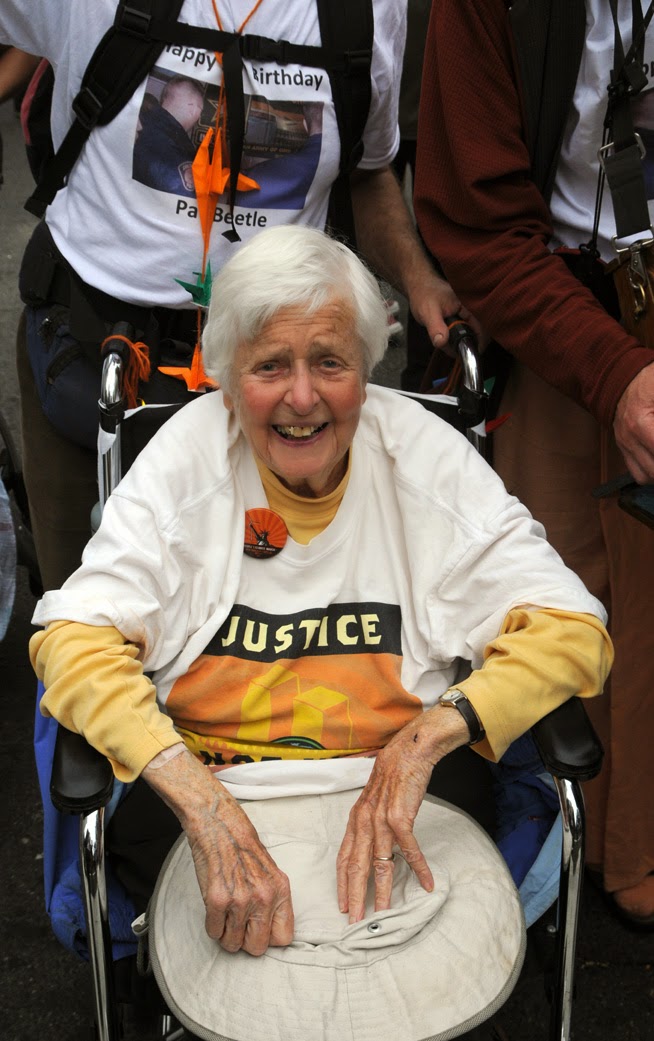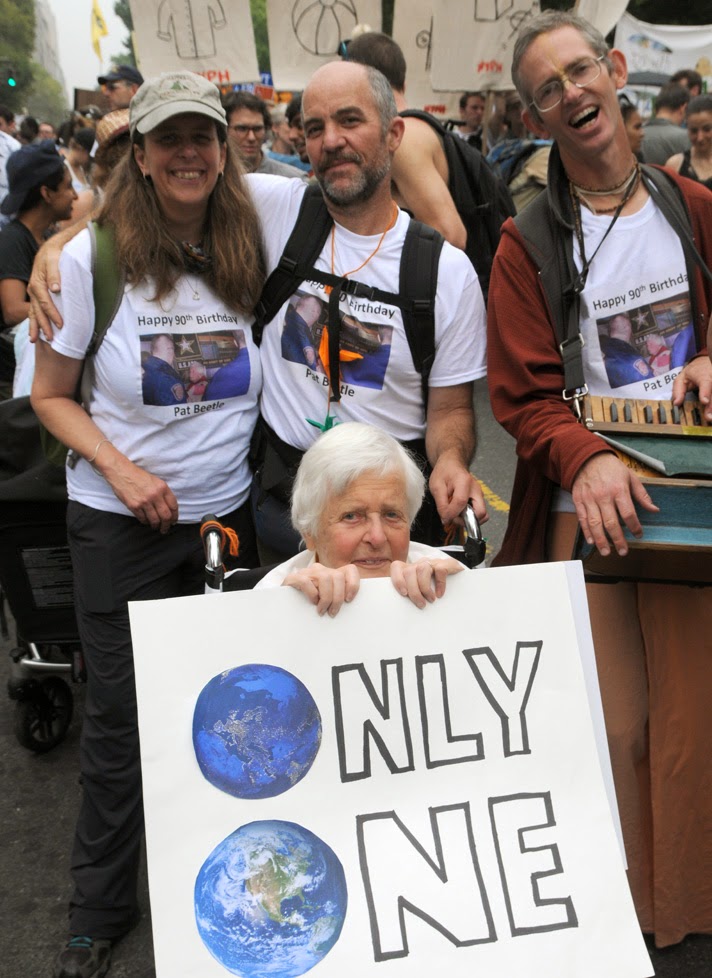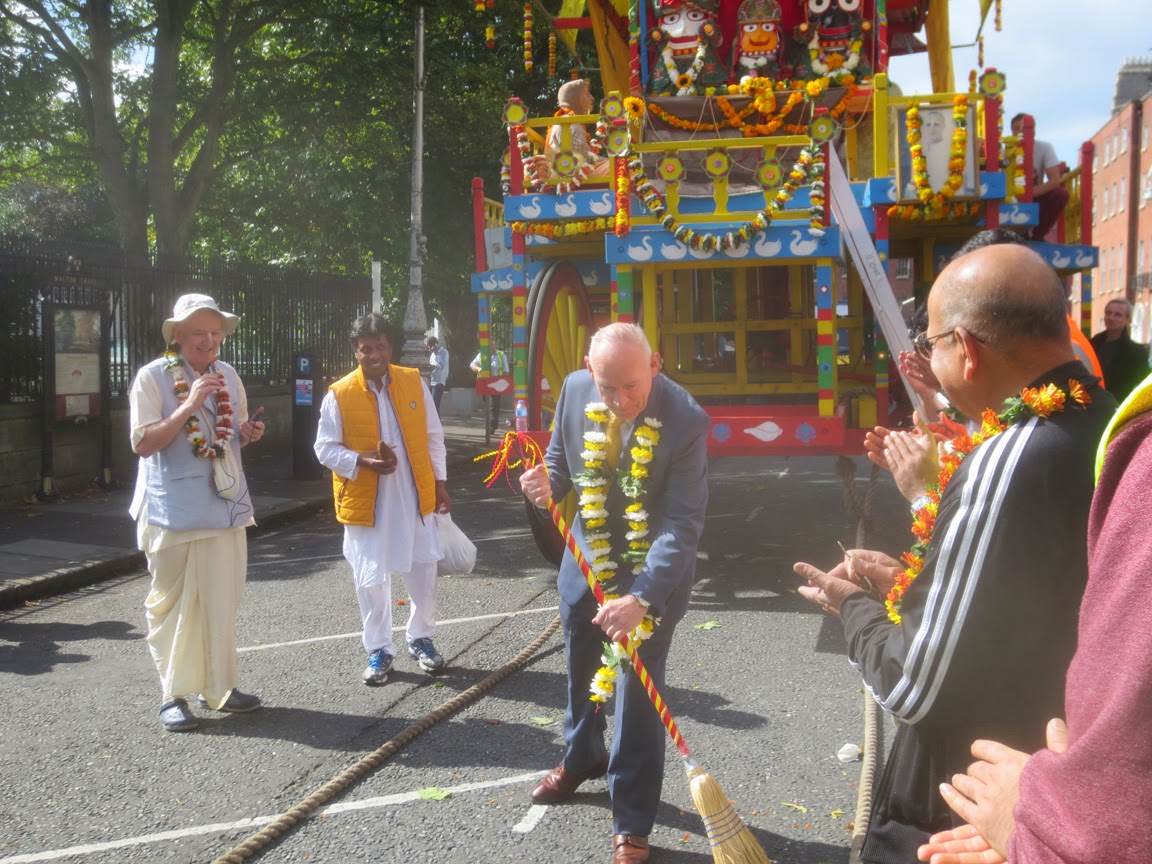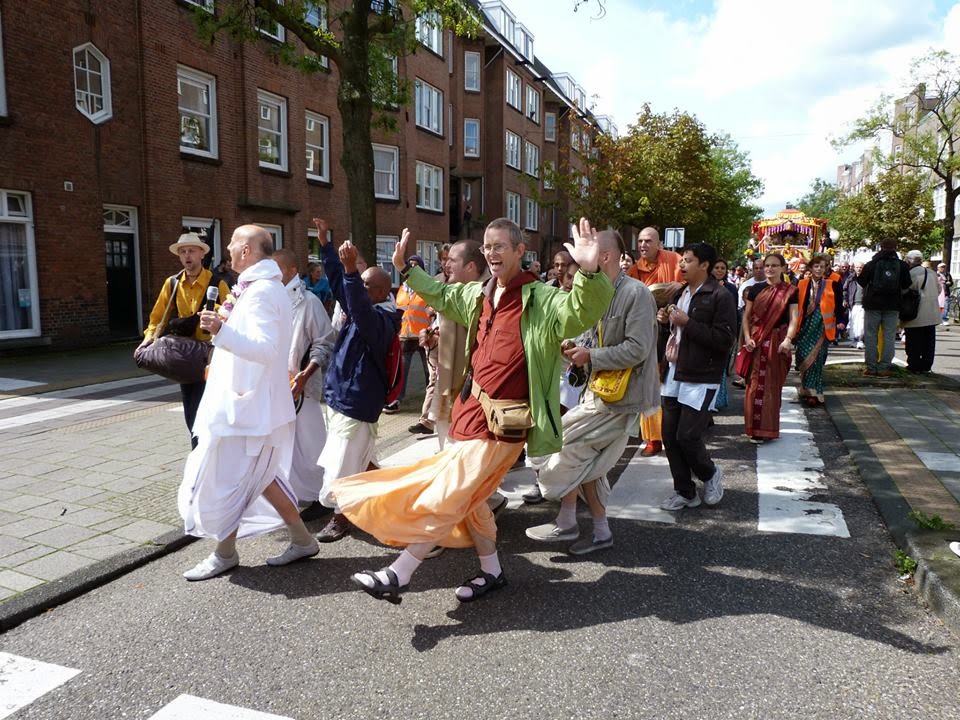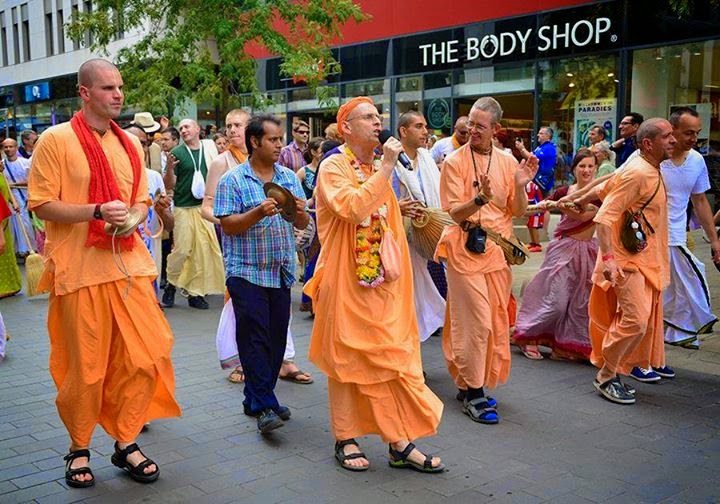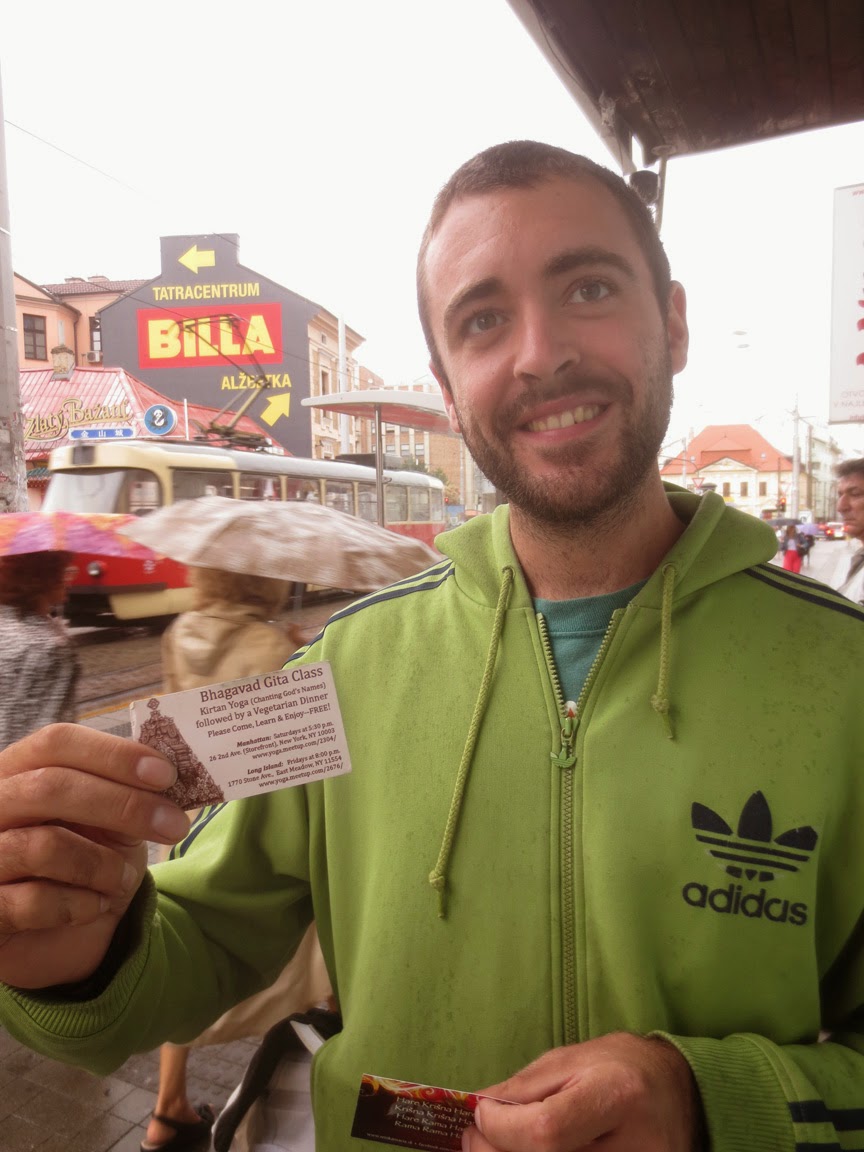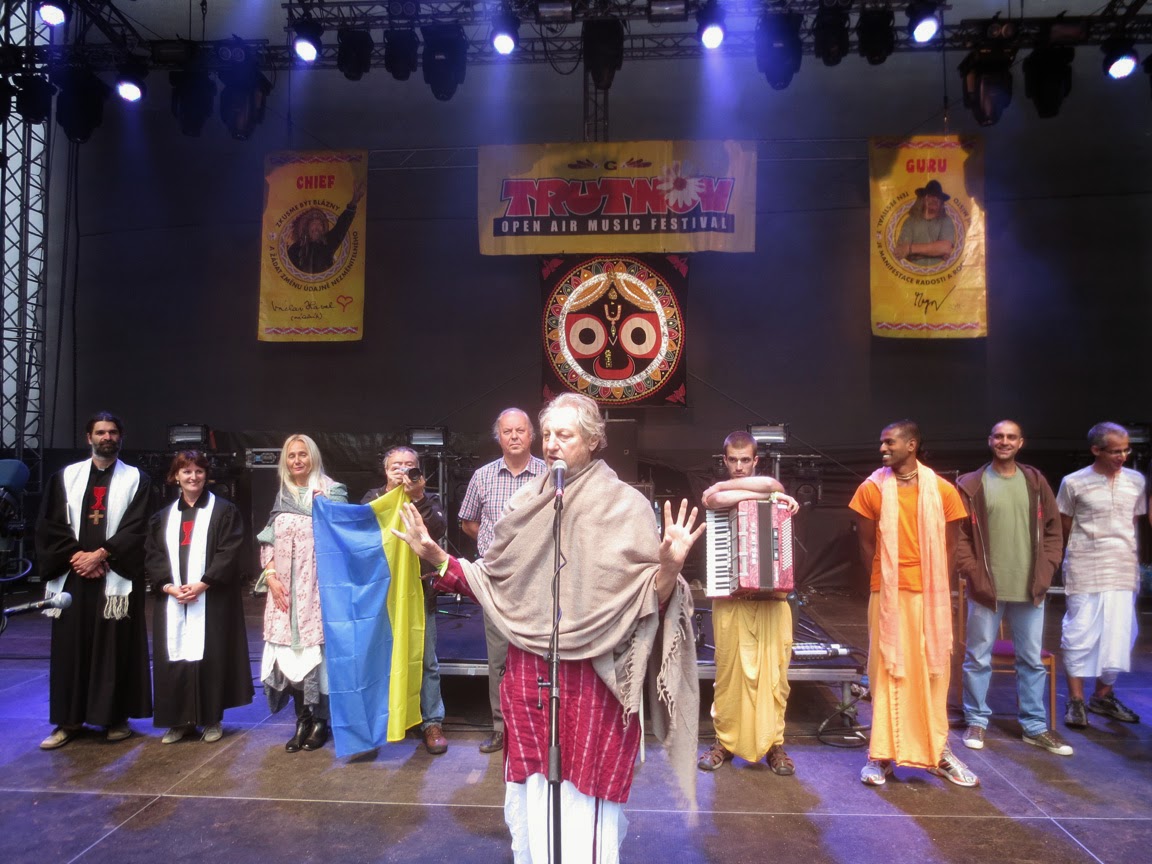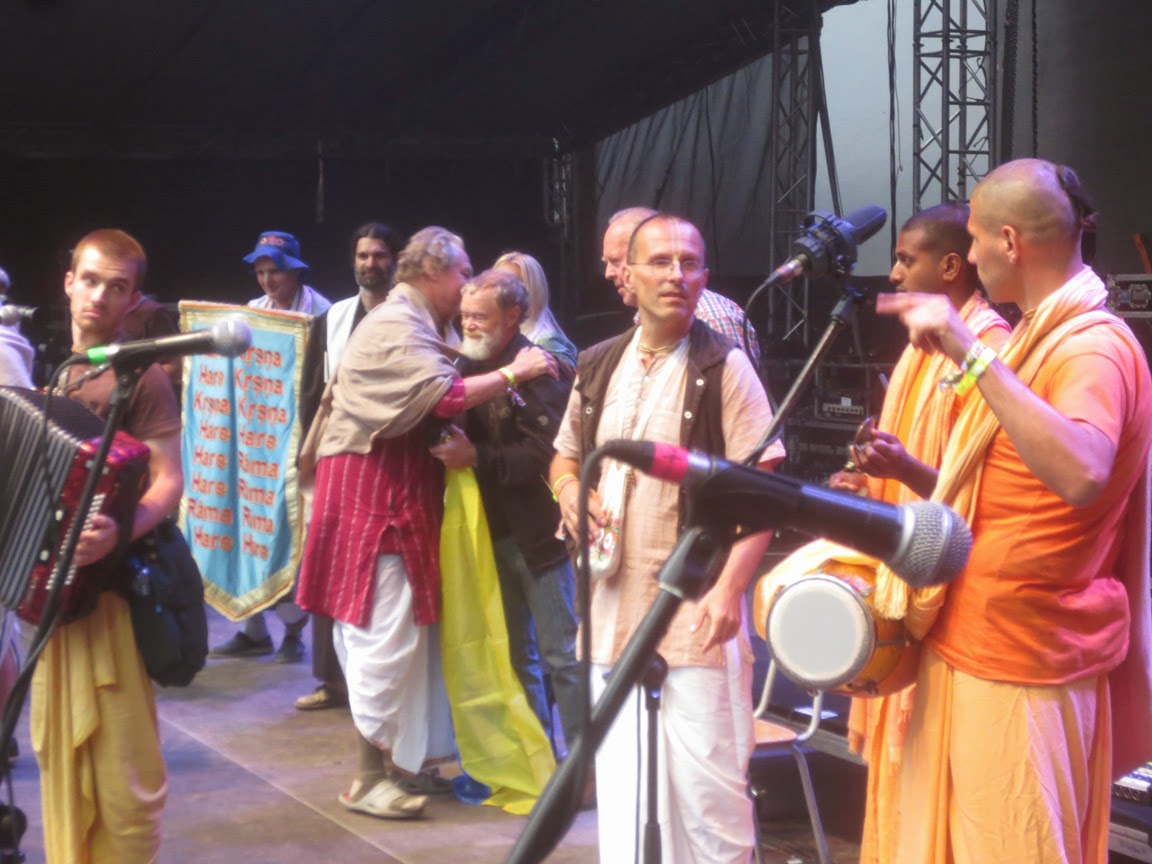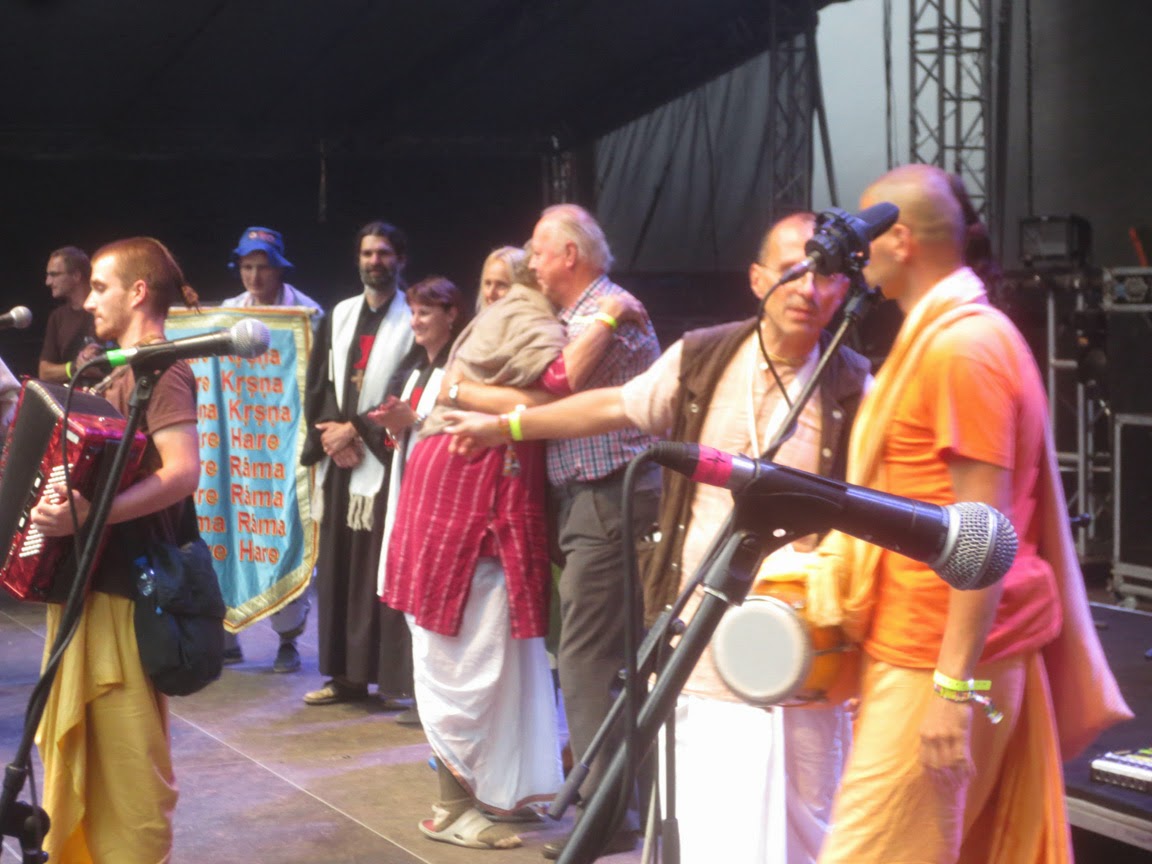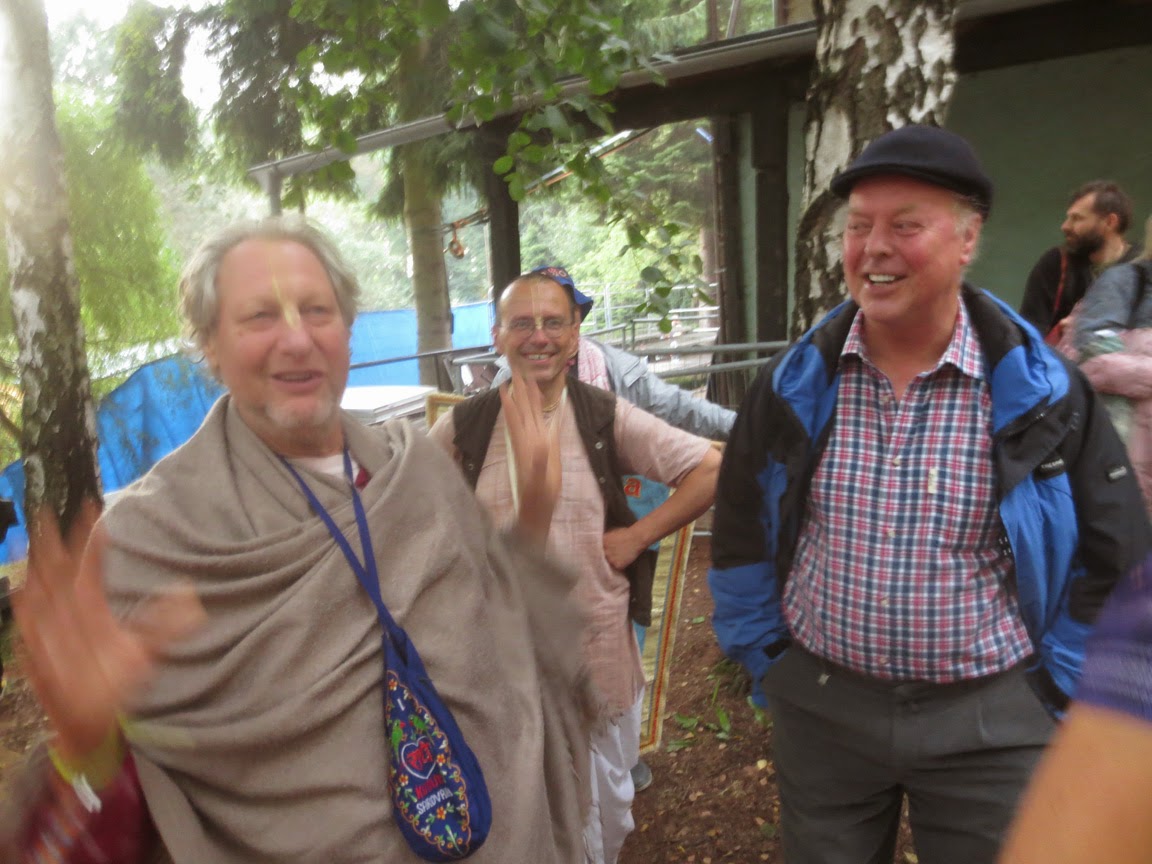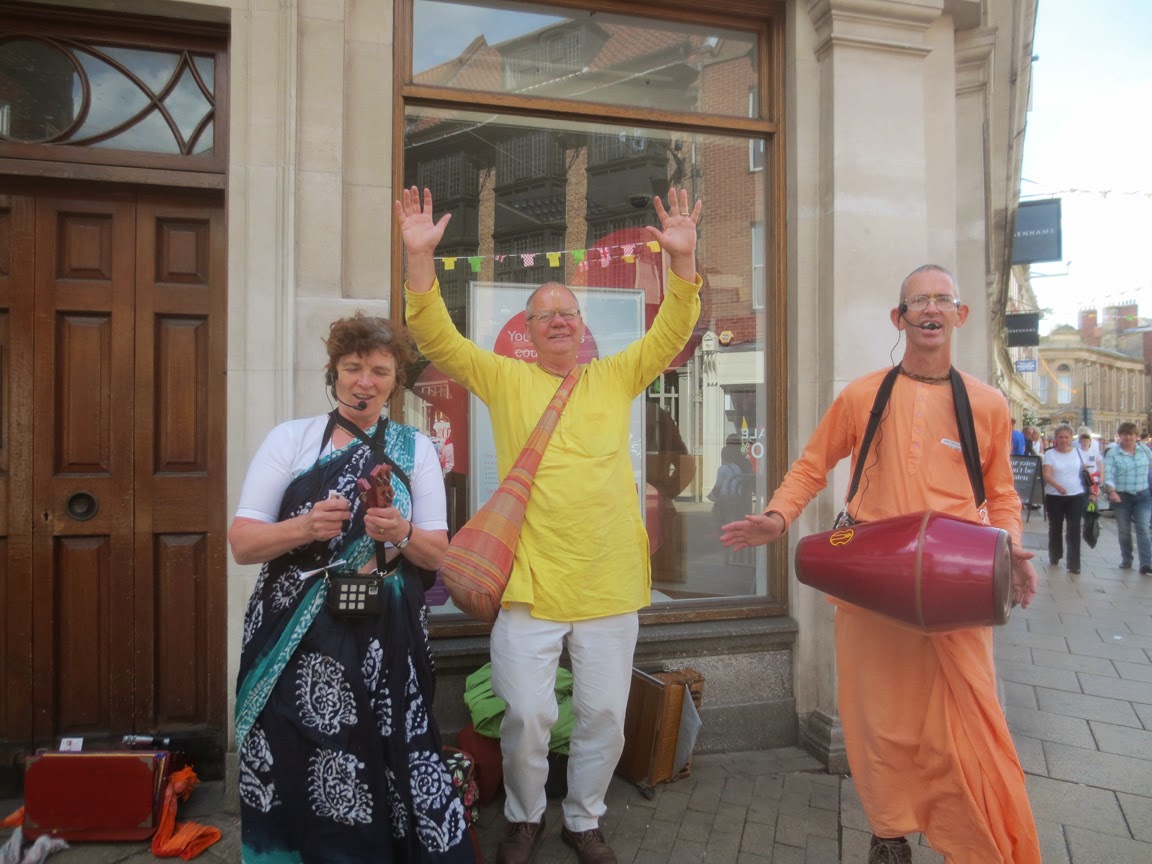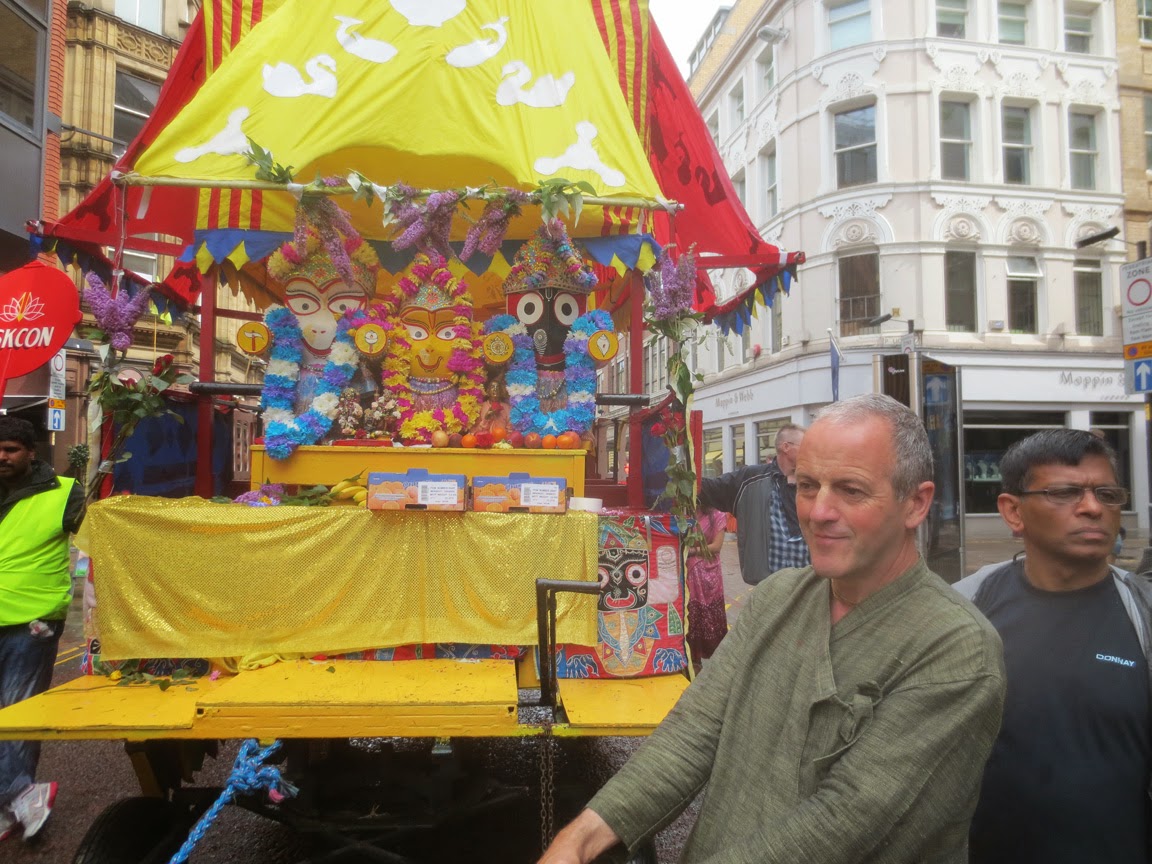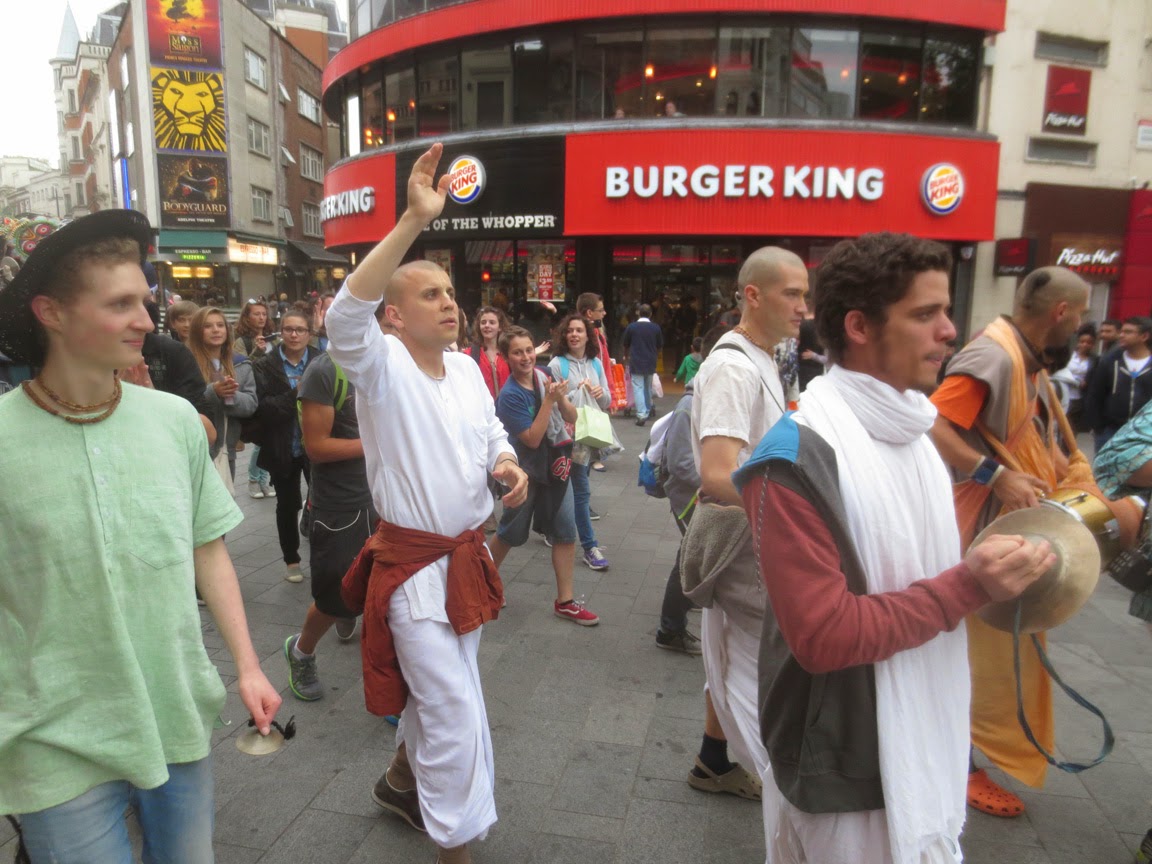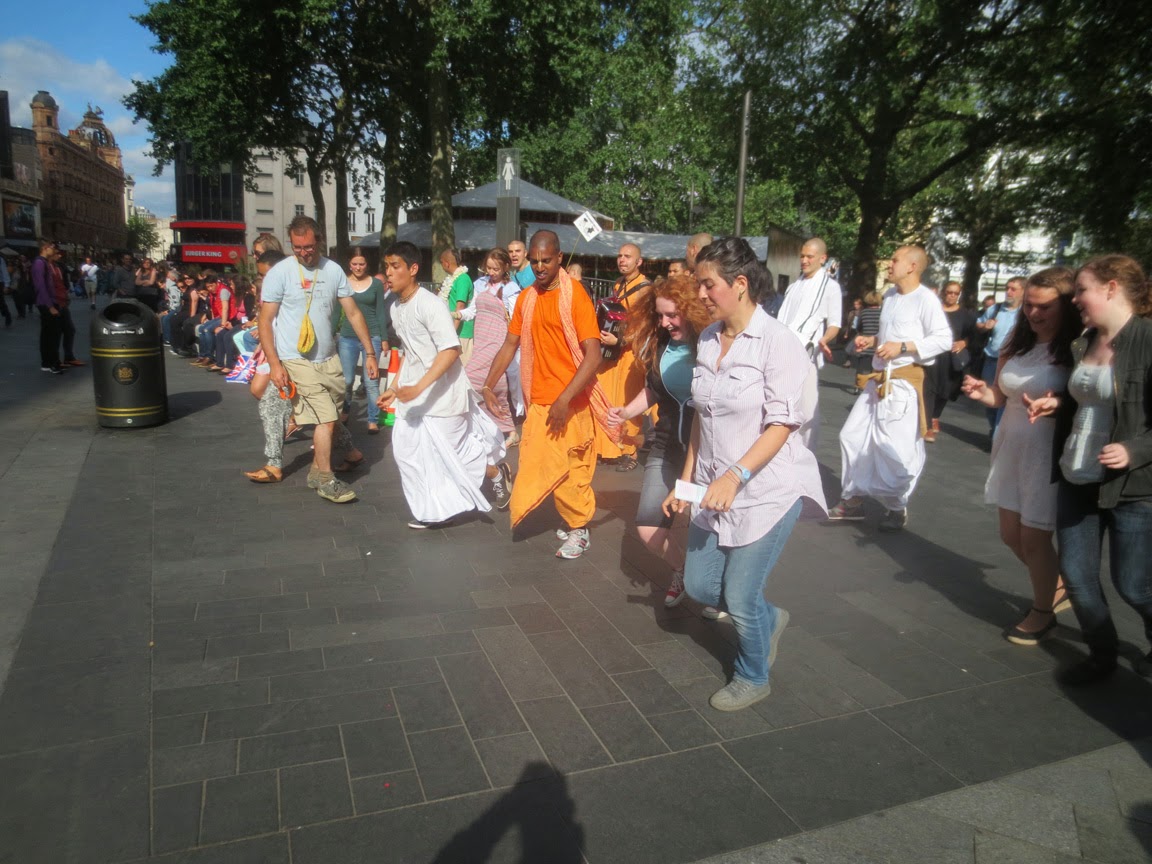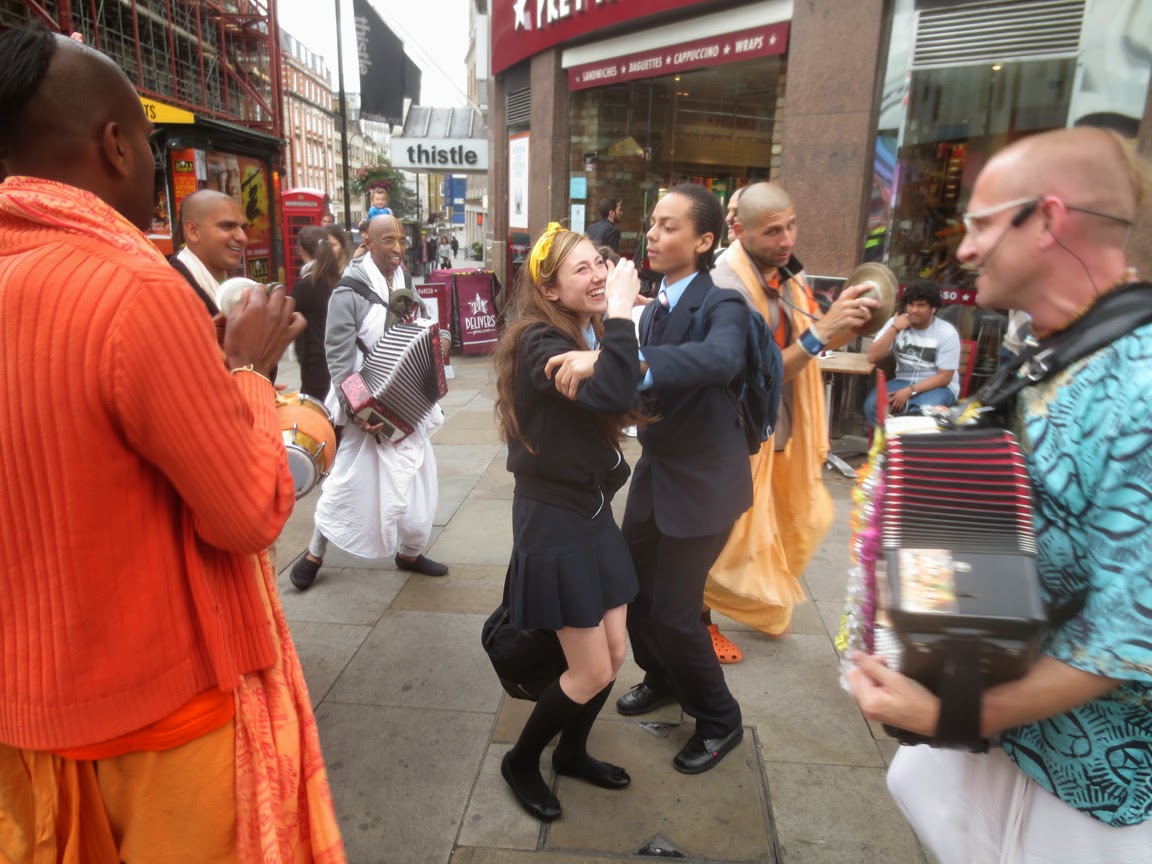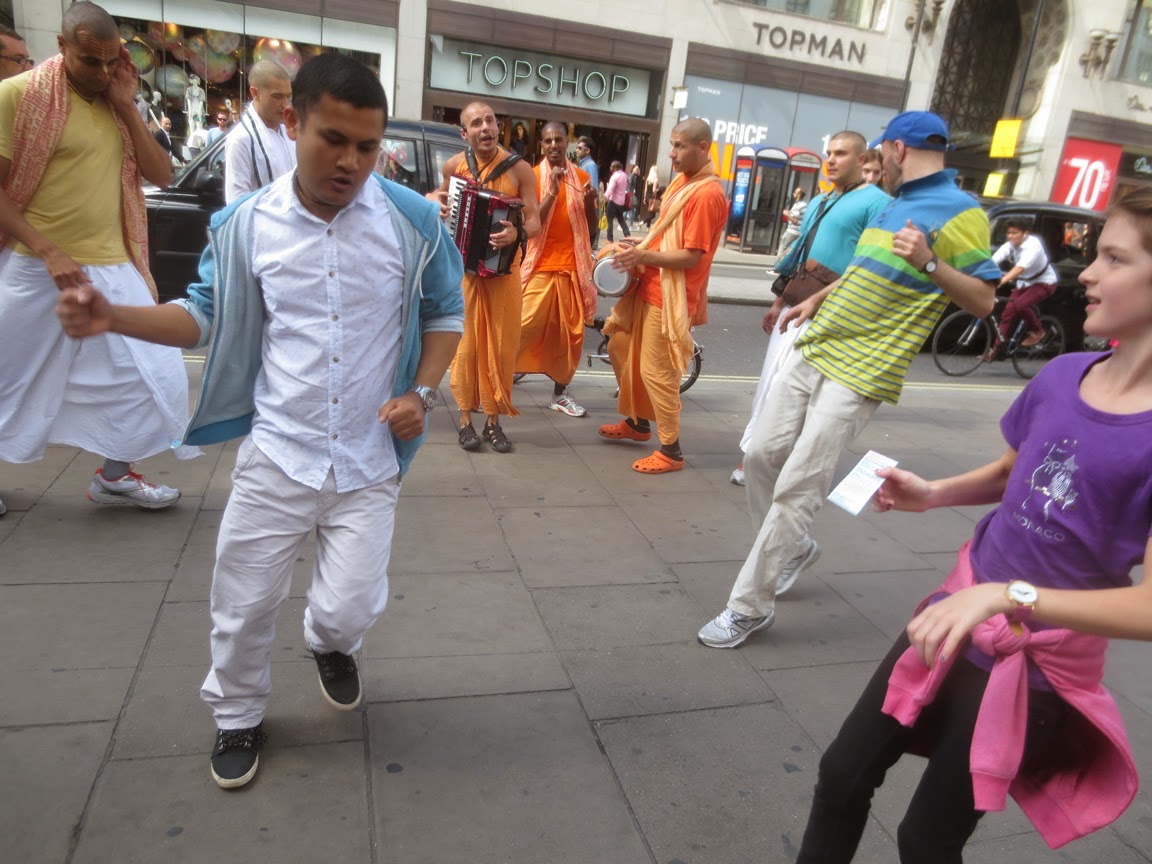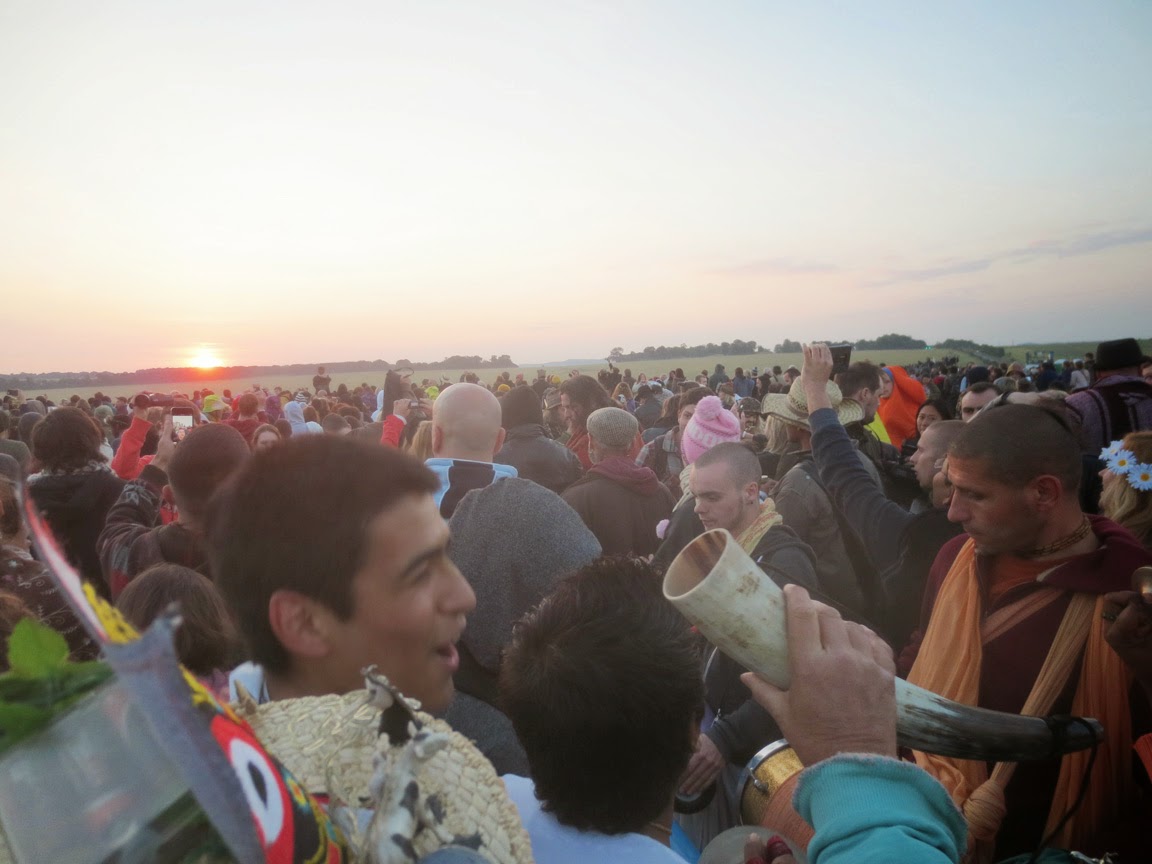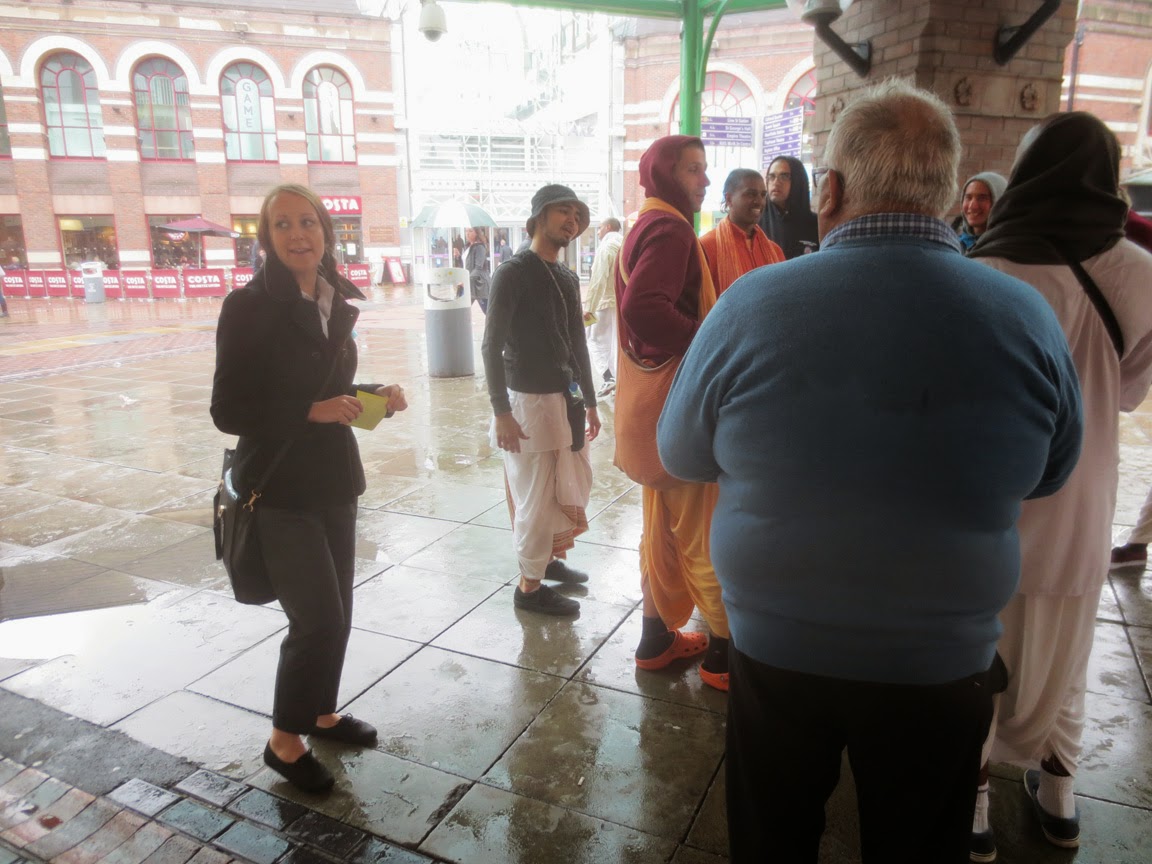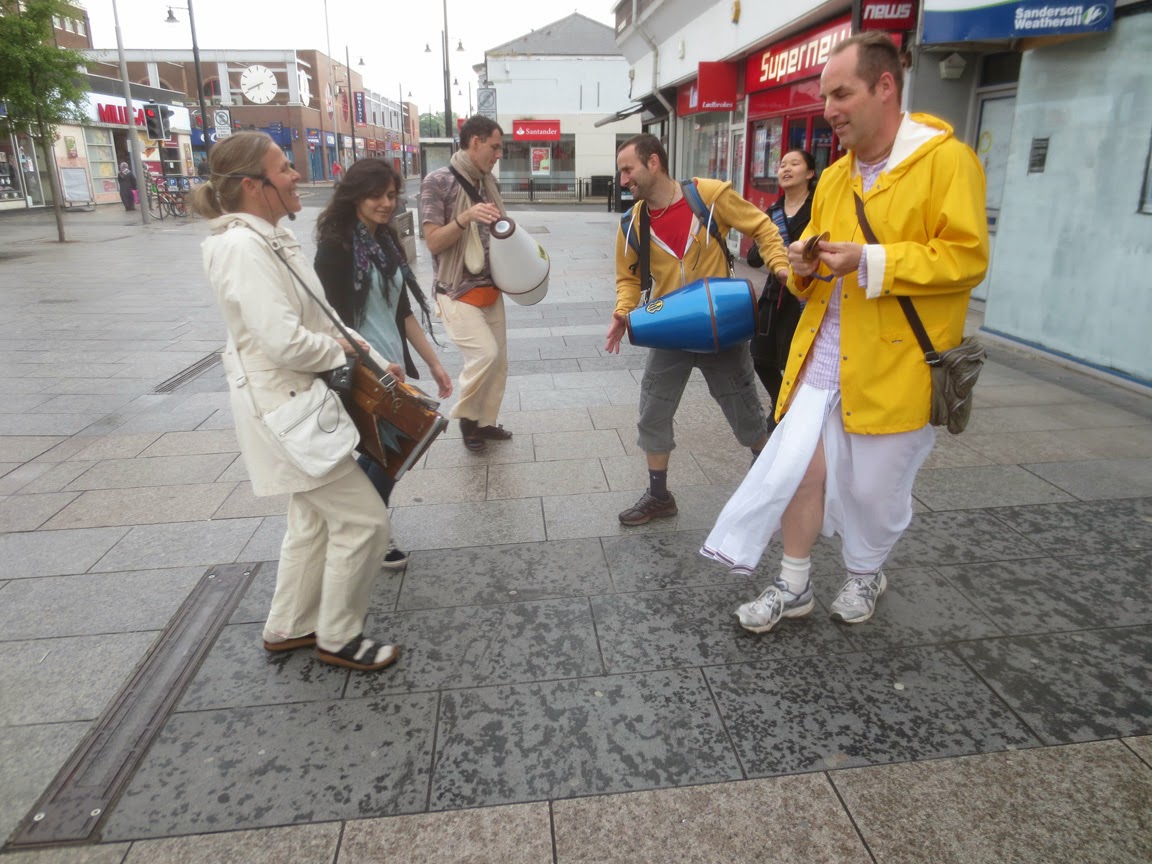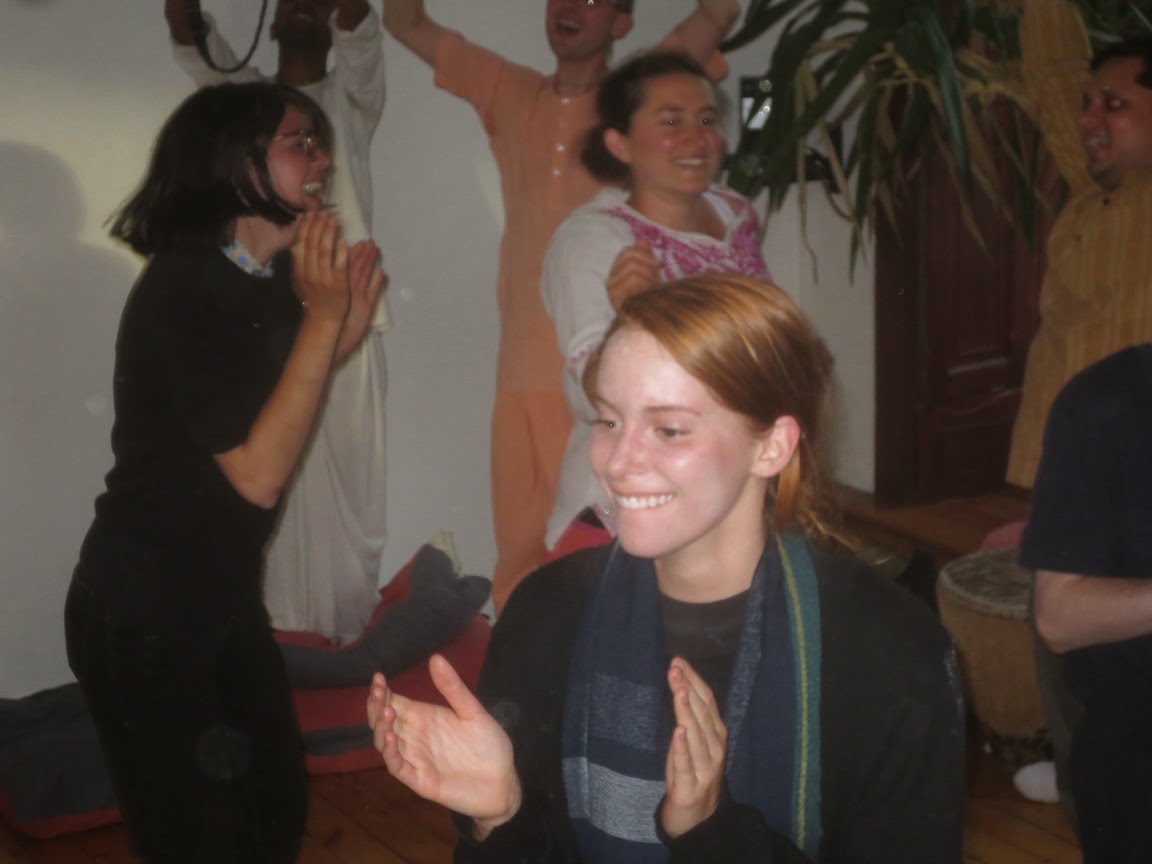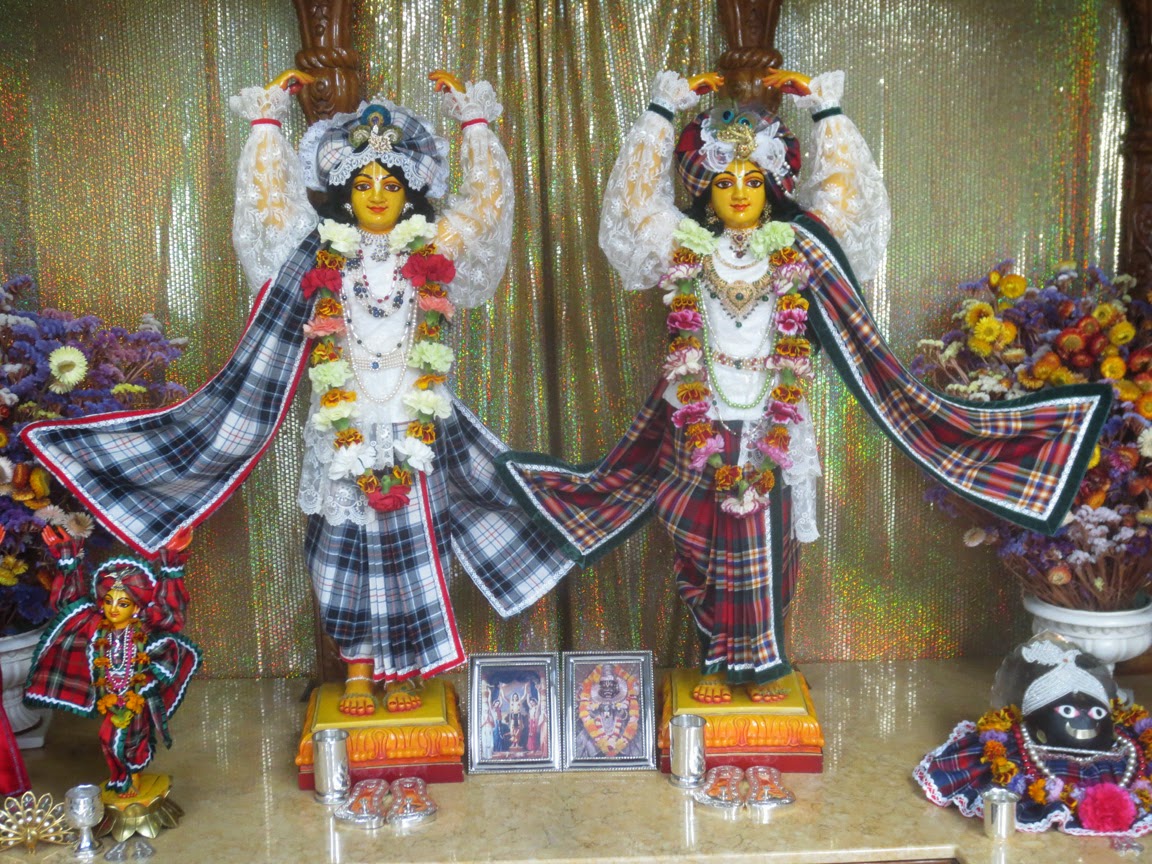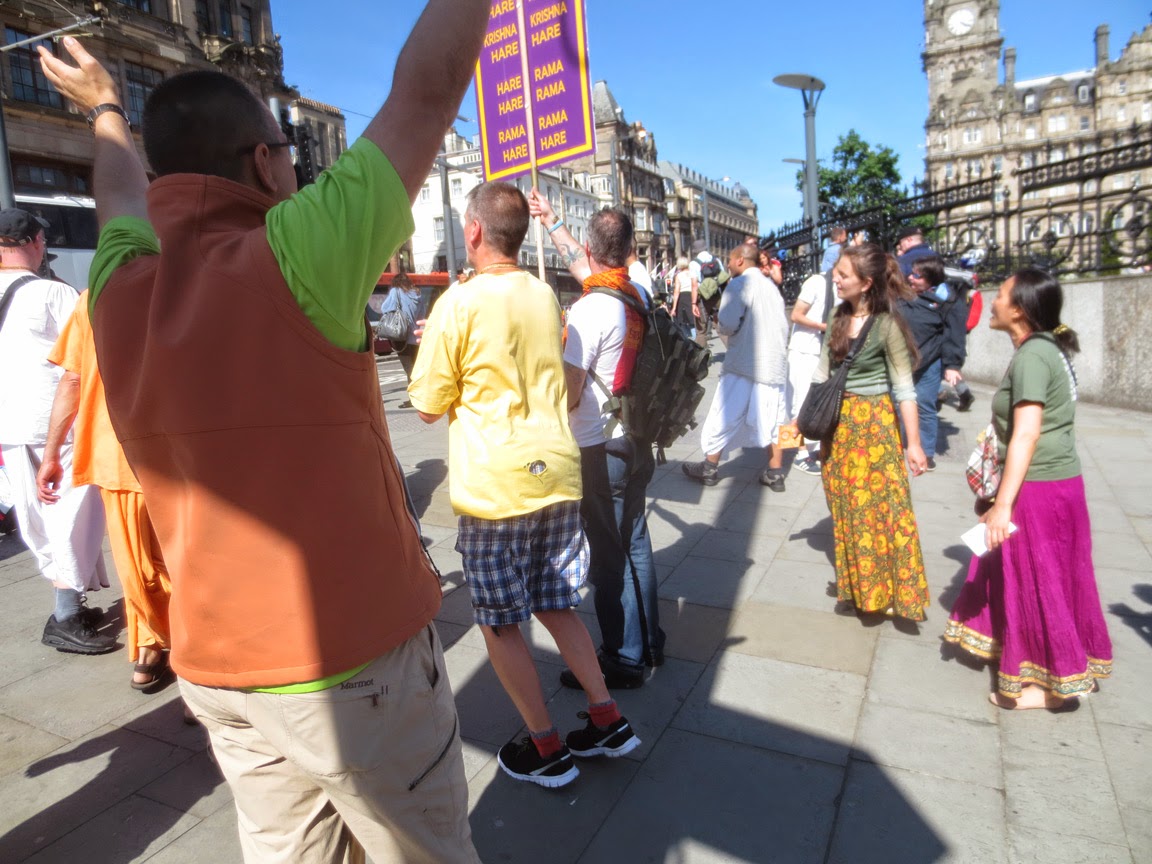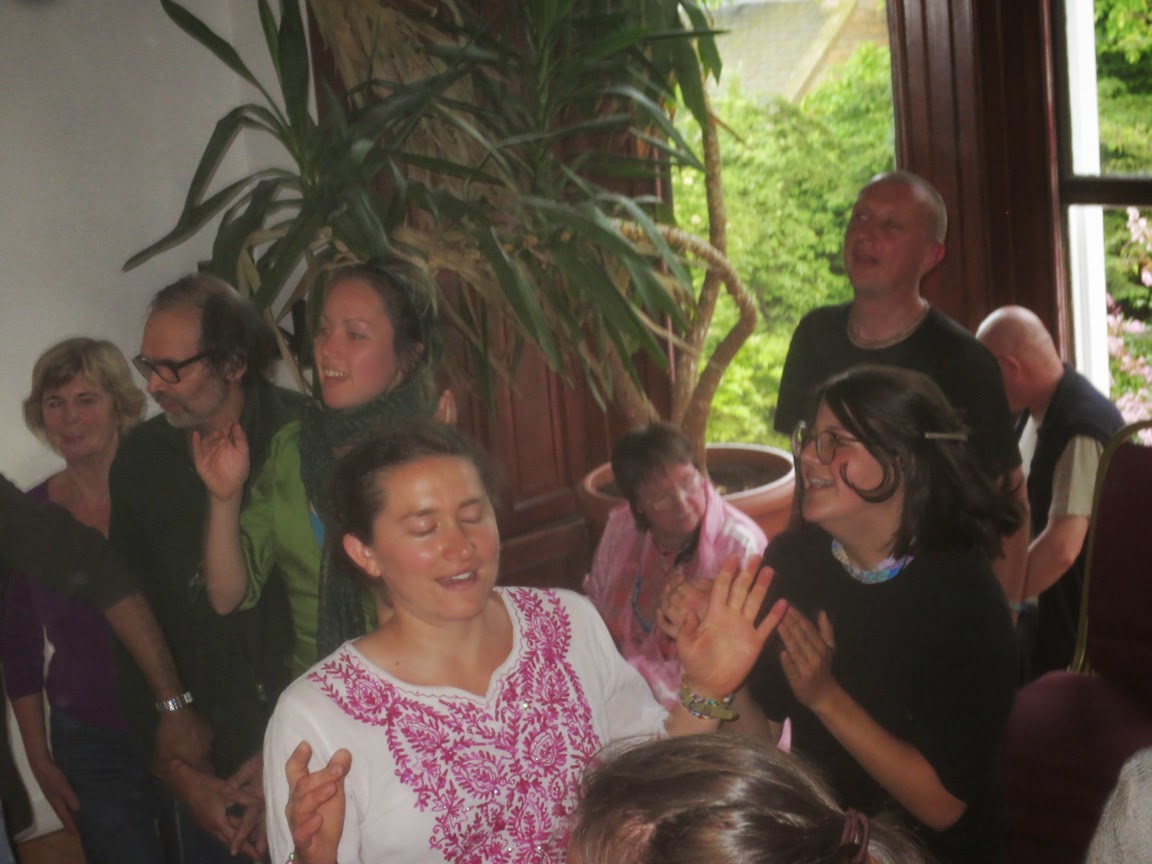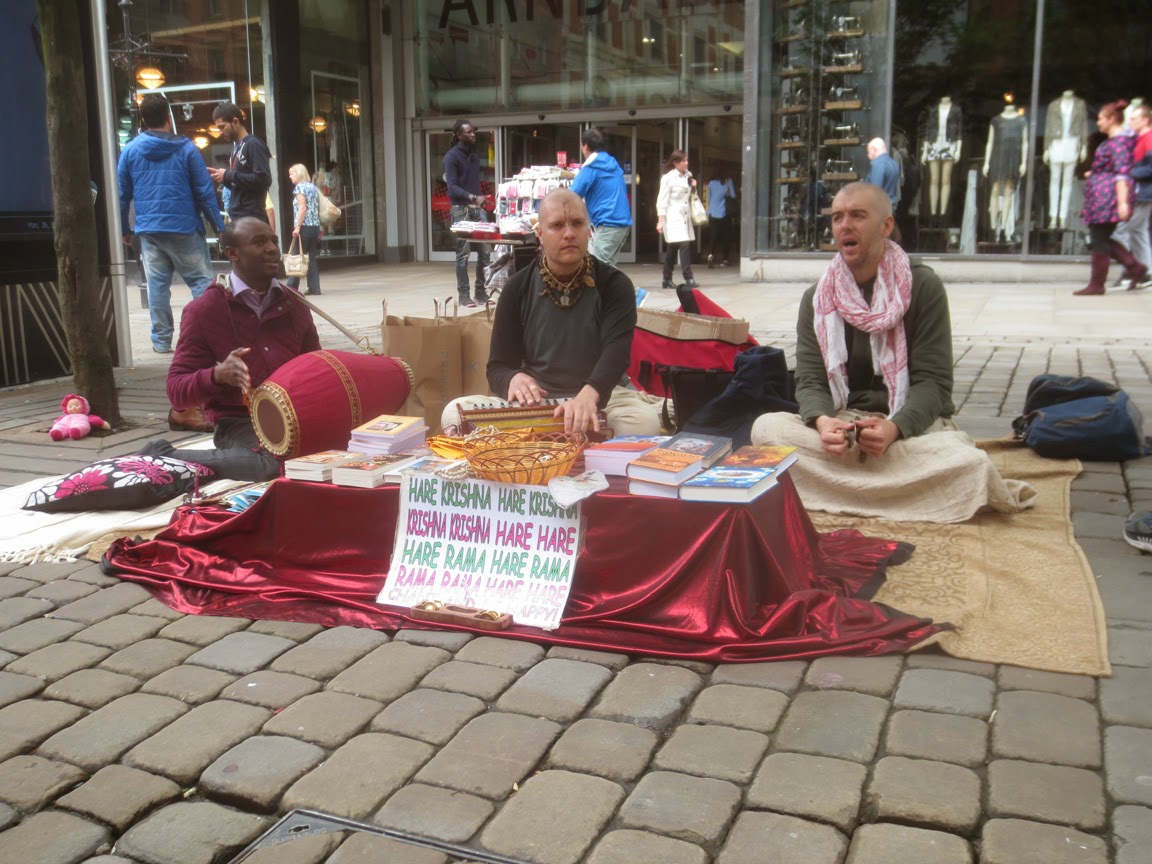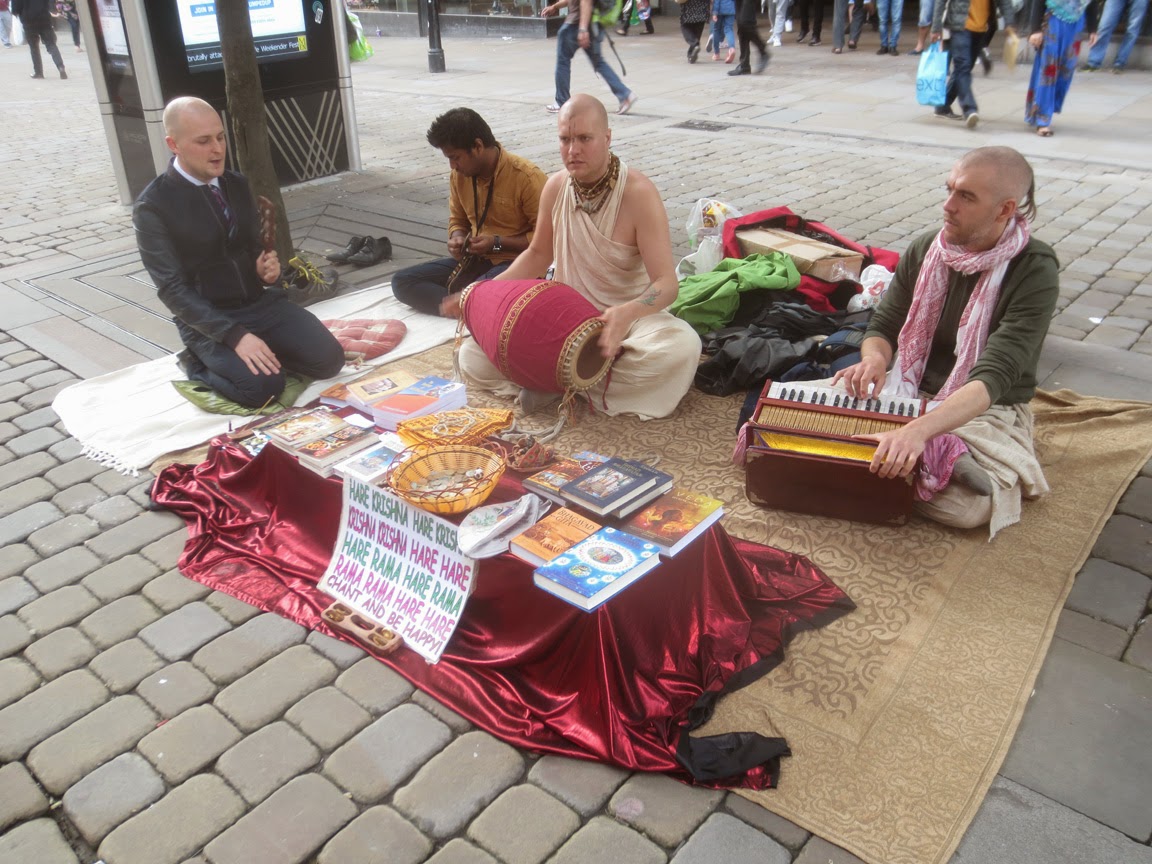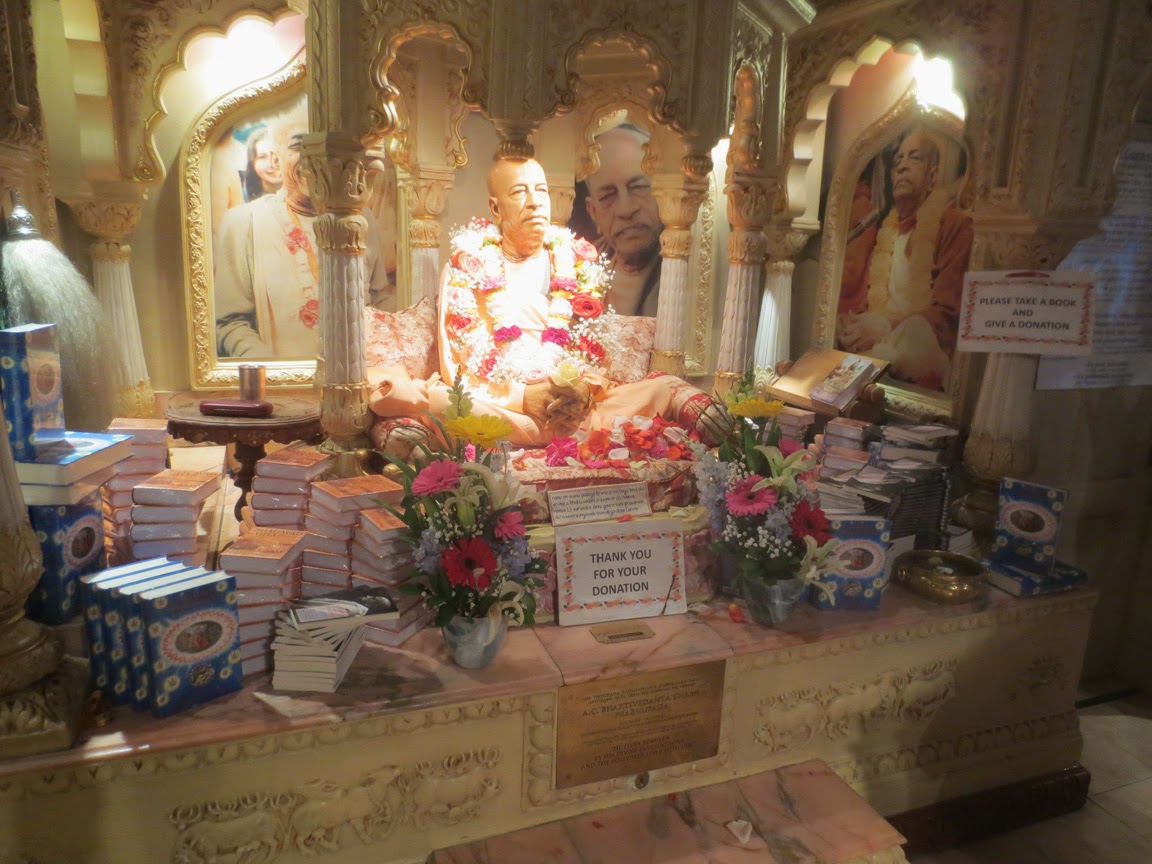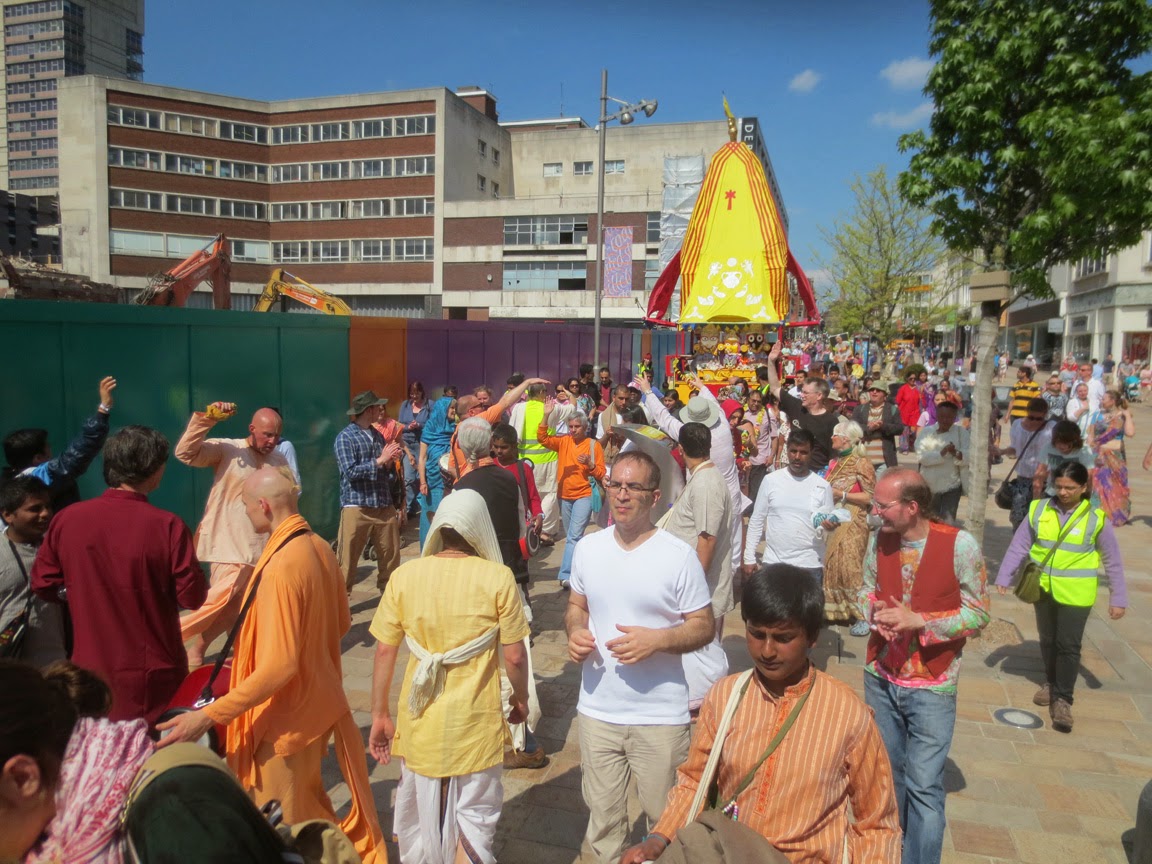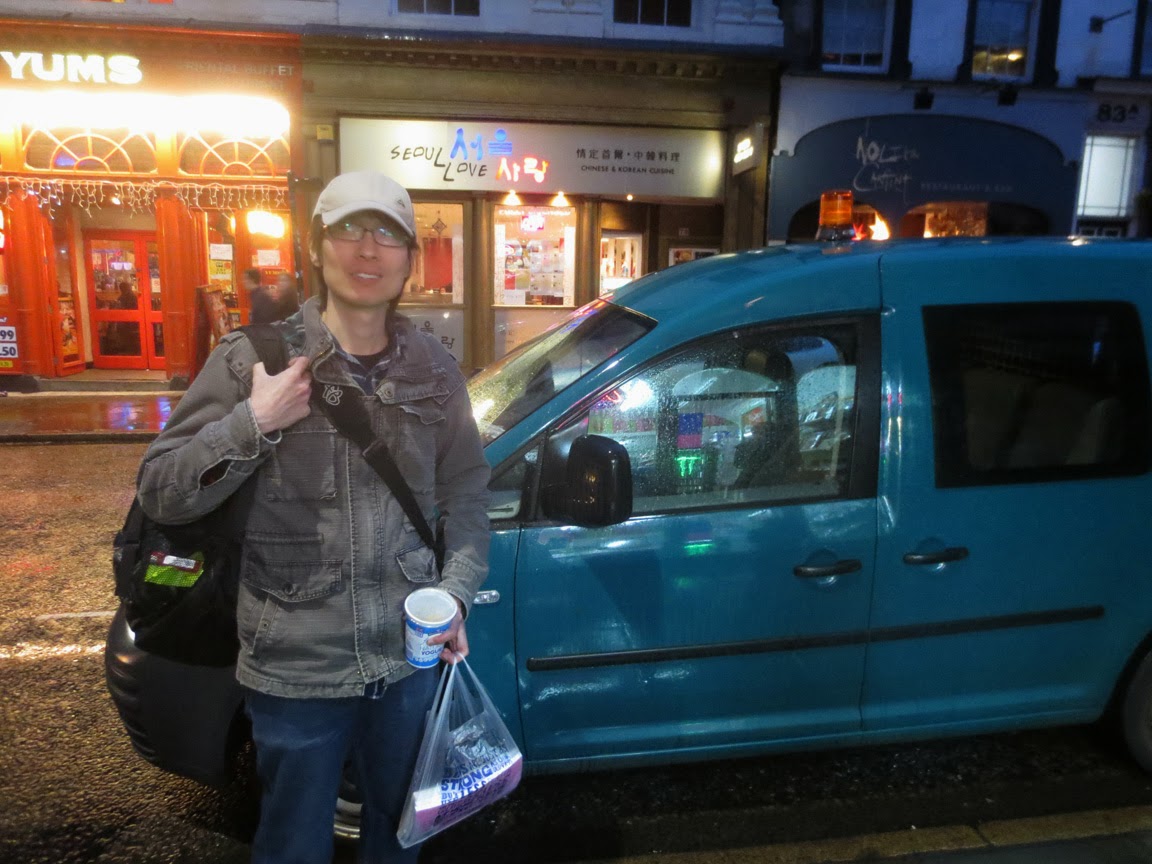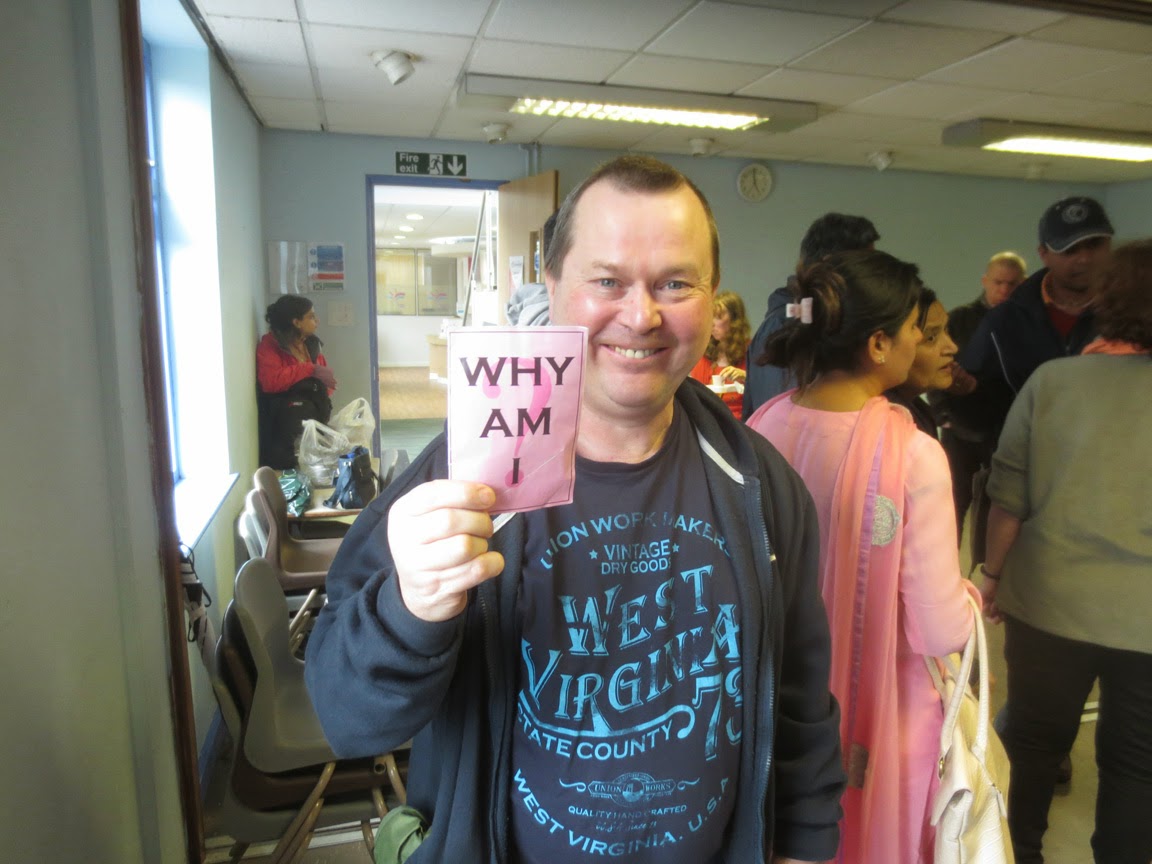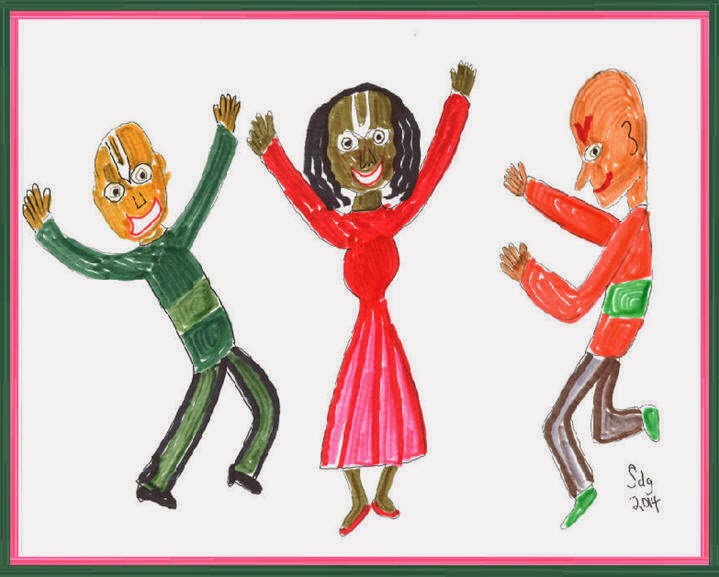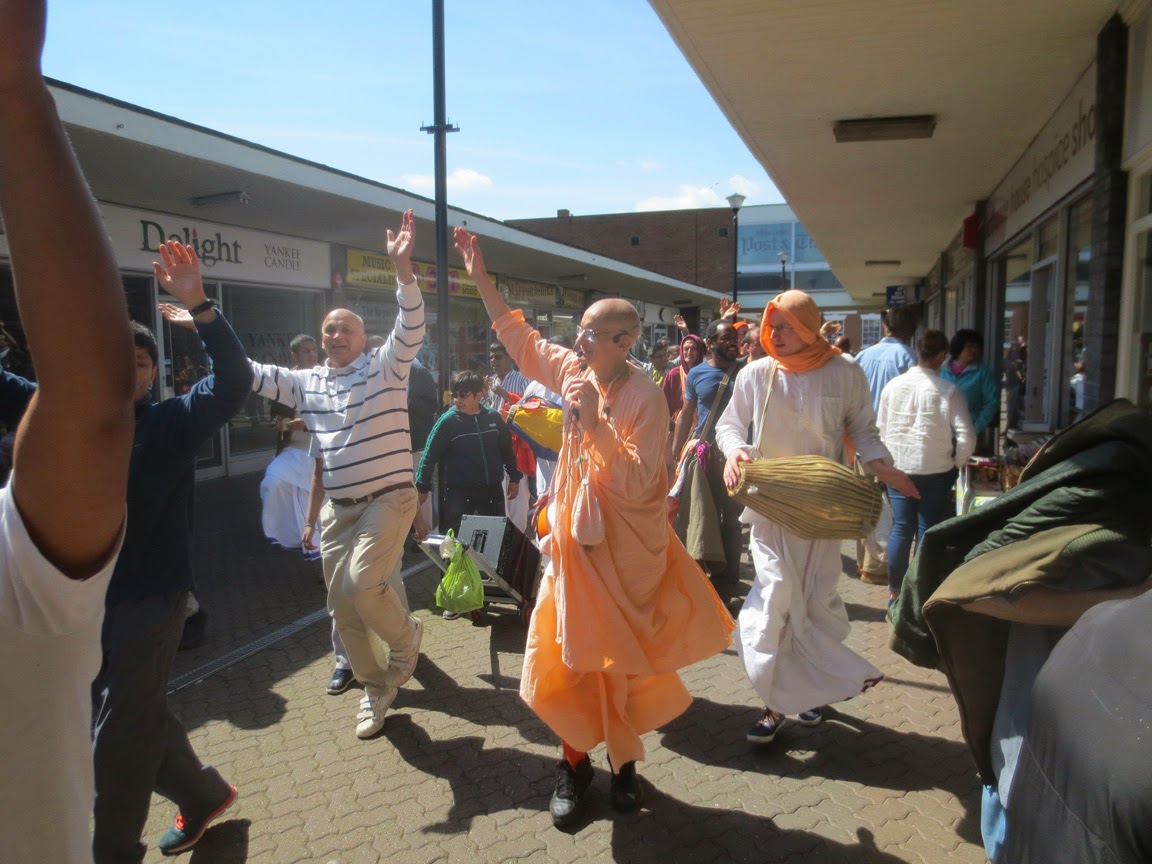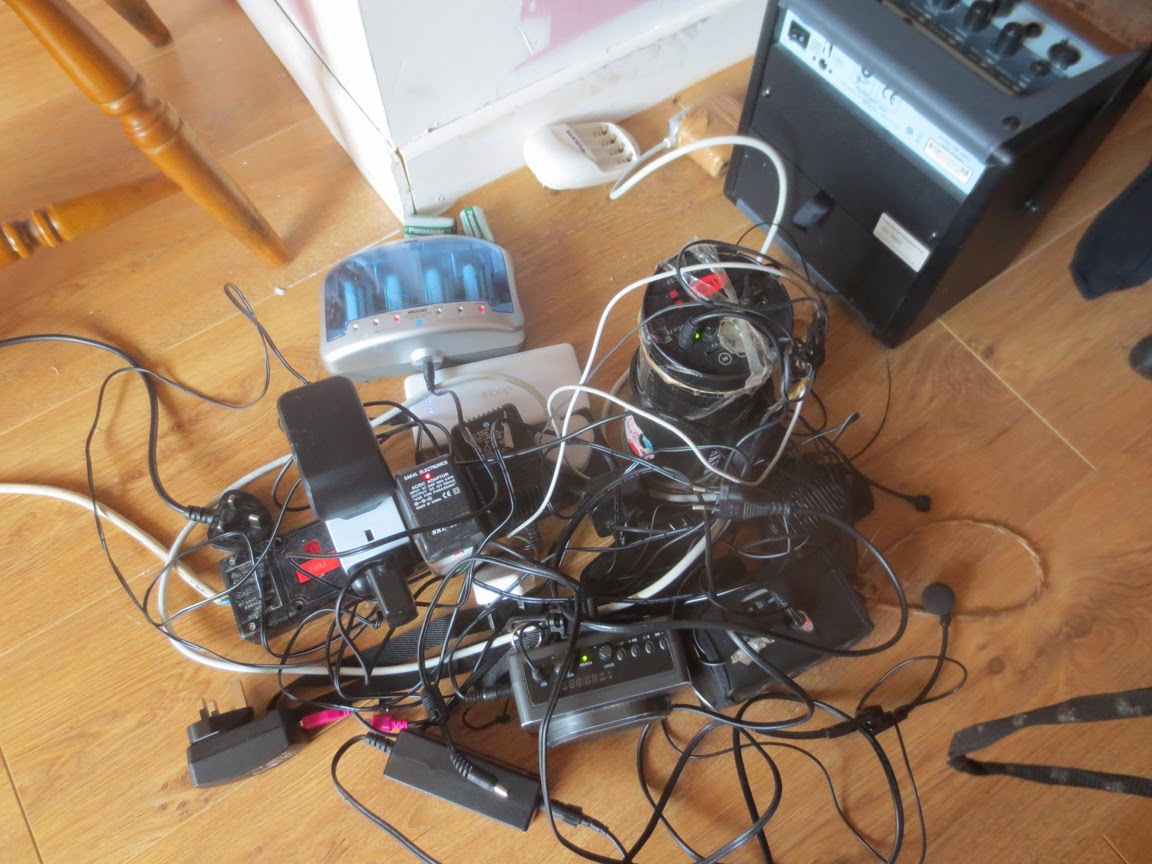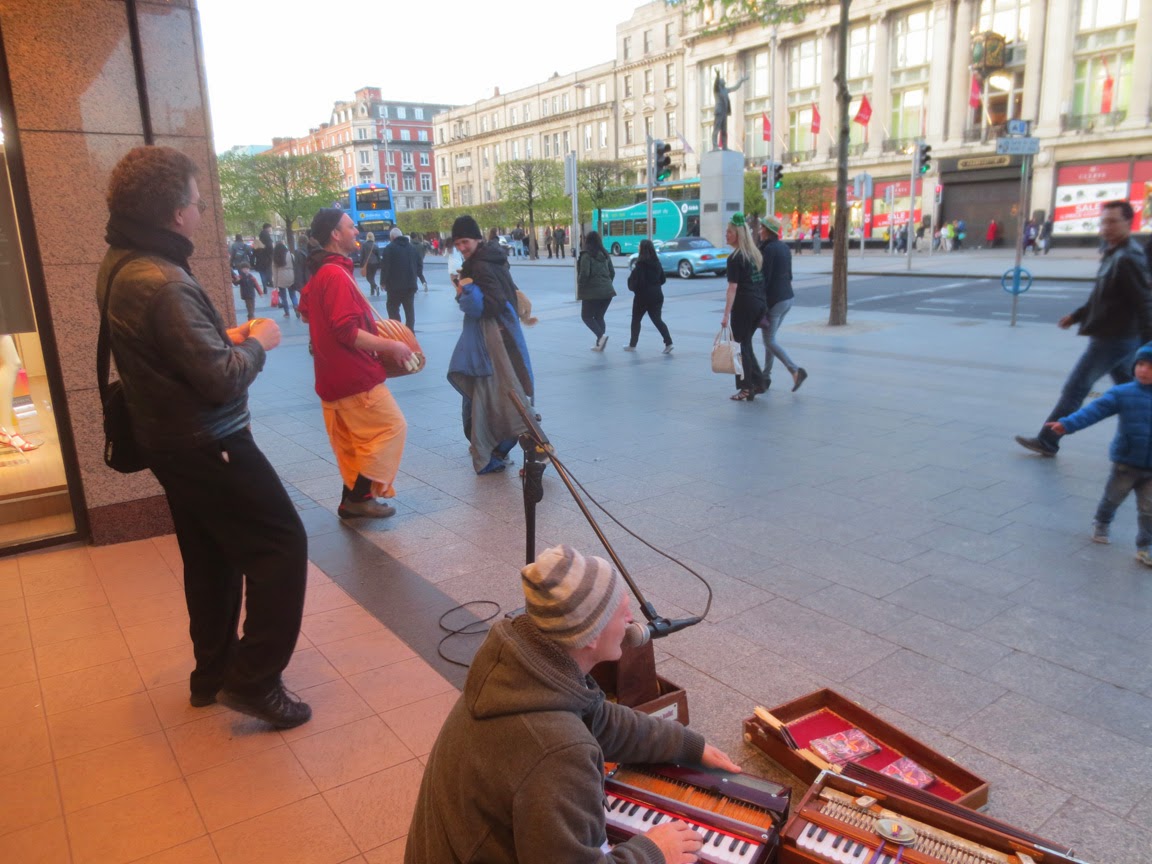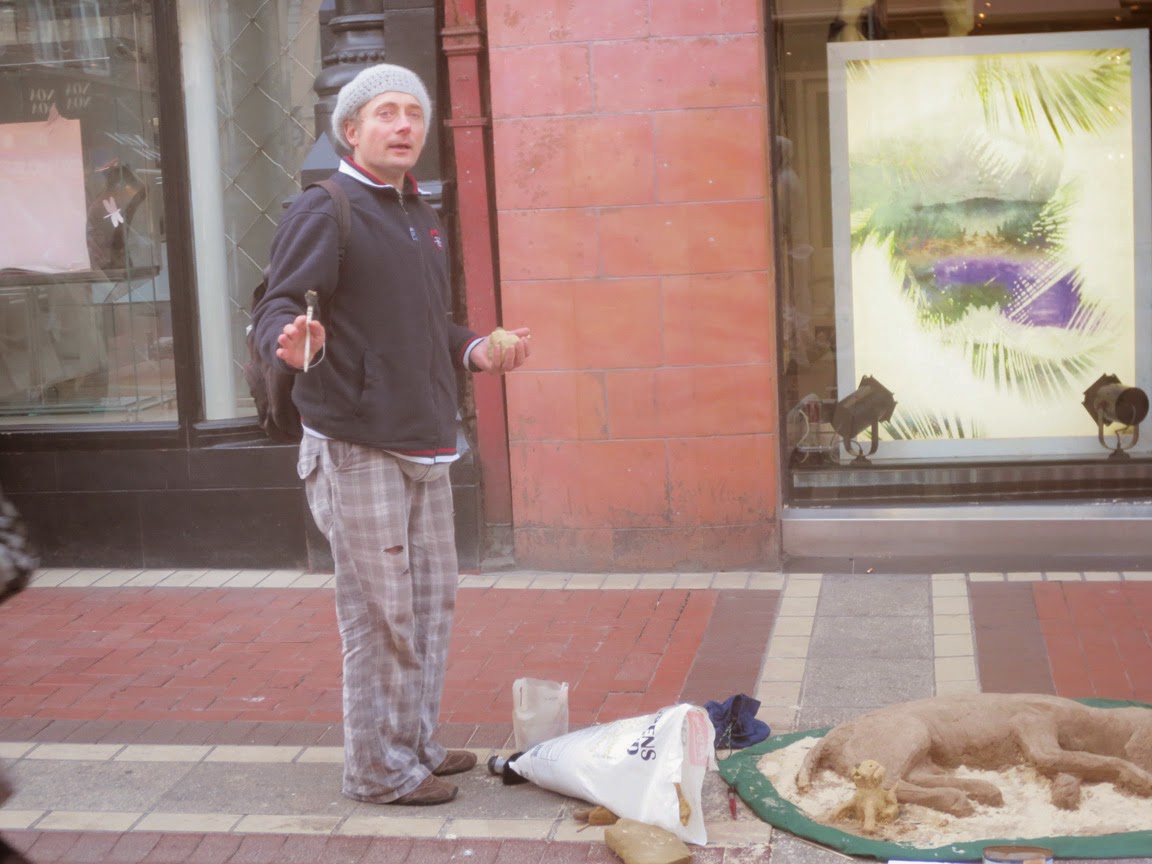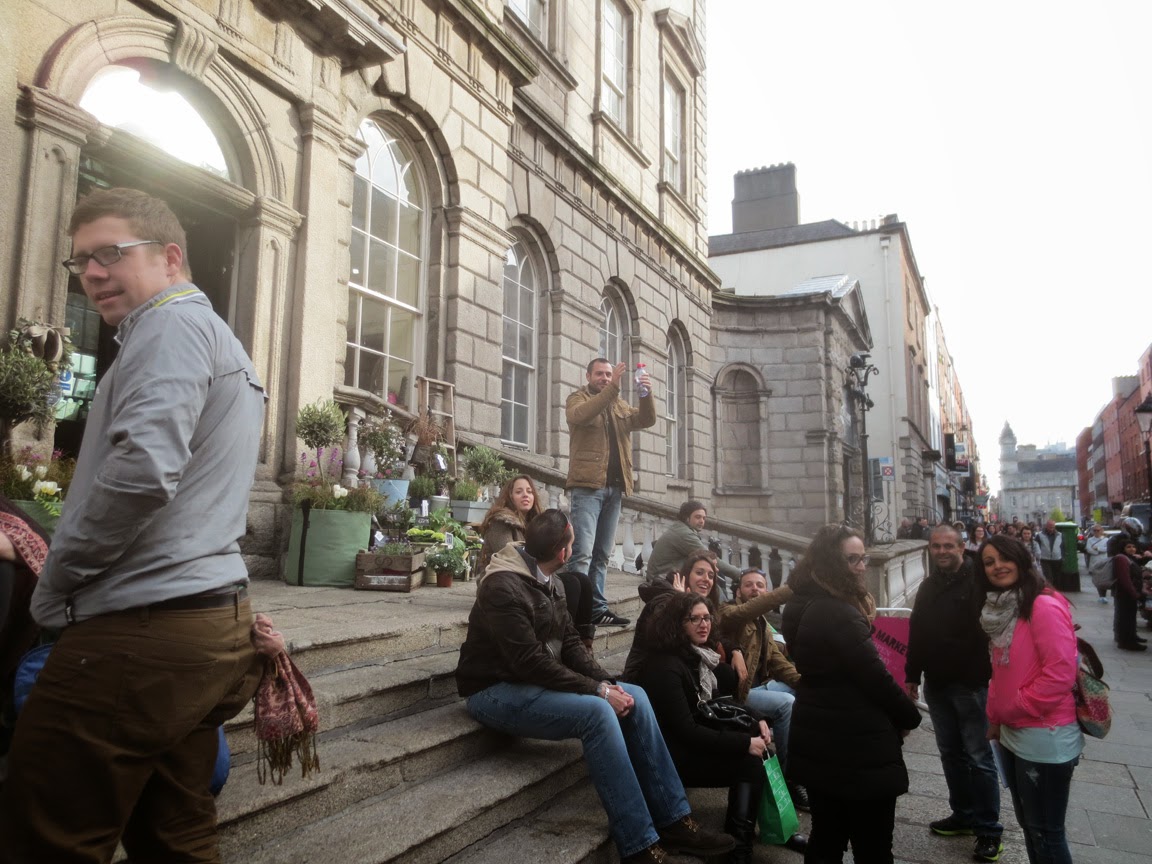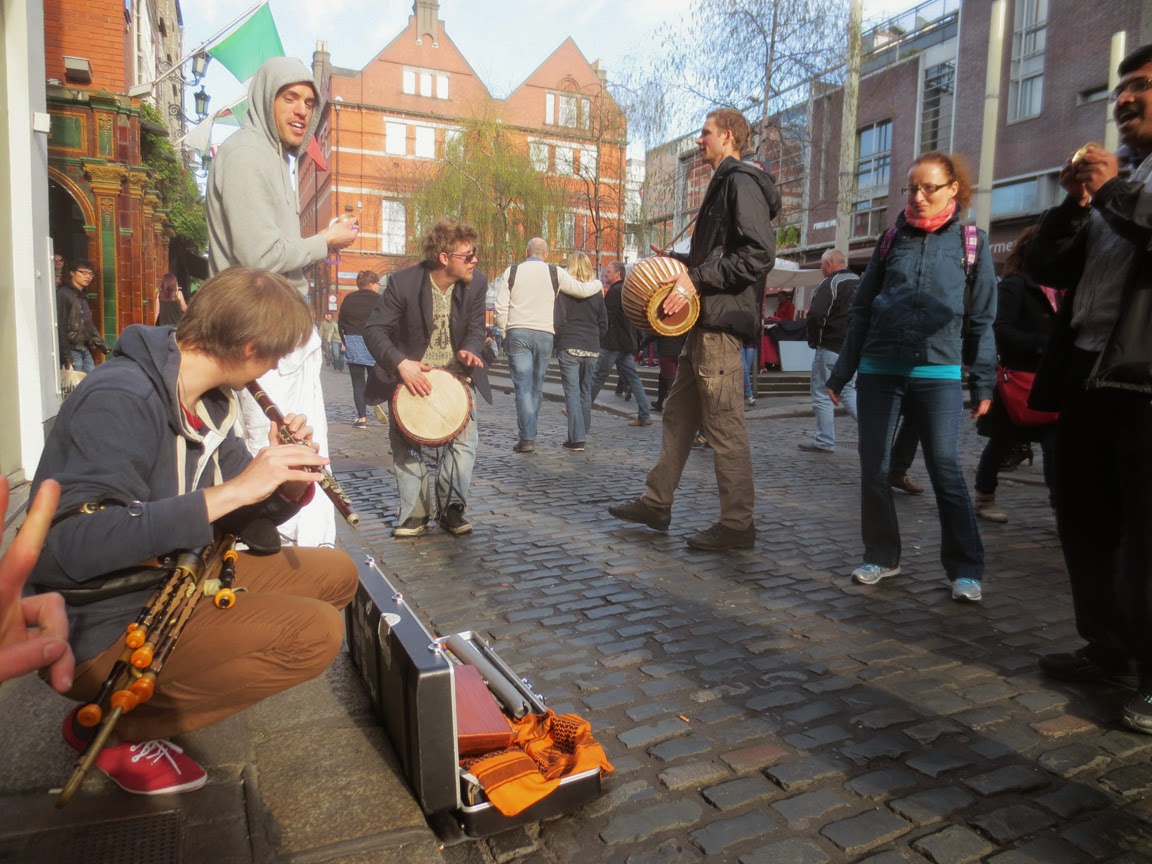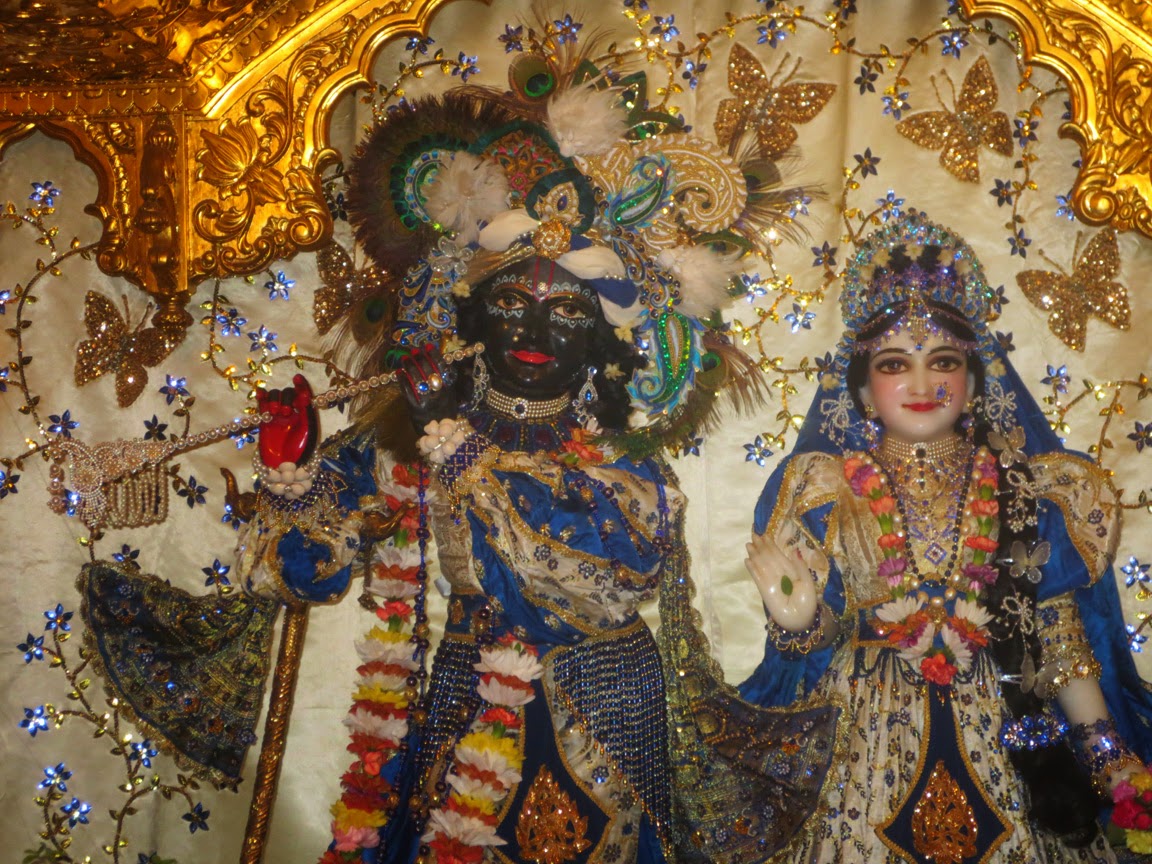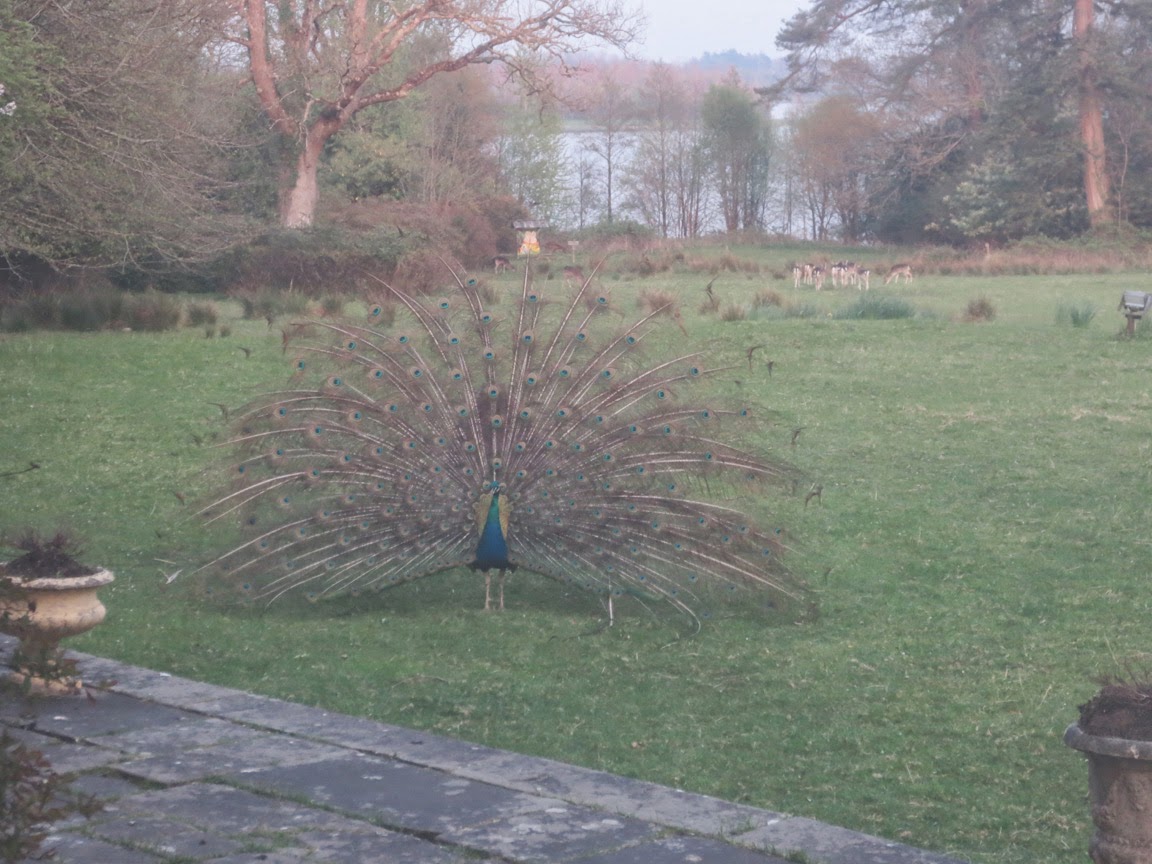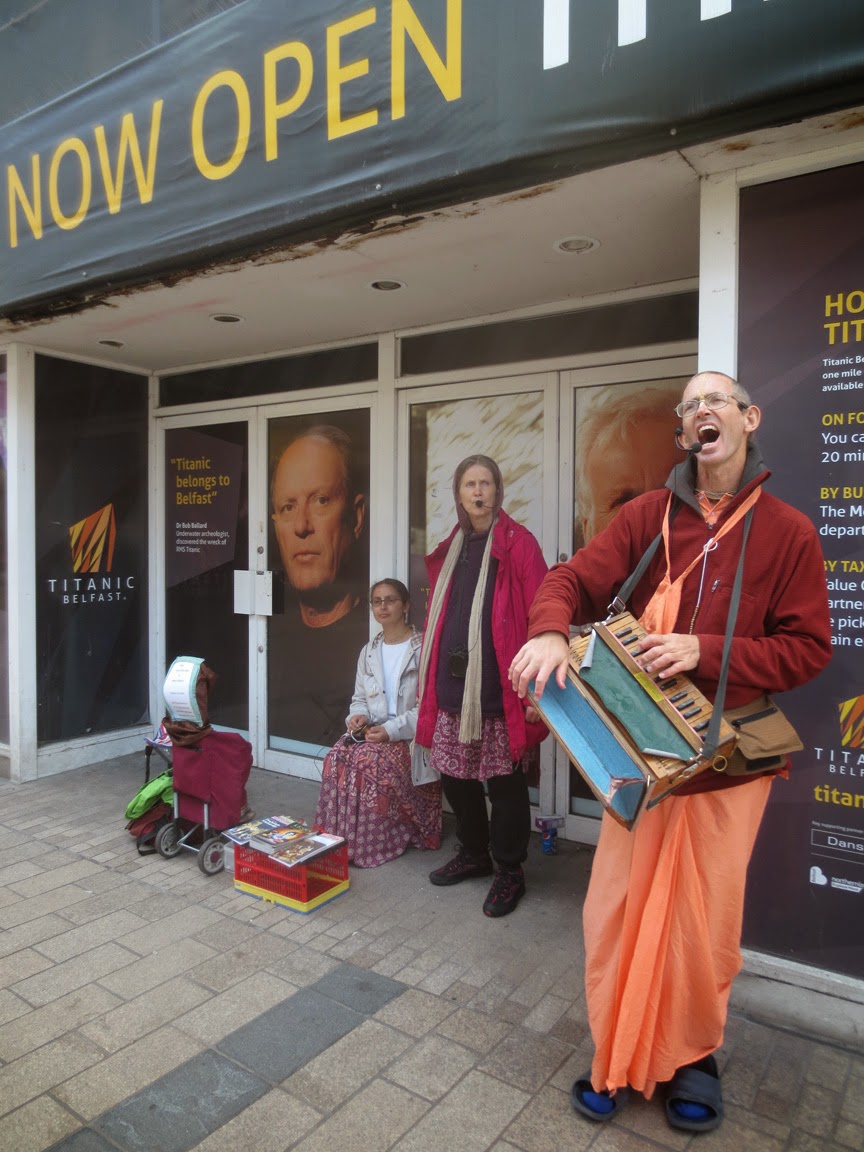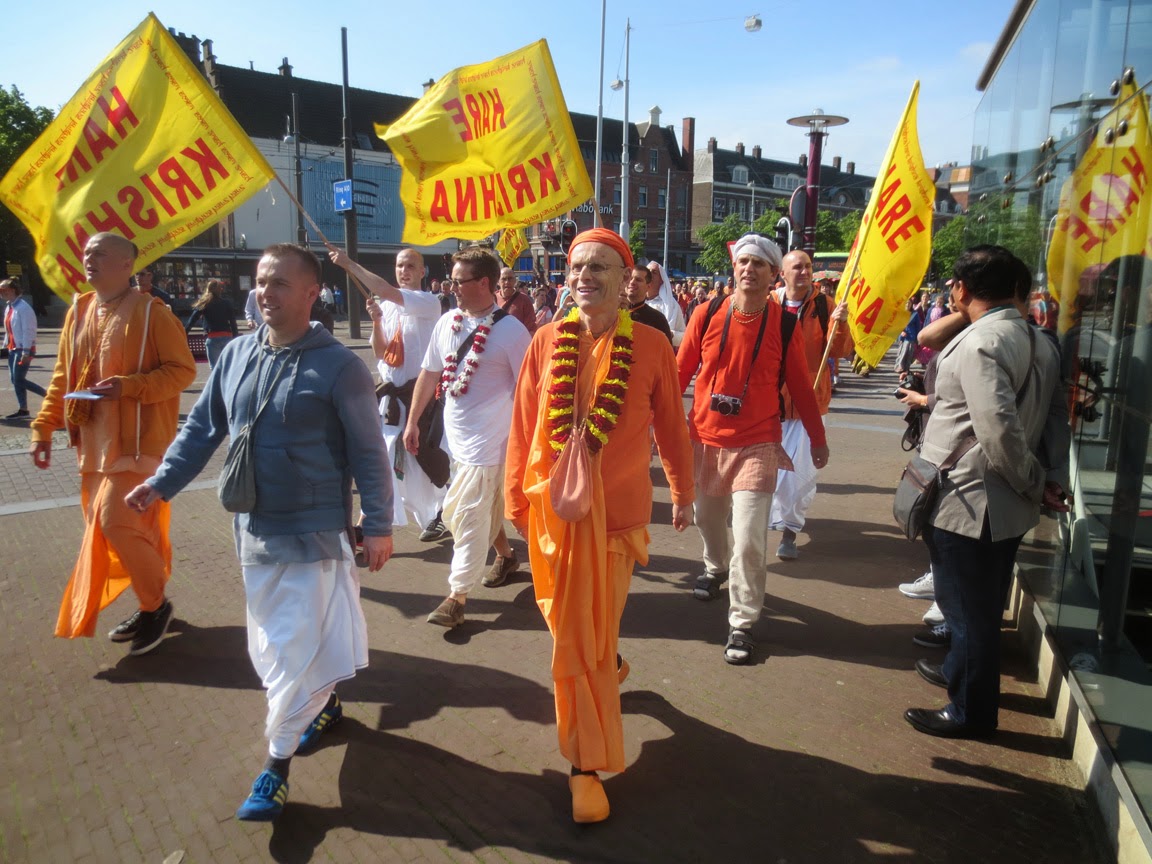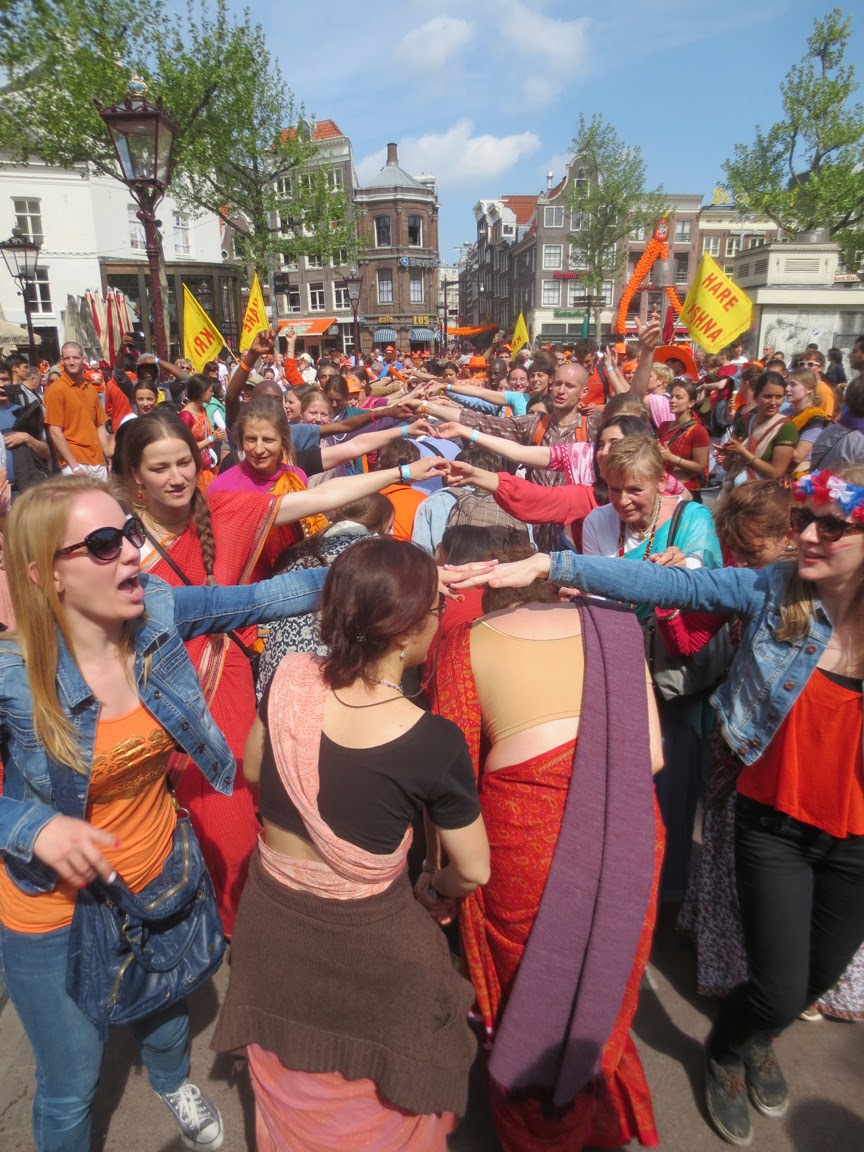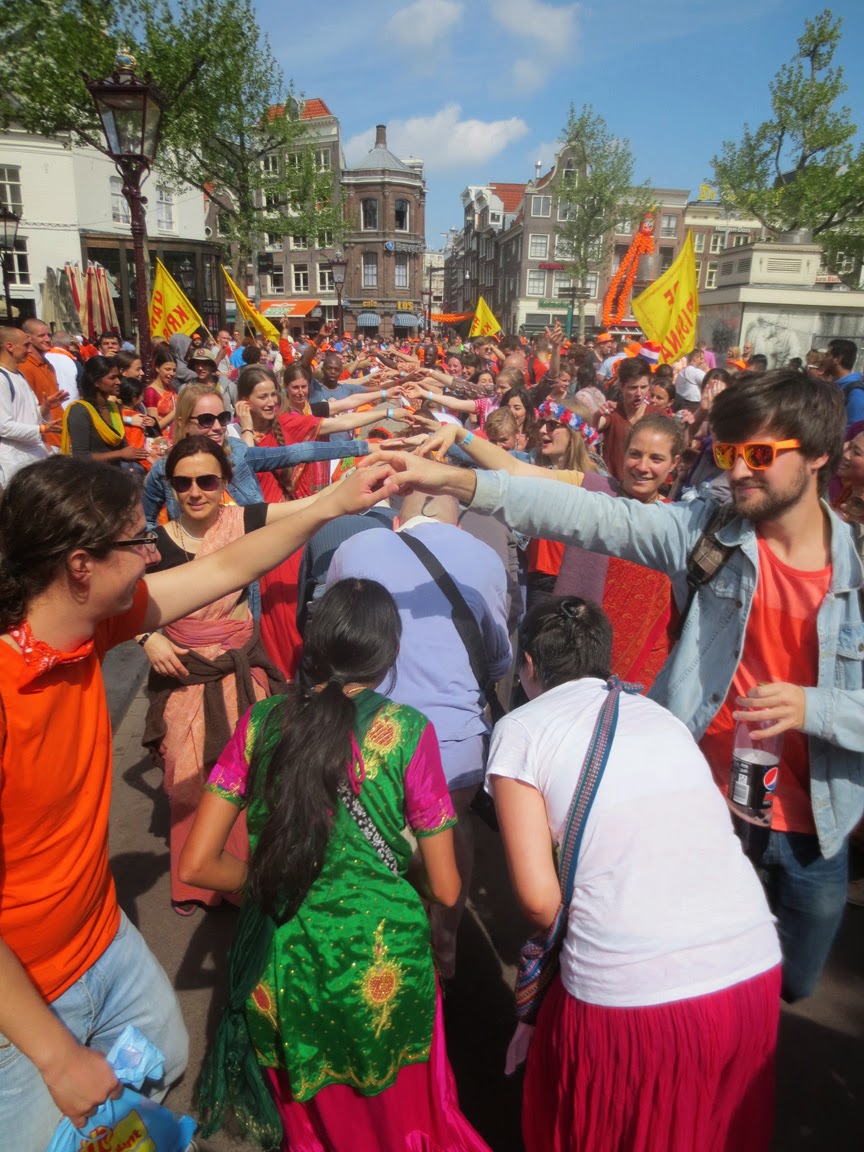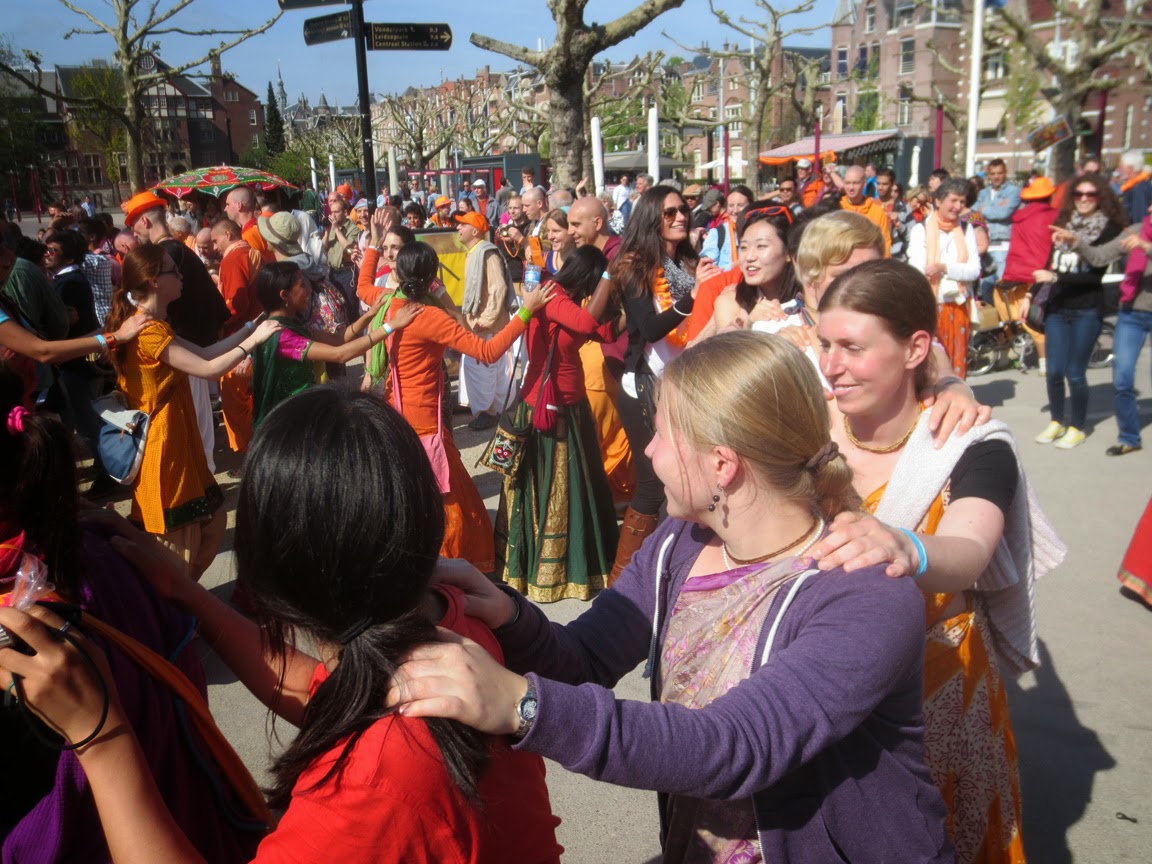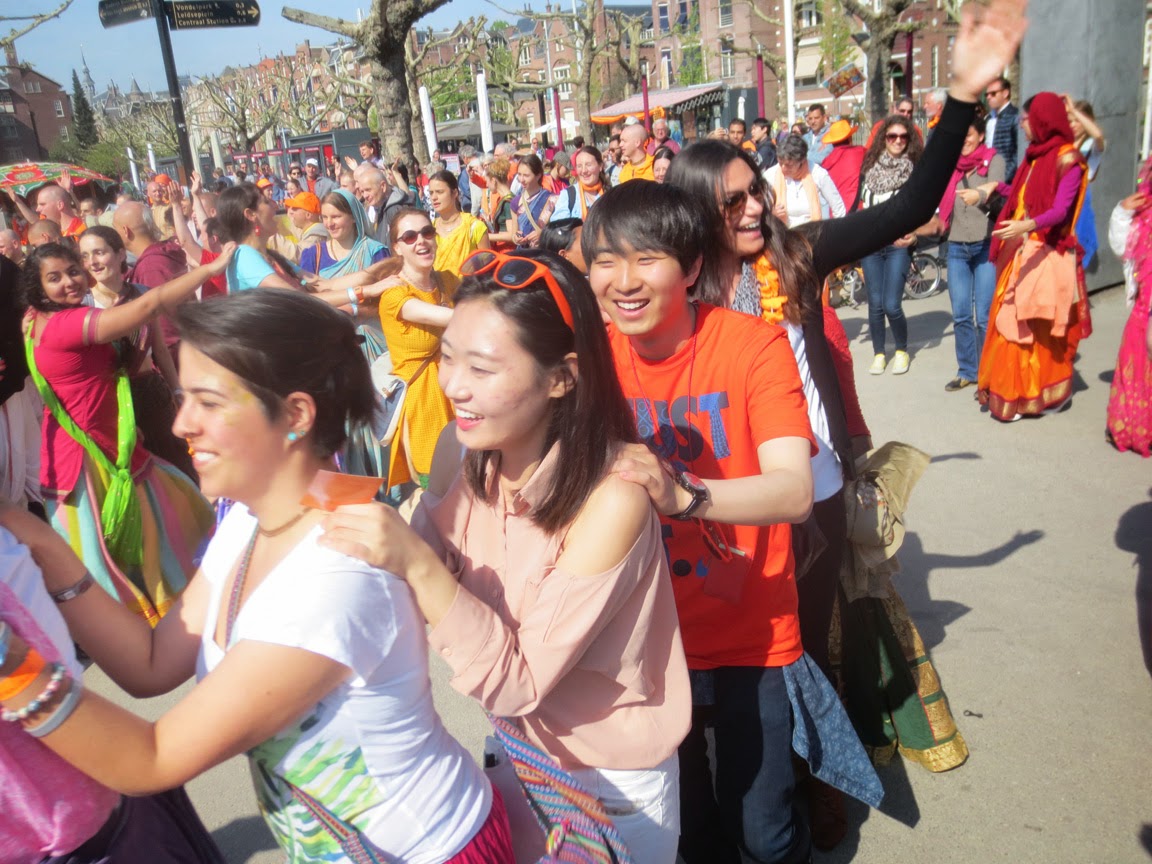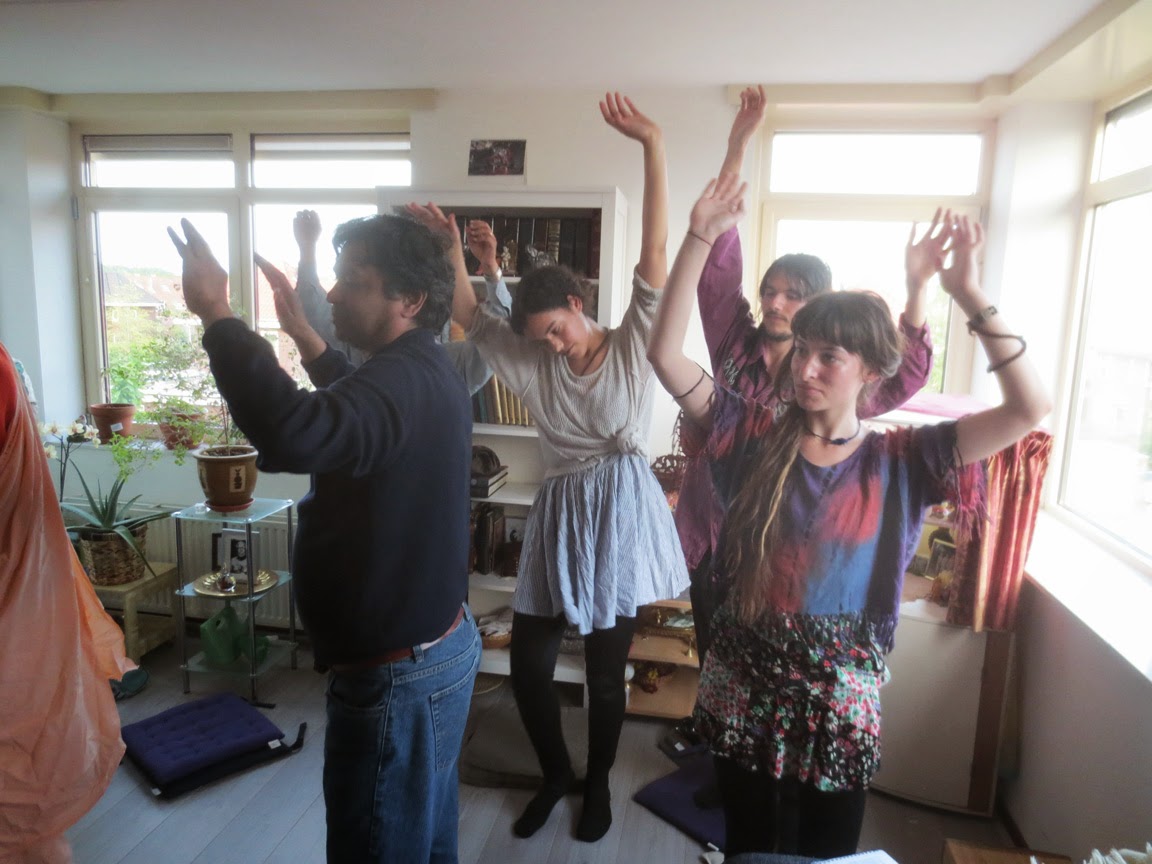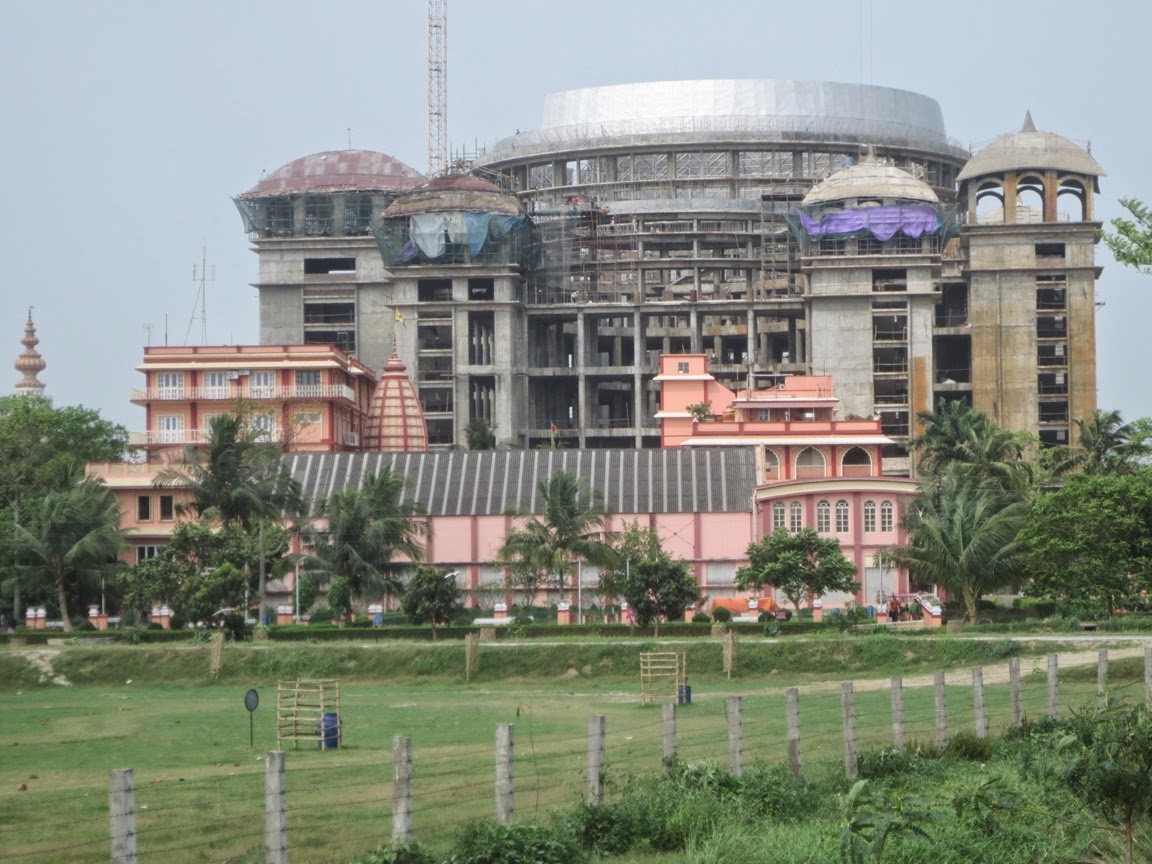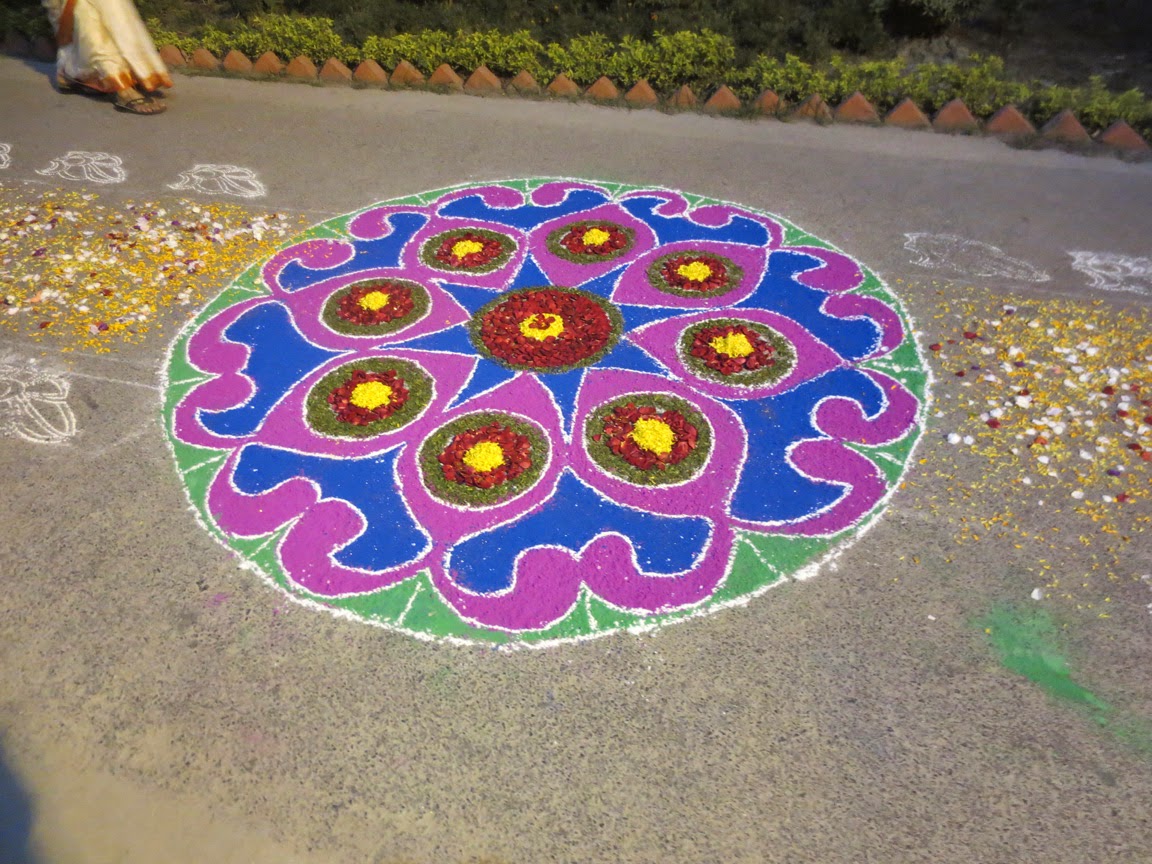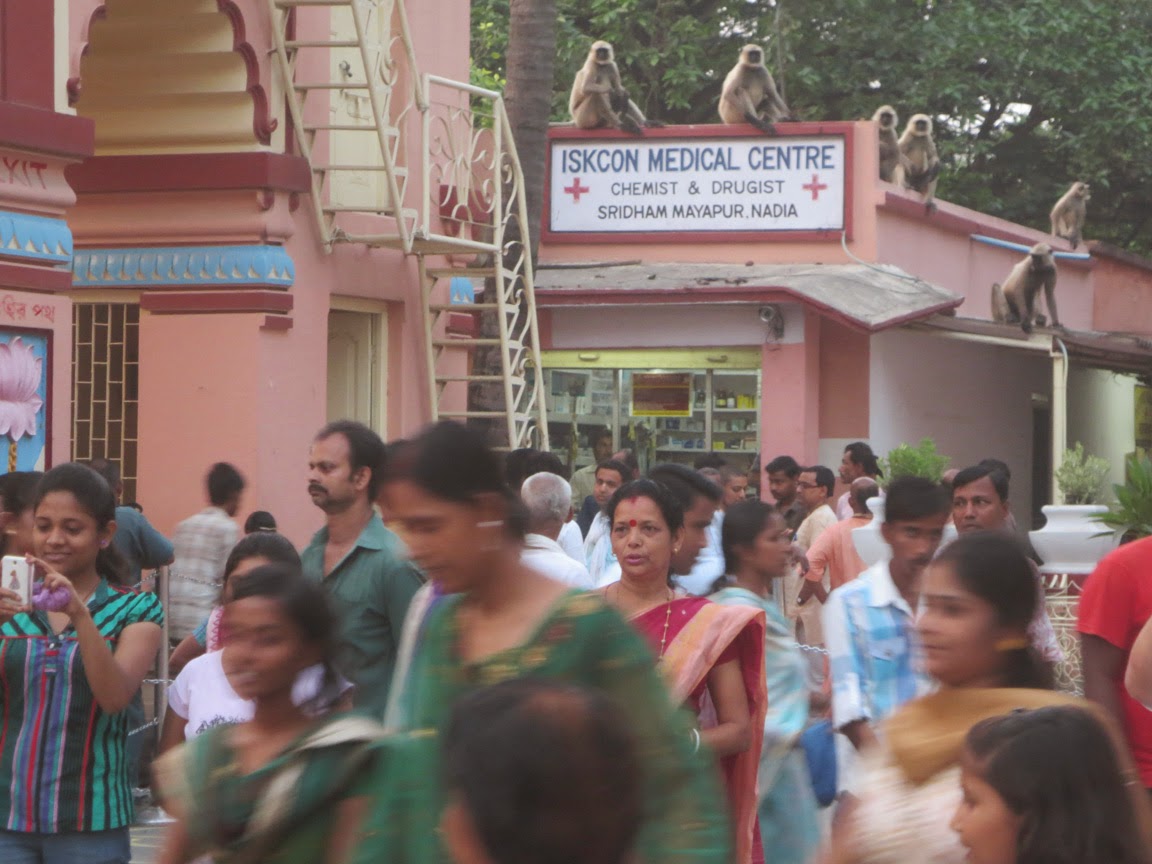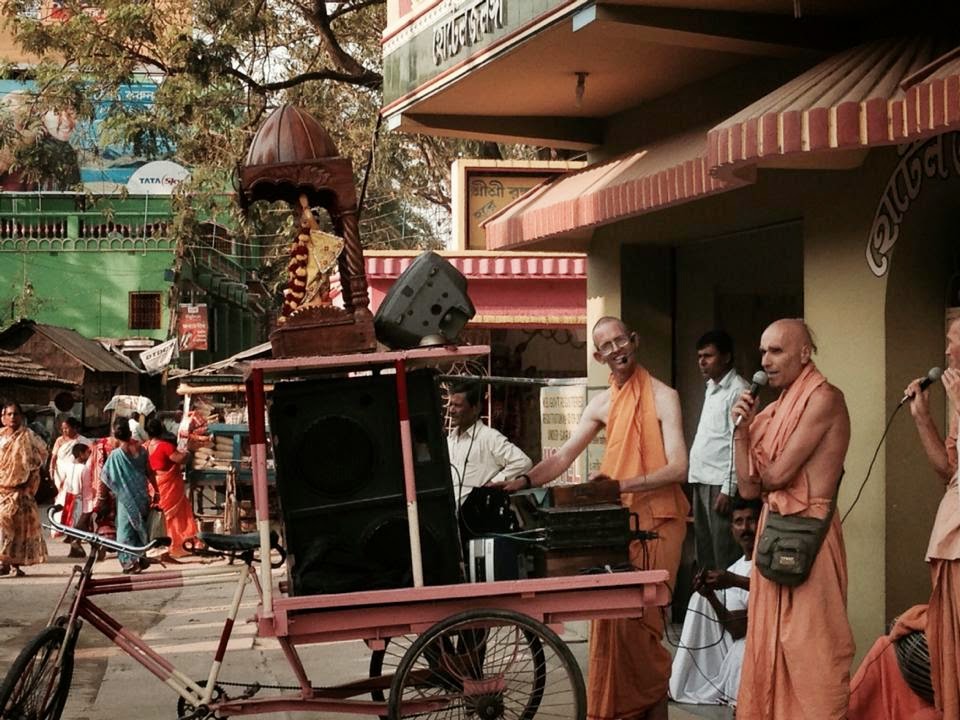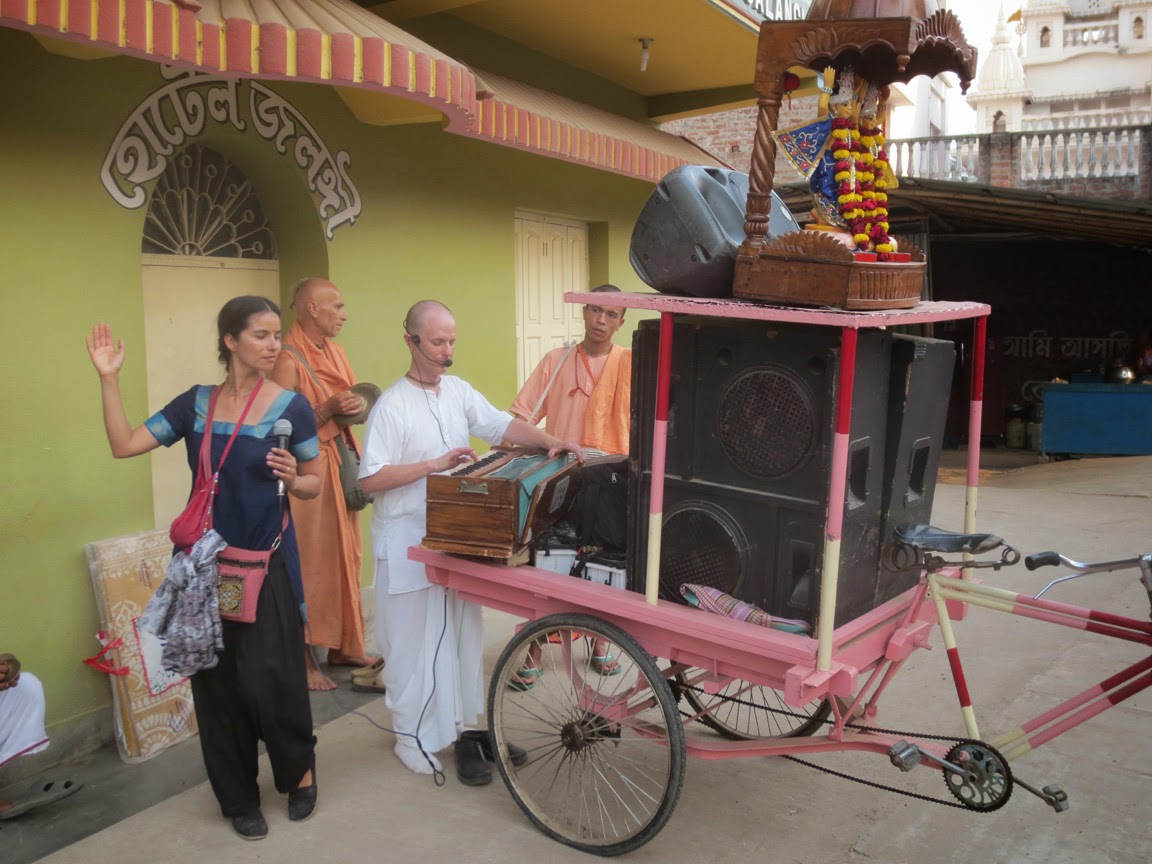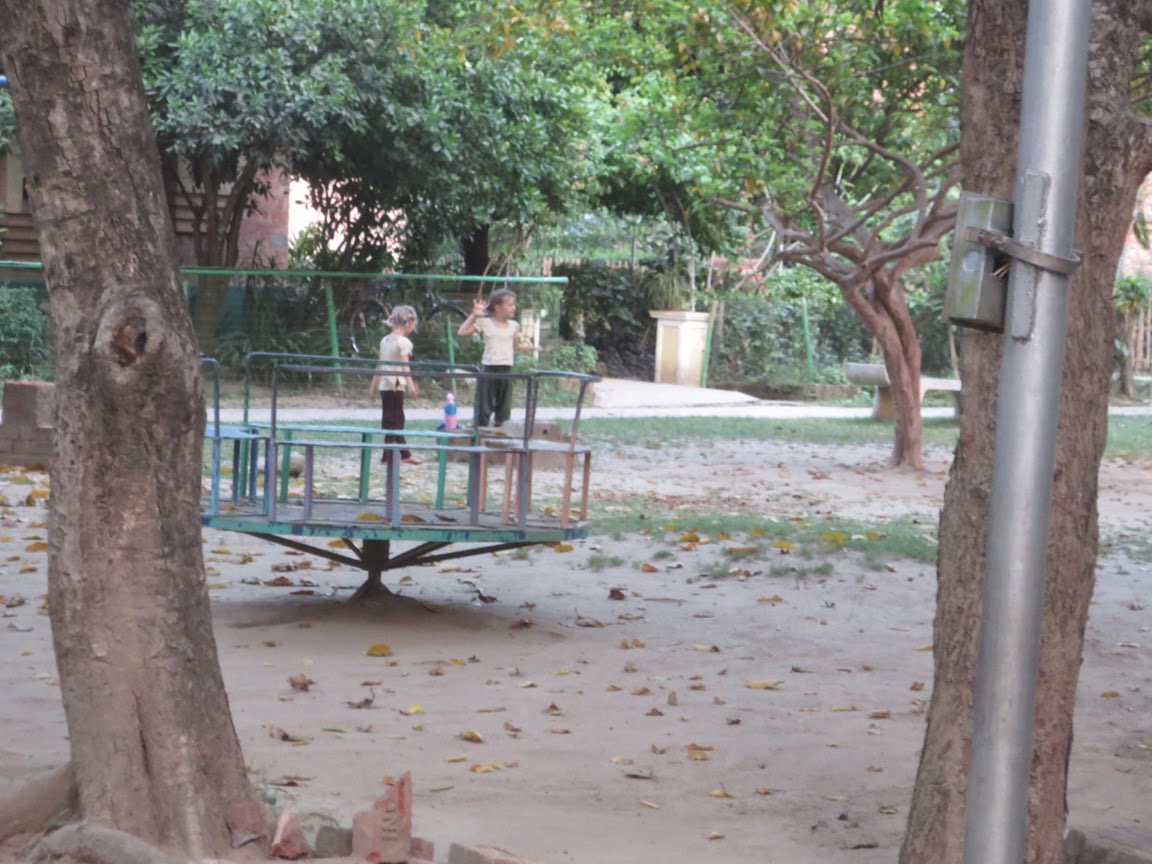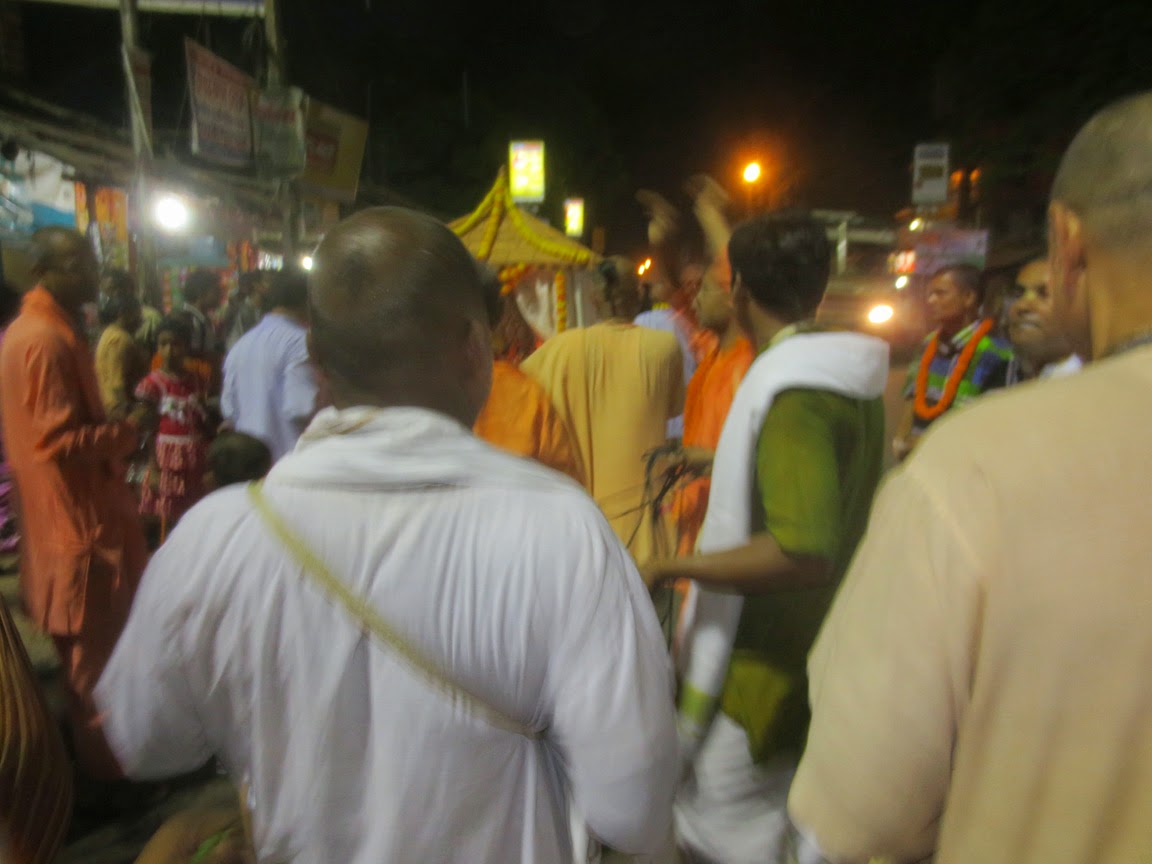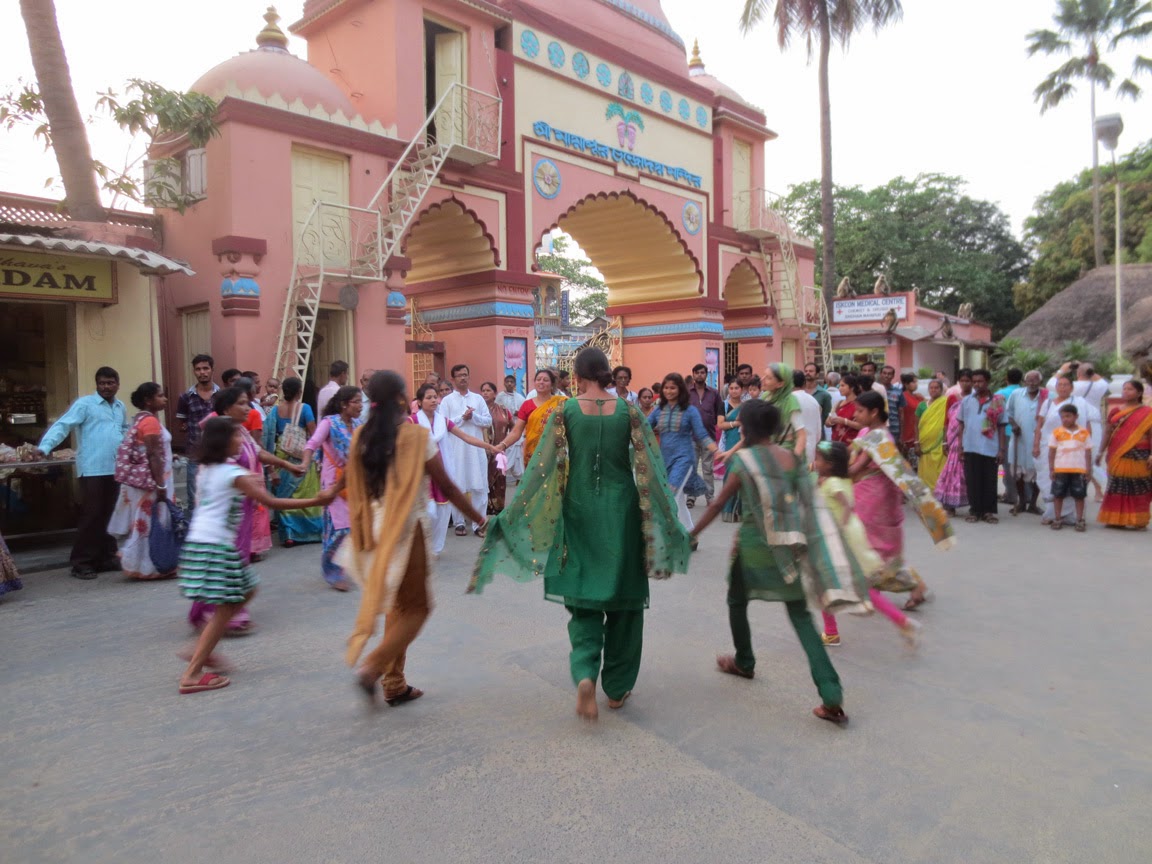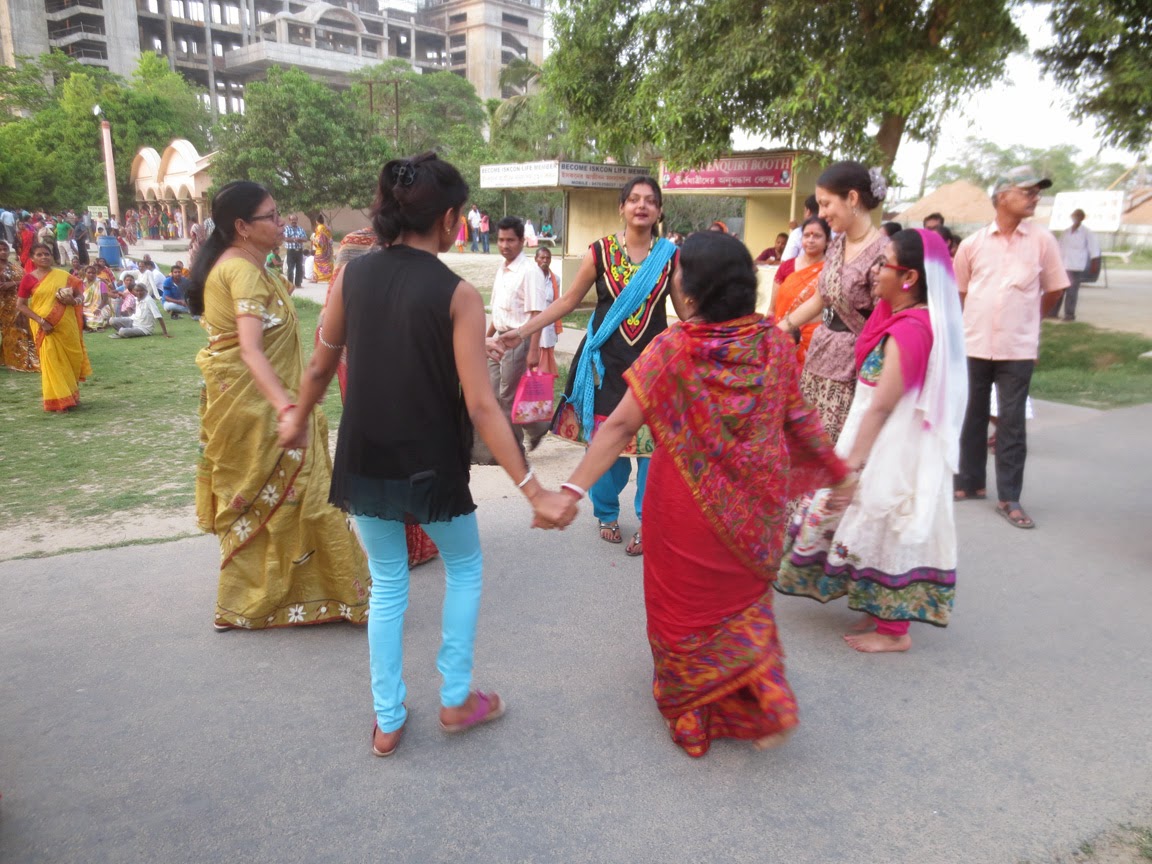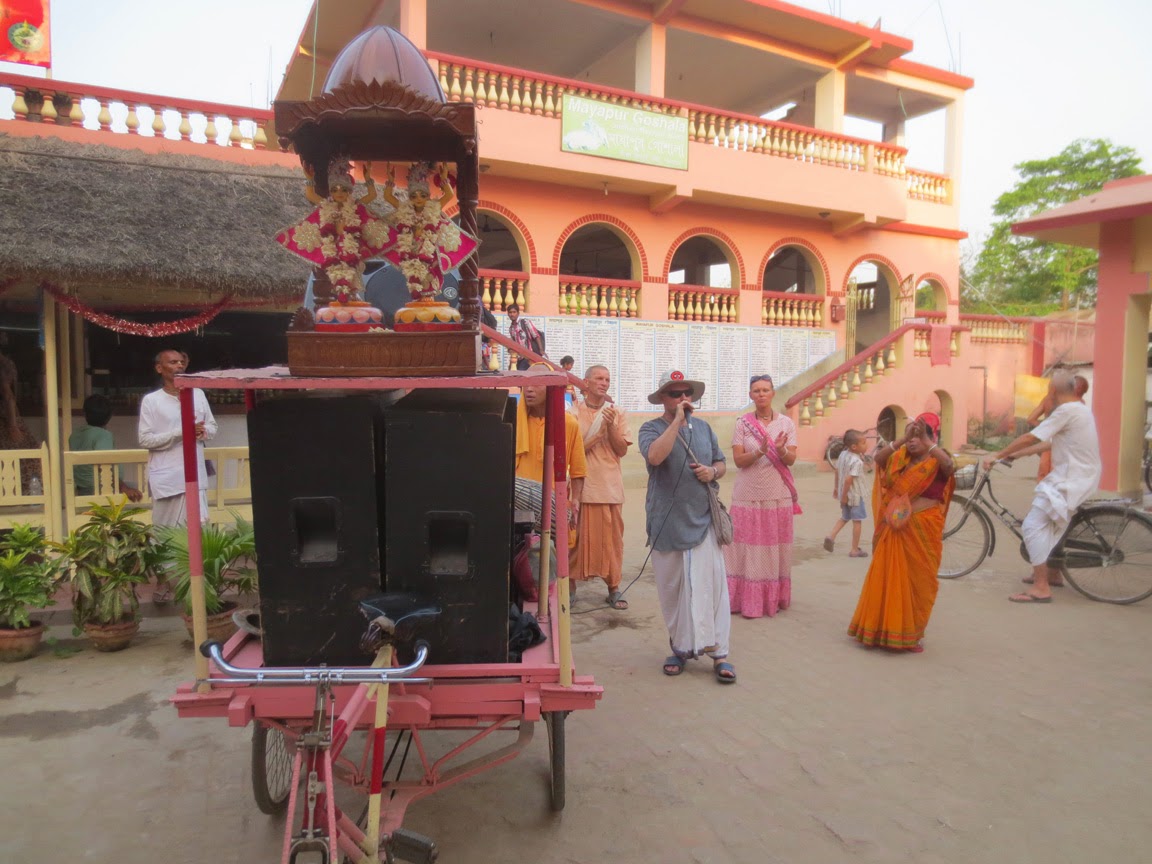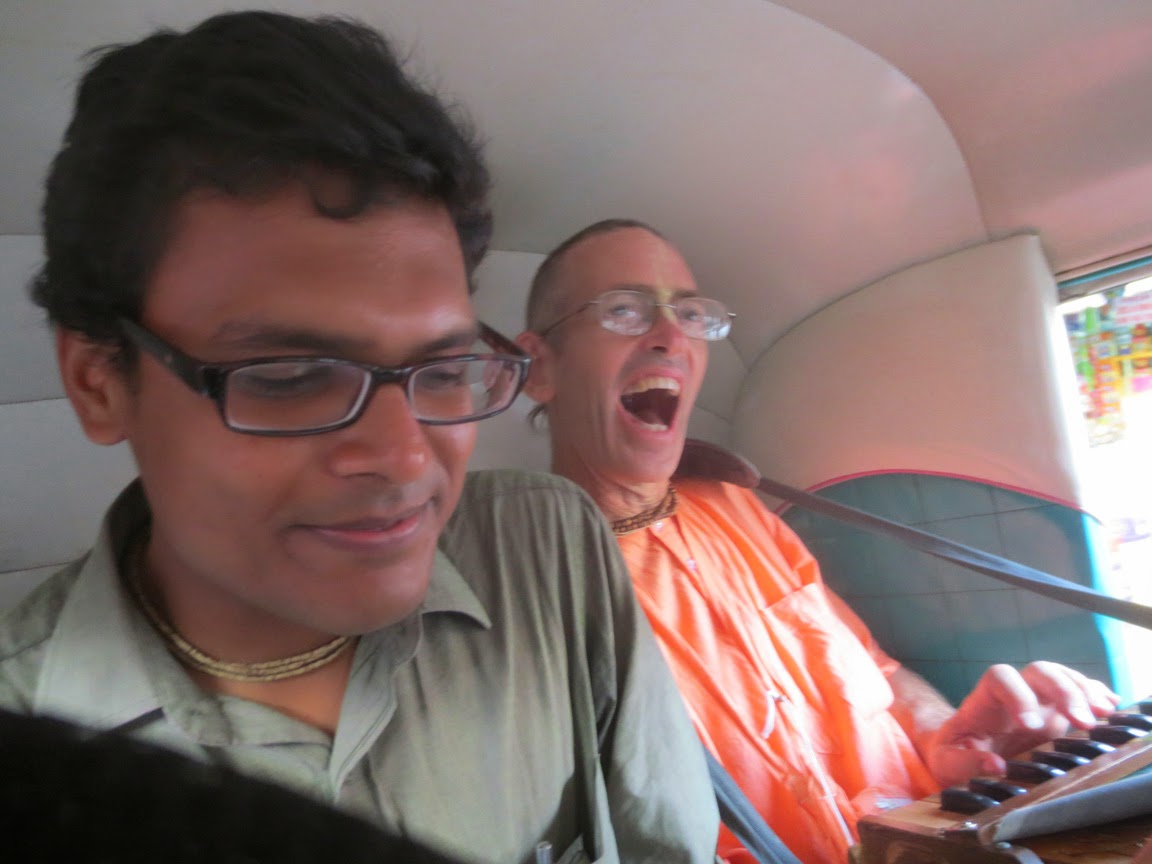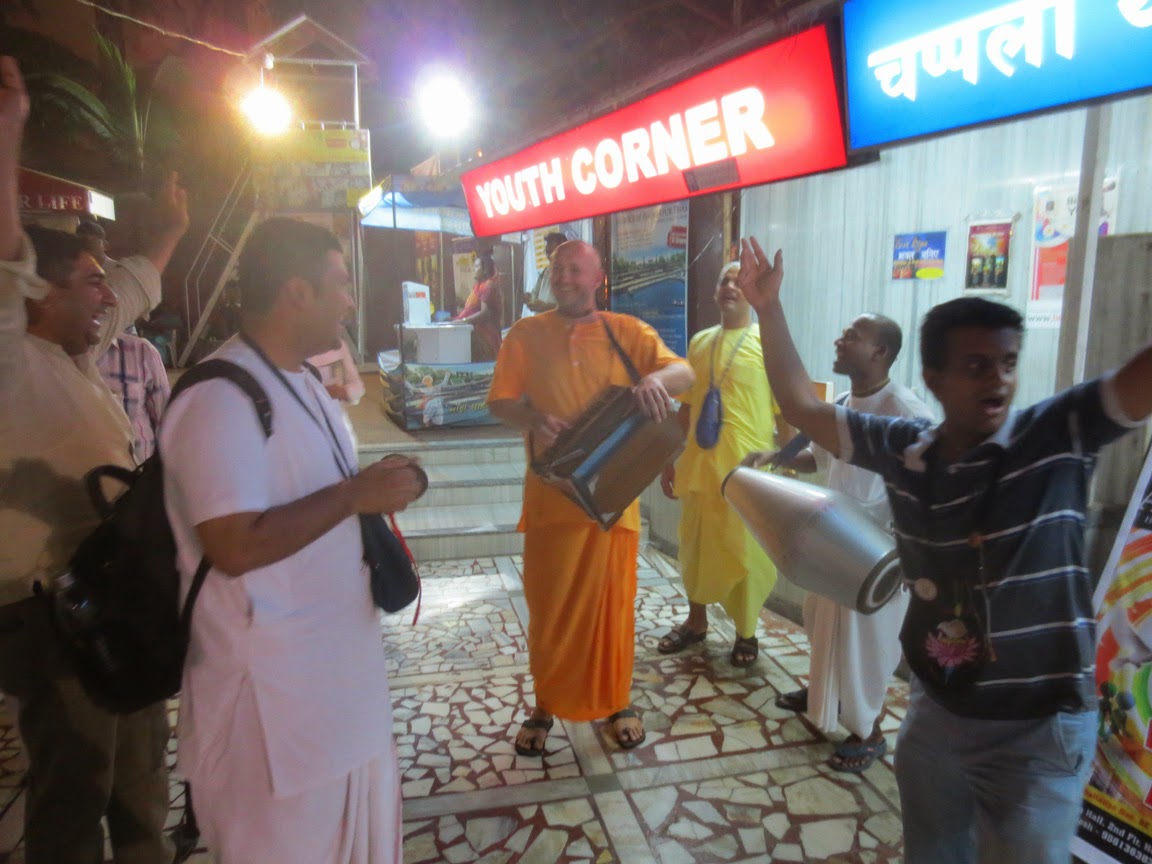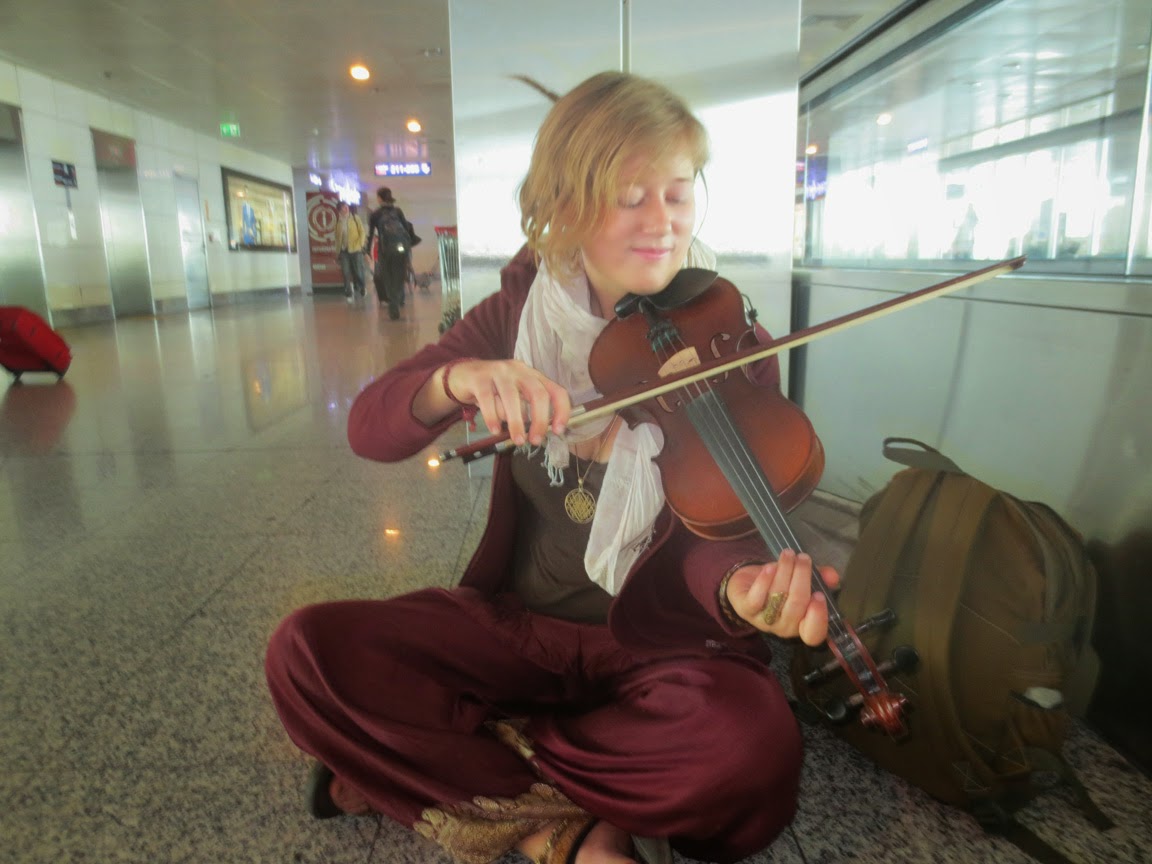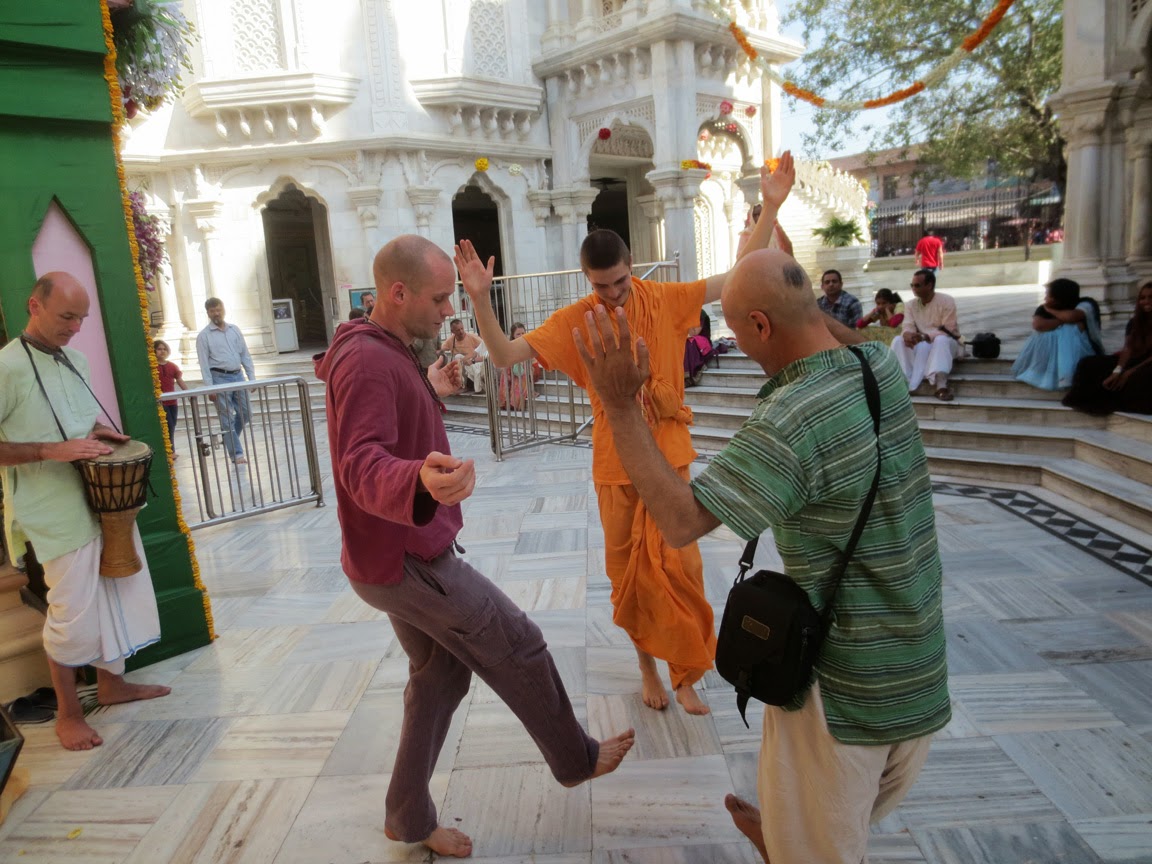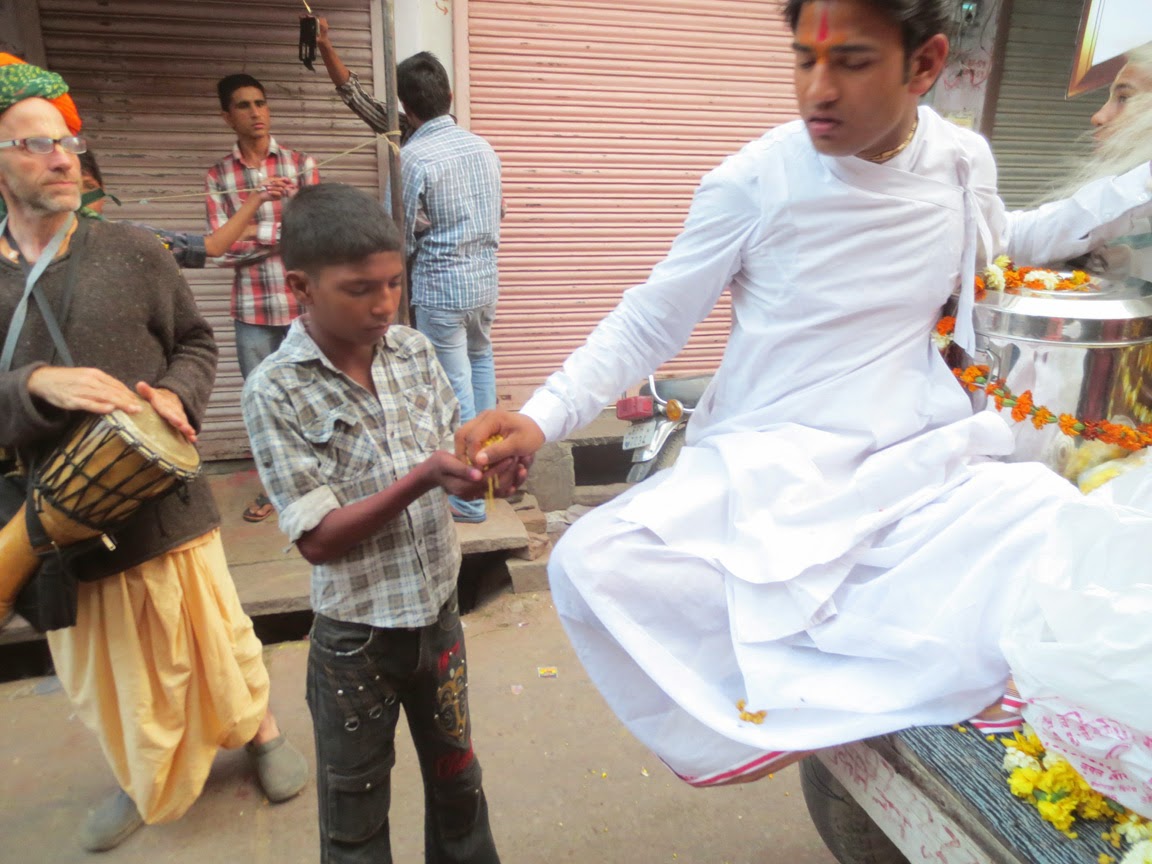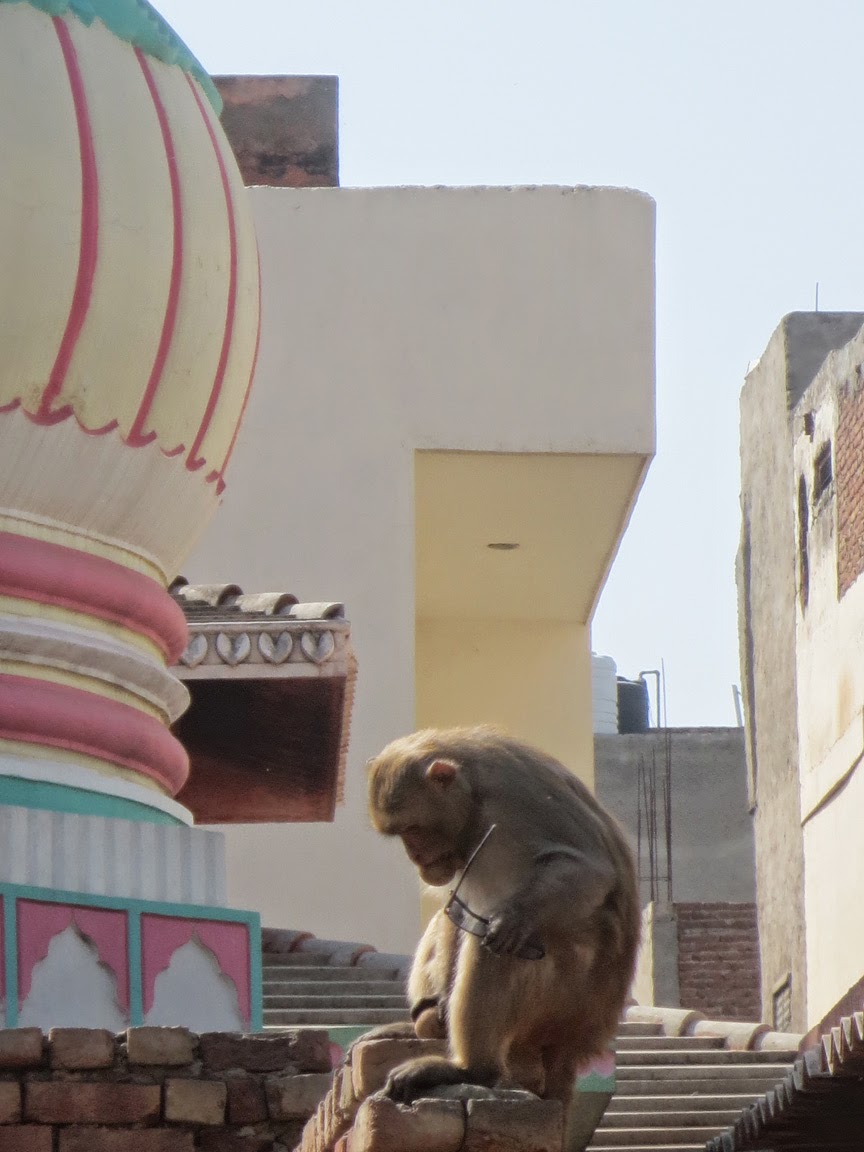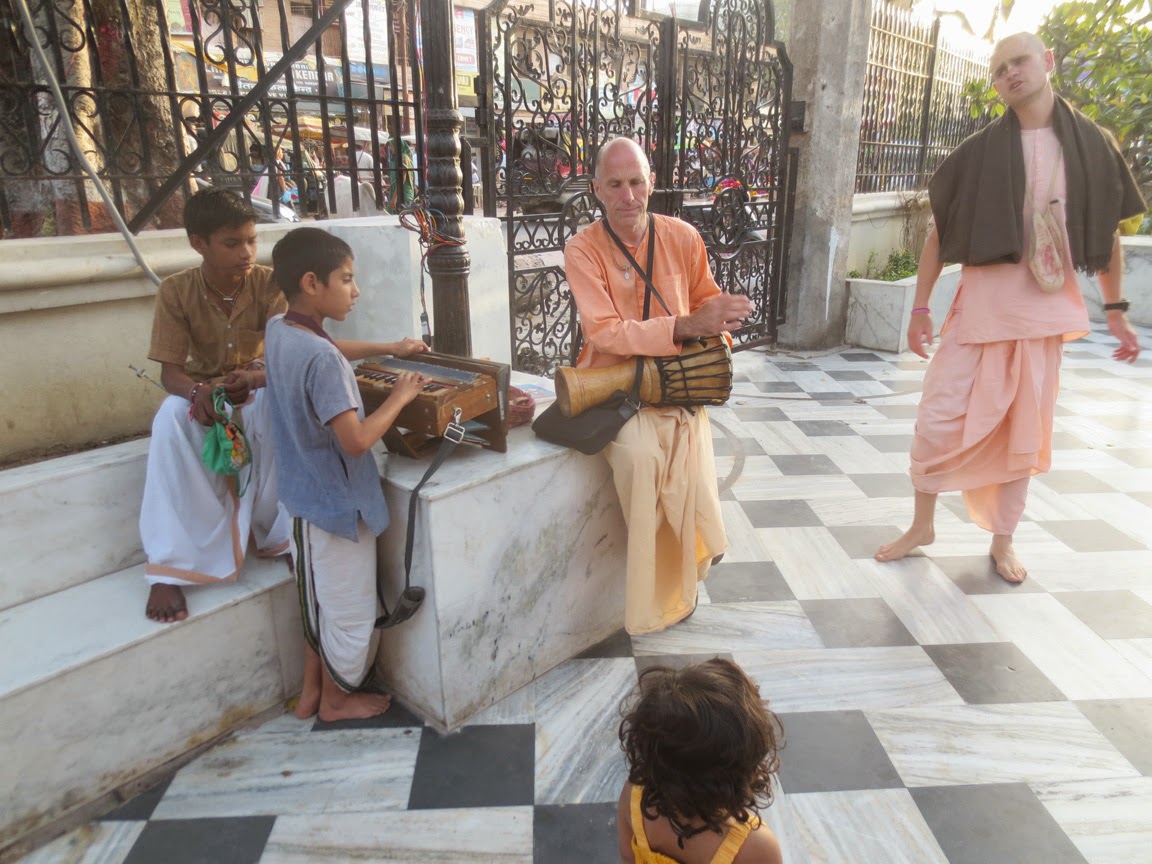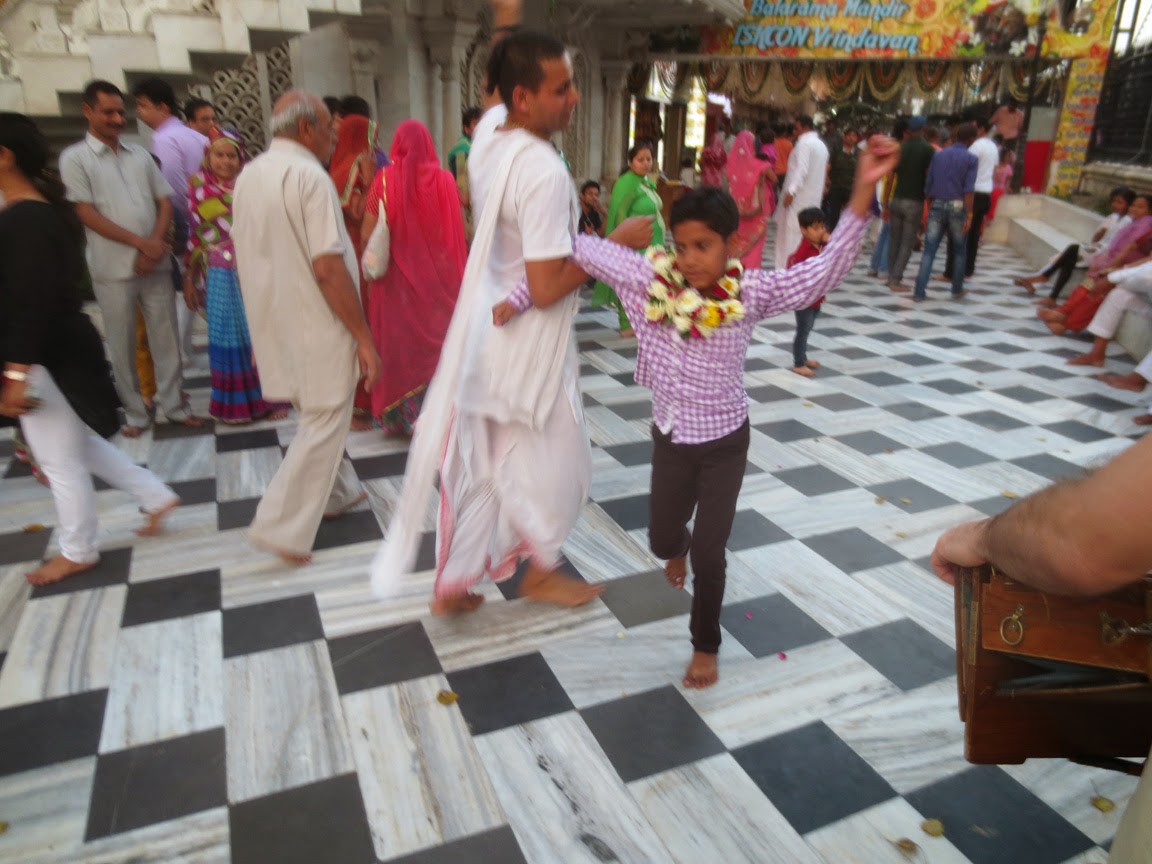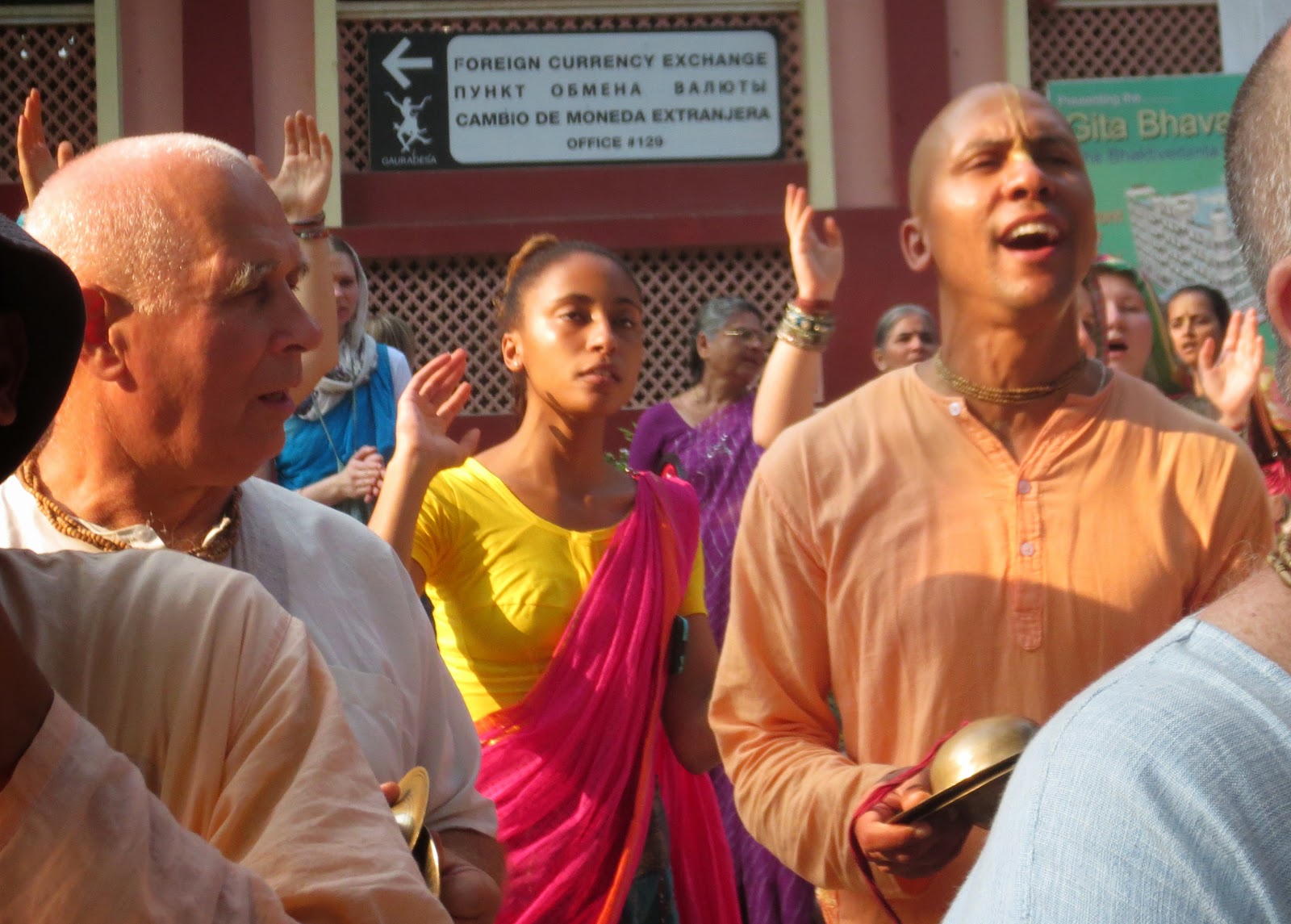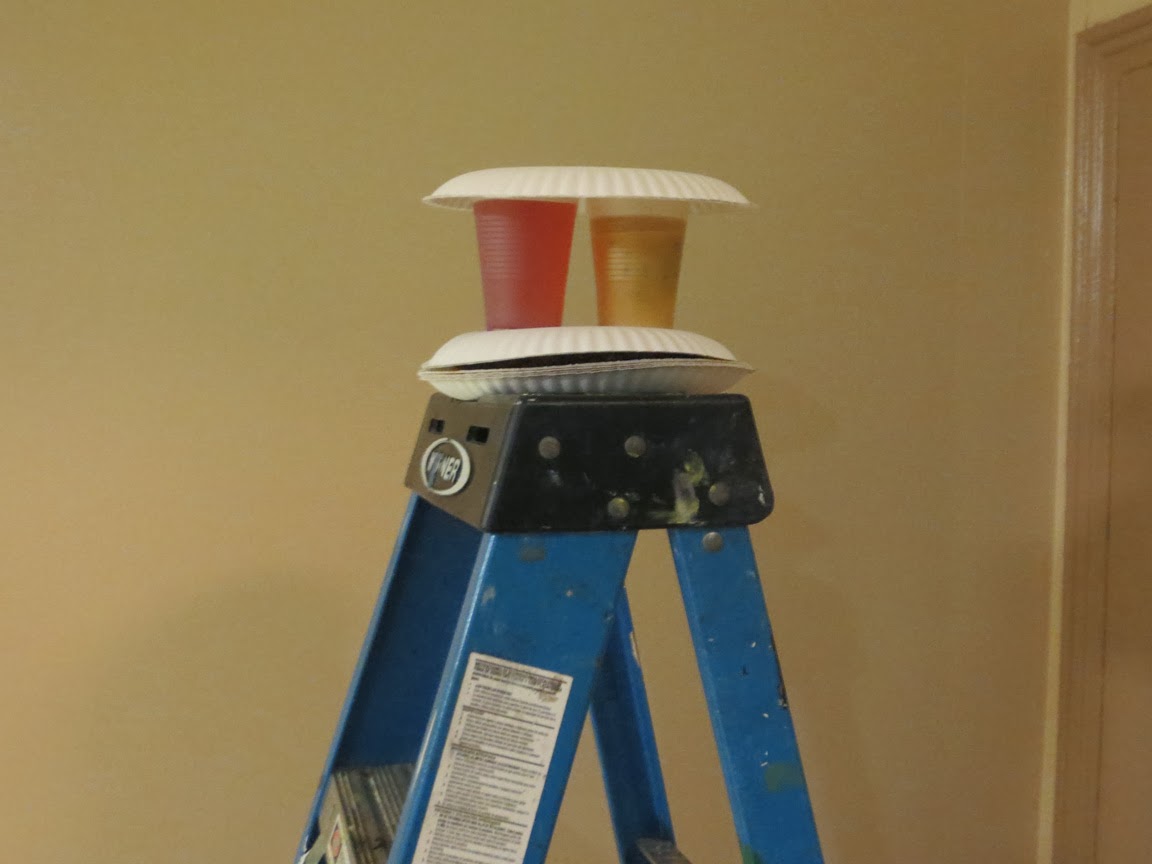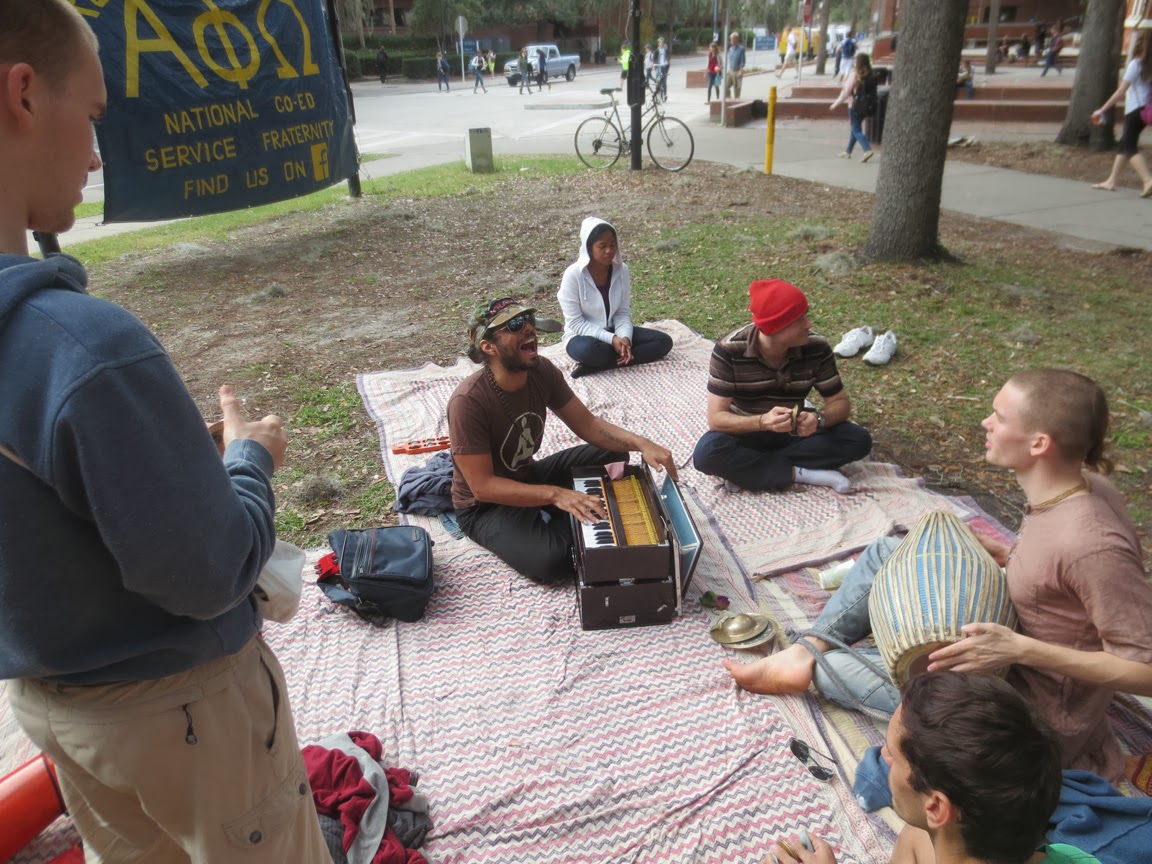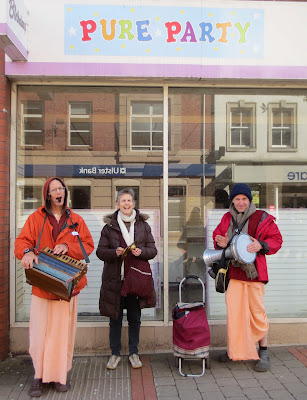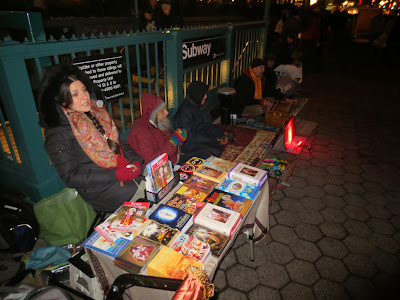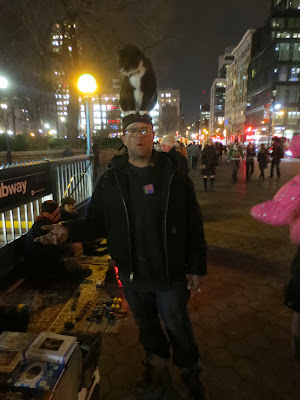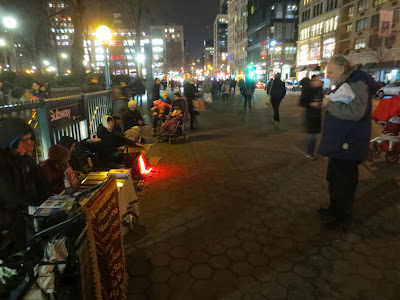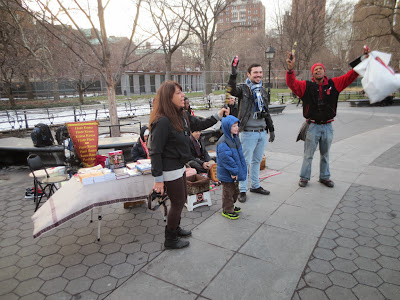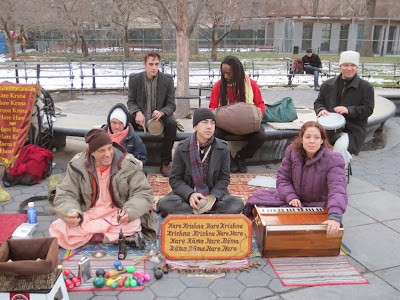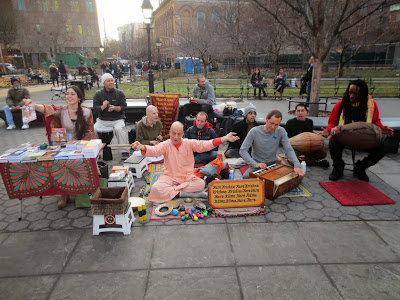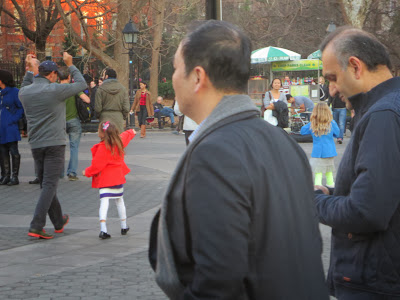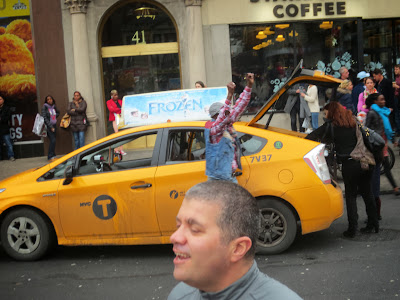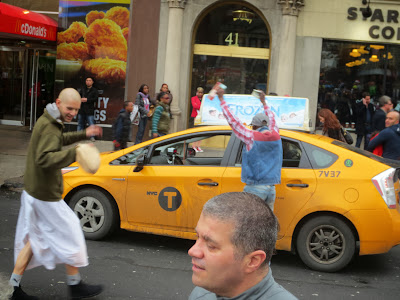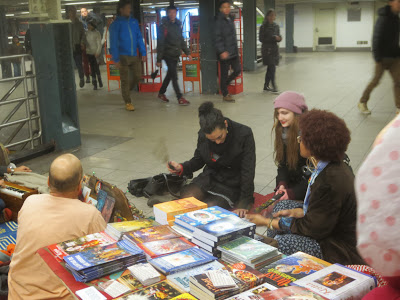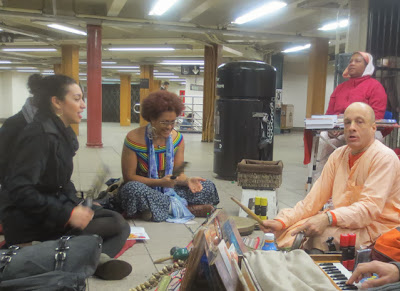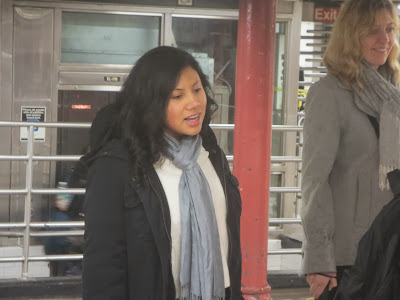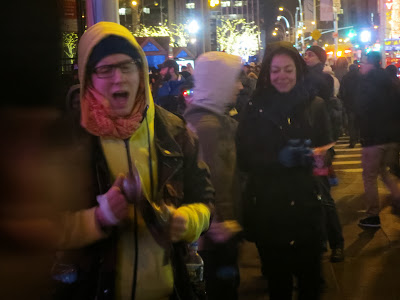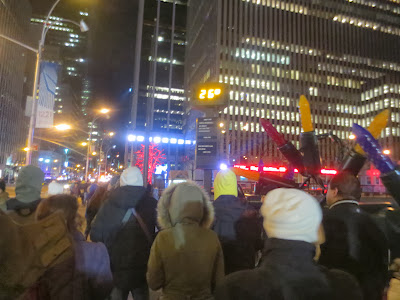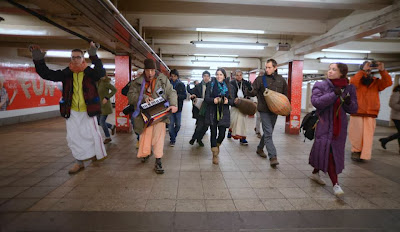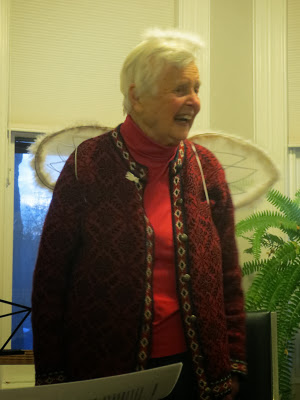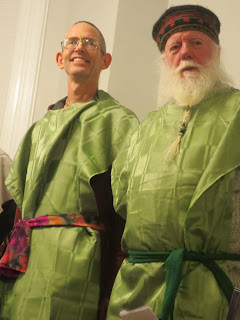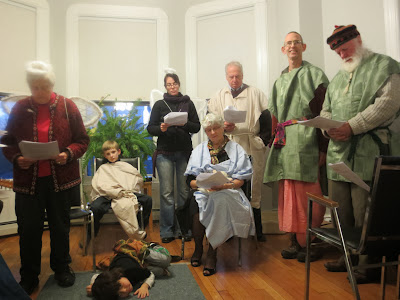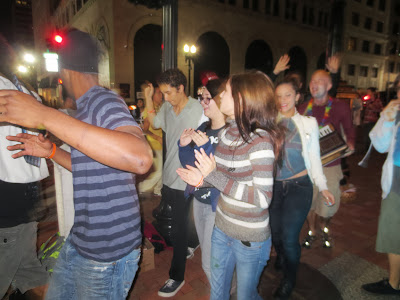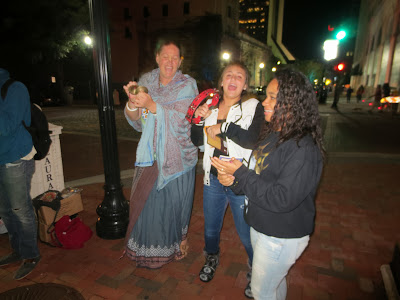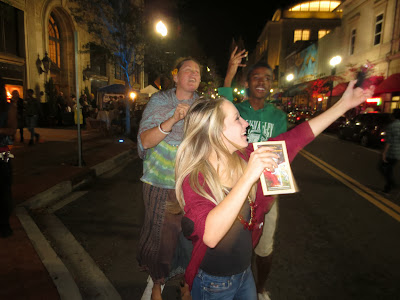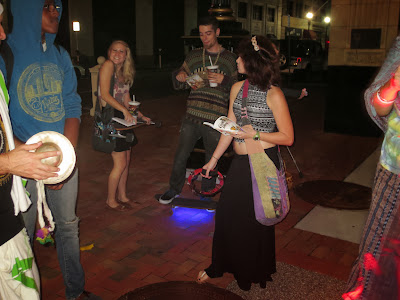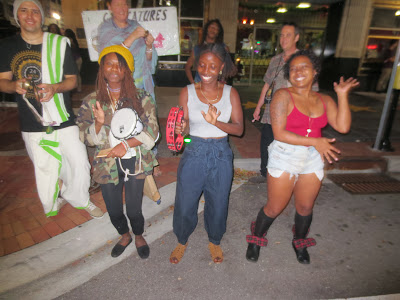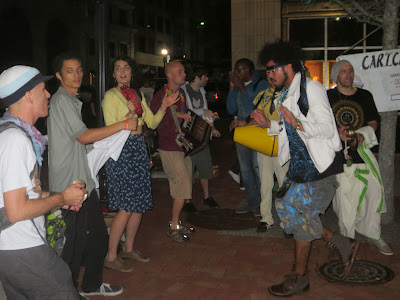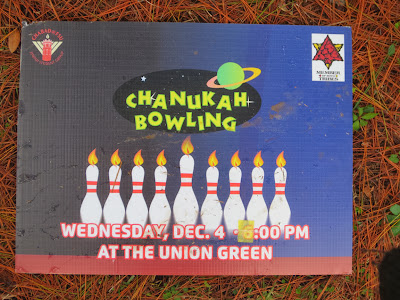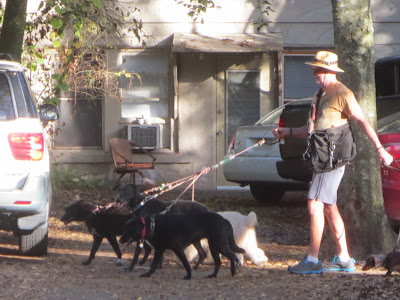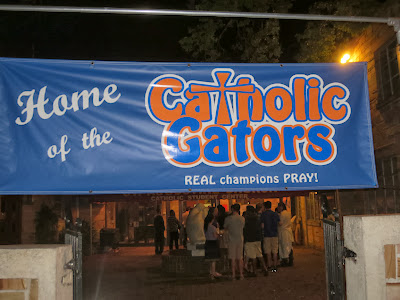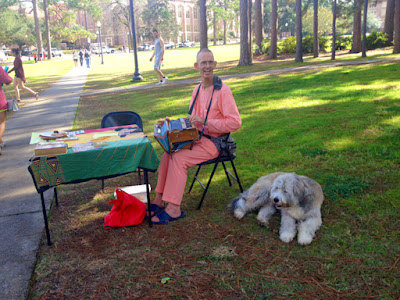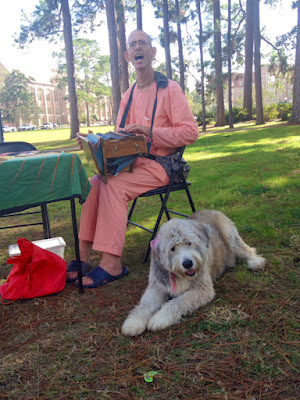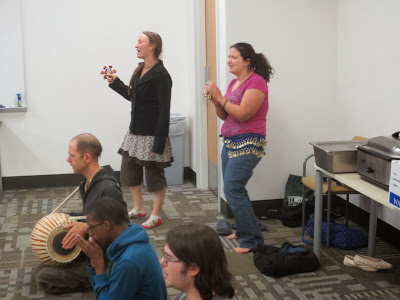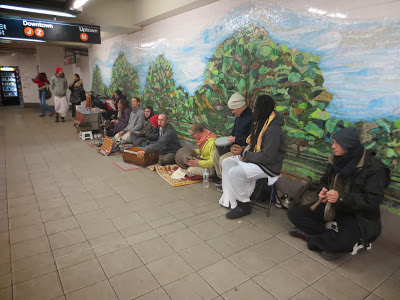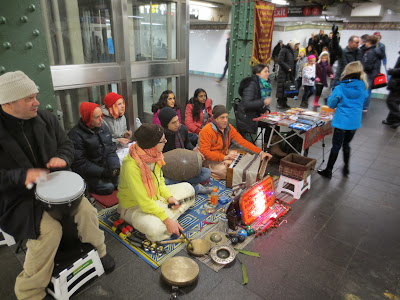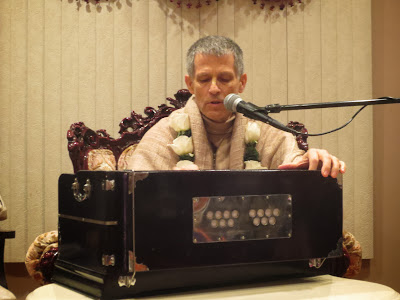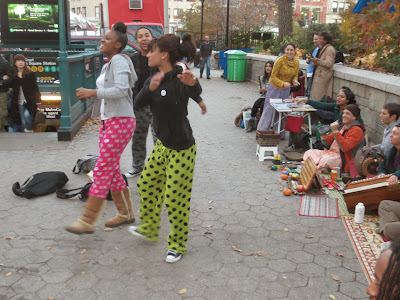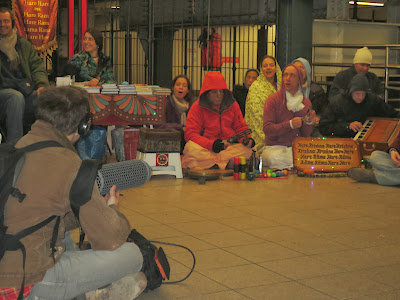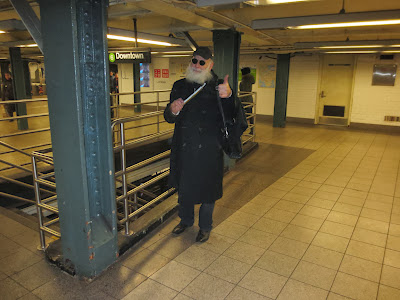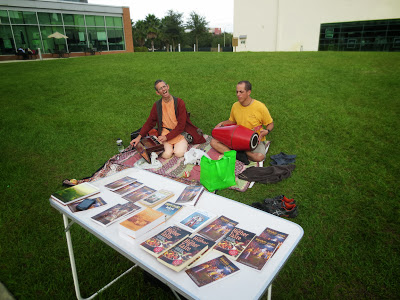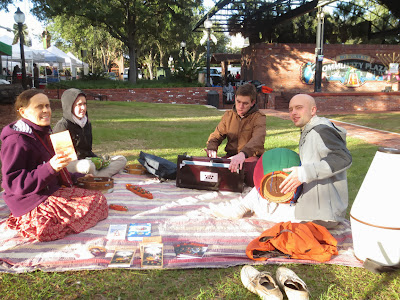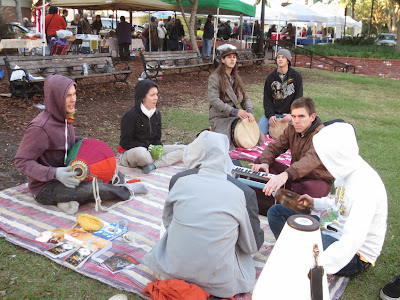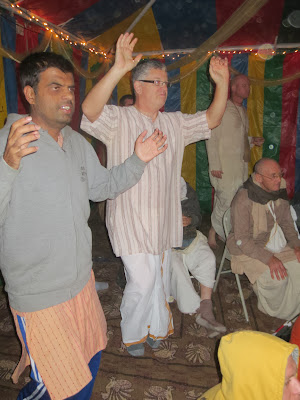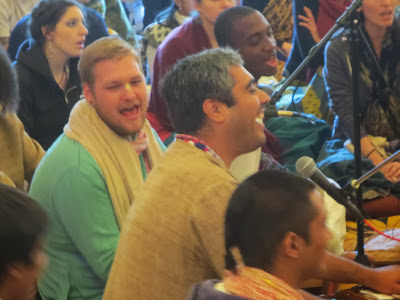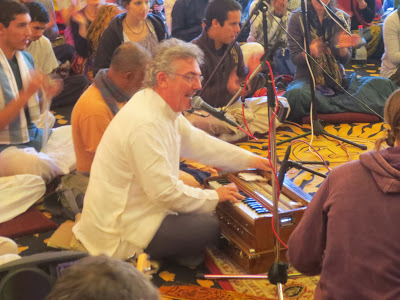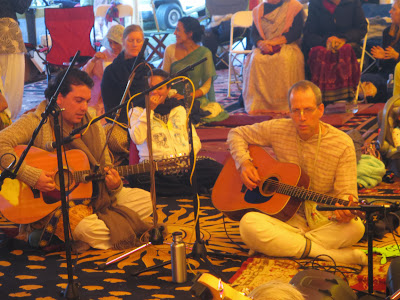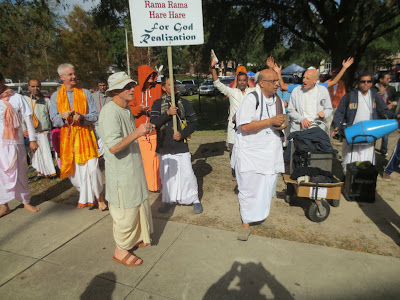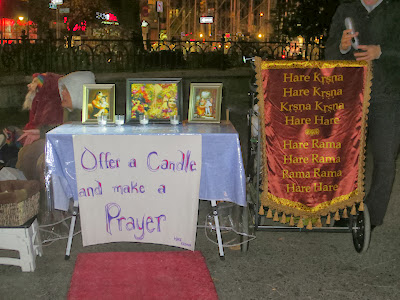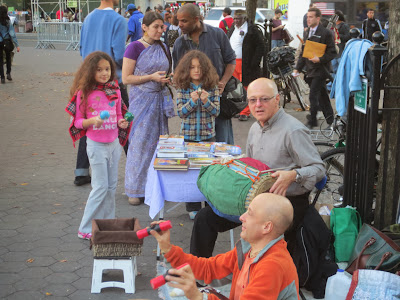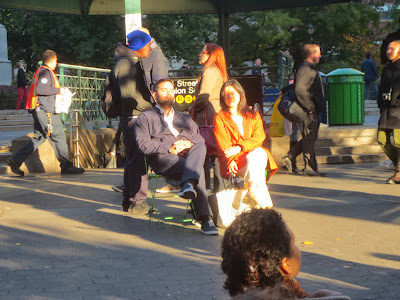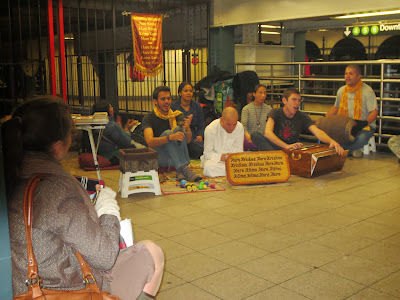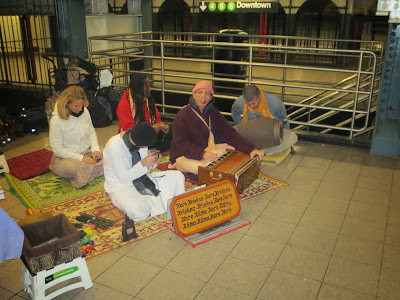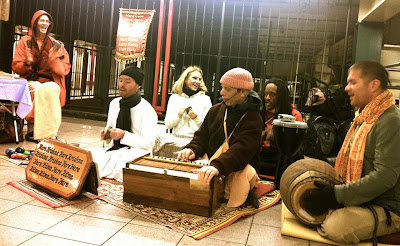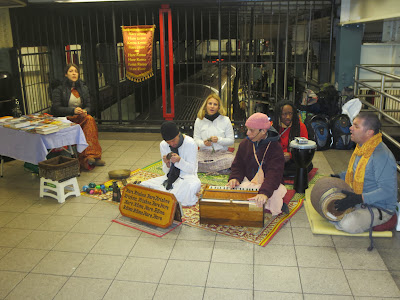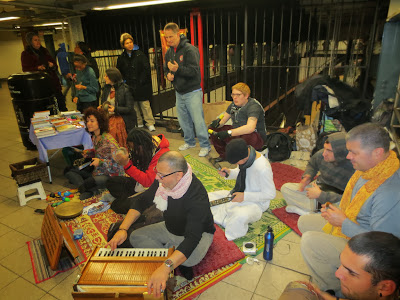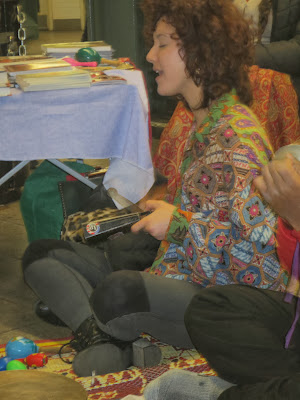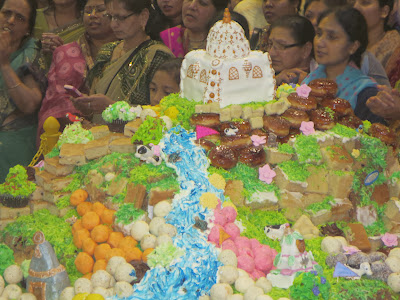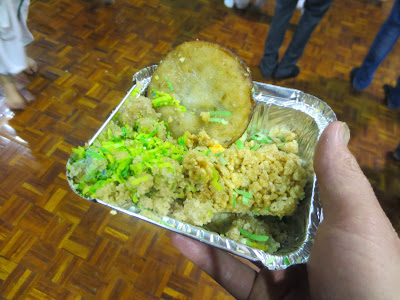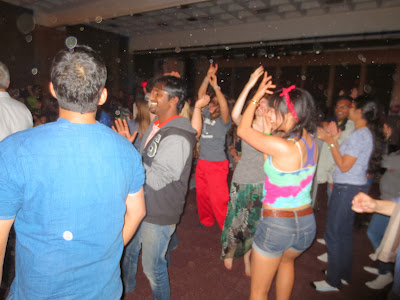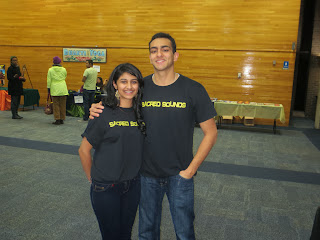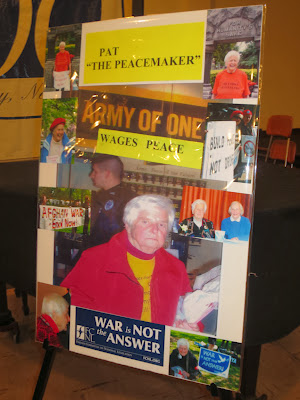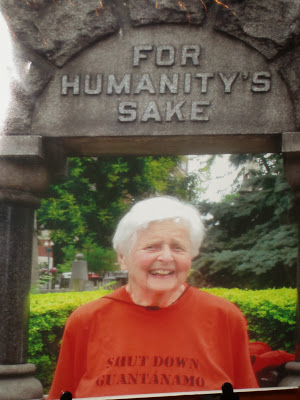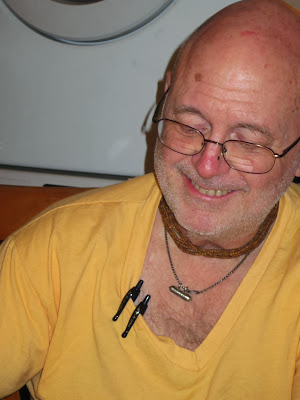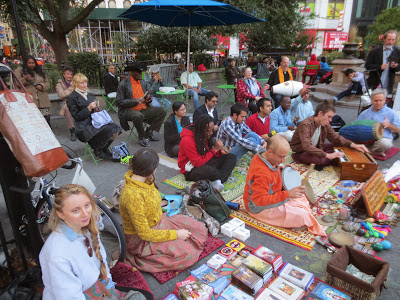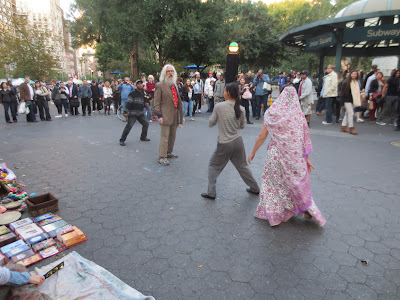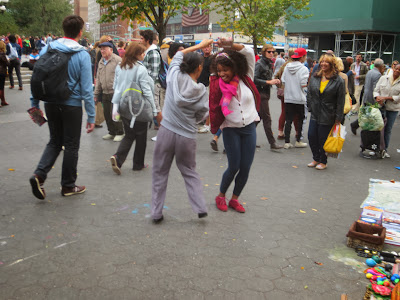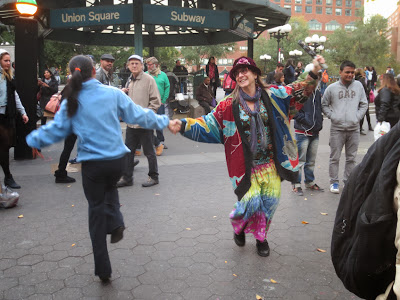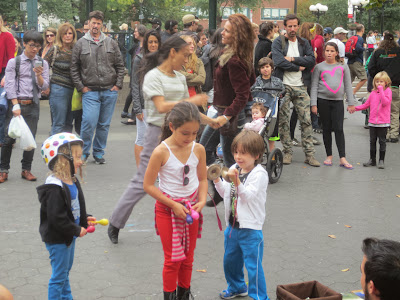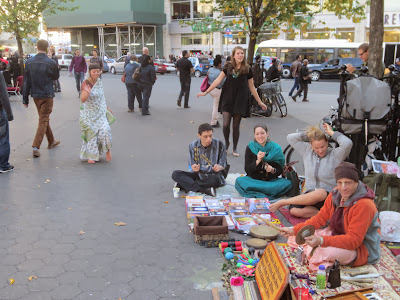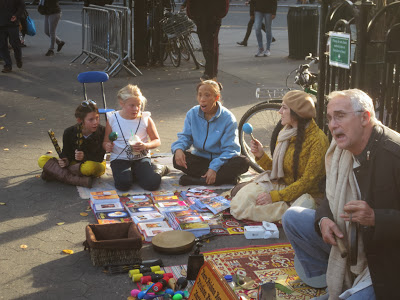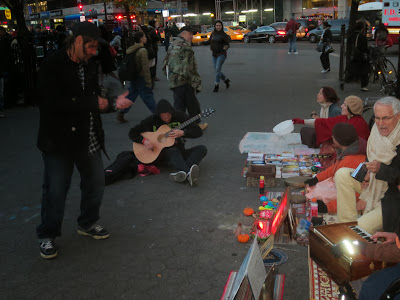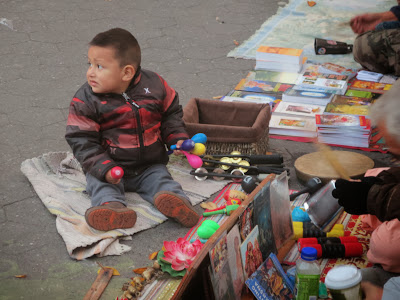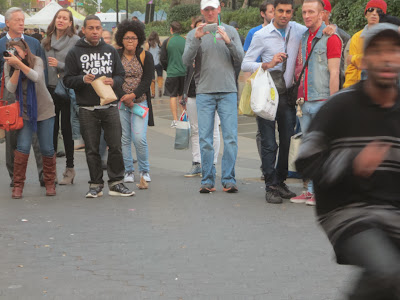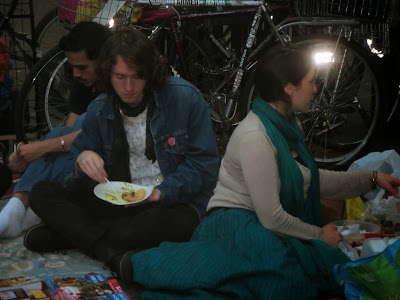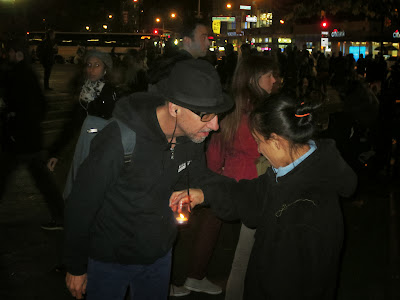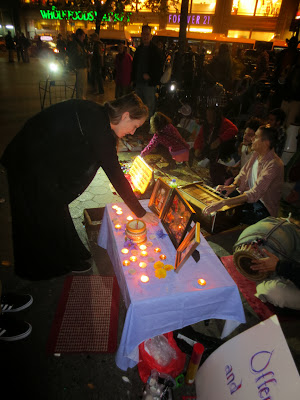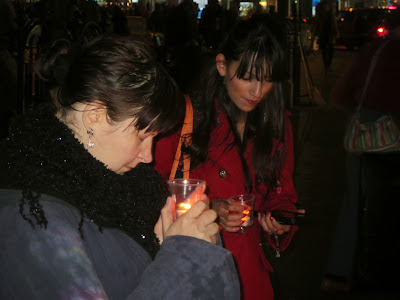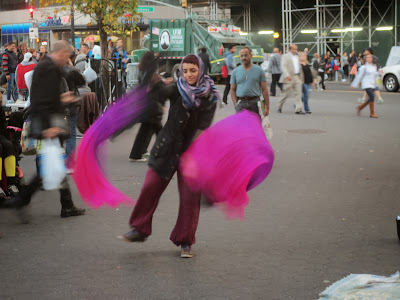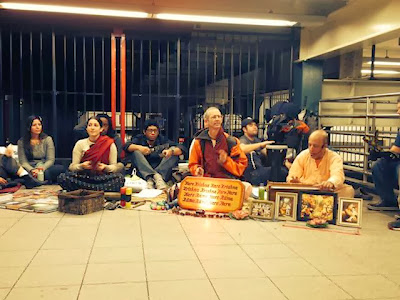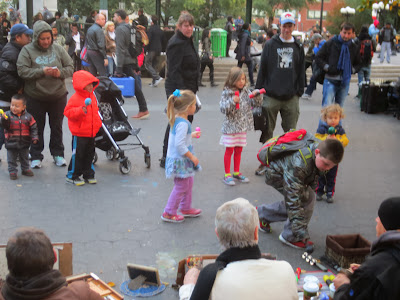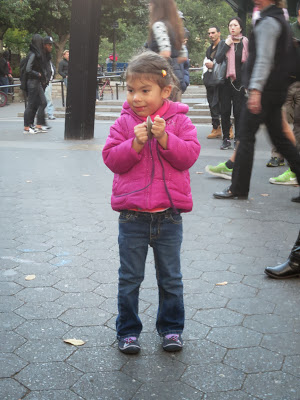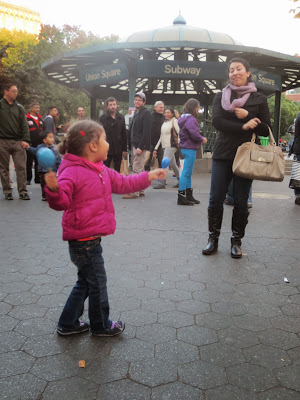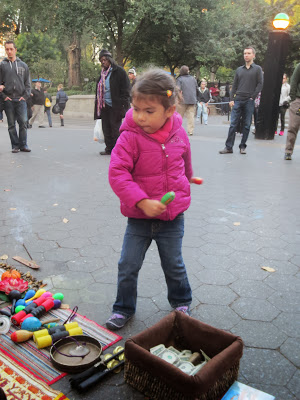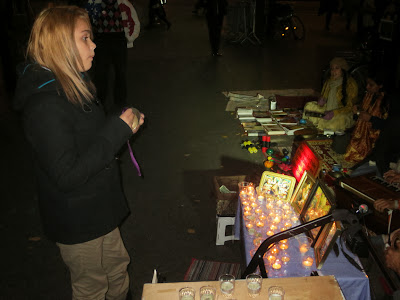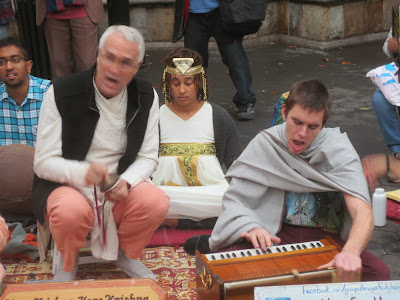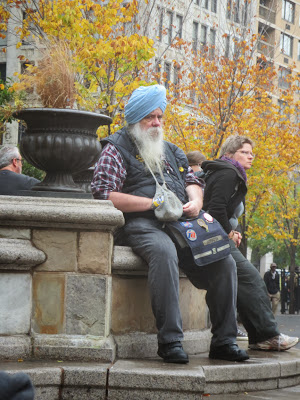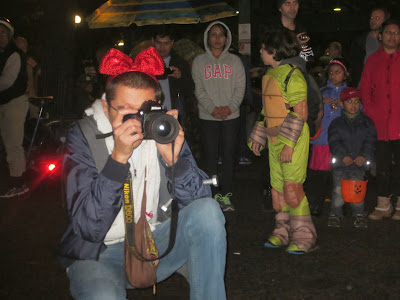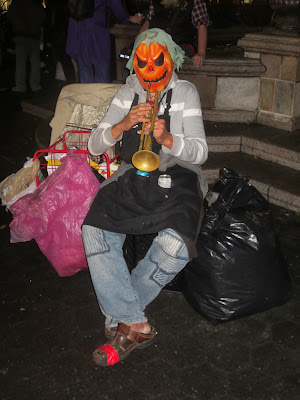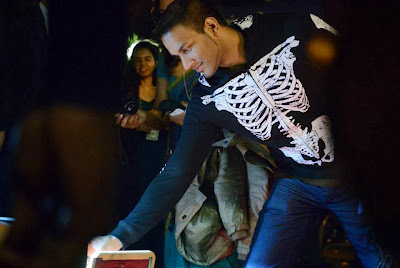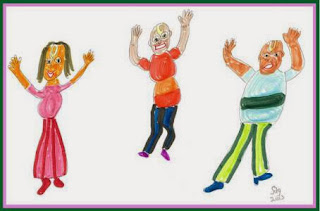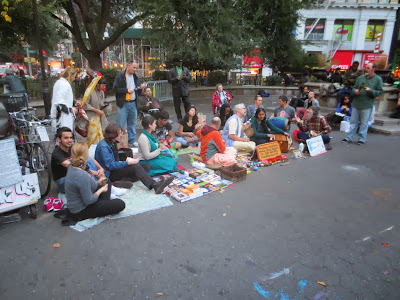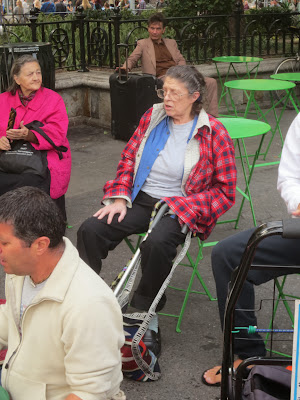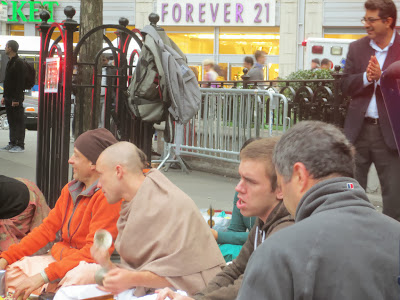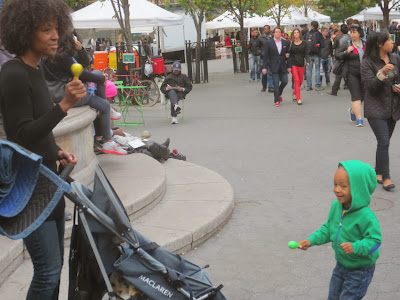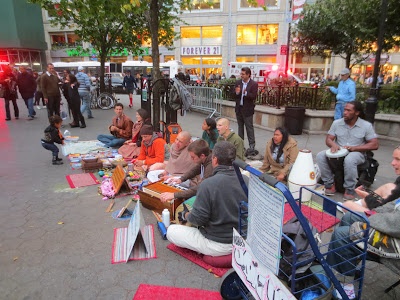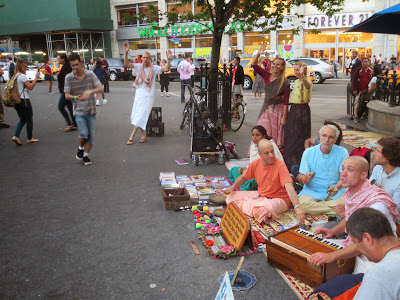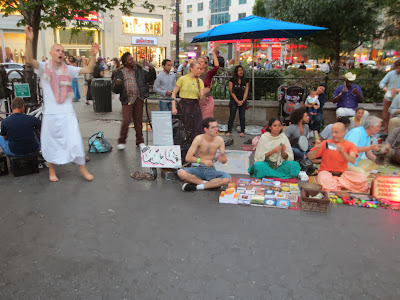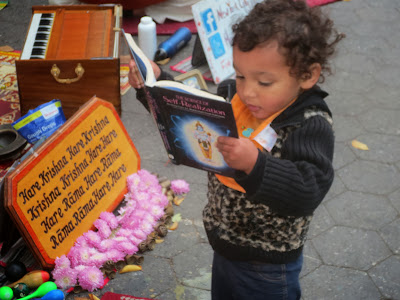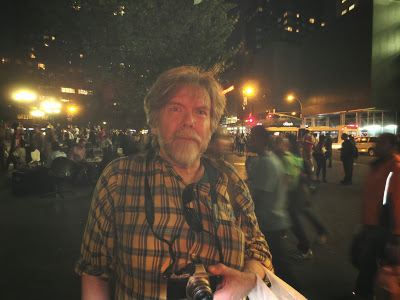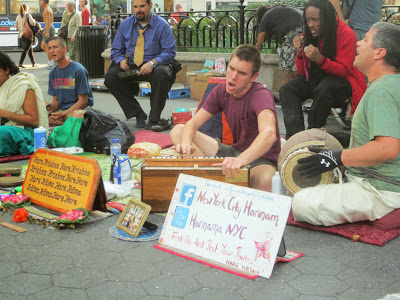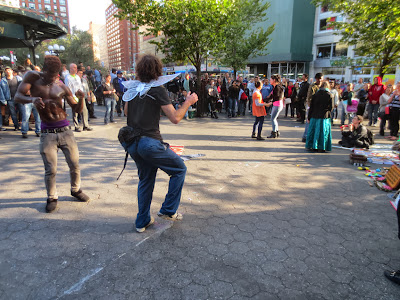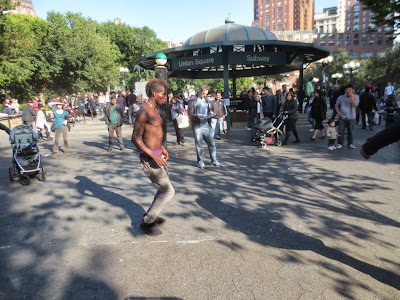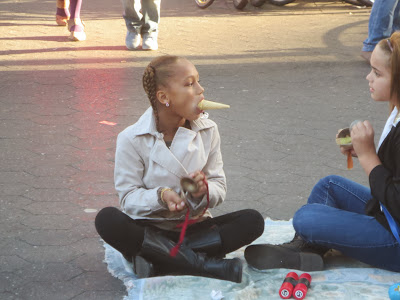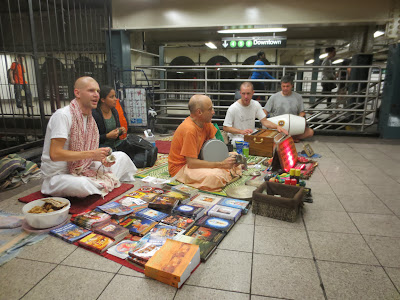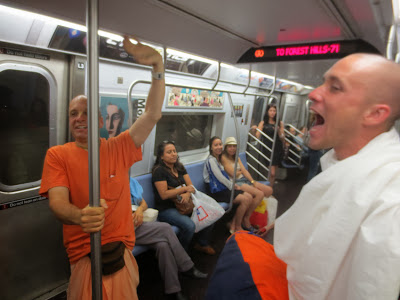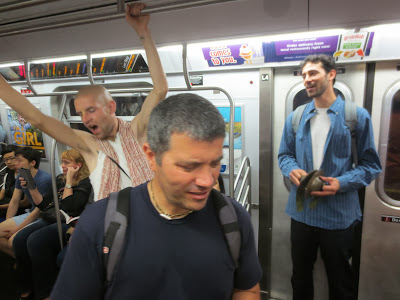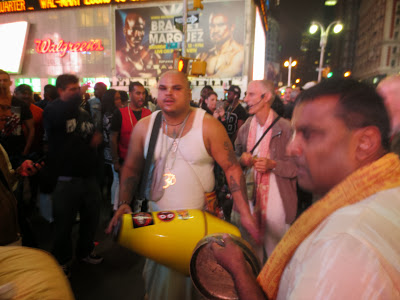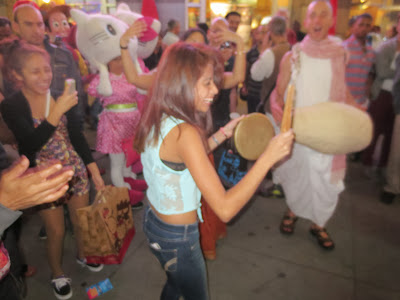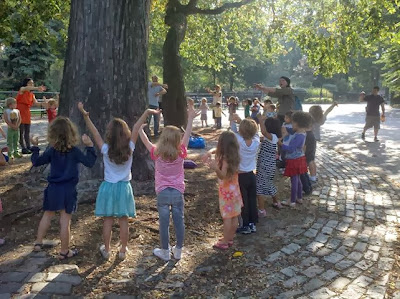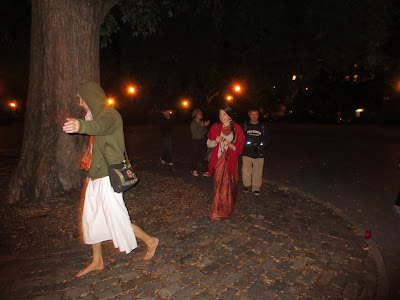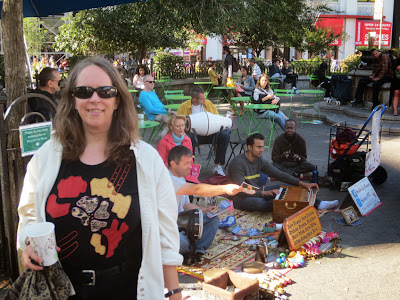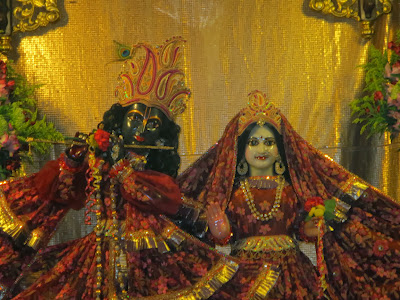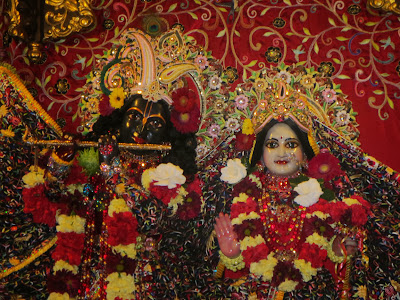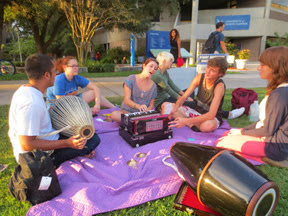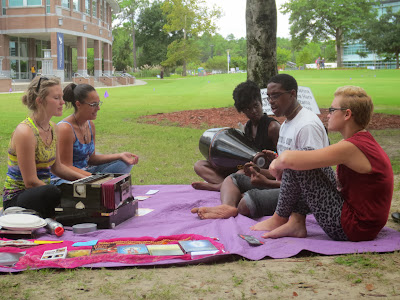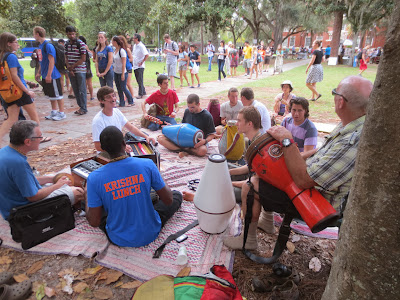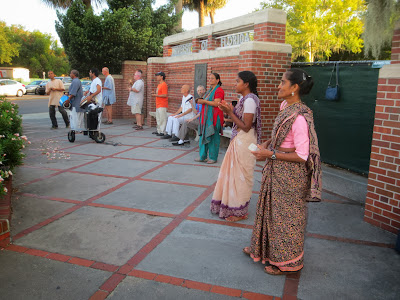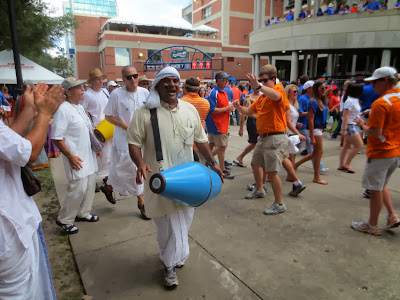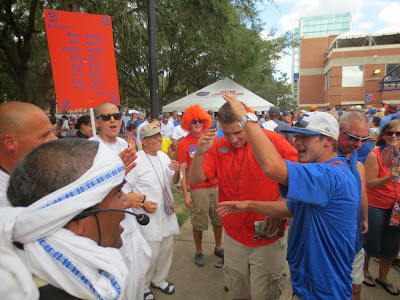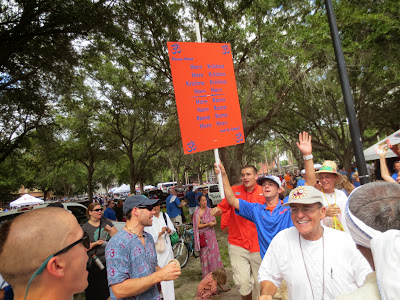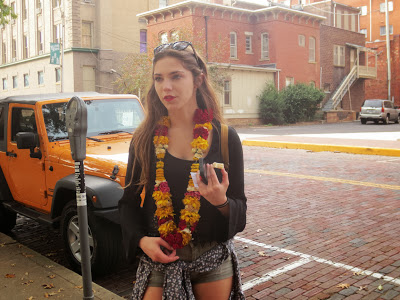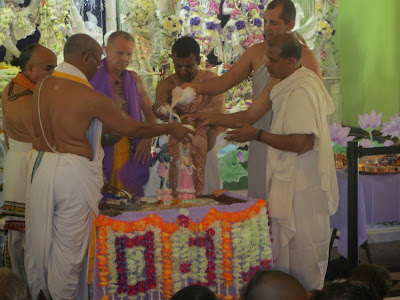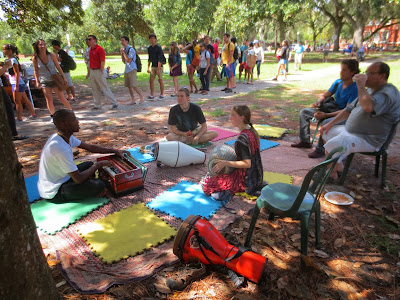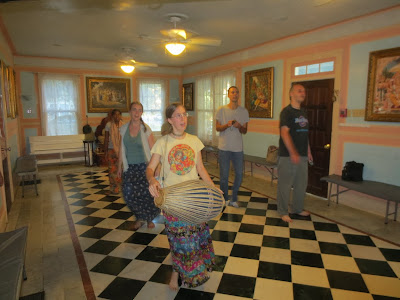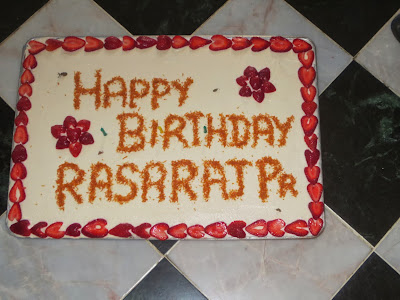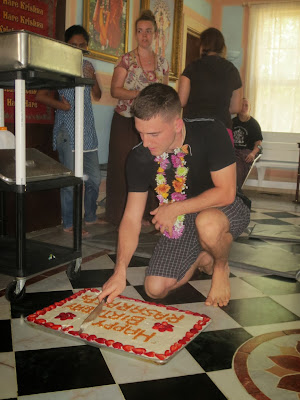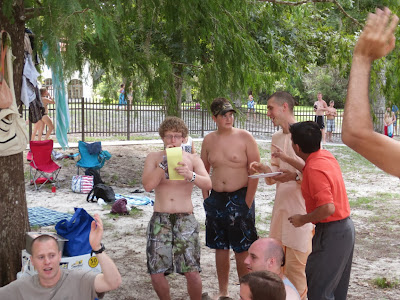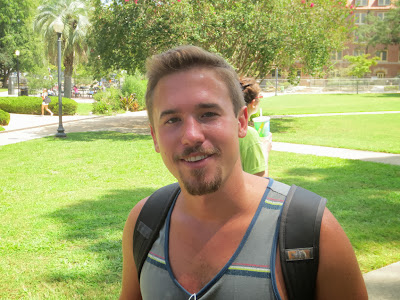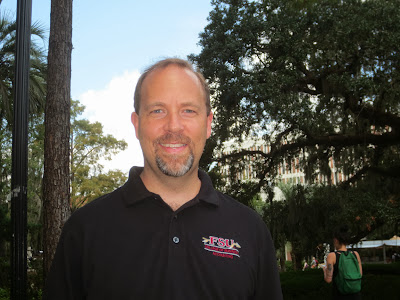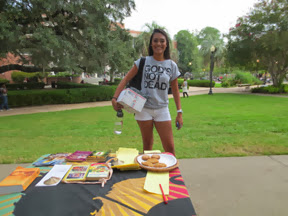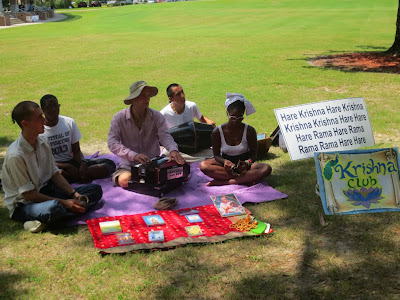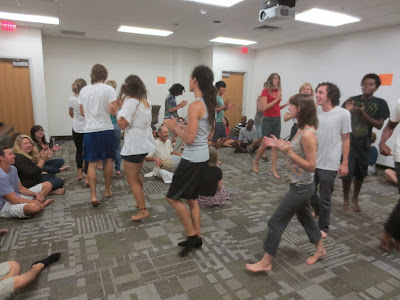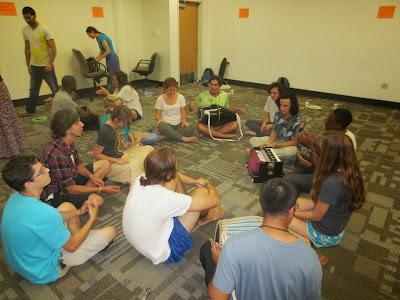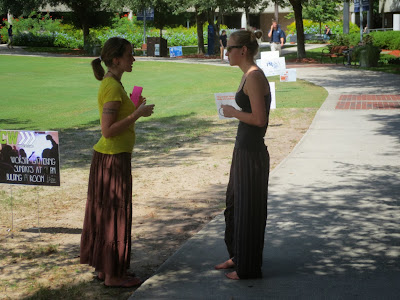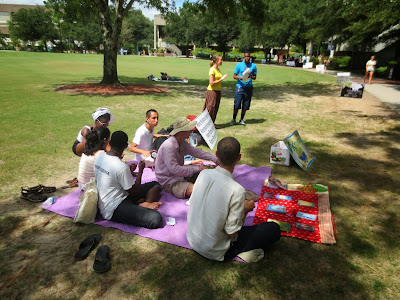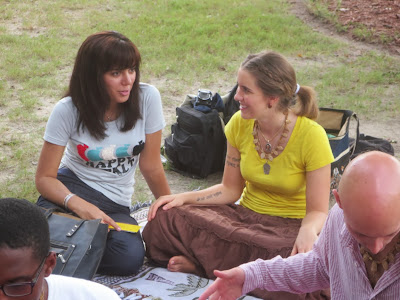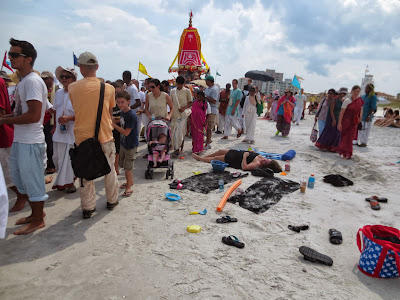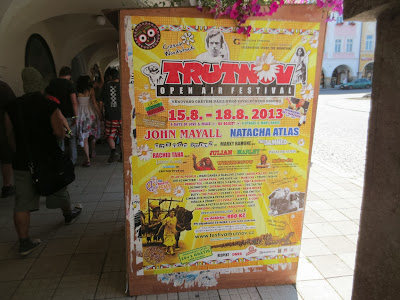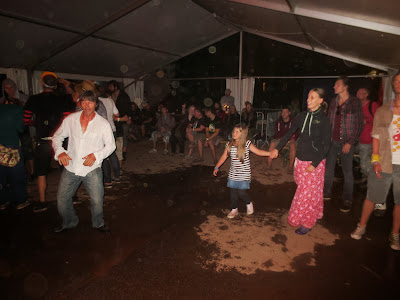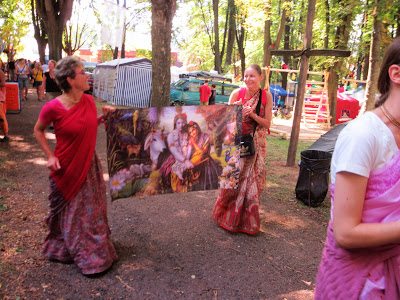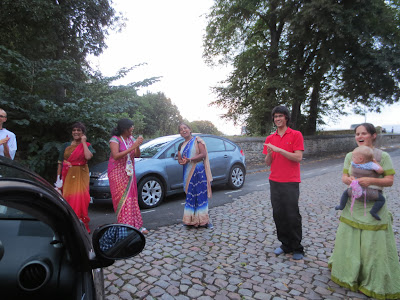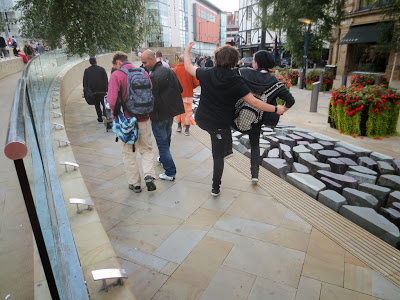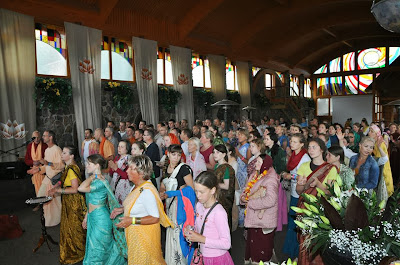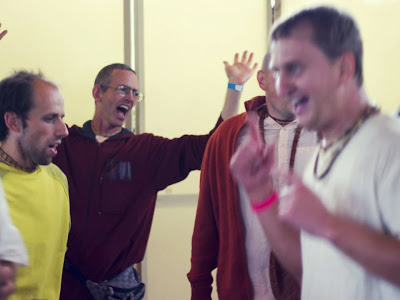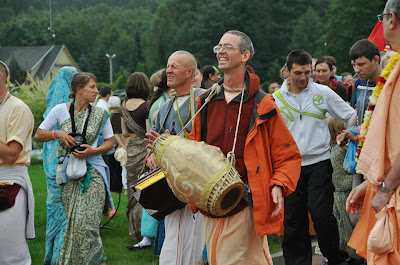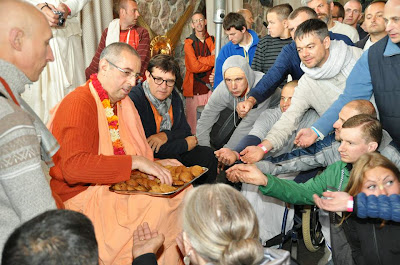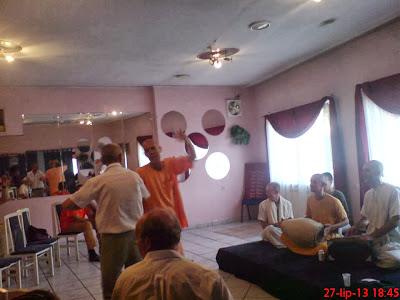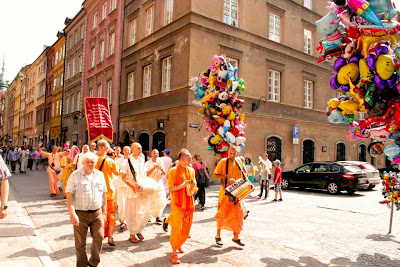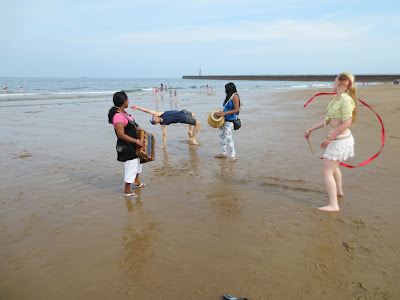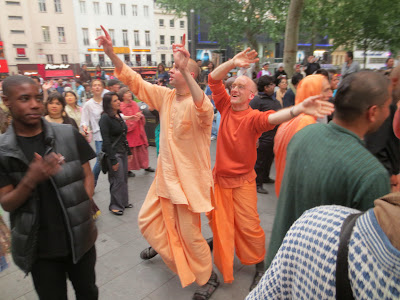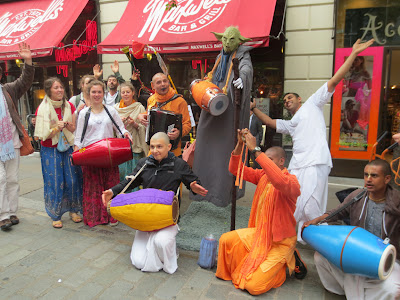Diary of a Traveling Sadhaka, Vol. 10, No. 23
By Krishna-kripa das
(December 2014, part one)
New York City and Stuyvesant Falls
(Sent from Gainesville, Florida, on January 3, 2015)
Where I Went and What I Did
On December 1, I took the Chinese bus from Jacksonville toNew York City to save money, and it was a pretty austere 19 hours, though scheduled to be17. I was still able to do 3 hours of harinamawhenI arrived the next day. Then I spent the rest of the first half of December with the New York City Harinam party, doing nearly 6 hours of harinama each day in different subway stationsexcept for December 6.. That day I went with Rama Raya and Bhagavatananda Prabhu of the party and a couple other disciples, to Stuyvesant Falls, New York, to celebrate the Vyasa Puja of our diksa guru, Satsvarupa Dasa Goswami.
One night I gave a lecture at Atmanivedana Prabhu’s program at 26 Second Avenue, and I am always happy to see the enthusiasm of the devotees who come to and maintain it. I also gave a lecture at Krishna Balaram temple in Queens, where I am greatly impressed to see the enthusiasm of the devotees for the congregational chanting. On the A train back to Brooklyn, I encountered three young Afro-Americans from the Bronx who had also come to the Queens program and who were very happy to chant kirtana with me until I got off the train at Utica Avenue, greatly inspiring me.
I share a quote from a Srila Prabhupada lecture, notes on Satsvarupa Dasa Goswami’s Vyasa Puja address, and some homages by his disciples, and notes on lectures by senior devotees at the Harinam Ashram, namely Abhiram Prabhu, Laksmi Nrsimha Prabhu, Rama Raya Prabhu, Janmastami Prabhu (in transit from Mayapur to Florida), and Lilananda Prabhu (visiting from Italy).
Thanks to Kaliya Krishna Prabhu, who always makes sure I have enough money to ride the New York subways. Thanks to the devotees at 26 Second Avenue for their kind donation. Thanks to Bhakta John for driving us up to Stuyvesant Falls for Vyasa Puja.
Itinerary
January 3 – April 8: Florida (Gainesville, Alachua, Tallahassee, Jacksonville, and Tampa)
April 9–11: Washington, D.C.
April 12: Albany
April 13–15: New York City
April 16: Toronto
April 17–24: Ireland
New York City Harinam
Because of the cold and wet weather and because the Christmas Market took over our spot at Union Square, we chanted in the subway stations during the first half of December.
The Atlantic Avenue – Barclays Center station in Brooklyn is a new one for us, and we started chanting there for the first time in November 2014. In the beginning, people did not know what to make of us, but as time went by they became more favorable. According to Wikipedia, it is the busiest subway station in Brooklyn because the B, D, N, Q, R, 2, 3, 4, and the 5trains all stop there and also the Long Island Railroad.
Even a police lady was seen moving to our music.
A kid gave a donation and got a pamphlet.
Ishvari Jahnava dd, originally from Russia and visiting from Vancouver, developed so much love and respect for the party seeing them online, she decided to come and render service. Here she played a lively tune on the accordion, getting Madhavi dd to dance.
Later a man joined in the dancing.
Another man was attracted by the presentation.
Others also danced with us there.
You can get a feel for the scene at Atlantic Avenue – Barclays Center from this video where Rama Raya Prabhu is singing (http://youtu.be/sHQgI_5WrrI):
We also chant at 42ndStreet – Times Square subway station, said to be the busiest station in the whole New York City subway system. There the A, C, E, N,Q, R, 1, 2, 3, and 7trains meet, as well as the Times Square shuttle,and there also is the Port Authority Bus Station.
Sometimes people dance with us.
Sometimes they play the gong.
Sometimes they play the shakers.
Sometimes they take photos of themselves with the Hare Krishnas.
Onceat Times Square, Bhagavatananda Prabhu noticed a Christian was approaching him. Before the Christian had a chance to open his mouth, Bhagavatananda Prabhu said to him with a smile, “Hey brother, Jesus loves you!” The guy was caught off guard, was a little frustrated that Bhagavatananda had stolen his line, and complained through his little sound system that we did not understandabout the love of Jesus.
Jackson Heights, which is populated by a lot of Indians, other Asians, and Hispanics, is where we get the most people to stay for some and listen to our kirtana. There we sing in the Roosevelt Avenue – Jackson Heights subway station, the warmest of all the ones where we sing.
There we chant just near the stairs leading down to the subway, and when the trains come in, lots of people pass by us as you can see in this video, in which a local guitarist also joined us (http://youtu.be/GqTks5cMtPQ):
Because we sing at Union Square in the good weather, we are generally well received also in the Union Square subway station.
Here one man who received a pamphlet read it immediately.
If Madhavi dd can find another girl, like Clarissa, to join her, then she will become inspired to dance.
Lee, although 70 years old, often will come and play the flute at Union Square.
Rama Raya Prabhu chanted Hare Krishna to the “Jingle Bells” tune and a passerby in a Christmas costume danced (http://youtu.be/zWsbKxgq4c4):
Michael Collins, who I know from chanting together in Gainesville, sometimes sings with us. Here he sings a lively tune at Union Square (http://youtu.be/znTvqEkBdTA):
One kid enjoyed dancing to the Hare Krishna music so much his mom had great difficulty dragging him away (http://youtu.be/pd_z-ddSoZg):
Ishvari Jahnava dd describes a wonderful incident at Union Square which I missed, having left early to give a lecture in Queens: “On December 14 a six-year-old could not pass us by . . . she stayed with us dancing and playing a shaker. And then she started to chant the Hare Krishna maha-mantra,reading it from the card with her dancing sister. And when her dad came to pick her up she confidently took a card with the maha-mantrafrom the book table and handed it to her dad making him to chant with her. I could not believe my eyes . . . ” You can see some of this in her video if you have access to Facebook:
Vyasa Puja of Satsvarupa Dasa Goswami
Satsvarupa Dasa Goswami, one of the early disciples of Srila Prabhupada, most famous for having written his authorized biography, Srila Prabhupada-lilamrita, was born seventy-five years ago, and his disciples observed the standard Vyasa-puja celebration in his honor. There were more people there than usual.
In this picture, he wears the string of red beads that Srila Prabhupada chanted on at his initiation in 1966.
He gave a talk and people read homages. The oldest disciples, beginning from those initiated in 1978 read their offerings first. There were so many disciple those initiated in 1983, like myself did not get speak. I will include my offering below, which I had written, after the others.
When I came up to get a copy of the the third and final volume of his autobiography, The Story of My Life, I told Guru Maharaja that I had put my Vyasa Puja offering in the book of offerings that the devotees had given him, but I had forgotten a couple things. In his daily journal, he often writes, “I called out to Krishna because without His blessings I cannot do japaon my own endeavor. ” I told him I liked that sentiment when I initially read it, but it took two weeks or so before I was able to consistently pray like that every day, but now I can and I think it helps. I also told him, “Because you have faith in the holy name, we are able to have faith in the holy name, and because you have faith in Srila Prabhupada, we are able to have faith in Srila Prabhupada. Thank you.” He was pleased to hear that.
I saw Satya Devi, the wife of Ramabhadra Prabhu, the temple president of Radha Govinda Mandir, at Vyasa Puja for the first time in quite a while. She came with a friend, Lalita Devi, and they were glad that they came.
Satya gave Guru Maharaja a garland from Govinda in Brooklyn.
Guru Maharaja took off his previous garland and gave it to her.
The prasadam was awesome as usual, and there was plenty of it. Baladeva Vidyabhusana Prabhu’s spinach and panirwas very tasty, and his sweet rice was wonderful.
There was a winter festival that night in Hudson, the largest city nearby, and we hoped chant there with our instruments afterward. It was a cold and wet night, however, and no one except me still wanted to go out chanting. I thought we should have chanted one time down the street despite the bad weather conditions because there is so much benefit in it for all concerned.
Doughnut Plant
Part of my relationship with my niece, Fern, and my sister, Karen, is to go to the Doughnut Plant, the prasadam business run by Hare Krishna devotee Mark Israel, which has just opened a new location in Brooklyn, at 245 Flatbush Avenue. We always go to the one in the Chelsea Hotel, which is generally closer to where we are.
Here Fern and Karen are happy after doughnuts and hot chocolate with vegan marshmallows, a favorite.
To see photos that I took but did not include in this blog, click on the link below:
Insights
Srila Prabhupada:
“Srimad-Bhagavatamis filled with descriptions of the characteristics of various devotees, with reference to the service of the Lord. This Vedic literature is called Bhagavatambecause it deals with the Supreme Personality of Godhead and His devotee. By studying Srimad-Bhagavatamunder the direction of the bona fide spiritual master, one can perfectly understand the science of Krishna, the nature of the material and spiritual worlds, and the aim of life. Srimad-Bhagavatam amalam puraṇam. Srimad-Bhagavatamis the spotless Vedic literature, as we have discussed in the beginning of Srimad-Bhagavatam. Therefore, simply by understanding Srimad-Bhagavatam, one can understand the science of the activities of the devotees, the activities of the demons, the permanent abode and the temporary abode. Through Srimad-Bhagavatam, everything is perfectly known.”
Satsvarupa Dasa Goswami:
Ravindra Svarupa’s book on Srila Prabhupada as founder-acarya is well researched and worth reading. I recommend it to everyone.
I am a Prabhupada cela, although I have disciples. I instruct them to read his books.
Regarding my book Readings in Vedic Literature, Srila Prabhupada told me, “You having quoted the rascals without becoming contaminated.”
When I inquired from Srila Prabhupada about writing he replied, “Persons like the Goswamis wrote so many books, and so I am writing. My disciples will also write. Unlimited books can be written without deviating from the original source.”
Srila Prabhupda advised, “We should assimilate and present in our own words.”
The goal of the devotee artist is glorify Krishna with heartfelt expression.
Prabhupada Smaranam is one of my favorite books.
The BBT in Russia has printed Prabhupada,Readings in Vedic Literature, and Narada-bhakti-sutra. They are also printing the full length Srila Prabhupada-lilamrita.
Devamrita Swami wrote me greatly appreciating Prabhupada Smaranam, how the book draws you into it and shares beautiful insights about Srila Prabhupada, and you cannot put it down.
My disciples and I are a family within in the family of ISKCON. There are no temples of my disciples, but they can unite around my books. Some disciples who teach seminars use my books.
Chanting japa is a very personal connection with the spiritual master. It is the one vow you made to me, to Prabhupada, to the Deity, to the fire. Japais becoming increasingly the essence of my Krishna conscious bhajana.
From “Free Writing in ISKCON”:
Telling them “Not quarreling or fault finding.”
Bowing down before him, feeling surrender in your bones.
Prabhupada gave it [the danda, the staff of one in the renounced order of life] to you with the instruction, “Preach, preach, preach.”
Srila Prabhupada said Bhaktivinoda Thakura’s desire was fulfilled when Bengalis and Westerners chanted Hare Krishna together.
Prabhupada was satisfied whether I was in Boston, Dallas, or traveling.
From “Vani and Vapu”:
It became different when there was only vani[Srila Prabhupada’s instruction] and not vapu [Srila Prabhupada’s personal presence].I had a Prabhupada murti[worshipable statue] to keep in touch.
As you get older you do fewervarieties of service. You do japa,read, and write. You hope Srila Prabhupada is pleased with you.
I experienced sweet weeks of living like a sadhu in Vrindavan.
One is invited to do fiction by the acaryas who have written fiction [like Bhaktivinoda Thakura].
I decided to end this series called The Story of My Life because it may seem egotistical to have so many volumes with that title. I will create a new series with the working title Looking Backwards. Rupa Vilasa my proofreader suggested I abbreviate it to Looking Back, and explain in the introduction the reason. I want to review the books I have written in my life.
Offerings:
Disciples from 1978:
Janmastami Prabhu:
I had the honor of garlanding you when you came for the first time to 55thStreet in New York. I was thrilled. You spoke on Srila Prabhupada’s mood and the maya sukhaya [illusory happiness] verse. You have always talked about the chanting. You would say that Srila Prabhupada said we should use our best intelligence to chant Hare Krishna. And throughout our relationship you have always emphasized the chanting, and I am so grateful for that.
In Mayapur Suresvara Prabhu talked to all the devotees about Srila Prabhupada from Lilamritatoday, your Vyasa Puja day.
Brahma-sampradaya Prabhu:
You say you do not travel, but you are traveling all around the world every day by your web site.
Syama Gopa Rupa Devi:
I first heard you speak dispelling doubts arising by Srimad-Bhagavatam Canto5, Part 2. I was impressed by your pure devotion to Srila Prabhupada and his presentation of Vedic Cosmology.
You publish your daily journal which is honest and transparent.
I am blessed to be able to assist you publishing your writings.
We are an eternal spiritual family, and yet we do not know each other so much, so we should get together more.
Mukta-vandya Prabhu:
I was always fried about a lot of things, but when I heard you were going to be the guru for the devotees in Boston, I was happy because I had experienced you before.
You say for those who were first initiated by Prabhupada, they could take you as spiritual master or not, and I decided I would. Later disciples of Srila Prabhupada could not easily have his association, but if they were brought in my you or TKG, they could come right in. I feel if I am with you I will be with Prabhupada.
Samika Rsi Prabhu:
You said guru is like father and disciple is like son.
You lovingly taught us how to chant the gayatrimantra.
My mother wanted some material blessings for her son, and you explained the spiritual master is just for spiritual blessings.
You would write notes to Anarta, my wife, about what you wanted to eat, and that was a very personal connection.
Haridasa Prabhu:
You spoke in Dallas after Srila Prabhupada’s leaving.
One cannot think of you without thinking of Srila Prabhupada, and one cannot think of Srila Prabhupada without thinking about Krishna.
Disciples from 1979:
Haryasva Prabhu:
I wanted to know and love Srila Prabhupada. And you have given me that, and are giving me that more and more.
You have given me a family of wonderful godbrothers and godsisters.
I have always felt love from you. The same as I felt from my mother except this is better.
Your books are a treasure. I understand more your enthusiasm to distribute them.
Lila-avatara dd:
I appreciate how you stress chanting the holy names.
Once you told me, “If you cannot chant on your beads, chant in your mind, but do not forget the chanting.”
We want to emulate you by giving others so many things to benefit their spiritual lives.
I find by the chanting I forget about the pains of illness.
Your pictures and drawings of devotees dancing with upraised arms make me happy.
A person who chants japaand worships Madhusudana attains the spiritual kingdom.
Baladeva from Trinidad:
We are celebrating your almost 50 years of service to Srila Prabhupada.
Laksmi Narayana Prabhu:
Even disciples of other gurus glorify your books for inspiring them in spiritual life.
Kirtan Rasa Prabhu:
Pray to Krishna I may always go along with you. Pray to Krishna for your health and long life. Do not think it is selfish.
Vishnu Aradhanam Prabhu:
Thank you for your tapes, books, and website for telling us about Krishna and His holy name.
Kalki Devi:
“YOU ARE My INSPIRATION. You inspire me by the description of your feelings when you write about your chanting sessions.”
“So many human beings have been touched by these writings which are coming from your heart.”
“You share so much of yourself in many ways, and therefore this helps to bring us (your disciples) closer together under your shelter.”
“I just pray I can follow even in a small way your example and make this lifetime successful.”
When I see Radha-Damodara I think of you. You are together in my mind.
Disciples of 1980:
Bhagavatananda Prabhu:
I heard Srila Prabhupada had just left and there were new spiritual masters and one was coming. I returned and heard you. Sitting way in the back, I could hardly hear. I heard you was coming again. I returned and also sat in the back and did not really hear or understand. When I left the room and hit the street, I recalled that being in your association was so peaceful, quite unlike the street scene I was entering.
You gave me the service of preaching in Jamaica, and I am not done with it.
Your disciples are very powerful.
That Jada Bharata Prabhu left us. I think he was the first of us to go. We should take note that we also will go, and we should associate while we can.
I have been with Rama Raya Prabhu his party. To be in the association of like minded people chanting Hare Krishna in New York, I am refreshed and invigorated like the old days and optimistic about the future of ISKCON. I am inspired you have produced disciples like that.
Disciples from 1981:
It was my great, great fortune that you were my zonal acarya.
When you give a class, you are giving us Krishna in a very direct way.
You wrote me once, “Janmastami [your leader on the book distribution party] is not your spiritual master.”
Rama Raya Prabhu:
That you have wonderful disciples doing things all over the world is evidence of your position as a bona fide spiritual master. You have led the way for all the devotees in ISKCON, stressing the chanting of the holy name. Many of your godbrothers are inspired in that way following your example. Srila Prabhupada said it is the first duty of a sannyasi to give a literary contribution, but you have given many, many literary contributions, and these are lasting contributions.
I am very inspired by your realization of the harinama. You are inspiring us in that.
Krishna-kripa das:
“You teach by your glorious example to put the japa of the holy names as a top priority by rising early and doing the bulk of your japa before other things. ‘Of all the instructions of the spiritual master, the order to chant sixteen rounds is essential.‘You always strive to improve the quality of your chanting, especially in attentiveness, and you share your struggles with others for their benefit. You remind us that the maha-mantra is composed of Radha’s and Krishna’s names and is a prayer to be engaged in Their service. You inspire us by telling how you are now, for the most part, not disturbed by outside thoughts. And you teach us to yearn for the day when we see the form and pastimes of the Lord spontaneously appearing in our minds when we chant.
“Now I am chanting with Rama Raya Prabhu’s party in Union Square, and you inspire us all by your appreciation, replete with choice scriptural references, of the supreme importance of nagara sankirtana, and your words especially encouraging us in our venue in New York City. Through your paintings and drawings of happily dancing devotees, you also remind me of the instruction you gave me back in the 1980s to ‘dance more in kirtana.‘By promoting the dancing you follow Srila Prabhupada, who always appreciated the dancing of the devotees, and Lord Caitanya and Nityananda, who are always dancing, even in Their Deity forms.
“Through your daily writing and artwork you teach the importance of engaging your God-given talents in His service, as well as reminding us that Srila Prabhupada wanted us to write down our realizations every day. Your writings provide inspiration for us to apply Srila Prabhupada’s instructions in our lives and thus attain spiritual perfection.
“Your determination to make good on your promises to Srila Prabhupada for the reminder of your life inspires us to keep our promises to you.
“Thank you for inspiring us, your disciples, as well as the devotees in general, by your personal example and your literature.
“Please bless us that we might always follow your path back to Godhead, your life of devotion to guru and Krishna.”
To see all the offerings in the tributes book for 2014, click on the link below:
Abhiram Prabhu:
There is a tendency for people to create an aristocracy, a privileged class. This is so powerful it happens even in a spiritual movement.
The Goswamis of Vrindavan accepted Bhaktivinoda Thakura because he was initiated by Bipin Bihari Goswami, but they consider the line stopped there. They do not accept Bhaktisiddhanta Sarasvati Thakura, and what to speak of Srila Prabhupada?
Comment by Laksmi Nrsimha Prabhu: On a morning walk in Central Park, Srila Prabhupada saw a branch detached from a tree and said, “Asara (useless).” Then he explained that because the branch was detached from the tree although it was green now it would soon dry up. Similarly he explained that because the different apasamprayadas [unauthorized lineages] are detached from Lord Caitanya they are worthless.
Many persons I met in India while doing business were born in brahmana families and wore brahmana threads, but their activities were indistinguishable from the others in society.
It is easy for elitism to creep in. “I have been here for two years but this person has only been here two months.”
There is no special door to Krishnaloka marked “Prabhupada disciples.”
We offer respect to a superior because no one attains a superior position without the blessing of Krishna.
It is a great credit to realize that we are dependent on God for our daily bread, but simply to worship God to attain bread is a subreligious idea.
Lord Caitanya’s teachings are available, and we can execute this bhagavata dharma and attain perfection.
We have the tendency to serve someone great. This is natural and not wrong, but ultimately the Supreme Lord is meant to be the object of our complete devotion.
Laksmi Nrsimha Prabhu:
The San Diego devotees had a Govardhan festival in Balboa Park in the 1970s. Between that and a college program, four people joined. On Radha Damodar it was not unusual to have two or four join the party from a program.
My greatest realization is that God is a person.
The Mayavada philosophy has the defect that we have a quality, namely form, that is not present in the Supreme.
Bhakti is to meditate on the name, form, qualities, and pastimes of the Lord.
Golf is the materialists’ sannyasa. The forest is the golf course, and the danda [the staff of the renounced order] is the golf club.
When the Radha-Damodara party became more oriented toward book distribution and the mood changed, the original members of the party dispersed, mostly to India.
Srila Prabhupada did not want divorce, and Srila Prabhupada did not want remarriage. That is clear. Yet he sometimes permitted these when he felt that otherwise the devotee would leave the society of devotees.
A pujari in the Gaudiya Matha fell down with a woman, and the temple leaders kicked him out. When Bhaktisiddhanta Saravati Thakura found out, and he was angry and said, “I will not come to your temple until you get that man back.”
The verse, Bhagavad-gita 9.30 is for us to recognize a sadhuand to respect him, not for the sadhuhimself.
Recognition, remorse, rectification, and reunion are the four stages of recovering from a falldown.
There is one tribe when if you do something wrong theyput you in the center of all the members and each one says something good about you. Then when the offender is inspired by the love of the others he generally rectifies himself.
Comments by Janmastami Prabhu: There was a case when a sankirtanaleader had sex with two sankirtanaunmarried ladies. Prabhupada called the ladies in and advised them, “Do not that do anymore because it is not good for your spiritual life.” He called the sankirtanaleader and chastised him by sentencing him to not have sweets for a year.
Fault faulting has been compared to bathing in the urine of an ass. You think you are getting clean, but you are actually becoming more dirty.
Bhaktisiddhanta Sarasvati Thakura had a retreat center where a sannyasicould go who had some falldown to gain strength. That kind of thing is what should be done.
Look how Krishna dealt with Ajamila’s falldown.
Comments by Brajaraja Prabhu:
If a soldier falls on the battlefield, you do not imprison him or kill him, but you bring him to a hospital.
Comments by Abhiram Prabhu:
In crowd dynamics the consciousness of a crowd tends to descend to the level of the lowest member.
Bhavananda and Ramesvara said Yamuna and Dinatarine were cut off from ISKCON because they were living on their own and not in the temple. They asked Srila Prabhupada what temple he wanted them to live in. He said that he saw no need for them to move, that they were nicely situated with their Deities, and explained that association can be two or two hundred, but it must be favorable.
From a class on Sri Caitanya-caritamrita,Adi 1.63:
The moralist tries to make a better life in the material world but not transcend it, and so he is considered by Bhaktivinoda Thakura to be a materialist.
We are protected by the Lord when we are acting according to the scriptures and saints.
A great Muslim saint said that words that come from the heart go to the heart.
Krishna’s love enters the heart of the pure devotee, and from the heart of the pure devotee it comes into our heart.
In the association of a pure devotee are found the four other principle limbs of bhakti, namely the chanting of the holy name, hearing of Srimad-Bhagavatam, faithfully serving the deity, and living in a holy place.
We cannot distribute Srila Prabhupada’s books without reading them and appreciating they are the panacea for all the sufferings of humanity.
The goal is to always remember and never forget Krishna, and Srila Prabhupada and the acaryas [the previous great spiritual teachers] have given us many ways to do this.
Materially tinged means having the tendency to put ourselves in the center.
Of the six Puranas in the mode of goodness, only the Srimad-Bhagavatam is known as amalam-puranam, having no material touch.
Janmastami Prabhu:
If we can find some area that Srila Prabhupada wanted developed that has been neglected and we make some significant contribution in that area, that will be a great source of spiritual strength.
After Bhaktisiddhanta Sarasvati Thakura departed, he had made it clear he wanted his mission to go on under the direction of a governing body. His disciples ignored this and elected someone to be their leader. That leader found out what his eternal relationship with Krishna was and engaged in raganuga-bhakti performing nirjana-bhajana, all against the desire of Srila Bhaktisiddhanta Sarasvati Thakura. What was result? He fell down and the preaching mission of the Gaudiya Matha was curtailed.
Bhaktivinoda Thakura says that the full pastimes of the divine couple are within the form of Sri Caitanya Mahaprabhu.
Srila Prabhupada said that we have wasted many lifetimes but that if we dedicate this one life to the mission of Sri Caitanya Mahaprabhu, even if we are not perfect, the Lord will make up for it, and we will go back to Godhead at end of life. Srila Prabhupada is so dear to Krishna that Krishna will certainly fulfill his words.
Srila Prabhupada put so much importance on writing books because he could understand by doing that he could massage the hearts of his followers for generations.
There is a verse that says there is no difference between bhaktithat is performed with a taste or without a taste as long as the goal is the same.
Srila Prabhupada said that a representative for a company may negotiate a contract. Later the proprietor of the company may review the contract and disagree with it, but because his representative negotiated it, he will honor it anyway. When Giriraja Swami heard this, hefound it bewildering how that the acaryacould disagree with Krishna, but later he was able to appreciate that the Lord and His representatives have different personalities.
At the end of Nirguna Prabhu’s life, there is no question that his eternal relationship with Krishna was revealed to him. He was a completely dedicated book distributor, distributing many thousands of books.
The first picture Nirguna had seen as a new devotee was Krishna lifting Govardhan Hill. About 10 days before he left this world, he got the intimation that he was a manjari in Krishna lila, but was not for sure. He talked as if he was waiting for an invitation to go back to the spiritual world and enter this pastime. Hari Sauri Prabhu asked him from time to time if he had received such a sign, but he said no dejectedly. When he had practically no pulse and was breathing 2 or 3 times a minute, and was unconscious, the doctor said he had just a few hours to live. They had kirtana all night. Kurma sang seven hours. Around 7:22 a.m. he became conscious and began singing along with the kirtana, although he previously could just make a whisper. Nirguna said he was told, “Get your piece and go.” A devotee asked him, “What is that?” He replied, “Giriraja.” The devotee repeated his understanding, “Giriraja said to go and take Him?” Nirguna replied, “Yes.” He was asked, “Did you get your invitation?” “Yes.” he said, very blissfully. One of the Govardhan silas was not found after he had passed away.
We do not endeavor for raganuga, but it will be revealed as our preaching matures.
Rama Raya Prabhu:
As long as we identify our self with our body and mind, we are slaves to the illusory energy of the Lord.
There is a limit to how much knowledge you can give people, but there is not a limit to how much harinama [congregational chanting of the holy name] you can give them.
You do not get realization about something you do not do.
By desire we come to this material world, by desire we stay in this material world, and by desire we go back to the spiritual world.
Bhaktisiddhanta Sarasvati Thakura: If the sadhu speaks flattering words, he will mislead people into sense enjoyment.
Bhaktisiddhanta Sarasvati Thakura: Tolerance and humility are meant to aid in preaching the Absolute Truth.
Bhaktivinoda Thakura blessed Bhaktisiddhanta Sarasvati with the ability to preach the truth despite all opposition by the people in general.
Bhaktisiddhanta Sarasvati explains that pure presentation of the truth is so powerful that even when it is opposed, it will be accepted by all honest people who hear it.
This material world is where people come to be the big fish. They do not want to be reminded that they are not the big fish but are meant to serve the big fish.
By serving the mission of the master, we get the vision of the master.
Actions speak louder that words. Lord Caitanya delivered millions of people in South India simply by harinama-sankirtana. He only spoke philosophy to just a few people.
The holy name is all merciful. It is up to us to arrange the meeting.
All the service the disciple performs for the guru is not for the benefit of the guru but the benefit of the disciple. This is just like the mathematical problems given by the math teacher and solved by the student are meant for the student’s benefit not the benefit of the math teacher.
Bhaktisiddhanta Sarasvati Thakura: Any deception in devotional service is actually only self-deception.
Bhaktisiddhanta Sarasvati Thakura: Only one who hascandidly surrendered everything to the service of the Lord can obtain the ultimate good.
Prabhupada got into an argument with a unsubmissive hippie in India purposely to separate the audience in to those think the sadhu should always speak sweetly, who left, and those who are willing to hear the truth, even if uncomfortable, who stayed.
It is natural for people to be with their family members so for Krishna to tie someone into a family relationship with Him [as with the Pandavas] is a great favor.
Abhiram Prabhu says we cannot go back to Godhead without our Godbrothers because when we get there Srila Prabhupada will say, with displeasure, “Where is so-and-so Prabhu?”
In the rasa dance all the gopis were together, yet they were experiencing Krishna individually. It is also like that when as a group we take darsana [or view] the Deity, we are all there together, but each of us has his own experience.
In our kirtana we should pray for the pure holy name to appear and deliver everyone.
Lord Shiva appears in four places to guard Vrindavan.
People tend to glorify those who are superior but that is misused to glorify leaders in sense gratification instead of the Lord who is possessed of all divine qualities.
Bhaktisiddhanta Sarasvati describes that just as the sun can be never seen at night by using artificial lighting, the Supreme Lord, the guru, and the Vaishnava cannot be understood by the mental speculation of materialistic persons but only when they reveal themselves.
A hippie challenged Srila Prabhupada, “How will this Hare Krishna benefit the world?”
Srila Prabhupada replied, “You are not of this world? As it has benefited you, it will benefit others.”
Lilananda Prabhu:
Although Krishna is inconceivable, He can be partially understood by the grace of the lineage of spiritual teachers.
Srila Prabhupada once said, “Anyone who gives one cent to Krishna will not have to go to hell.”
As guru dakshina[remuneration to the guru] Prabhupada and his followers, who saved us from hell, wanted us to spread these teachings.
Although Jagannath Das Babaji Maharaj did not preach, he had a strong desire that Lord Caitanya’s teachings be spread.
In Italy the people are pious, and they can generally understand whether they are meeting a genuinely religious person or someone bogus.
We were taught to always give everyone something, spiritual food, literature, chanting, etc., and we try to do that.
Matysa Avatar Prabhu has cultivated academics and other leaders in society, encouraging them to chant Hare Krishna.
—–
This is one of my favorite quotes about the holy name because gives me great conviction about its
Diary of a Traveling Sadhaka, Vol. 10, No. 22
By Krishna-kripa das
(November 2014, part two)
New York City and Florida
(Sent from San Juan, Puerto Rico, on December 26, 2014)
Where I Went and What I Did
For the second half of November, after four more daysof chanting with the New York City harinama party, I went to Florida for eleven days to attend the Festival of the Holy Name and to chant at four universities, two football stadiums, and the Gainesville Farmers Market. Only the two Sundays and Thanksgiving Day did I not do harinama, the other eight I did.
It was nice to see the beautiful deities Radha-Shyamasundar in Alachua, who look gorgeous even in their simpler evening dress.
I have a powerful quote from a letter by Srila Prabhupada, wonderful realizations on varnasrama by Bhakti Raghava Swami, wisdom from Rtadhvaja Swami, notes on classes in Alachua County, Florida, by Kalakantha Prabhu, Nanda Devi, and Ranjit Prabhu, and in New York by Abhiram Prabhu and Rama Raya Prabhu.
I would like to thank Namamrita Prabhu, who is a pilot with Airtran, for the guest pass enabling me to fly to Florida for the Festival of the Holy Name and several harinamas and college outreach opportunities in the second half of November. Thanks to Mithuna Prabhu and another devotee from ISKCON Queens for their kind donations. Thanks to Lovelesh and the JAX Krishnas and Sudevi and the Bhakti Satsang of USF for their donations. Thanks to Badahari Prabhu of Krishna House, Alex, Raju, Lovelesh, Amrita Keli, and Kalki for driving me around in Florida, and Lovelesh, Amrita Keli, and Sundari Gopi for letting me stay at their place in Jacksonville and Sudhir for letting me stay at his place near Tampa. I am so dependent on the mercy of the devotees!
Thanks also to Courtney for her pictures of us chanting at University of North Florida, Dennis Sher of PhotoIsMyLife.comfor pictures of the evening kirtana at the house of Gaura Shakti Allin, and JR (Janaka Rsi) for the pictures of the Gainesville harinamaon the street corner. Thanks to Jiva Photos – NRR for the photos of the Alachua Festival of the Holy Name.
Itinerary
December 26 to 30: San Juan, Puerto Rico
December 31 to April 2015: Florida (Gainesville, Tallahassee, Jacksonville, and Tampa)
Chanting at the University of North Florida
After flying from New York, I chanted for four hours at the University of North Florida in Jacksonville on a beautiful sunny day. Eight devotees participated for some of the time! It was a pleasant change for me from the New York subways. Thanks all who participated.
Chad, sitting with his back to the camera, impressed me by joining our chanting party twice and allowing me to rest at his place before the program although he has only been coming to Krishna Club for a few weeks. The Krishna Club meeting was also very nice. As usual there were dedicated regulars and new people.
I planned to take the Chinese bus from Jacksonville to New York City on November 30, the Sunday evening of the Thanksgiving Weekend, but it was full.
Thus I got to chant at the UNF campus again the next day, and Amrita Keli, Dorian, Mallory, and Chad joined me. Both the day I arrived from Florida and the day I returned to New York, we met people on the campus who were very interested to learn of our Krishna Club and its meetings. One lady came by both days and the second time gave us a donation for the book she had received from us eleven days before.
Chanting at the University of South Florida
The next day after flying to Jacksonville from New York for the programs at the campus there, I took a bus to Tampa, where Raju Manthena and I chanted for four hours at University of South Florida and at least three new people came to the evening program as a result. The staff let us chant right in front of the library door. Andrew, a brand new person, learned the karatalasin one sitting.
Another student enjoyed talking with us.
I used to chant just three hours at the universities but inspired by Rama Raya Dasa and Harinama NYC I increased to four the first two days in Florida!
The evening program at University of South Florida was well attended. That night attenders included an inter-faith group liking to experience and to learn about different spiritual practices and who had lots of questions.
We did a lively stand up kirtana briefly at the end of that program, and the student who enjoyed talking to us, a first-timer at the club meeting, brought his instrument to play along.
Chanting at the University of Florida Stadium
Devotees from Alachua have been chanting outside the stadium for two hours before the University of Florida home football games since before I moved to Alachua in 1994.
Here Kaliyaphani Prabhu, a Srila Prabhupada disciple originally from England, led the chanting.
A group of devotees ladies danced, with Nitai dd distributing Krishna: Reservoir of Pleasure. Tulasirani dd most perfectly wore the orange and blue of the Florida Gators.
One young devotee lady distributed prasadam cookies.
Other devotees distributed literature.
One aging fan smilingly said, “I was with you guys 45 years ago.” Turns out he was in Gainesville when Prabhupada visited on July 29, 1971, and was friends with Amarendra and Gadi Prabhus of the Gainesville Hare Krishna temple. Someone else, probably at least in his late forties, came up and said, “I just want to thank you guys for being here!”
Festival of the Holy Name
For several years devotees in Alachua have had a twenty-four kirtana called “Festival of the Holy Name” the Friday and Saturday after Thanksgiving (the fourth Thursday in November). The devotees chant twelve hours each day from 10 a.m. to 10 p.m. One devotee was telling me it is our best festival in Alachua, and I agree. Thus even when I am in New York City, I come back for it. Madhava Prabhu, originally from Mauritius, comes every year. This year and last Agnidev Prabhu from Trinidad came. One year Niranjana Swami came. He was very impressed with all the work the Hare Krishna devotee youth of Alachua did to put on the event and told me he would come again just to encourage them. Unfortunately it did not work out with his schedule the last two years.
Beginning the Saturday before, there are evening kirtanas for three hours or so at different devotees homes or at the temple each night.
The first one was Gaura Shakti Allin’s, and his place was packed full. It was ecstatic. He is dancing with upraised arms by the door.
His beautiful Gaura Nitai deities made it extra special.
Purushartha Prabhu played the bass.
I danced as did a number of others.
Ultimately I escaped to the kitchen in search of more room to dance.
The other evening kirtanas were wonderful as was the Festival of the Holy Name itself.
Gaura-Nitai
and
Lord Jagannath, Lord Baladeva, and Lady Subhadra
increased our meditation and our devotion.
It made me so happy to see so many friends, acquaintances, and people I did not even know all together singing Hare Krishna heart and soul.
Events like this give the participants and onlookers a chance to experience that the holy name is a transcendental sound beyond our material experience and to increase their own commitment to chanting. Through chanting of the divine names all material miseries can be vanquished and all spiritual happiness can be attained. It is so nice. The ultimate attainment from chanting is described in this beautiful verse from Sri Caitanya-caritamrita, Adi-lila 1.96: “The Absolute Truth is Sri Krishna, and loving devotion to Sri Krishna exhibited in pure love is achieved through congregational chanting of the holy name, which is the essence of all bliss.”
I did not take many pictures and just one video. Friday, the first day, the first kirtana that got a few people up dancing was lead by Mitra Sena Prabhu and lots of his friends, mostly from North Carolina. It was really upbeat and joyous (http://youtu.be/Y4MT1lr-APE):
On Saturday, when I returned from Tallahassee, Dhanya was singing so beautifully I had to listen until she finished even though I needed to use the bathroom after the journey and was also attracted by the dinner being served out.
Madhava always tries to get the audience to completely absorb themselves in the holy name, and I appreciate his emphasis on that.
The final evening, when Madhava Prabhu sang, the tent was packed full. With great difficulty I found a place to dance behind the people sitting in chairs.
I personally want to thank all the Alachua youth and the New Raman Reti devotees who put so much time, energy, and money into the festival, and I hope it gets better and better every year.
Chanting in Gainesville Across from the University
It was inspiring to me to see that seventeen devotees took a break from the Festival of the Holy Name to maintain the weekly harinama across from the University of Florida in Gainesville.
One local joined in and danced with us.
Chanting at the Florida State University Stadium
Every second year the Gainesville Florida Gators play the Florida State University (FSU) Seminoles in Tallahassee, and devotees have been chanting outside that stadium for two hours before that game for several years. Now that event coincides with the second day of the Festival of the Holy Name, but still nine devotees took an eight and a half hour break from the festival to drive to Tallahassee and sing at that event. All the devotees involved in our student center by FSU were not there because of the holiday weekend, and Suresh, who has been involved in assisting Hare Krishnas in Tallahassee for over 20 years, helped facilitate our party in many different ways, and we were very grateful to him.
Nagaraja Prabhu, editor of Back to Godhead,came on almost all the harinamas for many years. Then for some time, being absorbed in other commitments, he did not come so much, but now I see him again almost every time, and we are happy to have him back.
One lady wearing Gator colors played the karatalaswhile she danced.
An older Gator fan tried beating the drum.
One Seminole fan danced with Krishna Keshava Prabhu in great delight for quite some time, and his friends took pictures of them.
Both men and women danced with upraised arms.
More fans than usual from both sides took pleasure dancing and sometimes even chanting with the devotees, and we felt it was worth the sacrifice to drive up there.
It was great to take a break from winter for eleven days and chant with my Florida friends.
For photos I uploaded but did not include in this journal, click on the link below:
Insights
Srila Prabhupada:
from a letter to Gargamuni on September 15, 1967:
“Take sufficient rest and chant Hare Krishna; so long as we have got this material body we have to undergo these situations [diseases such as jaundice], if we increase our love for Krishna we shall be able to get out of this maya.People who therefore not exerting to improve Krishna Consciousness are simply wasting their valuable time and human life. Their human life is a chance to be out of the entanglements of material bodies. We get material bodies according to our activities, doggish men get the bodies of dogs in the next life, men in Krishna Consciousness get bodies like Krishna, so developed consciousness of human life is to concentrate of Krishna Consciousness so that we may be out of the clutches of material entanglement. These truths should be preached all over the world and those who are intelligent enough will take to Krishna Consciousness very seriously.”
Bhakti Raghava Swami:
The five processes, sadhu-sanga [the association of devotees], nama-kirtana [chanting the holy name], bhagavata-sravana [hearing the Srimad-Bhagavatam], mathura-vasa [living in the holy city of Mathura], and sri murti sraddhaya sevana [serving the deity with faith]are especially important because they can give Krishna-prema [love of God] very quickly.
Mathura vasameans we should live in spiritual communities.
There are two sva-dharmas [personal duties], spiritual and material, and most people in society know of neither.
Krishna has created a social system, varnasrama. We do not have to invent one. We just have to hear about it and implement it.
Cow that are protected protect the brahmanas who protect society.
We cannot be Krishna conscious without being cow conscious. This is important to understand even for devotees who live in the city.
There is a surabhi mantra glorifying the cows of the spiritual world which are the origin of all cows.
When people used to travel, they would bring their cows. They could not live without cows. If we find ourselves living without cows, we should examine our life.
Not only the vaisyas, but also the brahmanas and the ksatriyas had cows.
The human society has the responsibility of offering the products of the cow to the Lord for they cannot do it on their own.
Our goal for 2016 is to adopt 50 villages in India.
Every center and project should have a varnasrama college.
comment by lady devotee: I have been hearing Srila Prabhupada’s lectures from 1976 and 1977 about a new phase of encouraging devotees to act according to their own nature rather than creating a brahminical society.
Prabhupada spoke of four movements: sankirtana movement (harinama and books), establishing temples and deity worship, spiritual initiation movement (connecting people with Krishna’s family through initiation) [nama-hatta,youth, and college preaching are in this category], classless society movement [although we are one as Krishna devotees, we act as if in a drama in a role in varnasrama dharma]. We have focused on the first three but not the last which makes our movement seem churchy or ecclesiastical.
When the present prime minister of India was a leader in Gujarat he closed the slaughterhouses and also restricted drinking and gambling, and it is said that he told people if he became prime minister, he would do the same in the entire country.
Cow killing is not permitted in India by law, but people have gotten away with it through loopholes.
After one year in the house of Srivasa Thakura, Lord Caitanya took his sankirtana to the streets. Then he sent the Goswamis to write books in Vrindavan.
Also long as we are not pure devotees, we are dealing with the three modes of material nature, and as long as we dealing with the modes we need to act in varnasrama.
We need a foundational document on varnasrama just like we do on Prabhupada as founder-acarya,before we proceed.
How to get more involved with cows? We should make friends with people who have cows.
Sudras is a controversial term. We should think of sudras as servants, and as Vaishnavas, we glorify service to the Lord and His devotees.
comment: By not consuming food that destroys the earth and offering the deities natural produce, we indirectly support cow protection.
Rtadhvaja Swami:
“Who I am” is a big question because if I misidentify myself to be something other than I am, then the activities I am performing may not allow me to progress.
Arjuna because of his identification with his bodily relations became completely confused and surrendered to Krishna.
Our tendency is to adjust spiritual truth to satisfy our material desires.
Krishna explained to Arjuna, “Whether you engage in this battle or not, everyone will die.”
As the sunlight contains heat and light, one would expect that its source, the sun, must at the least have these qualities. In the same way, we can expect that God, who is the source of our existence must have qualities of individuality and personality which we find in ourselves.
We are like ants wandering across the universe, trying to figure it out.
Our attachment to material desires causes us to lose our inquisitiveness about spirit.
We are not independent. We are like Jim Morrison said, “riders on the storm.”
Because of the flickering nature of the mind, we cannot attain steady happiness until we attain the spiritual platform.
In the material world our attraction to sense gratification is so strong because it is a perversion of our strong attachment to Krishna, krishna-prema.
Those in the heavenly planets think our activities of enjoyment are foolish and disgusting just as we think that about activities of the hogs that happily eat stool.
The real problem is life is not “she loves me, she loves me not” but to conquer the conditions of birth and death.
Self realization not sense gratification is the goal of life.
Abhiram Prabhu:
Because he is a pure devotee, there is nothing about the life of Prahlada Maharaja that is only indirectly related to Krishna.
In our conditioned state, our pure consciousness is altered by our material coverings of ego so we cannot see things as they are.
Just as when learning music one plays the music of great composers before one begins to make his own compositions, devotees on the stage of vaidhi-bhakti (devotional service in practice) offer the prayers of the great devotees before composing their own prayers.
Lord Nrsimha Himself in this verse (Srimad-Bhagavatam 7.10.14) accepts Prahlada Maharaja as an acarya to be followed.
Kalakantha Prabhu:
By his mystic power, Durvasa Muni could understand that Ambarisa Maharaja drank water before serving him breakfast but could he not understand the king had been fasting and needed to break his fast?
For many people, religion means being in constant fear of a dictator-like Go
Diary of a Traveling Sadhaka, Vol. 10, No. 21By Krishna-kripa das(November 2014, part one)New York City(Sent from Brooklyn, New York, on December 16, 2014)
Where I Went and What I Did
I continued chanting with the New York Harinam party organized by Rama Raya Prabhu in Union Square Park, from 1:30 to 7:30 p.m. every day. In the evenings, we continued engaging passersby in offering candles to a picture of Krishna in His childhood feature of Damodar, until the month of Karttika ended. On rainy and cold days we chanted in subway stations at Union Square and Times Square in Manhattan and Jackson Heights in Queens.
I include quotes and notes on Srila Prabhupada’s books and lectures, some notes on Tamal Krishna Goswami’s memoirs, and notes on the classes at the Harinam Ashram by Abhiram Prabhu, Laksmi Nrsimha Prabhu, Rama Raya Prabhu, and Jayadeva Prabhu, who was visiting from South Africa. I was especially impressed this issue by great number of useful realizations of Laksmi Nrsimha Prabhu. I also have a great quote from Back to Godhead by Nagaraja Prabhu.
Itinerary
December 16 to 20: New York City Harinam
December 21: Albany, New York, with family
December 22 to 30: San Juan, Puerto Rico
December 31 to April 2015: Florida (Gainesville, Tallahassee, Jacksonville, and Tampa)
Harinama in New York City
I share stories, photos, and videos from harinamas in New York City, at Union Square Park, and the subway stations at Union Square, Times Square, and Jackson Heights / Roosevelt Avenue.
Sometimes encouraging passersby to offer candles to the picture of Lord Krishna as the child Damodara, along with His mother, was a challenge.
One Afro American guy, when I inquired, “Would you like to offer a candle?” said, “Are you crazy?” I did not think of anything to say other than “No.”
One lady did not want to offer a candle to a pagan God saying it was against her religion. I mentioned that the Catholics consider the forms of the saints to be worth of respect, but she replied she was Jewish and did not believe in that. I explained that God had his personal and impersonal features and both were worthy of worship, and I wished her a pleasant day, thanking her for her time.
On the bright side, one young lady was happy to offer the candle and to get a card for the Bhagavad-gita classes, saying she would definitely go.
Here is another guy happy to offer a candle.
Sometimes quite a crowd would watch.
I offered someone a Krishna: Reservoir of Pleasure,and he declined saying, “I am alright.” I replied, “I can see you are alright, but you could be better!” As he continued walking, he said thoughtfully, “That is true.” A partial victory.
One girl seemed happy to see the devotees, and I gave her some shakers to shake. Then I motioned for her to sit down and she did so and listened to the chanting with great absorption.
Then she started to chant as well. She explained that she was in a jolly mood and decided to celebrate by chanting with Hare Krishnas. She must have stayed a whole hour playing the shakers and even chanting a lot of the time. When she got up to leave I suggested that she get a CD but she said she was spending her last money on a therapy session. I said if you listen to the CD, you will not need a therapy session. I explained that when my last girlfriend broke up with me, I took shelter of the chanting and surpassed my lamentation and that my guru approved of my program of chanting therapy. She said she would definitely be back to chant with us.

One lady with a blissful smile on her face took a picture of our party in the Times Square subway station. She told me she knew Hare Krishnas from Amsterdam. I told her how Hare Krishna founder, Srila Prabhupada, spoke in Vondelpark there in the 1970s. She said that she remembered that because her parents were hippies living there at that time. I gave her an invitation to our temple in Amsterdam, and she said she would give it to her father.
One kid loved playing shakers and dancing to our kirtana in the Union Square subway station.
A lady also danced in the subway station there.
A couple danced to our kirtana at Union Square.
One man played his djembe, and Lee, aged 70, a regular, played his flute.
Two young ladies sat down with us and loved hearing the chanting and playing the shakers.
Another couple took pleasure in dancing with Bhagavatananda Prabhu and an onlooker took a picture of the scene.
Two young ladies really delighted in playing the shakers and dancing.
More students from New York Film Academy came to Union Square and filmed the devotees. I talked to them afterward and mentioned how Mijal, also a student there, had made a documentary on one of our devotees. Eliana, Mijal’s instructor, said she was just telling the students about Mijal and her Hare Krishna documentary when I came up to talk to them.
I gave Eliana a Krishna: Reservoir of Pleasure, and she and another lady on the film crew looked at it with interest.
She smiled when she noticed that I was photographing her. Usually she is on the other end of the camera!
When Natabara Gauranga Prabhu was singing, a small girl began dancing, perhaps inspired by Isaiah, who enjoys dancing with us regularly.
Once the police stopped us from playing the drum as people had complained to them about drumming in the Square, probably because of some of the other park drummers.
We did a standing up kirtana, just playing the karatalas.
It became pretty lively with lots of dancing.
New York City has quite a variety of people, some quite eccentric in attire and behavior. Some attract quite a crowd, and this is sometimes a curse and sometimes a blessing. Sometimes the eccentrics draw the attention of the onlookers, and even sometimes the devotees themselves, away from the chanting of the holy name. But they also get people who have no interest in our chanting to stay within earshot for a lot longer than they otherwise would and thus become elevated by the spiritual vibrations, even without their knowledge.
On Halloween, the guy I refer to as the bird man came by.
He has a bird perched on his head, and he wears quite a costume. Although it was Halloween, I have seen him dressed that way on other occasions.
In the beginning of November, the cat man come by. He has trained his cat to feel completely satisfied to sit on the man’s head.
The man even did a few dance steps, while cat remained in his fixed position.
One of my favorite subway venues is the Jackson Heights / Roosevelt Ave. subway station.
One older man takes pleasure in dancing with us almost every time we go there.
Rachel would distribute books there.
Once in Jackson Heights, a young Afro-American lady with a bright smile, obviously happy to hear our singing, ascended the stairway across the hallway from us, glancing in our direction. I came over and offered her a Krishna: Reservoir of Pleasure, saying it described our spiritual practice from India, involving meditation and yoga. She declined to accept it, saying she was a Christian. I explained that it was universal knowledge, but she remained doubtful. I decided to try to give her a cookie, saying enthusiastically, “We have free cookies today. Do Christians eat cookies?” She said, “Yes.” and I got her a cookie from the table. She ate the cookie, continuing to listen to the chanting, and before she left she came up to me and said, “Christian or no Christian, you are one of the friendliest people I have met in quite a while.” To see photos I took but did not include in this journal, click on this link:
On the Disappearance of Urjasvat Prabhu
Laksmi Nrsimha Prabhu:
Urjasvat Prabhu was alwaysjolly, relishing every aspect of Krishna consciousness, playing the mrdanga, chanting “Hari Haribol,” taking prasadam, associating with devotees, and reading Srila Prabhupada’s books. He was put in change of the program for new devotees in New York, and you could see why. Everyone loved to be with him. In 1975 we had 30 or 40 devotees, and in 1980 when we sold the building we had 200 devotees.
Every Saturday night we would go on harinama a 100 or 200 devotees strong.
He later took over as temple president in the Dominican Republic for many years.
He was found lying on the floor, clutching a favorite book of Lord Caitanya’s glories. The day before he had said, “I am just looking in the sky for the Vaikuntha Express to come and get me.”
Rama Raya Prabhu:
He visited New York not too long ago and with great difficulty came on harinama. He classes after hisstroke were extremely powerful realizations of Krishna consciousness.
He told me in the 1970s to chant Hare Krishna and there will be no problems. Now looking back on everything, I can see he was right.
Insights
Srila Prabhupada:
from a conversation with disciples in Rome, Italy, in May 1974:
“Many a rascal thinks that now that he has gotten a human body, he can never again be degraded to the animal species. . . . But nature will force him to accept the body of a cat or dog. The decision is not yours but that of the superior authorities – just as in the office, when you get promoted or demoted, the decision is not yours but that of the directors. You cannot say, ‘No, no. I am not going to accept this new post.’ No. You have to accept.”
from an initiation lecture in Toronto, Canada, on June 17, 1976:
“If you purify your existence by tapasya [austerity],then you will be happy eternally. There will be no end. Here in the material world any happiness is temporary – either for five minutes or five days or five years or five hundred years or five millions of years. It will end. But if you purify your existence, then the happiness will never end.”
from Srimad-Bhagavatam7.15.24, purport:
“People do not know that because of killing innocent animals they themselves will have to suffer severe reactions from material nature. Any country where people indulge in unnecessary killing of animals will have to suffer from wars and pestilence imposed by material nature. Comparing one’s own suffering to the suffering of others, therefore, one should be kind to all living entities.”
from Srimad Bhagavtam 10.9.19, purport:
“A devotee can understand how powerful is unalloyed devotional service to Krishna; it is so powerful that Krishna can be controlled by an unalloyed devotee. This bhrtya-vasyatadoes not mean that He is under the control of the servant; rather, He is under the control of the servant’s pure love.”
from Srimad Bhagavtam 10.6.27–29, purport:
The Ayurveda-sastra[the medical division of the Vedas] recommends, aushadhi cintayet vishnum:even while taking medicine, one should remember Vishnu, because the medicine is not all and all and Lord Vishnu is the real protector. The material world is full of danger (padam padam yad vipadam).
a letter to Mr. King in February 1975:
“We practice bhakti-yogastrictly and since bhaktiincludes all other results obtained from practicing other yogas, as it is declared in the Bhagavad-gitato be the culmination of all yogas it becomes unnecessary for us to apply any other techniques besides simply chanting and hearing about the Supreme Personality of Godhead, Krishna, who is called Yogesvara or the master of all yoga. Of course, it is certain that if one sits with straight spine it may be of some help in his ability to concentrate, but it cannot be considered as essential by any means. That thing which is really essential in bhaktiis to develop one’s eternal dormant love for Krishna.”
from Srimad-Bhagavatam 4.30.37:
“Lord Caitanya Mahaprabhu wanted His followers to move all over the world to preach in every town and village. In the Caitanya sampradaya,those who strictly follow the principles of Lord Caitanya must travel all over the world to preach the message of Lord Caitanya, which is the same as preaching the words ofKrishna— Bhagavad-gita— and Srimad-Bhagavatam.The more the devotees preach the principles of krishna-katha,the more people throughout the world will benefit.”
from a class on Srimad-Bhagavatam 7.9.54 given in Vrindavan:
Dhira means intelligence. The opposite is crazy or rascal.
Without understanding what is spirit what is the question of spiritual advancement of life?
Our Krishna consciousness movement is to educate the rascals. That is all.
Those who are dhira [sober] know “what I am.”
The first question is “what am I?”
Foolish people are after preyas, immediate benefit, while intelligent people are after sreyas, ultimate benefit.
If one wants to enjoy this material world in sense gratification, he cannot become Krishna consciousness. That is not possible.
If you are serious about the ultimate goal of life, you must approach a spiritual master.
If you want to enjoy sense gratification go to the club, if you are inquisitive about the ultimate goal of life join the Krishna consciousness movement.
Rascals think they are independent. Factually no one can extend their life one moment.
By yoga system one can become dhira. It is a mechanical system, but it is valuable because without become dhira one cannot advance in spiritual.
If by great fortune one encounters a guru, one can progress.
Dhruva’s mother was Krishna consciousness so he became so nice.
Dhruva went to the forest to seek Krishna out of sentiment, but Krishna within his heart could see he was serious, and sent Narada to be his guru.
If one sees Krishna, there is no more benediction that is needed.
If one becomes a devotee, he asks for nothing material as Lord Caitanya teaches, “Na dhanam na janam na sundarim . . . [No wealth, no fame, no women . . . ]”
You may have a very beautiful wife, but how long can you enjoy.
At the time of death, if you have doggish mentality, you will have to take the body of a dog.
This is going on. You may believe or not believe. But if you do not believe you are a rascal.
From a lecture on Srimad-Bhagavatam 1.2.17 given on August 20, 1972, in Los Angeles:
“This vibration of Hare Krishna mantra is so strong that it will benefit anyone who hears. Therefore we are sending sankirtana party. They may understand or not understand, they may appreciate or not appreciate, we are forcing them to become pious simply by hearing this Hare Krishna mantra. It is so nice.”
Tamal Krishna Goswami:
No one had greater managerial duties than Srila Prabhupada yet he never missed an opportunity for direct preaching.
Without gaining the higher taste from preaching, what is the motivation for maintaining our strict vows of renunciation?
Abhirama Prabhu:
Karandhar Prabhu, by his organization skill, made ISKCON Los Angeles transition from a group of well-intentioned ex-hippies to an organized effective society.
At this point we have no actual love and thus the love of the residents of Vrindavan is not conceivable.
Is there a love song, where the singer says, “I will love you like anything for two years, and then I will find someone else, and then I will love them and forget all about you.”? No, there is no such song, but there is such love in this world.
90% of Indians do not know anything about property taxes because they do not have to pay them. They just build a hut some place, and no one says anything about it.
Because the rope meant to tie Lord Damodar was a pure devotee of Krishna, it could not think of tying up Krishna because it knew Krishna as a rascal kid did not want to be tied up. But as Krishna realized His mother was becoming frustrated and felt compassion for her, when He agreed to let her bind Him, the rope assisted.
We start participating in the pastime by hearing about it, repeating it, etc.
We follow Srila Prabhupada because he came to the West to save us.
It is not advisable to think that you can absorb yourself in Krishna’s pastimes while neglecting the dharma for the age of harinama sankirtana.
We must be chaste to our particular guru although there may be many qualified gurus just as a wife must be chaste to her husband although there are many qualified men.
When our relationship with the divine is intact, all our other relationships become complete.
Although Krishna is most unforgettable, by the strength of his illusory energy, people can forget Him and lose themselves in all kinds of other relationships.
In this world, we are attracted by other people’s opulence and consider those people to be then worthy of our love.
Even the goddess of fortune cannot imagine how Mother Yasoda can breast feed Krishna and reprimand Him.
Krishna always has the pleasure of being the supreme controller, so He becomes eager experience being controlled.
Because Krishna trusts Yasoda He is willing to subordinate Himself to her will.
Krishna book was one of the first books Srila Prabhupada printed for mass distribution.
Janmastami is celebrated in a big way in India, more so in North India than South India.
Messiah was a commonly used term like guru. Not that there was only one messiah but that there was one great messiah.
As no one can attain Krishna without the mercy of the guru, no one can attain Lord Caitanya, who is Radha-Krishna Themselves, without the mercy of Lord Nityananda.
The Lord invests His potency in one who is submissive to the previous spiritual teachers.
Like a man who has a son who has rebelled and gone away may get another son to go find his brother, so the Lord sends the pure devotee to invite the conditioned souls to return to Him. Because of their brotherly relationship he may likely be successful, more so than if the father went himself.
As the movement is growing, it is becoming like India, and there are many devotees but not all disciples.
You are not going to get out of this material world by being a Hindu, but by strictly following the guru.
Srila Prabhupada advised, “Do not associate with the babaji in Radha Kund. Do not associate with the residents of Vrindavan. You will not understand them, and they will not understand you. Krishna-Balaram is your Vrindavan.”
Krishna has invited you via this parampara (spiritual lineage), and through it is how you will go back to Godhead. It is as if you get an invitation from the White House to lunch on November 14, you cannot think, “Oh I am pretty busy on the 14th, I will go on the 12th.”
The babajis preserved the purity of our succession. They would rather chant alone at a latrine than to be in the association of neophyte devotees.
We call others Prabhu. When we do that, it helps us cultivate humility ,and it cultivates in the others the attitude of giving spiritual shelter.
If we are not different from others, we will not go to a different place; we will end up in the same place.
The dean of the liberal arts college of New York University said in speech, “Liberal arts means to understand cosmology. By that I mean knowing where am I, where God is, and what is in-between.”
Everything is there in Mahabharata.
Srila Prabhupada remembered everything I said or did.
He would continue a conversation that he had begun many days before without thinking anything of it.
Laksmi Nrsimha Prabhu:
If we say something we have heard from scriptural authority, it will have the spiritual potency to liberate people. We may say other things that sound intelligent and make sense, but they will lack potency.
Why do you want to be another face in the crowd when Srila Prabhupada gave you enough information from the scriptures and the previous teachers to glow?
Tamal Krishna Swami and Vishnujana Swami were called the spider and the spider web. Vishnujana Swami would attract people, and Tamal Krishna Swami would convince them to stay.
We must also accept the mood of the guru in addition to accepting his order.
The Vedic paradigm is that the siksa-guru must have the same mood as one’s diksa-guru.
The esarajwas used before the harmonium for Vaishnava bhajana.
Vishnujana Swami said to me, “Just travel with me for a year and see what you can get out of it, and if you do not like it, you can leave.” So I joined him 42 years ago.
Yoga is for people who are suffering to become free.
TheBhagavad-gita first gives general knowledge, then the confidential knowledge of the self as beyond the body, then knowledge of the relationship between the self and the Superself, and ultimately pure devotion to Krishna.
There is no trace of a separate conception from the Supreme Godhead in the personalities of the Lord’s eternal associates.
According to Kavi Karnapura’s Ananta Vrindavan Campu, Krishna’s pastimes of killing the demons and His pastimes as a baby only occur in His pastimes in the material world.
Bhaktivinoda Thakura says that inattentiveness causes distraction, laziness, and apathy. Attentive chanting can overcome all the other offenses.
There are three kinds of sukriti [meritorious activities] karma, jnana, and bhakti.
The genius of Srila Prabhupada is that he planted many seeds of bhakti by giving peoplethe opportunity to hear the glories of Krishna.
Srila Prabhupada told one disciple that she had no previous piety and her attraction to Krishna was simply mercy.
Sridhara Maharaja said that Srila Prabhupada was specifically empowered by Lord Caitanya to spread Krishna consciousness in the West.
You are in the best field, New York City. I can tell you that by experience. [Laksmi Nrsimha Prabhu was temple president in New York City for many years.]
There is one prayer by Sarvabhauma Bhattacarya that glorifies Lord Nityananda in relationship with His devotees, as the life force of His two wives, Jahnava and Vasudha, the son of Mother Padmavati, and the spiritual brother of Lord Caitanya.
Why does Krishna give four yoga systems and not just bhakti?Because people have different natures. He knows everyone is looking for Him, but because of their different natures, they are looking in different places. Because they do not know Krishna, they seek pleasure in His external energy, and because it is His energy, there is a little pleasure there.
God is complete, but how could He be complete without a form?
Bhakti is not a stepping stone leading you somewhere. It is the means and the ends.
In the beginning of Caitanya Bhagavata the holding of festivals on the appearance and disappearance days of the incarnations of the Lord and His pure devotees is stated to be of great importance.
Janmastami for me was always simply fasting, kirtana (chanting), and Krishna-katha.
It was always earth shattering news when Srila Prabhupada had serious health problems. We could not imagine how we could continue the mission without Srila Prabhupada’s personal guidance. We would hold twenty-four-hour kirtana for his recovery, begging Krishna not to take Srila Prabhupada.
The force of Srila Prabhupada’s purity generated enthusiasm and determination to spread Krishna consciousness.
We have to become Krishna conscious, and we have to convince others.
I was in charge of the money belt on Radha Damodara. Tamal Krishna told me to never take it off. I took it off to take a shower. I was late for mangala arati, so I ran to the temple room with it hanging on a hook in the bathroom. Tamal Krishna called me into his office, and he said he needed some money. I reached for the money belt, but it was not there. I went to look for it, and I could not find it. Tamal Krishna chastised me for a while, and then handed me the money belt back. That was just to impress upon me the importance of being responsible. Srila Prabhupada had done the same with him, and he was doing it to me.
Srila Prabhupada’s vision was so broad that it included seemingly contradictory ideas of preaching. He encouraged both the sannyasisand brahmacarisin their bus program and the grhasthasin their businesses to support the preaching.
Both management and preaching must both go on, and those involved in each must appreciate those involved in the other.
We cannot understand the greatness of a devotee without service to him.
The Radha Damodara party picked up many people who would never would have made it a temple. My friend, Radha Ramana, who joined with me, and I were included among them. I had tried to live in our Henry Street temple before, but it was too claustrophobic for me.
Srila Prabhupada was a man of total practicality.
On the Radha Damodara party we would occasionally run into the library party, headed by Satsvarupa Dasa Goswami, which was placing Srila Prabhupada’s books in university libraries.
My wife’s uncle worked hard his whole life without taking a vacation until age 72 when he retired. He then bought round trip plane tickets for he and his wife to enjoy their first vacation. Unfortunately, while standing in the check-in line, he died of a heart attack.
Srila Prabhupada, the Six Goswamis, and Lord Caitanya have given the world pure devotional service, unmotivated and uninterrupted service to Krishna.
Bhaktivinoda Thakura said that bhakti can be cultivated through five venues, the mind, the body, the senses, the natural inclinations of the soul, and through society. Family life is under the heading of society.
One of the greatest joys of the householder is that his children become devotees, and one of his greatest heartbreaks is that they are not so inclined.
If you worship Krishna regardless of your desires, you become purified, and you do not want anything.
If one is progressing spiritually, if Krishna fulfills his material desires, the devotee is not very much concerned about it.
Destiny is the language of God. What happens to me is for my benefit. Krishna sees what lessons we need, and they unfold.
Forget what we have done for others, remember what others have done for us, and remember death.
We have four voices to contend with that of the body and senses, that of the mind, that of the intelligence, that of the ego, and beyond them the voice of the soul.
What you allow yourself to contemplate you will become attached to. It does not matter if you have been in the movement for five years or five minutes.
It is the nature of devotional service that if we live it, we will want to give it, and if we give it, we will want to live it more.
My father was very strongly built and was not intimidated by anyone. The only time I saw fear in my father’s eyes was at the time of death. Without relationship with Krishna, we cannot be fearless at the time of death, for death is nothing for a devotee.
Many brahmacaris did join the Radha Damodar party. Hemanga Prabhu wanted to join. The temple presidents did not want all their men to join our party, so we told him he could not come. He said, “Suppose I bloop [leave the temple] and you find me hitchhiking on the street, will you pick me up?” We said we would and so it happened that way, and he came on the party.
The neophyte devotee starts out being enthusiastic about everything, and later sometimes is unenthusiastic about those things he does not like to do.
We do not see things as they are but as we are.
Bhakti is taking ourselves out of the center of the universe and putting Krishna there.
On the Radha Damodara party when the Christians chanted slogans to disturb us at Berkeley, the students shouted them down. We did not have to do a thing. We kept on chanting.
Bhaktivinoda Thakura cites six types of materialists:
those with no faith in God and no morals
those with morals but no faith in God
those with morals and faith in God but morals are more important
pretenders and their followers
impersonalists
polytheists
Pradyumna who was knowledgeable in Sanskrit defined bhakti as “to make oneself available.”
I tell people that I do not watch the news because it is the same things, just different names and places.
Nagaraja Prabhu:
from “The Alarm is Ringing,” in Back to Godhead, Vol. 49, No. 2, March / April 2015:
“We’re all eternal spiritual beings, but we’re asleep in our material bodies, our present short life of no more eternal significance than the dream we had last night. The Vedas are the alarm to wake us up to reality. If we ignore that transcendental sound calling to us from our eternal home, we’re like the dreamer who thinks his ringing alarm clock to be a sound within his dream. He just snoozes on, sunk in deep illusion while life passes by.”
Rama Raya Prabhu:
The greatest fight in our life is to conquer our own mind and senses.
Srila Prabhupada asked Toshan Krishna Prabhu how he got the permit for the Ratha-yatra in New York City. Toshan replied, “I just asked for permission for a parade with three hand pulled carts, and they gave me a permit.”
Expanding the discussion of the Lord pastimes with the devotees and others gives joy to the devotees.
We are trying to get the mercy of the pure devotee by showing our sincerity by doing the sadhana nicely.
In addition to performing sankirtana and engaging others in it, we have to convince others of its paramount importance.
In 1907 Bhaktivinoda Thakura wrote his last writing that he cares not for piety but only that which will assist him in his pure devotional service.
To preach Krishna consciousness is the only valid reason to leave the holy dhama.
Bhaktisiddhanta Saravati Thakura said Radha Kund [Lord Krishna’s favorite body of water] would be very nice if it was rescued from 100 immoral men. Actually these men are not living at Radha Kund they are living at Naraka Kund [hell].
Bhaktivinoda Thakura says that family members who are nondevotees are no better than strangers.
We should be expert in not creating problems in a situation where there are no problems.
Prabhupada called the 26 Second Avenue, ‘A kindergarten of spiritual life.’
Jayadeva Prabhu [from South Africa]:
Prahlada Maharaja considered that material benedictions are a potential obstacle in pure devotional service and so he did not want any such benediction from Lord Nrsimha.
By Prahlada Maharaja’s association we can come up to a higher standard of devotional service.
If people ask you if Krishna consciousness is a religion, and you say “yes,” they will not want to hear about it. If you say it is a spiritual culture, you can continue the conversation.
If they say “I am God, you are God, she is God,” if you explain that we are both one with God and different from God, thus partially accepting what they say, they may be inclined to continue the conversation or buy a book about Krishna consciousness and gain higher knowledge.
The intelligence is next to the soul and meant to protect the soul, but if it is contaminated by lust we will be mislead. We should neglect our materially contaminated intelligence, and take direction from our spiritual master, the revealed books of knowledge, and the community of saints.
Association with preachers is valuable since one must be empowered by Krishna to preach, and thus you are associating with people empowered by Krishna.
You can melt the hearts of the devotees even more by doing service for them.
An advanced disciple immediately understands what the guru wants.
—–
tattva-vastu—krishna, krishna-bhakti, prema-rupa
nama-sankirtana—saba ananda-svarupa
“The Absolute Truth is Sri Krishna, and loving devotion to Sri Krishna exhibited in pure love is achieved through congregational chanting of the holy name, which is the essence of all bliss.” (Sri Caitanya-caritamrita,Adi-lila 1.96)
Diary of a Traveling Sadhaka, Vol.1 10, No. 20
By Krishna-kripa das
(October 2014, part two)
New York City Harinam
(Sent from Brooklyn, New York, on December 9, 2014)
Where I Went and What I Did
I continued chanting with the New York City Harinamparty organized by Rama Raya Prabhu in Union Square Park, from 1:30 to 7:30 p.m. every day. Prahladananda Swami, who plays leadership roles in the Sannyasa Ministry and the Health Ministry, came and chanted on harinama with us one day as well lecturing at our ashram. He also engaged me in proofreading his book, Hope This Meets You in Good Health, about health and spiritual life, which took almost all my extra time. We celebrated Govardhan Puja both at the Harinam Ashram in the morning and Radha Govinda Mandir in Brooklyn in the afternoon. Mijal, a student at New York Film Academy, attended both festivals, filming for a final project, a documentary on Mathura-prana Krishna Das, a New York Harinam Party devotee, and his transition from being an average American youth to a Hare Krishna monk. We also attended a festival at 26 Second Avenue on Srila Prabhupada’s disappearance day. Finally, ending the month, on Halloween a few costumed onlookers participated with us by dancing.‘’
I share just a few Prabhupada quotes as I was busy proofreading this month and just a few quotes from the journal of Satsvarupa Dasa Goswami. I share interesting points made by Prahladananda Swami in his lectures and remembrances from a ceremony onSrila Prabhupada’s disappearance. The rest is the usual nectar from the dedicated devotees at the Harinam Ashram.
Itinerary
December 10 to 20: New York City Harinam
December 21: Albany, New York, with family
December 22 to 30: San Juan, Puerto Rico
December 31 to April 2015: Florida (Gainesville, Tallahassee, Jacksonville, and Tampa)
Union Square Harinamas
As usual I show photos and videos, and tell stories from our chanting party in Union Square.
Like always,kids played the shakers with us.
So did young adults.
In fact, once a family of four all played shakers.
Isaiah inspired one lady to dance.
We continued offering lamps to Damodar and inviting people to offer prayers.
Radha Gopinath dd, who was visiting from the Baltics, chants with great intensity.
Occasionally famous people interact with the devotees. Here Alec Baldwin and his family leave after a brief visit. Previously he got a Krishna book from our table.
His wife, Hilaria Thomas, waved to us.
Persons famous within the Hare Krishna movement also visit.
Here Prahladananda Swami shares his transcendental bliss with us.
Satyaraj Prabhu, who has written many books and articles on Krishna consciousness, talks with Braja-raja Dasa at our book table. He comes by several times a month for an hour or so.
On Halloween some costumed people danced with us.
In the Srimad-Bhagavatam, the attachment between male and female is said to be a cause of bondage to this material world. There is even a phrase “maithunya-agara,” or the shackles of sex life.
Thus when I saw this Halloween costume, I could not help but ask the couple if I could take a picture of them.
As I walked through Union Square Park, a young man asked if I was a spiritual person. I did not want to be so bold as to say I am a “spiritual person” so I just said I was trying to advance spiritually. He asked for some jewels of wisdom. I quoted “trnad api sunicena . . .”, explaining that one who is more humble than a blade of grass and more tolerant than a tree can chant the holy name of the Lord always. He said with conviction that amazed me, “That is most certainly true.” I gave him a mantra card and encouraged him to try chanting Hare Krishna and experience the purifying effects on his mind.
Uncommon Encounter on Harinama at Jackson Heights
One man who was 65 years old and had some devotion for and faith in the Christian tradition talked with me while I was distributing Krishna: Reservoir of Pleasure on harinama in Jackson Heights. He was aspiring for conjugal love with a woman at that advanced aged. I explained to him that in our tradition the final quarter of life was simply meant for focusing on reviving our relationship with God and experiencing a higher spiritual pleasure. As he was not interested in changing his religion, I suggested he find some Christian monks that were so absorbed in spiritual pursuits that they could transcend the need for male-female relationships and learn from them how they did it. He thought that made a lot of sense and considered it providential that he met me. I spoke to him in that way, as I could not imagine Srila Prabhupada encouraging such an elderly gentleman in pursuing male-female relationships. When Mukunda’s wife had left him, Prabhupada discouraged him from marrying again, although he was quite a bit younger than sixty-five.I do not ever recall Srila Prabhupada advising an older man to get married.
Govardhan Puja
At the Harinam Ashram we had an incredibly lively Govardhan Puja festival in the morning. Natabara Gauranga Prabhu encouraged all the devotees to make sweets for the hill. Rama Raya Prabhu’s Govardhan-sila was the center of attention. I got to polish His silver paraphernalia. The chanting and dancing around the hill reached a level of ecstasy far above our normal daily kirtana. Neighboring devotees, like Michael Collins, came and took part. It kept going till almost 11:00 a.m. but the late breakfast was quite a feast.
Natabara Gauranga shared this photo of the event with the following caption:
“Our Giri Govardan: Orange Cherry Halava mountain (me), Besan Ladoo boulders (Braja-raja Dasa), Mango Sweet Rice Radha and Shyam Kunds (Madhavi), Paneer and Pepper Pakora animals and Green Chutney grass (Bhakta Max), Cookie dirt (Ananta Das Sacasa), Saffron Coconut Burfi (Krishna-kripa Das), Rice, Bean Soup, Mashed Taters, Ginger Mint Tea morning Bhoga offering (Rachel), Gulab Jamun Manasi Ganga kund (me). It’s so nice that in the spirit of Harinam (which means working together to glorify Krsna) the New York Harinam Yatra Dham devotees could all come and work together to put together such a nice offering on this auspicious day.”
During the previous week or so, I invited many people who were attracted to our chanting in Union Square to the Govardhan Puja festival at Radha Govinda Mandir. One hippie couple came and loved the mood and the spiritual food.
Mijal and her partners on her documentary project also came and got some nice film of the colorful hill of spiritual food and the altar of Radha Govinda, and Their colorfully dressed devotees.
Mijal’s Documentary on the Transition of a Hare Krishna
Seeing the devotees chanting of Union Square, New York Film Academy student, Mijal, enrolled in a course on documentary, decided to make them the topic of two of her projects.
While interviewing the devotees, Mijal found Mathura-prana Krishna das to have the most fascinating history, and for her final project topic, chose his transition from being a typical American youth to being a Hare Krishna monk. She spent many hours filming and more editing. I hope you enjoy the video (http://youtu.be/oSZvsqUv-jM):
To see the pictures I took but did not include in this blog, click on the link below:
Insights
Srila Prabhupada:
Letter to Rayarama Dasa on March 6, 1969:
“Keep your health on good condition and work very hard for Krishna. That is our motto of life.“
Conversation in New Vrindaban on June 26, 1976:
“You must ask them what they need and provide them. Because they do not say, you’ll also keep silent. That’s not good. Every month they must be asked what they need. Necessities, they must be supplied. We have already discussed this point, the women; they require protection, children, and women.”
Satsvarupa Dasa Goswami:
“If we are submissive to guru and Krishna, the possibilities are ‘unlimited.’”
“I called out to Krishna for His blessing because I am powerless to do japaon my own endeavor.”
“I pray that Srila Prabhupada and Lord Krishna accept me as I am or correct me if I am wrong.”
Prahladananda Swami:
Krishna is very balanced. He says positive things and negative things.
We may have so many material perfections, but we still have to die. We are eternal so we do not have to die just to experience another life of miseries.
The government, instead of protecting people, is putting them into fear.
Comparing our small span of life to that of Lord Brahma, we can see that we are on the verge of death.
All people are serving their dead material bodies, and therefore, they are actually the greatest idol worshipers.
We do not feel we need Krishna or need His protection. We are happy enjoying the material world. People wonder when the iPhone 6 will come instead of when they will attain liberation or attain the spiritual world.
In Kali-yuga there are sudras [working class people] who live for sense gratification and vaisyas [businessmen] who live to exploit them. Our leaders are blind because they are illusioned by sense gratification.
Job security is a top priority among workers. If we seek the eternal that is real security.
Our life is like a horror story. It may seem like a romance or a comedy, but ultimately it is a horror story.
By following the instructions of Krishna’s representatives we can attain real security. Realizing that Krishna is our only shelter and goal leads us to perfection.
Because of refusal to accept Krishna as the proprietor we are put into illusion.
Srila Prabhupada said if you are in the mode of goodness and thinking you are happy in this material world, you are in ignorance.
Ghosts are frustrated because they have no gross body and cannot fulfill their desires. Imagine being hungry for hundreds of years!
The more we understand that Krishna is our only shelter the more we will take shelter of Him.
We think that when we get everything we need, then we will get Krishna, instead of thinking if we get Krishna we will get everything.
Q: Is it possible to be inattentive [when chanting] if we have faith in Krishna.
A: No.
A rich man in Dallas had 16 billion dollars back in the 1970s. An interviewer asked him what he wanted, and he replied, “More money.”
We do not see philanthropists dancing in the street. Altruism does not satisfy our loving propensity like loving Krishna. Krishna can perfectly reciprocate our love.
The main austerity to focus our attention on Krishna. If you do that you will experience Krishna’s reciprocation. If we focus our attention on Krishna and sacrifice for Him, His reciprocation will satisfy our loving propensity.
Remembering Krishna means to remember who Krishna actually is, the supreme controller, and not thinking of him like a cartoon character.
Bhagavad-gita10.9 speaks of (1) tusyantiand (2) ramanti.The first is liberation.
First we come to the level of Brahman, but we do that through the process of devotional service.
Because we are infinitesimal spiritual souls we tend to take shelter of something, and conditioned souls take shelter of the body. We must be convinced that we have to take shelter of Krishna. Although it is a bad shelter, people take shelter of the material energy because they know of no other shelter. By knowing Krishna’s glories, we can be inspired to take shelter of Him.
Yasoda has no need to take shelter and thus she does not need to know His glories.
We take shelter of Krishna by surrendering our activities unto Krishna and becoming instruments in His sankirtana movement.
When Srila Prabhupada visited Boston, he said in the presence of his disciple Purusottama, “I pray to Krishna every day to protect me from maya.”
Our little love for Krishna is our endeavor.
At asaktiwe have no other shelter than Krishna.
It is not a matter of binding Krishna or churning butter, but it is an intensity of love that is significant about Mother Yasoda.
There is no faster way than doing your sadhana and preaching to others.
When Krishna sees that we are sincere, He will enlighten us from within.
Other paths are not possible in this age because the material energy is very powerful and we are very susceptible to it.
If we take our spiritual practice seriously, Krishna will help us take it more seriously.
If we desire mercy, Krishna will give us mercy. That anxiousness to get Krishna’s mercy is essential to advancement.
All our acaryas [previous spiritual masters in the lineage] took up the practice of preaching.
Visvanatha Cakravarti Thakura talks of steadiness of mind, body, and speech, that is, how easy it is to remember Krishna, how easy is avoid engaging the senses in their objects, and how easy it is to avoid talking nonsense.
Abhiram Prabhu:
Jaipur is the most exalted city in the world. There the aristocratic people walk 3 or 4 miles barefoot to the Govindaji temple on their way to work and bow down to Govindaji. Then after work, they stop at the temple and offer obeisances to Govindaji on the way home.
Vishnujana Swami and Tamal Krishna Goswami loved each other like brothers, but they were completely different. Vishnujana was very ecstatic – “Krishna Krishna!”, and Tamal Krishna Goswami was very practical. To see the beauty of their relationship would inspire people to become devotees.
We are proud thinking that we can destroy the earth, but at the end of the age when Kalki kills the degraded rulers and their followers, the planet is restored and in just a few hundred years the golden age is fully manifest.
Our materialistic enjoyment is like the excitement a cockroach feels when he finds a crumb in the darkness, and yet we glorify it and write books about it. This is because we are unaware of the beautiful pastimes of Krishna.
Krishna’s creation of the universe is just like a dream for Him. His pastimes in Vrindavan are what actually absorb Krishna.
If a child leaves home the parents may engage another child in encouraging the wayward
child to return. The guru is like the child sent to bring his wayward brother home.
Sadhana is like an all day prayer.
Mastering is sleep is more difficult than mastering sex as we can see from our ashram life.
The pastimes are not performed to impress us but are the actual activities of the spiritual world where the Lord enjoys these relationships with His devotees.
Krishna creates a situation whereby Mother Yasoda is fully engaged in serving Him in a variety of ways.
Krishna feeds the monkeys who are mischievous like Himselfand who He feels camaraderie with.
We would be fortunate to be cursed to be born in the courtyard of Nanda and be liberated by Krishna.
Dipavali is the day Yasoda bound Krishna in addition to being the day Rama returned to Ayodhya.
There is American Indian creation story in which a tortoise carried the world on its back. Perhaps they heard from sages the story of Kurma.
“Myth” just means a story that is passed down, not a story that is fictional.
In Kerala the carpenters sing songs that describe procedures and measurements in their construction.
Scientists can gather very little knowledge about the world from their sense perception, even when it is extended through microscopes or telescopes. Then when they get a new piece of information in this way, they have to rework all their theories based on the old information.
The real meaning of darsana is to report to the Deity. “This is what little I could do for you. Please accept it.”
Neophytes tend to misunderstand the philosophy and when many neophytes get together they can misunderstand it in big way.
Srila Prabhupada told Tamal Krishna Goswami when he was going to leave this world, “See that Abhiram is not lost. I have spent so much time training him.” So Prabhupada created this siksa relationship with Tamal.
The older devotee who would distribute caranamrita in Vrindavan for years, Vibhu Caitanya Prabhu, when Srila Prabhupada heard him singing in the pujari room said, “that is pure chanting.”
Our formula for Krishna prema[love of God] is trnad api sunicena . . . [to become humble and tolerant, offering all respects to others yet not seeking respect in return].
Jaya Tirtha was a good preacher but never was able to follow the strict discipline of bhakti-yoga. Later he got into other difficulties and eventually went mad before his unfortunate death being decapitated by a disciple. It was this and other incidents in my 45 years as a devotee that inspire to me to follow the path as strictly as I can.
Vishnujana Swami came with a party of seven devotees to my temple in Miami. The next year Tamal Krishna Goswami joined him, and he returned with a party of thirty.
There was wisdom in keeping untrained or unclean people away from the temple worship, but Lord Caitanya through his sankirtana process purified such people, so to not allow Westerners into Hindu temples is an antiquated idea.
Originally the Hare Krishna devotees were not allowed in any temples in India. The Sankaracarya of Srngiri Matha, considered the major center for Hinduism, tested the devotees in their understanding of Hindu philosophy and culture, and he wrote a letter saying they were qualified to perform all Hindu sacrifices.
In Bhagavad-gita, Krishna takes a lot of time to convince Arjuna’s intelligence.
The stone of Govardhan is different from that of the rest of the neighboring areas. The intensely heavy rock which goes deeply into the earth cools the area so it is the hottest region that is continuously inhabited.
Marx’s analysis of the defects of capitalism was correct. You end up with a few people getting rich and many being exploited.
Like a rich man can bring an associate into an exclusive club where he is a member, the spiritual master can bring his disciple to the spiritual world.
The devotees love Krishna and they also love the other devotees, and Krishna loves all the devotees, so that is the spiritual world.
How great Krishna is that He is surrounded by so many great devotees.
Krishna is fully absorbed in interacting with you, and at the same time, He is absorbed in interacting with everyone else.
To understand the Vaishnava is not possible. He is someone who owns Krishna because of his love.
Although Srila Prabhupada was strict about temple standards and would stress them, when someone who had difficulty was at the point of leaving, he felt for them and begged them not do go.
Because the communist Soviet Union tried to oppress the Hare Krishnas more and more, the reaction was that the Hare Krishna movement spread there more and more.
Although the grandfather loves his own children, the grandfather has special affection for his grandchildren. Similarly Srila Prabhupada has special affection for his granddisciples.
Prabhupada made Tamal Krishna Goswami like an extension of his own self. There is no devotee who was able to surrender so much to executing Srila Prabhupada’s will. Whatever he did, he did with full commitment and excellence. One international journal that published Ph.D. theses published three of his papers as an undergraduate.
Time has no meaning to our spirit self because it only effects the atoms in our body.
Yasoda is so pure in heart she can realize who is the most wonderful person in the creation and love Him.
The most powerful force in the world is bhaktibecause it can bind Krishna. The love the bhakti-yogihas for the Lord drags him past all material obstacles.
Bhakti-yogaharnesses our actual nature which is to love, and the practice and the goal are the same.
Krishna’s pastimes are all within the Hare Krishna mantra.
The devotees naturally get together around their natural interest of serving Krishna.
That many people do not want to join us is evidence that we have a long way to go.
We do not aspire to become Mother Yasoda but to glorifyMother Yasoda’s service.
When you see those old broken people, think that there but for the grace of God there go I.
Diary of a Traveling Sadhaka, Vol. 10, No. 19
By Krishna-kripa das
(October 2014, part one)
New York City
(Sent from Brooklyn, New York, on December 4, 2014)
Where I Went and What I Did
I continued chanting with the New York Harinama party organized by Rama Raya Prabhu in Union Square Park, from 1:30 to 7:30 p.m. every day. The month of Karttika began, and we engaged passersby in offering candles to a picture of Krishna in His childhood feature of Damodar, just as we do in our temples. On rainy days, we chant in different subway stations. There we were not allowed to light candles. I also spoke at evening programs of Atmanivedana Prabhu at 26 Second Avenue one Saturday.
And one of Charu Gopika Devi at her place in Queens one Friday.
I have some extremely inspiring quotes from Srila Prabhupada’s books, even more inspiring than usual. I include a quote from Shack Notes by Satsvarupa Dasa Goswami. I also share great quotes from CandrasekharaSwami and the senior devotees at the Harinama Ashram, namely Abhiram Prabhu, Laksmi Nrsimha Prabhu, and Rama Raya Prabhu.
Thanks to Dorian of Jacksonville for donating to me his extra Smartphone, which is so useful in my harinama service, providing weather forecasts, subway schedules, and access to Srila Prabhupada’s books while riding the subway. Thanks to Kaliya Krishna Prabhu for his kind donation to cover my subway expenses for the 9 weeks I spent on harinama in New York City. Thanks to Atma-nivedana Prabhu and Charu Gopika Devi for their kind donations.
Itinerary
December 3 to 20: New York City Harinama [except December 6 for SDG Vyasa-puja]
December 21: Albany, New York,with family
December 22 to 30: San Juan, Puerto Rico
December 31 to April 2015: Florida (Gainesville, Tallahassee, Jacksonville, and Tampa)
Harinama in Union Square
We had different positive interactions with the people in general at Union Square, and I show and tell about them. First I show the pictures, then the videos, and finally I tell some stories.
A mom and two daughters all played instruments with us.
One female photographer delighted in dancing.
This girl liked playing the shakers.
This young lady listened to us and read Chant and Be Happy.
Then shesat down with us and began chanting.
Later she danced with Madhavi Devi.
Now she comes by and chants a few times week.
This girl had a tough day and was so happy to listen to the chanting for an hour and chill out.
Two girls joined us for some time.
Then a guy joined us.
Jim, often formally dressed, loves to stop by periodically and listen, and he does what he can to help the devotees on the party.
Madhvacarya Prabhu, who I know from when he helped Rtadhvaja Swami take care of the boys ashram in Alachua, now helps out Adi Purusa Prabhu with his spiritual food distribution program at Tompkins Square Park three days a week. When he has time, he comes and plays the drum as in this picture above.
These two adventurous young ladies chantedthe mantra which they read from our cards, and playedshakers to the beat.
Clarissa, a young teenager from Brooklyn, leads the chanting with intensity and a strong voice.
Nikunjabihari Prabhu danced attractively.
Seeing me as she passed by Union Square, one friend of my mother’s remembered me from the Albany Quaker meeting earlier in the year.
Our table with the picture of Damodar has signs on two sides inviting passersby to “offer a candle, and make a prayer.” From the number of candles, you can see many people did.
This young boy offers a prayer as he holds a candle to the picture of Krishna as Damodar.
A whole group of kids enjoyed playing shakers to the music.
Here a new lady offers a candle while Rachel explains to a guy behind her what is happening.
The lady in red, a frequent attender, takes pleasure in offering a candle.
Here a young man offers a candle.
My service was to offer the pamphlet, Krishna: Reservoir of Pleasure,to everyone who offered a candle, unless they gave a donation, when I would give them a book.
One boy celebrated his birthday with the devotees for some time.
Although very small, he was eager to try to play the mrdanga!
Sometimes in the evening, we had quite a large party.
In thistwo video playlistNikunjabihari Prabhu is leading. Isaiah dances in the beginning. Then Richard dances and hands a girlsome shakers, and she delights in playing them. In the second clip, Madhavi and Alice join in the dancing, going around the fountain, and the girl delights in dancing too (http://www.youtube.com/playlist?list=PLGerEnGdI0xINLNh_xytcNmp8hiXd9v-l):
Vrajananda dd, who I saw playing flute at the Baltic Summer festival, sings, Babhru Prabhu, the book distributor, dances, and Isaiah dances, and then Madhavi and Alice. Vrajananda’s second tune was avery pretty Hare Krishna tune that also attracteddevotees to dance and a crowd to watch (http://www.youtube.com/playlist?list=PLGerEnGdI0xLz5ROyPG5iOvEXTPcbKMes):
Radha Gopinath dd, an intense kirtana lady from the Baltics, also attracts a crowd and gets devotees dancing. Jai Giridhari Prabhu joins Babhru Prabhu in dancing, and Clarissa joins the other lady dancers (http://youtu.be/28xRc7pzZ2I):
Two girls were very happy to come upon the chanting party, smiling and moving with the music. I gave them shakers, and they happily played them. I then gave them mantra cards, and they both chanted the response for some of the time after that, one chanting almost every mantra.
A young lady named Mijal, who was studying documentary at New York Film Academy, decided to do a couple projects on the Hare Krishnas at Union Square. She came to our ashram with a friend who recorded audio while she recorded video. They made lots of recordings, especially of Arjuna, a youth from a Hare Krishna family, who lives in our ashram.
One young lady vacationing from the Middle East looked with interest at our party at Union Square. When she saw the picture of Srila Prabhupada on the Krishna: Reservoir of Pleasure, she said she had many books of his and that she liked them. Before leaving she began dancing tothe kirtana.
I asked one girl who likedto chant with us her name, and she replied, “Karma.”
A young lady from Long Island came up to the NYC Harinambook table and told how she had been a ordained Buddhist monk in Thailand. She was a singer, and after a week she was kicked out of the ashram for humming, among other things. Rama Raya Prabhu and I explained that positive spiritual engagement was more practical and enjoyable than escaping material desire through meditation on nothingness, and she was very receptive. Turns out she went to the same high school as Rama Raya, a few decades later. I told her, “If you have enough enthusiasm to get ordained as a Buddhist monk, you definitely would be able to get into reading Bhagavad-gita,”and she ended up buying one.
A group of young people who get together and read Plato’s Republic chose Union Square because of the good weather. When they passed our harinama party, a devotee lady invited them to offer candles to Damodar, and they all did, holding their Republicsin their hands. I talked to their leader about Plato’s analogy of the cave and how this world is a perverted reflection of the spiritual world, where we love God in different relationships. He asked what the relationships were, and I described them. He asked if they were in a hierarchy, and I explained their order of intimacy. I considered if they liked philosophy enough to read the Republic every week, they would be able to handle Bhagavad-gita, so I showed the book to their leader. He was impressed with the Sanskrit and the word by word translation, and he bought the book.
Harinama Ashram
The New York Harinama devotees have their own ashram in the Bedford-Stuyvesant section of Brooklyn, about 35 minutes from Union Square on the subway. The temple room is in the basement, and there are three residential floors, and an fixed up area on the roof. They have a regular morning program beginning at 5:00 a.m. Abhiram Prabhu, Laksmi Nrsimha Prabhu, and Rama Raya Prabhu lead lively kirtanas and give inspiring classes. Many of the younger devotees also lead nice kirtanas. It is very inspiring to be in the association of people with such faith in the holy name. They cook enough in the morning for breakfast and lunch, and a few meals for the hungry in Union Square. They are looking for more musicians, singers, book distributors and dancers to expand the program more and more. Visit their web page and consider how your can support them (http://www.nycharinam.com/).
In the fall, during the times we had many devotees visiting, we sometimes had two parties. Once we did Union Square Park and Washington Square Park, and on a bad weather day, we did Times Square subway station and Herald Square subway station. Another time we sent an additional group to Jackson Heights, where we are always well received, especially by the many Indians and Mexicans there. Rama Raya Prabhu thinks that some day we should have 10,000 devotees, and 200 parties of fifty devotees each, all around the City. Why just 10,000, why not 20,000?
Insights
Srila Prabhupada:
from Sri Caitanya-caritamrita,Adi-lila 7.25, purport:
“The Krishna consciousness movement of Sri Caitanya Mahaprabhu is so powerful that it can inundate the entire world and interest all classes of men in the subject of love of Godhead.”
from The Nectar of Devotion,Chapter 48:
“It is to be understood that any person who is constantly engaged in chanting the holy names of the Lord—Hare Krishna, Hare Krishna, Krishna Krishna, Hare Hare/ Hare Rama, Hare Rama, Rama Rama, Hare Hare— has attained a transcendental affection for Krishna, and as such, in any condition of life, he remains satisfied simply by remembering the Lord’s name in full affection and ecstatic love.”
from Srimad-Bhagavatam 7.15.16:
“One who is content and satisfied and who links his activities with the Supreme Personality of Godhead residing in everyone’s heart enjoys transcendental happiness without endeavoring for his livelihood. Where is such happiness for a materialistic man who is impelled by lust and greed and who therefore wanders in all directions with a desire to accumulate wealth?”
from Srimad-Bhagavatam 7.15.18, purport:
“ . . . a devotee is always satisfied because he feels the presence of the Supersoul within his heart and thinks of Him twenty-four hours a day. That is real satisfaction. A devotee is never driven by the dictations of the tongue and genitals, and thus he is never victimized by the laws of material nature.”
from Sri Caitanya-caritamrita,Madhya-lila 16.64, purport:
“Preaching Caitanya Mahaprabhu’s cult throughout the world is more important than staying in Vrindavan or Jagannath Puri for one’s own personal satisfaction. Spreading Krishna consciousness is Sri Caitanya Mahaprabhu’s mission; therefore His sincere devotees must carry out His desire.”
from Sri Caitanya-caritamrita,Madhya-lila 16.70, purport:
“The Lord replied, ‘You should engage yourself in the service of the servants of Krishna and always chant the holy name of Krishna. If you do these two things, you will very soon attain shelter at Krishna lotus feet.’”
from Nectar of Instruction, Preface:
“Everyone within this material world is engrossed in the modes of passion and ignorance. One must promote himself to the platform of goodness, sattva-guna,by following the instructions of Rupa Gosvami, and then everything concerning how to make further progress will be revealed.”
from Srimad-Bhagavatam 7.15.21, purport:
“For a devotee to be satisfied with the bare necessities is therefore the best advice for spiritual advancement.”
from Srimad-Bhagavatam 7.15.24, purport:
“Any country where people indulge in unnecessary killing of animals will have to suffer from wars and pestilence imposed by material nature.”
from Srimad-Bhagavatam 7.15.25:
“One must conquer the modes of passion and ignorance by developing the mode of goodness, and then one must become detached from the mode of goodness by promoting oneself to the platform of suddha-sattva.All this can be automatically done if one engages in the service of the spiritual master with faith and devotion. In this way one can conquer the influence of the modes of nature.”
from Srimad Bhagavatam 4.29.46, purport:
“The Supreme Personality of Godhead, influenced by the merciful devotees’ attempt to deliver fallen souls, enlightens the people in general from within by His causeless mercy.”
from Srimad-Bhagavatam 7.15.27, purport:
“The Supreme Personality of Godhead gives real knowledge to the entire world, and the spiritual master, as the representative of the Supreme Godhead, carries the message throughout the world. Therefore, on the absolute platform, there is no difference between the spiritual master and the Supreme Personality of Godhead.”
“There is no one as merciful as Sri Caitanya Mahāprabhu within all three worlds. Simply by seeing Him from a distance, one is overwhelmed with love of Godhead.” (Sri Caitanya-caritamrita,Madhya 16.121)
“The meaning of controlled speech conveyed by Srila Rupa Gosvamiadvocates the positive process of krishna-katha
Diary of a Traveling Sadhaka, Vol. 10, No. 18
By Krishna-kripa das
(September 2014, part two)
New York City and Philadelphia
(Sent from Brooklyn, New York, on October 17, 2014)
Where I Went and What I Did
I rejoined Rama Raya Prabhu’s New York City Harinama party, living at their ashram in Brooklyn and chanting six hours a day in Union Square. There many, many people, from a variety of countries, have positive interactions with the devotees and advance in spiritual consciousness, and it is truly beautiful to see. In the midst of that I spent three days traveling with the World Harinama Party devotees to Philadelphia to do harinama and attend the Ratha-yatra there. In Philly I also spoke for three hours with Prishni dd, who is doing an oral history project on Sadaputa Prabhu. Contact her if you had personal association with him. One day in New York City I participated in the Climate Change March with my family, who visited from Albany. I also played my harmonium and chanted Hare Krishna both in that parade and alongside as it passed. I ended September by celebrating my 55thbirthday by making coconut sweets and sharing them with my friends nearby.
I share inspirational quotes from Srila Prabhupada’s books and from the lectures of Bhatki Marga and Danavira Swamis and from those of Abhirama, Laksmi Nrsimha and Rama Raya Prabhus.
Thanks to Dharmatma Prabhu for his pictures at Union Square and Times Square and to Murli Krishna Prabhu for his pictures at Union Square. Thanks to Vishnujana Prabhu (alias Harinama Ruci) for his picture of Ratha–yatra in Philadelphia. Thanks to Jim Peppler for his pictures of the Climate Change March. Thanks to Marc Gordon for the pictures of me at the book table at Union Square.
Harinama in Union Square
Rama Raya Prabhu’s New York City Harinamapartychants in Union Square from 1:30 to 7:30 p.m., seven days a week, a great example for the world of dedication to the dharma of the age, the congregational chanting of the holy name.
Most often I would contribute by dancing.
Sometimes I would man the book table.
Sometime I would talk to people who liked listening to us.
There were many very positive kirtana experiences at Union Square. Some I photographed, some I videoed, and some I described.
Ananta Prabhu from Alachua led some kirtanas that were appreciated by the people in general (http://www.youtube.com/playlist?list=PLGerEnGdI0xL_peUACOf1UwMm_Xo_2CwV):
Vrajananda dd from Lithuania sang and inspired a whole family to take part in playing instruments and moving with the music (http://youtu.be/abCGBEBXEAc):
Sometimes she would play the flute when others sang.
One time I was talking to a man in front of our party.
He said he played the harmonica and opened a case containing thirteen of them, one for every key.
He wondered what key Ananta Prabhu was playing in, and I suggested it was probably E or B because there were many black keys in it. He concluded it was E and took the appropriate harmonica and began playing along (http://youtu.be/AZxRJRR6kb0):
Sometimes people would bring their own instruments to play, like the guitar player in the video below, while others would play our different percussion instruments (http://youtu.be/38GiRaQ6Pd0):
Danavira Maharaja, who has great faith in the holy name and musical talent, kindly chanted with us during his visit.
Different people of all ages would play instruments with us.
Devotees and onlookers both danced.

Many people, include took pictures of us, sometimes at odd angles.
One lady held up the Bhagavad-gitafor all to see.
One girl asked if she had seen me in Jacksonville. I explained that I sometimes went to our programs at the University of North Florida, and she had too. She knew Amrita Keli dd, our organizer there.
One young lady who works in marketing stopped by our party at Union Square after work. She found the chanting to be very soothing. She took our free literature and also bought a book, took a mantra card and had prasadam. She had a mild smile on her face the whole time and applauded at the end. She must have stayed two hours and said she will come again. It is awesome to see new people connect with the chanting in such a positive way. Several days later she stopped to listen for some time. She said after she visited us before the Hare Krishna mantra had stayed in her mind the whole next day, and she told her friends about it. She had visited India once, and plans to return in November. I advised her to visit Mathura and Vrindavan and to ask the devotees about good places to visit.
World Religions professor, Zachary Smith, of Cooper Union, brought his entire class to Union Square to see the harinamaone Monday evening. Students listened for half an hour, got Krishna, Reservoir of Pleasure, ate prasadamcookies, and talked with devotees. The professor told me he thought, “What better way to teach them devotional Hinduism!”
Harinama at Times Square
When the World Harinama Party was visiting New York City they would sometimes do harinama in Times Square. In the second half of September, they did one on the Saturday night after the Climate Change March. We started by chanting on the subway (http://youtu.be/39dXe3P5UpE):
And then through the Times Square subway station.
The World Harinama Party devotees were brave enough to chant Hare Krishna in the Times Square Radio Shack store, and the workers were all very happy about it (http://youtu.be/Merjtj3qO2c):
On the very day we returned from Philadelphia, they did harinama again in Times Square. Even through it was Sunday night, there were still plenty of people there. Again we started by chanting on the subway (http://youtu.be/Kj14nvKIdj8):
Philadelphia Harinamas
Haryasva Prabhu, owner of Govinda’s restaurant in Philadelphia, greeted the World Harinama Party with enthusiasm and had us sing kirtana for his large Panca-tattva deities as soon as we arrived. After prasadam, we rested and hit the streets.
Across from Rittenhouse Square on Walnut Street, we met a trombonist and trumpeter from Berlin, who loved playing and dancing with us (http://youtu.be/wYQBRe-HyHk):
One worker danced ecstatically in her shop when our party came to the door (http://youtu.be/dfEBFLSZraY):
The first day it rained, and there were not many people on the streets. Still as you can see in the videos above, we found some people who were happy to move to the beat of the kirtana and to hear about our Ratha-yatra festival.
To avoid the rain, we chanted underground from Suburban Station to City Hall.
We passed some musicians playing guitar and djembe.
The next day when we were on Walnut Street, he was playing with his friends on the opposite side of the street, and then he saw us, he crossed the street to play with us.
On Friday during the day, famed kirtana leader Agnidev Prabhu from Trinidad lead us one harinama on Walnut Street.
A guitar player later played with us in Rittenhouse Square.
On Friday night, Agnidev Prabhu and a kirtana leader from Toronto both led harinama on crowded South Street. We passed out almost all of the invitations to the Ratha-yatra.
Philadelphia Ratha-yatra
Harinamananda Prabhu read a description of the 1975 Philadelphia Ratha-yatra, and it sounded like the devotees had a better route, including big shopping streets. Still there were many people along the parade route who were very favorable when invited to the festival after the parade near the museum.
Two years ago they did not have separate carts for the three Jagannatha’s deities, but they did this time, and they also had a separate cart for the Panca-tattva deities as before.
During the procession we passed a Shakesphere memorial with his famous quote, “All the world’s a stage, and all the men and women merely players.” Of course, that is a very Krishna consciousness statement when we consider the players to be the souls who are wearing different bodily costumes in each life.
In the stage show afterward, the comedian Yadunatha Prabhu told a story of a devotee who had difficulty with the loud kirtanas. He also had doubts about the restriction on elastic socks, finding it a bit unreasonable. When the devotee asked Yadunatha Prabhu about that restriction, at first Yadunatha said he was confused as he could not think of any restriction on elastic socks. But then it occurred to him that devotee meant “illicit sex” but because of the hearing damage from the loud chanting he had not heard properly.
At least three people we had invited during the harinamas we did the previous two days actually came to the festival. To one, who I remember from his gigantic beads, I gave a On Chanting Hare Krishna pamphlet at the festival and along with my business card.
He expressed interest in attending the programs at Govinda’s. Later he bought a Bhagavad-gita from Harinamananda Prabhu.
One girl I talked to remembered getting an invitation from us. She loved dancing in the kirtana at the festival.
I also gave her a On Chanting Hare Krishna pamphlet at the festival and along with my business card, and she also said she would come to our programs. She gave me an extra samosashe bought, and I gave her and her boyfriend some cookies. She was from Jamaica and had no problem with the hotness of the spicy samosa.
Rasika Mangala Prabhu talked to a young man named Brandon at the festival who he had met on harinama at Rittenhouse Square. Brandon danced for hours in the kirtana and became a Facebook friend of Rasika.
He changed his profile picture to one of himself wearing tilaka and with the chariots behind him.
People were happy to receive the maha-prasadam from Lord Jagannatha.
They also enjoyed the chance to fan Srila Prabhupada and the deity with the camara.
I talked to two or three people who lived in the area and saw or heard our festival and were attracted to come. Some came from visiting a college fair or the nearby art museum.
Our kirtana group was so lively many people were attracted to watch for some time and almost all took the “On Chanting Hare Krishna” pamphlets I offered them.
Both the vegan and vegetarian prasadam were very good, and I had a plate of each. I had a sense that there was a larger quantity of prasadamwhen I came two years ago, but I do not know if my perception is valid.
New York City Climate Change March
September 21, the day of the New York City Climate Change March was crazy for me with four different events I wanted to attend happening all at the same time. My mother, a social activist who had her 90th birthday the previous week, wanted her friends and family to celebrate by participating with her in the Climate Change March. At the same time a group of Hare Krishna devotees was chanting Hare Krishna in the march. Also that afternoon, devotees had arranged a memorial service for Jada Bharata Prabhu, a disciple of my diksa guru, Satsvarupa Dasa Goswami, who was a book distributor in Manhattan when I joined the temple on 55thStreet in 1979. And as usual we had our six-hour kirtana at Union Square from 1:30 to 7:30 p.m.
As I do so few things for my mother, I decided to spend some time with her and my other family members in the Climate Change March. Then I planned to join with the devotees who were chanting in that parade. I brought my harmonium, so in case I could not find the other devotees to chant with, at least I could chant by myself.
My sister made special T-shirts for my mother’s 90thbirthday which had a picture of her at a protest on the front along with the text “Happy 90th Birthday Pat Beetle” and a favorite saying of hers on the back, “We are all in this together.”
My sister, Karen, her boyfriend, Victor, and I with my harmonium, joined my mother, who was in a wheel chair only because of the long distance of the march. When no one was talking or shouting slogans and no bands were playing, I would sometimes play harmonium and chant Hare Krishna, and Victor pleased me by chanting nicely along with me.
A professional photographer friend of my mother’s, who works for Albany Times Union newspaper, took several pictures, three of which made the website of the newspaper. They were captioned, “Pat Beetle, age 90, considered to be the grand dame of Activism in the Capitol region, of Albany Fiends Meeting, marching (via wheel chair) in the People’s Climate March in New York City on Sunday, September 21, 2014. Photo by Jim Peppler. Copyright Jim Peppler 2014. All rights reserved.”
After spending time with my family, which included Gwen, my niece, and her husband, Matt, and their friends, who did not make the above pictures, I decided to look for my Hare Krishna friends in the parade. I thought they were behind us, and walked alongside the parade toward the end, chanting Hare Krishna and playing harmonium. I did not find my World Harinama Party friends till almost the end of the parade, and I could not join them because I had to run to get my kurta (shirt) from my sister’s bag, where I put it when I put on my birthday T-shirt, before she left to Albany by bus at 4:30 p.m. Still the result of me looking for the Hare Krishna party was that many, many people got to hear the chanting of Hare Krishna as I wondered around looking for them and that was Krishna’s mercy. I was engaged in devotional service, but not in the way I had hoped. Sometime after 5:00 p.m., I joined the Union Square harinama till 7:30 p.m., and then went to Times Square to sing with the World Harinama Party in the evening, so it was a very full day with lots of kirtana.
For additional photos of many of the activities described above, click on the link below:
https://picasaweb.google.com/103872792410945983719/TravelJournal1018?authuser=0&authkey=Gv1sRgCJbo-cqqyK7U4wE&feat=directlink
Insights
Srila Prabhupada:
from Srimad-Bhagavatam6.19.5, purport:
“Lord Krishna had the competence to win the Battle of Kuruksetra, but nonetheless He induced His devotee Arjuna to fight and become the cause of victory. Sri Caitanya Mahaprabhu was quite competent enough to spread His name and mission all over the world, but still He depended upon His devotee to do this work. Considering all these points, the most important aspect of the Supreme Lord’s self-sufficiency is that He depends on His devotees. This is called His causeless mercy. The devotee who has perceived this causeless mercy of the Supreme Personality of Godhead by realization can understand the master and the servant.”
from Srimad-Bhagavatam7.9.46, purport:
“There are many who like to chant the Hare Krishna mantra in a silent, solitary place, but if one is not interested in preaching, talking constantly to the nondevotees, the influence of the modes of nature is very difficult to surpass.”
from Srimad-Bhagavatam7.14.3–4, purport:
“Simply by joining the kirtana– Hare Krishna, Hare Krishna, Krishna Krishna, Hare Hare/ Hare Rama, Hare Rama, Rama Rama, Hare Hare – and by hearing about Krishna from Bhagavad-gita, one must be purified, especially if he also takes prasada.This is all going on in the Krishna consciousness movement.”
“In a dream we form a society of friendship and love, and when we awaken we see that it has ceased to exist. Similarly, one’s gross society, family and love are also a dream, and this dream will be over as soon as one dies. Therefore, whether one is dreaming in a subtle way or a gross way, these dreams are all false and temporary. One’s real business is to understand that one is soul (aham brahmasmi) and that his activities should therefore be different. Then one can be happy.”
from Srimad-Bhagavatam7.14.5, purport:
“Certainly one requires some means of livelihood, and according to one’s varṇaand asrama this means of livelihood is prescribed in the sastras.One should be satisfied with this. Therefore, instead of hankering for more and more money, a sincere devotee of the Lord tries to invent some ways to earn his livelihood, and when he does so Krishna helps him. Earning one’s livelihood, therefore, is not a problem. The real problem is how to get free from the bondage of birth, death and old age. Attaining this freedom, and not inventing unnecessary necessities, is the basic principle of Vedic civilization. One should be satisfied with whatever means of life comes automatically.”
from Srimad-Bhagavatam7.14.7, purport:
“An intelligent person should try to spread Krishna consciousness through the chanting of the holy name of the Lord, and all the necessities of life will automatically follow.”
from Srimad-Bhagavatam7.14.8:
“One may claim proprietorship to as much wealth as required to maintain body and soul together, but one who desires proprietorship over more than that must be considered a thief, and he deserves to be punished by the laws of nature.”
from Srimad-Bhagavatam7.14.10:
“Even if one is a householder rather than a brahmacari,a sannyasior a vanaprastha,one should not endeavor very hard for religiosity, economic development or satisfaction of the senses. Even in householder life, one should be satisfied to maintain body and soul together with whatever is available with minimum endeavor, according to place and time, by the grace of the Lord. One should not engage oneself in ugra-karma.”
from Srimad-Bhagavatam7.14.13, purport:
“ . . . if one intelligently considers the constitution of the body and the soul beyond it, what is the value of the body? Antavanta ime deha nityasyoktah saririṇaḥ:[Bg. 2.18] the body may perish at any moment, but the soul is eternal. If one gives up attachment for the body and increases his attachment for the spirit soul, his life is successful. It is merely a matter of deliberation.”
from Srimad-Bhagavatam7.14.14, purport:
“The education of so-called scientists, philosophers and poets is now engaged in the service of maya,and the wealth of the rich is also engaged in maya’sservice. The service of maya,however, creates a chaotic condition in the world. Therefore the wealthy man and the educated man should sacrifice their knowledge and opulence by dedicating them for the satisfaction of the Supreme Lord and joining this sankirtanamovement (yajñaih sankirtana-prayair yajanti hi sumedhasah[SB 11.5.32]).”
from Srimad-Bhagavatam7.14.29, purport:
“The forest may be in goodness, the cities and villages in passion, and the brothels, hotels and restaurants in ignorance, but when one lives in the temple community he lives in Vaikuntha.”
from The Nectar of Devotion, Chapter 44:
“Lord Krishna has no rival; no one is equal to Him, and no one is greater than Him. His beauty is also without any rival, and because He excels all others in the pastimes of conjugal love, He is the original object of all conjugal love.”
“A pure devotee [of Krishna] follows in the footsteps of the gopisand worships the gopisas follows: ‘Let me offer my respectful obeisances to all the young cowherd girls, whose bodily features are so attractive. Simply by their beautiful attractive features they are worshiping the Supreme Personality of Godhead, Krishna.’ Out of all the young gopis,Srimati Radharani is the most prominent.
Bhakti Marga Swami:
from a lecture before Ratha-yatra:
What is the mood? The idea is to share, for Lord Jagannath to meet His devotees. Who is that? Everybody.
We want to express the joy that Lord Jagannath Himself expresses.
You cannot force people, especially in North America. You just have make it attractive so they will want to want to participate.
We are introducing a whole new concept of how to enjoy. No meat eating, no intoxication, no illicit sex.
Look presentable. Sound presentable.
Q [by Harinamananda Prabhu]: Do you have examples of people taking Krishna consciousness more seriously as a result of Ratha-yatra?
I have seen people increase their commitment as a result of Ratha-yatra. Sometimes we do Ratha-yatra in a more secluded place and it is like a family festival but the people become more happy about their commitment as a result. [Later, at this year’s Ratha-yatra, I asked a new devotee how he came to practice Krishna consciousness. He had some books and read them, but he said that at a previous Ratha-yatra he became really commited. When he said that I remembered what Bhakti Marga Swami had said that very morning.]
my comment: I talked to one girl I met on harinama who was happy to get from me an invitation to Ratha-yatha and who gleefully told her friend, “This is the greatest festival!” One year I talked to three groups of people who came to the festival, and they had all come two or three times, although they were not devotees but just residents of the city. There are a lot of devotees of the festival in Philadelphia, more so than in many cities.
comment by Nirantara Prabhu: Every group has their day. There is Gay Pride Day, etc. Ratha-yatra is our day.
comment Agnideva Prabhu: Ratha-yatra is Divine Dispensation Day.
after the Sita’s trial by fire and Rama’s ultimate acceptance of her in his Ramayana play:
“Relationships are always complicated, even in the divine and absolute realm.”
on Srila Prabhupada singing “Parama Karuna”in Atlanta in 1975:
He enjoyed the mood of the kirtana. There were devotees from all over America present, and even Canada. Our Canadian traveling party was in the USA, and we decided to follow Srila Prabhupada.Srila Prabhupada played mridanga although in 1975, he rarely played it in public kirtanas.
from a Srimad-Bhagavatam class on verse 7.3.36:
If we are materialistic, and we all are to a certain extent, we try to protect what is ours.
At one temple while I was visiting I got attached to pacing back and forth on a certain set of tiles while chanting japa. Then someone sat on one of my tiles, and I was upset.
And I was just a visitor!
Hiranyakasipu had four sons, but the most beloved was Prahlada.
Diary of a Traveling Sadhaka, Vol. 10, No. 17
By Krishna-kripa das
(September 2014, part one)
The North of England, Dublin Ratha-yatra, Newark, Upstate New York
(Sent from Brooklyn, New York, on October 10, 2014)
Where I Went and What I Did
I stayed in Newcastle for Radhastami because Bhakti Caitanya Swami, who is familiar with Lord Krishna’s pastimes in Vrindavan, was there on a rare visit. Then I did a final harinama and evening program in both Sheffield and Chester, saying goodbye to some friends in Manchester in-between. Then I took Megabus to Dublin for just £15, staying there just two days, one to do harinama to advertise their Ratha-yatra and the next to participate in it. Next I flew to Newark, where I got to chant Hare Krishna for a retiring airline captain, and took the train to New York City, where I got to spend 20 minutes on the Union Square harinama, on my way to Stuyvesant Falls. There I spent six days proofreading Volume 3 of The Story of My Life by Satsvarupa Dasa Goswami. Next I went to Albany to celebrate my mother’s 90thbirthday at the Quaker meeting in Easton, New York, to the north.
I include insights from books and a conversation by Srila Prabhupada, a powerful quote by Narottama Dasa Thakura from Prema-bhakti-candrika,and excerpts from the poems and books of Satsvarupa Dasa Goswami, including the soon-to-be-published 3rdvolume of his autobiography. I have many notes from lectures Bhakti Caitanya Swami gave in Newcastle, including some from his Radhastami lecture. I also include notes on a class from Bhakti-sastri teacher, Radhika Nagara Prabhu, and several excerpts from the soon-to-be-published January / February 2015 issue of Back to Godhead magazine.
Thanks to GN Press for their donation for my proofreading work. Thanks to Ratha Yatra Ireland for the pictures from their Facebook photo album, Dublin Ratha Yatra 2014. Thanks to Karen Beetle for the picture of the chapati.
Harinama in North Shields
The day before Radhastami we did harinama in North Shields. North Shields is one of those places I only would chant in by the influence of Janananda Goswami, who likes that the small towns and villages not be neglected, although he also approves of chanting in the big cities,. After all, Lord Caitanya said His name would be chanted in every town and village.
Many children were attracted, smiling, clapping, and dancing, with their mom’s smiling. Some teenagers also smiled, clapped, and danced. A lady in a wheelchair, rolled up, looked at the books, and bought a Bhagavad gita. A very large lady bought a Sri Isopanisad.Several people gave donations, and a Perfection of Yoga and Beyond Birth and Death were given to some of them. None of the security and policemen bothered us although we chanted in the same place for over an hour and a half, and we spent two and a half hours chanting in North Shields altogether. There were five of us, including Prema Sankirtana and Radhe Shyam Prabhus, and Veera and Priyanka Devis, two college girls not yet back in school. We are sure North Shields will never be the same again.
Harinama in Chester, England
In Chester, England, I was chanting Hare Krishna in public for the second time ever, along with a devotional Indian family of four. One Quaker man came by and gave me a card with a summary of Quaker beliefs. I was happy to see all of them were compatible with Hare Krishna thought:
There is something sacred in all people.
All people are equal before God.
Religion is about the whole of life.
In stillness we find a deeper sense of God’s presence.
True religion leads to respect for the earth and all life upon it.
Each person is unique and precious, a child of God.
I explained my mother was a Quaker peace activist, and she is still doing peace work although aged 90, and I am going to celebrate her 90th birthday at a Quaker meeting in a couple weeks. I felt I should offer some explanation of my being a Hare Krishna although in a Quaker family, so I said I like the idea the Hare Krishnas have of extending nonviolence to include becoming vegetarian, and that without people becoming vegetarian we cannot have peace in this world. He surprised me by saying he was vegetarian, which is not the case with most Quakers. As he left he said with a smile, “May Lord Hare Krishna bless you!”
Two young ladies, sitting on a nearby bench, listened to my chanting for a while, and then came up to me and chatted and gave a donation. I remember they did Reiki, an alternative therapy. They continued sitting on the bench and read the books I gave them.
In Chester, people gave me more donations than usually in England. My friend, Gaura Dasa Prabhu, from South Africa, says Chester is his favorite city in the UK to distribute books in as he always does better there.
Chester Program
For the second time, I gave a lecture at Clive and Agi Holland’s home in Chester. Gaura Krishna Prabhu has also spoken there. In addition to the Hollands and the family from Chester who had joined me on harinama, people came from other places such as Radha Mohan and Vrajendralal Prabhus of the Manchester congregation and Barbara and Meg from Liverpool. Gradually they are beginning to have regular programs in Chester, and it is great to see this increase in The North of England. I look forward to participating again next year.
On the Way to Dublin
While waiting for the ferry to Dublin at Holyhead, a young lady looked at my musical instrument, and inquired, “Is that a portable harmonium?” She said she played the harmonium, and she amused me by saying that she played devotional music, although she did not know who she was devoting it to. She was happy to learn of our Tuesday kirtananight at Govindas and our Ratha-yatra on Saturday in Dublin, and I hoped she would attend them.
Dublin Harinama
I arranged a three-hour harinama to promote the Ratha-yatra. Premarnava Prabhu, who I was counting on, had many responsibilities to prepare for the Ratha-yatra and could not come out the whole time.
I was happy that one young couple, Jnana, an Indian guy, and Georgia, an English girl, was very dedicated to the harinama and participated almost the whole time.
One of Premarnava’s errands was to get a large pot from another Govinda’s restaurant, so we decided to take the harinama party there because then Premarnava Prabhu and Bhakta John could take part.
We put a Ratha-yatra poster on the drum to call attention to the event.
On the way back, Jnana Prabhu, carried the pot, as Premarnava Prabhu, played harinama and sang, while I played drum, and John, the karatalas.
After the evening program, we did harinama inside and outside Govinda’s restaurant, getting ourselves and others in the mood for Ratha-yatra.
We were happy that Ananta Nitai Prabhu joined us to play the drum.
Dublin Ratha-yatra
Praghosh Prabhu, GBC of Ireland and the UK, who a resident of Dublin, was the hands on manager of the Ratha-yatra procession and master of ceremonies for the stage show in the park. He greeted the official guest, the assistant deputy mayor of Dublin.
The assistant deputy mayor, wearing a garland,spoke briefly, better than officials usually do, about the benefit of religious festivals to society, thanking the devotees for putting on the festival.
He swept the street following in the footsteps of Maharaja Prataparudra of Lord Caitanya’s day.
Later, others also swept the street, including this kid.
Before the Ratha-yatra procession began, I talked to a couple young ladies from South America, who often come to Govinda’s at the end of the day when they sell the remaining food for a discount price.
They stayed and pulled the cart in the procession.
After a while, they became so inspired they danced much of the time and stayed with us down the busy O’Connell Street.
Madhumangala Prabhu, in the center, and a little back in the picture above, who is famous among Satsvarupa Dasa Goswami’s disciples for being his personal servant for many years, came on the Ratha-yatra procession. Apparently he lives in West Cork, and often comes to Dublin for Ratha-yatra.
Arjuna Prabhu (right) sees him from time to time.
Manu Prabhu, who plays accordion, was one of the main kirtana leaders.
Parasurama, playing enthusiastically on his ukulele, adds a lot to any festival. Ananta Nitai Prabhu, playing the drum, is also very good on harinama sankirtana.
I danced as usual.
I also invited people to the stage show.
There was a good crowd in the park for the stage show.
Srila Prabhupada and the Jagannatha, Baladeva, and Subhadra deities stayed there on a table to be viewed and to view the festival.
Some people were blessed with garlands from the deities.
There were Indian dances, bhajanas, a magic show by Parasurama, who is originally from Ireland, and of course, prasadam. Thanks to Mayesvara, Premarnava, and all the Prabhus who helped cook. An Indian organization supplied drinks.
On the final kirtana, Praghosh Prabhu encouraged anyone to come on the stage who wanted to, and a few newcomers took part.
I enjoyed telling new people about the festival and our local programs in Dublin.
We did harinama all the way back to the temple, ending the joyous day.
Chanting in the Cockpit of a United Airlines Plane in Newark
As I boarded my United Airlines flight in Dublin, the airline captain passed by saying, “This is my last flight. I am retiring after 33 years.” He later made that announcement to all the passengers on the flight. After we landed in Newark, I came to the cockpit and congratulated him on a successful flight. I had my harmonium, and offered to sing a tune for him, saying as a Hare Krishna monk, I only played one song. He invited me in, and I played two mantras of my favorite Hare Krishna tune, and he and a lady who came to photograph him, took a video of it.
Proofreading Satsvarupa Dasa Goswami’s Autobiography in Stuyvesant Falls
I spent six days proofreading the third volume of Satsvarupa Dasa Goswami’s autobiography, The Story of My Life,in Stuyvesant Falls. In this volume he talks about zonal acarya days and some of the trials and tribulations from his point of view of that time in ISKCON history. He talks about his relationships with different senior devotees in ISKCON such as Tamal Krishna Goswami, Bhakti Tirtha Swami, and Jayadvaita Swami, and shares interesting details I had not heard before. He also describes his relationship with Narayana Maharaja. He tells about what he had in mind when he wrote different books like the “Stories of Devotion” series and the controversial book, Sanatorium. I enjoyed the reading, which I did practically twelve hours a day, but I looked forward to being back on the streets chanting with my friends.
My Mother’s 90thBirthday
My mother thought of us celebrating her 90thbirthday by doing two things, attending the yearly Quaker gathering at Easton, New York, on Sunday, September 14, the actual day, and participating in the New York City Climate Change march the following week. As a Quaker peace activist that was completely in character for her. I made carrot coconut rice and coconut burfi prasadam for the luncheon after the Quaker meeting in Easton. There they have a tradition of telling a story before their meeting for worship once a year about how some armed American Indians working for the British during Revolutionary War times entered their meetinghouse as they were sitting in silent worship. The Quakers continued undisturbed, and the Indians put down their weapons. The story shows how the Lord protects those engaged in worshiping. During the meeting, I spoke briefly about how I met a Quaker while I was chanting in Chester, England, and shared with them the six very universal Quaker understandings listed on the card he gave me, and I suggested they might have a similar card for the US Quakers as they do in the UK.
That night somehow in a conversation with my sister I became inspired enough to try making chapatisto go with the spinach panir that Satsvarupa Dasa Goswami’s cook, Baladeva Vidyabhusana Prabhu, had made for my mother’s birthday.
I had not made chapatis regularly in over a decade, and I was doubtful they would come out. I prayed to Radharanibefore I cooked, as usual, and the dough came out the perfect consistency the first time, and almost every chapati puffed up.
Karen, my sister, took a picture of one of them.
I showed my mother how to file her email in folders in a simpler way than before and helped her deal with her broken printer. I told her my birthday present to her was all the meals I cooked.
There is a movie on the life of the popular kirtana singer named Krishna Das. My sister saw it and thought it was pretty good, so my mother, sister, and I watched it the next day. Although Krishna Das is not in the same spiritual lineage as the Hare Krishnas and does not teach pure devotion to Krishna, there were still some valuable messages in his story. It shows how by devotion to one’s guru and following the guru’s direction, one can attain success in life far beyond one’s expectations. That afternoon I took the Chinese bus to New York City to chant with the Union Square harinama party. I told Karen that watching the video increased my eagerness to go to New York and chant Hare Krishna kirtana with my friends. I had been nine days without harinama,way too long!
To see more pictures not included in this blog, click on the link below:
Insights
Srila Prabhupada:
from Sri Caitanya-caritamrita,Adi8.28, purport:
“As a result of chanting the Hare Krishna maha-mantra,one makes such great advancement in spiritual life that simultaneously his material existence terminates and he receives love of Godhead. The holy name of Krishna is so powerful that by chanting even one name, one easily achieves these transcendental riches.”
from a conversation on May 30, 1974, during a morning walk in Rome:
The Vedic literatures advise, “My dear human being, please note: You have attained this human form of life after many, many births. You had to go through the various forms of the aquatic life, 900,000 species; and you had to go through the various forms of birds and trees and plants, two million species. Consider how much time you have spent in this slow, painstaking evolution. Now you have come to the human form of life. And although it, too, is temporary, nonetheless you can achieve the highest perfection. You can evolve from life in this temporary world of misery to life in the eternal world of bliss. So before your next death in this world, become a very adept student of spiritual perfection – and achieve it.”
from Srimad-Bhagavatam 4.14.31, purport:
“If the king or government becomes demonic, it is the duty of a saintly person to upset the government and replace it with deserving persons who follow the orders and instructions of saintly persons.”
from Sri Caitanya-caritamrita, Madhya 15.180, purport:
“The conditioned soul is always fearful due to being controlled by the external potency; therefore the conditioned soul should always pray to the almighty Lord to conquer the external potency (maya) so that she will no longer manifest her powers, which bind all living entities, moving and inert. By praying in this way one will become eligible to remain constantly in the association of the Lord, thus fulfilling the mission of going back home, back to Godhead.”
from Sri Caitanya-caritamrita, Madhya 15.237, purport:
“In the Hare Krishna movement, the chanting of the Hare Krishna maha-mantra, the dancing in ecstasy and the eating of the remnants of food offered to the Lord are very, very important. One may be illiterate or incapable of understanding the philosophy, but if he partakes of these three items, he will certainly be liberated without delay.”
Narottama Dasa Thakura:
from Prema-bhakti-candrika:
Chapter Nine—The Ultimate Instructions Sri-Radhikasraya: The Shelter of Srimati Radharani
TEXT 10
“O brother, simply by chanting the names of Krishna, one can receive the lotus feet of Radhika, and by chanting the names of Radhika, one can receive the lotus feet of Krishna.”
Satsvarupa Dasa Goswami:
“Prabhupada
once told me
we are responsible
for getting a good
night’s rest, rising
early and doing japa
in our sitting asana.”
I observe
Prabhupada’s advice to
“just hear,” and I am able to report
I was not
disturbed by outside thoughts.
My mind used to wander all over
the universe,
but now I hold onto
the bead until all the syllables are finished.
I hear the mantras clearly in
my mind. I am grateful for the little
progress I have made,
and I encourage all inattentive
chanters that they can do it too.
from Breaking the Silence – Selected Writings 1991–1997:
“O holy names, please forgive us. Please hear our plea. We are, for now, chanting sporadically in a wilderness of names and places and experiences. Many things still interest us (and bewilder us) instead of the One Supreme Interest. Please hear our call and honor our request.”
from The Story of My Life, Volume 3:
“Let us all acknowledge our debt to Prabhupada and witness how fulfilling it is to work in his service and reciprocate with him.”
“I once asked Prabhupada a question. I said, ‘I feel I can be many selves. Which self would Krishna want me to be?’ I was thinking how in relating to different acquaintances I would play different roles, and one didn’t know who one truly was. So which kind of a person would Krishna like me to be? I was thinking of the hip person, the boyfriend, the comrade, the writer, the reader. These were the different selves I was thinking of. The person who’s subordinate, the person who’s dominant. What do you want me to be, Krishna? What will be pleasing to you? And Prabhupada answered by saying, ‘This boy Steve is nice. He types and gives money. You all should do like that.’ So he went right to the core of the services I was rendering rather than address my question of masks before society. He told me what he perceived in me in plain language. My services. You are your services to Krishna. That’s your eternal identity, servant of Krishna. And in the spiritual world we have oursvarupa siddhi, sthayi-bhava, one main function that we do for Krishna,siddha-deha, our eternal form. That will be revealed to us one day, what kind of a self we will be for Krishna, and we will offer him that service in Goloka. Now we serve as sadhakas,chanting and hearing and preaching.”
“I met with Professor Sheridan Baker, the author of a book on writing. I showed him a BTGand he liked it, but he said we should be creative and not always use the same terms. For example instead of “spirit soul” one could sometimes alter it to “spark of spirit,” etc. In the introduction to one of his books Thomas Merton wrote that he might not always use the vocabulary of Catholic theology. He said something like, “I may be permitted to use my own language about my soul.” I’ve tried to keep my American (New Yorker) voice in my own writings while staying faithful to Prabhupada and the parampara.Prabhupada himself wrote differently than his spiritual master, and we may also.”
“I will have to die and give up my beloved schedule. I will go to a better place by Prabhupada’s grace. Where will I go? I don’t know my siddha-dehaor eligibility for transference to the spiritual world. Krishna’s kind to His devotees.”
“I’m on a quest, trying to live my life and die my death so I can go back to Godhead. Prabhupada is my shelter. Krishna is my God. He appeared as Sri Caitanya Mahaprabhu, who is in the mood of Radharani in separation from Krishna. We are readingCaitanya-caritamrita and Srimad-Bhagavatam.”
Bhakti Caitanya Swami:
Krishna is not different from His name, and Krishna is our best friend.
Srila Prabhupada was asked by an outside person what was the goal of chanting, and he said, “More chanting.”
While chanting japa think, “I am associating with Krishna, my best friend, in the way He most likes to be associated with.”
Srila Prabhupada said, “You can know if your chanting is of good quality if you think, why just sixteen rounds, why not sixteen thousand rounds.?”
Giriraja Swami advises, “Hear the first ‘Ha.’” Then there is a chance of hearing the whole mantra. If you do not hear the first “Ha” there is no chance of hearing the whole mantra.
At the beginning of one mantra, think, “I am going to hear this mantra.” Then at the end of that mantra, think, I am going to hear this next mantra.”
In namabhasa, the mind still proposes so many deviations from hearing the holy name, but the chanter does not give in to the mind’s proposals but remains focused on the holy name.
We are lost in the material world and in a precarious condition. Thus we are in a situation like Srila Prabhupada describes of a child crying for its mother, although we may not realize it much of the time.
It is good to focus the eyes on something spiritual, like Srila Prabhupada, the deities, or the text of the mantra, for the eyes are always engaged in looking at something.
from a class before Radhastami:
In Durban we had the usual morning class, then a class from 9 to 12, and another one from 3 to 5, and then in the evening from 7:30 to 9.
Krishna becomes affected by the bewildering features of Radharani so much so that He makes mistakes and becomes becomes embarrassed by them. Once He decided that He had enough, and was going act supremely cool in the presence of Radha. When milking a cow He tried to act very cool. Then He saw the gopis. He looked completely expressionless and kept milking. Then all the gopis laughed. Krishna was irritated, thinking He was doing OK. Then He realized He was trying to milk a bull.
We can pray to Srimati Radharani, “On Your appearance, please bless me that I may become a proper devotee by Your grace.”
Vasanameans a fundamental material desire, like attraction for the opposite sex.
If you declare war on maya, if you last one second you are lucky. But if you take shelter of Krishna, you can become free from lust and anger and other manifestations of maya.
Q: Is chanting and reading books sufficient to please Krishna?
A: Krishna is certainly pleased to some extent by that. Rupa Goswami has said we must be free from karma, or materialistic religiosity. The Christians pray for bread. God has a great bakery in the sky, and we can save some money getting bread from Him. Srila Prabhupada said that the Lord’s prayer is not about love of God but love of bread. Rupa Goswami also we must be free from speculation about God. We calculate God is the oldest person, and thus He must look like the ultimate senior citizen. Actually Brahma-samhita says, adyam puranam purusam nava yauvanam ca. Although Krishna is adyam puranam purusam, the origin of all and the most ancient person, He is nava yauvanam ca,also a fresh youth.
Devotional service must be favorable. This has two aspects (1) having a favorable attitude and (2) doing things that actually please Krishna.
If you really want to please Krishna, you should do all recommended things under the direction of the spiritual master, in the association of devotees.
There is no such thing as an innocent victims. There are only people who think they are innocent victims. If someone punches you in the nose, that is because you punched that person in the nose in the past, and so in effect, you have punched yourself in the nose. And if you are devotee, Krishna reduces the reaction, so if you are punched in the nose, you should thank Krishna for giving you a greatly reduced reaction.
One devotee in Bombay had his leg swollen from mosquito bites, and he complained to Srila Prabhupada. Srila Prabhupada said, “If you were not a devotee, you would have lost your leg by now.
If we are alive in Krishna consciousness we can collect our inheritance of attaining the kingdom of God.
We can be genuinely humble if we realize our shortcomings. If you are just a great guy, and everything is cool, then you have no reason to be humble. If you are in that situation, pray to Krishna, “I am so foolish I cannot realize how foolish I am. Please show me my shortcomings, so I can be genuinely humble.” I know people who have done this, and Krishna revealed so many things they could not digest it all and prayed for Him to stop.
Rupa Goswami wrote a verse glorifying each of the five most important processes of devotional service. The one on deity worship is:
“My dear friend, if you still have any desire to enjoy the company of your friends within this material world, then don’t look upon the form of Krishna, who is standing on the bank of Kesi-ghata [a bathing place in Vrindavan]. He is known as Govinda, and His eyes are very enchanting. He is playing upon His flute, and on His head there is a peacock feather. And His whole body is illuminated by the moonlight in the sky.”
We would call the people who would come at the end of the arati, when the fan is offered, just before the Sunday feast, “members of Krishna’s fan club.”
When the devotees were registering ISKCON in South Africa, the bureaucrat handling it said, “You cannot call it International Society for Krishna Consciousness, you must call it the South African Society for Krishna Consciousness.” The devotee explained that we are part of an international organization and so it must called the “International Society for Krishna Consciousness.” The bureaucrat disagreed, and it went back and forth. The devotee finally gave the man a simply wonderful sweet ball, and said, “my wife made this for you.” He ate it in one gulp, and he smiled. Then he agreed, “Alright, you can call it “International Society for Krishna Consciousness.”
Sthayi bhava means your rasa, or eternal relationship with Krishna.
One thing special about our sampradaya (spiritual lineage) is that we recognize that Lord Caitanya, who appeared in our sampradaya,is the yuga avatara, incarnation of Krishna for this age,and He taught the only dharma for the age, the chanting of the holy name.
Q: How to become more determined in Krishna consciousness?
A: Associate with devotees who are more determined and serve them, then you will pick up their qualities.
from a Radhastami lecture:
Srila Prabhupada asked the devotees in a lecture, “Who is God?”
The devotees said, “Krishna.”
Srila Prabhupada replied, “No. Radha-Krishna is God.”
Diary of a Traveling Sadhaka, Vol. 10, No. 16
By Krishna-kripa das
(August 2014, part two)
France, Holland, Belgium, and The North of England
(Sent from Brooklyn, New York, on October 3, 2014)
Where I Went and What I Did
I chanted harinama in Paris for four days on the metros, at Les Halles, at Notre Dame, and the at Eiffel Tower with some friends. Then I chanted in Rotterdam with their Saturday harinama devoteesand spoke the program that evening. Sunday was my first Amsterdam Ratha-yatra. I met up with some bad fortune, missing my boat across the English Channel and then being denied entry in the the UK by the Home Office Border people. I spent a night couch surfing in Lille, and chanted at the piano in the train station there the next morning. Then I spent a couple days with my friend, Janmastami Prabhu, in Brussels doing harinama. I lost my camera card and card reader along with all my pictures while in Brussels, so I have fewer illustrations than usual. Then I lost a day of engagements delayed by the UK Border officials although I successfully made it to London and then Manchester. Then I did harinama and an evening program in Liverpool, did harinama and attended a wedding of two friends in Newcastle, and finally ended the month with a harinama in Leeds. All in all, the end of August was a lesson in being equipoised in loss.
I share insights from Srila Prabhupada’s books and lectures, a quote from Narottama Dasa Thakura from Prema-bhakti-candrika, and excerpts from the books and online journal of Satsvarupa Dasa Goswami. I also share insights from Bhakti Caitanya Swami, who was visiting Newcastle to attend the marriage of a disciple. There are also notes on classes by Prabhupada disciple, Pitavasa Prabhu, in Paris, along with Adi Purusa Prabhu, the Bhakti-sastri teacher, who was visiting there, and Kusha Prabhu, who was distributing books there for the summer. I also include wisdom from Madhavananda Prabhu from his Ratha-yatra lecture in Amsterdam. I share notes on wedding addresses by Prabhupada Pran Prabhu, Kirtida dd, and Rama Rao.
I want to thank Sivananda Sena Prabhu for kindly purchasing my ticket from Paris to Rotterdam, thus saving me considerable inconvenience. Thanks also to Dr. Karuna Rasa Prabhu of the Manor for his generous examination and donation. I also want to thank Gaura Krishna Prabhu for kindly driving me to and from the Manor and to the doctor. I also thank the Liverpool nama-hatta, and John and Preitie from Leeds for their kind donations. As I recall my benefactors, I am remembering the Beatles’ lyric, “I get by with a little help from my friends.”
Harinama in Paris
I chanted harinama for four days on the metros, at Les Halles, at Notre Dame, and at the Eiffel Tower. I was grateful to Gadadhara Priya Prabhu who came out all four days on harinama, and for Sara who came out at least three. Despite being tired from Janmastami and traveling from England, Chandrasekhara Prabhu came out one day. Adi Purusa Prabhu, the Bhakti-sastri teacher, and Kusha Prabhu, who I knew when he was leading harinama in Mayapur inspired me by joining us chanting at Notre Dame and the Eiffel Tower the last day of my visit. One couple from America who loved harinama came to visit Paris, and they also came out with us for a couple of days. Thus by the grace of the Lord and His devotees I always had devotees to chant with in Paris.
Gadadhara Priya Prabhu tells the people on the metro that yoga helps to connect with “the divine.” In France he finds many people do not believe in “the divine.” When he asked one woman, she said, “the question of the existence of the divine has never occurred to me.” He then explained to her that the divine exists both outside and within, and then he resumed the chanting. He said the combination of his words and the chanting seemed to transform her.
At Notre Dame, especially many people danced with us, and it was beautiful to see.
The Eiffel Tower was such a good venue, we went there two days.
Sara talked to one man at the Eiffel Tower who watched us for some time. She could see tears coming from his eyes behind his dark glasses. She sold him a book. Although from the meat eating country of Argentina, he was trying to become vegetarian.
Harinama in Rotterdam
Sivananda Sena Prabhu told me one devotee called him at 10:00 a.m. and said he could not come on the 3 p.m. harinama because it was raining. Sivananda Sena Prabhu told him not to worry, and that he would talk to Indra about it. The weather for the harinamawas the sunniest it had been in several days. I was happy to have a few people to chant with there.
Amsterdam Ratha-yatra
It was the first time I went to Ratha yatra in Amsterdam. The weather was perfect, with lots of sun.
Sivananda Sena Prabhu and I got the special mercy of carrying Srila Prabhupada from his car to the Ratha yatra cart.
The route starts out in a section of the city that is not so busy.
Parividha Prabhu lead the chanting near the beginning. He danced in a nice pattern, and other devotees followed him.
Still, people watched from their apartment buildings.
Some people appeared very happy to witness the event.
But by the time we got near Dam Square, people were lining the streets, looking at and taking pictures of the parade.
Parasurama Prabhu and his crew cooked the feast, and everything was nice. My plan was to go with them back to the UK, and so I had to miss the rest of the kirtanas, alas.
One of the Craziest Days in My Life
After the Amsterdam Ratha-yatra, I traveled with Parasurama Prabhu and a van of his helpers, planning return to the UK, but I never made it. While waiting for the ferry at Calais, I tried to get the wireless internet working at a rest area so I could proofread my guru’s blog and be free to sleep on the boat. The internet did not work at the closest rest area to our van, so I tried another one. It also did not work at the other one, but I found good seating and light for working on my blog on the computer. I confused the time the boat left for the time to board the boat, and returned to the van to find it was nowhere in sight. It must be on the boat! I went to look for the boat, and I saw it had just left the dock. All my luggage was in the van on its way to the Manor, and I just had my computer and the clothes I was wearing! I tried to hitch a ride with cars going on the next boat, but because the number of passengers is written on the ticket, no one was willing to risk taking me. I tried to negotiate a free pass on the next boat, but because I was not listed on Parasurama Prabhu’s ticket, they said I had to go on the next ferry that accepted passengers, some five hours later, and I had to buy a new ticket for 40 euros. If I took a bus, I knew I could get all the way to London for 40 euros, so 40 euros only to go to Dover, on the other side of the channel, was truly a bad deal. While I trying to figure out what to do, a Eurolines bus enroute to London pulled up in front of the passenger ferry office where I was waiting. I asked the driver if he could take me to London. He said the bus was completely booked, and he was just picking up one passenger in Calais. I asked if that passenger did not show up, if he would be willing to take me, and he agreed. The passenger did not show, and he said he would take me for £30, and I gave him the money and he took down my passport details for immigration. Everything looked auspicious, but the UK Border people detained me for further questioning. After talking to me several times and taking my fingerprints in the course of eight or nine hours, from 2:30 or 3:30 a.m. to 11:30 a.m. they decided they would not let me into the UK. I could not believe it! That was the first time I had been denied entrance into any country, what to speak of the UK, where I had my summer base and I had spent several months the past few years.
Their reasons you can see on the form they gave me:

I was angry that the officer who made the decision did not believe my statements, and that the lady I showed my onward ticket to Dublin to, did not tell the officer, so he thought I had no ticket out of the UK. Thus I was stuck in France with my computer but no harmonium, and no clothes but those I was wearing. I walked to the town of Calais, perhaps twenty minutes in a light rain to save money. At the welcome center, using the 20 minutes of free wireless internet I was given, I learned that there were no cheap buses from Calais, and my best bet was to take the train to Lille for 18.50 euros. That I would reach 20 minutes before a Megabus which departed for Amsterdam, where my friends had invited me to stay, and even offered to pay my way to the UK if I did. Unfortunately my free internet expired and they would not sell me or give me time to book the Megabus online. The internet cafe was closed, although it was supposed to be opened at that time, so I took a chance and went to Lille, hoping I could pay cash for the Megabus. I made it in time for the bus, but the driver would not take cash, so now I was stuck in Lille. I found a Eurolines bus going to either Brussels or Amsterdam, I cannot remember which, but they also would not accept cash. What frustration! Finally I found I could take a cheap bus run by the train company SNCF and known as iDBUS, to Brussels the next morning, where my friend Janmastami Prabhu said he would be happy to have me visit, and so I booked the bus online at a cafe where I bought a milkshake in order to use the wireless internet for the rest of the evening. Now my only problem was my bus was not till the next morning. I had gotten so little sleep while detained by the UK border guards, the idea of staying up all night at the train station was intolerable. Spending money on a hotel or hostel was also not an attractive idea. What to do?
Couch Surfing Adventure
I decided to couch surf in Lille, although I had never done it before. Looking through the profiles of those offering accommodation in Lille, I saw a couple of young Indian men who looked promising, including one who mentioned Hare Krishna in his profile, and so I sent them messages saying I was a Hare Krishna monk, explaining my predicament and including my phone number. I ended up staying with an Indian student, Vinay Kumar, who attended our temple in Hyderabad, and who, amazingly enough, had just gone to the Janmastami festival the previous week in our castle in Belgium, known as Radhadesh. He told me he rented an apartment just five minutes walk from the train station just so he could facilitate couch surfers. That evening he already had another couch surfer, Flower, who it turned out had danced in our mantra yoga tent at the Polish Woodstock. After we got to know each other briefly, I suggested we chant Hare Krishna. Flower was a guitar player, and I had her play the chords to the simple Prabhupada tune that everyone knows and is easy to sing, and the three of us chanted together for five minutes. I gave them both a coconut cookie made by the Czech devotees on their farm. It was so amazing to end up staying with two people in Lille who had Hare Krishna connections! For the first time since I missed the boat in Calais, I had a sense that Krishna was really taking care of me!
Harinamas in Lille and Brussels
The French railway company, SNCF, puts pianos in many of the train stations, so I spent half an hour playing four Hare Krishna tunes on the piano in Lille during the morning rush hour the day after I was refused entry into England.
Janmastami Prabhu played the accordion even before meeting the devotees, and he has great faith in the holy name. I usually go out on harinama for three hours, but once in Leuven, Belgium, because of Janmastami’s enthusiasm, we chanted four hours. I usually see Janmastami every year when I go to Europe and often we do harinama together, but I had not seen him at all in Europe this year, and the good side of being detained at the UK border was that I got to do harinama with Janmastami this year in Brussels.
That the evening of the day I arrived in Brussels, Janmastami Prabhu, Ben, Indira, and I sang Hare Krishna in the Brussels Central station for an hour and a half. Indira chanted beautifully with such an expression of joy on her face it was awesome, and her partner Ben, did a great job of playing the mridanga. Many people appreciated. I was so elated by the lovely kirtana and the joy of chanting with other devotees, including my friend, Janmastami, that all the hassles resulting from being detained by the UK Border guards were forgotten. There was only transcendental bliss.
The next day the other devotees were busy, and I chanted by myself at a fairly crowded bus and tram stop much closer to the temple.
Successful Entry into the UK
I borrowed some money and booked a ticket to America, and I printed that and my bank statement so the British officers’ main complaints against me would be nullified. I traveled by bus through the Channel Tunnel which begins not at Calais, but the small French city of Coquelles, as I did not want to encounter the same UK border officials who had rejected me before. Still I was detained for three hours because they noticed I was refused entry three days before. They finally let me in, saying they only did so because I printed my airline ticket to America and my bank statement. Once they decided to let me in, they gave me a free travel voucher to London, and everybody in the whole office, about four or five people, were very concerned that I knew which bus to get on and that the driver honored the free voucher. Still I missed the harinama and Sacred Sounds program I hoped to attend in Preston due to the entire delay of six hours. Fortunately the Megabus people charged me only £5 for traveling at a later time, although I had to ask two different officials to get that deal.
Altogether I lost four days of programs in England and well over $100 in extra travel expenses. I think next year I will get another kind of visa for the UK so I do not have to lie about accepting donations as some border officials consider accepting donations violates a tourist visa. I may also have to borrow money and book tickets in advance to be safe.
Harinama in Newcastle
All the devotees in Newcastle were getting ready for the marriage of two devotees in the mid afternoon, so I knew I had little chance of finding anyone to sing with in the streets of Newcastle before the wedding. Fortunately my friend, Radha Londonisvara Das Prabhu, who I had traveled with to the Polish Woodstock and who loves harinama, was scheduled to chant at the wedding ceremony and so was visiting Newcastle. There was a soccer game that day, what they call football in the UK, and we chanted to, at, and from the stadium, and thus many hundreds of people heard our brief forty-minute harinama.
The Wedding of Caitanya Vallabha Dasa and Jagannathesvari Devi Dasi
Kirtida Devi Dasi did a very good job of explaining all the elements of the marriage ceremony so that persons not acquainted with Hare Krishna could understand the meaning behind it. In that respect, this was best wedding I had ever witnessed.
Bhakti Caitanya Swami quoted a few verses from the brief description of Lord Ramacandra’s pastimes in the Srimad-Bhagavatam, in which the dharma of the householder is described. It had not occurred to me before that they would be so relevant for a marriage ceremony:
“When Lord Ramacandra, the Supreme Personality of Godhead, was the King of this world, all bodily and mental suffering, disease, old age, bereavement, lamentation, distress, fear and fatigue were completely absent. There was even no death for those who did not want it. Lord Ramacandra took a vow to accept only one wife and have no connection with any other women. He was a saintly king, and everything in His character was good, untinged by qualities like anger. He taught good behavior for everyone, especially for householders, in terms of varnasrama-dharma. Thus He taught the general public by His personal activities. Mother Sita was very submissive, faithful, shy and chaste, always understanding the attitude of her husband. Thus by her character and her love and service she completely attracted the mind of the Lord.” (Srimad-Bhagavatam9.10.53–55)
Since Jagannathesvari Devi Dasi was of Indian descent and from Mauritius, and Caitanya Vallabha Prabhu was English, it was said the theme of the wedding was “East Meets West.”
Some of the male devotees chose a style of dress in keeping with the theme.
I am tired of hearing the different sides talk about dress and devotional service in ISKCON, so for me to see their costumes was a creative and refreshing change. I shared the picture with my Facebook friends, and fifty liked it.
The wedding feast was nice but slow in coming, but that did facilitate conversations with devotees I had not seen or would not see, including guests like Bhakti Caitanya Swami. The “Royal Rice” had curd, nuts, and vegetables in it and was so much more exciting than the rice you usually get, and so I had some for a midnight snack and for breakfast the next day. The shocking thing about the feast for a prasadam addict like me was there was no serving of seconds on anything, and it was embarrassing to realize how attached I am to having more of those things I like and how it disturbed my mind when I did not. Many of my friends just went to the kitchen door and asked the servers to get them more, but somehow I thought that would be a little rude, so I was a little frustrated to go without seconds.
We had some nice kirtana during the marriage ceremony and after the feast, and lots of the devotees who participated in the monthly eight-hour kirtanas were there. It was very fulfilling to sing and dance with them again this year before leaving for America for seven months.
Leeds Harinama
The main Hare Krishna leaders in Leeds decided to do their monthly Sunday program on the next to last Sunday of the month instead of the last one as it is usually done. As I already had booked a ticket to Leeds for the last Sunday, I went and did harinama anyway.Preitie and John, a book distributor from the Manor who developed an interest in Preitie, chanted for an hour, and the time went by so much faster when there were three of us chanting. John has a good voice and musical ability, and it will be nice if he can join us for more harinamasin The North of England in the coming years. Another John, the one who became a regular attender from getting a flyer and a pamphlet from me the previous year on harinama, happened to walk by while shopping. He kindly gave a donation and stayed for almost half an hour and played the karatalas for me. It was nice that Krishna arranged I connect with him again before returning to America.
Insights
Srila Prabhupada:
from a lecture on Srimad-Bhagavatam 1.2.28–29 on November 8, 1972 in Vrndavana:
This modern civilization is in darkness because they do not know the actual aim of life.
from a lecture on Srimad-Bhagavatam 1.3.24 on September 29, 1972 in Los Angeles:
You cannot expect to live very nicely in the prison house. It is meant to give tribulations. [And so it is with the material world which is compared to a prison.]
from Srimad-Bhagavatam 7.14 Chapter Summary:
“Whatever money a grihasthaaccumulates by the grace of God he should spend in five activities, namely worshiping the Supreme Personality of Godhead, receiving Vaishnavas and saintly persons, distributing prasadato the general public and to all living entities, offering prasadato his forefathers, and also offering prasadato his own self.”
from Srimad-Bhagavatam 7.14.3–4, purport:
“Simply by joining the kirtana—Hare Krishna, Hare Krishna, Krishna Krishna, Hare Hare/ Hare Rama, Hare Rama, Rama Rama, Hare Hare—and by hearing about Krishna from Bhagavad-gita,one must be purified, especially if he also takes prasada.This is all going on in the Krishna consciousness movement.”
from a lecture on Srimad-Bhagavatam1.3.29 on October 4, 1972, in Los Angeles:
We remind the scientists that their research work should be for God.
If you do not attain Krishna by your philosophical and scientific knowledge, then all your work is lost.
At least twice a day, in the morning and in the evening, we must glorify God. These are the recommendations of the sastra (the revealed literature). If we do not follow them, we just fall down.
Without bhakti[pure devotional service], God cannot be captured.
Krishna has not come here to eat your puriand rasagulla.Do not think like that.
Krishna says, “I eat.” [Bhagavad-gita 9.26] Who are you to say that Krishna does not eat?
Srila Narottama dasa Thakura:
from Prema-bhakti-candrika, Chapter Four: Yugala-bhajana-nistha (“Undivided Service to the Divine Couple”), Verse 6:
“Sri Radhika and Sri Shyama are the topmost dancers and entrance one another by Their jewel-like qualities.”
Satsvarupa Dasa Goswami:
from Calling Out to Srila Prabhupada:
“Prabhupada, who dressed always in saffron, who wrote affectionate letters to his disciples signed ‘Your ever well-wisher,’ who wrote to his leaders, ‘Never be a moment without thinking how to improve ISKCON,’ who encouraged each department of workers without discouraging another, who gave all of his life’s energy for spreading Krishna consciousness, who was empowered with success never achieved by previous acaryas, and who opened the door for the entire world to appreciate Gaudiya Vaisnavism as the eternal teachings of topmost love of God, we pray to always retain utmost respect for you and your teachings.”
“Spending lots of time in concentrated japa is never a selfish thing. It will give you the confidence to attract others to the holy names and prevent you from being a hypocrite.”
Bhakti Caitanya Swami:
from an address at Caitanya Vallabha Prabhu’s and Jagannathesvari Devi Dasi’s wedding:
In Krishna consciousness spiritual development is the goal of life because we are spiritual beings, and every step of our life and every aspect of life should reflect this.
In marriages, the partners are meant to assist each other and bring their children up as devotees of the Lord.
If money could buy you happiness, then the richest people would be the most happy but that is not what we see.
Because we are spiritual beings, without cultivating our relationship with God, we cannot attain satisfaction.
I know both partners are both sincere and committed people, so my prediction is that their marriage will be very exemplary and successful and in all senses, and particularly spiritually.
Every one should be liberated by doing their particular thing for the pleasure of the Lord.
The lady is traditionally taking care of the house, and all indications are that Jagannathesvari will be able to handle that very well.
Caitanya Vallabha is dynamism personified. He is really top strata.
Look after him because he is valuable. Look after her because she is valuable.
from the wedding reception:
“A grihasthamust associate again and again with saintly persons, and with great respect he must hear the nectar of the activities of the Supreme Lord and His incarnations as these activities are described in Srimad-Bhagavatamand other Puranas.Thus one should gradually become detached from affection for his wife and children, exactly like a man awakening from a dream.” (Srimad-Bhagavatam 7.14.4)
“An intelligent man in human society should make his own program of activities very simple. If there are suggestions from his friends, children, parents, brothers or anyone else, he should externally agree, saying, ‘Yes, that is all right,’ but internally he should be determined not to create a cumbersome life in which the purpose of life will not be fulfilled.” (Srimad-Bhagavatam 7.14.6)
The Goswamis would sleep under a different tree every night because they did not want to be become attached to a particular tree, “This is my tree. Go find your own tree.”
[He tells the story of the yogi, his underwear, and the mouse, and tells the couple to bear it in mind.] Do not make life so complicated your spiritual aspirations are not fulfilled.
Russian sayings:
I am not so rich I can afford a cheap car.
Hunger is the best chef.
Pitavasa Prabhu:
Vidharibi wants her husband, the king, to be alive not for her own sense gratification but to do his duty of protecting the citizens.
People do not know what is duty, and there are so many problems. Because Abraham sacrificed a sheep, the Muslims believe it is their religious duty to sacrifice a sheep.
The big teachers endure big tests to show us that we must endure suffering to lead a religious life.
The ladies say after they are pregnant for six months when they are in a kirtana, they can feel the baby moving to the music.
There is a Japanese scientist that showed that sounds or phrases can affect water so that when it is frozen and crystallizes different patterns are formed. The pattern of the crystals varies, with good sayings resulting in more beautiful crystals. Devotees could do research showing the power of the pure sound of the holy names.
Srila Prabhupada gives instructions through his books. One may say he did not get any personal instruction from his spiritual master, but they are there in the books.
Most processes involve just a few hours a week, but we are trying to be twenty-four hours a day engaged, so it may seem our practice is more difficult, but we have so much knowledge from Srila Prabhupada’s books and the association of other devotees, and because of that it possible.
The Indians have different groups in Paris, and they do not agree, but when they come to our temple, they all participate happily in the programs.
Gadadhara-priya Prabhu:
from a comment on a class by me:
Being silent is part of practicing for death.
Madhavanada Prabhu:
from an Amsterdam Ratha-yatra address:
We want to rescue God from mechanical religion and bring Him to the village of our heart.
When the devotee cries for the Lord, the Lord cries for His devotee.
When God spoke to Moses, it is said His speech was music.
The Islamic writers say that God put the souls into bodies with music.
Bharata, the name of India, has three syllables with musical significance, “bha” means “bhava” (emotion), “ra” indicates “raga” (melody), and “ta” means “tala” (beat).
We are not interested in changing one’s religion, but in getting souls to cry for God.
Ratha-yatra is one of the oldest festivals in human society.
It is said that people from hundreds of spiritual lineages come to Jagannath Puri to participate in Ratha-yatra. There are devotees from South India from the Sri sampradaya.There are Saivites. There are some Muslim villages in Odisha where they perform Ratha-yatra because they understand Lord Jagannath is for everyone. Even some Christians come to Ratha-yatra, considering Jagannath to be a form of God.
Adi Purusa Prabhu:
In Bg. 2.57, Krishna answers one of Arjuna’s questions in Bg. 2.54, “How does he speak?” His reply is, “In the material world, one who is unaffected by whatever good or evil he may obtain, neither praising it nor despising it, is firmly fixed in perfect knowledge.”
In Karttika month (October-November), if you make a vow in Vrindavan, Srimati Radharani gives raganuga-bhakti [spontaneous devotional service] to a sadhana-bhakta [a devotee who is practicing devotional service].
In one Purana, Yamaraja says that if you count sins and the sins are correct, you get the same punishment as the sinner, and if they are incorrect you get double punishment, and the sinful person’s sins are reduced by half.
If you can focus for a moment it is prayahara. If you can focus for 12 seconds it is dharana. If you can focus for 144 (12×12) seconds it is dhyana.If you can focus for 1728 (12×12×12) seconds it is samadhi.
Visvanatha Cakravarti Thakura says that in sattva [goodness] one tolerates offensive behavior, but in visuddha-sattva [pure goodness],one is also concerned about the person who commits the offense.
Duality is always there. Transcendence is to see outside of duality.
Prabhupada Pran Prabhu:
from a wedding address:
Caitanya Vallabha Prabhu is a gentleman in every respect: responsible, productive, and sensitive, and he follows his guru Indradyumna Swami in loving chanting. He has no bad qualities. He is tolerant and compassionate. He has what it takes spiritually and materially to have a successful marriage.
Kirtida dd:
from a fire sacrifice at a wedding:
Although the Lord is situated everywhere, we cannot see Him. In the fire sacrifice, we ask Him to appear in the most subtle of the elements that we can see, fire, and in that form to accept our offerings.
Kusha Prabhu:
Serving the instructions of the guru is more important than serving the body of the guru.
If both the guru and disciple are both bona fide then the disciple can achieve success.
Srila Prabhupada said he saw his guru no more ten times but he served his guru’s instructions for over 30 years.
One cannot separate his life from his guru’s order.
When people ask my guru, Kavicandra Swami, for his blessings, he tells them to distribute books or go on harinama, but they cannot do it because they want some material benediction.
When the guru leaves the body, the disciple laments not because he leaves his body, but because of separation from him.
Q: When Prabhupada told a disciple he should eat meat if he had to, but he should preach in Moscow, what did he mean?
A: Preaching is more important than these regulations. Once Bhurijana was preaching in Hong Kong, and he wrote saying he was lonely. A month later, he wrote with the same complaint. Prabhupada told him not to worry, that he would send him a wife, and so Prabhupada sent a female disciple to Hong Kong to be his wife, and so he was able to continue preaching there. So preaching is more important than celibacy.
A guru may be detained in going back to the spiritual world because of the sinful activities of his disobedient disciples. However, his own guru, if he is powerful enough, he can protect the guru from the sinful activities of his disciples.
There was one devotee Bali Dasa whose father was finance minister of Nigeria for eight years. The father had the police stop Bhakti Tirtha Swami from coming into that country, saying he brainwashed his son. Bali had to say he joined of his own accord, and then the police released Bhakti Tirtha Swami. The father died two weeks later. His father had eliminated Bali from his will because Bali was a devotee, but Bhakti Tirtha Swami told him to visit his father every day while he was ill and bring him prasadam. Bali was the only son who looked after his father, and when his father saw that, he called his lawyer and had his will amended to give him 80% of his wealth, with the rest distributed among the other children. Thus Bali became very wealthy and donated liberally to different Hare Krishna projects.
Rama Rao (congregational member, married 42 years):
from advice about marriage given to newlyweds at a wedding:
Every day pray together, and read together morning and evening.
Remember marriage is forever.
Work together and share even the housework.
When you are wrong, accept it. When you are right, keep quiet.
Be ready to accept differences, for everyone is different.
Listen. Talk. Do not bury feelings.
Marriage is a great tool to develop your personality.
—–
na prahṛṣyet priyam prapya
nodvijet prapya capriyam
sthira-buddhir asammuḍho
brahma-vid brahmaṇi sthitah
“A person who neither rejoices upon achieving something pleasant nor laments upon obtaining something unpleasant, who is self-intelligent, who is unbewildered, and who knows the science of God, is already situated in transcendence.” (Bhagavad-gita5.20)
Diary of a Traveling Sadhaka, Vol. 10, No. 15
By Krishna-kripa das
(August 2014, part one)
Polish and Czech Woodstocks, Czech Padayatra, Ancient Trance Festival,
Leipzig Ratha-yatra, Bratislava, and Prague
(Sent from Brooklyn, New York, on September 19, 2014)
The end of July and beginning of August was the time of the Polish Woodstock festival where many, many, tens of thousands of people came in touch with Krishna sound and Krishna food. After the Polish Woodstock I crossed practically the entire Czech Republic four times in two weeks, first going to travel with the Czech padayatrato obscure villages in the extreme southeastern part of that country, chanting for hours a day with them and doing an evening program in different towns. Then I went to the Ancient the Festival in Taucha, Germany, just north of Leipzig, where devotees based in Leizpig share kirtana with the people each night. In the middle of that was the Leipzig Ratha-yatra. Then I traveled across Czech Republic to Bratislava, Slovakia, to do harinama and talk about Vedic cosmology. After that I went to Prague for a harinama and evening program on the way to Trutnov Open Air Music Festival (Czech Woodstock), where Guru Das Prabhu was our senior guest for the third year. My visit to Czech ended with Srila Prabhupada’s Vyasa Puja Day at the Czech farm with guests Guru Das Prabhu and Kadamba Kanana Swami.
I share notes from Srila Prabhupada’s lectures and a quote from his books. I have quotes from Narottama Dasa Thakura’s Prema-bhakti-candrika. I have incredibly beautiful realizations from Indradyumna Swami about sharing Krishna at the Polish Woodstock festival, and other valuable realizations from other senior devotees who assist him. I share beautiful stories revealing Srila Prabhupada’s charming qualities told with affection by Guru Das Prabhu. I share notes on Vyasa Puja offerings from Prabhupada disciples and Kadamba Kanana Swami at the Czech farm. I also have notes on a great class by Trilokatma Prabhu, a senior Czech devotee, and notes on a class by Jivananda Prabhu, a Slovakian book distributor.
I lost many of my pictures of this time period when I lost my camera card in Brussels in August before I had copied all of them on to my computer. I just have the few videos I took and a few special pictures, specifically those of people who met me in different places, those of people I distributed books to on Janmastami, and those from the opening of the Trutnov Open Air Music Festival, with the Hare Krishnas and the Christians together on stage.
I thank Vishnujana Prabhu for his photos of Czech Padayatra, Trutnov, and the Leipzig Ratha–yatra, Surya Kunda, Syama Sakti, Patrycja Siva, and Victoria Davydova for their pictures of the Polish Woodstock, and Der Fahrende Tempel for their photos of the Ancient Trance Festival and Leipzig Ratha–yatra, Asta Ivaškevičiūtė and Krishna Tempel Leipzig for their photos of Leipzig Ratha–yatra, and Dina Vatsala Prabhu for his picture of Kasturi Manjari dd.
I thank Nanda Kumar Prabhu and Punya Palaka Prabhus for their kind donations, the Bhakti Loka devotees for funding my trip to Bratislava, and the Czech Padayatra devotees for the prasadam snacks for my trip.
Polish Woodstock in General
People are coming earlier every year, and the Hare Krishnas are the only ones there at that time. Chaturatma Prabhu says the people he has talked to say many people come early just to spend time with the devotees.,
Harinamas and Ratha-yatras at Woodstock
Many of the early comers were happy to see the devotees and danced with us, and later things really took off.
The first two days, I distributed invitations to our Krishna’s Village of Peace.
Sometimes I would dance at the same time.
The last two days we did not have invitations to our Krishna camp to pass out. Perhaps the organizers felt everyone knew about it from the first three days of flyer distribution. I had Polish mantra cards with me, and I decided to give them to people were dancing with us or pulling the cart. By the second day I had developed a strategy of showing the onlookers, who were helping to pull the Ratha-yatra cart, the mantra card and pointing to the words as we were saying them. I would do that three times during the response part of the kirtana, inducing them to respond. Then I would give them the cards, and the most fortunate ones kept singing. Then I would go on to the next person.
As usual many people pulled the cart, danced, sang, and took the maha-prasadam we distributed with great pleasure.
You can see some of the dancing in this series of video clips (http://www.youtube.com/playlist?list=PLGerEnGdI0xL3YF3-ljne-TGRgrat18Zc):
Many people enjoyed dancing with us in the Mantra Yoga tent.
We started in the late afternoon. In the beginning, there were just a few people participating, but they did so with great pleasure (http://youtu.be/sqyb5BGVTS8).
Of course, it is always extra special when Indradyumna Swami, the inspiration behind our whole Krishna’s Village of Peace festival at the Polish Woodstock, sings himself (http://youtu.be/Zyo5s1nmrxs).
We started chanting at our Mantra Yoga tent a day earlier than previously. We had kirtana from 7:00 p.m. to almost midnight. The devotees were not planning to chant so late the first night, but the audience was very enthusiastic for us to continue, asking always for one more song.
One young man wanted to talk to me. He learned some spiritual practice involving many gods. I explained there was one supreme God. He was upset that his wife broke up with him. I explained that our relationships in this world are not perfect. I suggested before pursuing another girl, he should try to advance spiritually.
One girl found the chanting had a good effect on her mind, and wanted to know more about it.
At least a couple people asked how they could join. I encouraged them to buy some books and chant, and I asked where they were from, to tell them of a temple or a nama-hatta in their area.
One guy said he saw me every year for five years at Woodstock and once at Rewal at our Festival of India on the Baltic coast.
One guy has seen me every year since the Woodstock in Zary in 2002, and was happy to encounter me again.
Many people were happy to get mantra cards.
One girl who lives near Wroclaw was happy to take an invitation to the temple.
Badahari Prabhu said the people up front by the stage were all chanting. At one point he had one side of the crowd chant the lead and the other chant the response. It was amazing to see the participation. The devotees tried to end the kirtana early the first night, but when they stopped, the people started chanting Hare Krishna to a melody of their own. I was thinking that for most of them, this was the first time they had chanted with the devotees for a whole year, so it is no wonder that those who were touched by the experience in previous years would be eager to do it again, especially after such a long separation.
One guy who stayed until the end of one evening kirtana wanted me to thank everyone in the band for him for he wonderfully appreciated the atmosphere created by the music. I told him by chanting the mantra himself, he could create such a spiritual atmosphere. However, he was brought up as a Catholic and developed a distaste for the idea of a supreme being, so he was not so inclined to explore the philosophy behind the wonderful experience.
At the end of Madhava Prabhu’s kirtana, one girl wanted me to teach her a dance step.
I met two parties from Saxony (Sakschen) in Germany, who loved the spiritual atmosphere and one of which was led by a girl who was curious about the philosophy. I gave them German mantra cards with the contact details for the Leipzig temple and told them we were going to do a festival on August 9 there in Leipzig with the cart, which I pointed to, with singing, dancing, drama, and free vegetarian food. Perhaps they will come.
The third night I did not bring enough mantra cards, and so I danced the last half hour or so. During Madhava Prabhu’s kirtana at the end it was wonderful to see the intensity of the dancing. The wooden floor was visibly vibrating when the people were jumping up and down at the same time.
While giving out mantra cards to people who had been dancing at our tent as they leaving, when the people were not too much in a hurry to be on their way, I would chant the mantra with them along with the response part of kirtana. Then I would smile and said, “Dobrze! [Very good!]” In at least three cases, instead of continuing on their way out, they went back in the tent and continued dancing.
In the late afternoon, when the kirtana in the mantra yoga tent was just beginning, there were just four girls dancing up front, and me dancing at the rear. A new girl came up and decided to follow my dance step, then a few people began to follow and we had about seven. The others gradually left and that first girl danced a while longer. I talked to her afterward, and learned she was brought up as a Catholic, but was not satisfied with that and was exploring other religions. She said she went to the questions and answers tent and was impressed with what was said. She said she was from Bialastok, and I pointed out that one of the four girls dancing in front, Patricja. was also from Bialastok, and she could inform her about our programs there. She expressed interested in that but the friends she was with wanted to leave, and I never saw her again. I gave her my card, and if she writes me I will attempt to connect her again with Patricja.
Although most of the German people I talked to were either from Berlin or Saxony, just a bit to the south, I met one party from near Frankfurt. I explained to her that we have a farm just two hours by train from Frankfurt, and that we have a our biggest festival coming up on August 17. They took a picture of the contact details from a flyer the German devotees produced which has brief description of bhakti-yoga, as well as all contact information for all the temples in Germany and the other German speaking regions of Europe.
I talked to a man who had visited our Hare Krishna temple in Zurich years ago, and who said the Hare Krishnas had the best food in the world.
A new girl who came for the first time said she had three meals with us each day, and she found the food was better and better each time. I rejoiced hear of her great faith and love for prasadam.
During the Woodstock each year, Isabela of Kostrzyn invites friends stay at her family’s home in Kostrzyn, although she lives in Wroclaw now. She always brings her friends to our camp for the prasadam, spiritual food. She said she just had three friends stay this time, since when she had twelve stay it was too chaotic. It reminded me of how aging makes us less adventurous in that way.
All the devotees were saying that people were are getting more appreciative each year. People were more inclined to shake hands, slap hands, and even embrace the devotees, than before. So many people danced with us in the kirtanas with great happiness. Many chanted with joy. Some seemed to realize the more you put into it, the better it was.
One girl asked what drug we were on, and I explained that we were happy from chanting the mantra because it was a spiritual sound vibration. She responded, “Is the idea that you are so happy from the chanting that you do not feel the need to take any drug?” I replied, “Yes. You got it.” I was very happy she understood. It is a simple point, but a lot of people are so materially attached they cannot understand it.
Many people could understand there was some special energy in our Mantra Yoga tent. We would mention the spiritual energy when we explained the word “Hare” in the mantra. There is a spiritual energy the helps us to connect with God and a material energy that distances us from God. When we chant “Hare” we are calling to the spiritual energy to connect with God, Krishna.
After the Polish Woodstock, from the point of view of your body and mind, you are wiped out and are glad it is over, but from the spiritual point of view, you are sad it has come to an end, you feel affection for the others who shared the experience with you, and you look forward to next year for another opportunity to be an instrument in giving a higher taste of spiritual consciousness to thousands of people every day.
As it has been for the last 14 years, it was very fulfilling to see so many people happily coming in touch with the spiritual energy, and it was very fulfilling to be part of a very amazing team of devotees of different ages, different races, different nationalities, and different backgrounds, all cooperating together for the spiritual benefit of all those they contacted.
Thanks to Indradyuma Swami, and his leaders like Jayatam, Nandini, and Rasikendra Prabhus, and all those who played a part in the great sacrifice.
Harinama at the Train Station
I was very happy that Syama Rasa and Vishnu Puri Prabhus were very enthusiastic about coming on harinama with me at the train station in Kostrzyn the day after the Woodstock, where many, many hundreds of people were waiting for trains to different parts of Poland. Some of the people there were very happy to encounter the jolly Hare Krishnas once more before returning home. Some of them happily danced, sometimes in a circle around the chanting party. Many people reached out to receive the mantra cards I would show them as we passed. Devotees who were going to the train station on the way to their homes joined us briefly.
We felt Lord Caitanya blessed us for taking the trouble to go out and benefit the people even in our exhausted state. One devotee said he felt a burden of sin lifted from him. They all thanked me for inducing them to go out and chant.
Harinama on the Train to Poznan
I was hoping to catch a ride with some devotees to avoid having to ride the crowded Polish trains after the Woodstock and to avoid paying for the less crowded but expensive German ones, but all I could do was hope. Even though I took the train the two days after Woodstock, there were still no seats. In fact, I could see that the queue to buy tickets was so long I would miss my train, so I got on the train and bought the ticket on board.
On the train someone who plays in a band asked about my harmonium, and I used the opportunity to play and sing five Hare Krishna mantras. I could see a couple of the guys were into the chanting, and I later said if they would sing along, we could video it. The guy who played in the band volunteered to record the video, but because he was most enthusiastic, I said he should sing, and I found someone else to take the video (http://youtu.be/TSAEDUKIRSg).
I was still a little spaced from the festival, and I realized later that I should have passed out cards with the mantra and sang it responsively as we usually do. Tiredness really decreases the quality of my service and my appreciation of practically everything.
Both my friends who organize and those who participate in the Czech Padayatra invited me to come this year. I had some time between the Polish and Czech Woodstocks, so it worked out. I had hoped to spend three or four days there, but because several potential rides from Kostrzyn, the place of the Polish Woodstock, fell through, and I had to unexpectedly take the train, thus I only had two and a half days on padayatra. Still it was worth it.
Lord Caitanya predicted that his holy name would be chanted in every town and village of the world, and we sometimes wonder how that will practically happen. Padayatra is an important way we can see this could happen. Almost every day the devotees and their ox cart go to a new town or village, and sometimes they chant through other villages on the way. Through padayatra, people get to experience the three main gifts of the Hare Krishna movement, the chanting of the holy name, the tasting of vegetarian food offered to Krishna, and the philosophy of the Vedic literature. Most of these people rarely go to the larger cities, like Prague, where devotees have a temple, chant on the street at least twice weekly and where there about seven Hare Krishna restaurants. Thus padayatra brings many people in touch with Krishna who would otherwise miss out. Thus I think that these devotees, lead by Muni Priya Prabhu, will get so much mercy from Lord Caitanya for performing that wonderful service.
On the way to Kyjov, the place of the padayatra, I chanted for an hour or so at Usti nad Orlici, a small city where I changed trains. One young boy who was with his mother gave me a small donation, and then stopped a little ways away, desiring to listen and not continue on his journey. After a while, his mom convinced him to continue. Sometimes you encounter people in tiny out of the way places who have some attraction to the chanting.
I was sad I missed the day’s padayatra, but the devotees did a harinama after lunch to advertise their evening program the next day, so as it turned out, counting the harinama in the middle of my journey, I ended up doing three hours of harinama on the first day as well. We had nine devotees chanting and five distributing books. As it was late in the day and most shops had closed, often there would more book distributors in the street than people.
The Czech book distributors are very enthusiastic. They try to never miss an opportunity to distribute a book. They would even approach bus drivers, from one side of the bus, or the other.
Last year they did 1,300 books on the whole padayatra, but this year they had already done 1,700 books when I joined them, and they still had several days to go. By the end they had exceeded the quota they strove for this year..
Padayatra has another nice feature beyond harinama and that is that the deities of Lord Caitanya and Lord Nityananda come along. It is Their desire that the chanting be spread to every town and village, and Their visual presence is a reminder of that.
They stay outside on Their cart at night, and their pujari, Lila Mohini dresses them warmly. The sides of the cart are also covered to keep the wind and cold out.
Muni Priya Prabhu has been organizing the party for many years, and his son, who is now initiated as Nrsimha Caitanya Dasa, assists him. The party seems to run very smoothly.
The second day we did five hours of harinama where we were going to have the evening program. One young man danced a bit with us on harinama, and later came to the evening program. There he participated in kirtana and purchased a book. As we would chanting enroute to the next town the next day, he also spent a little time with our chanting party.
Muni Priya Prabhu asked me to speak briefly about their “Peace Walk.” I explained that on the material plane we have many differences. Some people are strong, some are weak, some are intelligent, some are not so intelligent. We have different races, genders, and nationalities. Even religion, which is meant to bring us together as children of one divine father, because of sectarianism, has become just another thing to divide us. Although different religions and philosophies describe us as all equal on the spiritual plane, generally we are offered no clear way of attaining practical realization of this truth. In our padayatra, our walking festival, we share with people three powerful spiritual activities that can help us to attain that spiritual plane where we experience all living entities, whether they be plants, animals, or human beings, to be children of one supreme spiritual father, and on which we can live in peace. These are the chanting of the Hare Krishna, study of the ancient Vedic literature, and tasting of food that is offered to God in devotion, In this way, we help to bring the people we meet to the spiritual plane, beyond our superficial differences which become the causes of conflict. We invite you to participate in these activities and get some experience of this truth.
The day we did the evening program in Kyjov, the local TV station did a story on the padayatra. If you know the Czech language or have someone to interpret it for you, you may like to see it at this link: https://www.youtube.com/watch?v=U3HXYoMciyc#t=269It includes a brief interview with me in which I praise the enthusiasm of the Czech devotees for doing the event steadily.
It was beautiful to see all the kids who attended our Kyjov program chanting along with the devotees (http://youtu.be/S864KRzpx7k):
The third day we walked to a new city, Milotice, chanting for four and a quarter hours on the way, and we had an evening program there. As the evening program was at a different location than the school where we stayed, we took the ox cart to and from the evening program, and I led a kirtana each way.
The evening program consists of three or four kirtana segments, two or three bharat natyam dances, and a drama, “Liquid Beauty.” They give out gifts to those in the audience who participate most in the kirtana, like incense, pictures of Krishna, pictures of Srila Prabhupada, a picture of a horse, (there is a horse in the drama), and books.
One girl very happily showed her mom the picture of Krishna she won.
One older lady started moving her hands as if dancing while sitting on the bench. Later she got up and actually danced. At the end, she donated all kinds of vegetables from her garden.
People have a good time, hear and often also chant the holy name, and hear a little philosophy. At the beginning there were about 40 attenders in Milotice and at the height there may have been 55 people. An attendance of 80 is not uncommon for the evening programs and is considered a good evening.
Here is some video of the chanting there (http://youtu.be/7cbaVaZr4I4):
I appreciate that the Czech devotees let me sing on the harinamas,let me give the morning class, and let me give a lecture during the evening program, and thus I felt that I contributed something to the event. I am not so interested in just attending events for the sake of attending them. I like to make a contribution. Sometimes I go to some program, and even though I am the most senior person there, the leaders prefer to assign all the kirtanas and all the classes to others. I would rather go to places where the people think I have something to contribute. I do not think my contribution is greater than others. I just want to have the opportunity to share something, and just do my quota of the talking and the singing.
I am not a very charitable person, because I appreciated their program, I gave donations to the Czech padayatra, once when I left them, and then on Srila Prabhupada’s Vyasa Puja day as I ended my final visit to Czech Republic.
Ancient Trance Festival
I went to the Ancient Trance Festival in Taucha, near Leipzig, for the second year. Sadbhuja Prabhu and a group of devotees from Germany regularly attend that event. They set up a yurt and have a campfire, and sing kirtana and tell spiritual stories late into the evening. They also give the people prasadam halavah or sweets from the restaurant.
What I liked most about it was seeing how new people were very enthusiastic to chant and dance. Generally the people at that event are open to esoteric knowledge and are more receptive to hearing new ideas and trying new practices than at the concerts we go to.
You can see a little of that in this video (http://youtu.be/0enjl5qhSNw):
There I met two people I had just seen the week before at the Polish Woodstock, a girl from Belgium, and a boy from Germany. To Femke, the girl, who took prasadam with us at Ancient Trance Festival and was next visiting Prague, I gave an invitation to our restaurant there.
I was happy to learn that the Govinda catering business in Leipzig is now also a Govinda restaurant. They have three drivers, and people can order prasadam on the phone and have it delivered to their place, which is especially popular on lazy Sundays and rainy days. Five devotees, headed by Pradyumna Prabhu, work together on that business, and it is very stable. They catered the Ancient Trance Festival, and I was always happy to eat what they had made. Their vegan bread spread and their two pasta sauces were especially nice. Their granola bar sweets were also very tasty.
Leipzig Ratha-yatra
In the middle of the Ancient Trance festival, was the Leipzig Ratha-yatra.
Kadamba Kanana Swami added a lot to the kirtanain the procession, chanting both at the beginning and also at the end.
I talked to a couple of onlookers who had encountered Hare Krishna but never Ratha yatra before. They followed the procession and soon became caught up in the chanting and dancing. I encouraged some of the local devotees to talk with them.
The route was in a crowded section of the market area and was better than previous years. Augustusplatz, the place of the stage show, was also a superior venue.
At the beginning their were few devotees, and I hoped more people would come from the German Kirtan Mela. Apparently people were give the chance to sign up for buses to the event, but no buses were organized. Still, by the end many devotees were participating and many people were attracted.
Bratislava
Apparently neither the devotees nor the other residents of Bratislava are enthusiastic to go out in public when it rains. I could not relate to rain as a reason to cancel harinama, especially after living so many months in the often rainy England, and so I took the tram downtown and chanted by myself at a tram stop sheltered from the rain, for an hour and twenty minutes.
One guy kicked my donation basket, scattering the coins I had placed in it, and showing disgust at the thought of helping me pick up the coins, continued on his way. Some others helped me pick up my coins, and one man who saw what happened asked if I was alright and contributed a few euro cents, but had no interest in an invitation to the temple.
A young man came up to me with a friend and showed me the invitation to our 26 Second Avenue Saturday programs that I gave him in New York City last fall. I gave him a card for our local temple in Bratislava, telling how it is easy to find by tram. He then told me that he was from France. His friend threw in a few coins, including one and a half Croatian kunas.
A man named Peter, who wore a single strand of tulasi neck beads, said he was aware of the temple. I invited him to my class that evening of the cosmology of the Bhagavatam. He did not come but gave a small donation.
That was all my interactions with people, except for an older man who smiled several times while saying “Hare Krishna” and a few Slovakian words the only one I could recognize was the equivalent for the word “ecstasy.”
Thus that day it seemed to me that Bratislava was one of those places where the cost of going downtown and back exceeds that amount that people contribute in charity, at least in an hour and twenty minutes. That is pretty amazing since the transportation is just 36% of what it costs in Manchester. In some places the rainy days are better than the sunny ones because the people appreciate the extra austerity of coming out in the rain.
The Bratislava devotees made up for it on the last day of my visit, as nine of them came out the morning before my bus to Prague and chanted for an hour. The weather was much better that day. We had seven men and three ladies in our party, and we followed their usual harinama route through the downtown. It seemed a little quieter than usual because it was morning. The tourists were the most excited to encounter us, and many took pictures of us. There is not so much for tourists to see in Bratislava, and I think we were probably the most exciting event of their day. I was happy that so many devotees were able and willing to adjust their schedule to come out.
Prague
A friend of mine, a Kadamba Kanana Swami disciple, Mayapur Chandrodaya Prabhu, invited me to come to Prague last April, and I told him the best day was the day before the Trutnov Open Air Music Festival (the Czech Woodstock). That is also Wednesday, one of the two regular harinama days in Prague. Vidya-vacaspati Prabhu, who has a lot of musical talent and great dedication to harinama, led kirtana as usual. We followed our usual route from Republic Square to Mustek, to the museum, to Old Town Square, to the bridge across the river, and back through Old Town Square to Republic Square.
Jasmine, a regular attendee of Krishna Lunch in Gainesville, recognized me while I was on the harinama. She was so happy to remember Krishna Lunch she wanted to embrace me. She has another year at University of Florida, so we will see her when we return. I told her about our main restaurant in Prague, so she could have more Krishna food, but it unlikely she would go, having a flight the next morning to Florida.
I met a lady who lives in Pushkar, Rajasthan, and who took pictures of our party with great happiness. She told me that she loves living in India, that she feels the people there have a lot to offer, and that this year she is planning to visit Vrndavana, the land of Krishna’s attractive childhood pastimes. I told her that Sunday is Krishna’s birthday, and asked if she would still be in Prague. When she said yes, I told her how we were having a big festival on that day on our farm, about an hour from the city, and she took down the contact details for it, and I gave her my card. She said she would definitely stop by our main restaurant in Prague the next day..
While I was talking to that lady, another asked me for directions to Govinda’s Restaurant, and I described how I had just gotten to the restaurant from Republic Square myself that very day.
One guy played his guitar for a while and danced with the men. Then he danced with the women.
As usual Prague harinama was filled with nice interactions with the public, and I was glad I took the trouble to come. Here is a little video from it (http://youtu.be/uOktodPYF0o):
Every Wednesday the devotees have an evening program in Govinda’s Butik, on the ground floor of the restaurant.
I volunteered to give the lecture and spoke on how Krishna reciprocates with our surrender, and how that might motivate us to surrender more and experience the nectar of Krishna’s infallible and blissful reciprocation.
I added a standing kirtana for ten or fifteen minutes at the end of the program, reminding the people that Srila Prabhupada’s original evening programs at 26 2ndAve. ended with a final kirtana. and it was beautiful to see everyone chanting and dancing,
Kasturi Manjari Devi Dasi, who was my translator once recently on Czech padayatrawas incredibly helpful, singing a nice initial kirtana, translating my lecture, and playing drum for my final kirtana.
Thanks to Nila Madhava and Mayapur Chandrodaya Prabhu for their hospitality at Harinam Mandir, a new project in downtown Prague, that provides accommodation, service, and worship opportunities in the city of Prague for several devotees.
Trutnov Open Air Music Festival (Czech Woodstock)
As we waited in line to register at the Trutnov Open Air Music Festival (Czech Woodstock), one guy played “My Sweet Lord” for us on his guitar (http://youtu.be/SmVcHIYMQOQ).
The opening ceremony included participation by both the Christians and the Hare Krishnas.
The Christians went first, speaking, singing songs, and reading from their scripture.
Then Srila Prabhupada’s disciple, Guru Das Prabhu spoke.
Punya Palaka Prabhu translated.
After speaking Guru Das Prabhu embraced the Christian priests.
Then Nrsimha Caitanya Prabhu led such a lively kirtana, that even the Christians clergyman were dancing.
At one point Harinamananda Prabhu swung some of the Christian men around in the kirtana.
Tulasi Sukova, a young devotee lady, swung one of the Christian ladies around.
A couple of the Christians were from Ukraine, and they held a Ukrainian flag on the stage. People expressed sympathy for the Ukrainians who are killed or displaced due to Russian aggression.
At one point, they were clapping during our Hare Krishna kirtana, while holding their Ukrainian flag at the same time!
After the opening program on the stage one jolly Christian preacher, who liked our kirtana very much, came to our Krishna camp along with his wife and talked with the devotees and had prasadam.
The preacher’s wife was vegetarian and does tai-chi.
The first night during the evening kirtana in our Krishna camp one young man told me he remembered me from last year. He thought I was amazing. He said he liked how I danced in front of the stage with the onlookers last year. Although I was tired, and therefore unsociable, and thus more inclined to dance on our stage, I danced a little with the crowd in front of the stage just to please him. He ended up chanting along and also would sometimes join us dancing on the front of our stage in addition to dancing in the crowd. He came every day at least for some time, and you could see he really liked to sing and dance with the devotees.
Friday, the first full day of the festival, we always do a Ratha-yatra or harinama in the Trutnov city center and then through the Trutnov festival site and finally ending up at our Krishna Camp.
In the town, we would chant on the sidewalks and streets.
A man playing piano on the sidewalk played along with us. I caught the tail end of it one video (http://youtu.be/lNfk1r6iumo):
Some people are always willing to chant and dance with us during this event.
As the harinama party arrived at our Trutnov Krishna camp, I noticed one lady who was smiling radiantly and looking steadily in the direction of the kirtana party. I talked to her after the harinama was over. She explained that she and her husband had been coming to our camp for three years, and that they loved the chanting. They had been waiting all morning for us to begin our chanting, and so they were overjoyed when the kirtana party had arrived. They were from Brno, and I told them about our programs there. They live within a kilometer of our temple, and knew of a friend who had gone to it, and they promised they would visit after they returned home. They wrote me an email after the festival.
On Saturday, Hare Krishna devotees got to chant on the second stage at the Trutnov festival, which does not happen every year. One musician canceled, and we were given his slot. Noon is not a popular time, but a few people listened, chanted, and danced with us (http://youtu.be/F4sY9z9zkOg).
The people were so happy to chant with us!
Later in the festival we did another harinama through the woods where the vendors were set up as in the above video, and we were so inspired to see how people participated by singing, and dancing, and following our chanting party, some even coming back with us to our camp, that we all became more determined to return again to Trutnov next year to share kirtana with the people.
We had kirtana on our stage every day and a variety of devotees led. There were Nrsimha Caitanya, Vidya Vicaspati, and Punya Palaka Prabhus to name a few (http://www.youtube.com/playlist?list=PLGerEnGdI0xKN9UF5OWRB4MPOow_2jaWa):
Our audience was so enthusiastic, they kept chanting between kirtana singers and the devotees encouraged them (http://youtu.be/7198bOoc6dY):
The World Harinama Party went to Prague to do harinama on Janmastami and then to attend the festival at the Czech farm, but I stayed at the Trutnov festival. Gaura Karuna Prabhu gave me a Bhagavad-gita As It Is and two Krishna book, volume twos, telling me to distribute them. I am not a real book distributor but how could I turn down the chance to distribute books which are so dear to Srila Prabhupada on such an auspicious day as Janmastami. Amazingly enough, talking to no more than eight people, I was able, relatively effortlessly to distribute all the books.
Diary of a Traveling Sadhaka, Vol. 10, No. 14
By Krishna-kripa das
(July 2014, part two)
Prague Ratha-yatra and the Baltic Summer Festival
(Sent from Leeds, England, on August 31, 2014)
The day after the Manchester Ratha-yatra, I flew to Prague to attend the Prague Ratha-yatra, and I liked it so much, I want to go every year. Then I went by train, bus, and car, to Lithuania for the Baltic Summer Festival, attending it for the second time. Then I traveled by train with my friend from London, Radha-Londonisvara Das, to Kostrzyn for the Polish Woodstock festival. Although Woodstock started in July and ended in August, I will describe it all in the August issue, since I have lots of notes on the lectures from senior devotees speaking at the Lithuanian festival in this issue.
I share notes on Srila Prabhupada’s books and lectures. I have several excerpts from the lectures of Bhaktisiddhanta Saravati Thakura, compiled in a book called Vaktritavali. I have one quote from Satsvarupa Dasa Goswami’s writing. I have lots of very wonderful and inspiring points from the speakers at the Baltic Summer Festival, namely Bhakti Caitanya Swami, Bhaktivaibhava Swami, Lokanath Swami, Niranjana Swami, Bhakti Visramba Madhava Swami, Dhirasanta Prabhu and Sankarsana Prabhu, which you will not want to miss. I also have valuable quotes from Sakhya Prema and Isa Prakasa Prabhus.
Thanks to Sanantani Devi Dasi for her kind donation. Thanks to Aniruddha Prabhu for giving me rides between Poland and Lithuania, and Krishna Kirtana Prabhu of Warsaw for making that arrangement.
I have fewer pictures than usual for this and the next two issues, as I mysteriously lost my camera card and card reader as I packed up my computer to get off the bus in Brussels on August 26, and I had not copied the pictures to my computer since the middle of July.
Prague Ratha-yatra
I was so happy to be part of the Prague Ratha-yatra again. I had attended the second one back in 2009. It was beautiful to see people from all over the world attracted to the chanting and dancing and worship of Lord Jagannatha. The Czech devotees have a flyer with a description of Ratha-yatra in English on one side and in Czech on the other. It also lists an English web page and a Czech language web page for those who want more information. They had a good supply of flyers; not enough to give to everyone, but quite enough so the most interested people could take one. Seeing me give one to some people who were obviously attracted, other people would approach me desiring the flyers.
I talked to a few people: There were a couple girls from Kazhakstan who smiling to see the procession. Later I saw they had attended our face painting booth and were beautifully decorated with tilaka.
One family from Germany was captivated by the Ratha-yatra procession, and they were very happy when I mentioned we have the same festival in Leipzig on August 9. I looked through my collection of invitations and gave them an invitation card for last year’s Leipzig Ratha-yatra, so they would have the contact details to inquire about this year’s event.
To another interested German family, I gave a flyer with a brief description of bhakti-yoga and a listing of all our temples in German speaking countries.
I surprised to meet four girls from Manchester who was enjoying the Ratha-yatra. I explained that I had just attended the same festival in Manchester the previous day. One of them recalled seeing the Manchester Ratha-yatra another year. I invited them to our stage show, and especially the free vegetarian food. I also gave them a invitation to the Manchester Friday and Sunday programs which I had in my pocket. Later I saw them come for the lunch.
In London, our stage show must end by 5:00 p.m., in New York, by 7:00 p.m., but in Prague it was scheduled to end at 8:00 p.m. and went at least another half an hour. I was glad that my train to Poland, where I would catch a ride with devotees to Lithuania was not until 10:26 p.m., so I could attend the whole event.
One feature about the Prague Ratha-yatra, is that many of the devotees on the World Harinama Party are from that part of the world, and so they attend and always have a harinama during the stage show, this year for an hour and a half. As we chanted from Mustek, the site of our festival, through Old Town Square, to the bridge over the river and back, we would attract a crowd of onlookers. Then we would stay in one place and chant the mantra two words at a time, trying to induce the onlookers to repeat it. Then we would chant a few mantras with them, and continue on our way.
I praised their enthusiasm and told them we have a center in Lisbon, and if they emailed me, I would tell what we have in Porto.
The Mayapuris did a very lively performance of song and dance. One interesting innovation was that Vrinda did bharat-natyam gestures to the Sri Isopanisad invocation, om purnam, and Visvambhara asked the audience to follow along.I took some video of their Hare Krishna chanting (https://www.youtube.com/watch?v=Oi8P64WfPZE):
During the chanting of the Hare Krishna mantra, one young lady asked me what we were doing. I explained that we were chanting this mantra, a spiritual sound vibration that makes you feel good within, and I gave her a mantra card, and she started to sing along. I noticed her an hour later, up in front, dancing with all the ladies.
With his intense absorption and enthusiasm, he led lively kirtana and many old and new devotees and many onlookers got into the chanting and dancing.
Before I left, I spoke with Kadamba Kanana Swami briefly. In addition to thanking him for the lively kirtana, I thanked him for encouraging me to do outreach in the UK outside of London. I said it had been going well, and I felt I was benefiting the people by encouraging them there, and that was beneficial for me. He was happy about that.
Chanting in Olsztyn
I took a night train from Prague to Bohumin, near the Polish border, where I changed trains to Warsaw. There I took a bus to Olsztyn where some devotees were going to drive me to the Baltic Summer festival. They were two hours late, so I decided to play the harmonium and chant at the bus station there. A few people talked with me and gave donations. When I mentioned our temple on Grand Avenue in Pacific Beach to one Polish lady living in San Diego, she told me she had visited that temple one time.
Baltic Summer Festival
I was happy to attend the Baltic Summer Festival near Kaunas, Lithuania, for the second year in the row. Some new guest speakers this year were Lokanath Swami and Bhaktivaibhava Swami, great additions to the program of transcendental chanting and discussion.
I like that at the Baltic festival they have midday chanting for an hour before lunch in addition to the three-hour evening kirtana. They had two venues this year, one for spiritual discussions and one for chanting kirtana, so you could chant all day if you wanted to.
I saw friends from Dublin, London, and Oslo I did not expect to see at this festival. That goes to show that you never know what friends you might meet at a Hare Krishna festival!
With the morning program, four seminars, a midday kirtana, and an evening kirtana, you really had the feeling of being engaged in devotional service twenty-four hours a day. That was very powerful. I had to miss one or two seminars just to try to get six hours of sleep and make sure I had clean clothes for the next day.
I would dance during the three–hour kirtana in the evening.
I also danced at the kids’ Ratha-yatra.
After Niranjana Swami’s classes and his darsana, they would give him prasadam to hand out to the devotees. It reminded me of an era in ISKCON when that was a regular part of life, the guru handing out cookies, a sweet exchange. It was moving for me to see Niranjana Swami’s natural compassion to help the devotees displaced by the war in Ukraine and his practical endeavor to help them. I am fortunate to have some relationship with him, the person who invited me to live in the ashram in New York in 1979 and who presently gives me advice.
Thanks to Liepa Raisyte and Vladimiras Maksimkinas for the photos of the Baltic Summer Festival.
Chanting on the Train to Kostrzyn
After the Baltic Summer Festival, I traveled with a friend from London, Radha Londonisvara Das Prabhu, to Kostrzyn for the Polish Woodstock festival.
One slightly drunk Polish guy smiled as he played his guitar while Radha Londonisvara Prabhu played harmonium and chanted Hare Krishna on the train and others looked on.
Itinerary
September 1: Newcastle
September 2: Newcastle (Radhastami with Bhakti Caitanya Swami)
September 3: Sheffield
September 4: Manchester and Chester
September 5: Dublin (World Holy Name Festival Begins)
September 6: Dublin Ratha-yatra
September 7–10: Irish Harinamas
September 11–November 21: New York Union Square Harinama
November 21–December 15?: Gainesville Krishna House
December 15? to January 5, 2015: Mexico or New York
January 6–April ?: Gainesville Krishna House
April ?–April 15: New York Union Square Harinama
April 16–24: Dublin
April 25: London
April 26: Radhadesh
April 27: Kings Day, Amsterdam
Insights
Srila Prabhupada:
from Srimad-Bhagavatam 4.14.20, purport:
“In order to rectify this world situation, all people should be trained in Krishna consciousness and act in accordance with the varnasramasystem. The state should also
see that the people are engaged in satisfying the Supreme Personality of Godhead. This is the primary duty of the state. The Krishna consciousness movement was started to
convince the general populace to adopt the best process by which to satisfy the Supreme Personality of Godhead and thus solve all problems.”
from Srimad-Bhagavatam 4.22.19:
“When there is a congregation of devotees, their discussions, questions and answers become conclusive to both the speaker and the audience. Thus such a meeting is beneficial for everyone’s real happiness.”
from Srimad-Bhagavatam 4.22.19, purport:
“By hearing discussions between devotees, both the materialist and transcendentalist are benefited. The materialist is benefited by association with devotees because his life then becomes regulated so that his chance of becoming a devotee or making the present life successful for understanding the real position of the living entity is increased. When one takes advantage of this opportunity, he is assured of a human form of life in the next birth, or he may be liberated completely and go back home, back to Godhead.”
from lecture on Srimad-Bhagavatam 1.5.8–9 on May 24, 1969, in New Vrndavana:
“Just like this boy. If I send him for preaching work, he is not very educated now. He’s not a philosopher. He’s not a scholar. But he can also preach. He can also preach. Because our preaching is not very difficult thing. If we go from door to door and simply request people, ‘My dear sir, you chant Hare Krishna.’ And if he’s little advanced, ‘Please try to read Teachings of Lord Caitanya. It is very nice. You’ll be benefited.’”
“So for a devotee, there is no need of controlling the senses. They automatically become controlled. Just like we have taken the vow we are not going to eat anything except krishna-prasada.Oh, the senses are already controlled. There is no question of asking a devotee, ‘You don’t drink, don’t this, don’t this, don’t this.’ So many don’ts. Simply by acceptingkrishna-prasadam, all don’ts there, already there. And it becomes very easy.”
“And the whole world is problem for ordinary persons, but to us it is not problem. Because we see everything Krishna’s. If there is problem, it is Krishna’s problem. Why my problem? Krishna can know how to solve problem. So we have no problem practically. Krishna’s problem. Krishna will see to it. Just like Arjuna was encouraged that nimitta-matram bhava savyasacin. ‘You don’t worry about your victory. I have already arranged.’ So we should have such faith and conviction and let us try. Let us do very sincerely and seriously. Then everything Krishna will do. I haven’t got to do anything.”
from a lecture on Srimad-Bhagavatam 1.5.11 in London on September 12, 1973:
Everything was there in India, but unfortunately it was not distributed. This Krishna consciousness movement is distributing this knowledge.
from Srimad-Bhagavatam 7.13.28, purport:
“There is no question of miseries for the spiritual being. As Krishna is always happy, the living entities, who are His parts and parcels, are also happy by nature, but because of being put within this material world and forgetting their eternal relationship with Krishna, they have forgotten their real nature. Because every one of us is a part of Krishna, we have a very affectionate relationship with Him, but because we have forgotten our identities and are considering the body to be the self, we are afflicted by all the troubles of birth, death, old age and disease. This misconception in materialistic life continues unless and until one comes to understand his relationship with Krishna.”
from Srimad-Bhagavatam 7.13.31, purport:
“Material plans for material happiness have no value, but under the spell of the illusory energy we consider them extremely valuable. There were many politicians, social reformers and philosophers who died very miserably, without deriving any practical value from their material plans. Therefore, a sane and sensible man never desires to work hard under the conditions of threefold miseries, only to die in disappointment.”
from Srimad-Bhagavatam 7.13.32, purport:
“There is danger for a preacher when he receives great quantities of money, for as soon as he spends even a single cent of the collection for his personal sense gratification, he becomes a fallen victim. The preachers of the Krishna consciousness movement should be extremely careful not to misuse the immense quantities of money needed to spread this movement. Let us not make this money the cause of our distress; it should be used for Krishna, and that will cause our eternal happiness. Money is Lakshmi, or the goddess of fortune, the companion of Narayana. Lakshmiji must always remain with Narayana, and then there need be no fear of degradation.”
from The Nectar of Devotion, Chapter 41:
“There are three divisions among Krishna’s friends: some are eternally in friendship with Krishna, some are elevated demigods, and some are perfected devotees. In all of these groups there are some who by nature are fixed in Krishna’s service and are always engaged in giving counsel; some of them are very fond of joking and naturally cause Krishna to smile by their words; some of them are by nature very simple, and by their simplicity they please Lord Krishna; some of them create wonderful situations by their
activities, apparently against Krishna; some of them are very talkative, always arguing with Krishna and creating a debating atmosphere; and some of them are very gentle and give pleasure to Krishna by their sweet words. All of these friends are very intimate
with Krishna, and they show expertise in their different activities, their aim always being to please Krishna.”
Bhaktisiddhanta Sarasvati Thakura:
from Vaktritavali(a compilation of notes on his lectures): [Note: In the month of June, I proofread Vaktritavali,soon to be published by Touchstone Publishing, and I took notes on my favorite parts. I am including my notes in four issues of this journal, and this is the final installment.]
“The day one attains perfection in the chanting of mantras, the holy name of Hari constantly dances in his mouth. The following verse, quoted in Hari-bhakti-vilasa(11.237), confirms this: yena janma-sataih purvam vasudevah samarcitah tan-mukhe hari-namani sada tisthanti bharata ‘O descendant of Bharata, the holy names of Lord Vishnu are always vibrating in the mouth of one who has previously worshiped Vasudeva perfectly for hundreds of lifetimes.’” (p. 396)
If we become averse to serving the residents of a pure devotional
matha [temple or ashram],which is an abode for chanters of the holy name, and instead engage only in Deity worship, then our fortune is far away. It is the duty of the matharesidents to recite Srimad-Bhagavatam. The devotional mathais not a building in the material world; there is only the appearance of it being here. The material world is full of topics about sense gratification, but in the devotional matha,everyone engages in gratifying Krishna’s senses. Being driven by material sensibilities, if someone thinks he is seeing the matharesidents engaged in sense gratification and other such activities like himself, he is surely in illusion or intoxicated by the knowledge he has derived from his sense experiences. All that is found in a true mathais the ingredients to serve Hari. Simply by serving the devotees who live at such a matha, one becomes eligible to chant the holy name.” (pp. 396–397)
“If the householders create a Goloka atmosphere in their own homes by liberating themselves from mundane attachments with the help of
hari-bhajana, and if they can accept the members of their household as meant for Krishna’s service rather than their own, they too attain all fortune.” (p. 397)
“At present we are busy seeing forms, qualities, and all the varieties of the material world. We are busy seeking external name and fame. If we can see Krishna in our external vision, then it is good; otherwise, all we see is
maya.” (p. 397)
“There is no need to eat or drink if we don’t worship Krishna. Whatever qualification we attained by receiving a human body will go in vain if we fail to worship Krishna. If we spend our lives eating, sleeping, and enjoying like animals, then not only do we lose the qualification and opportunity afforded to us by being in a human body, we also face the danger of rebirth and its consequences. We came here to worship Krishna. The animals become human beings to worship Lord Hari.” (p. 398)
“The best form of
sadhanafor pleasing Krishna is sankirtana.If other sadhanasare favorable to and supportive of krishna-kirtana, then they can be called sadhana.Otherwise, such things are known as kuyogi vaibhava,or impediments to sadhana.” (p. 398)
“Those who do not worship Hari cannot understand these things at all. The living beings have no duty other than to worship Hari. Whether one is a boy, an old man, a young man, a woman, learned, a fool, rich, poor, beautiful, pious, sinful, or in any other condition, there is no other
sadhanabut sri-krishna-sankirtana.” (p. 398)
“If we perform
kirtanawith those who have taken shelter of the disciplic succession, then it will be actual hari-sankirtana.Kirtanaperformed to stop the spread of cholera or enhance one’s business, or any show of kirtanathat is accompanied by desires for profit, adoration, and distinction is not hari-sankirtanabut maya’s kirtana.” (p. 399)
“There are other impediments to the performance of
sankirtana.Some say, ‘Practice dry renunciation and always take pleasure in the words of Vedanta.’ Others try to control their mind by inhaling and exhaling according to what they have learned from sage Patañjali. Even with this mentality they become entangled in the external world. We think of becoming free, but we cannot adopt the lifestyle of devotees. We try to remain aloof from the world, thinking yoga and study of Vedanta will help us, but this imaginative idea by the dry renunciants along with their concealed thirst for material enjoyment does not bring them or us any ultimate benefit. Hence it cannot be called abhidheya.” (p. 399)
“By performing
krishna-sankirtanawe will lose all interest in material advancement and become free of our endeavors for profit, adoration, and distinction. Our lotuslike fortune blossoms in the moon rays of krishna-sankirtana. Only one who chants the holy name is be considered topmost among the learned. The chanter of the holy name is fully qualified to possess all kinds of learning. When one’s heart is drowned in the transcendental bliss of Sri Caitanya’s mellows, he becomes easily liberated from the flow of external thoughts and the intoxication of perishable happiness. All kinds of restlessness is subdued and Mayavada conceptions are banished from his mind.” (p. 402)
“‘I am very educated.’ When this mood becomes prominent, a person cannot serve Lord Hari. Instead, he becomes an idol worshiper. Human beings do not need a material education if such education becomes an impediment to their worship of Hari. Education often makes people idol worshipers. Instead of worshiping Hari they worship their own egos.” (p. 404)
“Topics to increase our propensity to serve Hari are called
hari-katha. Those topics that increase our propensity to enjoy matter are maya-katha.” (p. 406)
“Perform Krishna’s
sankirtanaso people recognize the difference between maya’skirtanaand Krishna’s sankirtana.” (p. 406)
“In
karma-kandapractices there is no feeling of being lower than a blade of grass. To artificially show restlessness is not the same feeling. That is why Srila Prabodhananda Sarasvatipada said that feeling lower than a blade of grass is not possible for anyone except those with an honest attachment for Sri Caitanya’s lotus feet. InCaitanya-candramrita(Verse 24):
trinad api sunicata sahaja-saumya-mugdhakritih
sudha-madhura-bhasita visaya-gandha-thuthutkritih
hari-pranaya-vihvala kim api dhiranarambhita
bhavanti kila sad-guna jagati gaura-bhajam ami
‘Humbly thinking oneself lower than a blade of grass, natural gentleness and charm, speaking words as sweet as nectar, spitting at the insignificant sense gratification of this world, disinterest in the affairs of this world, and overwhelming love for Lord Hari are the transcendental virtues obtained by worshiping Lord Gaura’s transcendental abode in this world.’” (p. 407)
“In the last year we have been able to propagate Sri Gaurasundara’s teachings in many different places. This propagation of Gaura’s mission is most beneficial and necessary for human beings. The Lord Himself spent His time distributing His own teachings. Those who contribute to this most beneficial act in any way – either with their life, wealth, intelligence, or speech – will certainly be blessed by Visvambhara Sriman Mahaprabhu. Those who have made any contribution, however little, for this topmost welfare activity – which is incomparable with anything of this world – are fortunate and worthy of praise. Many people think what we do is like any other mundane activity, but it is not. According to those who know the truth, this is the only duty. Everything else is a waste of time and labor.” (p. 411)
“But self-realized, spiritually experienced persons always try to benefit people. If people could give up the philosophies they have developed through their various attempts at mental speculation and accept the advice of these experienced Vaishnavas, who are their supreme well-wishers, and if they could follow these experienced devotees’ instructions, then they would attain all fortune. When discussing hari-kathaas the Lord’s devotees discuss it, everyone benefits. There is nothing else worth discussing in human society.” (p. 413)
“Worship of the Supreme Lord is the soul’s only duty or propensity. We cannot alleviate our spiritual poverty if we don’t cultivate our God consciousness.” (p. 414)
The Rig Veda(1.156.3) states: om asya jananto nama cid vivaktan mahas te vishno su-matim bhajamahe om tat sat.[O Vishnu, Your name is completely transcendental. Thus it is self-manifest. Indeed, even without properly understanding the glories of chanting Your holy name, if we vibrate Your name with at least a small understanding of its glories—that is, if we simply repeat the syllables of Your holy name—gradually we shall understand it.] In this mantra, Sri Gaurasundara instructed all people to perform kirtanaat all times. The process of worshiping with the help of sound is spreading everywhere. Nama-kirtana,which is the devotees’ only object of cultivation, is found in the Rig Veda Samhita.” (p. 414)
Satsvarupa Dasa Goswami:
from My Relationship with Lord Krishna:
“Krishna is the ability in man. He is the intelligence by which I can write. He gives the brain and hand, the ink and paper, and He gives the only worthy subject matter, the practice of devotional service to Him.”
Bhakti Caitanya Swami:
Madhu-mandala, Lord Krishna’s brahmana friend, has no less than twenty-five laddusat each meal, as he did on Bratr-dvitiya, the day after Govardhan Puja, the day the sisters are supposed to serve their brothers, and the gopis cook a feast for the cowherd boys.
If you get upset that people do not worship you, you may be in maya[illusion], and if you want to kill people who do not worship you, you are definitely in maya.
Indra described Krishna as talkative, and the great teachers explain that all His talks are Absolute Truth. Indra described Krishna as stabdha, meaning that He is obstinate, but the teachers explain that means that He does not bow down to anyone, because for Him, there is no one to bow down to. Indra described Krishna as thinking Himself a pandita (scholar), but the great teachers explain that He is the jewel of all scholars.
In the final verse of Bhagavad-gita, Sanjaya answers the question which Dhritarastra posed in the first verse. He does not directly say, “Your sons will lose. Sorry.” but rather, as a gentleman, he comments that wherever Krishna and Arjuna are, victory will also be.
The same idea can be conveyed with different words, some more palatable than others. For example, I am strong-willed, you are stubborn, and he is pig-headed.
There are many nice disciples of Srila Prabhupada, but none is on the level of Srila Prabhupada. Srila Prabhupada is not just one of the previous acaryas [great saintly teachers] but the founder-acarya of ISKCON. Thus he is relevant to our lives, and he is accessible and we can connect with him in very important ways.
One disciple of Srila Prabhupada asked if in glorifying Bhaktisiddhanta Sarasvati Thakura in the preva-dhvani (or jaya om prayers) we should insert “nitya-lila-pravista” to indicate he has entered the Lord’s eternal pastimes as he had heard from some other group. Srila Prabhupada replied, “You can include that if you want, if you think he is dead.”
Srila Prabhupada really felt for his disciples. It was not an official relationship by any means. It is important that those who had Srila Prabhupada’s personal association communicate that to devotees of the present day.
Once Madhudvisa Prabhu and Yamuna Devi were arguing about Lord Balarama. Madhudvisa Prabhu was saying that Krishna and Balarama are virtually identical and Their only difference is in color. Yamuna Devi, on the other hand, said there are significant differences such Krishna is the only enjoyer of Srimati Radharani. Tamal Krishna Goswami and those two devotees came into Srila Prabhupada’s presence. Tamal Krishna Goswami said, “Madhudvisa Prabhu says the only difference between Krishna and Balarama is their color.” Srila Prabhupada replied, “That is true.” Then Tamal Krishna Goswami said, “On the other hand, Yamuna Devi says that there are significant differences between them such as Krishna being the sole enjoyer of Srimati Radharani.” Srila Prabhupada, “That is true.” Tamal Krishna Goswami said, “These cannot be both be true. That is contradictory!” Srila Prabhupada, “That is true.” At the very least, this should teach us that the truth should be discussed, and it is not so always so simple.
from a Ratha-yatra address:
After the residents of Vrindavan saw Krishna at Kuruksetra, they were so happy to see Him, each day they resolved to go back to Vrindavan, but after saying good bye to Krishna, they could not actually leave. This happened every day for three months. Finally they realized they would have to return to Vrindavan, so they decided to bring Krishna with them, so they put him on a cart and pulled him to Vrindavan.
Ratha-yatra is a feelings festival for both the Lord and His devotees. They are happy to be with each other again.
Bhaktivaibhava Swami:
It is described that the holy name will be chanted in every town and village. We can practically see that people in all parts of the world very quickly become attracted to the chanting of the holy name.
We could be sitting in so many other places, but we are sitting here because we have some attraction for the chanting.
The holy name is effective even when chanted joking or in a critical mood. It is just like if you take medicine and joke about the color of the pills or criticize its taste, still you get the benefit of the medicine.
Sometimes we feel uninspired but by reading the authoritative descriptions of the glories of the holy name, we can become extremely excited to chant and feel so grateful for being given opportunity to chant.
Kali waits for the moment when we think everything is very nice, and then delivers his misery.
I have experience of people who after hearing me talk about inevitable miseries of life twenty or thirty years ago, told me that they did not have any problems in their life, who are now coming back, and saying, “Now I understand what you mean.”
Because of the great suffering in this age, it is so much easier to surrender fully to the holy name.
In this age, more than any other, people become disgusted with the kingdom of illusion, and fully surrender to the Personality of Godhead.
Q: You are saying that it does not matter how we chant but it is also said we can chant many births without attaining perfection. That seems like a contradiction.
A: There is no contradiction. It is just that different verses emphasize different things. In the Bhagavad-gita, the soul is sometimes described as karta (the doer) and at other times akarta (the nondoer). That seems like a contradiction, but there is truth in both statements.
The story about the yavana who attains liberation by crying “Ha Ram” has additional details. The man, while passing stool, is interrupted by a wild hog eager to taste the fresh stool. He cries “Ha Ram” which in his language means “Oh abominable!” In his agitated condition of mind, he falls off a cliff, still crying “Ha Ram” and lands in front of a yogi. Out of his dead body emerges a four-handed Vishnu-like form which ascends to the spiritual world. The yogi cannot believe what he is seeing. He is performing austerities for years while this foolish fellow is attaining liberation. The Lord smiles in Vaikuntha and His consort, Laksmi, asks why. The Lord explains the story and sends Narada to inform the yogi about the glories of the holy name.
When your taste for chanting Hare Krishna increases, you are making progress.
Lokanath Swami:
The more love you have for the Lord, the more wealthy you are. You are wealthy because of depositing every day by chanting Hare Krishna.
Not only did Caitanya Mahaprabhu compose the Siksastaka, but He would also relish and contemplate it.
Did you go to Jagannath Puri? Why not? What are you waiting for?
Gambhira, the place Lord Caitanya stayed in Jagannath Puri,also means “very serious.”
Every night Lord Caitanya would take one verse and contemplate all it night long.
Bhaktisiddhanta Sarasvati Thakura and Bhaktivinoda Thakura wrote commentaries on these eight verses.
Verse 1:
The verse has four lines of two padas each. The first seven padas tell the seven glories of sri-krishna-sankirtana:
param-vijayate sri-krishna-sankirtana:
The sri-krishna-sankirtana is all victorious. Similarly Sanjaya said in the last verse of Bhagavad-gita, “Wherever there is Krishna and Arjuna, there is victory.”
ceto-darpana-manjana:it cleanses the mirror of the mind. It creates a revolution in consciousness. This is the mission of Srila Prabhupada. The means is the chanting of Hare Krishna.
bhava-mahadvangi-nirvapanam: it extinguishes the fire of this material existence.
This is release for the soul trapped without Krishna.
vidya-vadhu-jivanam: the life of the wife of knowledge
anandam-budhi-vardanam: we do not experience oceans as ever expanding
All these gifts are the promises of Sri Caitanya Mahaprabhu.
During the final pastimes of Lord Caitanya, He is in the mood of Radharani.
Lord Caitanya saw Lord Jagannath like a devotee of the Lord, honored prasadam like a devotee, and relished Ratha-yatra like a devotee. By His own acts, He taught the whole world. He was not just thinking of the Hindus or the Indians, but all the living entities who are part and parcel of Himself, the one Supreme Lord.
Q: How to chant the holy name?
A: Follow Lord Caitanya’s third instruction. Respecting others means not offending other souls who are all Krishna’s souls and dear to Krishna. Honoring others, serving others. These are not easy to do because we have been doing just the opposite for life after life.
Nama ruci (relishing the holy name),vaishnava-seva (serving the devotees of the Lord), andjiva daya (showing mercy to all souls) are three important qualities.
Sankirtana means complete kirtana. It can include all the activities of a devotee of Lord Caitanya. When many devotees get together it is sankirtana.
Lord Caitanya did not just tell people to chant, He demonstrated thechanting in His own life.
Both the speaker of spiritual topics and the audience relish the association of each other. It is a festival for the ears.
Sangam means association, and prasangam means close association.
I have never seen so many Deities in one place at one time. [This is referring to table of deities of festival attendees in the temple room.] Whenever there is sadhu-sanga, the Lord comes there.
These festivals expand our happiness. Our sraddha [faith] is increased. Fixed faith is called nistha [steadiness]. Then comes ruci [taste] and asakti[attachment].
In the association of devotees, we are given homework. “Do this. Do not do that.”
We take sadhu-sanga, the association of devotees, and we give the association of devotees.
We create enemies and friends, but sadhus see all as devotees of the Lord and are friendly to them.
Srila Prabhupada has given us this Hare Krishna movement. This movement is full of festivals. Sunday festivals, Ratha-yatra festivals, Gaura Purnima festivals,
Vrindavan festivals, etc.
Niranjana Swami:
Srila Prabhupada advised us not to absorb ourselves in politics, sociology, and current events. He said they would go their own way. Our discussion of them will not affect them, but it will affect our consciousness. If we absorb our minds in them, when they go their own way, we will go with them.
The events in Ukraine are forcing me to be Krishna consciousness because people there are expecting that of me in their difficult situation.
During a meeting of our Ukraine leaders, there was an escalation of the conflict there. Devotees would report hearing the explosions of bombs at night and seeing buildings destroyed the next day. They did not knew who threw the bombs, and it did not matter.
Many devotees have had to leave everything behind as they migrated to safer regions of Ukraine. Sometimes their neighbors would later phone them and tell them that their houses were destroyed. Some left with snipers firing on their vehicles on their way out. In one case, the vehicle was destroyed by artillery, but the devotees survived.
Devotees in Eastern Ukraine investigated who in the congregation was affected, and devotees in Western Ukraine found places for 60 people to live there. But it turned out there were many ladies with children but no husbands, so we used the retreat center for them. They had difficulty getting out, sometimes because they did not have enough money to take the train, because officers were asking for additional money to let people out, or because it was too dangerous to get out.
People from all over the world responded to an article we produced describing the needs of the devotees in Ukraine. Two hundred and fifty people offered donations. The Hungarian council offered $2000 and promised more, and the Russian council offered $10,000 to help the devotees displaced in Ukraine.
One thing we saw in this is that when the displaced Ukrainian devotees were asked what they needed, they responded, “Just let us remember Krishna through all this. Our communities and congregations have been destroyed. Just let have the opportunities to have the association of devotees again.” Krishna, we know from the scripture, is always ready to help devotees who want nothing other than His association. Their attitude inspires me to help them even more.
We offered devotees 2000 grivnas (about $150) per month to get resituated, and often they said they did not need that much or need anything at this point.
It is good for you to hear that we really are an international society of Krishna consciousness, and people all over the world do care to help other devotees.
I am not advocating that we become a philanthropic organization that caters to the needs of the physical body. I am saying that we are obligated to help devotees in whatever way we can to assist them in their pursuit of Krishna consciousness. We are being asked at every moment of each day to help others in their Krishna consciousness.
Sometimes to move a person to action takes a lot of hearing.
Srila Prabhupada explained there is a difference between listening and hearing in that hearing compels action.
Sometimes we dismiss a topic thinking that we have already heard it before, although that hearing has not moved us to action.
Bhakti Caitanya Swami reminded us that it is the duty of those who were in Srila Prabhupada’s presence to communicate what it was like to be in Prabhupada’s presence to their followers.
It is said the great spiritual teachers cross the ocean of material existence on the boat of bhakti, and they leave the boat for others to cross in the future.
There are three principles that Bhaktivinoda Thakura considered essential to the path of bhakti. He considered that Haridasa Thakura exemplified these.
-
to be greatly determined in the execution of devotional service.
-
to constantly chant the holy name of the Lord.
-
to be compassionate to others.
Bhaktivinoda Thakura considered that those who have not entered into, and thus do not understand the glories of, the ancient path, create a new path and proudly advocate that. Thus they mislead themselves and others. The real path is actually easy.
Making bhakti accessible does not mean watering it down so people will feel that they can follow it.
Srila Prabhupada made bhakti accessible by doing everything that he asked others to do and thus demonstrating that it was quite possible. He captured people’s hearts and engaged them in bhakti without them even knowing it.
When there are so many obstacles to executing a plan, the tendency is to think that perhaps Krishna does not want us to do it, but Srila Prabhupada was not easily deterred.
Srila Prabhupada’s most attractive quality was his compassion. By his grace, persons who had no qualification for bhakti were able to get bhakti.
Those who are humble and feel themselves unqualified are actually the most qualified to get this mercy.
Srila Prabhupada would be ready to give as much time to anyone as they wanted.
I lived in a commune, and if anyone tried to exert control over anyone, they were kicked out. The hippies did not accept any authority.
Although the hippies were not inclined to accept any authority, they accepted Srila Prabhupada because he was genuine. Whatever he was teaching, he was doing. He did not demand respect. He did not demand surrender. He just taught by his example. And he simply requested, “Kindly help me.”
Krishna accepted Srila Prabhupada’s method, and if we also follow it, He will accept us.
“One has to make progress in spiritual life by not associating with persons who are simply interested in sense gratification and making money. Not only such persons, but one who associates with such persons should be avoided. One should mold his life in such a way that he cannot live in peace without drinking the nectar of the glorification of the Supreme Personality of Godhead, Hari. One can be thus elevated by being disgusted with the taste for sense enjoyment.” (Srimad-Bhagavatam 4.22.23) This verse implies one must get a higher taste from hearing and chanting the glories of the Lord to become disgusted with sense enjoyment.
Until we attain the stage of always being engaged in the devotional service of the Lord, we must be conscious of what we need to avoid.
It is a very dangerous position when we think sense gratification is relief for suffering.
A new devotee realizes devotional service is a better relief from suffering than sense gratification.
The fact is that sense gratification always leads to suffering. There is no other outcome of sense gratification than suffering.
Krishna advises, “Do not be overly depressed that you sometimes engage in sense gratification. Since you have awakened faith in the value of hearing and chanting My glories, if you repent your acts of sense gratification, very soon you will be able to give it up.”
Faith must be nourished and must be protected so it can grow.
If we do not regularly hear the glories of the Lord, our faith will not grow, and we will be affected by the association of materialistic people.
When devotees take pleasure in loving dealings with devotees, they will protected from the effect of being in the proximity of materialistic people.
According to Visvanatha Cakravarti Thakura, a devotee thinks, “By my previous shameful life my heart is polluted with many illusory attachments. Personally I have no power to stop them. Only Lord Krishna within my heart can remove such inauspicious contamination. But whether the Lord removes such attachments immediately or lets me go on being afflicted by them, I will never give up my devotional service to Him. Even if the Lord places millions of obstacles in my path, and even if because of my offenses I go to hell, I will never for a moment stop serving Lord Krishna. I am not interested in mental speculation and fruitive activities; even if Lord Brahma personally comes before me offering such engagements, I will not be even slightly interested. Although I am attached to material things I can see very clearly that they lead to no good because they simply give me trouble and disturb my devotional service to the Lord. Therefore, I sincerely repent my foolish attachments to so many material things, and I am patiently awaiting Lord Krishna’s mercy.”
from a meeting with his disciples:
The main problem is that the devotees do not know what Srila Prabhupada wants for this movement because they do not read his books enough.
Faith is increased by association with devotees with faith. Srila Prabhupada described the sum and substance of this Krishna consciousness movement is providing the association of people who have faith. By such association, we want to come to a higher platform.
In reading the different accounts of the early history of the Krishna consciousness movement in America it is clear to me that Srila Prabhupada’s personal example was the cause of the faith of the early followers. Because he chanted Hare Krishna and spoke the philosophy of Krishna consciousness, and because he acted according to that philosophy, it gave the people great faith.
It is not just a matter of reading Srila Prabhupada’s books a certain amount of time per day, but a matter of applying the teachings of Srila Prabhupada in our lives twenty-four hours a day.
Rather than reading and applying the instructions in Srila Prabhupada’s books, people jump ahead and read the books of the previous acaryas before they can identify what is pure devotional service and what is not.
Hearing or reading is valuable, but discussing our reading among the devotees is more valuable. Srila Prabhupada writes this in Bg. 9.1, purport, second paragraph: “The Lord understands the mentality and sincerity of a particular living entity who is engaged in Krishna consciousness and gives him the intelligence to understand the science of Krishna in the association of devotees. Discussion of Krishna is very potent, and if a fortunate person has such association and tries to assimilate the knowledge, then he will surely make advancement toward spiritual realization.”
If you have not read all of Srila Prabhupada’s books, you should be ashamed of yourself. You should fall down and beg Krishna for that desire to read every word that Srila Prabhupada has written.
Srila Prabhupada said that we should discuss his books from different angles of vision.
from a private meeting:
When offering obeisances to a sannyasi, we are offering obeisances to the position of renunciation not the individual.
To convince the congregation of the importance of outreach, to engage them in practical activities of outreach and to engage them in caring for the new devotees who come from the outreach are most important.
If you want to be a sannyasi, then you should be committed to developing relationships with the people in a certain yatraand bringing them to a higher level of devotional service. If you just want to do harinama here and there, you can be a brahmacari.
You can go to Mexico every third year, if you spend the other two with Rama Raya Prabhu. Then you are still showing commitment to his program.
Bhakti Visrambha Madhava Swami:
When Srila Prabhupada was confronted with complaints, he would respond basically, “You do it better, or you teach them to do it better.”
We put the deity to sleep, but is the deity really asleep? If the pujari oversleeps, the deity will wake the pujari and say, “Wake up stupid, it is time to do your service!”
Some people chant loudly, some people chant softly. It is up to the individu
Diary of a Traveling Sadhaka, Vol. 10, No. 13
By Krishna-kripa das
(July 2014, part one)
The North of England, Edinburgh
(Sent from Bratislava, Slovakia, on August 13, 2014)
I spent the first week of July in Newcastle, except for a couple day trips to Edinburgh and York. Then my friends from Newcastle area assisted me in doing harinama in the nearby localities of South Shields, Chester-le-Street, and Durham before I left for the Manchester area to attend nama-hatta events near there and to promote the Manchester Ratha-yatra. I went to the Sheffield nama-hatta two weeks, and attended the Preston Sacred Sounds Event, another York harinama, and one in Liverpool with my friend, Gaura Prabhu. I did harinama and an evening program in Chester for the first time. I also chanted harinama in Chorlton, just south of our Manchester temple, another new place for me. By the grace of Jagadatma Prabhu, who gave me additional knowledge, I got to give a lecture on Lord Jagannatha prior to the Manchester Ratha-yatra, my last event in the UK for a month.
I share notes on Srila Prabhupada lectures. I have many excerpts from the lectures of Bhaktisiddhanta Saravati Thakura compiled in a book called Vaktritavali. I also include material from the books and journal of Satsvarupa Dasa Goswami. I share notes on the lectures given by devotees speaking in Manchester, namely Isa Prakasa and Vrajendralal Prabhus.
Newcastle Harinamas and the Sunday Feast
I was very pleased with my July visit to Newcastle as practically every day some devotees would come with me on harinama.
Also the kirtanas at the Sunday feast were lively.
Edinburgh Harinama and Program
At London Ratha-yatra some devotees from Edinburgh invited me to come to their program sometimes. When I thought about it, I realized that although based in Newcastle, I was willing to go two and a half hours away to the south, to Sheffield to do programs, and therefore, I should be willing to go two and a half hours the other direction to Edinburgh, at least once a year. They do programs in Edinburgh the first and third Fridays in the month, so I decided to go the first Friday in July.
I like to do harinama for three hours before the programs, but know most people cannot come out that long, so I told my friend, Raghunatha Bhatta Prabhu, the program organizer, to tell people we would have a two-hour harinama. In that case, I would just chant by myself for an hour before. As it turned out, the weather was very rainy, and only one person came out. That person made all the difference to me because it is so much nicer to have two people on harinama instead of one.
There was a visiting Vaishnava youth girl there who was a real kirtana leader, so I let her lead both the kirtanas. I had already chanted for three hours in the rainy streets, and I am not such a good musician that I like to chant when there are more experienced kirtana musicians around. Again there were a lot of woofers (organic gardeners) there from Karuna Bhavan, and it was beautiful to see them getting into the kirtana. I talked about five benefits of mantra meditation, beginning with the ultimate benefit, love of God.
The July 5 York harinama was special because of all the extra people coming for Le Tour de France.
It was also special because every member of the party, whether singing the lead or the response or whether playing harmonium, mridanga, or karatalas,if they noticed an attracted onlooker, would walk over to give the person an invitation to our programs. Such enthusiasm for outreach is rare!
On July 12 I found it awesome how Govardhana Devi Dasi and John drove from Scarborough, and Preitie Sundaragiri, Radhe Shyam, and I took trains from Leeds, Newcastle, and Manchester, respectively, to chant Hare Krishna together in York for three hours.
Because we had a lot of enthusiastic devotees many people danced with us, took photos, and were curious to read the “On Chanting Hare Krishna” pamphlets.
These two ladies started by clapping,
and ultimately purchased a book.
A lady from a hen party danced with us.
Three Indian ladies also took pleasure in dancing with us.
A photographer named Roy Tinkler (above) took some photos of us:
After taking prasadam in a park, Radhe Shyam Prabhu, Preitie, and I did harinama to the train station so we could return to our respective destinations.
I chanted at the train station until Radhe Shyam’s train left.
I look forward to chanting in York with all these friends and more next spring when I return to The North of England.
South Shields Harinama
I was very happy to have the association of Prema Sankirtana (center) and Radhe Shyama Prabhus (left) on harinama in South Shields.
There we met a girl who played the karatalas and danced with us.
An older man in the market place played harmonica with us.
We also met some appreciative people who gave donations.
Chester-le-Street Harinama
The harinama at Chester-le-Street worked out very well. Atul Prabhu (with the red bead bag), who is from there, and whose health is always a challenge, was able to come.
Jake, who has just been coming to the Newcastle temple for a year, came out, although Chester-le-Street is just the next town from where he lives, and he knows many people there. He even led kirtana at one point.
We came at lunch time, and there were roving bands of students on their lunch break, some of whom were attracted by the chanting. It was the most crowded time and the best time to go.
When we first arrived at Chester-le-Street, we met Jake’s mom, who was there shopping. She had never met the Newcastle devotees, although she recognized many of their names, as her son talked about them. She had a favorable impression of us.
After chanting for an hour in Chester-le-Street, we went on to Durham.
Durham Harinama
One man, very happy to see us chanting in Durham, came up to me and glorified us for praising the Lord, saying that it was the ultimate activity. When speaking of God he originally used the word “Him” but then said since the Lord was unlimited, He could appear in any form, being the source of all the forms. I was amazed since that very morning I heard a Srila Prabhupada lecture where he told how the Lord incarnates in the different species of life, and here in Durham, someone was reminding me of that point.
The jolly man later gave me a picture of himself dressed as Santa Claus.
Satya Medha Gauranga Prabhu, who is always enthusiastic to support harinama, came out with his son, Bhanu (center).
Vishnu-priya Devi Dasi, the wife of Prema Sankirtana Prabhu, greatly pleased the harinama devotees by inviting us all to lunch on Jagannatha prasadam at their home. It was all delicious, and it was nice to spend some relaxed time with my Newcastle friends who I would not see again for seven weeks.
Harinamas in Manchester
As a young Asian-looking guy walked past me while I was sitting down playing Hare Krishna on my harmonium in Manchester, he said with a little disdain, “What happened in your life to bring you to the point of doing that?” I was a little annoyed at his critical attitude, and I replied, “I just wanted to find something that was better than what everybody else was doing, and I did.” He surprised me by replying, “That is the best answer!”
I was happy to chant in Chorlton, not far from our Manchester temple. Within fifteen minutes of me arriving there, a lady gave £5 for a Chant and Be Happy. I took it as encouragement from the Lord for my willingness to go to a new place. One devotee lady, who had not heard of the upcoming Manchester Ratha-yatra, was happy to learn of the event. She also said she had kirtana programs at her home, and she invited me to come sometime.
Harinama and Evening Program in Chester
I have known of Clive and Agi Holland (next to me, above) and their enthusiasm for the chanting of Hare Krishna ever since meeting them at the Birmingham temple after the twenty-four hour kirtana there a few years back. I have seen them at many kirtana events in the Manchester area, driving to them from their home in Chester. This year for the first time, we did a harinama in Chester, although we talked about it before.
Their son (on the right) also came as well as a devotee from India who lives in Chester and his two children. Thanks to Agi for the picture. Thus on our inaugural Chester harinama we had seven people! We chanted about an hour.
The children distributed invitations to the Manchester Ratha-yatra.
I do not recall anyone especially positive, but I do not remember encountering any negativity.
I do recall in Crewe, I asked a girl waiting for the train to Chester how to find the Merseyrail trains to Liverpool once I got there. While talking with her I found out she got a degree in law and theology in Liverpool. Thus while we waited for the train I suggested she read a hardbound Bhagavad-gita I brought for distribution on harinama, and she ended up keeping it and giving me a £10 donation. It goes to show one should always travel with a Gita!
I also did an evening program in Chester at Clive and Agi’s place, and we are hoping both harinamas and evening programs will become regular events in Chester. We are planning another for September 4.
Manchester Ratha-yatra
It rained the whole morning, and I was hoping that it would be one of those miraculous days when the rain stopped just before the time of the Ratha-yatra. Well it was not exactly like that. Parasurama Prabhu showed up about an hour and a half late. Until he came, we all chanted under a tent with great enthusiasm as the rain poured down around us. Many of my friends from the North of England were there, and very happy to be chanting together with so many of them. I talked to some people who were watching us for sometime, and invited them for the free food, telling them it would be at 3:00 p.m. After the parade I was pleased to see them eating happily. There were a man and two ladies, and the man and one of the ladies went back and got another full plate.
The Ratha-yatra finally began around 2:00 p.m., two hours after the scheduled time, and it was still sprinkling. Part way into the parade, a little after 3:00 p.m. the sun came out, and the rest of the day was nice.
Many people watched the Ratha-yatra procession.
Lots took photos.
Some danced with us.
I did not have invitations to the festival, and it would be hard to personally invite everyone while the procession was passing by. Thus I decided to just talk to the few people who appeared the most happy to encounter the devotees and their festival. In particular, one of them expressed great thanks that I took the trouble to speak to her.
To see photos taken but not included in this blog, click on the following link:
Itinerary
August 11–12: Bratislava
August 13–14: Prague
August 14–17: Trutnov (Czech Woodstock)
August 18: Czech Farm (Vyasa Puja with Kadamba Kanana Swami)
August 19–22: Paris harinamas
August 23: Rotterdam
August 24: Amsterdam Ratha-yatra
August 25: London
August 26: Nottingham
August 27: Sheffield
August 28: Preston Sacred Sounds
August 29: Liverpool
August 30: Newcastle
August 31: Leeds
September 1: Newcastle
September 2: Newcastle (Radhastami with Bhakti Caitanya Swami)
September 3: Sheffield
September 4: Manchester and Chester
September 5: Dublin (World Holy Name Festival Begins)
September 6: Dublin Ratha-yatra
September 7–11?: Irish Harinamas
September 11?–mid November: New York
Insights
Srila Prabhupada:
from a lecture on Srimad-Bhagavatam 1.5.28 in Vrndavana, India, on August 9, 1974:
Munis[sages] are silent about this material world and are concerned only with the spiritual world.
from a lecture on Srimad-Bhagavatam 1.5.18 in New Vrndavana on June 22, 1969:
[Explaining why the enlightened do not endeavor for material gain:] Even if you purchase the whole state of West Virginia, you will still eat four capatis and sleep on a six-foot bed.
Bhaktisiddhanta Sarasvati Thakura:
from Vaktritavali(a compilation of notes on his lectures): [Note: In the month of June, I proofread Vaktritavali,soon to be published by Touchstone Publishing, and I took notes on my favorite parts. I am including my notes in four issues of this journal, and this is the third installment which is longer than the others because I have less other material in this issue.]
“The mindset to act against Lord Hari’s service is found among people whose minds are bewildered by and attached to fruitive activities. Serving Hari is never possible for those who disregard Hari’s devotees. We cannot achieve Hari’s mercy by displeasing Hari’s devotees. Moreover, if we follow those who advertise themselves ashari-bhaktas but who follow nondevotees, accepting acts unfavorable to Hari’s service as the proper code of conduct, we will cheat people and misguide neophytes. Then we will not be able to achieve hari-prasada.” (p. 287)
“Whatever the Supreme Lord does is good for us. The moment we forget this fact we fall into danger. Therefore may we cherish the
prasadaof those whom the Lord favors. I offer my obeisances at the feet of those great devotees who have received the Supreme Lord’s mercy.” (p. 291)
“On one hand we say the word
govindais transcendental, and on the other we are determined to measure Him. We want to lop off the branch on which we are sitting.” (p. 294)
“By taking shelter of the holy name with determination, all
anarthasare vanquished. Then Krishna’s form, qualities, characteristics, etc., gradually manifest in the holy name.” (p. 305)
“There is no
sadhanaother than chanting the Lord’s holy name. Elsewhere in the Bhakti-sandarbha Sri Jiva writes that although we should perform other limbs of devotional service, in Kali-yuga they should be combined with the chanting of the holy name. By chanting the holy name all anarthasgo away. Chanting namaparadhadoes not free us of anarthas.But as soon as our anarthasare vanquished, the Supreme Lord’s form, qualities, associates, and pastimes will automatically manifest in the pure heart. At that time, hoping to understand the highest transcendentalrasas,we become qualified to study books like Bhakti-rasamrita-sindhuand Ujjvala-nilamani.” (p. 306)
“After the ten offenses against the holy name are destroyed, we begin to chant at the stage of
namabhasa,and then when the pure holy name is uttered, all anarthasare vanquished and all auspiciousness arrives.” (p. 306)
“To protect ourselves from committing offenses we must hear from the spiritual master about the ten offenses against the holy name. The fierce demon in the form of inattentiveness drowns us in the deep ocean of disregarding the spiritual master. At that time chanting becomes as useless as a flower in the sky.” (p. 307)
“We have no business but to chant Hari’s holy name, but as long as we have
anarthaswe cannot chant it. In most cases we are chanting at namaparadhaand, occasionally, namabhasa.We should try our best to first get rid of our anarthas.Simply by sincerely calling out the Lord’s name we become free of anarthas.There is no other way. harer nama harer nama harer namaiva kevalam kalau nasty eva nasty eva nasty eva gatir anyatha” (p. 307)
“People have a variety of tastes. Some people are emotional, some more discerning, some suspicious, some doubtful, and so on. Our flow of thought and tastes develop according to the kind of society and surroundings in which we grew up. Topics other than those we’re used to seem revolutionary, unheard of, or strange. But if we want real benefit, we should hear with patience. Our duty lies in walking the
sreyaspath [the path of ultimate benefit]. We should consider without duplicity whether it is the duty of our human life to follow an apparently pleasing path of instant gratification or something else. If we care for spiritual upliftment, we must hear from the disciplic succession and stop surrendering to the many popular opinions that fill the air.” (pp. 309–310)
“One can accept either a Vaishnava or a non-Vaishnava as one’s guru, but we find this in the Narada Pañcaratra:avaisnavopadistenamantrenanirayam vrajet punas ca vidhina samyag grahayed vaishnavad guroh ‘One who is initiated into a mantra by a non-Vaishnava must go to hell. Therefore he should again be initiated properly, according to the prescribed method, by a Vaishnava guru.’ We should take shelter of a spiritual master who is engaged one hundred percent in the Lord’s service . Otherwise, following his example, I myself will not be able to engage one hundred percent in the service of Lord Hari.” (p. 311)
“A platform speaker or professional priest cannot be a guru. If I read in an advertisement that I can make more money as a sweeper than in reciting
Srimad-Bhagavatam,I will immediately give up my recitation of Srimad-Bhagavatamand submit an application for the job of sweeper. If people are not constantly engaged in worshiping Hari, then we can be certain they are becoming involved in inferior activities unrelated to the Supreme Lord. This means they are engaging in sense gratification on the strength of chanting the Lord’s holy name, and this is a grave offense. One should not think that reciting Srimad-Bhagavatamis one of his ordinary duties, no different from his other duties like eating, walking, talking with people, and so on. If serving Srimad-Bhagavatam becomes one’s only duty, then with every step he takes, with every morsel of food he swallows, and with every breath he will be serving Lord Hari. A salaried or contract speaker can never explain Srimad-Bhagavatam.” (p. 311)
“Fearing that if I speak the impartial truth I will become unpopular means giving up the authorized path of truth for the unauthorized path. This leads me toward becoming non-Vedic, or an atheist. It means I have no faith in the Absolute Truth, the Supreme Lord.” (p. 315)
“As soon as we know the truth we should become fixed in it. Of the time we have left in this life, we should not spend even a moment of it on material activities but use it to worship Hari. King Khatvanga used his last forty-eight minutes, and Ajamila spent the moment of his death, worshiping Hari. Both attained perfection. We may say we have many responsibilities, but
visayah khalu sarvatah syat: ‘These four principal necessities of the body are available anywhere.’ Our other duties can be carried out in any lifetime, but the living being’s only duty is to worship Hari, and that cannot be carried out in any life except when one has a human form.” (p. 316)
“The followers of
sreyas[ultimate benefit] want only one thing in life, and that is to hear the truth from the disciplic succession. If we glorify the actual truth and then allow it to enter our ear, only then will we be able to accept the value of aural reception from the disciplic succession. If we remain inattentive while hearing, we will not learn the actual truth or gain experience of it.” (p. 317)
“Not everyone is fortunate enough to follow in the footsteps of great souls. Many people mistake imitation for following. We should be aware that imitation and following are two different things. To dress as Narada in a drama is called ‘imitation,’ but to apply in our own life the devotional path Sri Narada teaches is ‘following.’ To imitate something artificially is called anukarana,imitation, and to actually traverse the path set out for us by the mahajanasis called anusarana,following.” (p. 321)
“Someone may consider himself the world’s best chemist or logician. Perhaps he has studied all the different philosophies. Yet such persons wonder why they can’t understand Him! “If those who have not been brought up as happily as us – who were never given the opportunity to enter a laboratory or study logic – can understand Vasudeva, why can’t we, who have had these advantages?’ What they don’t know is that Vasudeva is fully transcendental; He is beyond the reach of the mundane senses. He is not some river water or the fruit off some tree that we can take Him into the lab and study Him. Nor is He an ordinary hero or heroine with a body made of flesh and blood. No one can know Him until and unless He reveals Himself. He reserves the right and power to reveal Himself whenever He likes. He is not an object we can perceive with our eyes and ears. If He could be understood through investigation or analysis or deliberation (like using atomic theory) He would just be another material object. That which can be understood through this world’s knowledge, ultimately gathered through sense experience, is not God but simply a mundane object of enjoyment.” (p. 324)
“If we try to turn God into our cashier, we cannot be benefited because the day He will fail to supply our favorite objects we will ban or suspend Him. This mentality leads to atheism.” (p. 324)
“When we try to challenge or argue with our spiritual master, when we try to rectify or even belittle our spiritual master by showing that we have more knowledge than him, and when we try to imitate him rather than follow his instructions, we end up on the unauthorized path of argumentation rather than the authorized path of the disciplic succession. But if we give up this type of evil mentality and surrender at our guru’s lotus feet without reservation, only then are we benefited on the path of aural reception.” (p. 325)
“In the constitution of spirit, it is not that the tiny can never serve the unlimited. A tiny spark from a fire can burn the world to ashes if it is given sufficient support.” (p. 331)
“If we approach the truth, we can see the truth directly. We have to understand the sun with the help of sunlight. Through spirit we can know the supreme spirit. Guessing or hypothesis cannot help us.” (p. 333)
“In reply to a question put forth by the residents of Kulina-grama, Sriman Mahaprabhu said, ‘Service to Krishna, service to the devotees of Krishna, and congregational chanting of the holy name are the living being’s three duties.’” (p. 334)
“Krishna, who is the form of
sankirtana,destroys demons like Agha, Baka, Putana, and so on in the hearts of even the most unworthy persons. We have no duty other than to serve this Krishna. Being Himself Krishna, Gaurasundara, in the dress of a devotee has taught us in various ways and with different moods and words to worship Krishna exclusively.” (p. 335)
“Lord’s devotees mercifully inform us that service to God is our prime duty. The demigods, humans, animals, birds – everyone’s duty is to serve God. We think, ‘I have become a stone, so I have a particular duty,’ or, ‘I have become a tree, and it’s my duty to produce fruits.’ When we come to the human form we think it our duty to become good human beings – get an education, become civilized, create a functional society, help our nation advance, and so on. We should live at home, sail on a boat – the mind fills with countless resolutions. This is called non-Vaisnavism.” (p. 341)
“From a Vaishnava we will hear that simply by serving Lord Vishnu we automatically serve all animate and inanimate atoms. Our main self-interest is Lord Vishnu’s service.” (p. 342)
“One of the roles Sri Gaurasundara performed in this world was spiritual master. In this role He revealed that for us, serving the guru’s lotus feet is more important than serving Krishna Himself. Krishna personally advertised Himself as a devotee. As a result, the devotees came to know, ‘I am also a devotee, a servant of Krishna, and Krishna is my worshipable Lord.’ It is Krishna who taught the living beings how to search for Krishna as a devotee; it is He who taught them that they had no duty other than to cultivate their Krishna consciousness. He also taught that the living beings cannot find permanent happiness in temporary, imperfect objects. By presenting Himself as the servant of the servant of the Vaishnavas, Sri Gaurasundara, although Krishna Himself, bestowed great favor on the logicians. He poured water on the fire of their arguments – He blessed those logicians who appeared after Krishna instructed Arjuna and became mental speculators after reading the Bhagavad-gita. These logicians came to think of the most merciful Lord Krishna as proud and selfish, but after seeing Sri Gaurasundara’s characteristics, they realized the sweetness and meaning of Krishna’s supremely independent nature. Sri Gaurasundara is the guru of all other gurus. He taught that although the guru is nondifferent from God, he is God’s principal devotee.” (p. 344)
“Gaurasundara gave no instruction but this one: Vaishnavas have no duty other than to call out the names of God. Those who call out these names act on the spiritual platform; their calling is not a function of the gross or subtle body.” (p. 345)
“When the master of the mind, the soul, awakens and sees the soul’s activities, it cannot rush toward inferior activities and cheat its master. Rather, it must follow its master’s orders. When the soul is awake, the representative mind works completely under its master’s will. If the mind somehow or other tries to go toward other activities, the awakened soul will stop it, saying,
‘You want to consider what is good and what is bad, you want to become a great fruitive worker, but I will not allow you to engage in such useless activities. Instead, you will help me in my service to the Supersoul.’” (p. 345)
“When a soul realizes he has no other business than to serve Krishna’s lotus feet, and that service to the Lord’s lotus feet becomes his only religion because it is the only actual religion of all living beings for all time, then his wicked mind no longer dances wildly under the covering of the desire for wealth, women, and fame.” (p. 352)
“The soul is an ingredient meant for the Lord’s pleasure.” (p. 355)
“Moreover, many people want to become Vaishnavas without first becoming servants of Vaishnavas. Many of us think ourselves devotees even though we are nondevotees. We think we are qualified to hear about the
rasa-lila.But where do I stand? I am not a devotee. I am not constantly engaged in serving the Lord. Sometimes I think myself an enjoyer and become attracted to the female body, and sometimes I become attracted to a male body thinking myself a woman. How can an atheist, a sinful, wretched person like me be addressed as a bhakta,or devotee?” (p. 355)
“We have no right to hear the songs about Radha-Krishna that are fit only for liberated persons. As long as we are attracted by the mundane world and the rush of sense gratification, overwhelmed by
maya’scovering and throwing potencies, we will not be able to go to the rasaarena, where the visible world appears before us as full of vasudeva. To imagine such a thing before we are qualified is like a mad dwarf trying to catch the moon. It is not possible to climb on Krishna’s chest with this bag of flesh and bones. One who shows such audacity is certain to become degraded. A person who considers the glories of his education, high birth, beauty, and opulence worth spitting at, only in his ears can krishna-kathaenter.” (p. 356)
“No object in this world is fit for my meditation. In His direct form the Supreme Lord is the pure Absolute Truth. That eternal Absolute Truth and His associates is what we should be meditating on. Indirectly, the Supreme Lord is creator, maintainer, and annihilator of this world.” (p. 360)
“Sometimes with a desire to enjoy the fruits of our karma we accept heavenly pleasures, but these are like flowers in the sky – they are completely perishable. And when they fade, we tend to think of becoming renounced. All this is because we have mistaken the mind for the self. The mind is the enjoyer. The mentality to seek enjoyment or practice renunciation destroys the natural propensities of the soul.” (p. 362)
“Out of the flames of a fire fall innumerable tiny sparks. Similarly, from the rays of the transcendental sun, Sri Hari, emanate millions of minute particles of consciousness, the infinitesimal spirit souls, or
jivas.The jivais nondifferent from Sri Hari and yet simultaneously distinct. The eternal difference between the Supreme Lord Sri Hari and the jivais that the Lord is always the master and controller of the maya-sakti,whereas the jiva,even in his liberated state is, by his very constitution, vulnerable to the maya-sakti’slure. [quoted from Jaiva Dharma]” (p. 376)
“ . . . if one assumes the goal of life to be something to create better material facility, one will practice unjustified rules and regulations to attain that goal. Therefore, although the
anartha-nivrttipracticed by those who are trying to clear their way to devotional service will appear fruitive to such ordinary people, sadhana-bhakti will never become just a function to regulate the mundane mind. Rather, it aims at the unalloyed propensity, and, as a result, indirectly serves to control the mind, pulling it away from its contact with matter.” (p. 382)
“All the
acaryaswho have appeared in this world have described the relationship with the Supreme Lord as the sambandha,service to Him as the abhidheya,and love for Him as the prayojana.” (p. 385)
“But that magnanimous person, Sri Gaurasundara, arranged for the
Srimad-Bhagavatam,spoken by Sri Vyasadeva, to be recited. Hearing Srimad-Bhagavatamremoves those three material miseries, which the Lord placed into this temporary, limited, and perishable world for our benefit. Moreover, to satisfy the needs of His associates and devotees, He personally took on the guise of an acaryaand freely distributed the secrets of performing bhajana.Among those secrets we find that out of thousands of limbs of devotional service, Srila Rupa Gosvami considered sixty-four prominent, and out of those, nine limbs have been described as more prominent. Out of those, Sri Caitanya Mahaprabhu considered five limbs most prominent, and out of those five, chanting the Lord’s holy name is the best.” (p. 387)
“The Supreme Lord’s name, form, qualities, associates, and pastimes are the entire holy name Himself. Present within the personality of the holy name are the name, form, qualities, and pastimes. Although for a chanter, distinction between the name and form, the name and qualities, the name and pastimes, and so on may exist, the fact is, they are not independent. In other words, the form, qualities, pastimes, and associates are nondifferent or separate from the holy name.” (p. 391)
“Sri Krishna and Sri Krishna’s names are not two things but one. Even though they appear and are accepted as different, Krishna’s forms, qualities, associates, characteristics, and pastimes are all part of the holy name.” (p. 392)
“With material objects, there is a difference between the thing and its name. But this is not true of the transcendental name of Krishna. Therefore Sri Gaurasundara instructed us,
‘Let sri-krishna-sankirtanaalone become our only “abhidheya,” our only way of achieving the ultimate goal of life.’” (p. 392)
“Sri Krishna + sankirtana= sri-krishna-sankirtana. Sri Krishna = Sri + Krishna, where Sri refers to Laksmidevi or Srimati Gandharva, the fountainhead of all Lakmis. So Sri Krishna means Giridhari Vrajendranandana and Gandharva.” (p. 392)
“When many people chant or glorify Krishna together, we call that
sankirtana.But sankirtanaalso means ‘proper kirtana’ or offenseless chanting. sankirtanameans the glorification of Sri Krishna’s names, forms, qualities, associates, characteristics, and pastimes. May that sankirtanabecome glorious above everything else.” (p. 392)
“Among a thousand limbs of devotional service mentioned in the Vaishnava
smriti,or among the sixty-four limbs of devotional service, srinama-sankirtanais topmost. All auspiciousness is obtained simply by performing the nama-sankirtana yajña. Nama-sankirtana includes all nine limbs of devotional service. Sravana, kirtana, smarana, vandana,and so on are included in sri-nama-sankirtana. The internal desire of Jagatguru Sri Gaurasundara, who enacted the pastime of preachingacintya-bhedabheda siddhanta,is that sri-krishna-sankirtana is the only abhidheya.” (p. 395)
“No other limb of devotional service – not
mathura-vasa[living in Mathura] or sadhu-sanga[associating with devotees] is complete without sri-krishna-sankirtana,because simply by engaging in sri-krishna-sankirtanathe benefit of living in Mathura, associating with devotees, worshiping the Deity with faith, and hearing Srimad-Bhagavatam is obtained. By chanting, the living beings attain all perfection in life.” (pp. 395–396)Satsvarupa Dasa Goswami:
“All over the world in
ISKCON, devotees go out
on harinama.Some temples
send devotees out once
a week for an hour, and
a few groups go ou
Diary of a Traveling Sadhaka, Vol. 10, No. 12
By Krishna-kripa das
(June 2014, part two)
London, Stonehenge, Nottingham, and The North of England
(Sent from Kostrzyn, Poland, on July 29, 2014)
Where I Went and What I Did
After the London Ratha-yatra, I continued to do harinama with the World Harinama Party and the local devotees in London for the next week. Then we attended the Stonehenge Solstice Festival when we did a Ratha-yatra and chanted for six hours through a crowd of around 30,000 people. Next I went to Nottingham for three days to encourage my friend Shyamananda Prabhu and do harinama, advertising the Govinda’s restaurant and nama-hatta programs there. Then I did harinamawith Sutapa Prabhu and a party of twenty-five devotees, mostly Pandava Sena youth, along with the World Harinama Party, in the cities near Manchester where we have regularly have programs: Sheffield, Preston, Liverpool, Leeds, and York. The last two days of June I spent in Newcastle doing harinama and giving the Sunday feast lecture there.
I share insights from Srila Prabhupada’s lectures and letters. I include excerpts from the lectures of Bhaktisiddhanta Saravati Thakura compiled in a book called Vaktritavali. I also include excerpts from Prabhupada Meditations, Volume 3, by Satsvarupa Dasa Goswami. I include notes on a recorded lecture by Hridayananda Goswami and notes on classes I heard in London by Candramauli Swami, Vicaru Prabhu, who spoke about his guru, Tamal Krishna Goswami, Murli Manohara Prabhu, Harinamananda Prabhu, and a class I heard in York by Govardhan Devi Dasi with material I had never heard before about the life of Bhaktivinoda Thakura and a class I heard in Manchester by the Scotland-based book distributor, Adhoksaja Prabhu.
Itinerary
July 28–August 3: Kostrzyn (Polish Woodstock)
August 4–7: Czech Padayatra
August 8: Ancient Trance Festival (near Leipzig)
August 9: Leipzig Ratha-yatra
August 10: Ancient Trance Festival
August 11–12: Bratislava
August 13: Prague
August 14–17: Trutnov (Czech Woodstock)
August 18: Czech Farm (Vyasa Puja with Kadamba Kanana Swami)
August 19–22: Paris harinamas
August 23: Rotterdam
August 24: Amsterdam Ratha-yatra
August 25: London
August 26: Nottingham
August 27: Sheffield
August 28: Preston Sacred Sounds
August 29: Liverpool
August 30: Newcastle
August 31: Leeds
September 1: Newcastle
September 2: Newcastle (Radhastami with Bhakti Caitanya Swami)
September 3: Sheffield
September 4: Manchester and Chester
September 5: Dublin (World Holy Name Festival Begins)
September 6: Dublin Ratha-yatra
September 7–11: Irish Harinamas
September 11–mid November: New York
More London Harinamas
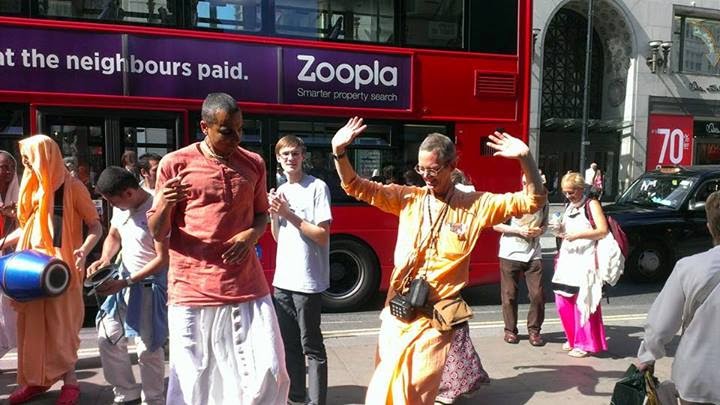
Having the World Harinama Party in London for another week was a great boon for harinama program. Often they would do harinama in the morning in addition to the one in the afternoon. Unfortunately because I had proofreading deadline, I could only attend the afternoon one. Jayadev Prabhu, who plays the accordion and is an accomplished singer, usually comes out once a week on Tuesday. But that week, inspired by the presence of the World Harinama Party, he came out twice. He is great at encouraging the onlookers to participate as you can see in these videos (https://www.youtube.com/watch?v=tWqJGyoae3Q and https://www.youtube.com/watch?v=mMGWJdM7gC4:
Even without the assistance of Jayadev Prabhu, the World Harinama Party was so enthusiastic after hearing the devotees for a while, people would suddenly start dancing, like these schoolchildren did (https://www.youtube.com/watch?v=_UddjYvmMek):
One interesting character who loved to participate in the harinamas is a waiter in the Aberdeen Steak House. Sometimes he would dance to the devotees music inside the restaurant.
Jake, on the extreme left of the above picture, who has been coming to our programs in Newcastle for a year of so, stayed an extra few days after Ratha-yatra and came on harinama.
There were many, many people who danced, chanted, and smiled, encountering our harinama party in London.
The Stonehenge Solstice Festival
This was without a doubt the best Stonehenge Solstice Festival of the five I have attended. One reason was the weather.
It was the first time it was clear enough you could actually see the sun rise, and I think that put everyone in a good mood.
We also had Ratha-yatra, which we did not for two of the last five years because of rain.
We did it from 1:00 to 3:00 a.m. in the morning! I think it is the only Ratha-yatra performed at the time of day, or rather, that time of night.
People are attracted by the opportunity to pull the Jagannatha cart, although often they are a bit intoxicated.
Mahavishnu Swami was there, and his enthusiasm for kirtana boosts the energy level.
I was amazed to see many people, who had never met the devotees before, stay with us for half an hour or even an hour, first listening, then smiling, dancing, and finally chanting along with us. That was truly awesome.
Someone from the TV did a live interview with me. To try to create controversy, they asked about why Hare Krishnas were at a Druid festival. I explained that there is evidence that there was one world culture about five thousand years ago, and different groups separated off from that, so ultimately there is a relationship between the Vedic culture of Krishna consciousness and the Druid one. That was not the most Krishna conscious thing to say but the best I could off the top of my head with no sleep.
At Stonehenge, most people liked the devotees. One man dancing with our Ratha-yatra procession said, as if sharing a realization, “This is all good, isn’t it?”
“Yes,” I replied smiling, “it is all good.” And I recalled Rupa Goswami saying, “Pure devotional service is the beginning of all auspiciousness.” It was wonderful that an apparently ordinary guy could glimpse the truth that Krishna consciousness is all good, or as it is described in the Sanskrit literature, suddha-sattva, pure goodness.
One young man pushing the steel railing of the Ratha cart said, “This is the best steel I have ever touched!”
Bhaktin Erzsebet handed a Solo temple mantra card to a young lady following our chanting party saying, “This is amazing!”
The lady replied affirmatively, “It isamazing!”
One young lady from Bristol, on the right in the above picture, was so happy to see Vishnujana Prabhu and I, who she had seen last March in Rishikesh that she wanted to embrace us.
I went to give her my card, saying I could tell her about all our festivals in the UK, but she said she still had my card from Rishikesh.
People expressed profound appreciation for the free food that Parasurama Prabhu and his staff prepared and distributed. It was beautiful to see.
All in all, many people were happy to encounter the Hare Krishna devotees at Stonehenge, either once again, or for the first time.
Nottingham Harinamas
Usually the Nottingham devotees do harinama on the third Sunday of the month, but on that day in June most everyone was at the London Ratha-yatra. Thus I suggested to them that they do their monthly harinama on the fourth Sunday when I would be there, and they agreed. We chanted together for about an hour and fifteen minutes, and I completed the rest of my three-hour quota on my own. While our party was going through the town chanting, one old, short, black man loudly protested. We kept chanting, and he came toward us, poking me with his cane. The devotees pacified him, and explained to me that he was drunk. We kept moving, and he did not follow us, but the experience was disconcerting and disturbed my mind the rest of the day. The previous time I came to Nottingham, I also encountered some negativity. Some people consider such negative reactions as a reason to avoid such places, while others consider that such negativity means the places are in greater need of the chanting!
I chanted alone the next two days. One young lady took a picture of me chanting near Old Market Square. I gave her my card and asked her to send the picture to me. Usually less than 20% of such people send you the picture, but she did. She is Lucia Buffa, an amateur photographer, and she has a blog with other pictures, including some ones of a cathedral in Cologne where I once chanted with some friends. She is a vegan, and I encouraged her to come to Govinda’s in Nottingham and tell me how she liked it.
Sheffield Harinama
Preston Harinama
Preston Sacred Sounds
Preston Sacred Sounds was special because Pandava Sena youth were very enthusiastic in kirtana. There were some new local singers.
One such lady, in addition to singing nicely, loved to play the djembe.
I had never seen a mother and son dance so much in kirtana as this enthusiastic pair.
Meg, who met the devotees for the first time on harinama in Liverpool and who came to the program there last month, came all the way from Liverpool to Preston for Sacred Sounds and was really happy she did.
Liverpool Harinama
Meg took a break from work to join our harinama and came back again after her work was over. It was wonderful to see her go from meeting the devotees on harinama to becoming a harinama regular almost immediately. It shows us how important it is to go on harinama because there are always some people out there who are looking for Krishna, and are willing to accept His process of chanting.
Not only did she chant, but she distributed invitations to the Liverpool program.
Leeds Harinama
In Leeds we chanted for almost two hours. Some of the local devotees came out. A couple of them were so inspired they decide to come to York for the evening program there.
In Leeds we chanted in a natural cosmetics shop, and all the employees were happy we were there.
York Harinama
The city center in York is fairly small, and we would keep running into the same people.
Dayananda Swami, who was visiting York for some North UK meetings, joined us.
Some girls took pleasure in dancing to our music two and possibly even three times. We also encountered a natural cosmetic shop in York, and all three employees loved the kirtana, and they also danced around in a circle (https://www.youtube.com/watch?v=WyvAONyGwuE).
We even all danced in a circle at one point. I do not recall ever getting such a nice reception in a shop! Thanks to Nikhil Padhiar for the great video! Who would guess that natural cosmetics sellers in The North of England would have a spontaneous attraction to kirtana?
In York Sutapa Prabhu’s party of brahmacaris and Pandava Sena youth distributed all the books they brought and were very happy to see the response of the people there. I think from his good experiences in The North of England, in the future he will come more regularly with the devotees under his care.
Thanks to Preitie and Aji for the photos of York.
To see photos which I have of the above events but did not include in this journal, click on the link below or copy it to your web browser:
Insights
Srila Prabhupada:
Everyone is seeking pleasure but they do not know where to find the actual pleasure which is on the platform of the soul, the platform of consciousness.
If our consciousness is pure at the time of death, we do not have to accept another material body.
As pure soul I am not American, Indian, black, white, cat or dog.
God is omnipotent and thus He can invest His potency in His names.
It is a fact that Lord Jesus Christ is present in His words.
Hearing from Bhagavad gita is the same as hearing from Krishna.
The father will never forget the son, although the son may forget the father.
Even if one does not understand, there is so much power in hearing. Because it is pure transcendental sound, the contamination we have accumulated for millions of lives is washed off. It is hard to give up these material designations, but by this hearing it becomes easy. This is because the material nature becomes slackened, and we become free from passion and ignorance and situated in goodness. Then we become free from hankering and lamentation.
Why are we interested in the Battlefield of Kurukshetra? Because the whole battlefield has become Krishnized.
The hog does not know he is in a nasty condition. He is quite jolly, but we who are situated in a higher status can see.
The real position of the living being is to be the servant of God, but in Bhagavad-gita we see Krishna is driving the chariot of Arjuna, so we should not consider being a servant of God is like being a servant in this world.
We are consciousness, and we are subordinate to the supreme consciousness, in other words, we are eternal servants of God.
The modern philosophers set aside the problems of birth, death, disease, and old age, but this is not human life. Human life is meant to make a solution to these problems.
Pious activities give one wealth, education, aristocracy, and beauty, but when we possess these advantages we still must experience birth, death, diseases, and old age. Therefore we do not care for ordinary pious activities.
from a lecture on Srimad-Bhagavatam1.3.29 given on October 4, 1972 in Los Angeles:
God is everywhere, but we do not want to see God. That is the only difficulty.
If you follow the principles of devotional service, it is not very difficult to see God and to understand God.
You may not think the God eats, but in Bhagavad-gita (9.26), Krishna says, “I eat.”
from a letter written on September 18, 1972:
“ . . . this sankirtanaor street chanting must go on, it is our most important program. Lord Caitanya’s movement means the sankirtanamovement.”
Bhaktisiddhanta Sarasvati Thakura:
from Vaktritavali (a compilation of notes on his lectures):
[Note: In the month of June, I proofread Vaktritavali, soon to be published by Touchstone Publishing, and I took notes on my favorite parts. I am including one quarter of these notes in four issues of this journal, and this is the second quarter.]
“Everyone in this world is greedy for sense gratification because of bad association, of which they have plenty. When these people speak on religious subjects, their audiences always ask first if there is anything in their religion that will please their senses. They are eager for material enjoyment. The whole world is filled with phrases like ‘my enjoyment,’ ‘my happiness,’ ‘my peace,’ ‘give me,’ ‘give me,’ ‘give me.’ No one thinks even accidentally about Krishna’s sense gratification. The day we understand that our only duty is to serve the master of the senses, on that day we will find our fortune.” (p. 169)
“Everyone and everything in existence should serve the Supreme Personality. No matter what our condition, our only duty is to serve Lord Hari. Either in this world or the next, everyone, including the demigods, human beings, animals, birds, and so on, has no duty other than to serve the supreme eternal Lord. No other activity is natural to the soul because all other objects and tendencies continuously change.” (p. 170)
“The soul has the propensity to engage in five kinds of relationships with Sri Krishna. That is, it is the eternal propensity of the soul to serve Krishna by manifesting five kinds of rasasthrough five kinds of ratis[attachments]. The five rasasare santa, dasya, sakhya, vatsalya, and madhura. Santa-rasa is a neutral existence without anything unfavorable. Dasya-rasahas a little affection, so by comparison, it is superior to santa-rasabecause it includes the qualities of santa-rasa. Sakhya-rasais further advanced. In this rasathere is no thorn in the form of reverence. Instead, its main ornament is love and devotion. Vatsalya-rasais superior to sakhya-rasa. This rasahas such thick affection that the worshipable object appears to be under one’s care. Madhura-rasais topmost, and it includes the beauty and greatness of santa, dasya, sakhya, and vatsalya.To serve Sri Krishna with these five kinds of ratis,or types of attachment, without interruption or motivation is the soul’s eternal duty.” (p. 171)
“The phrase ceto-darpana-marjanaindicates the removal of unauthorized philosophical speculation, the cheating propensity, previous anarthas,and all inauspiciousness from the heart. By properly performing krishna-kirtanaall material desires and philosophical misunderstandings are vanquished. By properly performing krishna-kirtanathe blazing forest fire of attachment to karma and jñanaare extinguished. By properly performing krishna-kirtana the lotus of all auspiciousness blossoms in the heart and is as soothing as the cooling rays of the moon. Proper krishna-kirtanais the beloved husband of the wife of transcendental knowledge. For those who chant, it enhances the ocean of bliss at every step, and it bestows on them the ability to relish transcendental nectar. It gives love of God and bestows on the soul the freedom.” (p. 173)
“After many lifetimes a living entity comes to the human form of life, which is rare and temporary yet can bestow spiritual perfection. There is no doubt that serving the Supreme Lord is the only duty of human life. The ultimate goal of the human form of life is to gain knowledge about the Supreme Lord. In this ever-changing world, human beings will either advance toward godly life or degrade themselves and become animals. Without serving the Supreme Lord and remaining subordinate to Him, those temporarily in human bodies can never be benefited.” (p. 181)
“One becomes attracted to serving Sri Caitanya in proportion to how much one hears of His mercy. One who has heard a complete description of that supreme, cognizant personality dedicates his life completely to His service. Sri Caitanyacandra is full in sixteen attributes and qualities. Therefore, if His glorious kathaenters the living beings’ hearts, it will certainly completely attract them to His lotus feet. One who has partially heard caitanya-kathawill dedicate his life only partially to the Lord’s lotus feet. Until people sincerely and constantly engage in Sri Caitanyadeva’s service with body, household, children, wife, mind, speech, and everything else they may have, we can understand that they have not heard the glories of Sri Caitanya completely.” (p. 202)
“Those who have been counted as Gaurasundara’s associates through intimate service are His sons. Atma vai jayate putrah: according to this statement, Sri Gaurasundara spreads the holy name and love of God by appearing in the pure hearts of His associates as their father. Those who are blessed with love of God and are completely under the shelter of the holy name are His sons; they are Sri Gauranga’s own family. The descendants who belong to this Acyuta-gotra have protected and continue to protect the flow Sri Gaurasundara released, spreading the holy name and love of God.” (p. 206)
“This Sri Krishna Caitanyadeva made the universe glorious by preaching about Krishna. He bestowed the beauty of His own devotional service, which is the topmost transcendental mellow and had never been distributed.” (p. 213)
“ . . . the living beings’ transcendental eyes, which are formed by their service-inclined hearts.” (p. 216)
“But the word Krishna is nondifferent from Krishna’s form, qualities, and activities; it is Krishna Himself. If we simply chant the name Krishna, we realize Krishna’s form and spiritually variegated characteristics. Therefore Krishna alone is the supreme truth – the Absolute Truth with an eternal form that can be perceived through spiritualized senses of taste, smell, touch, and so on. He is the object of meditation for the soul. We are meant to serve Him with our transcendental senses. It is He who is to be seen with the eyes, heard with the ears, whose fragrance we inhale with the nose, and whom we touch with the fingers. He is the object of all the senses.” (p. 216)
“We cannot understand Krishna’s most magnanimous pastimes properly when He kills Aghasura, Bakasura, and so on; but in the pastimes of Gaurasundara, who is nondifferent from the son of Nanda, we can understand His magnaminity. As Gaurasundara He is ready to bestow the supreme auspiciousness on fallen atheists like us who have been deceived by material knowledge. He is always eager to give even Krishna Himself, what to speak of others. The greatest charity He wants to award us will allow us to serve Krishna face to face. Let the most magnanimity of the most magnanimous Gaurasundara, which has never before been distributed, be spread all over the world.” (p. 217)
“Sri Gaurasundara is prepared to give that coveted object Krishna to the whole world. But the godless world is living in darkness, thinking it light, and in ignorance, thinking it knowledge.” (p. 217)
“According to Buddha’s followers, Sakyasimha left home with the selfish interest to attain nirvana. Sri Caitanya left home for a different reason. He went to the forest simply to bestow on humanity the eternal treasure of freedom from their eternal poverty. He lacked nothing. Sri Caitanya is the only husband of all women, the only son of all parents, and the only friend and master of all who are related to Him in friendship or servitorship. It is not that His great contribution will remain confined to Bengal and that only the brahmanaswill benefit. The whole world – the people of all castes, creeds, and faiths, the sinful and the pious – and all living beings can give up their pride and accept this greatest of all gifts that Sri Caitanya Mahaprabhu offered them. This gift is neither imperfect nor narrow-minded because He Himself is the most magnanimous. He is the Supreme Personality of Godhead, eternal, and full of knowledge and bliss. He is the Absolute Truth, eternal and cognizant, and He has descended to relieve humankind from their ignorance. He has incarnated to deliver all conditioned souls.” (p. 221)
“May the son of Saci appear in the core of our hearts. He is directly Lord Hari. In His previous incarnations He gave many things, but now He has come to give a wonderful gift He has never awarded before.” (p. 223)
“He [Gaurasundara] awarded the delight of His own devotional service to the living entities. He revealed the difference between the services rendered by devotees in each of the five rasas.To distribute the highest transcendental beauty of His own devotional service, which is extremely rare and has never before been awarded to the desertlike burning hearts of poverty-stricken fallen souls like us, He made His advent in this world.” (p. 224)
“Because the names, forms, qualities, and activities of this world are temporary, and because all mundane beauty is eventually covered by ugliness, the wise do not become entangled in mundane names, forms, qualities, activities, opulence, power, fame, beauty, knowledge, or renunciation. They know the flow of worldly happiness will dry up because we can experience it only with our limited, material senses. The living beings here want more than they deserve. As a result, they lose even what they do deserve.” (p. 225)
“So it is only by the mercy Sri Gaurasundara that we have a full illumination of that rasaat present. The soul can easily attain madhura-rasabecause it manifests along with the soul. You cannot develop it by some artificial process of sadhana.Understanding it is beneficial to all. Such a unique thing the Lord awarded and propagated.” (p. 228)
“Sri Gaurasundara said, ‘The congregational chanting of Krishna’s holy name is a human being’s only duty.’ Krishna-sankirtanais His greatest gift because by participating in krishna-sankirtana,the living beings can attain the treasury of love of God in Vraja, something rarely attained by the best of the demigods, the greatest of sages like Narada, or even the best of devotees like Uddhava.” (p. 228)
“But the Brahman emanates from Krishna, and Krishna is its cause. The attempt to ascertain the cause of the Brahman by the ascending process may currently pass as erudition, but it is actually great foolishness. Such Brahman realization is subject matter for human knowledge, but Sri Gaurasundara said that Sri Krishna alone is the cause of all causes.” (p. 229)
“If we perform true krishna-kirtana,then even people who are fully absorbed in and bewildered by material enjoyment can attain the actual perfection of life. King Prataparudra is the prime example of this. Pure krishna-kirtanawill give liberation even to the attending trees, stones, animals, birds, men, women, and anyone else. The trees, creepers, animals, and birds of Jharikhanda are the prime example of this. It’s only because people are not performing pure krishna-kirtanathat the living beings are not becoming liberated. Gaurasundara came to this world to benefit all living beings, including the trees, animals, and birds as well as the human beings.” (p. 233)
“I do not know if the Bhagavatamverse, sa vai pumsam paro dharmah,is found in any other literature, but by discussing this verse, the desire to practice a narrow sectarianism and an insignificant, deceitful religious synthesis can be destroyed.” (p. 234)
“If while chanting the holy name of Hari someone develops attachment for material life – or if his propensity for material enjoyment increases – we can understand that his chanting is not hari-nama.” (p. 239)
“Sri Gauranga-sundara is the preacher of the Absolute Truth. He explains that the Absolute Truth personally reveals Himself when faced with a fortunate living being’s desire to serve Him.” (p. 240)
“Sri Caitanya’s devotees are always eager to do good for us, but we are ever ready to stop them. Our first obstacle is our gross body and the second our mind.” (p. 240)
“Hari’s holy name can be chanted even while we’re passing stool or urine. The body’s external functions are done out of habit, and they create no bar to chanting the Lord’s holy name. We can chant the holy name when we are asleep, awake, and when we go to bed. We can chant whether we are aristocrats or born in a low family. We can chant the holy name in any condition of life. Everyone, including sudras, outcastes, mlecchas,women, men, boys, youths, and the old, are eligible to chant the holy name. One can chant in a solitary place or congregationally – alone or with many people. One can chant neglectfully or with faith.” (pp. 249–250)
“When an uttama-bhagavataappears in a particular family, one hundred generations before and after him are delivered. When a madhyama-bhagavataappears in a particular family, fourteen generations before and after him are delivered. When a kanistha-bhagavataappears in a particular family, three generations before and after him are delivered.” (p. 253)
“But it is seen in the material world that the devotee who takes birth in a low-class family appears diseased or foolish by material vision. This has great purpose. If ordinary people see that devotees appear only in high families and that they are healthy and educated, they will become discouraged. So to benefit all people, Lord Gaura Krishna has His devotees appear in different classes and then display great compassion toward all fallen and unqualified beings.” (p. 254)
“Although the marginal energy is conditioned by the external energy and so the living beings appear to have material qualities, it does not mean they don’t also hav
Diary of a Traveling Sadhaka, Vol. 10, No. 11
By Krishna-kripa das
(June 2014, part one)
Scotland, The North of England, Nottingham, London
(Sent from Manchester, England, on July 13, 2014)
I started the month of June spending a couple days in the Newcastle area on some very successful harinamas. Then I went to Karuna Bhavan, our eco-farm in Scotland, where I joined Sutapa Prabhu and some new devotees from Bhaktivedanta Manor in doing harinamas and evening programs in Glasgow and Edinburgh. I also went to Sacred Sounds programs at Karuna Bhavan and Findhorn. Then I chanted with friends from the Newcastle area, Scarborough, and Leeds at one of Newcastle’s biggest festivals, an environmental festival, called the Green Festival. Then I spent a couple of days chanting with my friends Toshan Krishna Prabhu and Bhakta Dan in Manchester, one day in Sheffield, and a day in Nottingham, all en route to London for the Ratha-yatra. The World Harinama Party was already in London, and we had some amazing harinamas before and after the Ratha-yatra. London Ratha-yatra was wonderful as always, bringing devotees together from all over the UK, and creating an interest in people from all over the world in Krishna consciousness.
I share insights from Srila Prabhupada’s lectures, excerpts from Vaktrtvali, compilation of notes on Bhaktisiddanta Sarasvati Thakura’s lectures, by one of his disciples, excerpts from Satsvarupa Dasa Goswami’s journal, and notes from lectures by Mahavishnu Swami, Dayananda Swami, and a new devotee from Bhaktivedanta Manor.
Itinerary
July 13: Manchester harinama
July 14: Manchester
July 15: Chester
July 16: Sheffield
July 17–18: Manchester harinamas
July 19: Manchester Ratha-yatra
July 20: Prague Ratha-yatra
July 21–27: Baltic Summer Festival in Lithuania
July 28–August 3: Kostrzyn (Polish Woodstock)
August 4: Bratislava
August 5–7: Czech Padayatra
August 8: Ancient Trance Festival (near Leipzig)
August 9: Leipzig Ratha-yatra
August 10: Ancient Trance Festival
August 11–13: Prague
August 14–17: Trutnov (Czech Woodstock)
August 18: Czech Farm / Vyasa Puja
August 19–23: France / Holland
August 24: Amsterdam Ratha-yatra
August 25: London
August 26: Nottingham
August 27: Sheffield
August 28: Preston
August 29: Liverpool
August 30: Newcastle
August 31: Leeds
September 6: Dublin Ratha-yatra
September 11–mid November: New York
Harinama in Newcastle
Sunday, the very next day after the eight-hour kirtana, as I was chanting and walking down the hill from the temple to the Newcastle city center, one guy smiled broadly as I passed him,so I gave him a invitation for ISKCON Newcastle’s public programs. I can’t always tell if people are smiling in approval or in disbelief. From his reaction to getting the invitation, I was sorry to see he was smiling in disbelief. Still, it turned out that he gave that invitation to a friend who came and brought two others to our Sunday feast, and all of them enjoyed dancing in kirtanaand taking prasadam,and they said they’d return for our Wednesday kirtana night!
Sunderland Harinama
Six of my Hare Krishna Newcastle friends greatly pleased me by coming on harinamain Sunderland. It makes such a difference to have a larger party!
Altogether there were seven devotees from seven countries: Ukraine, England, Hungary, Finland, China, India, and the U.S.A.! It reminded me of Srila Prabhupada saying that ISKCON is the real United Nations!
In particular, Kirtida Dasi led a lively kirtana.
Afterward we had kirtana, talked about the holy name, and had dinner at Ramai and VrindaPrabhus’ home in Sunderland, making for very wonderful day.
Kishori reminded us that kids consider all objects exist for oral enjoyment.
Harinamas in Glasgow
When I arrived in Scotland, I found the devotees decided to start their daily harinamas the following day, so before going to Karuna Bhavan, which is forty minutes from Glasgow, I chanted downtown outside a mall under a overhang where I was protected from the rain. On my first day in Glasgow it seemed one of the worst places where I chanted in terms of response, but things picked up the next two days.
One day in Glasgow, one man, who attended programs in Glasgow when the devotees had them regularly, talked with me and bought a Chant and Be Happy from me.
Karuna Bhavan
Tbe devotees had a Sacred Sounds event at Karuna Bhavan itself. At these events, the devotees generally wear contemporary clothes, play contemporary instruments, and sing a variety of mantras and songs glorifying Krishna and His incarnations rather than just chanting Hare Krishna, so people not attached to chanting Hare Krishna yet do not feel so uncomfortable. They invited the woofers (the organic farm workers who live there) as well as their congregation.
Another day Raghunatha Bhatta Prabhu gave me the opportunity to do a question and answer session for the woofers. They were from different places, some as close as Preston in Lancashire, England, and some further away like Florida, South Africa or Australia, and in general, they were open-minded and curious about the philosophy. The girl from Florida, a philosophy major named Alexis, spent a year at Florida State University before transferring to University of North Carolina at Chapel Hill. I told her how we chant at First Friday in Tallahassee, and she remembered waiting in the lines for the Krishna food there and the devotees singing. She also remembered talking to a monk who said he went to Brown University, which was probably me, since I think I am the only one who matches that description there.
I impressed upon her that Bhagavad-gita is such an important book on philosophy that no philosophy student’s bookshelf would be complete without it.
She liked the kirtana in Edinburgh, and talked about visiting Bhaktivedanta Manor during her summer vacation and checking out the Hare Krishna programs in Chapel Hill when she returns to America.
Sometimes the dress of the deities reflects like local culture such as these plaid outfits for Sri Sri Gaura Nitai.
Javat-vasi Prabhu, a humble Vaishnava who likes to chant, cooked many wonderful meals for the devotees, guests, and woofers. Here he chants on his plaid bead bag, another Scottish innovation.
Karuna Bhavan implements different strategies like heating with wood to make the project more environmentally sound. This poster describes them.
I found the devotees friendly, and I enjoyed my stay in Karuna Bhavan and hope to return each year.
Glasgow Sacred Sounds
The Karuna Bhavan devotees, headed by Prabhupada Pran and Mother Vrinda Prabhus, did a sacred sounds event at the University of Glasgow. Both regulars and new people came, and a couple of the Karuna Bhavan woofers. People stayed for quite a well afterward talking with the devotees.
Edinburgh Harinama and Program
One striking thing about our Edinburgh harinama for me was chanting through a large park where three or four girls, perhaps ten or twelve years old, were sipping their sodas on a bench. They were so attracted by the chanting party, they abandoned their drinks and joined our procession, dancing through the rest of the park for ten or fifteen minutes. I would have a taken a picture of them, but I was leading and playing the harmonium at the time.
Another special thing was that two people who met us on harinama came to the evening program that night. Because I like to do three hours of harinama, and we had only done an hour and a half, I decided to do another hour and a half by myself. One person came from my harinama to the program as well. He was someone who had visited Bhaktivedanta Manor but did not know about our regular programs in Edinburgh. It is not every day that three people come to an evening program from harinamas!
At the program, Sutapa Prabhu’s party led some very lively chanting.
One regular took pleasure in playing a big drum.
Several of the woofers from Karuna Bhavan came, and it made me happy to see their enthusiastic participation.
Findhorn Eight-Hour Kirtana
Findhorn is a community in Northern Scotland which I remember reading about in the 1970s, before I became a Hare Krishna devotee. By working with the nature spirits, the residents were able to get unusually high yields of produce. Raghunatha Bhatta Prabhu told me they did a kirtana program there last year, and of all the programs they did it was the most well received, with many people very quickly responding to the chanting by rising to dance spontaneously. Because of my knowledge of the community and Raghunatha’s positive experience, I was eager to attend our eight-hour Sacred Sounds event there.
We drove up to Findhorn in the northwest of Scotland, passing by mountains bearing snow even in June.
One yoga teacher who came with us, got into dancing almost as much as I did. The devotees chanted lots of mantras other than Hare Krishna, saving that best of mantras for last. Unfortunately, I had to leave half way through the program because I wanted to return to Newcastle for the second and final day of the Green Festival, one of our best outreach opportunities each year in Newcastle. Raghunatha Bhatta Prabhu said the final Hare Krishna kirtana was most loved, and some people even cried in ecstasy. I learned to never go to a Sacred Sounds program if I have to leave early and miss the Hare Krishna chanting and the chance to talk with the most favorable people at the end, because those are the best parts for me.
Newcastle Green Festival
I missed chanting at the Green Festival in Newcastle last year as I was visiting my sister in London that weekend, so I really wanted to go this year. I advised my friends in the Newcastle temple to go last year, and they went both days and were very positive about it. This year, my friend, Raghunatha Bhatta Prabhu invited me to an eight-hour kirtana program at Findhorn in Northern Scotland on the Saturday, but I wanted to make sure I could go and chant at the Newcastle Green Festival on Sunday. Turns out Saturday was pouring rain in Newcastle, so I did not miss out. Sunday was also predicted to be a day of rain, but it did not rain until 9:00 p.m., well after the festival was over, by the mercy of the Lord.
Govardhan Dasi and her husband, John, came all way from the Scarborough, two hours away, and joined myself and Bhakti Rasa Prabhu in what turned out to be a six-hour harinama!.
Later a flute player came, and played with us on two different occasions throughout the afternoon.
Preitie and three friends came from Leeds, also two hours away, and other devotees from Newcastle joined us, and we had a good-sized party.
Sometimes people would dance with us.
A very high percentage of people took invitations to our temple programs.
Elina of Latvia, the blond-haired devotee lady in the picture below, really surprised me. She came on harinama for the first time ever in her life in Leeds two weeks ago and liked it so much that she was willing to ride two hours each way in a car to do it again in Newcastle.
We chanted all the way back to the temple.
Thanks to all the devotees who came together to make the Green Festival harinama a success!
One Chinese lady devotee, who does book distribution, visited Newcastle. She would distribute twenty hard bound Srila Prabhupada-lilamritas in a day, as well as other books. It goes to show that if you surrender, you become empowered.
Chanting in Manchester
I chanted in Manchester with my friends, Toshan Krishna and Bhakta Dan Prabhus, who have a set up similar to Rama Raya Prabhu in New York City.
They also sit down, do kirtana, and distribute books, incense, and invitations to the temple.
Govinda Gopal Prabhu, a great mridanga player, who works nearby, would sometimes come and play with them.
Some new people, like the well-dressed man young man on the left, would also come periodically. That man started reading Bhagavad-gita andSrimad-Bhagavatam, and chanting japa as a result of their program.
Chanting in Nottingham
Enroute from Sheffield to London, I decided to visit my brahmacari friend, Shyamanandana Prabhu, who is running the Govinda’s restaurant in Nottingham, and to do harinama in that city and advertise the restaurant at the same time.
Five devotees in that congregation, all but one of their usual harinama crew, were able to come out with me, which is amazing because at midday Thursday most congregational devotees are working. While we chanted together downtown, an Indian man familiar with Bhaktivedanta Manor was happy to learn of our weekly programs in Nottingham.

One little boy was fascinated with the karatalas and did an amazing good job of playing them.
After we chanted an hour together I chanted another half an hour alone. One young man, who had eaten at our restaurant, but preferred other mantras than Hare Krishna, gave me a donation and ate a sandwich with a friend nearby. One middle-aged man came by and stood in front of me yelling nasty things about Hare Krishna at me for a minute or two without letting up. I just kept chanting as I did not want to hear what he was saying. I was at an advantage because I had an amplifier. After he passed me, he called someone on his cell phone and then returned, going in the other direction. Again he yelled at me, and I just kept singing. After he left, a young man who had been passing out invitations to a business just across from me the whole time, and who watched the whole incident, came up and gave me a donation, as if to show he approved of my ignoring the angry rascal, and the young man who had previously given me a donation, smiled as he left and indicated he was happy I did not let the angry man disturb my transcendental vibrations. I would like to spend more time in Nottingham elevating the consciousness of the place and helping promote our restaurant there.
London Harinamas
The World Harinama Party was in London before, during, and after the London Ratha-yatra, and we had lots of wonderful harinamas. Once a month on a Saturday, many devotees from around the UK join to do four hours of harinama in London, and in June that was the Saturday before the Ratha-yatra.
Many, many people danced with the devotees.
Many expressed joy meeting the kirtana party.
Some watched from above.
Some watched from buses.
At Piccadilly Circus, a parade [or carnival, as they say in the UK] called “Jesus Army” passed our harinama. I quickly took a picture.
Apparently one of them stuck out his tongue at us as he passed. I was not intentionally trying to catch that on camera, but it is my only picture of scene, so I share it.
Kings Cross Program
There is a program each Friday at Matchless Gifts in Kings Cross. On the Friday before the Ratha-yatra, Mahavishnu Swami did that program, and there was lively kirtana with lively dancing.
London Ratha-yatra
Lord Jagannatha was not well before the Ratha-yatra, and His altar was decorated with “get well soon” cards.
The enthusiastic London book distributors celebrate the Ratha-yatra season with a mini-marathon called the Ratha-yatra Sprint, where they do increased book distribution for four days.
Here Srila Prabhupada’s altar is decorated with books to remind people of Srila Prabhupada’s desire they be distributed.
London Ratha-yatra is always wonderful, with Lord Jagannatha, Lord Baladeva, and Lady Subhadra atop three large carts on a two-hour procession to Trafalgar Square.
The Holland family, consisting of Agi’s Hungarian mom, her husband, Clive, and her son, Mark, came from Chester, all decked out for the festival, as did many others from the Manchester area. Many devotees also came from Newcastle and many other parts of England.
For me these days, dancing for Lord Jagannatha is the focus of the Ratha-yatra procession.
I also carry invitations to the temple, or sometimes to the stage show, to pass out to interested persons I see in the procession.
Thanks to Vishnujana Prabhu for the picture of Lord Jagannatha and Maha Raw for the pictures of me.
Mahavishnu Swami briefly described the philosophy and ended with a sales pitch for the hard cover, abridged Srila Prabhupaada-lilamrita, which they were trying to distribute 1,008 of. He asked people to buy the books right then and there. Unfortunately, there were no books right there at the stage, and so he asked that books be brought. I did not see anyone doing anything to help him, so I went to the book stall and grabbed five books, and he asked the people to raise their hands if they wanted one, and I sold all five just like that. It was nice to be spontaneously engaged in book distribution in that way.
I met a girl who seemed attracted by our program, and I asked her where she was from. I was so surprised when she said, “Newcastle,” which is my spring/summer base and is six hours by bus or three hours by train to the north. I gave her an invitation to our programs there and briefly described them.
As usual, I met other people from around the world, and told them about our programs in their locations. I introduced one Dutch lady to a Dutch lady devotee who was visiting for the festival.
After the Ratha-yatra festival, the World Harinama Party did a very lively hour and a half long harinama back to the temple as you can see in this video (http://youtu.be/dXTyIJee6wU):
It was an amazing day with harinama to the beginning of the Ratha-yatra parade, the chanting in the Ratha-yatra procession itself, chanting at the stage show, and then a harinama back to the temple at the end of the day.
To see the pictures I took but did not include in this blog, click on the link below:
Insights
Srila Prabhupada:
from a lecture on Srimad-Bhagavatam 1.2.6 on February 26, 1974, in Calcutta, India:
Unmotivated, uninterrupted devotional service greatly satisfies the body, mind, soul, and Supersoul.
Varnasrama dharma is not spiritual but material, but it marks the beginning of spiritual life. Worship of the Supreme Lord Vishnu is actual spiritual life.
Instead of being satisfied with the fruits and vegetables God has provided, you open slaughterhouses and kill innocent animals. Your life is full of sinful activities, and you want to be happy. That is not possible.
Our Krishna consciousness society is simply teaching people how to love Krishna for then one’s life will be successful.
When you actually become a devotee, whatever is needed will be provided.
from a Ratha-yatra lecture given in San Francisco on June 27, 1971:
“But as spirit soul, our main business is to understand what I am, where from I have come, where I shall go, why I am under the tribulation of threefold miseries of material condition. These questions must be answered. If we do not question, just live like animal.The animal cannot question, neither they can understand the answer, but [in] the human form of life they can question and understand the answer also. In the Vedanta-sutrait is called brahma-jijñasa,inquiring about the Supreme. So that is our prerogative. Please take chance of this human body and try to understand yourself and cleanse your heart from the dirty things by chanting Hare Krishna, Hare Krishna, Krishna Krishna, Hare Hare / Hare Rama, Hare Rama, Rama Rama, Hare Hare.”
Bhaktisiddhanta Sarasvati Thakura:
from Vaktrtavali (a compilation of notes on his lectures):
[Note: I proofread Vaktrtavali, soon to be published by Touchstone Publishing, in the month of June and took notes on my favorite parts. I will include one quarter of these notes in this issue of this journal, and include another quarter in each of the next three issues.]
“Real, pure Vaishnavas never nourish or encourage narrow, sectarian mentalities. Without understanding a Vaishnava’s most magnanimous and ideal character, if one considers that Vaishnava to be narrow-minded or sectarian, then it does nothing but expose one’s own narrow-minded, mean mentality.” (p. 15)
“Since the minute conscious living beings’ existence in the material world as demigods or human beings causes them excessive distress, that existence is simply punishment for them. Enjoying in heaven and suffering in hell because of one’s aversion to Hari are both impediments to the happiness they would derive from performing eternal service. For the living beings, both the desire for temporary happiness and the desire to free themselves of distress are simply obstacles on the path to attaining the unlimited and pleasant service to the Supreme Lord.” (p. 18)
“We have been coming here for the last three years. Some of us have come forward to speak the truth after sacrificing everything we had. Still, people are in the same darkness they were in before. They are completely disinterested in their actual advancement. They have time for everything else. They have a taste for everything else, but they have no time to hear the truth. This is because when serving the Absolute Truth there is no opportunity to gratify one’s own senses. In discussions about the Absolute Truth there is no discussion of material enjoyment or liberation. There is only the desire to please that One without a second, that nondual substance; there is only a desire to please Krishna’s senses.” (p. 34)
“It is not that sinful, business-minded people are not disregarding these teachings, but anyone who is inquisitive about the actual truth realizes there is no validity to what those envious, business-minded people have to say.” (p. 35)
“Offenses to the spiritual master and the Vaishnavas is the root of the
kirtanafamine: Because people nowadays disrespect the spiritual masters, there is a kirtanafamine. These days, kirtanarefers to kirtanaabout matter, kirtanaabout business, kirtanato accumulate money, women, and fame – in other words, kirtanafor sense gratification. Kirtanais not being performed to please Krishna’s senses or to please Lord Hari. Mahaprabhu called dancing, singing, and playing musical instruments intoxicating, and if these are done to serve Lord Hari, they are the best form of bhajana.Kirtanatoday has fallen into the category of mundane intoxication.” (p. 39)
“There are three kinds of aversion to the Supreme Lord, namely, the endeavor to accumulate wealth, the endeavor to enjoy women, and the endeavor to accumulate name and fame. One should engage his entire body, mind, and senses in the service of the Supreme Lord, and then only will this enjoying mentality go away. Then only will he realize that Krishna is the sole enjoyer and we and everything else in this world are meant for His pleasure.” (pp. 40–41)
“Chanting about Hari is the only way to display mercy toward other beings. There is not – nor can there ever be – a better way to show compassion toward others than by performing
krishna-sankirtana.” (p. 41)
“When someone sees a person entering a hillside forest filled with different kinds of trees, he may imagine that person merging with the forest rather than understanding what has actually happened – the person remaining an individual and enjoying the beauty of the individual trees. The actual truth is invisible to the observer: the seer, the process of seeing, and the object being seen have remained intact. Similarly, because people who follow the path of dry argument and see only from the world below Brahmaloka don’t understand the varieties present in Vaikuntha, they imagine the nondual substance as formless.” (p. 44)
“The object of
aisvarya-rasais Lord Narayana, husband of Laksmidevi, and the supreme object of madhurya-rasais Lord Krishna. In the thin love of aisvaryaKrishna feels no satisfaction. The followers of aisvarya-rasathink that if they have a mood of love and affection toward the Lord, their service will slacken. This is not a fact. Service with love and affection is more intense and brings one closer to the object of one’s love.” (p. 45)
“Because the Supreme Lord, who is fully
sac-cid-ananda, always resides in Nanda’s body, he is also full of bliss, and that is why his name is Nanda.” (p. 47)
“If Sri Gaurasundara’s teachings are preached in Europe, and if the inhabitants of that place ever become fortunate enough to accept them,.they will certainly become astonished.” (Vaktrtavali, pp. 88–89, from an address at Srila Isvara Puri’s birthplace Kumarahatta (Halisahara) on February 2, 1925)
“We can never repay in our unlimited millions of lifetimes even one-hundredth of a portion of the amount of debt we have incurred at Sri Rupa’s lotus feet. Sri Rupa Gosvami Prabhu’s
Bhakti-rasamrita-sindhu [The Nectar of Devotion] is the sole compass for pure devotional service.” (Vaktrtavali, p. 102, from a lecture in Malda, West Bengal, on February 14, 1925)
“Simplicity and truthfulness are the only identifiers of a brahmana. Only simple-hearted and sincere persons can take shelter of devotional service without duplicity.” (p. 112)
“Those who think there is sense gratification in prema-dharma should understand they are harboring a desire for sense gratification in their hearts.” (p. 117)
“All human beings, who are like co-wives, are servants of Krishna alone. When we understand this, we don’t feel any difficulty and we realize our eternal constitutional form – that is, we realize ourselves as Vaishnavas. Then the natural affection between one Vaishnava and another develops.” (p. 117)
“If we are duplicitous, we can worship for millions of lifetimes, play mridanga for millions of lifetimes, perform kirtana for millions of lifetimes, and try to demonstrate deceit as religion, but while worshiping or playing the mridanga or performing kirtana we will end up as travelers on the path of fruitive activities. We will not develop bhakti.” (p. 119)
“If a person gets a boil and the doctor advises him to slit his throat so he can forever be relieved of the pain, even if the ignorant praise such an act, it is still foolish. To bewilder the demonic, Lord Vishnu incarnated as Buddhadeva and Shiva incarnated as Sankaracarya to teach people to alleviate their distress by destroying themselves. But the most magnanimous Lord Gaurasundara [Caitanya], who shows the kind of compassion that causes no inauspiciousness, did not preach in such an unreasonable way.” (p. 132)
“Sri Vallabhacaryaji Maharaja offered a great service to the world of Vaishnavas, and so the Vaishnavas of the whole world are indebted to him. He properly refuted the arguments of Mayavada philosophy. His Anubhasya commentary on Brahma-sutra is evidence of that.” (p. 142)
“One who has full faith in the Supreme Personality, Krishna, does not separately worship any demigods or goddesses. Rather, he is aware of the Srimad-Bhagavatam verse (4.31.14) that begins yatha taror mula nisecanena tripyanti tat skandha bhujopasakhah: ‘As pouring water on the root of a tree energizes the trunk, branches, twigs, and everything else, and as supplying food to the stomach enlivens the senses and limbs of the body, simply worshiping the Supreme Personality of Godhead through devotional service automatically satisfies the demigods, who are parts of that Supreme Personality.’ If we worship incomplete objects, other incomplete objects become envious.” (p. 152)
“The Supreme Lord never bewilders living beings. It is maya who covers them with her covering and throwing potencies. Maya is always ready to bestow the Supreme Lord’s mercy on any being; she only bewilders those who are hesitant to sincerely accept that favor.” (p. 153)
“Other than serving Krishna the Vaishnavas, who are eternal servants of Krishna, have no duties. But because of forgetfulness of Krishna, living beings accept the body as the self and, along with that acceptance, forget they are Krishna’s eternal servants. At that point they rush off to serve maya with their gross and subtle bodies. Although the living beings are by nature Vaishnava, they have the freedom to consider themselves non-Vaishnava.” (p. 153)
“When a living being has been given love of God by Sri Gaurasundara and has therefore become the Lord’s associate, he no longer has any duty other than to distribute love of God. He will remember Sri Gaurasundara’s order, prithivite ache yata nagaradi grama sarvatra pracara haibe mora nama and, as an order carrier, become a transcendental postman like Sri Nityananda and Sri Haridasa. At that time, he will go door to door and beg: bhaja krishna kaha krishna laha krishna nama krishna pita krishna mata krishna dhana prana ‘Say “Krishna,” worship Krishna, and chant Krishna’s names. Krishna is your mother, Krishna is your father, and Krishna is your life and wealth.’” (p. 158)
“ . . . to try to see the superior object with the help of worldly experience, knowledge, and sensual expertise, is called the ascending path. But you cannot touch reality this way. When we use our imagination, the Absolute Truth often appears imaginary – and it awards imaginary knowledge.” (p. 163)
“When sunshine emanates from the sun globe and enters our eyes, there is nothing blocking the sun globe from our eyes. So by looking, we gain direct knowledge of the sun. The sun is far from the earth, and from its own position the sunshine emanates. Therefore there is no distortion or change as the sunshine comes to earth. In the same way, knowledge of the Absolute Truth descends and helps us understand it. This is called the descending path. Only when the Absolute Truth, who is self-manifest and independent, displays His own characteristics in this world without flaw or distortion can we gain actual knowledge. This is the descending path – the path of service to the transcendental Lord.” (p. 163)
“Our mental state also changes at every moment. The mind we have in the morning is different from the mind we have at noon, which is different again from the mind we have in the evening, at night, and by dawn.” (p. 163)
“If the mind is really ‘me,’ then why does the mind remind me what I am not? The mind doesn’t contemplate spirit; it keeps itself engaged in perceiving dead matter. This means the mind is not made up solely of spirit. Since the mind is mixed with matter it is unable to see spirit.” (p. 165)
“The soul’s nature is simply to cultivate a relationship with the Supersoul. The soul has no other propensity. When we misuse the soul’s propensity by becoming attached to objects other than the Complete Whole, the soul’s nature becomes dormant. The soul’s propensity is not lost – it can never be lost and is always active in one way or another – but the soul can only act properly when it cultivates its relationship with the Supersoul.” (p. 166)
“The idea that the spirit’s natural propensity is to live without spiritual variety is nothing but atheism. In the conception of the soul merging with the Supersoul, the soul has no function. The soul is fully spiritual; if the soul’s natural function is denied, then the soul will be destroyed as a result – it will be indistinguishable from a dead stone. We get pleasure by seeing, smelling, tasting, touching, and hearing. If the soul is not functioning, and if nothing enjoyable exists, and if there is no enjoyer or act of enjoyment, how can there be any happiness? We are not functioning properly under the three modes of material nature, but when we become transcendental to the modes, we are eternal and fit to enjoy and be enjoyed. If this state is rejected for an inactive state, we will be no better than dead stones.” (p. 167)
“Impersonalism, which is something learned by taking to the ascending path, is simply atheism and cannot be called religion. Rather, it is a way to suppress religion. . . . The soul always searches for the Supersoul.” (p. 168)
Satsvarupa Dasa Goswami:
“Today’s drawing shows four
devotees dancing and chanting
Diary of a Traveling Sadhaka, Vol. 10, No. 10
By Krishna-kripa das
(May 2014, part two)
The North of England
(Sent from Newcastle upon Tyne, England, on July 7, 2014)
Where I Went and What I Did
I spent a week based in Manchester, the first three days joining Sutapa Prabhu and his party from Bhaktivedanta Manor and doing harinama in Manchester and Liverpool and attending the first Sheffield Ratha-yatra. After that I did harinama in Manchester with Toshan Krishna Prabhu and Bhakta Dan on Monday, Tuesday, and Thursday, and did harinama and the nama-hatta program in Sheffield on Wednesday. Thursday night we did a successful sacred sounds event in Preston. Friday I joined Raghunatha Bhatta Prabhu and John from Scotland doing harinama in Liverpool and the nama-hatta program there. That weekend I did harinamas and nama-hatta programs in York and Leeds, before returning to the Newcastle area to end the month with a week of harinamas there, and a wonderful eight-hour kirtana, celebrating twelve continuous months of monthly eight-hour kirtanas in Newcastle.
I share insights from Srila Prabhupada’s books and lectures, a selection from Satsvarupa Dasa Goswami’s journal, notes on a lecture that Mahavishnu Swami gave in Manchester, notes on a recorded lecture by Radhanath Swami, excerpts from an upcoming Back to Godhead magazine, glorification of kirtana from the Preston Sacred Sounds program, and realizations from a Bhakti Vrikshameeting in Newcastle.
Sheffield Ratha-yatra
After 34 years of playing a leading role in the Sheffield nama-hatta, Kay decided it was time to organize the first Sheffield Ratha-yatra, which happened on May 18. Devotees from all over England came for the Ratha-yatra. Mahavishnu Swami told me he was very happy to be there and considered it a wonderful event. Parasurama Prabhu and his crew came with the cart, decorated it, and supplied wonderful prasadam for the event. Giridhari Prabhu and the festival team came. Sutapa Prabhu came with some devotees from the Manor who had been traveling with him. To my surprise, devotees even came all the way from Newcastle, way to the north. Some devotees I had seen at the North UK Retreat two weeks before were there and so were devotees I had seen the previous week at Birmingham 24-hour kirtana as well. It was wonderful to connect with my UK devotee friends I had not seen since last year at these festivals three weeks in a row!

Sutapa Prabhu and his party did harinama for over an hour before the Ratha-yatra, and I passed out invitations.
One man videoed us for over ten minutes!
As I talked to one smiling mom, who our party passed, her daughter, perhaps ten years old, said to me, “Didn’t I see you in York?” I smiled, and said, “Well, it must have been last year because I have not been to York this year.” The kid said it was. I told her I planned to return to York, and asked if she was from there. She said she was from Sheffield, so I encouraged the whole family to come to the Ratha-yatra and the stage show after. It was curious how the girl remembered me from York last year.
Traditionally the cities do not give the Hare Krishnas the best routes for their parades, especially for the first year. At least the place where we pulled the cart was populated by many Sunday shoppers, although not extensive in size. Hopefully, next year we can extend the route to include the busy shopping street where we usually do harinama.
The procession did attract a bit of attention and some passersby stayed for quite a while to watch and to inquire from the devotees what it was all about.
Kanwar and Mariana, who kindly let me stay with them when I visit Sheffield, came to the Ratha-yatra. He stands with me in this photo.
She passed out prasadam to onlookers.
Erzsebet from London is always ready to encourage the onlookers to participate.
Any festival is more festive with Mahavishnu Swami.
Dayananda Swami, a fairly new swami who is originally from Rotherham, practically the next town over, also attended.
At one point, Kay’s daughter, Radha, led with great enthusiasm.
Some people watched us from above.
The Ratha-yatra cart was not permitted to go through the city to the venue for the stage show, so we just had massive harinama instead.
I danced and passed out invitations to the stage show as usual. Thanks to Agi Holland for the picture.
We chanted outside the venue of our stage show for a few minutes after our procession arrived.
Mahavishnu Swami added at lot of enthusiasm to the chanting party.
Kanwar and Mariana, my Sheffield hosts, delighted in the kirtana circle dance.
The stage show was at the Broomhall Centre, the location of our weekly Wednesday evening program in Sheffield.
It featured some lively kirtanas both by Giridhari Prabhu of the festival team and Radha, Kay’s daughter, who has a pleasant, powerful voice and a lot of youthful energy.
Kay, the organizer, is wearing a blue sari, and of the women so attired, is closest to the camera, and Parasurama Prabhu is playing his ukulele in the front to the right.
The guys danced nicely,
and so did the ladies.
Mahavishnu Swami spoke as well. Dayananda Swami answered questions. There were also a couple groups of young Indian dancing girls. Some parts of the program I missed while taking prasadam and talking with my friends.
There was extra prasadam, and Parasurama Prabhu put a table with the pots out by the sidewalk next to the Broomhall Centre, so fortunate passersby could get some and many did.
Five of us did harinama the Wednesday before the Sunday Ratha-yatra, and one person Kay talked to came to the Ratha-yatra and liked it so much he came to the weekly nama hatta program the following Wednesday. Two other people who came to the Ratha-yatra also attended the program the next Wednesday, and one of those, who lives five minutes walk from the Broomhall Centre, came for several weeks afterward.
The first Sheffield Ratha-yatra brought a lot of devotees together from all over England and increased people’s awareness of and interest in Krishna in Sheffield. The next Wednesday after the event, when I did harinama by myself in Sheffield before the weekly program, I found the people much more favorable than usual.
Liverpool Harinamas
Sutapa Prabhu and a party of book distributors from Bhaktivedanta Manor distributed books in Liverpool for four hours and then did harinama for an hour and a half or so. I chanted for some time while they were distributing books, and Phil from Manchester joined me.
One photographer, Glyn Kelly, took some high quality pictures of us and kindly agreed to send them to me. If you like his photography, you may want to see his photo page on Flickr.
When I later joined Sutapa Prabhu and his team our chanting procession encountered a hen party.
Some of the ladies enjoyed dancing with us
and trying to play our instruments.
Later an older man danced with our party.
The next week while I was chanting with a couple friends in Liverpool, one person came up to me and complained I was chanting in the same area as his Gaudiya Math book table. I had noticed the Christian preacher next to me, who did not complain about me, but had not noticed the Gaudiya Math book table. If I had, I would not have chanted near it. He interpreted my behavior as challenging and started blasting the ISKCON GBC and ISKCON devotees. I just wanted to chant Hare Krishna and not enter into a whole discussion with him, so I said, “If you were chanting Hare Krishna on the other side of the street, I would not come up to you and start criticizing your institution and your guru.” Then I went on singing. He went away when he realized that I was not interested in listening to him and that I was not going to stop chanting.
Manchester Harinamas
After the Sheffield Ratha-yatra, Mahavishnu Swami and his party stayed overnight in the Manchester temple. Knowing Mahasvishnu Swami loves harinama, I invited him to do harinama in Manchester before continuing on to Brighton, and he kindly agreed.
I sang by myself before Mahavishnu Swami’s party arrived and met a young Italian lady who had lived in a Hare Krishna ashram for three months in Australia last year. She gave a donation and was very happy to learn of the temple programs in Manchester, her new home.
Mahavishnu Swami led such a lively kirtana!
One boy danced with our party with great enthusiasm.
Then Vidyapati Prabhu, a disciple of Mahavishnu Swami who also plays accordion, sang a joyful kirtana too, and his guru danced.
An Indian Lebara salesman bought water for everyone in our party.
I was wondering how I was going to cover the price of my £13 week bus ticket for Manchester, but Raghunatha Bhatta Prabhu of Bristol, who was with the swami’s party, let me distribute his books and keep the money and as well as the rest of the books, so I got £10 from that on that very day.
Toshan Krishna Prabhu, who spent almost six months with Rama Raya Prabhu’s harinama party in Union Square Park, set up a similar program in Manchester with our friend from Michigan, Bhakta Dan, who also did much harinama in New York.
They had a little altar, his Gopal deity, books, incense, and a donation box, and they would sit down on a cloth and chant for five or six hours a day. I would join them for three hours, when I was not traveling to Sheffield, Preston, Leeds, or Liverpool.
I would sing part of the time, and the rest of the time dance and invite people, who were obviously somewhat attracted, to the temple programs.
While chanting there in Manchester, I met a young Indian man from Huddersfield, between Manchester and Leeds, but closer to Leeds. I gave him all the details for the Leeds programs, and he surprised me by coming the next Sunday and bringing his friend and his uncle. His uncle bought a Bhagavad-gita from me and gave me a nice donation.
In the course of my travels, I sometimes see things that I have never seen before, like a street musician with a monkey mask playing the drum.
Preston Sacred Sounds Event
Once a month devotees in Preston have a Sacred Sounds event which consists of three hours of chanting and some spiritual food. It is to introduce people who are musically inclined to the chanting of the Vedic mantras, particularly the Hare Krishna mantra. They have some regulars who come every month, and some new people also come.
My friends Toshan Krishna and Bhakta Dan Prabhus, who play in the 24-hour kirtana in Vrindavan and who have been part of the six-hour harinama in New York City’s Union Square, kindly agreed to come and share their enthusiasm for kirtana with the people. Both led attractive tunes and people appreciated.
One lady who came for the first time, learned the mantra, and when the leader gave everyone the chance to lead the chanting of one mantra, she chanted it perfectly. She also got very much into the dancing.
It was a typical late night program that messed up everyone’s schedule, but on the bright side, several people participated enthusiastically, and the one new lady had a very positive introduction to kirtana.
Liverpool Monthly Program
I was surprised to meet at our monthly program in Liverpool one girl named Meg, who had seen the extra harinama that I had attended with Sutapa Prabhu and his devotees from the Manor the previous week.
She had followed the party for some time, talked to one of the local devotees, heard of the monthly program and decided to come the following week. She got there early, helped the devotees cook, bought some japa beads, and stayed late to help straighten up the room. Another new person also came.
One young Oriental lad came for the second time and also stayed to help straighten up the room.
In Liverpool, the university has a meditation newsletter which the devotees’ program is mentioned in, and often people come from that. It was great to see there in Liverpool a program attended by both committed regulars and new people.
York Harinama
I was happy to see that Govardhan Devi Dasi and her husband, John, have increased the size of their party with the addition of Preitie, a young Indian devotee lady with lots of energy, who comes from Leeds to assist them on their Saturday harinamas. Although York is much smaller that Leeds, Liverpool, and Sheffield, the other cities in the north where we do harinama, it is said to be the biggest tourist city in England outside of London itself, and on Saturdays it is busy with national and international tourists. I sang for an hour or so before Govardhan and her husband joined me and then Preitie came later on.
I was surprised to see the enthusiasm of Govardhan and Preitie for singing and dancing in the rain, especially considering Govardhan is senior to me in age.
Thanks to Govardhan’s husband, John, for taking the pictures. He is in the picture below at the Quaker meetinghouse, the venue for our monthly programs in York.
Our altar and our book table there are the most beautiful of all the nama-hattas in The North of England.
The mantra sign, to the right, is also unique.
Leeds Harinama
I was very impressed by the enthusiasm for harinama in Leeds. The weather was either raining or just about to rain for much of the time. All I had in the beginning was a pair of karatalas. My harinama friends, Toshan Krishna and Bhakta Dan Prabhus, who had their own instruments, did not want to continue traveling with me, and the local devotees did not bring any instruments. One young lady from Latvia named Elina, who had recently moved to the Leeds area, but who had not yet attended devotees’ meetings and who had never been on harinama before, decided to come because of attraction to harinama videos she had seen on YouTube. I was worried about the kind of experience she would have because when she joined us there was just me and one or two older ladies. Later things picked up.

Govardhan Dasi saved the day, spontaneously driving an hour and forty minutes from her home in Scarborough, with both a harmonium and a mrdanga, being inspired by the previous day’s harinama in York. Manoharini Radha Dasi engaged many of the ladies in dancing in a pattern and made Elina feel part of the team. John, who has been coming ever since he got an invitation from me last year, and another new devotee man, enthusiastically distributed invitations.
John, here holding the pamphlet I originally gave him, was so enthusiastic in distributing the invitations that although it was raining half the time, he said that it did not feel that two hours had passed. I was very impressed to see the enthusiasm of the Leeds devotees on the rainy harinama. Govardhan indicated that she would be willing to come regularly and do harinama before the Leeds program on the last Sunday of the month, and that would be a great boon for them.
Thanks to Raj Prabhu for taking the pictures of the Leeds harinama.
Newcastle Area Harinamas
I chanted in Newcastle for five days out of the last six days of the month, going out for three hours a day. Almost one hour was spent chanting, coming and going, between the temple and Northumberland Street, a busy shopping street. During that two hours I was on Northumberland, people would give me between £6.40 ($11) and £8.50 ($14.50), and I would give out invitations to the temple and distribute a few books, often Chant and Be Happy. It is so long ago, I cannot remember any special details, except for on the day of the eight-hour kirtana, which I’ll mention later.
The day did not chant in Newcastle, Caitanya-candrodaya Prabhu and I had lunch at Bhakti Rasa Prabhu’s house near Hexham. His wife, Kirtida dd made awesome lasagna. Afterward we did harinama in Hexham for an hour.
Caitanya-candrodaya Prabhu took this picture of us chanting in front a shop called humorously enough, “Hares of Hexham.”
During the course of the harinama we met a lady who was very happy to see us, having seen the devotees on a harinama in Hexham earlier in the year.
ISKCON Newcastle’s 12thMonthly Eight-Hour Kirtana
I wasn’t planning to do harinamabefore Hare Krishna Newcastle’s 12th monthly eight-hour kirtana,but sunny Saturdays are rare and I like going out, so I did. On the way to my spot, an older man said, “You a Hare Krishna? Got any books for sale?” I pulled out a soft Gita,saying, “These are £5.” He said, “I just happen to have £5” and bought it. A great start for a great day!
I was very inspired to see the complete dedication of many Newcastle devotees to their monthly eight-hour kirtana.In addition to chanting, these enthusiastic devotees were fully engaged in decorating, cooking, and serving prasadam. A couple Indian youths drove 3½ hours from Birmingham for the event.
Yuka, from Japan, who studied in nearby Durham, where she met the devotees, came all the way from Derby to chant and dance with her old devotees friends.
When I suggested to my Newcastle friends they do a twelve-hour kirtana a year ago, they decided it was more realistic to do an eight-hour one, and they enthusiastically did their first eight-hour kirtanaon the first Ekadasi in June. I had no idea they would appreciate it so much they would make it a regular monthly event and do it for twelve months without fail!
Radhe Shyam Prabhu, one of the main organizers of the event, was our first singer.
I also sang near the beginning. I chanted just half an hour so others would have time to sing.
Kirill, from Russia, played guitar.
Anjali, new from last year, sang beautifully, getting the guys dancing.
Dhananjaya Prabhu, who has been part of ISKCON Newcastle for many years sang, and when he was not singing, he would often play the bass.
In our eight-hour kirtana sometimes the guys danced with great enthusiasm.
Sometimes the ladies were inspired to dance.
Sometimes they swung the kids.
Sometimes everybody danced in jubilation.
Sometimes devotees leaped into the air.
We kept the door to the temple open, hoping to create interest in passersby. Many appreciated from the doorway, and a few came in and stayed one for some time.
One new lady from the street even danced. She brought friends to a Sunday program a month later.
In addition to chanting for eight hours from noon to 8:00 p.m. they have lunch at 3:00 p.m. and dinner at 8:00 p.m.
I was amazed that there were five desserts for lunch, along with quite a number of other preparations.
At the first event last year, there was one meal of four sweets and three other preparations.
This year during my travels in the UK, I mentioned the Newcastle eight-hour kirtana and for the June event, devotees came from Edinburgh and Karuna Bhavan in Scotland, and the two Birmingham devotees returned. Actually when I think about the other temples I go to, even in big cities, it is rare to have an eight-hour kirtana every month. That is an opulence of Newcastle ISKCON and shows the dedication of the Newcastle devotees to kirtana.
Srila Prabhupada explains in his purport to Bhagavad-gita 2.69 that “the sage feels transcendental pleasure in the gradual advancement of spiritual culture.” Here in my spring/summer base in The North of England, I feel pleasure seeing new people coming in touch with the spiritual practice of Krishna consciousness and existing devotees coming to increased levels of enthusiasm for it. All glories to Lord Caitanya’s auspicious sankirtana movement, giving humanity transcendental knowledge and pleasure through the medium of the congregational chanting of the holy name of the Lord!
The photos I took of these events which I did not use in this journal can be seen by clicking on the link below:
Insights
Srila Prabhupada:
from The Nectar of Devotion, Chapter 34:
No one, while remaining on the material platform, should discuss these different descriptions of bhava and anubhava by quoting different statements of transcendental literatures. Such manifestations are displays of the transcendental pleasure potency of the Lord. One should simply try to understand that on the spiritual platform there are many varieties of reciprocal love. Such loving exchanges should never be considered to be material. In the Mahabharata, Udyama-parva, it is warned that things which are inconceivable should not be subjected to arguments. Actually, the transactions of the spiritual world are inconceivable to us in our present state of life. Great liberated souls like Rupa Gosvami and others have tried to give us some hints of transcendental activities in the spiritual world, but on the whole these transactions will remain inconceivable to us at the present moment. Understanding the exchanges of transcendental loving service with Krishna is possible only when one is actually in touch with the pleasure potency of the Supreme Lord.”
from Sri Caitanya-caritamrita Madhya 15.120, purport:
“Unless Sri Krishna Caitanya Mahaprabhu discloses the fact, no one can understand who is actually a great devotee of the Lord engaged in His service. It is therefore said in the Caitanya-caritamrita(Madhya 23.39), tanra vakya, kriya, mudra vijñeha na bujhaya:even the most perfect and learned scholar cannot understand a Vaishnava’s activities. A Vaishnava may be engaged in governmental service or in a professional business so that externally one cannot understand his position. Internally, however, he may be a nitya-siddha Vaishnava—that is, an eternally liberated Vaishnava.”
from a lecture on Srimad-Bhagavatam 1.5.32 on August 13, 1974, in Vrindavana, India:
If you execute this devotional service, immediately you become free from the threefold miseries.
Chant Hare Krishna, take prasadam, and work for Krishna. The result is you will go back to Godhead.
Even if there is difficulty, do not give up the association of the devotees.
You can understand Krishna or see Krishna. It is only possible by service.
from Sri Caitanya-caritamrita, Madhya 15.237, purport:
“In the Hare Krishna movement, the chanting of the Hare Krishna maha-mantra, the dancing in ecstasy and the eating of the remnants of food offered to the Lord are very, very important. One may be illiterate or incapable of understanding the philosophy, but if he partakes of these three items, he will certainly be liberated without delay.”
from The Nectar of Devotion, Chapter 40:
“No one should claim his eternal relationship with Krishna unless he is liberated. In the conditioned state of life, the devotees have to execute the prescribed duties as recommended in the codes of devotional service. When one is mature in devotional service and is a realized soul, he can know his own eternal relationship with Krishna. One should not artificially try to establish some relationship. In the premature stage it is sometimes found that a lusty, conditioned person will artificially try to establish some relationship with Krishna in conjugal love. The result of this is that one becomes prakrita-sahajiya, or one who takes everything very cheaply. Although such persons may be very anxious to establish a relationship with Krishna in conjugal love, their conditioned life in the material world is still most abominable. A person who has actually established his relationship with Krishna can no longer act on the material plane, and his personal character cannot be criticized.”
from Srimad-Bhagavatam 7.13.8, purport:
“Temples and monasteries should be constructed for the preaching of spiritual consciousness or Krishna consciousness, not to provide free hotels for persons who are useful for neither material nor spiritual purposes. Temples and monasteries should be strictly off limits to worthless clubs of crazy men. In the Krishna consciousness movement we welcome everyone who agrees at least to follow the movement’s regulative principles—no illicit sex, no intoxication, no meat-eating and no gambling. In the temples and monasteries, gatherings of unnecessary, rejected, lazy fellows should be strictly disallowed. The temples and monasteries should be used exclusively by devotees who are serious about spiritual advancement in Krishna consciousness.”
from Srimad-Bhagavatam 7.13.9, purport:
“Such a sannyasi is free to accept or reject the marks of sannyasa. His only thought is ‘Where is there an opportunity to spread Krishna consciousness?’ Sometimes the Krishna consciousness movement sends its representative sannyasis to foreign countries where the danda and kamandalu are not very much appreciated. We send our preachers in ordinary dress to introduce our books and philosophy. Our only concern is to attract people to Krishna consciousness. We may do this in the dress of sannyasis or in the regular dress of gentlemen. Our only concern is to spread interest in Krishna consciousness.”
Satsvarupa Dasa Goswami:
Today’s drawing shows three
devotees dancing and chanting
with upraised arms.
One is a brown-faced woman
and two are young men.
Harinamabrings together
many varieties of people,
and they all get along
amicably and chastely.
They may have different
opinion and moods,
but when they get together
and sing Hare Krishna they are
a unified group.
Harinamais a
great melting pot
where all people
of different backgrounds
mix harmoniously.
This is because beneath
all the external differences
we are all spirit-souls,
servants of Krishna.
In harinamathe
superficial differences
are forgotten and
the spiritual oneness
becomes prominent.
Mahavishnu Swami:
Srila Vyasadeva is the original sankirtana devotee [distributor of transcendental literature]. We are engaged in distributing Srila Vyasadeva’s work.
The Srimad-Bhagavatam convinces us that the Absolute Truth, the source of all energies, is a person.
You are not from any of these places [America, Canada, England, etc.]. Before you were born, where were you? You do not know.
Diary of a Traveling Sadhaka, Vol. 10, No. 9
By Krishna-kripa das
(May 2014, part one)
The North of England and the Birmingham Twenty-four Kirtan
(Sent from Newcastle upon Tyne, England, on May 26, 2014)
Where I Went and What I Did
I traveled with Janananda Swami and Bhakta Pasya from Amsterdam to Manchester, where I did harinama for three days. Next I went to the North UK Retreat in Uttoxeter, with special guests Candramauli Swami, Janananda Goswami, and Dayananda Swami. There I saw many friends I had not seen since last year. Then I spent four days in the Newcastle area, chanting in Newcastle three days and once in Sunderland. Next I went to Birmingham Twenty-four Hour Kirtan for a couple days. After Birmingham, I spent two days with Janananda Goswami in Newcastle, culminating in Nrsimha Caturdasi, with three hours of harinama. My friends from America, Toshan Krishna Prabhu (formerly Trevor) and Bhakta Dan joined us then, and the next day we traveled to do harinamas and nama-hattas in Sheffield and Preston.
As usual I have notes on Srila Prabhupada’s books and lectures and Satsvarupa Dasa Goswami’s journal, Viraha Bhavan. Candramauli Swami, Janananda Swami, and Dayananda Swami shared a lot of wisdom with us at the North UK Retreat which was very inspiring, and I share my many notes below. Sacinandana Swami, speaking at the Brimingham Twenty-four Hour Kirtan, shared more inspiration about the holy name. I also have a few notes on a recorded Radhanath Swani lecture.
I would like to thank Janananda Goswami for all his wonderful association and assistance in my service, including providing the illustration on searching for the truth. He takes so much trouble to assist others in their service to Krishna it is most inspiring. Thanks to Gauridas Pandit Prabhu for helping with my travel to York for a future harinama and nama-hatta event.
Itinerary
May 26–June 2: Newcastle area (May 31: 8-hour kirtana, June 1: Sunday lecture)
June 3–6: Scotland harinamas and festivals
June 7: Findhorn 8-hour kirtana
June 8: Newcastle Green Festival harinama
June 9–10: Manchester harinama
June 11: Sheffield?
June 12–21: London (June 15: Ratha-yatra, June 20–21: Stonehenge Solstice Festival) June 22–29: Manchester area nama-hattas with Sutapa Prabhu’s party
June 30–July 12: Newcastle and Manchester area (July 5, 12 : York harinama?)
July 13: Manchester harinamaand Sunday program
July 14–18: Manchester harinamas
July 19: Manchester Ratha-yatra
July 20: Prague Ratha-yatra
July 21–25: Baltic Summer Festival in Lithuania
July 26–27: Warsaw harinamas?
July 28–August 3: Kostrzyn, Poland (Polish Woodstock)
August 4–7: harinamasin Germany or Czech Padayatra
August 8–9: Ancient Trance Festival (near Leipzig)?
August 10: Bratislava?
August 11–12: Bratislava or Prague
August 13: Prague
August 14–17: Trutnov (Czech Woodstock)
August 18–23: France / Holland
August 24: Amsterdam Ratha-yatra
August (last week)–September (first half) – The North of England / Ireland
September (rest) – New York
Harinamas in Manchester
I chanted harinama in Manchester for the first three days of May, with Janananda Goswami joining me one day and Shiv, a prospective disciple of Candramauli Swami who came from Bhaktivedanta Manor to serve him during the North UK Retreat, joining me another day. I was encouraged that one day in just 34 minutes I received enough donations to cover my day ticket on the bus.
Harinama in Uttoxeter
The North UK Retreat was in a small English town called Uttoxeter in Staffordshire, neither of which I had ever heard of before. We were worried that there would be too few people on the street to do harinama because of the smallness of the place, but it was a beautiful sunny day and the horse races were going on, so there were more people out than usual.
Many people took videos of us, including lots of kids.
Raghunatha Bhatta, although distributing pamphlets, fully engaged in dancing enthusiastically.
Devotee ladies danced.
Devotee men swung each other around.
One man invited us into a bar. Janananda Goswami was leading the kirtana, and he brought us in.
We chanted and danced a while in the center of the place, and then on a small stage on the far side.
Many of the guys jumped up and down, danced, and took photos.
Lots of people from the bar watched the devotees and others on the stage.
When Janananda Goswami brought the chanting on the stage to an end, the guy who invited us into the bar, who was standing near him on the stage, shouted to the audience, “Hare Krishna is the best religion in the world!” I had never heard such a positive comment in a bar before. It was amazing.
Later Janananda Goswami explained that generally religious people either ignore the people in the bars or criticize them but rarely do they spend time just being with them in a friendly way.
Our party was rather large for such a small town.
We ended in the lot where our cars were parked.
North UK Retreat
A high point of the North UK Retreat was a 3½-hour standing up kirtana the evening of the last full day.
Kids played instruments on the stage.
Men swung each other around.
The ladies did a chain dance.
Devotees, including the swamis, danced in rows.
Near the end, Janananda Goswami did an impromptu drama, playing the role of Chand Kazi, who broke up Lord Caitanya’s sankirtana parties, himself.
Harinama in Newcastle
Some days in Newcastle I chanted alone, and other days more devotees joined me.
Radhe Shyama Prabhu and Karl joined me one day. A young lady devotee later joined us.
Some curious young ladies danced and played with the drum.
A young boy came by twice on his roller board, smiling and moving with the music as his mom watched with a smile.
Another time Prema Sankirtana Prabhu (right) joined us.
Two friends of Radhe Shyama Prabhu from his work came by.
The young man proved to be an able percussionist.
Harinama in Sunderland
I always meet nice people in Sunderland, which Janananda Goswami refers to as Shyamsunderland, and which, of the cities surrounding Newcastle, is largest in size.
After I chanted over two hours by myself, Janananda Goswami and his disciple, Prema Sankirtana Prabhu joined me.
We met a couple outside a bar, and Janananda Goswami and Prema Sankirtana Prabhu swung them around in circles as I continued playing harmonium and singing.
We had a program at and Vrinda Prabhus’ place, which featured a cake for Eyni’s birthday.
Birmingham Twenty-Four-HourKirtan
The special guests Sacinandana Swami, Kadamba Kanana Swami, and Madhava Prabhu were an inspiration.
Sacinandana Swami urged us to chant consciously desiring to connect with Krishna, which does make a difference.
Kadamba Kanana Swami, dancing to Sacinandana Swami’s kirtana above, sang lively tunes with intensity, getting everyone up dancing. Madhava Prabhu invited people to focus on the holy names in a meditative way, gradually building up the speed of the kirtana. All three are great devotees with realizations to inspire everyone.
The Hare Krishna festival team, originally lead by Tribhuvana Prabhu, and now by Giridhari Prabhu, led an old-fashioned Hare Krishna kirtana that got everyone dancing.
The guys danced.
The girls danced.
Even the meditative Madhava Prabhu danced!
I was surprised to see many devotees I knew from Ireland there, as they do not come every year. I met one devotee, Vidura Prabhu, originally from Ireland, who I knew from Philadelphia in the middle 1980s. I talked with Irish devotees about chanting in cities in Ireland where we do not usually chant during the World Holy Name Festival (September 5 to 15). In September, I will probably go to Ireland for many reasons: I probably will fly out of Ireland to go to America as it is usually cheaper, the Dublin Ratha-yatra is usually in September, and I like to spend a certain amount of time chanting with my Irish friends.
Syamananda Prabhu, who I recall from his enthusiastic dancing at the German Kirtan Melas also danced a lot in Birmingham.
Many of my Newcastle friends engaged in dancing too.
I try to participate more each year by sleeping less. This time I had two or three ten- or fifteen-minute naps and a long nap of half an hour. This year the event was on Ekadasi, a day where in India especially, some devotees stay up all night chanting. The temple president had me beat, by fasting from water and food, and staying up all night, which is inconceivable to me. He and I, despite our sleep deprivation were the most enthusiastic dancers in the mangala-arati.
One devotee became overwhelmed by sleep during the kirtana, and demonstrated a novel use for a bead bag while resting in the kirtana hall during Sacinandana Swami’s final kirtana.
Harinama in Sheffield
My friends, Toshan Krishna and Dan Prabhus, and I chanted for an hour or so in Sheffield. We were then joined by Kay, who has run their nama-hattta for decades and Jeff, a long time attender. Then we chanted around the town.
Kay danced and distributed invitations.
Jeff led, accompanied by Dan on drum and Toshan Krishna Prabhu on karatalas.
A girl who had a lot of wine danced to the music.
Jeff talked about Krishna philosophy with curious boys we passed. as we made our way to the venue for our evening program.
For more pictures which I did not include in this blog, click on the link below. The unused pictures appear after the used ones in that album:
Insights
Srila Prabhupada:
from Srimad-Bhagavatam 7.10.40, purport:
“In Caitanya-caritamrita, in connection with Lord Caitanya’s instructions to Sanatana Gosvami, it is explained that a devotee should externally execute his routine devotional service in a regular way but should always inwardly think of the particular mellow in which he is attracted to the service of the Lord. This constant thought of the Lord makes the devotee eligible to return home, back to Godhead.”
from Sri Caitanya-caritamrita, Madhya 15.106:
“Any devotee who believes that the holy name of the Lord is identical with the Lord is a pure devotee, even though he may be in the neophyte stage. By his association, others may also become Vaishnavas.”
from The Nectar of Devotion, Chapter 30:
“Even if devotees are illusioned by some ghastly scene or by any accidental occurrence, they never forget Krishna. Even in the greatest danger they can remember Krishna. This is the benefit of Krishnaconsciousness: even at the time of death, when all the functions of the body become dislocated, the devotee can remember Krishnain his innermost consciousness, and this saves him from falling down into material existence. In this way Krishnaconsciousness immediately takes one from the material platform to the spiritual world.”
“It is stated in the Tenth Canto, Thirty-third Chapter, verse 11, of Srimad-Bhagavatam, ‘Upon seeing that Krishna’sarm was placed on her shoulder, one of the gopisengaged in the rasadance became so ecstatically happy that she kissed Krishnaon His cheek.’ This is an instance of feeling happiness because of achieving a desired goal.”
from a lecture on Srimad-Bhagavatam1.2.17 given on August 20, 1972, in Los Angeles:
“This vibration of Hare Krishna mantra is so strong that it will benefit anyone who hears. Therefore we are sending sankirtanaparty. They may understand or not understand, they may appreciate or not appreciate, we are forcing them to become pious simply by hearing this Hare Krishna mantra. It is so nice.”
from Isopansad 13:
“It is said that one result is obtained by worshiping the supreme cause of all causes and that another result is obtained by worshiping what is not supreme. All this is heard from the undisturbed authorities, who clearly explained it.”
from Message of Godhead, Chapter 1:
“The psychological effects of various peoples, places, and times have led us to designate ourselves as Hindus, Muslims, Christians, Buddhists, Congressites, Luddites, Socialists, Bolsheviks, and so forth. Specifically in the field of religion, we have tried to establish many varieties of ephemeral physical and mental arrangements, varieties of denominations, according to various peoples, places, and times. And precisely for this reason, we can envision ourselves ‘changing religions.’ One who is a ‘Hindu’ today may become a ‘Muhammadan’ the next day, or one who is a ‘Muhammadan’ today may become a ‘Christian’ the next day, and so on. But when we attain transcendental knowledge and are established in the actual, eternal religion of the actual living entity—the spirit soul—then and then only can we attain real, undeniable peace, prosperity, and happiness in the world. Until that time, there can be no peace and prosperity for us, because we are not situated on the plane of sanatana-dharma,or the eternal religion of the soul.”
from Bhagavad-gita 2.72, purport:
“There is no difference between the kingdom of God and the devotional service of the Lord. Since both of them are on the absolute plane, to be engaged in the transcendental loving service of the Lord is to have attained the spiritual kingdom. In the material world there are activities of sense gratification, whereas in the spiritual world there are activities of Krishna consciousness. Attainment of Krishna consciousness even during this life is immediate attainment of Brahman, and one who is situated in Krishna consciousness has certainly already entered into the kingdom of God.”
from a lecture on Srimad-Bhagavatam1.5.18 on June 22, 1969, in New Vrndavana:
We have just to surrender to Krishna, ‘From this day on I am yours.’ Krishna will do everything else. We just have to use our free will to accept Krishna’s proposal. Just like if you are in a well and someone lowers a rope to pull you out, you just have to grab the rope.
Krishna consciousness is our only business. We should not try for artificial happiness. Whatever comes by the grace of Krishna is sufficient. We should not divert our attention in any other direction.
You may acquire the whole property of West Virginia, but you will still eat four chapatis and sleep in the same six feet of space.
from a lecture on Srimad-Bhagavatam1.2.17 on October 28, 1972, in Vrndavana:
“You can discover something to kill men but you cannot discover something to save men. That [process which will save men] is Krishna consciousness.”
Sex desire increases our attachment for this world.
If we want to get rid of the dirty things in the heart, we must scrutinizingly hear about Krishna. It does not matter if we do not understand.
If you are arrested, why should you be sorry? Give people in the jail a chance to hear Hare Krishna.
Krishna is within. We do not need to go to the Himalayas to find him.
I cannot get rid of these dirty things in my heart by my own endeavor. But if we are serious to hear, Krishna, who is in our heart, helps.
If we take advantage of this human form of life and simply try to hear about Krishna, then our life is successful.
from Sri Caitanya Caritamrita,Madhya 15.107, purport:
“Out of the nine processes of devotional service, kirtanais very important. Srila Jiva Gosvami therefore instructs that the other processes, such as arcana, vandana, dasya and sakhya,should be executed, but they must be preceded and followed by kirtana,the chanting of the holy name. We have therefore introduced this system in all of our centers. Arcana, arati, bhoga offering, Deity dressing and decoration are all preceded and followed by the chanting of the holy name of the Lord – Hare Krishna, Hare Krishna, Krishna Krishna, Hare Hare/ Hare Rama, Hare Rama, Rama Rama, Hare Hare.”
from Sri Caitanya-caritamrita,Madhya 15.108, purport:
“The more one is freed from material identification, the more one can realize that the spirit soul is qualitatively as good as the Supreme Soul. At such a time, when one is situated on the absolute platform, one can understand that the holy name of the Lord and the Lord Himself are identical. At that stage of realization, the holy name of the Lord, the Hare Krishna mantra, cannot be identified with any material sound. If one accepts the Hare Krishna maha-mantraas a material vibration, he falls down. One should worship and chant the holy name of the Lord by accepting it as the Lord Himself.”
from Sri Caitanya-caritamrita,Madhya 15.111, purport:
“Srila Bhaktivinoda Thakura comments that serving Vaishnavas is most important for householders. Whether a Vaishnavas is properly initiated or not is not a subject for consideration. One may be initiated and yet contaminated by the Mayavada philosophy, but a person who chants the holy name of the Lord offenselessly will not be so contaminated. A properly initiated Vaishnava may be imperfect, but one who chants the holy name of the Lord offenselessly is all-perfect. Although he may apparently be a neophyte, he still has to be considered a pure, unalloyed Vaishnava. It is the duty of the householder to offer respects to such an unalloyed Vaishnava.”
from The Nectar of Devotion, Chapter 30:
“There is an authoritative statement in the Garuda Purana about mystic yogis who are under the direct shelter of the Supreme Personality of Godhead: ‘In all three stages of their consciousness—namely wakefulness, dreaming and deep sleep—the devotees are absorbed in thought of the Supreme Personality of Godhead. Therefore, in their complete absorption in thought of Krishna, they do not sleep.’”
Satsvarupa Dasa Goswami:
“Devotees
who have left Vrndavana to chant
in the city are making a great
sacrifice. Krishna is pleased
with them and is making
Vrndavana in their hearts.”
“The harinama chanters
are empowered. To a superficial
observer they may look
like ordinary street singers
or religious sectarians.
But they are delivering
the completely transcendental,
potent sound vibration,
the Hare Krishna mantra.
This chant, composed
of the names of Radha and Krishna
is confidential even to
the Vedas, but it has
been made easily
accessible by Lord Caitanya.
He requested His followers to always
chant the holy names.
And He predicted the
day would come when the Name would be heard
in every town and village. Those
who are actually assisting in His
mission are very dear to Him,
and they are making the world auspicious.”
“Today’s drawing shows four
devotees dancing and chanting
with upraised arms.
They look beautiful
in a spiritual way.
The harinama devotees
are a wonderful group.
They sacrifice their
lives in the performance
of congregational chanting. They have no
earning occupation but
Krishna maintains them
and supplies what they need.
The Union Square party
had no place to house
their devotees but Krishna
gave them a four-story
opulent building.
He protects them
every day when they
go out in the streets
of Manhattan and perform
their nonviolent, celebrative sankirtana.
He is always protecting them
and is very pleased with their results.”
“Today’s drawing shows three
devotees dancing and chanting
with upraised arms.
They appear blissful
and energetic.
To go out every day
on harinama in
public requires a
great vow and endurance.
It is the austerity
for the Age of Kali.
Devotees who do
it strain their
bodies and minds
in a test of will.
But they are not
relying merely on
their own material
strength. Krishna
gives them spiritual energy.
In fact, thesankirtana
is sheltered by the internal
pleasure-giving potency.
The harinama
devotees are participating
in the pastimes of Lord Caitanya, and
He personally gives them the
courage to carry on.”
Candramauli Swami:
More than a place, the spiritual world is a state of consciousness. You have to attain the consciousness of the spiritual world in order to go there.
It is said that the spiritual world has doors only on the inside, or in other words, you have to be let into it.
Home is where everything is natural. When we are traveling, we are always having to make adjustments, but at home everything is provided.
Bhakti is the only process for entering into the spiritual world.
Bhakti is the heart of Krishna. It is the path He advocates.
The material world is where everyone is trying to be number one and not succeeding. It is like a battle where everyone dies.
Souls have the capacity to enjoy unlimitedly, ananda-buddhi vardhanam, when they are situated in their real position of being the eternal servants of Krishna.
People sometimes change their identity, but they just change their present false identity to another false identity,
Krishna Himself is all aspects of Himself that are nondifferent from Himself.
Krishna wants our bhakti, our devotion.
Now we can enter into the pure consciousness of the kingdom of God.
Our loving potency is not satisfied until we come in contact with the source of our very being.
Bhakti is simple because it is natural, but it is complicated because we are in an unnatural state.
If we get a little taste of this original nature, there is nothing else that compares to it.
The kingdom of God is our birthright. As long as we stay with Krishna, we will inherit the kingdom of God.
We want happiness that has no limit, but unlimited happiness exists only within Krishna.
As when you come closer to a fire, you feel warm, similarly there are symptoms of one’s approaching the consciousness of the kingdom of God.
Matter is moved by a living being. A computer can do so many things, but someone has to turn it on and someone has to operate it.
We may attracted to someone’s body, but when that person dies, we are not attracted to the dead body.
Why do we need God? Because we are eternally related to Him.
The material energy is always changing. The soul is unchanging. Sages consider matter untruth because it is always changing.
We are never affected by matter although we think we are. It is like being so absorbed in a movie you are affected emotionally by what happens to the characters.
Why do we need God? Because we are in illusion.
Through bhakti we can connect the illusion with its source, God, and thus escape from being illusioned by it.
Srila Prabhupada would say either you can be God conscious or you can suffer.
To go from England to India, you can walk, swim, go by car, or buy an airline ticket, but if you choose the options other than flying, it will be difficult and you most likely will not make it.
Love is easy to understand if you are married. You have to serve the other person for their pleasure and if you lose that mood, the relationship becomes strained or broken. Bhakti is love for God.
To say that something “happens by chance” is to say that we do not know why it happens.
To say animals act by instinct is to say that God is giving direction from within.
When I was watch Niagra Falls it was striking to see the tremendous volume of water crashing over the falls. A child nearby asked his mom, “Who created that?” She replied, “Nature.” A devotee I was with said, “God.” And the mother agreed, “Yes, God.”
Theodesy is trying to figure out what God does things.
The book Why Bad Things Happen to Good People was written by a rabbi whose son died of old age at fourteen-years old. There is a disease which he had that causes your body to age prematurely. His conclusion was God was all good but not all powerful.
After the battle of Kuruksetra, Dhrtarastra asked Krishna if he could tell him why he was born blind and why his hundred sons died. Krishna replied, “Yes. Fifty lives ago you shot a flaming arrow at a family of birds. The hundred baby birds died and the mother was blinded. Dhrtarastra asked why it took fifty lives to get the reaction. Krishna explained that it took him fifty lives to get enough good karma to have a hundred sons.
Q: What is the value of getting the reaction fifty lives later if you cannot remember?
A: You can understand from the scripture why you suffering from reactions.
If we are suffering, to solve the problem generally we go an authority, but unfortunately it is usually the wrong authority.
Chanting Hare Krishna in kirtana and japa is the fountainhead of all spiritual practices. Krishna Himself, as Lord Caitanya, came and taught that and demonstrated that in His
Diary of a Traveling Sadhaka, Vol. 10, No. 8
By Krishna-kripa das
(April 2014, part two)
Dublin, Northern Ireland, London, Holland
(Sent from Newcastle upon Tyne, England, on May 7, 2014)
Where I Went and What I Did
After returning to Dublin from India, I did harinama for three days and attended the evening programs at our temple there. The final day we had a nine-hour harinama. Then I went to Govindadvipa, the Krishna island in Northern Ireland, where I got to give the Sunday feast lecture and chant for 3½ hours afterward as part of a extra kirtana program. I did not do harinama in public on Easter Sunday, but because it was three-day holiday weekend in Ireland, many people visited the temple and heard the extra kirtana. On Easter Monday, a bank holiday in Northern Ireland, eleven devotees chanted in Enniskillen, half an hour from Govindadvipa. Then I went to Belfast for three days of harinama and an evening outreach program. Then I took an overnight ferry and bus to London, where I arrived just in time for the monthly Bhagavatam class time harinama. The following night I traveled by ferry and van with Parasurama Prabhu and his party to Amsterdam for the mammoth King’s Day harinama with over a hundred devotees chanting for eight hours or so. Then I joined His Holiness Janananda Goswami’s party and did harinamas and evening programs in the Rotterdam area. The last day of the month I flew with Janananda Goswami and his party from Amsterdam to Manchester, where I did three hours of harinama in the late afternoon. Actually I am becoming tired just recalling all the traveling, but there were many fulfilling devotional experiences.
I share quotes from Srila Prabhupada’s books and Satsvarupa Dasa Goswami’s journal. I share many, many notes on Janananda Goswami’s lectures in Holland. I share notes on a japa seminar by Tulasi Priya Prabhu, a senior devotee in the Irish Yatra. I share notes from the speeches of several devotees at an outreach program in Belfast and comments by some participants.
Thanks to Gopalacarya Prabhu (Govindadvipa), Kevin (Govindadvipa), Premarnava Prabhu (Dublin), Shelina (Govindadvipa), Syamamayi dd (Belfast), and Bhagavati Dasi (Belfast), and Madhava Gauranga Prabhu (Rotterdam) for their kind donations which allow me to continue traveling and promoting the public congregational chanting of the holy name. Thanks to Vicaru Prabhu for the nice pictures of the harinama in London.
Itinerary
May 7–9: Newcastle area
May 10–11: Birmingham 24-hour kirtana
May 12–13: Newcastle
May 14: Sheffield harinama and nama-hatta program
May 15: Preston harinama and nama-hatta program
May 16: Manchester harinama / Leeds evening program
May 17: Manchester
May 18: Sheffield Ratha-yatra
May 19–20: Manchester harinamas
May 21: Sheffield kirtana night
May 22: Preston kirtana night
May 23: Liverpool evening program
May 24: York harinama and program
May 25: Leeds harinama and program
May 26–June 2: Newcastle area (May 31: 8-hour kirtana, June 1: Sunday lecture)
June 3–6: Scotland
June 7–8: Newcastle Green Festival harinama
June 9–10: Newcastle area harinama
June 11: Sheffield?
June 12–21: London (June 15: Ratha-yatra, June 20–21: Stonehenge Solstice Festival)
June 22–29: Manchester area nama-hattas with Sutapa Prabhu’s party
June 30–July 11: Newcastle area
July 12: York?
July 13: Manchester harinama and Sunday program
July 14–18: Manchester
July 19: Manchester Ratha-yatra
July 20: Prague Ratha-yatra
July 21–25: Baltic Summer Festival in Lithuania
July 26–27: Warsaw harinamas?
July 28–August 3: Kostrzyn (Polish Woodstock)
August 4–7: harinamas in Germany or Czech Padayatra
August 8–9: Ancient Trance Festival (near Leipzig)?
August 10: Bratislava?
August 11–12: Bratislava or Prague
August 13: Prague
August 14–17: Trutnov (Czech Woodstock)
August 18–23: France / Holland
August 24: Amsterdam Ratha-yatra
August (last week)–September (first half) – The North of England / Ireland
September (rest) – New York
Harinamas in Dublin
The day I arrived from India, Ananta Nitai Prabhu and I did harinama for about an hour and a half. Then I attended the Thursday evening program and was happy to see they have some enthusiastic regulars who love kirtana there, some I recalled from before.
The next day, Premarnava Prabhu, Bhakta John, and a couple of devotees who work at Govinda’s chanted with us.
That Saturday we had the nine-hour harinama.
We arranged a number of amplifiers for its duration.
At least eleven devotees participated at least some of the time, many visible in these photos.
Premarnava Prabhu, playing the drum above, chanted for over eight hours. Nanda Kumar Prabhu, front and center, who was recovering from a flight from India, must have chanted about five hours, much longer than usual.
Most amazing for me was Eleanora, who has just been coming around for a few weeks. She had never been on harinama before. Judging from her gray hair, she must have been at least fifty years old. She was the only person who was on time. I was five minutes late myself. She stayed out for almost five hours, taking a break once to get something to drink. She had a wonderful time, chanting, clapping, and dancing. I saw it as evidence for how universal harinama is.If anyone is serious to take the trouble to go on harinama, the holy name is willing to reciprocate and bless that person with a wonderful joyful experience.
Many, many, people danced with us.
Even this dog sculptor moved with the music..
Some danced in the distance as we passed.
At Temple Bar, three musicians played with us.
Govindadvipa, the Krishna Island in Northern Ireland
Govindadvipa is special because of the beautiful Radha-Govinda deities.
In descriptions of Krishna’s abode, Goloka Vrndavana, in the spiritual world, animals such as deer and peacocks are found, and these animals can be found at Govindadvipa as well.
There we did extra kirtana on Easter Sunday,
and within it.
No more than half an hour from Govindadvipa is Enniskillen, the largest nearby town in Northern Ireland. On Easter Monday, a bank holiday in Northern Ireland, eleven devotees chanted there for two hours near lunch time.
One nice devotee lady, Karunesvari dd, who plays the harmonium, did an excellent job singing much of the time.
My friends Kevin and Shelina, who I met doing Bhakti-sastri in Mayapur, came out with their son, Tukarama, demonstrating that harinama can be a family affair.
Harinama in Belfast
I did harinama in Belfast for three days.
The first day it was just Bhagavati Dasi and myself, until Damayanti dd, who happened to be in the area, walked by, and joined us, playing the karatalas. We chanted in an area called Victoria Square, in front an abandoned shop, where there was an alcove protecting us from the intermittent rain.
In Belfast, in general, it is the kids who are most attracted by the harinamas.
A teenage girl, walking with a group of friends, smiled as she glanced at our harinama party, moving her hands in time with the music. As she passed in front of us, she said, “I can feel it!”
During the course of the harinama, a boy donated a Pepsi and a girl donated a fruit drink. At the day’s end, we chanted to Poundworld, and I went to the closest cashier, setting the Pepsi on the counter and saying, “Didn’t realize this had caffeine in it. Can I trade it for something else?” Thus I traded the Pepsi for half a liter of sparkling water and 10 pence, both of which we used in the Lord’s service!
After chanting for over two and a half hours, we walked to our evening outreach event, a meeting of a group of Belfast seekers, called Connected Awakening, where we were the guest speakers. As we made our way through the streets, I sang a lively Hare Krishna tune from Lokanath Swami’s Eternal Bliss album. There is a pause in the tune after the phrase “Hare Hare,” each time it occurs, and a group of three kids, who heard us singing, would spontaneously shout “Hare” during that pause and raise their hands in the air with great delight. This continued for several mantras our until our paths diverged.
The Connected Awakening people listened respectfully in the first kirtana and chanted and danced in the second one. It was wonderful to see their participation.
The second day on harinama, for part of the time we had five people, with Syamamayi dd, Caitanya Candrodaya Prabhu, and Bhakta Alex from Slovenia, joining me and Bhagavati Dasi.
The third day it was Nitai Prabhu, Syamamayi dd, and Bhakta Alex.
Syamamayi dd was reminded of her love for harinama and is enthusiastic to come out more often. She and other devotees talked about creating a special kirtana and prasadam event for the Belfast youth at a venue downtown, and she began searching for a venue.
A very pregnant lady on the boat from Ireland to England asked me to say a prayer for her. She said she had to see her relatives in England but had to return to Ireland to have the baby. She did not want to go into labor before returning to Ireland. I said I would say a prayer. I offered a common prayer to Lord Caitanya and asked Him to fulfill her desire and increase her devotion for Him.
Harinama in London
The last Friday of the month at ISKCON London the devotees do harinama, chanting in procession on Oxford Street instead of Bhagavatamclass. By Krishna’s mercy I arrived at the temple via an overnight ferry and bus from Dublin that was an hour and a half early, just five minutes before the harinama started!!!
Later Murli Manohar Prabhu, the head pujari and a senior brahmacari, led a very lively kirtana.
I was so happy Krishna made that arrangement for me to arrive just in time for the harinama.
Harinamas in Holland
As I have done since 2009, I chanted in the King’s Day (formerly Queen’s Day) harinama in Amsterdam. As usual Kadamba Kanana Swami brought three busloads of devotees from Radhadesh, many from his Vyasa Puja festival, to join the Dutch Hare Krishna devotees in chanting for about eight hours on the streets of Amsterdam for King’s Day, celebrated on April 26.
Kadamba Kanana Swami, originally from Holland, was our leader.
Parasurama Prabhu, traveled from the UK, with eleven devotees, and his wonderful harinama rickshaw, with his Gaura Nitai deities and a powerful sound system, that added a lot to the event. In the above picture, he is coming out of a museum building.
Many, many people danced with us.
Sometimes the dancers formed a bridge of pairs of people holding hands, and then the pairs went under the bridge, coming out, and adding themselves to the end of the bridge. Both the devotees and people from the crowd took part in this.
Sometimes rows of people danced.
Sometimes a chain of dancers snaked through the crowd.
One man danced on a roof.
Some devotees would swing the people around.
One devotee lady taught three happy girls to chant the mantra, which they read from a card.
His Holiness Janananda Goswami was so enthusiastic that after chanting at King’s Day in Amsterdam till 4:00 p.m., he wanted to return to Rotterdam and do harinama there! On that Rotterdam harinama,one girl named Vera danced with us, bought a book and took an invitation to their monthly Sunday program. Vera bought a friend, Dana, to that program and they stayed the whole time and then came on harinama with us afterward for over two hours! It was truly amazing to witness such participation from very new people!
Between a lunch program and evening program we did a harinama for almost an hour and a half in a small suburb on the north side of Rotterdam named Hillegersberg. We encountered two groups of children who participated by dancing with us. Janananda Goswami is very good at interacting with the children.
One group was smaller kids.
The other group was bigger kids.
Vera and Dana came to the evening program at Madhava Gauranga Prabhu’s house, and Dana brought her boyfriend, Anthony.
Janandana Goswami led a lively kirtana.
Dana, Anthony, and Vera (from left to right), on the right side of the above photo, all participated beautifully in the chanting and dancing.
I was happy to attain the association of Janananda Goswami and go on harinamas and to evening programs with him.
To see the photos which I did not include in this blog, many of which are from the King’s Day harinama in Amsterdam, click on the link below or copy it to your web browser [note that the unused pictures follow the used pictures in the album]:
Insights
Srila Prabhupada:
from Srimad-Bhagavatam 7.9.47, purport:
“Whatever manifestations exist, their cause is the Supreme Personality of Godhead. This cannot be understood by so-called silence or by any other hodgepodge method. The supreme cause can be understood only by devotional service, as stated in Bhagavad-gita(bhaktya mam abhijanati[Bg. 18.55]).”
from Srimad-Bhagavatam 7.9.49:
“Neither the three modes of material nature [sattva-guna, rajo-gunaand tamo-guna], nor the predominating deities controlling these three modes, nor the five gross elements, nor the mind, nor the demigods nor the human beings can understand Your Lordship, for they are all subjected to birth and annihilation. Considering this, the spiritually advanced have taken to devotional service. Such wise men hardly bother with Vedic study. Instead, they engage themselves in practical devotional service.”
from Srimad-Bhagavatam 7.9.49, purport:
“After understanding the Supreme Lord through devotional service, such devotees are no longer interested in studies of the Vedas. Indeed, this is confirmed in the Vedas also. The Vedas say, kim artha vayam adhyeshyamahe kim artha vayam vakahyamahe. What is the use of studying so many Vedic literatures? What is the use of explaining them in different ways? Vayam vakshyamahe. No one needs to study any more Vedic literatures, nor does anyone need to describe them by philosophical speculation.”
from Srimad-Bhagavatam 2.3.10, purport:
“Srila Jiva Gosvami has explained this desirelessness as bhajaniya-parama-purusha-sukha-matrasva-sukhatvam in his Sandarbha. This means that one should feel happy only by experiencing the happiness of the Supreme Lord.”
“In the mundane field such an outlook of doing good to others in the form of society, community, family, country or humanity is a partial manifestation of the same original feeling in which a pure living entity feels happiness by the happiness of the Supreme Lord. Such superb feelings were exhibited by the damsels of Vrajabhumi for the happiness of the Lord. The gopis loved the Lord without any return, and this is the perfect exhibition of the akamah [desireless] spirit.”
from Srimad-Bhagavatam 7.10.13, purport:
Srila Visvanatha Cakravarti Thakura says: evam prahladasyamsena sadhana-siddhatvam nitya-siddhatvam ca naradadivaj jneyam.There are two classes of devotees—the sadhana-siddhaand the nitya-siddha. Prahlada Maharaja is a mixed siddha;that is, he is perfect partly because of executing devotional service and partly because of eternal perfection. Thus he is compared to such devotees as Narada. Formerly, Narada Muni was the son of a maidservant, and therefore in his next birth he attained perfection (sadhana-siddhi) because of having executed devotional service. Yet he is also a nitya-siddhabecause he never forgets the Supreme Personality of Godhead.
Satsvarupa Dasa Goswami:
from Radio Shows:
“Why do we settle for so much less? Dream and try to carry out those dreams. Be humble and patient, but don’t be stingy.”
“Today’s drawing shows three
bhaktas dancing and chanting
with upraised arms.
They appear to be
having a lot of fun.
Harinamais actually
a recreation only.
It is profoundly
grave spiritual prayer
more holy than
mystic yoga,
practice of austerity,
or study of the Vedas.
It is so powerful that
it pleases Krishna
very much yet
it is performed
in a lighthearted
way, bringing bliss to the chanters.
This is the practice
of harinama.It is
the heaviest yajna
yet the performers do it in joy.”
“Today’s drawing shows four
devotees dancing and chanting
with upraised arms.
Although they are only four
they look like a strong attractive
presence as many devotees
as possible should go out
on harinamatogether.
A large number inharinama
breaks the modes
of nature, and the holy
name becomes dominant
over the local
mundane forms. But
if only four or five
or six go out together, they
can transform the
air space and bring
the spiritual world
by the great chant
for deliverance.
Who knows
the power of harinama,
how it is changing the world for the better
and how it is spreading its influence.
By the will of Krishna anything is possible.”
Janananda Goswami:
That person who feels and loves and who interacts with the mind but is beyond the mind is neither human nor nonhuman.
The human body is suitable for spiritual life while the plant and animal bodies are not so suitable for spiritual life, but unfortunately most people do not use their intelligence for spiritual purposes.
Often people just conceive spiritual to just be something subtle, beyond the body, beyond the intelligence.
When we speaking of loving someone we do not speak of loving people with our brain, but with our heart, not the physical organ of the heart, the region of the heart. [That is said to be the location of the soul, according to the Vedas.]
We do not mind drunkards [who we encounter in our public chanting]; we are drunkards in a different way.
Individual desires may be satisfied but the incessant flow of desires cannot be satisfied.
Although the body and mind are changing, the self, which experiences the changes, is unchanging. To realize that spiritual identity is the goal of spiritual life.
To understand who are we, why we are where we are, and if that is the best place for us, is what we are meant to learn.
Whatever we get, we lose in this world. This experience of termination is not natural for the soul. It is also not natural for us to be ignorant.
People say ignorance is bliss, but if we are ignorance we may suffer in the future because of it.
So much discrimination is there based on the body: nationality, gender, race, etc.
If we enter the room through different doors and we fight over which door we came in through, it is foolish. Similarly it is foolish to fight over bodily differences.
Our modern civilization has no organized program for spiritual life.
In China, you can only believe in reincarnation if you approved by the government.
“What have I done to deserve this?” we think. That is what my mother said when I joined the Hare Krishna movement.
Yoga is not just a practice to feel good, but to link up our actual self with the Supreme Self.
Meditation is not meant to focus on a temporary feature of this material world but to eternally fix the mind on Krishna.
When we hear the vibration of Hare Krishna, it enters our consciousness, and not only purifies us from karma, but satisfies our soul.
Krishna consciousness is not so much about giving things up but adopting things.
Yoga is not just to make us more peaceful or to make life more pleasant but to awaken us to self-realization.
When our heart becomes purified of lust, greed, and anger, we can attain eternal spiritual bliss.
Through bhakti we connect to Krishna directly.
In this world of names we live in, the name and named are not the same. This is not true with Krishna whose name, form, and pastimes are Absolute.
Dancing and chanting does not seem like yoga to most people, but it connects us to Krishna. It is conscious connection with the supreme consciousness, Lord Krishna.
Our real problem is internal not external.
If there is no peace within, there is no peace without.
Q: What is the easiest way to attain success in spiritual perfection?
A: The easiest way is find spiritual teacher who is connected to God and to attain spiritual knowledge from him. Though the guidance of a pure devotee, by ultimate revelation from the Lord within, one attains enlightenment.
We are encouraging people to chant Hare Krishna, but we are happy to see other people chanting any name of God.
The more we connect with the sound vibration, the more we experience the presence of Krishna,
With meditation, if the mind wanders there is no benefit, but if one chants, even if the mind wanders, there is still some benefit.
Meditation does not do much to benefit others but the chanting benefits everyone.
You chant, chant, and chant, and you become enchanted.
Kirtana is so wonderful because even if we are mixed in consciousness, we can still experience some spiritual taste.
We have many songs describing Krishna, how to attain Krishna, and the nature of this world.
There is a process of experiencing the fire in wood, or the taste in water, and other things that cannot be perceived with the eyes. Similarly there is a process for experiencing the soul.
We have a desire, and in time, that desire is facilitated.
We are gradually evolving, and we get to the point of inquiring, “What is the purpose of life? Why am I suffering?” The Supersoul gives us the association so we can broaden our prospective.
The sun removes the fog, but it takes some time, similarly spiritual activities take some time to remove our material darkness.
Being in the material world is like being in the dark or in the fog.
As we may live in an apartment but it does not belong to us, similarly we are living in this body but it does not belong to us. We have a lease on this body, but the owner can cancel it at any time.
One by one, things are changed or decayed by the force of time.
People spend billions of euros to avoid suffering and death.
Lust is when we think we are the enjoyer of that which does not belong to us.
If we just use things for their material purpose, that is lust.
The Rolling Stones are still rolling, still stoned, and still can’t get no satisfaction.
When one has deep inner happiness, external material happiness is very shallow, and one does not depend on it.
Saint Francis was minimally dressed and was walking in the winter in Italy with another monk who kept asking him where he will find happiness. They got to the monastery too late, and the doorman would not let them in. They were freezing and decided to try again. The doorman yelled at them and struck them. The other monk complained, but Francis smiled, and said, “This is real happiness – to not depend on external situations for happiness.”
As long as we are thinking some material adjustment will bring us happiness, then we will never experience real happiness.
Krishna says, “Therefore, O Arjuna, best of the Bharatas, in the very beginning curb this great symbol of sin [lust] by regulating the senses, and slay this destroyer of knowledge and self-realization.” Krishna does not say to stop the senses, but to regulate the senses.
In Liverpool I got arrested every day for eight days in row. The policeman knew all my data. He would see me and say, “Mr. Norman, I see you. You better get out of here!”
When I was a kid I remember that it was in the news that the archbishop of Argentina was praying that his country’s team would win the world cup. They did win so he must have had some connections. But that is not the way to pray. We are asking God for peanuts, when God can offer us so much more.
By chanting we do not become zombies. Actually, the chanting opens up our perception, even of this world.
Try to hear the chanting carefully; forget about the world.
There was one police officer who worked in a Oxford Street police station who would have his constables arrest us whenever possible. Then when we were brought in, he would have us sing for him. He liked the singing and was stuck in the police station all day.
If we are absorbed in Krishna consciousness, we will not be disturbed. One should be so busy in devotional service, he does not have to worry about lust.
We cannot fight with Kali-yuga, but we can take shelter of the chanting of the holy name.
Lokanath Swami when he gave me sannyasa, the renounced order of life, said, “Body, mind, and words must be engaged in Krishna. Body, mind, and words, BMW. That is the real BMW.”
You can chant when you are in pain, or in the rain, or on a train, or in Spain or Ukraine, in a drain, or even if you are insane.
When we are preparing for an exam, we usually take help someone who knows. Similarly in preparing for death we should take help from someone who knows.
As we cook for our children because of natural affection, similarly we can cook for God.
If you think about it, you have never seen your face, you have only seen an image of your face in a mirror.
The relationships we have in this world are reflections of the real relationships there in the spiritual world, which are the most beautiful relationships.
If you love your boss and you like your job, you may continue working if they stop paying you, but it is unlikely. Thus service in this world is motivated.
We are all looking taste in relationships. In neutral relationships we are satisfied if the relationship is peaceful.
Service is there in all relationships.
We have to learn to relate to each other in this world in such a way that we attain the spiritual world.
Nature, love, energy, etc., come from a source, and we offer it back to that source.
Anyone can read the Bhagavad-gita, but the actual realization is given by the object of realization and that is in response one’s bhakti, or devotion.
When Krishna says, “If one offers Me with love and devotion a leaf, a flower, fruit or water, I will accept it,” that does not mean that is all that He will accept, but rather it indicates that anyone can find something to offer Him.
In an orchestra if everyone plays as they wish without considering the conductor it is doubtful the result will be harmonious.
People talk about love of God. They institutionalize it. But it is a reality that becom
Diary of a Traveling Sadhaka, Vol. 10, No. 7
By Krishna-kripa das
(April 2014, part one)
Mayapur, Mumbai, and Istanbul
(Sent from Dover, England, on April 25, 2014)
Where I Went and What I Did
I was very happy to attain Sri Mayapur Dham again after a week in Kolkata. There I did harinama, the congregational chanting of the holy name, for nearly three hours every day for ten days. One day I also chanted in Krishnanagar with a group of devotees from Mayapur. In Mayapur I celebrated Rama Navami and attended part of Jayapataka Swami’s Vyasa Puja ceremony. I took a train to Mumbai, chanting at Bilaspur, Raipur, and Nagpur along the way. In Mumbai I did harinama one day with Juhu devotees and next day with Mira Road devotees. I also spoke at a program glorifying Aindra Prabhu near Mira Road. On my way back to Dublin, I chanted both with a violinist and by myself in the Istanbul airport.
I share very inspiring quotes from Srila Prabhupada’s books and notes on his lectures. I share excerpts from the journal of Satsvarupa Dasa Goswami. I include notes on lectures by Jayapataka Swami, Bhakti Vidya Purna Swami, Bhakti Purushottama Swami, Bhaktisiddhanta Swami, Murari Krishna Swami, and Janmastami Prabhu.
I want to thank my friend Tara Prabhu for very kindly giving me a liberal donation in Mayapur as well as a couple great lunches featuring vegetables grown in his own garden. I want to thank Gaura Dasa Prabhu from South Africa for kindly letting me stay with him for eleven days in Mayapur and feeding me many healthy and tasty meals. I want to thank Janmastami Prabhu, Jnanagamya Prabhu, Vaikuntha Prabhu, and Dina Bandhu Prabhu for inviting me for meals while in Mayapur.
Thanks to Dina Bandhu Prabhu for the pictures of me on harinama in Mayapur. Thanks to Prema Ras Prabhu for the pictures of me on harinama in Mumbai. Thanks to images.google.com and the original photographers for the pictures of the Mayapur deities. Thanks to Saci Gaurasundara Prabhu for the picture of Gaura Das Prabhu.
Itinerary
April 26: King’s Day, Amsterdam, The Netherlands
April 27–30: The Netherlands
May 1–2: Manchester, England
May 3–5: North UK Retreat
May 6–9: Newcastle
May 10–11: Birmingham 24-hour kirtana
May 12–13: Newcastle
May 14: Sheffield
May 15: Preston
May 16–17: Manchester
May 18: Sheffield Ratha-yatra
rest of May–July (first two-thirds): The North of England, London Ratha-yatra, Stonehenge Solstice Festival
July (last third)–August (first two-thirds): Baltic Summer Festival, Polish Woodstock, Czech Woodstock
August (last third)–September (first half): The North of England, Ireland
September (rest): New York
Reflections on Mayapur
Mayapur, in the Nadia District of West Bengal, is the place where Sri Caitanya Mahaprabhu appeared in this world. Bhagavad-gita reveals its speaker, Sri Krishna, to be the original form of the Supreme Lord, and confidential parts of the Vedic literature tell how He appears again in the role of His own devotee, Sri Caitanya Mahaprabhu, in the beginning of this age of degradation known as Kali, to show how to practice devotional service to the Lord by His own example. He is glorified for giving the highest spiritual perfection krishna-prema, love of Godhead, to people without any spiritual qualifications. Mayapur is similarly merciful. Sleeping in Mayapur is considered as bowing down before the Lord. Eating food grown in Mayapur is described to bless one with love of God. Offenses in Mayapur are not counted against one. Even great saints who gave up everything to reside in Krishna’s land of Vrindavan, end up renouncing Vrindavan to live in Mayapur.
I found it very easy to execute the vow of chanting 16 times around the strings of 108 beads in Mayapur. Even if I made no real endeavor to chant in the morning, if I just chanted as I walked from here to there or while waiting in lines I would easily complete my vow by the end of the day.
In Mayapur I see people I knew when I lived in San Diego, when I lived in Alachua, who I met on the Polish festival tour, who I met in the UK, who I met in other parts of Europe, who I met in other parts of India, and who I met in Mayapur, when I would spent the winter studying there. Some of my friends live there now. I had meals with friends on several occasions.
I stayed with Gaura Dasa Prabhu, from South Africa, who I met and visited in the Manchester area the last two summers and who was very hospitable.
Some Radhanatha Swami disciples involved with the Bhaktivedanta Hospital in Mumbai have created a similar, but small facility in Mayapur, in what used to be called the polyclinic in Gaur Nagar, just before you get to our ISKCON temple.
You can see the Vedic Temple of the Planetarium construction progressing as you walk around our Mayapur property. Leaders are asking everyone to sponsor a square foot of the temple for $150 or 7000 rupees.
It is a little unusual that on Lord Rama’s appearance day in Mayapur, they do not have a big feast for all the devotees. I was invited for lunch that day, so I was not very disturbed. I learned for future reference that at the Prabhupada Puspa Samadhi there is a feast for some senior devotees and at Murari Gupta’s Sita-Rama temple there is a feast at 2:00 p.m. for who ever shows up.
The Mayapur devotees were very inspired to decorate the campus for the arrival of Jayapataka Swami with all kinds of artwork made with chalk and flower petals
Amazingly, even the monkeys congregated above the medical dispensary near the gate, as if preparing to greet Jayapataka Swami.
Later they moved above the main gate.
I love looking at the altar of Radha, Madhava, and their eight female associates. It is the Gaudiya Vaishnava understanding that service to the divine couple, Krishna and His beloved consort Radha, is the highest spiritual ecstasy. Krishna and Radha share the joy of Their transcendental love with those who assist Them in Their pastimes. This is depicted on the altar where the eight girlfriends of Radha-Madhava all appear very joyfully engaged in the service of the divine couple. This time I finally memorized all eight of their names. On Krishna’s side of the altar, from left to right, are Tungavidya, Citra, Campakalata, and Lalita, and on Radha’s side of the altar, from left to right, are Visakha, Indulekha, Rangadevi and Sudevi.
Chanting the evening arati prayers in front of the Panca-tattva, Lord Caitanya and His four associates, is also an unforgettable experience – so many people chanting and dancing in front of the personality who inaugurated this practice of chanting and dancing and who we hope to please by that activity.
I look forward to my next visit to Mayapur, planned for February 2016.
Harinamas in Mayapur
Kusha Prabhu, from Africa, playing drum, is in charge of the Mayapur Harinama Party, while Gitanagari Prabhu, playing the harmonium, is there every day to sing and arrange for others to sing.
After leaving Kolkata, I arrived in Mayapur at 3:00 p.m., just in time for harinama, which was from 3:00 to 5:30 p.m. Later they shifted from to 4:00 p.m. to 6:30 p.m., desiring to avoid some of the heat of the sun, but that proved to be too late, and so they settled on 3:30 to 6:00 p.m.
I was leading the singing near Hulor Ghat, when my friend Dina Bandhu Prabhu from Gainesville, along with Darlina, his wife, came by, returning from shopping in Navadvipa with Tulasirani dd. I was given 45 minutes to sing, but I gave half my time to him to encourage him since I know he plays some lively tunes on the harmonium. The brahmacari drummer from Malayasia liked Dina Bandhu’s singing so much, he encouraged him to sing for the rest of the harinama.
Darlina did a great job of singing the response as Dina Bandhu led. Dina Bandhu fell in love with doing harinama in Mayapur in procession with the Gaura-Nitai deities on our cart and came out every day for the rest of his stay, arriving punctually by 3:00 p.m. each day. I am always encouraging people to go on harinama, at the expense of having to endure the pain of hearing their excuses, so it was a great joy to see Dina Bandhu Prabhu’s spontaneous enthusiasm, which judging from his timeliness, may exceed my own.
Some girls in the playground moved to the music of our chanting party.
The next day we went to the Sita Rama temple at the home of Murari Gupta, the incarnation of Hanuman in Lord Caitanya’s pastimes. We sang for the deities there for a little over an hour.
One the way back, Svarupa Damodar Prabhu, from Ukraine, who I have seen in previous years on Mayapur Harinama Party, led the singing with great delight. He stayed a few more weeks before returning to Ukraine.

The day after that we went to the Jagannatha temple across the Jalangi River from Hulor Ghat. I had to leave early as I promised some devotees I would go on harinama with them in Krishnanagar.
One devotee there was doing a program at his house and wanted to precede it with a harinama around that area of Krishnanagar.
Deities accompanied us on the procession.
The ladies danced.
Mangalavati Citra dd was especially enthusiastic.
The guys danced.
A bunch of Western devotees from Mayapur came, many from Brazil, some from Russia, Czech Republic, Croatia, and a few other places. It took so much time waiting to go and getting there that we were only able to do harinama for an hour and fifteen minutes or so.
Still it was good to go, and many people received the party nicely, like the smiling and clapping motorcycle rider above. We also did kirtana at the home of our host, and honored prasadam there as well.
On Saturdays and Sundays and near the time of Jayapataka Swami’s Vyasa Puja we chanted around our Mayapur campus because it was so crowded there. Often the people are milling around in an unfocused way, and harinama increases their devotional concentration.
Sometimes the people are willing to sing and dance.
The devotee ladies often danced with the pilgrims.
Sometimes we go and chant down by the goshala, the cow barn. They have very nice lassi there for just 20 rupees which is very refreshing, and a tasty way of supporting the cow program.
Sometimes we chanted where the devotees were distributing free prasadam, spiritual food.
After the feast for Jayapataka Swami’s Vyasa Puja, a mother and daughter from Bangalore joined our harinama party. Our amplifier was so loud it woke them up, and they saw our party from the window of their room, and they came down to join us, staying the rest of the afternoon. They considered this harinama was just the ideal activity to be doing during their vacation in Mayapur and were so happy to be a part of it. A shorter girl from Jaipur also joined us the same day, also happy to be on the party. [In Jaipur chanting parties in the streets are not unusual, and once on harinama there I encountered another harinama party.]

The three ladies all sang the response, often into the microphone. They all fell in love with the Mayapur Harinama Party and came every day for the rest of their stay. On my last day, I explained to the mother that every two years, I come to join the party for two months, all the way from America, and that in the same way, she could make it a point to come regularly to Mayapur and do harinama,perhaps a week every year. She liked the idea but said, like a typical Indian wife, that it depended on if her husband let her.
In the evening at our Mayapur campus they had a four-day program under the title “Tribal Care”. Apparently one concern is that people in rural Bengal are becoming converted to Christianity by being given free rice. They asked different devotees to speak. When I spoke I told the story of how a zealous Indian Christian was really pressuring me to accept a Bible on a train in South India. I was trying to think of a way to respond to him, and it occurred to me to say, “I come from America which is a predominantly Christian country and the Christians had twenty years of my life to convince me to give up sinful acts and take shelter of God, but they failed. The Hare Krishnas, however, were successful, so I am going to stick with them.” After telling that story, I glorified the Hare Krishna mantra and how it gives you a higher spiritual experience and gives you the strength to give up self-destructive activities. Some devotees liked what I said. Before the speaking, both the locals and the Westerners chanted. One day Tulasirani dd, who I know from Florida, got to sing once but only for five or ten minutes. She sang a tune which she sang in December at the University of North Florida green and did a good job with it. I got to sing on the stage each day I was there, but never to lead. I felt I got to sing on harinama for forty-five minutes or an hour every day, so I did not really mind. The day when the organizer planned to ask me to lead, I did not come since the Krishnanagar program she also organized went so late it messed up my schedule, and I was not eager to add another event to my life. I am happy just going on the regular Mayapur Harinama Party, keeping up on my reading and blog, and catching up on my promises to devotees.
Chanting on the Train to Mumbai
As usual, I downloaded the list of the stops with their duration for the Jnaneswari Express I took to Mumbai so I could chant on the platform at the longer stops. We arrived at Bilaspur about ten minutes early, a surprise, especially considering we left Howrah eight minutes late. Thus we stayed there at least twenty-five minutes instead of the scheduled fifteen. I sang a three-part Hare Krishna tune on the platform with my harmonium, which sounds a lot better because of the two repairs I had done on it by Master Pankaj in Mayapur. A group of varying size listened.

One man (on the right in front) sang along. I decided to reciprocate with him by giving him a book about Krishna as a gift, but he passed in to some young uniformed men (left), who had been cleaning the train while it was stopped. After their cleaning, they had listened to me sing, and took some video of it. They were happy to get the book. I had them take a photo of my last business card, so they would have my email address to send me the video. You never know if the people will, but the last one who took a picture did.
As I got on the train, someone in my compartment continued singing Hare Krishna to the same tune, and I offered him a book. I asked him, “Hindi or Bangla?” He said, “Bangla,” and I gave him my last Bengali book.
I saw him reading it on two occasions, once aloud to himself as he lay in his side upper berth. I chanted again at Raipur. When I chant and feel awkward about it, I think of how Lord Caitanya predicted and desired that the holy name of Krishna be chanted in every town and village, and my attempt must be pleasing to Him. It is also glorification of the foresight and potency of Caitanya Mahaprabhu that a Westerner is even singing the holy names at all. And it is a reminder that the chanting of the holy name is the dharma of this age, as I told the people at Bilaspura just before my train left.
Just before reaching Nagpur, I met Rohit, a young Indian salesman who works in the area of software. Because he worked sometime in San Francisco, he spoke English beautifully. He was originally from Uttarakhand, literally “the north country” of India, near Haridwar, and appreciated that area where the Ganges flows as a spiritual place. He told me of another place in the north called Nanital, which has many temples which give you a profound spiritual feeling. He was from Pune, and I showed him the recent Back to Godhead with the article on our new temple there, and I promised to send him a copy. He was leaving the train at Nagpur, and I told him I was going to sing for the ten minutes we were scheduled to stop there and I invited him to listen. His train was not for two hours so he agreed. He listened for most of the time, and advised me to learn Hindi to explain to people what I was doing, so they would appreciate it more.
My friend Prema Ras Prabhu who started the Friday night program in Gainesville, especially for his friends, Indian IT and engineering students, ended up moving back to Mumbai after graduating and working briefly in America. He kindly asked his harinama friends to arrange some extra harinamas for me in Mumbai. When I arrived in Mumbai, just as when I arrived in Delhi, I got to do some extra harinama as I ended up at a different exit from the train station than the devotee who came to get me anticipated. I always assume the exit near platform one is the best place to meet people, but in India that is not always true. Thus I chanted outside Dadar for 40 minutes, surrounded by leaf sellers, garland sellers, and taxis. The leaf sellers provided a table for my harmonium and seat to sit on. One also let me use his phone, as I had no credit on mine.
Later as the afternoon ended, we chanted twenty minutes in a motor rickshaw to a garden ISKCON Juhu owns by the beach.
We chanted briefly at the entrance to the garden.
Inside the garden we chanted for over an hour.
We had 36 people listening to us in the garden at one point! Five chanted and about ten clapped. Later some young kids chanted and danced with us.
Prema Ras Prabhu proved himself expert at inspiring the kids.
We had five devotees for the end of harinama.
Then after returning to ISKCON Juhu, we chanted near the prasadam distribution and book distribution booths.
There Adbhuta Hari Prabhu, from Croatia, who used to act as personal service of his guru, Sridhara Swami, joined us, sometimes playing mrdanga and sometimes singing and playing the harmonium.
Some people happily danced.
Thus I completed my quota of three hours of public chanting of the Hare Krishna maha-mantra at four different venues in Mumbai, (1) outside the Dadar train station, (2) on the rickshaws to and from the ISKCON garden, (3) at the ISKCON garden, and (4) outside the Juhu temple to the many pilgrims. I felt happy to connect with Prema Ras Prabhu, who I remember from his enthusiasm on our late night Friday harinamas in Gainesville, and thankful to Abhinav Prabhu, who organized harinamas and participated in them in Mumbai.
The second day was not as successful as the first, perhaps because of the absence of Prema Ras. Abhinav thought it would be easier to get the devotees in ISKCON Mira Road to participate, so we caught a ride over there in the milk truck that delivers milk from the devotee farm to both Juhu and Mira Road. That meant missing the second half of the morning program. We planned to do harinama from 5:00 to 7:00 p.m., before a home program glorifying Aindra Prabhu, whose appearance day was recently, but it was not such a good plan to start at 5:00 p.m. because that is when lunch prasadam is served, and thus we changed it to 5:30 p.m. I was a little late from a dentist appointment at Bhaktivedanta Hospital, and Abhinav was even later, coming from working in another part of Mumbai. I took lunch at the hospital to save time, but Abhinav had not had lunch, so it was 6:30 p.m. before we were ready, and then we had to round up some more people. We started around 6:45 p.m. and had five or six people. We started from the temple ashram, to the temple itself, and then to the nearby apartment where the home program was to happen.
There we stopped at another devotee apartment on the way. We had someone playing thewhompers and someone dancing, and that was an increase over the previous day. I was amazed we could chant so vigorously outside, and even inside, the apartment building where our evening home program was to be without anyone complaining.
I was to speak to glorify Aindra Prabhu, who is famous for establishing the 24-hour kirtana program in Vrindavan and for having a lot of devotion for Krishna. I like to read something from Srila Prabhupada’s books, and decided to read the symptoms of bhava, ecstatic love of God, from The Nectar of Devotion, as many of them were prominent in the character of Aindra Prabhu. When the devotee returned from the temple with an English copy of The Nectar of Devotion to speak from, I opened it and was surprised and delighted to find that although the book has 51 chapters, it opened to the chapter called “The Character of One in Ecstatic Love”! I decided to talk about the last four of the nine qualities bhava which were described on the very page the book opened to, and to tell how Aindra Prabhu manifested them:
(6) He is always very eager to serve the Lord faithfully. (7) He is very much attached to the chanting of the holy names of the Lord. (8) He is always eager to describe the transcendental qualities of the Lord. (9) He is very pleased to live in a place where the Lord’s pastimes are performed, e.g., Mathura, Vrindavana or Dvaraka. I told my usual stories of Aindra Prabhu (see http://krishnamonk.blogspot.no/2010/07/aindra-prabhu-words-of-appreciation.html), and other people told some as well. We sang some of his popular tunes. People were satisfied with the program. My only lamentation is that it went so long I only slept four hours before my over ten hours of flights to Ireland!
Devotional Experiences from Mumbai to Dublin
As I went through airport security in Mumbai, the Indian man who scanned me asked if I had visited Gujarat. I said no and explained I went to Mayapur, a sacred place of the Hare Krishnas in West Bengal. Later as I gathered up my X-rayed belongings, I asked the man if he was from Gujarat himself, and he said no and asked if I had heard of Haridwar and Rishikesh. I smiled thinking of my pleasant visits to Rishikesh the last two times to India, and told him I had been there and how the Ganges flowing through the mountainous region was so beautiful and how Rishikesh was a sacred place and he was fortunate to have come from there. He asked if I liked the Hindu religion. That is a tricky question to answer for me because there are all kinds of issues involved, so I groped for something simple and truthful to say. “Krishna is a very loving God,” I said with a smile. He replied, also smiling, “Yes, Krishna is a loving God.” Seeing the beat up condition of my harmonium as it emerged from the X-ray machine, a security lady asked if it was broken. I took the opportunity to play a couple of mantras on it to show her it was in fact in working condition. She was pleased, although some of the others guards were a little apprehensive to have me playing it at security.
I placed my harmonium in an empty overhead bin on my Turkish Airlines flight, but mid flight I noticed someone had placed a violin next to it. When we arrived in Istanbul, I opened the bin, and the girl in back of me recognized my instrument as a harmonium. She said likes to jam with her violin and has been getting into more spiritual music recently, even playing violin at bhajans. She expressed it would be wonderful if it were possible to play together at the airport before her next flight. I told her how my friend had played his one-headed drum and chanted in Istanbul on his way to India, so it was a realistic possibility. When we went through security in Istanbul, the lady checking the bags wondered about my harmonium, having never seen one, so I got to play and sing a mantra at security for her, while the violinist waited. The violinist was named Lisa, and she lived in Leipzig. She started playing violin at age 7. She also did meditation and kriya-yoga. She had attended the Ancient Trance festival near Leipzig which I had gone to last year for the first time. I explained that the Hare Krishnas did music and catered vegetarian food there. She had been to a Hare Krishna Diwali festival in Leipzig and remembered how wonderful Krishna food is. I told her how for several years we have had Kirtan Mela, with six days of chanting twelve hours a day, both times in a area near Leipzig. Her flight was an hour before mine so we found her gate and walked most of the way there. It was the time for boarding to begin, but she was adventurous enough to sit down along the airport corridor and get out her violin.

With the scarf around her neck, she removed the dust from her violin’s adventures in India and tuned it up to the “A” key on my harmonium. I played harmonium and sang for ten or fifteen minutes, and she accompanied me on her violin. A few people took pictures.
You could see she was really good with her violin, both in replicating the original tune and in improvising upon it. After we finished she commented on how the chanting had reduced the anxiety of traveling. I thanked her, saying playing music with her was the best part of my day so far, and I gave her my last business card, saying I had videos of the German Kirtan Mela on my blog, and perhaps we could meet and play again in Germany in the summer.
After finding my own gate, which turned out to be the same as hers, I returned to that spot we had chanted before, undisturbed by the authorities, and thinking it a safe place, played and sang by myself for another 45 or 50 minutes. Some more people took pictures, smiled, and gave the old thumbs up. Even the airport employees appreciated. There was no negatively.
To see pictures I took but did not include in this journal, please click on the link below, or copy it to your web browser:
Notes on Vyasa Puja Homages for Jayapataka Swami
Bhakti Caru Swami from a letter:
You went to remote Bengal to reach people. You started nama-hatta programs now acclaimed throughout the world. You started Bhakti Vriksa. You are one of the most compassionate leaders in ISKCON, willing to find those who left and bring them back.
Radha Jivan Prabhu:
The saints are more merciful than Hari as they make His teachings nectarean and accessible.
Srila Prabhupada mentioned to the father of Sri Nathaji in Mumbai, who had done a lot of service for him, “Do you see this disciple Jayapataka? I want you to adopt him so he can remain in India. He is a direct associate of Sri Caitanya Mahaprabhu.”
Developing Mayapur is his greatest service.
Once Srila Prabhupada said, “Every acaryadid something to develop Mayapur. Bhaktivinoda Thakura found Lord Caitanya’s birthplace and built a temple there. Bhaktisiddhanta Sarasvati Thakura made the largest of his 63 temples in Mayapur. I want to thank you all for helping me establishing a temple in Mayapur.” As he said that, he was overcome with heartfelt emotions and could longer speak.
[Radha Jivan offered Jaypataka Swami a gigantic Gita, a gift of Ambarisa Prabhu. He urged Jayapakata Swami to encourage his followers to support the Temple of the Vedic Planetarium on this Vyasa Puja Day, and Jayapakata Swami did.]
Rajendrananda Prabhu:
Jayapataka Swami had to have a stroke for some people to realize his glories.
He is a desire tree, praying for anyone’s advancement who comes to him.
Bhismadeva said, “Eternal time is irreversible otherwise how could there be reverses in the presence of King Yudhisthira, the son of the demigod controlling religion; Bhima, the great fighter with a club; the great bowman Arjuna with his mighty weapon Gandiva; and above all, the Lord, the direct well-wisher of the Pandavas?”
Jayapataka Swami’s stroke was to reveal that his devotional service is truly unmotivated and uninterrupted.
His only wish is we just tell everybody about the maha-mantra.
A Srila Prabhupada disciple who has helped in Mayapur since the 1970s:
Jayapataka Swami is always dynamic, unparalleled and original.
Though traveling around the world, he never stopped looking at Mayapur.
I was an early Mayapur treasurer, and I was the only one who could get him to sign a check. I would just barge in. He would change the topic a few times but then sign it. Recently when I asked when I could meet him, he said, “Just barge in like you used to do.”
Insights
Srila Prabhupada:
from Srimad-Bhagavatam 7.9.10, purport:
“Prahlada Maharaja says that one who has been born in a brahmanafamily but is falsely proud of his prestigious position cannot even purify himself, not to speak of his family, whereas if a candala,a lowborn person, is a devotee and has fully surrendered unto the lotus feet of the Lord, he can purify his entire family. We have had actual experience of how Americans and Europeans, because of their full Krishna consciousness, have purified their whole families, so much so that a mother of a devotee, at the time of her death, inquired about Krishna with her last breath. Therefore it is theoretically true and has been practically proven that a devotee can give the best service to his family, his community, his society and his nation. The foolish accuse a devotee of following the principle of escapism, but actually the fact is that a devotee is the right person to elevate his family. A devotee engages everything in the service of the Lord, and therefore he is always exalted.”
from Srimad-Bhagavatam 7.9.11, purport:
“By glorifying the Lord constantly, the living entity becomes purified in the core of his heart, and thus he can understand that he does not belong to the material world but is a spirit soul whose actual activity is to advance in Krishna consciousness so that he may become free from the material clutches. . . . In conclusion, the more we engage in Krishna consciousness and render service unto the Lord, the more we benefit. Krishna does not need service from any of us.”
from Srimad-Bhagavatam 7.9.12, purport:
“It is clearly understood that a devotee does not need to be born in a very high family, to be rich, to be aristocratic or to be very beautiful. None of these qualifications will engage one in devotional service. With devotion one should feel, ‘God is great, and I am very small. Therefore my duty is to offer my prayers to the Lord.’ Only on this basis can one understand and render service to the Lord.”
from Srimad-Bhagavatam 7.9.17, purport:
“The entire world is under the illusion that people will be happy by advancing in materialistic measures to counteract the miseries of conditional life, but this attempt will never be successful. Humanity must be trained to engage in the transcendental loving service of the Lord. That is the purpose of the Krishna consciousness movement. There can be no happiness in changing one’s material conditions, for everywhere there is trouble and misery.”
from Srimad-Bhagavatam 7.9.18, purport:
“Attempts to mitigate the miseries of material existence by material methods will never be successful. One must take to Krishna consciousness to become really happy; otherwise happiness is impossible. One might say that becoming advanced in spiritual life also involves tapasya,voluntary acceptance of some inconvenience. However, such inconvenience is not as dangerous as material attempts to mitigate all miseries.”
from Srimad-Bhagavatam 7.9.22, purport:
“A criminal is put in prison and punished by the government, but the same government, if it likes, can release the criminal from imprisoned life. Similarly, we must know conclusively that our material condition of suffering has been allotted to us by the Supreme Personality of Godhead, and if we want to be saved from this suffering, we must appeal to the same controller. Thus one can be saved from this material condition.”
from Srimad-Bhagavatam 7.9.25, purport:
“Our desires cannot be satisfied by illusory thoughts and plans; rather, we have to follow the instructions of Lord Krishna: sarva-dharman parityajya mam ekam saranam vraja[Bg. 18.66]. Then we shall be happy. Otherwise, in the name of happiness, we shall continue to suffer miserable conditions.”
from Srimad-Bhagavatam 9.11.16, purport:
“Aspiring to possess more and more for personal sense gratification is simply ignorance, and this ignorance is conspicuous by its absence from the heart of a brahmanaor Vaishnava.”
from a class on Srimad-Bhagavatam 1.2.18 given on September 26, 1974 in Calcutta:
By worshiping Krishna, all perfection will be achieved. That is sraddha [faith].
If a woman says any man is OK that is not very good. She should think only my husband is good. That is chastity. Similarly we must be chaste in our relationship with Krishna.
We must associate with sadhus (saints) with unflinching faith in Krishna.
Where is this bhagavata-saptaha[seven-day recitation of Srimad-Bhagavatam by professional men] described? I have not seen it in any scripture. . . . Rather it said nityam-bhagavata-sevaya [daily hear the Srimad-Bhagavatam].
from The Nectar of Devotion, Chapter 24:
“Any person who is reliable in all circumstances is called dependable. In this connection Rupa Gosvami says that even the demons were relying upon the dependabi
Diary of a Traveling Sadhaka, Vol. 10, No. 6
By Krishna-kripa das
(March 2014, part two)
Vrindavan, Bagru, Raya, Kolkata
(Sent from Mayapur, India, on April 11, 2014)
Where I Went and What I Did
I decided to spend Gaura Purnima, the appearance day of Lord Caitanya Mahaprabhu, the divine incarnation who promoted the congregational chanting of the holy name as the best process for self-realization, in Vrindavan, as it is the holy place of Krishna’s childhood pastimes and is considered by Lord Caitanya to be identical with Krishna Himself. On that day I did harinama in front of Krishna-Balaram temple to avoid being splashed with the dyes of Holi, with my friend, Ananta Nitai Prabhu, who I have chanted with in the UK and Ireland, and with five other devotees, who were attracted by the chanting. Abhirama Prabhu, who participates in and does organizational work for Rama Raya Prabhu’s New York City harinama in Union Square invited me to go on harinama in Bagru, Rajasthan, the day after Gaura Purnima. The procession, with Gaura Nitai Deities, pulled on a camel driven cart, attracted many locals to join and follow along. The rest of my days in Vrindavan, I did harinama with Ananta Nitai in front of the Srila Prabhupada’s samadhi, often being joined by Jagannatha Misra Prabhu, who I did harinama with in Mayapur and in Poland. Once Ananta Nitai chanted with me to the celebrated Radha-Damodar temple, and another time, Caitanya-candrodaya Prabhu and I did harinama on a rickshaw to a Mahadeva temple and then walking to the Radha Govinda temple. The last full day of my visit, Caitanya-candrodaya and Ananta Nitai Prabhus, who I had done harinamas with in Dublin and Belfast, decided to go to do a harinama parikrama of Govardhan Hill, which took us almost six hours. One day I went to the Food for Life Hospital on the outskirts of Vrndavana and had my teeth cleaned for $9 and a chipped tooth repaired for $5, a better deal than I could find in the West! After leaving Vrindavan, I did a few harinamas on the train and on the platforms of the longer stops as I returned to Bengal. I spent the rest of March in Kolkata at the Bhaktivedanta Research Centre at the request of Hari Sauri Prabhu, organizing nine boxes of Sadaputa Prabhu’s research materials so future devotee scientists could take advantage of them. One day I visited a Vaishnava Ayurvedic doctor, who said I did not have a hernia, or prostate or heart issues, but just weak digestion and low energy, which he gave me medicine for.
I share wonderful notes from lectures and books by Srila Prabhupada, excerpts from Satsvarupa Dasa Goswami’s journal, and notes on lectures by and conversations with many swamis and Prabhupada disciples in Vrindavan, namely Sivarama Swami, Prahladananda Swami, Danavir Goswami, Bhakti Vijnana Swami, Bhakti Brhad Bhagavatamrita Swami, and Pancagauda and Abhiram Prabhus.
Thanks to Jagannatha Misra Prabhu for his kind donation and his arranging and paying for a place for me to stay in Vrindavan. Thanks to Caitanya-candrodaya Prabhu for taking us to Govardhan Hill to do a harinama parikrama,buying me many meals, a wool cadar and a bag to carry my harmonium and my clothes, and taking me to the dentist. Thanks to Abhirama Prabhu for inviting us to participate in his Rajasthani harinama adventure.
Itinerary
April 11–12 – Mayapur
April 13 – Kolkata
April 15–16 – Mumbai
April 17–24 – Dublin, Govindadvipa, Belfast
April 25 – London
April 26 – King’s Day, Amsterdam, The Netherlands
April 27–30: The Netherlands
May 1–2: Manchester, England
May 3–5: North UK Retreat
May 6–9: Newcastle
May 10–11: Birmingham 24-hour kirtana
May 12–13: Newcastle
May 17: Sheffield Ratha-yatra
rest of May–July (first two-thirds) – The North of England, London Ratha-yatra, Stonehenge Solstice Festival
July (last third)–August (first two-thirds) – Baltic Summer Festival, Polish Woodstock, Czech Woodstock
August (last third)–September (first half) – The North of England
September (rest) – New York
Gaura Purnima in Vrindavan
Arriving in the Krishna-Balarama temple on Gaura Purnima day, I was happy to see my friend, Pancagauda Prabhu, chanting with the twenty-four hour kirtana party.
Because it was Holi many colorful characters were chanting in the kirtana.
Some youthful Hare Krishnas seemed absorbed in the spirit of Holi, and I asked if I could take their picture. They let me take a photo but did not let me get away without throwing at least a little dye on me!
I heard my friend Ananta Nitai Prabhu, who inspired me to do three twelve-hour harinamas in Dublin, was in Vrindavan and doing harinama every day, but I did not know his phone or place of residence, nor could I find anyone who did. I had given up the chance to do harinama in Rohini, Delhi, with hundreds of people on Gaura Purnima to come to Vrindavan and chant with my friend, but I could not understand how I could find him, so I decided to pray to Radharani expressing my plight. Within the hour, I ran into him.
Senior devotees convinced us it would be folly to chant in the streets on Holi, so we chanted in front of the Krishna-Balaram temple.
A few devotees joined us including Mahabhavi Prabhu from Scandinavia, who had chanted with me in Rishikesh, and who played the one-headed drum.
One older Indian man was happy to dance with us.
Many people watched.
On Gaura Purnima in Vrindavan, I met Abhirama Prabhu, who knew from the New York City harinama. He invited me to a harinama he was organizing about an hour outside Jaipur the next day. I invited my friend, Ananta Nitai Prabhu to come as well, and since he is interested in harinama and adventure, he agreed.
When we started it was still Holi, and many people in the streets were colored with dyes.
Serious people had spray guns to shoot the dye with.
We took a break at a small restaurant owned by Vaishnavas to have a lassi, and we did a little kirtana for them.
We got to Bagru a little after 3:00 p.m. At Bagru, the son of one thakura (landholder) who saw a previous harinama was attracted and offered the use of his father’s fort and farmhouse for devotional events.
First we stopped at the fort.
We saw a little Radha-Krishna temple they have there.
Then we went to the farmhouse and eagerly took some very tasty prasadam after our five-hour trip.
I had been in harinamas with carts bearing deities which were pulled by people, oxen, horses, and also with motorized carts as well.
This, however, was the first time I experienced a camel driven cart. Actually we had two camel driven carts.
One was for the Gaura-Nitai deities.
The other was for the sound system. Since the sound system cart also transported the harmonium and harmonium player, to free up space the devotees hung the speakers on the sides of the body of the camel, underneath its decorated cover.
Abhirama Prabhu, our leader, is behind the sound system cart in this picture.
The organizers made turbans for the devotees to wear.
Here Ananta Nitai Prabhu wears his.
We began at the fort.
We may have had about twenty people in the start of our harinama.
Toward the end, about two hours later, we had about one hundred since many people of all ages from the village followed the procession.
Once I counted ten groups of people watching our party from the buildings we passed.
People would throw flowers from the buildings.
Devotees distributed prasada[spiritual food] from the back of the deities’ cart.
I noticed an amusing sight I do not recall seeing much before.
We passed three different barber shops, in which all the barbers left their customers partially shaved in their chairs as the barbers themselves watched the chanting party from the doors of their shops, and in at least one case, took the prasadam being distributed.
In a jolly mood, Abhirama Prabhu stood up on one of the carts.
It was a wonderful experience to see so many people in the town appreciate the harinama.
After the harinama we did some more kirtana at the fort for the few people who followed us that far.
The next day people invited us to chant at a very small temple nearby.
There I saw even dogs could not escape the effects of Holi!
Harinama in Raya
The Vrindavan devotees organized a harinama program in a small city northwest of Mathura called Raya.
As we waited in the bus to the program in front of Citrakuta temple, just a block from Krishna-Balaram, one bold monkey leaped up, and holding the frame of the bus window, took the glasses off a devotee lady. People tried unsuccessful to barter with the monkey food in exchange for the glasses, but he took the food in one hand and the glasses in the other.
In Raya, there is a temple of Radharani, where we saw the deity, and took some pakoras before the harinama. Another singing group was there at the temple, but we chanted around the town.
As usual, some people were happy to dance with us.
A person from our group went ahead and gave local vendors flower pedals to throw at the harinama party which they did with great delight.
People watched from the upper floors of buildings.
Devotees distributed sponsored books.
I got to play my harmonium and sing for twenty minutes toward the end which I was happy about. There was prasadam for us in Raya, but our party leaders chose to return to Vrindavan, where B. B. Govinda Swami had sponsored a feast in honor of his mother who had left her body in the beginning of March.
He even served out the feast as well.
Harinamas in Vrindavan
I never really was able to get a regular harinama program together during my previous visits to Vrindavan, so I would chant in the twenty-four hour kirtana, but this time I had at least two harinamasto choose from.
I could go out with a party of twenty or so Russian-speaking devotees, some I knew from the Polish tour, a lively group as you can see from these pictures.
Or I could go out with my friend, Ananta Nitai Prabhu from the UK, who had inspired me to do three 12-hour harinamasin Dublin and who had come to Newcastle to chant with me last August. I decided to chant with my friend, because I like him, it is good to maintain friendships, and he has helped me so much in Ireland, and because I would make more of a difference to a smaller party.
Although traveling over five hours from Bagru, Rajasthan, and arriving after 6 p.m. Ananta Nitai Prabhu and I still wanted to to do harinama in Vrindavan. We chanted for an hour just inside of the Krishna-Balarama gate, and people really reciprocated with us. Some people listened, some clapped, some chanted, some danced, some took photos, some took videos, some gave us maha-prasadam (sanctified food), and some gave us money. I saw it as Krishna being kind upon us for us taking the trouble to go out despite our being tired.
We chanted in the streets to the Radha-Damodar temple one day. Although we were delayed and got lost, we arrived just in time to see the 12:30 p.m. arati [worship ceremony] for the deities.
Another time, Caitanya-candrodaya Prabhu and I chanted in a rickshaw as went to visit a temple of Mahadeva, Lord Shiva, who is worshiped as the protector of the dhama [spiritual place]. There a pujari (priest), seeing my harmonium, asked us to sing for the deity. On the way back we stopped at the abandoned Radha Govinda temple which was formerly seven stories high but had the top four stories demolished by a Muslim emperor. We chanted in the large main floor on the ground floor, and the acoustics were great. I could not help but think it would be a great venue for a 12-hour kirtana. That way it could still serve the Lord’s mission, even in its present condition.
Ananta Nitai Prabhu chanted every evening in front of Prabhupada’s Samadhi, and I joined him every day but one.
Once I was accompanying Ananta Nitai Prabhu on the harmonium, and a young boy came by, and I taught him to play the same tune, which he did very well. An American brahmacari danced.
Jagannatha Misra Prabhu, who I had done harinama with in Mayapur and Poland, came out several days.
He was good at inducing people to dance.
One day Caitanya-candrodaya Prabhu also joined us.
Sometimes devotees would come and encourage people to dance.
Even old ladies would dance.

A very enthusiastic group of youths both loudly sang the mantra and danced exuberantly with the devotees.
I wanted to ask where they came from but I was leading and playing the harmonium, so I could not.
All in all, lots of people increased their devotional service by encountering our little harinama party in Vrindavan.
Harinama Parikrama of Govardhan Hill
I like to go Radha Kund during each visit to Vrindavan because it is such a sacred place, but I did not have the determination plan a trip there.
Fortunately Caitanya-candrodaya Prabhu came up with the idea of doing a harinama parikrama around Govardhan Hill, which begins and ends with Radha Kund so I got my wish fulfilled. The entire path around the Hill is said to be about 15 miles (24 km), and it took us almost six hours.
I was happy that Ananta Nitai Prabhu was also interested to come so there were three of us. We had chanted together before in both Belfast and Dublin.
Some people go around the entire hill bowing down by laying their entire body on the ground, and getting up and placing their feet where there head was and bowing down again, thus going one body length each time they bow down.
I saw a parent and a son doing this.
I also saw husband and a wife.
There were also many individuals doing it.
Some people were chanting on their japa or meditation beads as they walked around Govardhan.
Others were very happy to join in and sing along with us, and a few danced.
Unfortunately I was too busy singing and playing the instruments because we only had three people in our party to take many pictures of this.
Even after chanting for almost six hours at Govardhan, Ananta Nitai Prabhu was so enthusiastic he chanted another two hours in front of Srila Prabhupada’s Samadhi and I chanted an hour there with him. Chanting so much harinama in one day was not unusual for us because we had down three twelve-hour harinamas in Dublin in the past. It was just extra special to be chanting in the holy land of Vrindavan, where the residents and pilgrims are happy to hear and make others hear the holy names.
Reflections on My Visit to Vrindavan
Ideally, if we are progressive on the spiritual path, each visit to a holy place should be better than the last. I hope that was true of this visit to Vrindavan. When I arrived in Mathura on the morning of Gaura Purnima on an overcrowded train that I fortunately had a reserved seat on, I thought of how Vrindavan is always harder for me than Mayapur. Great souls like Hare Krishna founder Srila Prabhupada and the famed ISKCON kirtana leader, Aindra Prabhu, consider Vrndavana to be home, but I always felt more at home in Mayapur, and Vrindavan always felt extra austere. In Vrindavan, the temperatures were more extreme, I got my shoes stolen (even though they had holes in them), it was more like a bustling city, and I was less insulated from the challenges of living in India. Anticipating the first challenge, the initial haggling with a rickshaw driver for a decent price to Vrindavan, as I stood on the train platform at Mathura Junction, I decided to pray to Radharani, the Queen of Vrindavan, “please make it easy for me this time!” And so She did.
One day during Srila Prabhupada’s guru puja ceremony, as I was bowing down after offering flower petals to him, I said in my mind, “Thank you for bringing me to your home in Vrindavan.” As I arose, I continued thinking, “Please show me how it is my home too.” Then one brahmacari, who was distributing, as prasadam, the extra garlands Srila Prabhupada received, put one of Srila Prabhupada’s garlands around my neck. Later in the morning someone gave me a garland from Radharani. That day we decided to do harinama to the Radha-Damodar temple, where Srila Prabhupada lived before coming to America. With the samadhis (tombs) of some of our greatest saints like Rupa, Sanatana, and Krishnadasa Kaviraja Goswamis, it is considered one of the most sacred places in Vrindavan. During our harinama procession to Radha-Damodar, we met a Prabhupada disciple who was returning from that very temple in a rickshaw. As he passed he removed a beautiful garland of roses from his neck, and gave it to me, saying, “This is Radharani’s garland.”
While at Radha Damodar, at the rooms where Srila Prabhupada lived before coming to America, which are worshiped and maintained by ISKCON devotees, we were able to get prasadam from both Srila Prabhupada’s breakfast and his lunch, something that does not happen every visit.
I see all these experiences as different ways Radharani and Her confidential devotee, Srila Prabhupada, tried to make me feel at home in Vrindavan this time.
Rupa Goswami’s samadhiis at the Radha-Damodar temple, and since our whole line of spiritual teachers comes from that intimate associate of Lord Caitanya and Srimati Radharani and because I heard that Srila Prabhupada asked for his blessings to advance his mission, I decided to pray to him. I chanted 108 times the mantra from the Bhagavad-gita which glorifies him:
sri-caitanya-mano-’bhistam
sthapitam yena bhu-tale
svayam rupah kada mahyam
dadati sva-padantikam
“When will Srila Rupa Gosvami Prabhupada, who has established within this material world the mission to fulfill the desire of Lord Caitanya, give me shelter under his lotus feet?”
And then I prayed to him for three things, (1) to chant purely the holy name of Krishna, (2) to attain Krishna-prema (love for God), and (3) to be able to inspire others to take up the path of Krishna bhakti. I also put a small donation in the donation box at his samadhi.
At our Radha-Balaram temple, I would spend the end of each kirtana dancing in the courtyard before Radha-Shyamasundar, thinking that to serve Radha and Krishna by singing and dancing for them in Vrindavan was perfection.
On the last day, I thanked Srimati Radharani for making my visit to Vrindavan easier this time.
I think of Vrindavan now as a place where people like to be reminded of Radha and Krishna and a place where they like to remind others of Radha and Krishna.
And as I waited for my train in Mathura, I felt a little sad I was leaving that holy land.
Chanting Enroute from Mathura to Howrah
There is only one train from Mathura Junction that goes to Howrah, the Toofan Express. The train, which has a negative reputation, is express in name only, as it stops about 80 places and takes 32 hours. Amazing enough, it arrived 3 minutes early in Mathura, but by the time it reached Howrah, it was over 10 hours late!
I was to exhausted to chant at Agra Cantt, a twenty-minute stop just over an hour from Mathura, but I felt bad about it and decided to chant at all the the other stops 10 minutes or longer. Before the next long stop, in Kanpur, a couple young men inquired about what I was doing on my laptop for four or five hours. I explained I was working on my blog, a travel journal, and because I was a computer science major, it was not unnatural for me to spend so long on the computer. I lost most of my business cards when I lost my bag, so I had one of them take a picture of my business card with my email and my blog address so he could look at it. They said they were also travelers. They were from Lucknow, but were just coming back from visiting Puskar, which I recently learned is a popular place for Westerners to visit, those not so interested in gross sense gratification as those who go to Goa. One young man was a professor of finance and the other had his own business. There was nearly half an hour left till Kanpur, and I got out my harmonium and began chanting. The two guys had gone to the door of the carriage as they thought Kanpur was one stop sooner, but when I began singing the young finance professor came back. He sat next to me and sang along with me as I sang Hare Krishna to the three-part evening melody, since it was just after sundown. He did surprising well grasping the tune. After a little while, he encouraged his friend to join us, since there was still time before reaching Kanpur and it would add to the adventure of their trip.

His friend, Rahul R. Mishra, director of Supreme Infradevelopers Pvt. Ltd., came, and took the above picture of us singing, and then also sang along. When we got to Kanpur, I gave them some maha-prasada from Radha-Madhava and told them to them to keep in touch. Perhaps we could meet again sometime. The young finance professor bought me a bottle of water before I left, and I chanted at the Kanpur platform for the 15 minutes or so we stopped there.
I thought I would not be able to chant at Mughal Sarai Junction, as we were scheduled to stop there from 1:05 to 1:20 a.m., but it turned out we were six hours late at that point so I was able to chant at that platform too.
I missed chanting at Danapur for ten minutes because the train mysteriously made up 20 minutes, but I was able to chant at Patna Junction for at least ten minutes. One guy who liked the chanting there on the platform sat in the same compartment with me. As he boarded the train he continued singing the melody, although I had stopped. After fifteen minutes or so, the people in my compartment asked me to play the harmonium, and so I chanted for them for fifteen minutes, distributed maha-prasada, and asked if anyone spoke Bangla (Bengali) since I had a couple Bengali books. One man did. He asked if the books were for sale. Through a interpreter, I said, “There is no fixed price. I do not need any money, but it is good to give a donation.” He took a book and gave ten rupees, and I gave him and his friend maha-prasada and thanked him for the donation. I would have done better if I had Hindi books, but because my trains were going to and from Bengal, I had got two copies in each language. One the way to Rishikesh, I had distributed the two Hindi books so I just had the Bengali ones left.
On the bus from Howrah, as I approached the place where the Bhaktivedanta Research Centre, I saw a sign on a church “The Lord is my shepherd. I shall not want.” (Psalm 23)
I smiled. I had a sense that Krishna was taking care of me and making the journey easier. I found the bus to the Research Center also passes by the Kolkata temple and only cost 7 rupees, and my 32:30-hour train journey that had become 43:05 hours, due to delays, was behind me.
The Bhaktivedanta Research Centre
When my friend, Sthita-dhi Muni Prabhu shipped Sadaputa Prabhu’s research materials to Hari Sauri Prabhu for the Bhaktivedanta Research Centre in Kolkata, I never dreamed I would ever see them again, but I was wrong. Hari Sauri Prabhu saw me in Mayapur and asked if I could help go through the stuff. I allocated two days to do it, but I did not realize it was nine big boxes.
Even by eliminating harinamaand the evening program from my life and reducing reading, it still took seven days to do. I meditated on it as being service to the Vaishnavas, a highly recommended devotional activity, although not as immediately enjoyable to me as what I sacrificed, doing harinama in Mayapur.

It was odd seeing articles I had copied at libraries ten or twenty years before, with my handwriting documenting where they were obtained and how. There were also notes to Sadaputa Prabhu in my handwriting beginning with “Dear Prabhu,” and signed “kkd.” There was a file of articles I copied on multiple witness apparition cases, more evidence consistent with the Vedic world view, with its 400,000 human like species, including varieties of ghosts. There was an eight-inch stack of articles on biological transmutation, a phenomena where plants and animals produce chemical elements they do not ingest, effectively doing fusion reactions at low temperatures, combining sodium and oxygen to produce potassium, and the like. This phenomena occurs in the Vedic literature where the yogis combine bell metal and mercury to produce gold. Most physicists generally consider biological transmutation impossible but some have studied it. Srila Prabhupada would say that matter does not produce life, but life produces matter, and so it does, in ways only the most revolutionary scientists are discovering.
Acyuta Prabhu, the librarian at the Bhaktivedanta Research Centre library, who I worked with in organizing Sadaputa Prabhu’s materials, contributed to the library a large collection of books related to India which he had personally acquired over the years. Now he is happily situated doing as devotional service something he always loved, dealing with books. I thank him for the pictures of me at work.
I went to the morning program in Gita Bhavan, which shares the building with the Bhaktivedanta Research Centre.

Gita Bhavan is a small ashram of enthusiastic young men most having jobs and some studying, but all hoping to become full time residents of the Kolkata temple after their training is complete. Once Ananda Vardhana Prabhu from the Kolkata temple asked me to speak the morning class at Gita Bhavan. The topic was Indra and demigods being defeated because they had failed to respect their spiritual master, Brhaspati, while their demoniac enemies were victorious because they pleased their guru, Sukracarya. In the course of the discussion I emphasized how much Krishna is pleased simply by the endeavor to satisfy one’s guru, and I glorified Srila Prabhupada for satisfying his guru by his attempts to spread Krishna consciousness all over the world, which were a grand success. The devotees asked me about my guru, Satsvarupa Dasa Goswami, and I spoke of his exemplary dedication to chanting japa, his affection for Srila Prabhupada, and his using his natural talent of writing in the Lord’s service in a big way, writing well over a hundred books.
Ayurveda and Bhagavad-gita
Hari Sauri Prabhu recommended one Vaishnava Ayurvedic doctor to me, Dr. Pradyumna, and I spent part of one of my days in Kolkata visiting him. As I glanced at the prescription Dr. Pradyumna gave me, the name of his clinic, Prasida, caught my attention.
Diary of a Traveling Sadhaka, Vol. 10, No. 5
By Krishna-kripa das
(March 2014, part one)
Mayapur, Rishikesh, Delhi
(Sent from Kolkata, India, on March 27, 2014)
Where I Went and What I Did
The first four days of March I stayed in Mayapur participating in Kirtan Mela, harinamas, and theelephant procession. Then I had a very eventful journey to Rishikesh with a lot of unexpected kirtana opportunities. In Rishikesh, Navina Nirada Prabhu had arranged a program of a week or so of up to six hours of harinama, book distribution, and prasadam distribution each day. Next I spent a couple days at ISKCON Punjabi Bagh in Delhi, chanting on the train, the train station, and temple the day I arrived and for three hours in Rohini with a group of devotees the day before Gaura Purnima. I also gave a lecture on Lord Caitanya, which some people really liked, and which you can hear at this link: https://docs.google.com/file/d/0B8G_-3HDls9WSlBaM0Z0UXlpdVU/
I share many, many beautiful quotes from Srila Prabhupada’s books and lectures, excerpts from Satsvarupa Dasa Goswami’s journal, notes on lectures given in Mayapur by Lokanath, Niranjana, and Radhanath Swamis and Dravida Prabhu, and notes from lectures given in Rishikesh by Ekalavya, Janardana, Mahabhavi, and Caitanya-candrodaya Prabhus.
Thanks to Navin Shyam Prabhu (Philadelphia) for his kind donations from his federal and state tax refunds. Thanks to Caitanya-candrodaya Prabhu (Dublin) for his kind donation and his purchasing of many clothes and other supplies to make up for what I lost by leaving my bag on a train. Thanks to Mohnish Goel (Delhi) for his kind donation and for assisting me at Punjabi Bagh. Thanks to Navin Nirada Prabhu for paying for the Radha-Madhava maha-prasadam I distributed to, from, and at Rishikesh. Thanks to Punjabi Bagh temple commander for the box of maha-prasadam sweets he gave me when I left.
Itinerary
March 28 – March 30 – Kolkata
March 31–April 13 – Mayapur
April 15–16 – Mumbai
April 17–24 – Dublin, Belfast, etc.
April 25 – London
April 26 – Kings Day, Amsterdam, The Netherlands
April 27–30: The Netherlands
May 1–2: Manchester, England
May 3–5: North UK Retreat
May–July (first two-thirds) – The North of England, Birmingham 24-hour kirtana, London Ratha-yatra, Stonehenge Solstice Festival
July (last third)–August (first two-thirds) – Baltic Summer Festival, Polish Woodstock, Czech Woodstock
August (last third)–September (first half) – The North of England September (rest) – New York
Mayapur Kirtan Mela
To have many enthusiastic devotees from all over the world singing together in front of Panca-tattva is certainly a recipe for a successful event. The organizers did a good job trying to make it comfortable for everyone. For those who found it too crowded in the temple room, video of the event was displayed on TV monitors and projection screens in the courtyard. You could get as much drinking water as you wanted, whenever you wanted. At the end of the evening, there were bags of puffed rice, if you were hungry. I look forward to the new temple which will have more room to dance. Some of my friends wished the Kirtan Mela could go forever. I appreciate their glorious devotional sentiments. I am always physically exhausted by such events, so it is difficult for me to desire they go on forever, until I actually attain a spiritual body, although I like the chanting and dancing and to see others also engaged in it.
Here devotees delighted in swinging each other.
They even danced while raised above the crowd by their friends.
More Harinamas in Mayapur
The regular Mayapur Harinama Party, which I have been involved with many years, has a rickshaw with beautiful Gaura-Nitai deities, a harmonium, and a sound system. During the Mayapur Festival, additional devotees join their party from time to time.
Here three girls take pleasure in dancing for Gaura-Nitai.
One time Prithu Prabhu sang with the Mayapur Harinama Party.
Once an elephant passed by us.
My friend Deva Krishna Prabhu, a book distributor in America, brought his college graduate daughter from Florida to Mayapur for first time.
One time they joined the Mayapur Harinama Party.
The world harinama party, with singer and accordion player, Syama Rasa Prabhu, also did harinama every day.
People would watch from the Chakra Building balcony above. Lots of people danced.
While moving through the Mayapur campus, the world harinama party met the Mayapur Harinama Party, doubling the ecstasy!
After passing them, we encountered the Padayatra harinama party with their oxen and cart with large Gaura-Nitai deities. All kinds of wild dancing ensued between the two parties. Thanks to Bhakta Brandon for taking the picture with me in it.
Mayapur Hati (Elephant) Procession
The festive Mayapur Hati (Elephant) Procession is part of Saturday night life in Mayapur in the winter.
The small Radha-Madhava deities ride on the elephant.
The big Gaura-Nitai deities are on a cart pulled by two bulls.
This time some Chinese ladies danced in formation in front of the party.
One beautiful feature of the festival is the colorful mandalas on the pathway made of dyes and flower petals.
My world harinama party friends participated in the kirtana this time, and they kept singing after the deities returned to the temple and the procession had ended. Lots of people danced to the music.
Maha Abhiseka of Panca-tattva
There was a quite a queue to watch theMaha Abhiseka(Great Bathing Ceremony) of the Panca-tattva on the tenth anniversary of their installation. The queue was at least half an hour long, stretching all the way over to Vamsi Bhavan. People in the queue could not view the abhiseka very long. It reminded me of viewing Balaji in Tirupati. Actually, there were some devotees from Tirupati in the queue, and I joked with them that this queue was insignificant compared to the 24-hour queues in Tirupati. Some people stayed inside the temple, once they got in, and they got a longerview. I just caught the bathing of the deities with water and drying off, but still it was satisfying. Then I stood outside the door of the Panca-tattva temple, in a place where you could see the deities and where some devotees were dancing, and I danced in back of them.
While we were waiting in line to see the maha-abhiseka,several people brought us the tasty water made of dairy products, fruit juices, and sweeteners from the partially completed bathing ceremony to drink – a nice gesture of friendship that eased our waiting. Later also, people offered each other that caranamrita (bathing) water. The most striking thing is that there was a great feeling of purification after the event, as if a burden had been lifted from us, and the feeling continued that day and extended through the next. I shared that final perception with Krishna Ksetra Prabhu, who also agreed.
Bizarre Journey to Rishikesh
I booked a ticket from Bandel to Haridwar, and I made it to Nabadwip Dham station in time to catch the Katwa Bandel local train to Bandel so I thought I was doing really well. I had doubts about the platform for Bandel and asked the person who sold me the ticket, and he told me platform two. I recalled when I had come from Bandel on the same train on the way to Navadvipa that we had come to platform two, so I had a doubt that the train going in the other direction would be on the same track. When the next train came, I said “Bandel?” to the people and they indicated the affirmative, so I got on the train. One couple with Vaishnava tilaka, apparently returning home from pilgrimage helped me find a seat and situate my largest bag. I decided to play the harmonium and sing Hare Krishna for awhile and then the Gaura aratisong. The lady especially appreciated both and sang along. Because it was dark and because I was playing the harmonium I was unable to monitor the stations that we passed. The couple got off at the next to last stop, and at the last stop I got off. I was shocked when the people told me were in Katwa, almost an hour in the wrong direction.
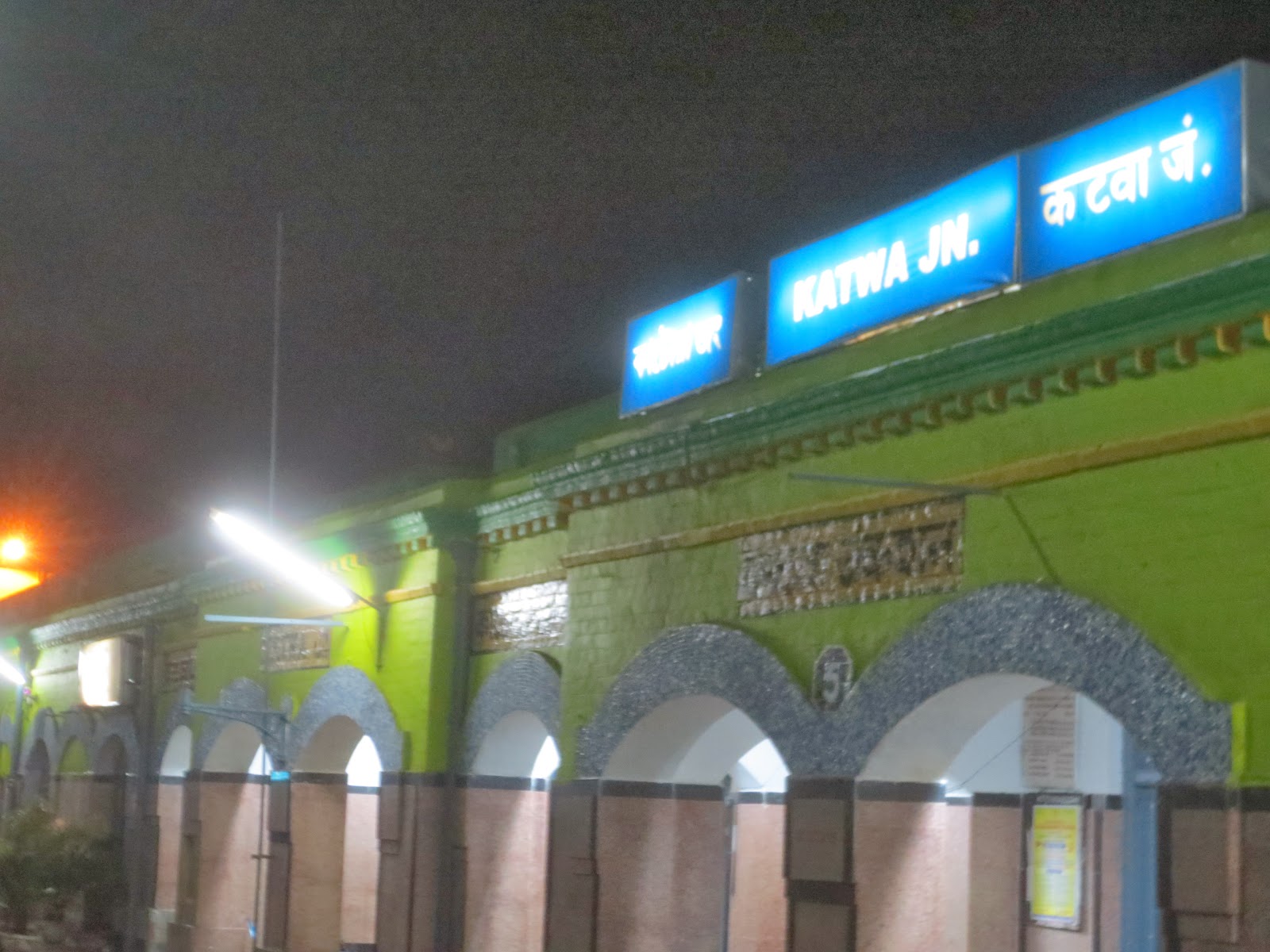
I was so much in anxiety to find the next train to Bandel, I left with just three of my four items, leaving behind the largest, the bag with all my clothes. As I was boarding the train to Bandel realized this, and I went back and looked through the previous train in all the new carriages with the blue seats which I had been sitting in. I do not know why I could not find the bag. I looked twice, but when I returned to the Bandel train platform I found I missed it, and thus all hope of catching my train to Haridwar. I reported my lost bag to the police, and I decided to go to the internet cafe and check the alternative trains. In the process, I distributed maha-prasadam to those led me to the internet cafe and its owner as well. A lot of people said “Hare Krishna” to me when they saw me in Katwa. I found that the train my friends would be taking leaves from Howrah, five hours away. As I am not accustomed to staying in hotels, and I could not find a Hare Krishna temple or Gaudiya Math in Katwa on the internet, so I decided to try for a sleeper train, in hopes of sleeping the five hours to Howrah. It was too late to reserve a seat or bed, so I decided to buy a general ticket and upgrade it. Unfortunately, the train did not arrive until 1:00 a.m., an hour and a half late, and all the beds were allocated. While I was waiting for that train, a guy who was eager to “talk with an American” talked with me. In the course of talking, I explained how Katwa was a special place because Sri Caitanya Mahaprabhu, who he had known of, had accepted the renounced order of life, sannyasa. Actually I had never been to Katwa, and by accident I had come to this special city. Although no beds were available on the train, a railway policeman secured a seat for me, and I probably slept at most two of the five hours. After some people woke up and did not need their beds, I got half an hour of sleep in a free upper berth. At Howrah, I arrived just before 6:00 a.m. and found the booking office did not open until 8:00 a.m. I decided to take the bus to Fairlie Place where the international tourist ticket office is because that would give me more chance of getting a seat on the train my friends were traveling on. I arrived about 7:15 a.m. and sat on the steps playing Hare Krishna on the harmonium as others arrived to wait for the opening of the main booking office. I found the international tourist office did not open until 10:00 a.m., after the four-hour period prior to the train’s departure necessary to get a reservation. The Tatkal (emergency seats) were sold out, but there were five seats freed up from canceled reservations available for purchase which were considered guaranteed seats, and so I could buy a ticket for a reserved seat. One man behind the counter saw I was a Hare Krishna devotee, and he gave me special assistance. When I was all done and had the ticket in hand, he invited me behind the counter and explained how I was to find the seat I was assigned on the charts posted at the front of the train platform. Then he asked me to play a Hare Krishna tune on the harmonium. I played a three-part tune, just one mantra for each part, and he and the other rail employees appreciated. I distributed maha-prasadam to about seven of the people behind the counter, a few who had also helped me. In analyzing the unexpected sequence of events beginning with taking the wrong train, I found that people got to hear Hare Krishna, chant Hare Krishna, and take maha-prasadam who otherwise would not, so my difficulty with the trains increased my service to the Lord. Also I got to travel with my friends to Haridwar and Rishikesh, which was better than traveling alone as we could chant together both on the train and the longer stops on our journey and help each other in other ways. It was Krishna’s mercy we ended up in the same carriage out of the seven sleeper carriages and just ten feet (three meters) apart!
There were still over four hours before the train, so I waited across the street from the booking office for the bus to Minto Park, the area where our Kolkata temple is situated. One young man gave up his seat at a cafe, and invited me to sit and play on the harmonium. I did and he appreciated and gave me some tea as a donation, which I could not really accept. Then another man came to get some tea, and seeing me with my harmonium, asked me to play a Hare Krishna tune, and so I got to place again. I also distributed maha-prasadam to those who wanted it.
At the Kolkata temple, I took prasadam. Both the soup and the khichariwere wonderful. Then I took a nap and a shower, and bought four books from the temple shop, two each in Bengali and Hindi, to distribute on the train. I was happy to join my friends, Vishnujana, Harinamananda, and Nrsimha Caitanya’s Prabhus at Howrah to wait for our train.
On the platform, I saw a beautiful sign on a fruit vendor’s cart.
On the train I sat in the upper berth, using my harmonium as a desk for my netbook. In this way, I was a little bit detached from the craziness of the train ride, the only virtues of which are the price, just $9 to go over 1000 km, and the chance to share the holy names through kirtana.
On the train, we chanted for an hour that night. One lady with Vaishnava tilaka, who raised up her arms and said “Radhe Radhe” and “Haribol,” especially appreciated.
Ten people clapped along with us in three adjacent compartments of the train, and others listened appreciatively.
One man took a book and gave 100 rupees as a donation. That man and a younger one talked to the devotees afterward.
The other devoteesshared their compartment with a young couple and their young child. At the beginning of the journey I considered that such a situation could give the young devotees some practical realization about what married life is actually like. During the journey, the kid, who wore a shirt but no pants, ended up passing urine on Harinamananda Prabhu’s orange wool cadar, the bed it was on and the bed below it, and later passing stool, beginning on Harinamananda’s kurta and finishing on the floor of the train. It was completely disgusting. When I praised Harinamananda Prabhu for his tolerance, he said that there was nothing else he could do. It was ironic that I had predicted they might get some realizations of married life. I also better understand why they use diapers in the West, as it keeps such problems more contained.
When the train stopped a longer time at a couple of the larger cities, we chanted on the platform. Both times we were surrounded by an audience. Once I took a few pictures and a video (http://youtu.be/Zak9FIpK97g):
I was happy traveling with my devotee friends as we got to do a lot of chanting together.
Navina Nirada Prabhu had arranged a program of a week or so of up to six hours of harinama, book distribution, and prasadam distribution each day. Ekalayva Prabhu, the world harinama party, a group of devotees from Scandinavia, and my friend, Caitanya Candrodaya Prabhu comprised the party. Many Westerners and Indians visiting Rishikesh, as well as some of the locals, appreciated the chanting, books and spiritual food.
Mahabhavi Prabhu, who is based in Norway, made and distributed halava prasadam.
Before going on harinama we would have a morning program at Nigah Tourist Resort, at Laksman Jhula, where we stayed.
The first day alone I had so many nice experiences.
One smiling young lady from Bristol, happy to see us on harinamain Rishikesh, recalled seeing Hare Krishnas at the Stonehenge Solstice Festival, which I attended the last four years.

One Czech couple remembered Hare Krishna from the Trutnov (Czech Woodstock) festival I attended the last five years, and I gave them a card I still had for the Prague temple and restaurant. A middle-aged lady was happy to see us, recalling Hare Krishna from many places, especially her home town of Gastonbury, where we have a booth at a mammoth music festival and have a Ratha-yatra which she has sometimes attended. She told us to go on with our wonderful chanting and said, “Haribol!” as we left. A Brazilian couple who danced with us said that Hare Krishna is big in Brazil and thanked us for sharing our joy in Rishikesh. Roon, a young book distributor, told me everyone he spoke to in Rishikesh was favorable. I showed people the mantra on the cards and had them say each word. I said they could keep the card if they promised to chant the mantra once a day and many did. All these wonderful experiences and more happened my first day in Rishikesh, situated at the foot of the Himalayas, along the Ganges River, where it is against the law to sell meat and where yoga ashrams of all descriptions abound.
Some people who were involved with Hare Krishna in other parts of the world and who were visiting Rishikesh came out with us almost every day.
These included a very enthusiastic girl from Saint Peterburg, Russia, (left), and a Slovakian guy with a beard and dredlocks (center) and his Spanish girlfriend (right). One Italian devotee lady was very happy to join us one day to distribute books. An Indian man from Rishikesh played a one-headed drum with us several times.
A man from the Italian part of Switzerland, who knew the devotees there, played his small accordion with us a few times.
A Prabhupada disciple from Montreal took pleasure in playing the flute with us at least a couple times.
Many people clapped to our music, some watching from above.
One lady named Aneta from Germany rode up on her motorcycle and stopped in front of the harinama party, She looked at the joyous chanting for ten minutes or so with a smile on her face. She recalled seeing the devotees in Cologne. I told her how I had passed through our temple in Cologne three times and had chanted in front of the large cathedral in the city which she said is called the Dom. She was pleased I gave her the address to our temple and restaurant there so she can connect with the devotees again.
Other motorcyclists were also entranced by the devotees’ chanting.
People often watched our chanting party from a restaurant on the hillside above us and the steps leading up to it.
One lady who was watching the chanting came from a town an hour south of London which she said was the oldest in England. I told her how I spent a lot of time in Newcastle in the summer, and she said that she has a friend who lives in Newcastle and that the people there are very friendly, but their accent is the most difficult you ever will encounter, something I also experienced. I said our temple in Newcastle is very lively, and the devotees sing for eight hours straight the last Saturday of the month. She found it inconceivable that Geordies, the natives of that region of England, who she described as working class people, would ever become Hare Krishna devotees. I smiled and said that one or two of them have become Hare Krishnas, and I added, “That shows how universal Hare Krishna is!” As she lived near London, I asked if she would like an invitation for our center there, and she said she would. I told how the devotees there sing for two hours on Oxford Street every afternoon. I gave her an invitation and explained that we also have an Indian vegetarian restaurant at the same location, which she would probably like, having come to Rishikesh.
All kinds of people were happy to see our party.
All kinds of people were happy to dance with us.
One scholarly devotee initiated by Srila Prabhupada enjoyed dancing with us.
Caitanya-candrodaya Prabhu delighted in getting the Indian guys to dance.
A few people took mantra cards and chanted along.
Once we passed a music shop, and a guy inside played the drum along with us.
A couple of times our party entered a shop, and chanted through it one time. Usually the owners were pleased with the attention.
Once we chanted under an awning in front of a shop when it rained briefly.
We also chanted by a Shiva fountain.
One day we chanted down by Ram Jhula, where we were based two years ago. More younger Westerners are to be found around our new location of Laksman Jhula.
Navina Nirada Prabhu, Janardana Prabhu from Denmark, and Bhakta Roon, also from Denmark, enthusiastically distributed many books, and the donations paid for all the expenses of the party.
When the world harinama devotees were with us, there was extra intensity, and many people vigorous danced with us as you can see in this video (http://youtu.be/cXaPTWztABM):
The last couple of days, since people were leaving our party to their next destinations, we did not have scheduled harinamas, so I would have some of my own, getting one or two people to join me. When I was chanting alone, I had some nice experiences. A swami from another mission chanted several mantras with me on a couple occasions. A group of Gaudiya Vaishnavas from Bulgaria chanted with me for ten minutes. A couple of young Indian men played the shakers and sang vociferously with me for twenty minutes. Their white girlfriends had no interest at all in the kirtana,and were eating and talking with each other as the guys sang. The two guys said they had gone to the Vrindavan gurukula, and their names were Lalita Das and Jagan Mohan Das. I was happy to see their enthusiasm for the chanting, but amazed to see the apathy of their girlfriends. After lunch, I went out chanting with Caitanya-candrodaya Prabhu. A man from the Italian part of Switzerland, who had previously played his miniature harmonium with us, played with us again. In the course of our chanting procession we encountered the Indian gurukulis who were happy to see us. This time in addition to the guys chanting, one of the girls chanted Hare Krishna with us and the other took a photo of the whole scene. It was interesting to see the increased interest of the girls in the kirtana. As we continued onward, the Hare Krishna girl from Saint Peterburg joined us.
The last day I went out for 40 minutes before lunch. I did not even make it to Laksman Jhula, the bridge where we usually chant.
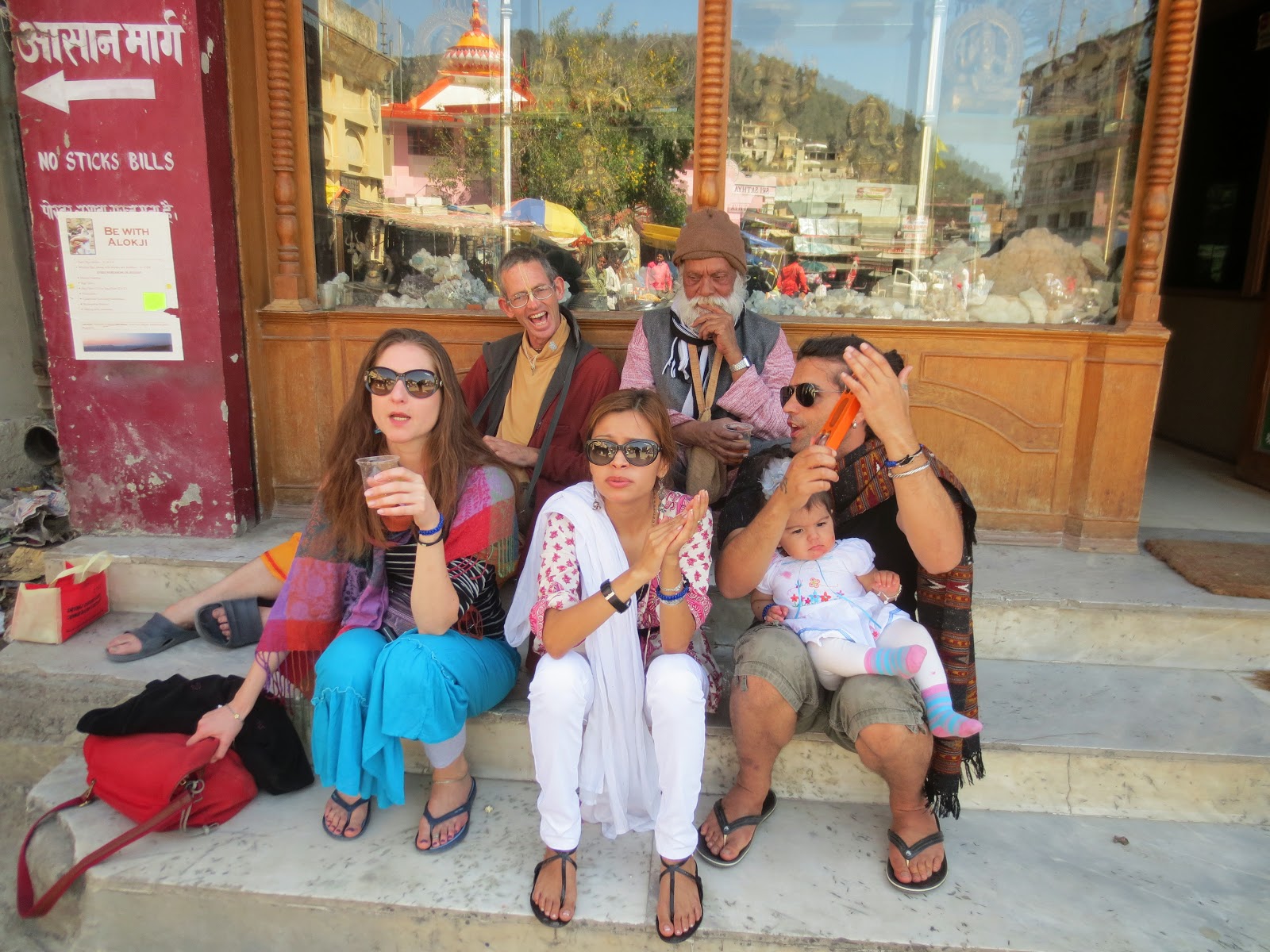
I met the Indian gurukula boys and their girlfriends, who I then learned were from Switzerland, Nandulal, a gurukuli who remembered me from America, a lady and a kid, and a old man from Vrindavan, and they urged me to stay and sing with them. So I stayed there singing, and Jagan Mohan and Lalita Prabhu bought fresh orange juice for everyone in the party. One of the Swiss girls both chanted and danced and the other took pictures. An older man from Rishikesh who had joined us on harinama a few times before played his one-headed drum. Nandulal borrowed a two-headed drum from a vendor to play along with the chanting. It was very lively, and we must have chanted for half an hour. A group of Indian pilgrims came by, and sat with desiring to have their picture taken with us. I encouraged the gurukuli kids to chant Hare Krishna every day during their travels. They were having such a good time, perhaps they will.
This year I first crossed the Ganges River on my way from Navadvipa to Mayapur coming to Mayapur. I played my harmonium and chanted Hare Krishna during the boat ride. One devotee sprinkled auspicious Ganges water on us as we waited for the boat to get underway. Then on the way to Rishikesh, I crossed the Ganges from Mayapur to Navadvipa to catch the train. This time it was approaching dusk, and I played harmonium and sang the Gaura Arati song, our evening prayer, in addition to Hare Krishna. When I missed my connecting train, I had to go all the way into the city of Kolkata to buy a ticket for the train my friends were taking the next day. As I crossed the bridge from Howrah to Kolkata, I saw an old man place his palms together. At first I did not understand why he was doing that. Then it occurred to me that it might be out of respect for the river. I thought it was a little quaint, and then I remembered that it was not any ordinary river, it was the same Ganges, just a little downstream and more polluted than in Mayapur. Thus I also put my palms together in respect, and another man followed me. However, when I returned from the Kolkata temple to Howrah to catch the train, I crossed the Ganges River in ignorance, not being reminded by anyone of her glory. After our train reached Haridwar, some twenty-seven hours later, and we were riding by motor rickshaw to Rishikesh, I was happy to see the Ganges River again both near the beginning and end of our journey. It was quite a bit narrower and faster flowing. At the Nigah Tourist Resort, one of the better of budget guest houses at Laksman Jhula, the Ganges was both visible to our eyes and audible to our ears because of being near its rapids. When I would chant Hare Krishna on beads looking and listening to the Ganges I found it to be a most wonderful experience.
I chanted extra japa on Ekadasi looking at and hearing the rapids of the Ganges River. . . . I thought how Queen Kunti, the mother of Krishna’s friend, Arjuna, prayed for constant attraction to Krishna without diversion as the Ganges inexorably flows to the sea. . . . King Pariksit desired to leave his body on the bank of the Ganges. . . . For thousands of years, sages have been meditating on its banks here at Rishikesh. . . . There is a feeling of peace and timelessness. It is one of my favorite places to chant.
Almost everyone likes to swim and the devotional practice of bathing in the Ganges is one of the easier ones for most people to follow. Somehow I have never developed a taste for swimming or bathing in natural bodies of water. I know some of it has to do with the sand, the feel of which I do not like on my feet. In 1988 I lost my glass bathing in the Ganges in Mayapur, and subconscious impressions of that inconvenience may play a role. I was planning to bath in the Ganges at least once, and by the influence of Navina Nirada Prabhu I finally did, two hours before leaving Rishikesh. It was very cold, which is not surprising as its source is a glacier not so far away, and I just quickly dunked my head in the water. It was refreshing, although I did not find it as refreshing as my friend, Caitanya-candradoya Prabhu, who said bathing in the Ganges is as refreshing as a five-hour nap! While discussing the Ganges with friends, Nanda Kumar Prabhu, who takes tours to Rishikesh, told about one lady tourist who was very bossy and was never satisfied with any situation. Her occupation is to be in charge of two hundred nurses. After she bathed in the Ganges, she developed a positive attitude, and when the tour continued to Vrindavan, she became attracted to donate to help one project there. Nanda Kumar Prabhu was surprised to see such a marked change for the better in her personality. From the books of revealed knowledge, we understand that bathing in the Ganges frees one from sinful reactions, and thus it is reasonable to consider one might advance in good qualities by such a bath. I wonder what other stories exists offering evidence of this. If you know any, please write me. I love to collect stories that offer evidence consistent with the truths of the Vedic literature. As Caitanya-candrodaya Prabhu and I took a taxi to Rishikesh to catch our train, we sang the Gaura Arati song while passing the Ganges on our left. The song tells of arati ceremony performed by great souls in worship of Lord Caitanya. The setting of the beautiful ceremony which attracted the minds of the whole universe is the bank of the Ganges River. It was wonderful to connect with the Ganges many times in the last couple of weeks, and I have a sense that it increased my devotion, especially while chanting Hare Krishna on beads in Rishikesh while seeing and hearing her.
Chanting on the Train from Haridwar to Delhi
On the night train from Haridwar to Delhi, I arose and started chanting at 5:00 a.m. At 5:15 a.m. an older Indian man arose, put away his bedding, and sat staring out the window. See him wasting his time, I gave him a mantra card and said, “Best use of time: Chant Hare Krishna.” He moved his head in equivocal Indian way, and read the words from the card. He sang it softly to himself for a whole hour. As he left, I gave him and his wife Radha-Madhava maha-prasad,which they gratefully accepted, and I told him to chant the mantra every day, prati-din.In my experience, it is rare a few words of spiritual instruction go so far as my first words to him. I hope he follows my final instruction with the same enthusiasm.
Punjabi Bagh Delhi Temple
For the third time, I went to the Punjabi Bagh temple in Delhi. It was wonderful to see many congregational people at the temple throughout the day. There were twenty or thirty singing in the late morning just before the raj bhoga [lunch offering] that swelled to fifty for the noon arati. There must have been eighty for the evening arati, and they do a full hour of kirtana in the temple after that arati. It is wonderful to see such enthusiasm for the chanting, which is the yuga-dharma, the spiritual practice of the age.
Some of the guys got into dancing in the evening kirtana.
They were so enthusiastic they continued dancing outside during the Nrsimha prayers!
Rohini Harinama
Devotees tell me that Srila Prabhupada wanted to have twelve temples in Delhi. We have eight, and four are under construction, one of these being in Rohini. Rohini is an expansion of the nearby Punjabi Bagh West temple. Kesava Murari Prabhu, a leader at Punjabi Bagh, plays a role in the development of the Rohini project.
He has an awesome bas relief of Radha-Krishna in his office.
He invited me to go on harinama with him in Rohini. In two weeks, on March 30, they plan for Ratha-yatra in Rohini, an event I attended two years ago as I happened to be traveling through Delhi that day. This year they decided to do harinama on Gaura Purnima and the day before and follow the exact route of the Ratha-yatra distributing invitations to it. That sounds like such a practical way to advertise a Ratha-yatra, I am surprised I never heard of doing it before.
They have three harinama carts.

They have small Gaura-Nitai deities who ride the carts.
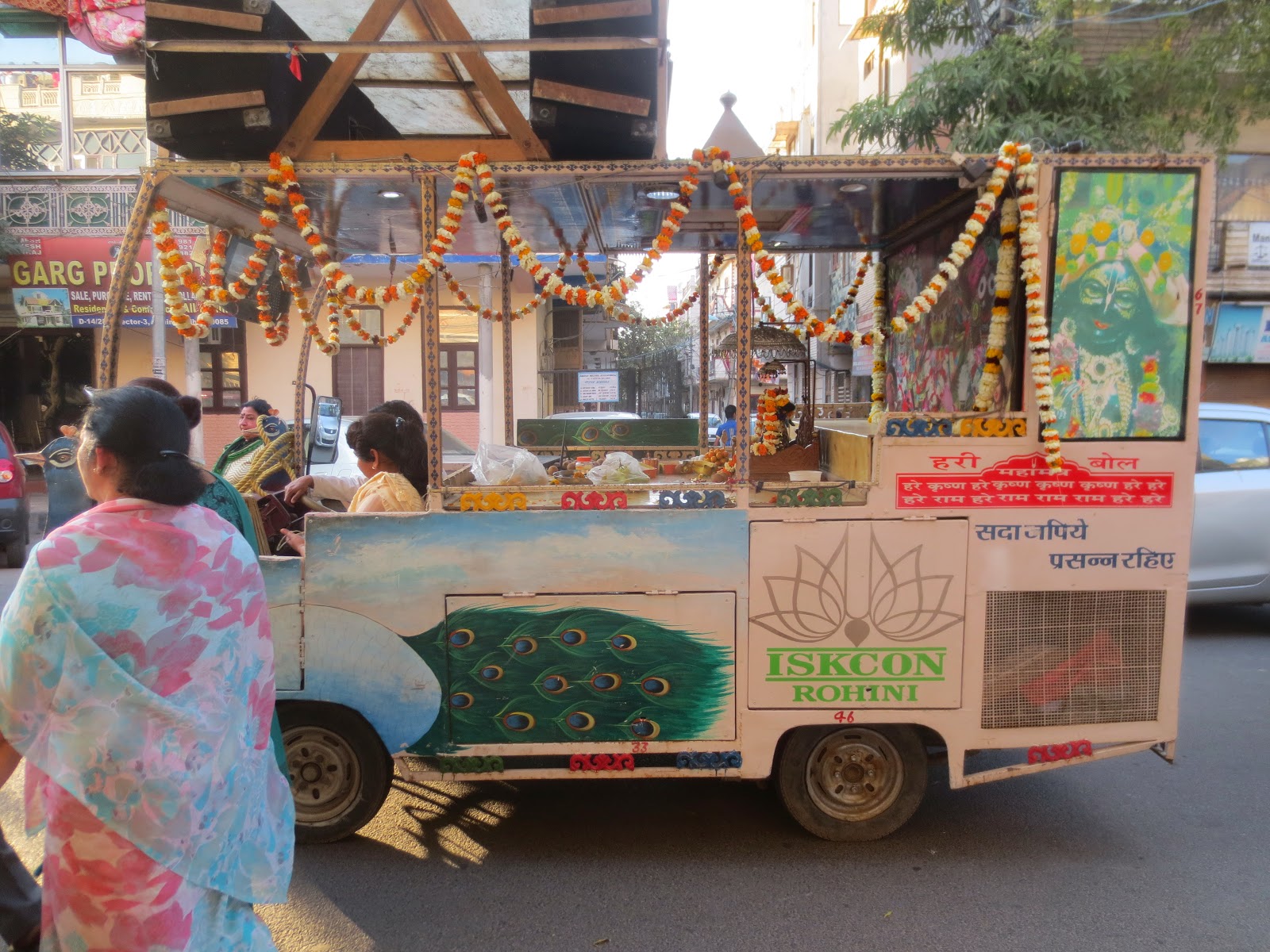
They are equipped with one of the loudest sound systems of that size I have ever heard. The back of cart has a diesel generator just to power it.
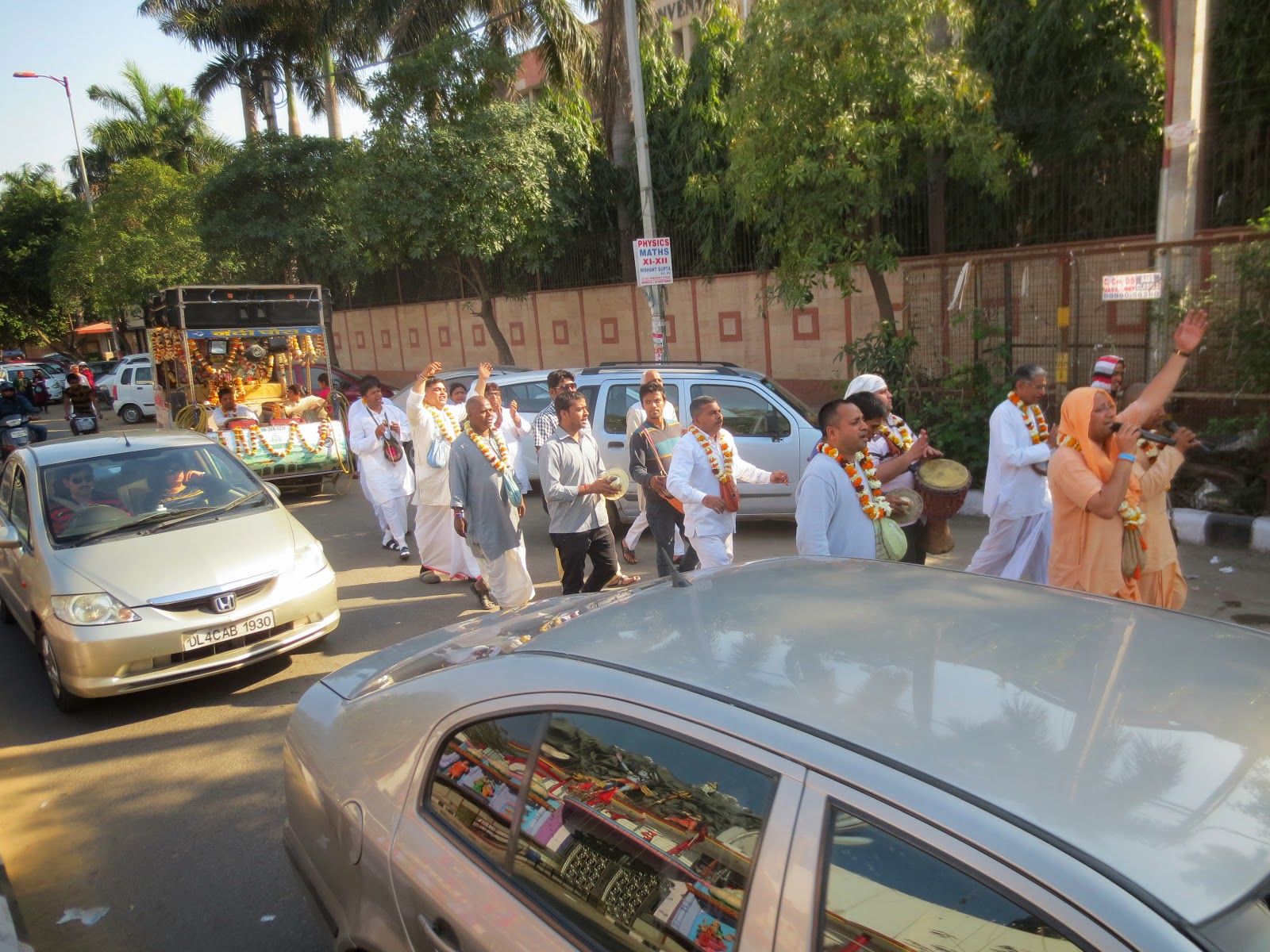
Diary of a Traveling Sadhaka, Vol. 10, No. 4
By Krishna-kripa das
(February 2014, part two)
Gainesville, Alachua, Orlando, Dublin, Istanbul, Mumbai, Mayapur
(Sent from Rishikesh, India, on March 10, 2014)
Where I Went and What I Did
I continued chanting at Krishna Lunch, chanting at the Farmers Market, teaching my weekly class on mantra meditation, and giving lectures at Gainesville’s Krishna House until February 20, when I took the Megabus to Orlando, where I chanted with Kishor Krishna Prabhu. I flew later that day from Orlando to Dublin by way of Philadelphia. There I chanted each day on the streets of that city, always with at least one friend, and one day we did a special nine-hour harinama. I flew to Mumbai on Turkish Airlines by way of Istanbul, where I had a nice conversation with a devotee in the airport. I spent the day in Mumbai at Chowpatty, hearing a couple kirtanas and lectures, and having three meals. At the end of the day, I took a 33-hour train to Mayapur, on which I had two kirtanas, the second attended by nine devotees. At Mayapur, the Kirtan Mela, which I will describe in the next issue, was just beginning, and my world harinama friends did harinama there.
I share quotes from the books and lectures of His Divine Grace A. C. Bhaktivedanta Swami Prabhupada, excerpts from the journal of Satsvarupa Dasa Goswami, and lectures from Rtadhvaja Swami in Gainesville and Alachua, Bhakti Purushottama Swami in Mayapur, senior devotees like Kalakantha Prabhu and Nanda Devi in Gainesville and a couple senior brahmacaris in Chowpatty.
Many thanks to Srikar Prabhu (Gainesville), Premarnava Prabhu (Dublin), Sundari Gopi dd (Gainesville), Uma dd (Tampa), and Bhakta Mike (West Virginia) for their kind donations, and to the devotees from Juhu for paying my way from Howrah to Mayapur.
March 6–13 – Rishikesh with Navina Nirada and Ekalavya Prabhus
March 14–20 – Delhi and Vrindavan
March 23–24 – Kolkata with Hari Sauri Prabhu
March 26–April 1 – Indian Padayatra
April 17–24 – Ireland
April 25 – London
April 26 – King’s Day, Amsterdam, The Netherlands
April 27–30 – The Netherlands
May–July (first two-thirds) – The North of England, Birmingham 24-hour kirtana, London Ratha-yatra, Stonehenge Solstice Festival
July (last third)–August (first two-thirds) – Baltic Summer Festival, Polish Woodstock, Czech Woodstock
August (last third)–September (first half) – The North of England
September (rest) – New York
I taught my mantra meditation class for five weeks. Twice no one showed up. One person came who had come to our Thursday introductory program at Krishna House, and one person who came to mantra meditation later came to our Wednesday introductory program on campus. Although no one came to the mantra meditation class twice, I saw two students the week after they came, and they said they were chanting 108 mantras every day or almost every day, and they both liked it. I hope they are able to continue with their interest in chanting Hare Krishna. It is the assurance of the Vedic scriptures and the saints in our tradition that simply by chanting names of the Lord, especially the Hare Krishna mantra, anyone can awaken one’s dormant love of God in this very life. Jaya Sri Vrinda dd, who came to my classes and is serious about perfecting her own chanting, will continue the class in my absence. She once taught four of her fellow law school students mantra meditation, feeling sorry seeing them so stressed out.
Chanting at Krishna Lunch
At the beginning of Krishna Lunch each day, before it got busy, many devotees would be able to chant with us.
Here Ambika leads, playing the harmonium, Tony plays the drum, and Damodar Prasad plays the karatalas. They all are the children of devotee parents, and they love kirtana. Ambika used to sing in a band and has a powerful voice. Prabhupada disciple, Satyahit Prabhu, plays djembe in back, and Mother Saci Kripa, visiting from Michigan plays tambourine.
Chanting at the Farmers Market
The last day before leaving Gainesville, eleven devotees came with me to chant at the Gainesville Farmers Market. A couple more devotees joined us there.
Sometimes we only get three or four devotees to come.
A girl about five years old played a maraca that Hladini gave her, initially playing nicely but later, smashing it into a rock wall in time with the music, thus breaking it.
An Afro-American guy asked to play the clay mridanga, but doubtful that he would handle it gently I gave him some shakers which he played smilingly.
A University of Florida girl was moving her hands in time with the music, so I gave her some shakers which she enjoyed playing.
A young man named Gopala from Alachua whose parents were devotees and who I knew years ago came by and chanted for some time. It is a nice feature of that harinama that devotees who visit the Farmers Market end up being drawn into the chanting.
At the end, we moved to the corner of the market when a band played on the stage, and we continued chanting. Some devotees talked of increasing their commitment to the Farmers Market harinama, which has resulted in at least one person becoming attracted to take up Krishna consciousness to the extent of attending programs and chanting Hare Krishna on beads.
Kishor Krishna Prabhu, who has assisted in college outreach over the years by chanting at campuses and doing vegetarian cooking classes for students, agreed to pick me up at the Megabus, drop me at the Orlando airport, and chant for a couple of hours in between. Originally we planned to chant at Valenica College, but Kishor had some paperwork to do for his car business as long as he was downtown, so we chanted for twenty minutes while Kishor was waiting for the paperwork to be complete. As we had little time, we decided to try other places downtown and on the way to the airport. Lake Eola seemed like a pleasant place, but there were too few people. Downtown was also pretty dead, We settled on chanting in front of the entrance to The Florida Mall Food Court, where there was an increasing number of people as lunch time was approaching and which is near the airport. We chanted there practically a whole hour, and no security personnel stopped us. One girl with her boyfriend took a video of us, and I gave her my Krishna.com business card so she could send it to us. Another young lady stood at the opened door of her shop watching us for ten minutes, and I also gave her a card. All together we distributed about ten cards which have the Krishna.com web site, the maha mantra, and my email, along with pictures of Lord Caitanya, Lord Nityananda, and Lord Krishna. We felt victorious as many people heard the holy name, we encountered no negativity, and we found a new venue to do harinama at.
I chanted on harinama each day I was in Dublin, but could not do three hours the first day as my flight from Philadelphia was delayed by three hours, thus throwing off my schedule.
Premarnava Prabhu, wearing an orange dhoti in the pictures, really supported me in our nine-hour harinama on Saturday, also staying out about 8½ hours. Krishna blessed us in that it did not rain very much, and for that time of year, it was not too cold, with a high of 50º F (10º C). The wind was a little annoying sometimes, blowing at 24 mph (39 kph) continuously, with gusts much higher, but fortunately it was from the south. A bunch of young people danced with us, and many people took pictures and videos, and there were the usual smiles of approval and thumbs up gestures. The devotees had rented a hall for a nine-hour kirtana for the following Saturday, and thus we able to use our marathon harinama to pass out invitations to the next week’s marathon kirtana!
During the nine hours, seven men and four ladies participated for part of the time.

A new Indian girl, Puspa, also came out on harinama before the Sunday feast and stayed into the extra kirtana we had after the feast. On that harinama, a lady, perhaps in her 30s, tried singing along with us. I gave her a mantra card, and she happily sang for five minutes or so. She had been smoking a cigarette when she met us, and to facilitate her singing she threw it away. Then she mentioned to me that she always smokes them down till the end, but in this case, she threw it away when there was still a quarter of it left just to sing with us! She said she was homeless and that she once had eaten with us and the food was really good. We invited her to come for the Sunday feast which was just twenty minutes away, and she said she would, but unfortunately she got distracted. While she was singing with us, one atheistic man demanded to see God, and we tried to explain, as Srila Prabhupada often would, that one must be qualified to see God. The homeless lady joined the conversation, and continued our side of the argument with the man, as we moved over and kept on singing! Meeting that lady was one of those special encounters that makes harinamaalways an adventure.
As I was having a dinner break in the Istanbul airport, I prayed to Krishna that if He wanted me to talk to anyone about His philosophy that He would have to send someone because I was inverted by nature and it was not likely to happen. Once when I was flying from Kiev to Delhi, I offered a similar prayer, and I had some good conversations, so I decided to do it again. As I was looking for my gate, a guy with gray hair smiled and said to me, “I remember you from Rishikesh last year.” I said, “Actually it was two years ago, and the devotees I was with are planning to go again this year, from March 4 to March 14.” He was from Coventry, England, and praised our temple there. He said his name was Gaura Hari, and he was in Vrindavana when Srila Prabhupada was there in the 1970s. He pointed to his luggage and said he had his younger brother’s ashes to places in the Ganges River, and how that was a very emotional experience for him. He told how his younger brother drank 3 or 4 bottles of wine a day, was a womanizer, and was into heavy metal music. Although only 49 years old, he felt some pain, went to the hospital for a check up, and never came out. He was yellow in color, his liver was beyond repair, and had only three days to live. Gaura Hari decided to make his younger brother’s passing as devotional as possible with a tape playing Prabhupada singing underneath his bed, and another one of Aindra Prabhu singing near his ear. He placed on his body an old garland from Shyamasundara in Vrindavan. Those were just some of the many arrangements that also included Ganges water from Gomukh, the very beginning of the river. After two days, his brother’s yellow color temporarily went away, and his brother sat up and embraced him, saying, “Hare Krishna, brother!” Those were his last words. Gaura Hari Prabhu had the Vaishnava song book and sang all the devotional songs from it that he knew. When his brother left his body on the third day, the room glowed a purple and orange color. At the funeral, all kinds of people we there, his heavy metal friends, the Salvation Army people, his drinking buddies, and some devotees. People played all kinds of music. Gaura Hari included George Harrison’s “My Sweet Lord” from the Bangladesh concert when he sings Hare Krishna at the end, and concluded the funeral with the Govinda prayers. Reflecting on the auspicious devotional elements present during his brother’s passing away and funeral, I told Gaura Hari Prabhu that such fortune was there because he had a devotee brother. It reminds me that Srila Prabhupada once said that the parents of the devotees will realize at the time of their deaths what great fortune it is to have a devotee child. We went on our separate ways, he to a flight to Delhi and me to a flight to Mumbai, but we may meet up again in Rishikesh when he arrives there on March 10, to put his brother’s ashes in the sacred Ganges. I got a sense that Gaura Hari Prabhu needed someone to share his struggle with and so Krishna arranged that I meet him at the Istanbul airport during our two-hour layover there.
I had a couple nice experiences chanting on the Mumbai to Howrah mail train, while going to Mayapur for the Kirtan Mela, As it was Ekadasi and the entire day would be spent on the train, I decided to take advantage of my freedom from other engagements and chant sixty-four rounds. As I was recovering from several days of little sleep, two being overnight flights, I decided I would chant sixteen rounds and then take a nap, and continue in that way until I reached sixty-four. When I awoke after thirty-two rounds and two naps, it was 11:10 a.m., and the train was stopped. The noise of the vendors hawking, the people talking, and the kids crying was overwhelming. Although not half my trip was over, the cacaphony of mundane sound was intolerable, and so pulled out my harmonium, and started chanting Hare Krishna, still sitting in the upper berth where I had taken rest. Several people stared at me, but I did not care. I had tolerated hearing their sound for over half a day, now they would have to tolerate hearing mine. I was thinking of only chanting for ten minutes, but I felt refreshed hearing the transcendental sound, and it appeared that the objectionable noise around me had significantly diminished, so I had not the least inclination to stop chanting. I chanted until the train began moving, decreasing the number of vendors, and drowning out the other noise with its own. In the midst of my kirtana, an Indian man wearing neck beads and also going to Mayapur for the Kirtan Mela and Maha Abhiseka (the great bathing ceremony for Pancatattva deities installed 10 years ago) gave me a bag with four tangerines. Later a woman in his party offered me chapatis and a potato preparation, but I declined as it was Ekadasi, the day when we fast from grains. Had I not chanted, I would never have met these two people of a similar spiritual inclination.
During the long afternoon when I was working on chanting the remaining mantras on my beads, I spent much time near the open doors at the end of the carriage as fewer people were talking, it was cooler, and seeing the grassy landscape with sparse trees and the sky pacified my mind. A couple devotees from another carriage came through and invited me to visit them where they sat. I decided to come by just after the sun set, bring my harmonium, and propose that we sing our evening song called “Gaura Arati” together. When we were at one of the longer stops, at the city of Bilaspur, I decided to take a break from chanting on beads, and get my computer (so it did not get stolen) and harmonium, and sing outside my carriage until the train began to move. As evening was approaching I sang the evening tune. I met one of the devotees who invited me to visit them. He was chanting on his beads alongside the train, and said I would come by later and we could sing the “Gaura Arati.” Near my carriage, the vendors made such a racket I decided to stand outside the carriage of the other devotees and sing until the train moved. Then when I went inside to sing with the other devotees, I found that devotees sitting in three different parts of the train had gathered, and there were nine of us altogether! They said to sing Hare Krishna for ten minutes, and then sing the “Gaura Arati” song. I complied, although we usually do them in the opposite order. I was just happy that we were singing together somehow.

After I sang, four of the other eight devotees also sang, three of them also playing my idiosyncratic harmonium, and I sang once more at the end.
The kirtana lasted for an hour and twenty minutes with times of great intensity and spiritual emotion. I danced to the next-to-last song.
The uniformed Maharashtrian policeman sitting next to me began to sing along with the chanting, and he exchanged phone numbers with one of the devotees afterward.
One devotee sang a song about Lord Caitanya with the refrain “Pranami saci suta gaura varam.” I tried to follow it in their song book, but there were too few copies, and I could not read the Devanagari script upside down in the book across from me fast enough to sing along, so I just sang the words I could recognize.
It was powerful to be singing about Lord Caitanya with eight other devotees who were performing the austerity of taking a 33-hour train ride from Mumbai to Howrah, enroute to His glorious birthplace. I was happy that the Lord had brought us all together to sing for Him, and also to benefit everyone else in the carriage with the transcendental sound.
When we continued our journey on the local train to Nabadwip Dham, the Juhu brahmacari, Radhika Kanai Prabhu, sang along with me.
It is striking to me that even the Indian Railways acknowledges in their naming of the station Nabdwip Dham that it is a sacred place associated with the descent of the Lord in this world, by including the word dhama, or as pronounced in Bengali, dham, in its name. .
Harinama in Mayapur

Vishnujana Prabhu from Slovakia, Gaura Karuna Prabhu and Nrsimha Caitanya Prabhu from Czech Republic, Syama Ras Prabhu from Croatia, and Harinamananda Prabhu from Australia travel all over the world doing harinama. I had see them in London in June 2013 and Czech Republic in August 2013, and the end of February 2014 they came to Mayapur to do harinama in the holy dhama. Every day, usually about 4:30 p.m. they would gather near the end of Chakra Bhavan (the long building) where three paths interact and do harinama around our Mayapur campus for a couple of hours.
Vishnujana Prabhu appealed to the crowd to participate.
Then when the devotees would dance in a circle, Indian pilgrims would join in.
The ladies also got into dancing.
Gopinath Prabhu from Finland would play his bass guitar along with the party.
Other people came by and played their own percussion instruments.
Once two elephants passed our party, something that does not happen every day.
Lots of the Indian visitors would be happy to see and hear our party, and even to dance with us.
Odd Sights from the Train
In India, you see things you do not see other places. The spiritual world in the Vedic literature is called Vaikuntha in Sanskrit, which means a place of no anxieties, unlike any place in this world. In modern Indian languages this is transformed to Baikunth, and so it was humorous for me to see this sign from the train. It does not look like the spiritual world to me!!!
In the West you see people with different colors of hair, but I never saw anyone with a beard dyed orange before.
from a lecture given in Los Angeles on February 7, 1969 on Srila Bhaktisiddhanta Sarasvati Thakura’s Appearance Day:
People are becoming Krishna conscious by the grace of Lord Caitanya Mahaprabhu. Anyone can take to this movement. It is not as hopeless as I originally thought.
If we struggle hard to spread this movement, even if we do not get any followers, Krishna will be satisfied, and our aim is to satisfy Krishna.
Nothing is stopped, it is just purified.
from a lecture given in Gorakhpur, India, on February 15, 1971, on Srila Bhaktisiddhanta Sarasvati Thakura’s Appearance Day:
Except the devotee of Krishna, everyone is simply giving trouble to Krishna.
For the purpose of inducing people to become Krishna conscious, you can make your plan, for that is Krishna’s plan.
It is the appearance day of Srila Bhaktisiddhanta Sarasvati Thakura, and we should honor the tithi [lunar day] very respectfully. We can pray to him, “We are engaged in your service, give us strength, give us intelligence, we are being guided by your servant.”
It is my duty to honor his appearance, but I am doing it with my entire spiritual family.
The feast should have at least four items, puri, halava, vegetable, and chutney.
[Srila Prabhupada approved the feast being in the evening, but the puspajali (offering of flower petals) should be at noon.]
from a class on Srimad-Bhagavatam 1.3.1–3 on March 28, 1968, given San Francisco:
“Suppose a foolish boy is trying to touch fire. Father says, ‘Don’t do it.’ In spite of that, if the foolish boy does it, his hand is burned. So father is not responsible. He says, ‘Don’t do it.’ But the child does it out of ignorance and suffers. Similarly the sanction of God is there as we persist on it. ‘I want this. I want this.’ As a child sometimes cries and the mother is obliged to sanction, similarly, God is very kind. If we persist on doing something, He gives us sanction. But the result you have to suffer or enjoy.”
“So they have no sufficient reason [to say] that there is no creator. In everything, we find there is a creator. Anything you take. Take for example this table. There is a creator. Somebody has manufactured it. Or this microphone, somebody has created it. Anything you take, you have to find out some creator. And such a vast, gigantic thing [as this universe], going on so nicely and punctually… The sun is rising punctually, the moon is rising punctually, the fortnight is going on, the season is coming punctually – everything. Why there should be no creator or no superintendent?”
“Just like in the Bible it is said ‘God said, “Let there be creation.”’ That means before the creation, before this material creation, God was there. . . . There was nothing material. Therefore, God’s body cannot be material, because He existed before the creation of matter. So before creation of matter, there was nothing like matter, though God was there. Therefore conclusion is that God has no material body. He spoke, ‘Let there be creation.’ ‘He spoke’ means He’s a person; otherwise how He can speak? But His personality is not material, because when He spoke there was no material creation.”
from Srimad-Bhagavatam 7.6.19, purport:
“The Supreme Lord, Narayana, is the seed-giving father of all living entities because the living entities are parts and parcels of the Supreme Lord. . . . As there is no difficulty in establishing the intimate relationship between a father and son, there is no difficulty in reestablishing the natural, intimate relationship between Narayana and the living entities.”
“ . . . if one performs even very slight devotional service, Narayana is always ready to save one from the greatest danger. The definite example is Ajamila. Ajamila separated himself from the Supreme Personality of Godhead by performing many sinful activities and was condemned by Yamaraja to be very severely punished, but because at the time of death he chanted the name of Narayana, although he was calling not for the Supreme Lord Narayana but for his son named Narayana, he was saved from the hands of Yamaraja. Therefore, pleasing Narayana does not require as much endeavor as pleasing one’s family, community and nation. We have seen important political leaders killed for a slight discrepancy in their behavior. Therefore pleasing one’s society, family, community and nation is extremely difficult. Pleasing Narayana, however, is not at all difficult; it is very easy.”
“If one wants to derive the actual benefit from this human form, he must take to the chanting of the holy name of the Lord.”
from Srimad-Bhagavatam 7.6.24, purport:
“If one sincerely tries his best to spread Krishna consciousness by preaching the glories of the Lord and His supremacy, even if he is imperfectly educated, he becomes the dearmost servant of the Supreme Personality of Godhead. This is bhakti. As one performs this service for humanity, without discrimination between friends and enemies, the Lord becomes satisfied, and the mission of one’s life is fulfilled. Sri Caitanya Mahaprabhu therefore advised everyone to become a guru-devotee and preach Krishna consciousness (yare dekha, tare kaha ‘krishna’-upadesa [Sri Caitanya-caitamrita, Madhya 7.128]). That is the easiest way to realize the Supreme Personality of Godhead. By such preaching, the preacher becomes satisfied, and those to whom he preaches are also satisfied. This is the process of bringing peace and tranquility to the entire world.”
from The Nectar of Devotion, Chapter 11:
“A similar statement is there in the Eleventh Canto of Srimad-Bhagavatam, Second Chapter, verse 53, where Havi, the son of King Rsabha, addresses Maharaja Nimi: ‘My dear King, a person who never deviates even for a moment from engagement in service at the lotus feet of the Supreme Person (engagement which is sought even by great demigods like Indra), with firm conviction that there is nothing more worshipable or desirable than this, is called the first-class devotee.’”
“In the Hari-bhakti-vilasa there is the following statement about self-surrender: ‘My dear Lord, a person who has surrendered himself unto You, who is in firm conviction that he is Yours, and who actually acts in that way by his body, mind and words, can actually relish transcendental bliss.’”
from a lecture on Srimad-Bhagavatam 1.2.22 given in Los Angeles on August 25, 1972:
We must have no doubts about Krishna, and that state can be achieved by bhakti, devotional service.
Krishna is always ready to help us, and if Krishna is helping us, it is very easy to understand Him.
from The Nectar of Devotion, Chapter 12:
“A similar statement is in the Third Canto, Seventh Chapter, verse 19, of Srimad-Bhagavatam: ‘Let me become a sincere servant of the devotees, because by serving them one can achieve unalloyed devotional service unto the lotus feet of the Lord. The service of devotees diminishes all miserable material conditions and develops within one a deep devotional love for the Supreme Personality of Godhead.’”
“It is said in the Adi Purana, ‘A person who is constantly engaged in chanting the holy name and who feels transcendental pleasure, being engaged in devotional service, is certainly awarded the facilities of devotional service and is never given just mukti[liberation].’’”
“In the beginning at 26 Second Avenue
no one danced during the
kirtanas. Then one night a young man
named Bob Lefkowitz stood
up to dance. His pants were low
on his hips, and I thought
he danced in an egotistical
and erotic way. I didn’t like it,
but Swamiji looked at him
approvingly and smiled.
Soon after that, Swamiji
taught us the “swami step,”
a sedate movement where
you held your arms in the
air and took small steps.
We all began doing it in the
temple. Over the years, the
dancing grew more vigorous
and even rowdy. Almost
without exception, Prabhupada approved.
He just wanted to see the devotees’ enthusiasm.”
When I was dealing with the AT&T customer service representative, after answering my initial question my phone, she asked if I had any more questions. I said, “I do have a question that is troubling me. Now I have a 61 year old body, but I remember when I had a 6 year old body. I guess that means I am the consciousness that has experienced different bodies. There must be a supreme consciousness beyond this, and I am wondering how to connect with that.” She replied that is the most amazing thing that she had ever heard, but she agreed about the point of changing bodies, saying that it was also her experience.
Time is unique because although always goes the same speed, sometimes it seems to be going faster and sometimes it seems to be going slower.
On a recorded lecture Srila Prabhupada says preliminary old age occurs at forty, and old age sets in at fifty.
The materialist thinks, “how can I take the fruits of my activities and enjoy sense gratification?” while a devotee thinks, “how can I engage the fruits of my work in Krishna’s service?”
The knower of the Absolute Truth is convinced about his awkward position in this world. By awkward I mean unstable. Thus he does everything as an offering to Krishna to become disentangled.
By positively engaging in devotional service, we become detached. Slowly but surely the higher taste comes, but it takes effort, it takes practice.
The devotee is not disturbed by the actions and reaction of material nature as they are under the control of Krishna.
When asked the vision of the pure devotee, Srila Prabhupada explained, “The devotee sees everything and controlled by Krishna.”
Once on our trip, one of the boys stole a candy bar. The next time we stopped at Sam’s Club, we got three cartloads of food for the boys, and I told them to bypass the cash register, and go straight to the car. They said, “Maharaja, you cannot go out with three cartloads of food and not pay.” I replied, “Well, that is your philosophy.” They responded, “Maharaja, there is a difference between a candy bar and three cartloads of food!”
If you go to the movies it is maya[illusion], and if you like it, it is more maya.
Krishna says of fish I am the shark, but that does meant Jaws is a bona fide movie.
Answer to a question: If you want to make a movie about Bhakti Tirtha Swami, that is a good thing, but better you exhaust other methods of learning movie skills before watching materialistic movies.
To be not disturbed in any circumstances is a very elevated position. This means the mind is never deviated from Krishna even in midst of the greatest difficulties.
If a devotees cuts his finger in the kitchen while chopping vegetables, he thinks that he should have cut his head but instead he just cut his finger.
To overendeavor is not recommended by Rupa Goswami, and someone once asked me, “How I know if I am overendeavoring?”
I replied, “If you are not getting your sixteen rounds done, then you are overendeavoring.”
Envy means you have something I don’t have, and I think I should have it.
At the end of my involvement with the hippie movement, I realized we were attached to our hippie attire and our hippie lifestyle as much as the businessmen were attached to their formal dress and their businessman lifestyle.
We fast till dusk on Nrsimha Caturdasi, but actually Nrsimhadeva appeared at noon.
I was teaching verses to my thirteen boys in Mayapur. One [Bg. 2.14] was about the need to tolerate happiness and distress. I asked the boys to give an example when they tolerated happiness or distress. They all gave examples of tolerating distress. I said, “Something is wrong here. Can anyone understand what it is?” After ten minutes of guessing, one boy realized no one gave an example of tolerating happiness.
Srila Prabhupada advised the devotees, “No matter how intolerable it becomes, just tolerate it.”
Our senses may be attracted to something, but we do not make any endeavor to go for it.
A devotee may take a risk for Krishna, but he is not attached to the result.
Srila Prabhupada said that each day in Vrindavan there was a demon killing ceremony by Krishna.
We make a plan, but we are not dependent on our plan. We roll with the punches.
One must be an honest practitioner of Krishna consciousness, both materially and spiritually.
from a conversation in Mayapur:
Me: I am still ecstatic that you came out to join our harinama [public chanting] party in New York City.
Prahladananda Swami: I am ecstatic that I came out to join your harinama party in New York City!
Bhakti Purusottama Swami:
The Srimad-Bhagavatam stresses the nine items of devotional service to the Supreme Lord. The best of these is the congregational chanting of the holy name of the Lord.
Although the Bhagavatam comes from the Vedas, it gives what the Vedas cannot give.
Greater even than this bhagavata-dharma is the yuga dharma preached by Lord Caitanya which is the congregational chanting of the holy name and which results in Krishna-prema.
96% of the Vedas is karma kanda, 4% is jnana kanda. Bhakti is rarely mentioned.
Krishna could have said, “Abandon all varieties of irreligion (adharma) and surrender to Me,” but He did not. He said, “Abandon all varieties of religion (dharma) and surrender to Me,” What dharma did Krishna speak of abandoning? Dharma [mundane religiosity], artha[economic development], kama [sense gratification], and moksa[liberation]. [These are the four traditional goals of life.] This is also what the Bhagavatam speaks of rejecting.
Bhagavatam teaches prema-bhakti which enables one to understand God as God. Lord Caitanya taught a prema-bhakti in which one does not understand God as God but rather as one’s intimate friend, lover, etc.
The name of the Lord gives liberation but the Hare Krishna maha-mantra as taught Lord Caitanya gives this supreme prema-bhakti. The holy name is not just meant to eliminate sinful reactions.
When we chant Hare Krishna, we are not just giving up our sinful reactions but giving up our pious reactions as well. We cannot attain Krishna-prema until we are free from all reactions.
Kali-yuga is so bad that Lord thinks the people are too fallen for Him to deliver. Who is more merciful than the Lord Himself? His holy name. Thus it is said that the Lord appears in Kali-yuga in the form of His holy name.
Businessman means busy – too busy to have time for spiritual activities. Narada asked one businessman to engage in spiritual activities, but he said he had no time. Narada advised him, “When you are going to the toilet, chant “Rama, Rama, Rama.” The businessman was happy he could do something spiritual and not take time out of his life, so everyday he happily chanted “Rama” in the toilet room. Hanuman heard the chanting of “Rama, Rama, Rama” coming from the house and became attracted. He looked all over, and found the man was chanting in the toilet. He became angry that this man was chanting of his glorious Lord in the toilet of all places, and when the man came out, he criticized him and slapped him. When Hanuman next saw Lord Rama, His face was swollen, and Hanuman was outraged to see that. “I will kill the offender,” he told Lord Rama. “You are the offender!” Rama replied. “How is that?” Hanuman asked in surprised. Rama replied, “You slapped the face of the man who was chanting My name, and Me and My name are not different!”
We are always saying that chanting the holy name is so glorious, but alas, we are often absorbed in so many other activities we do not chant the holy name.
Lord Caitanya is running after us saying, “Take this Krishna-prema.”
We say that we do not need anything but the holy name, and these Kirtan Melas are an opportunity for us to realize this.
Once the devotee scientists in Bhaktivedanta Institute engaged a scholar in studying the cosmology given in the Srimad-Bhagavatam and Sri Caitanya-caritamrita. The scholar seriously studied it and found that he was not able to disprove it, but because he could not prove it, he did not personally accept it.
There is one question which the scientists’ explanation of the universe and the Biblical creation story do not answer, but which the Vedic cosmology can answer, and that question is “Why?”
There are departments of knowledge that deal with the different elements:
Intelligence – philosophy
False ego – the spiritual science
comment by Damodar Prasad: Srila Prabhupada would say that we accept the scientific knowledge that we cannot personally verify so why can we not accept spiritual truth that we cannot yet verify.
When you think about it, the theory that monkeys morphed into human beings is also a fantastic theory which cannot be demonstrated.
Both in Vedic knowledge and modern science we accept fantastic ideas as facts because there are many truths in both systems of knowledge that we can verify by experience or experiment.
My friends were asking themselves the question, “What would you like to change in your life over the next ten years?” I considered it and thought that I hope that nothing in my life changes in the next ten years. This is because of your association [the enthusiastic devotees at Gainesville’s Krishna House].
comment by Clayton: As time goes on, being engaged devotional service you come to realize that serving the devotees that you are with everyday is the way you are going to serve Srila Prabhupada.
comment by Damodar: It is said that in the churning of the milk ocean pastime the demigods and the demons were all in the same place and endeavoring for the same end, but because the demigods took shelter of the Supreme Lord they came out successful.
Srila Prabhupada is both logical and faithful. Sukadeva, as a learned scholar, would not insert mythology into his presentation of spiritual knowledge.
There is such variety in the Vedas so whoever you are, there is something to elevate you to a higher level.
The essence of the Vedic knowledge is to understand the body is a temporary vehicle and the soul must contact the Supersoul.
The Lord is always protecting us, and the more we see this, the more we can appreciate ourselves as being tiny dependent parts of the Lord.
Everything was originally unclear in the darkness, but after Brahma’s penance, although his environment remained the same, by Krishna’s grace he could then actually see how things were situated.
In other religions and other philosophies we do not find such a vast description of the Lord’s glories.
from a conversation at Mayapur Kirtan Mela:
Ramanujacarya has said that even if one cannot do any other good deeds, if one can simply sit in the association of the devotees of the Lord, he will become eligible for all auspiciousness.
Syamananda Prabhu (Chowpatty):
Krishna and Balarama reveal their forms as the Lord of Vaikuntha and Ananta Sesa to show that it is possible for people to see God.
Srila Prabhupada would make the point, “Why are you so concerned about seeing God? You can taste God.”
Srila Prabhupada’s morning program has something to capture all the senses. One devotee said when he first heard the conch shell it effected his mind. Another said it was being sprinkled by the water offered to the Deity.
The mind is like a parachute. It works only when it is open.
One senior devotee was asked how should we respond when the deity curtain opens, and we see the Lord. He replied that ideally we should faint.
Upavasa, or fasting, is so called because it is meant to bring us closer to God.
Upanishadic texts are meant to bring us closer to God.
I am happy that Krishna left Gokula Vrindavan because without His leaving there would be no Bhagavad-gita.
Krishna likes to be called Gopinatha because it reminds Him of the gopis’ devotion. Calling him the master of the modes of material, although certainly true, does not give Him so much pleasure.
Liberation means giving up all other designations.
Syamananda Prabhu (Dublin):
from a conversation in Dublin temple:
Our philosophy is that our relationships in this world are temporary, but our culture is to love as though they were not.
Gauranga Priya Prabhu (Chowpatty):
In the mode of ignorance, one is so absorbed in his work, he cannot see the reality.
If after working, we suffer, we were working in the mode of passion. If after working we are peaceful and happy, we were working in the mode of goodness.
Srila Prabhupada’s instructions disinfect us from material infection.
We may be very enthusiastic to serve the guru, but if the results of our endeavor are full of suffering then our action was contaminated by the mode of passion.
To not be agitated either by not achieving happiness or by achieving unhappiness, is a great idea, and it is possible by linking our actions with Krishna.
from a comment during my class:
Tulasirani dd always tries to engage the people in service. Once time at the University of North Florida she talked to a girl for sometime, but the girl showed no interest in attending our Krishna Club there. The girl then helped Tulasirani by holding the door open while she carried supplies into the building for our club meeting. Later Tulasirani and I were distributing books door-to-door, and we met that same girl again. This time she showed surprising interest in both the books and our club, purchasing a book and then coming to our Krishna Club meetings. We both felt it was because the girl voluntarily helped Tulasirani that Krishna inspired her with greater interest in spiritual life.
Seeing the Panca-tattva in both Dublin and Mayapur, I was remembering the verses below and related verses in that section of Sri Caitanya-caritamrita which describe their merciful mood and mission:
sei panca-tattva mili’ prithivi asiya
purva-premabhandarera mudra ughadiya
pance mili’ lute prema, kare asvadana
yata yata piye, trishna badhe anukshana
punah punah piyaiya haya mahamatta nace,
kande, hase, gaya, yaiche mada-matta
patrapatra-vicara nahi, nahi sthanasthana
yei yanha paya, tanha kare prema-dana
“The characteristics of Krishna are understood to be a storehouse of transcendental love. Although that storehouse of love certainly came with Krishna when He was present, it was sealed. But when Sri Caitanya Mahaprabhu came with His associates of the Panca-tattva, they broke the seal and plundered the storehouse to taste transcendental love of Krishna. The more they tasted it, the more their thirst for it grew. Sri Panca-tattva themselves danced again and again and thus made it easier to drink nectarean love of Godhead. They danced, cried, laughed and chanted like madmen, and in this way they distributed love of Godhead. In distributing love of Godhead, Caitanya Mahaprabhu and His associates did not consider who was a fit candidate and who was not, nor where such distribution should or should not take place. They made no conditions. Wherever they got the opportunity, the members of the Panca-tattva distributed love of Godhead.” (Sri Caitanya-caritamrita, Adi 7.21–23)
Diary of a Traveling Sadhaka, Vol. 10, No. 3
By Krishna-kripa das
(February 2014, part one)
Gainesville, Alachua, Jacksonville, Tallahassee, and Tampa
(Sent from Gainesville, Florida, on February 17, 2014)
Where I Went and What I Did
In the beginning of February, I continued chanting at Krishna Lunch and giving lectures at the Gainesville Krishna House. On Valentine’s Day, I spoke on the topic of love at our Friday evening program, and some people liked the lecture which you can hear at this link, https://drive.google.com/file/d/0B8G_-3HDls9WVW5hVmlBZ3JJUDg/edit?usp=sharing. I spent a couple of days chanting at the University of North Florida in Jacksonville, Florida State University in Tallahassee, and University of South Florida in Tampa. We also chanted at the Jacksonville Art Walk and at First Friday and Lake Ella in Tallahassee. I visited our our Krishna Club meeting at University of North Florida one Thursday and our Bhakti Yoga Society meeting at University of South Florida on Tuesday. One Saturday we chanted and distributed prasadam and books at the Ocala Regional Rainbow Gathering. The friends and family of Tim Carter (Gopinatha Das) had a beautiful five-hour kirtana program to dedicate a Gopinatha, CD of music by and about him, which he planned to produce before untimely leaving his body, along with two friends, in an auto accident two years before.
The extra pictures appear after the ones I used.
Itinerary
February 16–19 – Gainesville, Florida
February 20 – Orlando and Philadelphia
February 21–24 – Dublin, Ireland
February 25 – Mumbai
February 26 – on a train between Mumbai and Howrah
February 27–March 4 – Mayapur
March 6–13 – Rishikesh with Navina Nirada and Ekalavya Prabhus
March 14–20 – Delhi and Vrindavan
March 22–April 13 – Mayapur
April 15 – Mumbai
April 17–25 – Dublin, Belfast, etc.
April 27 – Kings Day, Amsterdam, The Netherlands
May–July (first two-thirds) – The North of England, Birmingham 24-hour kirtana, London Ratha-yatra, Stonehenge Solstice Festival
July (last third)–August (first two-thirds) – Baltic Summer Festival, Polish Woodstock, Czech Woodstock
August (last third)–September (first half) – The North of England
September (rest) – New York
Notes on the Dedication of Gopinatha
Tim Carter’s (Gopinatha Das’s) CD
Anthony: Tim Carter [Gopinatha Das] was in the process of putting a CD together. His friends got together and finished it for him. I only knew Tim for a year. He taught me drum. He helped us realize that chanting transcends religion, that we are spirits who are beyond space and time. Do not let what Tim has given us end now that he has left his body.
Tim’s father and mother: We just want to thank all of you so much. We have a good life. It is just that it is very emotional for us now. You keeping in touch with us, made it easier to go through this time. Vrndavana [Tim’s girlfriend] made it easier, and Tyler, and Anthony. Thank you. It [the production of Tim’s CD] is the completion of Tim’s dreams.
Tyler: The miracle of God’s love is healing. Tim’s mother and sister sang on one of the songs to be on the CD at the studio, and then Tim’s voice came in the room, and his mother said the experience was very powerful.
They played three songs from the CD. There was a lot of rap in them and some very powerful lyrics. One was a song “Carry Me Away” written by Tyler soon after Tim left. Some lines that grabbed me were:
“And I can’t comprehend
Why’d you give me a brother
Just to take him back again?”
“O Lord, carry me away.” [Refrain]
“Can’t do this by myself, please
Teach me your transcendence.”
One song Tim started by supplying the drum beat and a verse.
Some parts of the song “Hare Krishna Orchestra” that struck me were:
“So I take this holy instant
to glorify You at every chance
You were with me every step
Trying to teach me how to dance
And today there are no memories of misery
Washed clean like footprints in the sand
By the ocean of Your Holy Name
So with our whole heart we chant:
Chorus: Hare Krishna Hare Krishna”
“And it just takes a spark
One choice, one life
Dedicated to truth
And the spark becomes a flame
And the flame grows higher”
“Not with your eyes
With the internal gaze of bhakti
And realize the truth
That you never lost connection
To limitless eternity”
There were five hours of kirtana at the event.
Many of Tim’s friends led the chanting.
Narayana, the brother of Tim’s girlfriend, Vrindavan, sang especially nicely.
Srivas played the ukulele.
Many people danced during the chanting.
I was thinking during the program, “How many of us will be honored by a five-hour kirtana and feast two years after leaving our bodies?” Tim Carter (Gopinatha Das) was a special person because of his love for kirtana and his love for sharing kirtana with others.
Chanting in Jacksonville
Chanting at the University of North Florida:
We had one of the best days ever chanting at the University of North Florida. Krishna House book distributors, Damodar Prasad and Tony, along with Amrita Keli dd, and Dorian joined me in singing together for almost four hours. Krishna Club president, Rea Jeana, also joined us for most of the time.
Hannah, a young Quaker lady from Tallahassee, who had just started studying at UNF this semester and attended one Krishna Club meeting, chanted with us for two and a half hours, forgetting to eat lunch. She was happy to receive a Bhagavad-gita As It Is from Damodar when we finished.
Ekendra Prabhu, brought his guitar, and played for almost two hours at the end.
One male student, walked past us, appreciated our chanting, and brought us three 20-ounce bottles of cold water and left.
Later he returned and sat on the grass next to us, listening for half an hour or so.
Three young musicians from Kissimmee came by a couple times. One of them was practicing astanga-yoga. I showed him the table of contents of Science of Self-Realization, saying he could see if any of the topics interested him. He and one of his friends each took copies of Science of Self-Realization, giving enough donations to cover the printing. I told them of our Wednesday, Friday, and Sunday program at the Hare Krishna center in Orlando, near the UCF campus. One girl named Akam was very happy to see us and recognized Damodar Prasad in our group. She told how she met the Gainesville devotees at First Friday in Tallahassee and talked to Caitanya for a long time. She touched fists of everyone in the party but me as she left. Halfway through our chanting session my supply of invitations to Krishna Club had dwindled down to one, and I would show people the final invitation and tell them, when they went to grab it, that it was my last one. I would encourage them to take a picture of it, and over fifteen people did. One girl had heard of Hare Krishna before, and I asked how. She said her father used to work in a restaurant in an airport back in the 1970s.
Across the green, in front of the Fine Arts Building, perhaps a hundred young people were dressed in black and white. A few of them began imitating our dancing, and adding a few moves of their own. This continued for some time, and when we stopped singing a tune, the entire group of people applauded, which does not happen every day on harinama.If you have a Facebook account, you see a video clip at https://www.facebook.com/photo.php?v=677004475697239. Thanks to Amrita Keli Devi Dasa for the video and the picture of me and Ekendra Prabhu.
We planned to chant the following day for four hours again, but at the time we proposed to chant, it was raining. Since most of the students could not come for the beginning anyway, and I felt shy about singing by myself in front of the Student Union, where we are protected from the rain, I decided to go out two hours later when Rae Jeana and Dorian could join me. We each chanted part of time. Dorian sang a tune I knew how to play on the harmonium, and Rae Jeana sang a pretty tune which I was able to learn how to play as she sang. That is not a skill I naturally have, although I am slowly getting better at it, and I see it as Krishna’s mercy on me that I could learn her tune so quickly. Some people were happy to see us, and at least one person took a photo of my last remaining invitation. Rae Jeana sang the birthday song for Dorian’s birthday, with the Hare Krishna addition, “May you never take birth again.” For the final line, she made her own addition, “May you go back to Vrindavan.” For a student who is a Krishna Club president she is very enthusiastic, attending all the meetings, and always being willing to chant on the campus when she has time. Dorian says she also almost infallibly keeps her promises, a trait that too few people have these days.
Chanting at the Jacksonville Art Walk:
After chanting at the campus for over an hour, Dorian and I joined with Damodar and Tony, and eight devotees from Krishna House to chant, and distribute books and lollipop prasadam at the Jacksonville Art Walk which occurs the first Wednesday of each month.
Some of devotees distributed lots of books like Lacie, who did fifty, and Alex, who did twenty-eight. We chanted there for three and a half hours.
Hannah, who came to Krishna Club the first time last Thursday, came and chanted the response for over two and a half hours as well as giving Dorian a ride there and back. While chanting at the Art Walk we also met students who were happy to get the details about our Krishna Club meetings at University of North Florida.
One young Afro-American man in the crowd played his one-head drum with us, as he had back in December.
Some people took pleasure in dancing with us.

Ed started by distributing lollipops.
Later, with great delight, would ask passersby if they would like to play a tambourine, advertising it as “free fun.”
Sometimes he would be able to also interest them in a mantra card or a book.
All in all, it was another great event to share Krishna with others.
Chanting in Tallahassee
At Florida State University:
I chanted and distributed cookies at Florida State University for a couple days. I got emails of several students interested in meditation, Bhagavad gita classes, and vegetarian cooking classes. One young lady had just become a vegan the month before. I am always meeting new converts to vegetarian diets on that campus. Often they find out about the vegan/vegetarian Krishna Lunch from me for the first time. One grad student who is a baker said she did not like sweets. I had heard of that phenomenon before, so I was not surprised. Later in the conversation, she decided to try an oatmeal cookie anyway. She ended up liking it so much she wanted the recipe! When I showed her the recipe on my computer – a photo of the back of an oatmeal box – she realized she bought the same brand and already had the recipe!
One day while chanting I met a young lady who said she was on the way to a meeting of Naturally FSU, a student group for those interested in nudism. I asked her if she knew what the karma for nudism was, but she had never heard about it. Trying to make it sound logical, I explained that you have to take birth in a species where they do not wear clothes. She said she did not have a problem with that. I did not go deeper into it, but said I just wanted her to know. Then I asked her what her major was, and she replied retail marketing, specializing in fashion design. I smiled to myself. I never met anyone interested in both nudism and fashion design before.
Lauren and her dog, Rascal, who I met in December, came by, and Rascal was glad to see me.
At First Friday:
First Friday was not as nice as when the Gainesville devotees were there and it was warmer as in December. Still Daru Brahma Prabhu had a steady stream of people eating his Krishna food, and they all heard me, along with Damodar Prasad and Tony Prabhus, singing Hare Krishna. Toward the end Ameya and Jon joined us, and after that so did Eva and Brooklyn, who are becoming serious about Hare Krishna and who we had met at Garuda Prabhu’s place on Thursday night. While I was singing at the end, Damodar got up and danced while he played the drum, I began to dance as I played his portable harmonium, and someone else began to dance as well. Then all seven of us danced, and a couple passersby joined us and many watched. That was the highpoint of the evening.
At Lake Ella:
Krishna really blessed me with a warm and sunny weekend to sing at Lake Ella.
Saturday, after chanting for a little over an hour, Jon joined me, and soon after, Daru Brahma Prabhu. I learned an African drum teacher and his followers play drums there from 12:00 to 2:00 p.m. on Saturdays, so I should start at 2:00 p.m. instead of 1:00 p.m. in the future. It was nice chanting with other devotees. One Indian family gave a donation of five dollars, and Jon gave four dollars himself. We also distributed a bunch of oatmeal cookies. Many, many people, walking their dogs and strolling with their kids, passed by.
Sunday I chanted by myself for 2½ hours. Then a man came by who was carrying a drum for a drum circle that was to take place in half an hour.

I encouraged him to stay and play, and he did for awhile. Then a couple, both spiritual seekers, stopped by. We talked a little philosophy, and then they chanted with me for several mantras, with me leading and them singing the response. It felt good to be teaching new people the mantra. Inspired by the donation I received the previous day, on Sunday I put out a donation box. Several people gave donations, but I was only able to give away a few On Chanting Hare Krishna pamphlets, and a single Krishna, Reservoir of Pleasure, and no books. On occasion people would comment on the beauty of the singing, which is simply the glory of the holy name. I stayed several minutes longer than my three hours because Ameya and Alexis came by near the end to chant for ten minutes or so. I recalled Alexis from her lively dancing with us at First Friday, and took her number so I could tell her about future chanting opportunities.
Chanting at University of South Florida in Tampa
I traveled with the Krishna House book distributors, Damodar Prasad and Tony Prabhus, to the University of South Florida in Tampa.There I sat on a blanket next to the library with some books and chanted for an hour. Soon a young man named Mike came by, who said he had all the books. Mike liked the chanting and sat with me on the blanket for 50 minutes, singing the whole time. After I chanted for an hour, Damodar and Tony came.
Damodar taught Mike how to play the karatalas.
Afterward Mike brought his girlfriend to meet us. [Later in the week, Mike talked with Damodar and Tony and had lunch with them. Apparently now he is planning to go to Alachua for Gaura Purnima.]
Nama Kirtan Prabhu came, setting up a book table and supplying more books.
Thanks to Raju, on the left in the above photo for taking the photos with me in them.
Damodar and Tony are such good singers and instrumentalists, I let them do the rest of the kirtana.
That day, which was Lord Varaha’s appearance day, I distributed a Science of Self-Realizationand a couple small books, which was more than usual. We also distributed many invitations. After chanting for three hours, as I walked from the library to the Marshall Center where our Tuesday evening program was held, I passed out about seven invitations. One young bearded men who received one came to the program.
At the program I talked about the yoga ladder.
The devotees said more people came to the program than usual. I enjoyed talking to some of them.
One psychology student named Serena was interested in Dhira Govinda Prabhu’s study on the Hare Krishna mantra.
The next day we had a book table and chanted for three hours at the Bull Market. The market is called that because their football team is the USF Bulls.
Unfortunately there was amplified music playing almost the whole time, and although our table was one of the furthest from the speakers, it was still annoying. Just a few people stopped at our table. The nearby tables were also did not get much action.
One young man looked at several of the books and decided to buy Bhagavad-gita. He did not have cash and the book distributors, who can take credit cards, were off breaking their fast for Lord Nityananda’s appearance day. I suggested he go to the ATM, and he did and donated $10 for the book.
Chanting in Gainesville

The Friday after Nityananda Prabhu’s appearance day we had more devotees chanting at University Avenue and Northwest Thirteenth Street than usual.

In particular, Dasarath Suta Prabhu from Pensacola played flute and conch at different times.
Chanting at the Rainbow Gathering in Ocala
Satyahit Prabhu, a Prabhupada disciple who works for Krishna Lunch, as part of a team of devotees, distributed Krishna food at the Rainbow Gathering in Ocala the Sunday I was in Tallahassee. We heard the gathering was extended for two weeks, so he was enthusiastic to go again the next Saturday. It turns out the extension just allowed twelve people to stay to clean up the site, and six police cars were there getting everyone to leave.
Still we chanted for almost an hour and a half and distributed six buckets of chili, rice, potatoes, salad, and halavato many truly grateful people.
We also gave away some small Bhagavad–gitas which Satyahit was given, and some Higher Taste cookbooks, and On Chanting Hare Krishna pamphlets. One lady said she was looking for Bhagavad-gita! As I usually do not do harinamaon the weekends when living in Gainesville, it was an increase for me.
Insights
Srila Prabhupada:
fromSrimad-Bhagavatam1.7.2–4 given in Durban on October 14, 1975:
“Formerly, big, big saintly persons, they used to live in forest ashram.Now they have to come far away from ashramto South Africa because people have forgotten. Formerly, big, big persons, they used to visit the ashram, but nowadays people are not interested. Anartha.They are captivated by the material, external energy. It is said that… Not only now, formerly also, but formerly the number of people who were not interested were very, very small. At the present moment, the number of interested people are very, very small. That is the difference. Kali-yuga. Therefore Caitanya Mahaprabhu, He inaugurated this Krishna consciousness movement, that people in this age are no more interested in their value of life. They are in darkness. Therefore Vaishnava, under the instruction of Sri Caitanya Mahaprabhu, should go door to door, country to country, town to town, and preach Krishna consciousness for their benefit.”
“Krishna consciousness movement means we are teaching our disciples how to think of Krishna twenty-four hours. This is Krishna consciousness. And the simple method is to chant,
Hare Krishna Hare Krishna Krishna Krishna Hare Hare
Hare Rama Hare Rama Rama Rama Hare Hare”
“our disciples are advised to chant at least sixteen rounds. This is our daily duty. It takes about two hours, and after that we are engaging so many other businesses. Somebody is typing or printing books, somebody is going to sell books, somebody is collecting subscription, somebody is cooking for the temple Deity, Radha-Krishna. So in this way, our inmates or our members are always engaged. Kirtaniyah sada harih [Sri Caitanya-caritamrita, Adi 17.31], this is recommendation of Sri Caitanya Mahaprabhu. Somehow or other, be engaged twenty-four hours in Krishna consciousness. Then your life will be successful.”
“You haven’t got to drive away darkness by some separate endeavor. You simply get the Krishna sun (to) rise up, then your darkness will go out.”
from The Nectar of Devotion, Chapter 9:
“Chanting a mantra or hymn softly and slowly is called japa, and chanting the same mantra loudly is called kirtana. For example, uttering the maha-mantra (Hare Krishna, Hare Krishna, Krishna Krishna, Hare Hare/ Hare Rama, Hare Rama, Rama Rama, Hare Hare) very softly, only for one’s own hearing, is called japa.”
“In the Padma Purana there is a statement of submission in feeling by devotees praying to the Lord: ‘My Lord, I know that young girls have natural affection for young boys, and that young boys have natural affection for young girls. I am praying at Your lotus feet that my mind may become attracted unto You in the same spontaneous way.’ The example is very appropriate. When a young boy or girl sees a member of the opposite sex there is a natural attraction, without the need for any introduction. Without any training there is a natural attraction due to the sex impulse. This is a material example, but the devotee is praying that he may develop a similar spontaneous attachment for the Supreme Lord, free from any desire for profit and without any other cause. This natural attraction for the Lord is the perfectional stage of self-realization.”
“One should feelingly pray and become eager to render his particular type of service to the Lord. This is the teaching of all great devotees, especially Lord Caitanya. In other words, one should learn how to cry for the Lord. One should learn this small technique, and he should be very eager and actually cry to become engaged in some particular type of service. This is called laulyam, and such tears are the price for the highest perfection. If one develops this laulyam, or excessive eagerness for meeting and serving the Lord in a particular way, that is the price to enter into the kingdom of God. Otherwise, there is no material calculation for the value of the ticket by which one can enter the kingdom of God. The only price for such entrance is this laulyam lalasamayi, or desire and great eagerness.”In other words, one should learn how to cry for the Lord. One should learn this small technique, and he should be very eager and actually cry to become engaged in some particular type of service. This is called laulyam, and such tears are the price for the highest perfection. If one develops this laulyam, or excessive eagerness for meeting and serving the Lord in a particular way, that is the price to enter into the kingdom of God. Otherwise, there is no material calculation for the value of the ticket by which one can enter the kingdom of God. The only price for such entrance is this laulyam lalasamayi, or desire and great eagerness.”
from Srimad-Bhagavatam 7.6.10, purport:
“ . . great kings and emperors have given up household life. Although they were extremely opulent and were the masters of kingdoms, they could give up all their possessions because they were trained early as brahmacaris.”
from The Nectar of Devotion, Chapter 10:
“To meditate means to engage the mind in thinking of the form of the Lord, the qualities of the Lord, the activities of the Lord and the service of the Lord. Meditation does not mean anything impersonal or void. According to Vedic literature, meditation is always on the form of Vishnu.”
Satsvarupa Dasa Goswami:
“Today’s drawing shows three
devotees dancing and chanting
with upraised arms.
Two are women, and
one is a man. One of
the women wears a
plain sari, and she may
be an inmate in a temple.
The other wears a red
dress and appears independent.
The man wears colorful
sport clothes. But all
wear Vaisnavatilaka
and have gathered together
for harinama.It doesn’t matter
whether one lives
in a temple
or what clothes one wears.
The important thing
is consciousness. These
three devotees are united
in Krishna consciousness by virtue of
chanting the holy names in public, and the Lord
is pleased with them for that.”
“Today’s drawing shows four
bhaktas dancing and chanting
with upraised arms.
They appear happy and moving freely.
Their chanting has a great effect
on the world. It may not
seem so. They are not
the power movers like the
nation’s politicians, the
corporate billionaires and the
many other money-changers
or the media stars.
But what they are
doing is pleasing to
the Supreme Lord
who is the supreme controller.
By the humble sacrifice
ofsankirtana yajna
auspicious results
are brought about, and
disasters are avoided.
The harinama party
is doing the most
important welfare work
although it
may not be perceivable to the mundane eye.”
“Today’s drawing shows four
bhaktasdancing and chanting
with upraised arms.
They appear like more
than four men; they
appear to be a large group.
Just a handful of
enthusiastic devotees
on harinamacan
make a great influence.
They create imperceptible
auspiciousness. That is
because they are
chanting the names
of Krishna, who
is the Supreme Controller.
If He is pleased He can
bestow His mercy
on the world. Prabhupada has written that
if the Krishna consciousness movement
can hold continual sankirtana sacrifices
around the world
there will be an era
of peace and prosperity.”
“Today’s drawing shows three
bhaktasdancing and chanting
with upraised arms.
They are smiling and showing
emotional ecstasy.
By chanting one feels
happy in body and
mind. That is because
the pleasure-potency
of the Lord enters
the devotee, and he
is no longer attached
with the material
body. Nondevotees
observing the harinama
used to think the devotees
were on LSD. Astonished,
they sometimes appreciated
them and asked, ‘Are
you Americans?’ The observers are aware
that something unusual is going on. Sometimes
the adventurous ones join
the kirtanaand experience
the bliss of chanting Hare Krishna.”
Radhanath Swami:
In the activities of Lord Nityananda we see the full manifestation of Lord Caitanya’s compassionate nature.
Rtadhvaja Swami:
The material world is Krishna’s prison. Imagine – God has to create a prison! Krishna does not tolerate nonsense in the spiritual world.
You cannot come up with something like the universal form of the Lord by your imagination.
Bhagavad-gita describes the soul as inconceivable. If the soul is inconceivable, how inconceivable God is, who is the source of all souls!
Suppose you have five kids, and I as a stranger, come into your house and see four kids happily eating ice cream and the other in the corner sobbing. I may think it is unfair, but I do not know what the fifth child did prior to my arrival to be sitting in the corner. In the same way, we sometimes accuse God of being unfair without knowing a person’s past.
You cannot blame Krishna for giving us free will.
Even a thief can be attracted to Krishna, as He was a butter thief and a yogurt thief. The difference between Krishna’s naughty activities and ours, is that His give everyone pleasure.
Brahmatirtha Prabhu:
There is reality, and there is our perception [and these are often two different things].
Srila Prabhupada once said, “I am not a cosmologist.” He expressed in private, and occasionally, in public, that he did not perfectly understand the Fifth Canto cosmology.
Arjuna asked for a little awe, and Krishna said, “You want to see some awe? I will show you some awe!” Then He manifested His terrifying universe form.
If you are adept at both modern science and Srimad-Bhagavatam, thenyou can make a convincing presentation that increases people’s faith in the Vedic literature, but if you are not, the results can be disastrous.
Kalakantha Prabhu:
Having the same purpose is the most unifying factor.
From the beginning of my Krishna consciousness, I have appreciated that because we have a common purpose of devotional service, we immediately get along with and befriend the devotees we meet in our travels all over world.
People in the mode of goodness stress unity. Why allow differences to interfere with our relationship?
If we imitate a higher platform, we will end up hurting ourselves and others.
Sometimes some devotee becomes excited about a detail and elevates it to a principle.
What are examples?
Advocating a certain diet.
Advocating a certain type of dress.
Thinking their service is better than others.
It is a privilege to have the association of devotees. If we think we can behave in any way in that society, we are mistaken.
In ISKCON, our purpose is to please Srila Prabhupada.
Indirectly the rtvikphilosophers are saying, “Although Srila Prabhupada is very great, he could not produce a single disciple capable of acting as spiritual master after his death.”
It was one of Srila Prabhupada’s godbrothers who advised the GBC to institute the zonal acarya<
Diary of a Traveling Sadhaka, Vol. 10, No. 2
By Krishna-kripa das
(January 2014, part two)
Gainesville, Alachua, Tampa
(Sent from Gainesville, Florida, on February 2, 2014)
Where I Went and What I Did
For the rest of January, I continued chanting at Krishna Lunch and giving lectures at the Gainesville Krishna House, and even one in Alachua, which many people liked. At Krishna House, Paramesvara Prabhu, a leader of American book distributors, gave a seminar on book distribution with an ocean of practical ideas which I share. I continued teaching the mantra meditation class in Gainesville and share people’s realizations from that. Gainesville and Alachua devotees chanted in the Martin Luther King March, where they were well received. Alachua, Gainesville, and Tampa devotees did harinama for the third time at Gasparilla Pirate Festival in Tampa, an event said to be attended by 250,000 people. More people from the crowd participated by dancing and chanting than usual. I ended the month with a enlivening visit to our Krishna Club meeting at University of North Florida in Jacksonville on Thursday, and seeing a play the Krishna House students did in Gainesville for their Friday evening program.
In addition to great quotes from Srila Prabhupada’s books and lectures and more excerpts from Satsvarupa Dasa Goswami’s journal, I have notes on a class Jayadvaita Swami gave at the Krishna House and notes on many lectures by Prabhupada disciples who regularly give lectures in Gainesville and Alachua. I also have a class by Parmesvara Prabhu.
Chanting at Krishna Lunch
Occasionally some student sits near our blanket of Hare Krishna chanters while eating Krishna Lunch. I have begun asking such students if they like the music. One girl named Hadee said she liked it a lot. I told her how I had been chanting for 6 hours a day with my friends in New York City, and I said there is a lot of joy in the mantra. She can find free downloads of the chanting from Krishna.com on the Internet. She surprised me by saying she would come and sit with us on the blanket the next day. She surprised me even more by actually doing that, and by bringing a friend, Danny, who played the flute. They both chanted the mantra, but mostly Danny played the flute, following the melody and doing some improvisation. I asked Danny if he knew that Krishna played the flute, and he replied, “I do now!” I explained how God is the source of music and the arts, and that He Himself played the flute. They both had a great time participating in the kirtana and said they would sing with us in the future.
Devotees from Alachua sometimes join us, such as Prabhupada disciples, Pancagauda Prabhu (left), temple president of Vrindavan, and Purusartha Prabhu (right), when he is not traveling with Gaura Vani and his band, Hanumen.
We had a cold spell and some days were very difficult. On January 29, we chanted for over two hours although it was 41° F (5° C) with a wind chill of 34° F (1° C). If we were in New York City we would have chanted in the subway stations. I could only play harmonium 20 minutes at a time. The worst day I remember chanting outside in New York City I could last 30 minutes!
Chanting in the Martin Luther King March
The Hare Krishnas joined a number of different organizations such as churches, peace activists, school organizations, politicians, waste disposal companies, and even McDonalds, to participate in the Martin Luther King March in Gainesville, Florida.
Clearly the devotees seemed the happiest people in the march.
Several people danced with us and clapped to our music, during and after the march.
Kamala Manjari dd and her kids, her brother, and her mother came from Alachua to join the Krishna House devotees, along with a couple of traveling book distributors, Deva Krishna Prabhu and Brandon, formerly based in Gainesville, to sing and dance in the parade. Thus our party spanned three generations and different racial backgrounds.
Bhaktin Alex told us afterward that one lady told her, “You guys made the whole parade!”
As I walked to get the van, one lady seeing me in my robes chanting japa said “Hare Krishna Hare Krishna.”
I replied, “You say that so nicely!”
She responded, “I feel it. I feel it in my heart.”
That lady made the whole parade worthwhile for me.
Damodar Prasada Prabhu would explain to people that although we have different abilities because of our different bodies, on the platform of the soul we are all equal. The people were happy to hear that, and one lady gave him $20, so he was able to distribute several books.
Mantra Meditation Class
I asked new and veteran chanters to share their experiences.
Jaya Sri Vrinda dd: I have been chanting for five years. Not only do you feel more peaceful yourself, but others also notice. When I was in law school, I would say “Hello” to someone, and the person would reply, “How is it you are so calm?” Everyone in law school was in complete anxiety because of all the studying they had to do. I would explain the calmness came from meditation. I had a group of a few people who I taught mantra meditation. They were all very grateful because it freed them from so much stress.
Hladini Dasi: At New Vrindavan, I used to sit in the classes teaching the mantra to the guests. We would chant one round at such a slow rate, I would always leave after it was half over, and chant outside at a higher rate of speed. Tonight, however, I was able to chant the whole round at the slow rate and appreciate it.
Mick: I found because chanting the mantra was a new experience for me, it took all my concentration just to keep saying the words properly, so my mind was not able to focus on anything else.
We had three new people. All took beads, and Mick kindly gave a donation. None of the four who came to the first class returned, will any of these three? God only knows. I am thinking of asking the devotees who come to the class to pray to Him, in His feature of Lord Caitanya, for the new people to take up the chanting and to continue attending the class. They can only benefit by doing so!
Harinama at Gasparilla Pirate Festival

For the third year, Hare Krishna devotees from Gainesville, Alachua, and Tampa chanted Hare Krishna at the Gasparilla Pirate Festival in Tampa.
As usual there were a lot of people who were really intoxicated, and too many people were dressed in a risque way. But more people danced with us than previously.
I held the mantra sign much of the time.
Some people just appear really happy to have encountered the Hare Krishnas.
Others took pleasure playing the instruments.

Some tried to chant, reading the mantra from a card.
When Damodar Prasad Prabhu led, some people really got into dancing.
Once Hladini Dasi swang a young lady around
and then offered her some literature.
There were some really wonderful comments:
One young man said, “I feel both confused and enlightened.”
I was not sure what he meant, and replied, “This world is a confusing place.” Then I added, “But by hearing the spiritual vibration everything becomes clear.”
He said some words in agreement, and concluded by saying, “You have opened up a whole new world to me. Thank you.” That was the most positive comment I have heard on harinama in some time.
Hladini Dasi overheard a girl saying to her friends about the devotees, “They are here every year, every year! Awesome! They are the best part!”
We sang as we returned to our cars, and one young man said to us, “Thank you for playing.”
The Tampa nama hatta devotees made a terrific lunch for all the devotees, and we were so happy because it was 4:30 p.m., and we were all hungry from all the singing and dancing.
Except for a few devotees who found the degradation too much of a distraction, many of us rejoiced in seeing so many people happy to hear the holy name and happy to dance with the devotees, some even expressing words of appreciation. We look forward to representing Lord Caitanya and His sankirtana mission in Tampa for Gasparilla again next year.
Thanks to Hladini Dasi, who took photos while I was holding the mantra sign.
Krishna Club at University of North Florida
As I have chanted Hare Krishna on the campus of the University of North Florida (UNF) in Jacksonville several times a year for several years, I try to go to their Krishna Club meetings at least once a month. Tulasi-priya dd, who along with Ekendra Prabhu, now live in Jacksonville and regular contribute to the program, suggested I speak on the univeral nature of bhakti. Many regulars came to the program along with three new students, all friends from Tallahassee who began going to UNF this semester. I was happy to see all three new students were adventurous enough to chant in the lively kirtana led by Ekendra Prabhu on guitar. Kayla, one of the regular attenders, has the bells that the belly dancers use, which she puts on to dance in the kirtana.She also brings instruments and bells for others. Amrita Keli dd encourages the regular attenders to introduce the chanting and the prasadam, spiritual food, to the newcomers. She also plans to engage them in doing the fifteen minutes of yoga at the beginning of the program.
While giving examples of bhakti in different traditions I mentioned I was brought up as a Quaker. During the prasadam after the lecture and chanting, Hannah, one of the new students, mentioned she was a Quaker. Outside New York State, I have only attended one Quaker meeting in the world, and that was the one Hannah attended in Tallahassee, and I knew a couple of Hannah’s Quaker friends, one who would come to the Tallahassee temple on occasion and another I would see on the campus at Florida State University. Hannah as a vegetarian could appreciate that vegetarianism is an important part of pacifism, and it is really not possible to live in peace as long as we commit the violence of killing animals, a truth that not all the Quakers appreciate. She and her friends liked the program and said they would be back. Hannah also expressed interested in buying some books.
Laura, who lives at Krishna House and who was the first president of our Krishna Club, before graduating from a masters program at UNF, came with us and was happy to catch up with all her old friends who are still involved with the club.I arranged to chant with some students on the campus next Tuesday and Wednesday when I return to Jacksonville for a couple days. So on the whole it was a wonderful program and a great opportunity to meet old friends and make new ones.
Jagai and Madhai Play
For three years, Arjuna Prabhu has been desiring to do a play for the Friday night program at Krishna House. Now by the assistance of Kaliyaphani Prabhu from the UK, it actually happened. Krishna House devotees did a play called the “Deliverance of Jagai and Madhai.” The students took their parts seriously and practiced a lot, and the result was powerful. That pastime in which the drunken brothers are delivered by tolerant and merciful Lord Nityananda Prabhu is especially captivating when presented as a drama, and everyone felt in a good mood as a result. Arjuna Prabhu and his friend who played the two drunks did a great job. Vaishnava, born of Hare Krishna parents from New Vrindavan, did very well as Lord Nityananda. There were a couple of guests coming to our program for the first time, and they were clearly impressed and attracted.
Haridas Thakur and Lord Nityananda spread the holy name.
They encounter the drunken Jagai and Madhai.
The drunks are reveling in madness.

Madhai hurts Lord Nityananda, thus enraging Lord Caitanya, but
Lord Nityananda begs Lord Caitanya to be merciful.

He agrees, if Madhai surrenders to
Lord Nityananda, and so he does.
The play ends with everyone chanting Hare Krishna.
And after the play, we continued chanting Hare Krishna.
Devotees would swing other devotees around as we chanted.
One new girl asked me if there were any more pastimes of these divine avatars, and I told her about Lord Caitanya bringing His devotee’s dead son back to life to discourse on transmigration of the soul and planting a mango seed, which immediately grew to a mature tree, producing fruits for the refreshment of His chanting party. I also told how Lord Caitanya would use His omniscience to tell the servers which type of food each devotee wanted more of. In general, the Lord uses His omnipotence and omniscience to please His devotees. She stayed talking to Hladini Dasi till after most people had left.
Parmesvara Prabhu on Book Distribution
Some important principles:
1. Leaving everyone with a favorable expression.
Often someone I treated pleasantly who did not take a book, did take a book in the future, because I had originally treated them in a very nice way.
2. Tolerance.
A really important part of book distribution is to understand it is for our purification. If we have another motive than our purification, then we will not get the full experience. If we consider that no matter what happens to us, it is Krishna’s doing and therefore perfect, and we actually say, “Perfect,” when confronted with a challenge, then we will find we remain in a much more positive consciousness.
Comment by Satyahit Prabhu: On traveling book distribution, we used to go to different peoples’ homes. We would cook a feast in their kitchens and stay over night. That is how Bhakti Marga Swami became a devotee.
Srila Prabhupada said to flatter people like anything. I myself try to say three positive things to them in the thirty seconds or so I talk to them.
Our desire is to be instruments in the hands of the previous teachers. Our desire is to attain Krishna prema, love for Krishna.
We can always try to please God, in all circumstances. You do not have control of the results, of the weather, or of the people you meet.
It is not our duty to make sure they become Krishna consciousness, but we are responsible to try. Trying is the perfection. It is not proficiency or results, but simply to try is the perfection. Sometimes we find when we feel most unqualified, we do the best. And conversely, when we feel most qualified we do worse.
The final of Lord Caitanya’s eight prayers is good to remember: “I know no one but Krishna as my Lord, and He shall remain so even if He handles me roughly in His embrace or makes me brokenhearted by not being present before me. He is completely free to do anything and everything, for He is always my worshipful Lord unconditionally.”
Sometimes I have had one of the best days when I was completely exhausted. I prayed to Krishna and did not expect anything, and I had one of my best days.
I know some people who read Srila Prabhupada’s arrival address in America in Science of Self-Realization before they distribute books. There are four key points.
D – Desirethat the people be delivered.
U – Feel yourself the most unqualified.
T – Beg Krishna, “Make me your tool.”
Y – Tell Krishna, “I have full faith in Yourholy name.”
All our anarthasare like a virus in our computer, and remembering the above four points, resets our system.
Read an hour a day and be steady with your service, and if you have difficulty, remember trying is the perfection.
By giving Krishna, you will get Krishna.
If you have the real thing, devotion to God, by doing sadhana [your spiritual practice], then you will be hard to resist.
The difference between a fighter and a prize fighter is that a prize fighter gets back up.
Realizing 70% of your fears are unfounded by seeing someone doing book distribution and having a good recipe, makes it possible for you overcome resistance to wanting to go out on book distribution.
comment by Caitanya: I use a line from Vaisesika Prabhu regarding dealing with Christians. Tell them, “Great. We need more people of faith like you out here.” Then send them on their way.
Self realization is a great word. Everyone can relate to that. “Transcendental” is also a good word.
Having a good morning and evening program, and serving during the day, as Srila Prabhupada recommended, will fulfill all your desires.
I had a dream in which I went to touch Srila Prabhupada to get his blessings, and he talked to me. He wanted me to stop someone to preach to. I went to a place where people were moving more slowly. A guy came up to me, asking for a Science of Self-Realization. I sold him one. He gave three dollars. I said, “My spiritual teacher wants to talk to you.” He gave a strange expression, and I turned and saw Srila Prabhupada had gone. From that dream I came to understand that by distributing Srila Prabhupada’s books, I am giving him people to preach to.
It is alright to go out there in bad consciousness. I do it all the time. But after some time of doing distribution, that loving feeling returns.
Say to Muslims: “Allah Akbar. This book will tell you how to love Allah.”
Say to Christians: “Stay Christian. That’s what the book says. That is alright. Learn how to love God more. Christ said he had more to teach you.”
It is not a religion. It is a science. The science of self-realization.
Hardly anyone says those little nice things at the end of the conversation so that can really leave a good impression.
comment by Caitanya: Vallabha Prabhu would always tell me to approach everyone because you do not know who may be interested.
Their negativity is their problem.
You can accept gift cards. 25% of my income is from gift cards. If you cannot use them, there is a company that buys them and gives you 70% of their value.
If you learn to have a grip on the book, they will not walk off with it.
If you ask for $20, they may give you $10. If you ask for $10, they may give you $5.
If they say, “I am a Christian,” “I am an atheist,” “I am Satanist,” or whatever, just say, “I respect that.”
Just say, “People just take one and give a donation.”
Praise them for what they have invested their time in.
With a group, stand in the middle of them, and try to approach the leader unless he does not appear interested, and in that case, approach the most interested person.
If you have a temple in the town, you should be especially nice to the people who you distribute books to.
People are inclined not to take books, so do not give them an opportunity to say “no” in talking with them.
Krishna House Scenes
On January 19, Alex made a nice cake for Caitanya’s birthday. After we sang the birthday song, Caitanya bowed down to the devotees.
She also took great pleasure serving the cake.
We continue to have plenty of devotees for the evening kirtana. One day Tony sang a lively tune, and everyone went wild as you can see in this video (http://youtu.be/DEPio_MYBek):
Another day, Prabhupada disciple, Lilananda Prabhu, joined us and led the Nrsimhadeva prayers.
To see the photos I did not include in this blog, click the link below:
Remember the photos I did not use appear after the ones that I used.
Insights
Srila Prabhupada:
from a lecture given on April 20, 1975, in Vrindavana:
“Everyone has got love for Krishna within the heart. That is natural. But that love is distributed in different ways. How? Yasyatma-buddhih kunape dhatuke tri-sva-dhih kalatradisu bhauma ijya-dhih[Srimad-Bhagavtam10.84.13]. This love has been distributed familywise, communitywise, nationwise, countrywise, like that. So this love has to be concentrated, converted to be love of Krishna. That is required. Then everything is perfect. That is Caitanya Mahaprabhu’s teaching.”
from The Nectar of Devotion, Chapter 3:
“Because the impersonalists cannot appreciate the spiritual happiness of association and the exchange of loving affairs with the Supreme Personality of Godhead, their ultimate goal is to become one with the Lord.”
“ . . . anyone who has any desire or aspiration for satisfying his senses by becoming more and more important, either in the material sense or in the spiritual sense, cannot actually relish the really sweet taste of devotional service. Srila Rupa Gosvami has therefore compared possessing these bhukti(material) and mukti(liberation) desires with being influenced by the black art of a witch: in both cases one is in trouble. Bhuktimeans material enjoyment, and muktimeans to become freed from material anxiety and to become one with the Lord. These desires are compared to being haunted by ghosts and witches, because while these aspirations for material enjoyment or spiritual oneness with the Supreme remain, no one can relish the actual transcendental taste of devotional service.”
“ . . . in the Third Canto of Srimad-Bhagavatam,Chapter Twenty-five, verse 36, Kapiladeva has advised His mother, Devahuti, as follows: ‘My dear mother, My pure devotees are charmed by seeing My different forms, the beauty of My face, the structure of My body so enchanting. My laughing, My pastimes and My glance appear to them so beautiful that their minds are always absorbed in thoughts of Me and their lives are dedicated fully unto Me. Although such people do not desire any kind of liberation or any kind of material happiness, still I give them a place among My associates in the supreme abode.’”
from Bhagavad-gita10.12–13, purport:
“Krishna is the Supreme Personality of Godhead, and one should always meditate upon Him and enjoy one’s transcendental relationship with Him.”
from Srimad-Bhagavatam 7.5.23–24, purport:
“The Lord has unlimited transcendental qualities and opulences, and one who feels influenced by the Lord’s qualities in various activities offers prayers to the Lord. In this way he becomes successful.”
“If one simply continues to think that he is an eternal servant of Krishna, even without performing any other process of devotional service, he can attain full success, for simply by this feeling one can perform all nine processes of devotional service.”
from The Nectar of Devotion, Chapter 7:
“In the Brahma-vaivarta Purana it is said that one who observes fasting on the Ekadasi day is freed from all kinds of reactions to sinful activities and advances in pious life. The basic principle is not just to fast, but to increase one’s faith and love for, Govinda or Krishna. The real reason for observing fasting on Ekadasi is to minimize the demands of the body and to engage our time in the service of the Lord by chanting or performing similar service. The best thing to do on fasting days is to remember the pastimes of Govinda and to hear His holy name constantly.”
from The Nectar of Devotion, Chapter 9:
“Even if one does not accept all the Vaishnava principles, but still takes the remnants of foodstuff offered to Krishna, or krishna-prasada,he will gradually become qualified to rise to the platform of a Vaishnava [devotee of the Supreme Lord].”
from a lecture on Srimad-Bhagavatam 6.2.4, given in Vrindavana on September 8, 1975:
“If you become benefited by neglectfully chanting Hare Krishna, then how much you will be benefited if you carefully chant Hare Krishna. That should be the ideal.”
from Srimad-Bhagavatam 8.8.11, purport:
“Civilized men who follow the system of varnashrama,especially those of the vaishyaclass, who engage in agriculture and trade, must give protection to the cows. Unfortunately, because people in Kali-yuga are mandah,all bad,and sumanda-matayah,misled by false conceptions of life, they are killing cows in the thousands. Therefore they are unfortunate in spiritual consciousness, and nature disturbs them in so many ways,especially through incurable diseases like cancer and through frequent wars and among nations. As long as human society continues to allow cows to be regularly killed in slaughterhouses, there cannot be any question of peace and prosperity.”
from a letter to Satsvarupa:
The police and the war resisters appear to be on different sides, but because both are in favor of meat eating and slaughterhouses, they are actually on the same side. Until people give up sinful activities like meat eating, there will always be war.
from a lecture on a Brahma-samhita verse:
Why the cow? Why not some other animal? Cow protection benefits the whole human society. If brahminical culture and cow protection is there, there will peace in human society.
from a conversation with Mr. C. Hennis of the United Nations’ International Labor Organization in Geneva, Switzerland, on May 31, 1974:
“Wherever I go, when I ask any gentleman, ‘What is the purpose of life?’ he cannot explain, That means there is no truly intelligent class. Nobody knows life’s real, spiritual purpose – realizing the self and realizing God.”
from Bhagavad-gita 1.1, purport:
“One will find in the Bhagavad-gitaall that is contained in other scriptures, but the reader will also find things which are not to be found elsewhere. That is the specific standard of the Gita.”
Satsvarupa Dasa Goswami:
“Today’s drawing shows three bhaktasdancing and chanting
with upraised arms.
They are merry and prancing.
The image of the early ISKCON
devotees was that they were
the “Happy Haris.” They
were always photographed
in the act of bliss with bright
faces and smiling. But
as time went by we admitted
we weren’t constantly happy.
We were neophytes, and we
struggled with maya.
So a more relative picture
of a devotee has evolved.
But still
whenever one takes
part in congregational chanting
the blues are chased away.
The singing of the
Hare Krishna mantra works wonders
on the mind. Krishna
is the name and in the heart.
The harinama prevails in happiness.”
“The harinama movement brings
out the spontaneous spirit
of a person. It
is the original nature
and is evoked by
chanting. It breaks
up the material modes
of nature and brings
one to the transcendental platform.
While these men are
chanting Hare Krishna
they forget their material problems
and come directly
in touch with Krishna consciousness.
They even forget
their material bodies
and live as spirit souls.”
“Today’s drawing shows four
bhaktasdancing and chanting
with upraised arms.
One has a brown face
and wears white clothing,
and the rest wear bright
multicolored sport clothes.
They are all good friends.
They share the activities
of harinamaand
this bonds them
as soul mates. They
may have different
personalities and
social backgrounds,
but the fact that they
come together
and chant Hare Krishna
makes them dear to
one another.
This is the basis for real intimacy:
chanting harinama
in public for the
benefit of the fallen souls.”
Diary of a Traveling Sadhaka, Vol. 10, No. 1
By Krishna-kripa das
(January 2014, part one)
New York City, Tampa, Gainesville, Alachua
(Sent from Gainesville, Florida, on January 22, 2014)
Where I Went and What I Did
I continued chanting in New York City as part of Rama Raya Prabhu’s harinamaparty for five or six hours a day and chopping vegetables for Govinda’s Vegetarian Lunch. I also gave another lecture at 26 2ndAvenue at Atmanivedana Prabhu’s program. I planned to go to Tampa on January 6, but my flight was delayed because of the weather, and I got to spend two more days in New York City. I chanted with friends for a couple hours at the University of South Florida in Tampa, before returning to Gainesville, where I chanted at Krishna Lunch on weekdays and with Alachua devotees on Friday evenings.
Jayadavita Swami spoke again at the Monday evening program at 26 2ndAvenue, and I share notes from his lecture. Romapada Swami gave thoughtful lectures at both 26 2ndAvenue and the Brooklyn temple which I also took notes on. My friend Prabhupada Dasa Prabhu has become the sannyasi, Bhakti Prabhupada Vrata Damodar Swami, or Damodar Swami for short, and he spoke Friday in Gainesville and Sunday in Alachua. He has memorized the entire Bhagavad-gita, and is very philosophical, all good qualities for a swami, and it was nice to see him again and take notes on his classes.
Thanks to Namamrita Prabhu, Yogesvara Prabhu’s son, who kindly gave me two one way tickets on either Southwest or Airtran so I could return to Florida from New York, now and in the fall.
Itinerary
January 22–February 19 – Gainesville, Florida (and a few days in Tally, JAX, & Tampa)
February 20 – Orlando and Philadelphia
February 21–24 – Dublin, Ireland
February 25 – Mumbai
February 26 – on a train between Mumbai and Howrah
February 27–March 4 – Mayapur
March 6–13 – Rishikesh
March 14–18 – Delhi, Vrindavan
March 20–April 14 – Mayapur
April 16 – Mumbai
April 17 – Dublin, Ireland
April 27 – Kings Day, Amsterdam, The Netherlands
May–July (first two-thirds) – The North of England, Birmingham 24-hour kirtana, London Ratha-yatra, Stonehenge Solstice Festival
July (last third)–August (first two-thirds) – Baltic Summer Festival, Polish Woodstock, Czech Woodstock
August (last third)–September (first half) – The North of England
September (rest) – New York
Harinamas in New York City
Looking at the pictures I took the first few days in January in New York City, I am simply amazed by the variety of the people attracted by the devotees chanting Hare Krishna in the different subway stations. They represented different ages, different races, and different nationalities, but all shared an attraction to the chanting of the names of the all-attractive Lord Sri Krishna.
Two Muslim ladies danced at Times Square on New Years.
A couple of other people danced there too.
Two Chinese ladies danced at Union Square.
People stopped to take pictures of them.
Two more ladies danced at Union Square.
A young boy delighted in drumming.
An even younger boy shook a rattle.
There was an old man, who played shakers.
A Spanish girl sat with us and played shakers.
An Afro American lady danced with exuberance.
Another lady loved playing the shakers.
Rama Raya Prabhu wants me to write an article about the party. I thought I should interview some of the devotees about their experiences.
I interviewed Chandra Mohini Devi Dasi (right), our book table person, as she was to return to Latvia on January 3. She told how she was on vacation in New York City with a friend last summer when she found the harinama party, and began spending an hour a day with them. Later she found herself spending six hours a day on the party, and she stayed until her visa expired. She told her guru, Bhaktivaibhava Swami, that she was distributing books on harinama in New York City,and he was very pleased to hear of that engagement and said it was the best thing she could be doing. Thus when her visa expired after three months, she went back to Latvia, and got another three-month visa and returned to joyfully encourage people attracted by our chanting to take some literature.
During the last hour of my last day on harinama in New York City, I saw one well-dressed gentleman smiling as he enjoyed listening to our singing for a few minutes. I approached him and said that we gave out the Krishna—Reservoir of Pleasure for free, if he wanted one. He was grateful that I spoke to him and took the pamphlet. He said he had not seen the Hare Krishnas chanting in New York City before. He asked about the mantra, and I explained Krishna is a name for God meaning the all-attractive person, and that Rama means the source of all pleasure. I said “Hare” is a address to the spiritual energy of the Lord. Some people have a natural inclination for God and spiritual things, because they are affected by this spiritual energy, while others have an aversion to talk about God and think this world is all there is, being affected by the material energy. We are praying to the spiritual energy to move in a spiritual direction. I mentioned the teaching was based on Bhagavad-gita, pointing to the book table.Gandhi used to read the Gita every day, and the American transcendentalists, Thoreau and Emerson, also appreciated it. He said he had heard of the Bhagavad–gita, and walked over to the book table and picked up the book. I said they were five dollars, and he gave ten and said to keep the change. He left in a happy mood, and I joked with Rama Raya Prabhu that Krishna always arranges nice experiences for me on the last day so I feel inspired to come back.
Other New York Experiences
One day on the subway I met a Christian with a CD player playing Christian songs about God’s love.
He speaks to the people and tries to induce them to buy his CD.
Returning to the temple I saw a devotee, probably on the way home from work, chanting japa with determination, undisturbed by the chaos of a crowded New York subway.
Devotees are very creative in stashing prasadam, spiritual food.
I imagine this is the stash of Yudhisthira Prabhu, visiting from Slovakia, who was in the processing of painting the Brooklyn temple.
Harinama in Tampa
Leaving New York City, I flew into Tampa. Nama Kirtan Prabhu picked me up at the airport and drove me to the University of South Florida campus where we met Raju, who attends our club meetings there. Then Uma Devi Dasi joined us. I had a great time chanting with my friends there. More students showed interest than I expected, and Raju was very enthusiastic to invite them to look at Srila Prabhupada’s books. One physical plant worker took a break for ten minutes just to hear our kirtana.
Harinama at Krishna Lunch
After New York, it was so nice to be singing Hare Krishna outdoors in weather so warm a short-sleeve shirt was sufficient if you sat in the sun.
Visvambhara Prabhu of the Mayapuris band played with us a couple different days.
The second day he was in an especially happy mood as his professor gave him permission to go to India for a month in the middle of the semester, and thus he can go to kirtana melas in Mumbai and Mayapur and do other kirtana events as well.
Bhakta Mike brought his saxophone out on Wednesday, and did a great job in improvisation, which made it especially lively. We hope he brings it out more often.
Mantra Meditation Class
Whenever I come to Krishna House in Gainesville, if our program to teach mantra meditation has lapsed, I like to start it up again. My realization is that if people come to like to chant the Hare Krishna mantra, they can very easily take up the whole practice of devotional service, with all its amazing spiritual benefits like liberation and love of God. I invited one girl who had come to our yoga class before it started for the semester to come to my mantra meditation class, and she did. Amy invited a guy, and Caitanya invited a girl who brought a friend so we had four people at the first meeting. It was awesome to see the seriousness with which they chanted their first round of japa. Three of the four took beads to chant one round a day for a week as an experiment. One young man, originally from London, said his mother had wanted to become a Hare Krishna devotee, but it never happened. Bhakta Mike, a new devotee, felt very much protected by the chanting and liked the powerful experience of chanting japa in unison with a group of people. He noticed with the addition of the two late comers, the chanting become more powerful. Jaya Sri Vrinda Devi Dasi came to participate to improve her japa and liked the class. She agreed to continue the class when I go to India in six weeks. Even if none of the four new people keep up with the meditation and the classes, still the spiritual benefit they get from chanting one round of japa makes teaching the class well worth it. One girl later wrote, “Thank you so much for having us today! Me and my roommate had a wonderful new and eye-opening experience!” The girl who had taken our yoga class later wrote, “Thank you! It’s been going great. Have a fantastic week friend.”
To see pictures I took but did not include, click on this link:
Note: The pictures I used appear first, before the other pictures.
Insights
Srila Prabhupada:
from Srimad-Bhagavatam 7.2.60, purport:
“The living entity within the body is never annihilated; therefore one should surely know that whether one has many friends or many enemies, his friends cannot help him, and his enemies cannot do him any harm. One should know that he is a spirit soul (aham brahmasmi) and that the constitutional position of the soul is unaffected by the changes of the body. In all circumstances, everyone, as a spirit soul, must be a devotee of Lord Vishnu and should not be concerned with bodily relationships, whether with friends or with enemies.”
from Isopanisad14, purport:
“One can be saved only by complete knowledge of the eternal life of bliss and awareness. The whole Vedic scheme is meant to educate men in this art of attaining eternal life. People are often misguided by temporary attractive things based on sense gratification, but service rendered to the sense objects is both misleading and degrading. We must therefore save ourselves and our fellow man in the right way. There is no question of liking or disliking the truth. It is there. If we want to be saved from repeated birth and death, we must take to the devotional service of the Lord. There can be no compromise, for this is a matter of necessity.”
from Isopanisad15, purport:
“In Srimad-Bhagavatam,the author, Srila Vyasadeva, has established that one will describe the Supreme Truth as Brahman, Paramatma or Bhagavān according to one’s realization of Him. Srila Vyasadeva never states that the Supreme Truth is a jiva,an ordinary living entity. The living entity should never be considered the all-powerful Supreme Truth. If he were the Supreme, he would not need to pray to the Lord to remove His dazzling cover so that the living entity could see His real face.”
from Sri Caitanya-caritamrita, Madhya 11.189, purport:
“The Mayavadi philosophers try to explain the equality of master and servant in terms of quantity, but they fail to explain why, if the master and servant are equal, the servant falls victim to maya.They try to explain that when the servant, the living entity, is out of the clutches of maya,he immediately becomes the so-called master again. Such an explanation is never satisfactory. Being unlimited, the master cannot become a victim of maya,for in such a case His unlimitedness would be crippled or limited. Thus the Mayavada explanation is not correct. The fact is that the master is always master and unlimited, and the servant, being limited, is sometimes curtailed by the influence of maya.Mayais also the master’s energy and is also unlimited; therefore the limited servant or limited living entity is forced to remain under the master or the master’s potency, maya.Being freed from maya’sinfluence, one can again become a pure servant and equal qualitatively to the Lord. The relationship between master and servant continues due to their being unlimited and limited respectively.”
from SB 7.4.12, purport:
“It appears that even in the higher planetary systems, to which people are promoted by pious activities, disturbances are created by asuras[demoniac beings] like Hiranyakasipu. No one in the three worlds can live in peace and prosperity without disturbance.”
from Srimad-Bhagavatam7.4.19, purport:
“As far as material sense gratification is concerned, materialists may go on increasing their enjoyment as far as they can imagine, but because people in such a material condition are servants of their senses, they cannot be satisfied.”
from The Nectar of Devotion, Preface:
“The basic principle of the living condition is that we have a general propensity to love someone. No one can live without loving someone else. This propensity is present in every living being. Even an animal like a tiger has this loving propensity at least in a dormant stage, and it is certainly present in the human beings. The missing point, however, is where to repose our love so that everyone can become happy. At the present moment the human society teaches one to love his country or family or his personal self, but there is no information where to repose the loving propensity so that everyone can become happy. That missing point is Krishna, and The Nectar of Devotionteaches us how to stimulate our original love for Krishna and how to be situated in that position where we can enjoy our blissful life.
“In the primary stage a child loves his parents, then his brothers and sisters, and as he daily grows up he begins to love his family, society, community, country, nation, or even the whole human society. But the loving propensity is not satisfied even by loving all human society; that loving propensity remains imperfectly fulfilled until we know who is the supreme beloved. Our love can be fully satisfied only when it is reposed in Krishna. This theme is the sum and substance of The Nectar of Devotion, which teaches us how to love Krishna in five different transcendental mellows.
“Our loving propensity expands just as a vibration of light or air expands, but we do not know where it ends. The Nectar of Devotionteaches us the science of loving every one of the living entities perfectly by the easy method of loving Krishna. We have failed to create peace and harmony in human society, even by such great attempts as the United Nations, because we do not know the right method. The method is very simple, but one has to understand it with a cool head. The Nectar of Devotion teaches all men how to perform the simple and natural method of loving Krishna, the Supreme Personality of Godhead. If we learn how to love Krishna, then it is very easy to immediately and simultaneously love every living being. It is like pouring water on the root of a tree or supplying food to one’s stomach. The method of pouring water on the root of a tree or supplying foodstuffs to the stomach is universally scientific and practical, as every one of us has experienced. Everyone knows well that when we eat something, or in other words, when we put foodstuffs in the stomach, the energy created by such action is immediately distributed throughout the whole body. Similarly, when we pour water on the root, the energy thus created is immediately distributed throughout the entirety of even the largest tree. It is not possible to water the tree part by part, nor is it possible to feed the different parts of the body separately. The Nectar of Devotion will teach us how to turn the one switch that will immediately brighten everything, everywhere. One who does not know this method is missing the point of life.”
from The Nectar of Devotion, Introduction:
“The author of Bhakti-rasamṛta-sindhu, Srila Rupa Gosvami, very humbly submits that he is just trying to spread Krishna consciousness all over the world, although he humbly thinks himself unfit for this work. That should be the attitude of all preachers of the Krishna consciousness movement, following in the footsteps of Srila Rupa Gosvami. We should never think of ourselves as great preachers, but should always consider that we are simply instrumental to the previous acaryas,and simply by following in their footsteps we may be able to do something for the benefit of suffering humanity.”
“ . . . the execution of Krishna conscious activities with the body should be directed by the spiritual master and then performed with faith. The connection with the spiritual master is called initiation. From the date of initiation by the spiritual master, the connection between Krishna and a person cultivating Krishna consciousness is established. Without initiation by a bona fide spiritual master, the actual connection with Krishna consciousness is never performed.”
“As long as one identifies himself as belonging to a certain family, a certain society or a certain person, he is said to be covered with designations. When one is fully aware that he does not belong to any family, society or country, but is eternally related to Krishna, he then realizes that his energy should be employed not in the interests of so-called family, society or country, but in the interests of Krishna. This is purity of purpose and the platform of pure devotional service in Krishna consciousness.”
from Srimad-Bhagavatam 7.4.22–23, purport:
“During Hiraṇyakasipu’s time, his influence was everywhere, but he could not force his influence into the places where the Supreme Personality of Godhead had His pastimes. For example, on this earth there are such places as Vrindavana and Ayodhya, which are called dhamas.In the dhama,there is no influence from Kali-yuga or any demon. If one takes shelter of such a dhama,worship of the Lord becomes very easy, and resultant spiritual advancement quickly takes place. In fact, in India one may still go to Vrindavana and similar places to achieve the results of spiritual activities quickly.”
from Srimad-Bhagavatam 7.4.25–26, purport:
“. . . there is no difference between seeing the Lord, offering prayers and hearing the transcendental vibration. Pure devotees, therefore, are fully satisfied by glorifying the Lord. Such glorification is called kirtana.Performing kirtanaand hearing the vibration of the sound Hare Krishna is actually seeing the Supreme Personality of Godhead directly. One must realize this position, and then one will be able to understand the absolute nature of the Lord’s activities.”
from a lecture:
Even now, many people go to Kurukshetra on the occasion of a solar eclipse.
Krishna accepts everyone’s devotional service equally offered with love and affection.
If your offering is accepted by Krishna, your life is successful.
Because Krishna accepts simply a leaf, flower, fruit, or water, even the poorest man can worship Him.
Our mission is to teach people how to worship the Personality of Godhead, for without worshiping the Lord, we cannot become happy.
As the mother maintains the child by the milk of her breast, Mother Earth supplies food for all living entities. This is all an arrangement by the Supreme Lord.
We do not accept the idea of overpopulation. The Supreme Lord has no difficulty supplying food to any number of living beings. We are simply mismanaging.
Human beings have higher intelligence to understand God. Animals like dogs cannot understand God. If we do not use our intelligence to understand God, we are no better than animals.
Please do not take this Krishna consciousness movement as a sectarian movement. It is the science of God. We have so many books.
from a Vyasa Puja lecture:
I want to explain my position as being worshiped as exalted personality as in this age of democracy we do not accept anyone as being exalted unless he is elected by the general populace, no matter how rascal he may be.
The Vedic knowledge has to be accepted as it is. We cannot accept some portions and reject other portions. You cannot interpret the words of God. You cannot manufacture religion at your home just as you cannot manufacture law at your home.
The worship of the guru is the system of honoring the representative of God and thus honoring God. The scripture enjoins that the guru must be worshiped.
The scripture enjoins that to receive spiritual knowledge one must accept a guru.
Krishna says, “Surrender under Me.” and guru says, “Surrender to Krishna.” Because he does not make any change, he is guru.
Lord Caitanya wanted everyone to become guru.
In this age there are so many rascals. There is need of so many gurus to teach them.
You can become guru of your neighborhood. It is a simple thing. Just repeat Krishna’s message.
My success is because I carried the message of Lord Caitanya Mahaprabhu. It is not that I am an extraordinary man coming from an extraordinary place.
The real contraceptive method is that if you unable to deliver your children from the clutches of birth and death, then do not become a father. Not that you have sex like cats and dogs, and kill the baby in the womb. That is a most sinful activity.
If we follow the great souls, we progress toward liberation.
There are two things Krishna and Maya, light and darkness. If you are not serving Krishna, you are serving Maya. And then there are the Mayavadis, who in the name of Krishna, are serving Maya, imagining themselves to liberated.
from The Nectar of Devotion, Chapter 1:
“So that was the position of the Pandavas; although Krishna is the Supreme Personality of Godhead, the greatest among all greats, He remained with those royal brothers, being attracted by their devotion, by their friendship and by their love. That is the proof of how great this process of devotional service is. It can attract even the Supreme Personality of Godhead. God is great, but devotional service is greater than God because it attracts Him. People who are not in devotional service can never understand what great value there is in rendering service to the Lord.”
from Srimad Bhagavatam 7.5.3, purport:
“Devotees, especially, do not create friends and enemies. A devotee sees that every living being is part and parcel of Krishna (mamaivamso jiva-bhutah [15.7]). Therefore a devotee treats friends and enemies equally by trying to educate them both in Krishna consciousness. Of course, atheistic men do not follow the instructions of pure devotees, but instead consider a devotee their enemy. A devotee, however, never creates a situation of friendship and enmity.”
from Srimad Bhagavatam 7.5.12, purport:
“There is no question of enmity between servants. Everyone should be allowed to render service to the Lord to the best of his ability, and everyone should appreciate the service of others. Such are the activities of Vaikuntha. Since everyone is a servant, everyone is on the same platform and is allowed to serve the Lord according to his ability.”
from The Nectar of Devotion, Chapter 2:
“Narada Muni mentions this sadhana-bhaktiin Srimad-Bhagavatam,Seventh Canto, First Chapter, verse 32. He says there to King Yudhisthira, “My dear King, one has to fix his mind on Krishna by any means.” That is called Krishna consciousness. It is the duty of theacarya, the spiritual master, to find the ways and means for his disciple to fix his mind on Krishna. That is the beginning of sadhana-bhakti.
“Sri Caitanya Mahaprabhu has given us an authorized program for this purpose, centered around the chanting of the Hare Krishna mantra. This chanting has so much power that it immediately attaches one to Krishna. That is the beginning of sadhana-bhakti.Somehow or other, one has to fix his mind on Krishna.”
“It doesn’t matter whether one is a beginner — a brahmacari— or is very advanced — a sannyasi. The principle of remembering the Supreme Personality of Godhead constantly and not forgetting Him at any moment is meant to be followed by everyone without fail.”
“For example a brahmaṇa,who is born out of the head of the Lord, has as his business to preach the transcendental Vedic sounds, or śabda-brahma.Because the brahmaṇais the head, he has to preach the transcendental sound, and he also has to eat on behalf of the Supreme Lord. According to Vedic injunctions, when a brahmaṇaeats it is to be understood that the Personality of Godhead is eating through him. It is not, however, that the brahmaṇashould simply eat on behalf of the Lord and not preach the message of Bhagavad-gitato the world.”
from The Nectar of Devotion, Chapter 3:
“The wise man is he who has thoroughly understood that he is spirit soul and not simply a body. Because he realizes that he is spirit and Krishna is the supreme spirit, he knows that his intimate relationship should be with Krishna, not with this body.”
Romapada Swami:
Spiritual intelligence is given by Krishna, as He states in Bhagavad-gita 10.10. to whose serve Him with love. By following this intelligence we attain the spiritual world.
I spoke to a roomful of people in Jaipur, and decided to ask them a question so I could understand where they were coming from. I said, “Listen to this statement, and then say ‘Yes.’ if it is true.” Then I said, “The purpose of religion is to act in such a way that one lives happily and prosperously in this world, and attains a heavenly realm in the next life.” The answer was overwhelming affirmative. I asked if anyone had another idea. One girl in the back raised her hand, and I asked what is her idea. The purpose of religion to serve Krishna in this life and to go to the spiritual world and serve Him in the next life. She had heard Bhagavad-gita As It Is.
Where there is cultivation of spiritual knowledge sufficient material prosperity follows. Srila Prabhupada was predicted to be fabulously wealthy . . .
Devotee parents have a great responsibility teaching their children spiritually because Krishna sends them children who are advanced spiritually from a previous life so they can finish up and attain perfection in this life.
I first heard the Hare Krishna mantra on the album of the Broadway musical Hair. I checked it out at the library, and I played it again and again because for some reason I was really attracted to it.
When people ask me if I am Buddhist monk, I say, “No, I am a Krishna monk.” Then they inquire, “What is a Krishna monk?” And I can explain what a Krishna monk is.
I remember when I was four or five, a couple of my sisters and I would play around doing some yoga postures, some of the more difficult ones. Where did we get that?
Although it is possible for people in heaven to advance in devotional service it is not so likely. It is like on this planet, you can make spiritual advancement in Hawaii or in Goa, but the atmosphere is not ideal for it.
If you were Krishna, you would design things so people could remember their past lives, but Krishna has not done so, therefore you are wondering why He has not.
When people can remember previous lives, it does convince them of the reality of reincarnation, but does it really help them that much to advance on the path back to Godhead?
Krishna does give us the right remembrance at the right time.
Karma is unequal, but not unfair, because each of us creates our own destiny.
I was distributing books to a wealthy couple, and the man was saying he was a lot happier when he had less.
The Gita says do not consider a better or a worse situation in this world, but act for the benefit of the soul.
Our situation is the result of our karma. More importantly, we should consider, “Where is the consciousness being directed?”
Srila Prabhupada said that success is certain for a strict follower. A strict follower does not mean rigid, ultraconservative, or hard, but it means making attaining spiritual perfection our top priority.
from an initiation lecture, January 5, 2014:
Real happiness is in relationship to Krishna.
The tendency for enjoying without regard for Krishna is very deep rooted. We seek a happy position in this unhappy world.
Still the holy name is so powerful it can dissolve our false ego and its false desires by awakening our real ego of rendering service to Krishna.
Srila Prabhupada would often review the ten offenses at initiation lectures, and he advised the initiates to avoid them to advance to the ultimate goal.
I will mention three, (1) to offend the devotee, (2) to neglect the guru’s order, and (3) maintaining materialistic desires despite chanting.
Each of the ten offenses involves seeing something that is divine as ordinary.
Because devotees are humble they may not become disturbed if offended but still there will be a decrease in the offender’s devotional service.
The guru is a well wisher like a parent and by neglecting his instruction one will get into trouble.
Be eager to achieve life’s purpose.
Initiation is submission to the disciplic succession, formal acceptance by the succession, and responsibility to act according to the direction of the succession. You can no longer do as you wish, but should act so that your guru will smile. It is a weight of responsibility but also a privilege.
The Vedic literature is filled with the idea of acting for the pleasure of one’s predecessors.
We must act nicely so that Srila Prabhupada will be well thought of.
If we are thinking that we are representing a great personality, Srila Prabhupada, then we will act nicely.
Acting in a way that is pleasing to our founder acarya and the line of previous teachers is real pleasure for the soul.
The more we know about Krishna, the more we are inclined to love Krishna, because He is so qualified.
It is imperative to accept a guru to understand Krishna. Submission and humble service, along with eagerness to know, are the qualifications of the disciple. The guru’s qualification is he has heard the truth and that he is fixed in it, and he can explain it and remove doubts about it.
from a Sunday feast lecture in Brooklyn:
According to Bhaktivinoda Thakura, the first forest fire Krishna swallowed is compared to arguments between Vaishnava groups or between different religions or attacks on another’s deity. The second is compared to the attacks of atheists on Krishna consciousness.
The residents of Vrindavan would always cry to Krishna for protection, but when Krishna Himself was in danger, being attacked by the serpent Kaliya, who could they go to for shelter? Thus overcome with anxiety for Krishna they fainted.
When we become dry or weak in our bhajana orsadhana [spiritual practice], fire may arise in the form of useless quarrel with others.
Visvanatha Cakravarti Thakura explains that the residents of Vrindavan were not afraid for their lives on the occasion of the forest fire but rather they worried that if they died they might be separated from Krishna.
Krishna had His cowherd boyfriends close their eyes when He swallowed the forest fire. Some acaryas [spiritual masters] say He did not want His friends to see Him because they would tell His mother, and she would be unnecessarily worried about Him. Others say He did not want His friends to worry about Him.
“Although swanlike personalities may accept a particular practice from birth or childhood according to instructions they have received, they nevertheless remain indifferent and nonsectarian.”
“Harmony is possible only where one has obtained a firm footing in the dharma, the function, of the soul.”
Two quotes above are from the inaugurual English edition of Bhaktisiddhanta Sarasvati Thakura’s Harmonist25.1, June 1927.
Srila Prabhupada writes, “Krishna consciousness is not a sectarian religious movement. Rather, it is meant for all-embracing welfare activities for the world. One can enter this movement without discrimination in terms of caste, creed, religion or nationality. If one is trained to worship the Supreme Personality of Godhead, Krishna, who is the origin of Vishnu-tattva, one can become fully satisfied and perfect in all respects.” (Srimad-Bhagavatam8.5.49)
China is a place that I really like to preach. China has such a different culture. There is not even a word for God or a concept of God there. Still the devotion of the Chinese Hare Krishna devotees is wonderful and is evidence that devotion for Krishna is a natural quality of the soul and is not dependent on one’s background.
Satsvarupa dasa Goswami:
from My Dear Lord Krishna:
“I am a very small devotee, and I’m aware of my lack of qualifications. I’ve been told that an advanced devotee feels he has no good qualifications at all. If that’s true, then I’ve got something working in my favor. But the advanced devotees are fully engaged in Your service, fearlessly, compassionately, and in full renunciation. So I should not make a claim for advancement based on my poor qualities. That would be too cheap and cheating. I only ask You and Radharani to take pity on me and bless me with actual qualifications and true humility. I say ‘Bless me,’ but what do I mean by that? The burden of improvement is on me. You are giving all opportunities according to my capacity. It is I who have to enter the circle of blessing by taking up the mood of my spiritual master, Srila Prabhupada, and becoming a preacher and sadhakaof good habits. Still, I ask You both to please stand before me and give me Your grace. Let me behold You and go on hearing Your radiant pastimes.”
Today’s drawing shows four
bhaktas dancing and chanting
with upraised arms.
They are in a good mood
and displaying active movements.
They are performing harinama
for the benefit of the people.
People don’t realize it,
but they are giving out
the greatest treasure without
asking any payment.
They are distributing the
holy names of Krishna
which are the panacea
to all ills.
These men
do not expect any
praise or fame.
They are singing
God’s names
because it is their constitutional
position as part and parcel
of the Lord.
These men
are self-satisfied and just
want the privilege to go on chanting.
Jayadvaita Swami:
There are reasons Arjuna gives for accepting as the supreme soul and worthy of all homage.
Even great persons in human society make so many mistakes. They do not compare to Krishna.
When Brahma appears, all was dark as the sun was not created yet.
As the sky accommodates everything but is beyond it, everything is within Krishna.
By remembering the glorious features of Krishna, one advances and makes progress on the path back to Godhead.
Bhakti Prabhupada Vrata Damodara Swami:
Real knowledge must be transcendental knowledge because knowledge of a mirage has no meaning.
In Spanish they differentiate between something that temporarily issomething (estar) and something that permanently issomething (ser).
Epistemology means what is knowledge. Ontology means what is real.
This world is real in the sense it is coming from the Absolute Truth.
Everything in this material world is just a dream. That is the secret conclusion of the Vedic literature. This world is described to be a world of names only.
How can you expect metaphysical knowledge without qualification? When Srila Prabhupada was asked, “Can you show me God?” he would reply, “What is your qualification to see God?”
My Time in the UK and Ireland
By Krishna-kripa Das
I decided to write about what I have been doing in the UK and Ireland to inform Praghosa Prabhu, the Governing Board Commissioner (GBC) for that area, as I have been spending several months each year there. Later it occurred to me that it might be interesting for other devotees to know about some of the devotional activities going on in that region, so I decided to make it a special issue of my online journal.
First I tell about the history of my visiting the UK and Ireland, then of my experiences in 2013, both in summary and in detail, with pictures and videos (as extracted from my journal). Then I tell of new successes for the year 2013 and plans for 2014. To jump to a particular section, click on the appropriate link below. To see everything, just scroll through the entire document.
History
I came in August of 2001 to Ireland to attend a ten-day seminar by Satsvarupa Dasa Goswami. While in Ireland, we did harinama for three hours in front of the Bank of Ireland in Dublin. During that trip to Europe I went to the Polish Woodstock festival and was amazed to see so many thousands of people engaged in hearing kirtana that I went every year since assist with it.
In 2002 I met the UK festival devotees, headed by Giridhari Prabhu, at the Polish Woodstock. On the way back to America, I spent a few days doing harinama on Oxford Street in Central London, and once I traveled with the UK festival devotees to Liverpool to do harinama during a Beatles festival.
In 2007 I went to the Ratha-yatras in Dublin and Belfast, as well as doing harinama to promote them. This was the year that Indradyumna Swami came for the Ratha-yatras and the Janmastami festival at Govindadvipa, which I also stayed for.
In 2008 in Mayapur, Kadamba Kanana Swami invited me to come to his maha harinama in Amsterdam on Queens Day, April 30. The cheapest ticket I could get out of India brought me to London the end of March, and I spent a entire month living at the Soho Street temple, and doing harinama every day and giving lectures. I spent a few days more there in September while booking a ticket to America, and I also attended the Manchester Ratha-yatra at that time.
Beginning in 2009, I began to spend more time in the UK. One reason was that as US citizens we were formerly allowed stay for 3 months in each country in Europe,but now with the European Union, we can stay only 90 days in Europe as a wholein any period of 6 months. However, we can stay in the UK for six months.
Another reason I was inspired to come to the UK was Kadamba Kanana Swami encouraged me to preach in the places in England outside of London, as the swamis mostly just stick to London, and Bhakti Rasa Prabhu invited me to visit Newcastle.
In the end of October of 2009, I returned from Europe to London to purchase a ticket to go to Mayapur. I found out that the London devotees were arranging a huge festival for the 40-year anniversary of Radha Londonisvara and that four of the original six devotees who started Hare Krishna outreach in the UK would been there. Even Radhanath Swami was coming. I thought with all those great souls coming to London, it would inauspicious to leave so I stayed the month of November 2009 at Soho Street. temple. I took thirty pages of notes on the 40 years festival. I especially liked the six-hour harinama on the doubledecker bus, and all the nice memories from the senior devotees of the early days.
In the summer of 2010, Gaura Krishna Prabhu arranged that I speak at the nama-hatta programs in the Manchester area in cities like Preston, Sheffield, Leeds, and Liverpool. Since then I have gone to these programs every year, some as many as three times. Also that year I began going to the London Ratha Yatra, the Birmingham 24-hour kirtana, and the Stonehenge Solstice festival which I have also attended every year since. I would also go to the UK Brahmacari conferences when they would have them at the Manor.
In 2011, influenced by Bhakti Rasa Prabhu and Premanjali Devi Dasi, I presented a paper in the conference Premanjali organized on “Empowerment and Religion” at the University of Leeds. My paper was on Srila Prabhupada and how he was empowered and how he empowered others.
In 2011 I also went to Belfast twice to do harinama, invited by Caitanya Candrodaya Prabhu, a friend of mine who had become the temple president there.
Niranjana Swami, my siksa guru, and perhaps my future sannyasa guru, advised me to go to fewer places, perhaps two or three, and stay longer, and try to increase the devotional service going on there. I was committed to Krishna House in Gainesville already, and as Caitanya Candrodaya Prabhu invited me to Belfast, and Janananda Goswami had invited me to Newcastle, I decided to focus on those two places too. Since then, Caitanya Candrodaya Prabhu left Belfast, and Niranjana Swami encouraged me to support Rama Raya Prabhu’s harinama program in New York City, and so now I am trying to focus on Gainesville and North Florida, New York City harinama, Newcastle and the North of England, and spend several months in each place. When I told Janananda Goswami about the extra twelve-hour harinamas and kirtanas I did in Ireland in 2012, he encouraged me to continue to go there, and so I try to do that as well.
Activities in the UK and Ireland in 2013 in Summary
On April 23, 2013, I flew to London where I did harinama and gave lectures for a few days before going with Parasurama Prabhu’s party to the Queen’s Day harinama, which was better than ever. While in the UK, I chanted with the Hare Krishna festival team in Reading and Slough, two new cities for me, and one day I attended record number of five harinamas in London. I also chanted on the ferry between England and France, enroute to Holland which I hardly ever do. When I returned from Holland in early May, I did a day of harinama in London, harinama and a nama-hatta program in Sheffield, and went back to Newcastle, my summer base, where I stayed for four days of harinama and the Sunday feast lecture. Then I went on to Northern Ireland, where I chanted with Ananta Nitai Prabhu in Belfast for one day, and with both Ananta Nitai and Bhagavata Dasi in Lisburn, Bangor, Newry, and Hillsborough, all cities within an hour of Belfast, for the next four days. Thus it was a very busy time for me. In Dublin in mid May Ananta Nitai Prabhu and I did our usual program of a twelve-hour harinama on Saturday and a twelve-hour kirtana in the temple on Monday. I also participated in the kirtana following the Sunday feast, new since my last year’s visit there, which lasted an hour and forty minutes, and the two-hour Tuesday kirtana program. Then I returned to Newcastle for their Wednesday kirtana program, Nrsimha Caturdasi harinama, and the Sunday feast. Every day in Newcastle I went on harinama, almost always for three-hours. On the final day, I went to Sunderland with Satya Medha Gouranga and his kid, Bhana, and we chanted there for almost two hours, and I share his account of that. Then I went to Sheffield for a well-attended nama-hatta program that is getting new attendees and a two-hour birthday kirtana program in Preston. Then I went to London to take my sister to Govinda’s Restaurant during her brief stopover from New York to South Africa.
Because I was in London to see my sister, I learned of the Bath Ratha-yatra on June 1 and had the opportunity to go to that and the wild London Saturday night harinama that evening. Then on to Leeds for an afternoon program, with harinama before and after, the one before having five people. Then three days in Newcastle and back to London for the UK Brahmacari Conference, a Camden harinama, another London Saturday night harinama, the London Ratha-yatra, and a few days of harinama, with Vishnujana, Gaura Karuna, and Syama-rasa Prabhus, old friends from the Polish Woodstock, who are traveling all over the world doing harinama, along with Harinamananda Prabhu. Then those harinama devotees and I joined Janananda Goswami in his visit to Brighton in mid June, where we did harinamas and a stage show at People’s Day, along with Mahavishnu Swami. After two days in Brighton, Janananda Goswami and the world harinama sankirtana party, along with Mahavishnu Swami, came to Croydon for their third Ratha-yatra. Then I returned to Newcastle, desiring to be there for three days of Janananda Goswami’s visit, before I returned to the London area to go with Parasurama Prabhu to the Stonehenge Solstice festival, with its seven hours of kirtana, for the fourth time. After the Stonehenge event was the Birmingham Twenty-Four Hour Kirtan, which I also attended for the fourth time. Then back to Newcastle, my base in the summer, to spend the last week of the month. Janananda Goswami canceled some of his engagements to rest up and to catch up on his work, and we were blessed that he decided to stay in Newcastle. Even though resting up, one day he took us to three towns for harinama!
I spent the first half of July at my base in Newcastle. The first week we chanted in Newcastle mostly, except to go to Sunderland, which Janananda Goswami calls Syamasunderland, and which is one of the largest cities nearby and which I like to go to once a week. On the weekend I went to York for a day. The second week we also chanted in Chester-le-Street and Durham. Next I went south at the middle of the month to Manchester, Stockport, Hazel Grove, and Sheffield, enroute to London, ultimately to catch a flight to Lithuania for the summer festival. I would go on harinama everyday, either alone or with friends. After the harinama and evening program in Sheffield, I went to London to do harinamas for a couple days, and go to with Parasurama Prabhu to the Plymouth Ratha-yatra on Saturday, July 20.
After spending a month in Europe going to the Baltic Summer Festival, traveling with some Baltic harinama brahmacaris, going to the Polish Woodstock, traveling with some German brahmacaris, and going to Trutnov (the Czech Woodstock), I returned to the UK.
Toward the end of August, I did three days of harinama in the Newcastle area, and a weekend trip of harinamas and outreach programs in York on Saturday and Leeds on Sunday. Then four more days of harinama in the Newcastle area, including Janmastami and Srila Prabhupada’s Vyasa-puja Day. Then off to do harinama and an outreach program in Liverpool and more harinama Manchester, thus ending the month, and my stay in the UK for the summer. Then I took an exhausting but inexpensive train and overnight ship from Manchester to Dublin for the Ratha-yatra on September 1. I also did harinama in Dublin the day after the Ratha-yatra. Then I flew to Orlando to spend most of September in Florida and part of the winter.
Harinamas in Great Britain
Although Sri Sri Radha-Londonisvara Temple, ISKCON Soho Street, already did more chanting on the street than most other temples, I found to my great surprise and delight that during the winter, they had increased the program. Now there is harinama between 11:00 a.m. and 12:30 p.m. in addition to the usual afternoon harinama from 3:00 p.m. to 5:00 p.m. Besides this, Bhaktin Erzsebet, who has incredible enthusiasm for harinama and book distribution, often chants with her friends on the streets in the evenings. One time I went with Erzsebet and her friends, and some people videoed us and put it on YouTube. The title they gave for the video was “The Best Job in the World.” It reminded me of how Lord Caitanya describes the congregational chanting as “the prime benediction for humanity at large.” Certainly sharing the prime benediction for humanity at large is the best job in the world!
London is great because you can easily do five or six hours of harinama each day in London just by participating in these existing programs. And all that without mentioning the super ecstatic Saturday night harinama!
In addition to the harinamas, London is a great place for speaking opportunities as well. Thursday I got to go on three harinamas and give two lectures. On Friday, I got to go on five harinamas and give a lecture about Lord Caitanya at the Matchless Gifts in King’s Cross. The kirtana at that program was very lively with one devotee playing a bass clarinet and a regular attender playing the saxophone. As I am not much of a musician, usually I do not so much appreciate the contributions of the additional instrumentalists, but in this case they seemed to add a lot to the kirtana and made the music sound more professional and more alive. On Saturday with the team who arranges Hare Krishna Festivals in different parts of the UK and advertises them, I went on two harinamas, one in Reading and one in Slough.
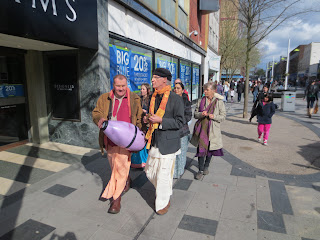
Then I joined the famous Saturday night harinama in downtown London where lots of people enjoy interacting with the Hare Krishnas. Let me show you some pictures of the people dancing with the devotees. See how happy they are:


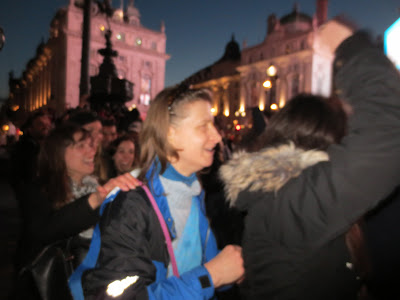



On the boat to France enroute to Amsterdam for Queen’s Day, I took my harmonium out our van in case there were an opportunity to play it. During the journey, I went out on the no-smoking deck with my harmonium, and I was talking with my friends when a small Indian-looking girl asked if I could play her some music. I was overjoyed that Krishna had created an opportunity for me, and I chanted the Hare Krishna mantra five times, in the usual call and response fashion with my friends. The girl and her brothers and sisters, all older than her, smiled and clapped along. Her brother asked if I had met His Divine Grace Bhaktivedanta Swami Prabhupada. I explained that I met the Hare Krishnas in 1979 but Prabhupada left this world in 1977, so I had not. The young man explained how he had read Prabhupada’s Life Comes from Life and that he gained the conviction the theory of evolution is incorrect. The family was from The Hague in Holland and was originally from Surinam, the home of many Indian immigrants, including their forefathers. I told the brother about our book Forbidden Archeology which shows how much evidence contradicts the theory of human evolution and gave them my card so I could tell them of our programs in The Hague.
London
In London one young French lady came to the temple one evening, and Erzsebet from Hungary, who is enthusiasm personified in outreach, sold her a book which she read that very night. She returned to the temple the next day and came to the lunch program lecture which I gave. Later I asked the devotee lady who talked to her during the lunch if the class had been beneficial for her. She said the French lady said she really liked the idea that we can have one of five relationships eternally with Krishna. The devotee lady asked her which one she liked, and she said she would like to be the friend or lover of Krishna eternally. I had spoken on the verse where Krishna states that he will reciprocate with us according to how we surrender to him. In his purport Srila Prabhupada writes, “One devotee may want Krishna as his supreme master, another as his personal friend, another as his son, and still another as his lover. Krishna rewards all the devotees, equally according to their different intensities of love for Him.” (Bg. 4.11, purport) I will keep this verse in mind as a good one to give introductory classes on that might attract one to Krishna. The French lady lives in Paris and shared contact information with devotee who spoke to her at lunch, so hopefully her interest will develop, and she will visit our temple there.
Sheffield
I chanted in Sheffield alone before the Wednesday nama-hatta meeting. Some people appreciated but one lady harassed me so much to give her a pound fifty for the bus, that I finally did so just to get her to go away.
It was nice to see a couple new people had become regulars at our Sheffield program since last year.
Leeds Farmers Market Harinama
My bus from Sheffield to Newcastle had a forty-minute rest in Leeds, and as we pulled into the coach station there, I noticed it was right next to the Leeds Farmers Market. When the bus stopped I learned of the break, and the bus driver advised me to go to the farmers market to get a bite to eat. I decided to go, not to shop, but to sing.
As soon as I sat down to saing, someone said, “Haribol!” And someone very soon gave a donation.
Newcastle Area Harinamas
I chanted in Newcastle, and different devotees would come out with me at different times. I would put out a hat to collect donations when we stayed in one place, and I would offer invitations and books to those who gave something, no matter how small. Because not everyone would take a book, I got enough in donations to pay for the books that were distributed. It was nice to always see books going out
The weather was wild. Some days were in the 40s F (5 to 10 C), and with winds from the north at 20 mph (32 kph).
In Sunderland we had four devotees, three singing and one distributing books. In addition, I was able to distribute three books myself by asking people who put money in the hat if they wanted one. We chanted about an hour and forty minutes. I like Sunderland because there are lots of people and always a few favorable ones. Kadamba Kanana Prabhu from Hungary had not been on harinama for ten years, and he was very happy he came out. One young lady who chanted with us got a call from a friend in London who asked if she was singing in Sunderland because someone had taken a video of her singing and put it on Facebook. Her friends from her hometown of Sunderland did not know much about her relationship with Hare Krishna, at least until now.
In Newcastle on Sunday, Bhakti Rasa and his wife, Kirtida Prabhu, came out, and we happened to meet Ekacakranatha Prabhu on the way.
We chanted three hours all together. People danced to the music, like these four guys below.
Harinamas in North Ireland
When my friend, Caitanya-candrodaya Prabhu, was temple president of Belfast, I got in the habit of going there and doing harinama. Devotees had occasionally talked about us chanting in different places around Belfast, but it did not happen until this year.
Monday Ananta Nitai Prabhu, who traveled by bus from Dublin, and I who traveled by plane from Newcastle, arrived at the Belfast temple within five minutes of each other. We were greeted by Bhagavata Dasi, our harinama partner from Govindadvipa, who moved back to Belfast and promised to take us out on harinama in her car the next four days. We were also greeted by all kinds of maha-prasadam, the opulence of a small temple. That day just Ananta Nitai and I went out to Belfast city center to chant for three hours. While traveling there by bus, the sun was shining, but as soon as I got off the bus, it started to rain. We found a sheltered spot to chant, and were greatly relieved when the sun shone again. But that was not for long. Soon it rained again. But again we were relieved when the sun again shone. During that harinama, the sun came out four times and it rained five times! As I walked back to take the bus home, chanting on the way, it was raining, but on the bus itself, the sun came out! That was the craziest weather I had experienced recently, but we were able to keep the chanting going the whole time, and collect donations and give out books and invitations as well.
On Tuesday, Bhagavata took us to Lisburn, about 15 minutes from the temple. We chanted on a main street and several groups of people stopped to watch at different times. At one point, we chanted under the sign of former birthday party shop underneath its sign “Pure Party.”
The congregational chanting is glorified by Lord Caitanya “cleansing the mirror of the mind,” and being “the nectar for which we are always anxious.” It is described by Narottama Das Thakura as imported from the spiritual world. For these reason, I thought “pure party” was a great description of harinama.
We found some teenage kids hanging out, and we sang in their midst for a while. I would have never done it myself, but the other devotees were better at dealing with kids than me, so I went along with it. At one point, the kids decided to harass us. Some of the more rowdy ones placed some nearby road construction barricades to surround our party, and they started throwing empty plastic bottles at us. We just kept chanting, and one of them decided to remove the barricades and throw the bottles in the trash so the other kids could not through them at us any more. Later someone asked us about our philosophy and one girl, who took pleasure in singing the whole mantra with us, gave us each some candy when she left. On the whole, the kids became more favorable as time marched on.
Since we had stopped chanting before we finished my quota of three hours, Ananta Nitai and I chanted in the parking lot of a store while Bhagavata did some shopping for the temple. We chanted for half an hour, and no authorities asked us to move, and some favorable people came by.
Wednesday we chanted in Bangor, and a passerby gave 10 British pounds for a Bhagavad-gita and a Sri Isopanisad. We chanted next to a butcher shop, and employees came out of the shop and looked at us from time to time but said nothing. After we chanted two and a half hours, a policeman came and explained that he had no problem with our singing, but some local vendors were complaining, and he told us of a couple other places where we could sing and would not get into difficulty. He was the most polite policeman who had ever asked us to move, and Ananta Nitai Prabhu gave him a small book which he accepted.
Thursday we chanted in Newry on a day where rain often threatened but was never so severe we had to stop. At several times groups of teenagers would sit behind us and move with the music.
On Friday we chanted in Hillsborough, a town of 3,400 people, where there was that day the Garden Show Ireland, an open house at the gardens of the Queen’s Hillsborough Castle.
John Doherty, an open-minded man, with both Catholic and Protestant connections, was attracted by our party and its chanting, appreciating its religious connection, and he took pictures of us, which he later send to me by email.
Often I give my business card to photographers who take pictures of us and ask them to send me the photos. They actually send me the photos 20% of the time at the very most, but in North Ireland and the Republic of Ireland people sent me the pictures two out of three or four times I asked for them.

A man behind the counter at tourist office, said to me, “Hare Krishna is from North India, isn’t it?”” I explained that the chanting we do in the streets, which we were doing outside his office for the last hour, started in Bengal. He inquired further, “And what is the name of the town in Bengal?” And I replied, “Mayapur.” And he said with a smile of recognition, “Oh yes, Mayapur!” Wow! I couldn’t believe it! In this tiny town in this remote land someone had heard of Mayapur, the birthplace of Sri Caitanya Mahaprabhu! Apparently the man spent some time in Kolkata and had eaten at our Govinda’s Restaurant there. It is a small world!
The man also knew of Inis Rath island and their Sunday feast, and the lady in the office lived in Dunmurry, the Belfast suburb where our temple is, and she knew of our Sunday program there.
After Hillsborough, Ananta Nitai Prabhu and I boarded a bus for Dublin to continue our harinama adventures there.
Our Third Twelve-Hour Harinama in Dublin
On Saturday, May 18, we chanted Hare Krishna on the streets of Dublin from 9:00 a.m. to 9:00 p.m. In the beginning it was just the organizers, Ananta Nitai Prabhu and myself, and we did a walking harinama around the city for the first two or three hours. Then others joined us, and we chanted on the sidewalk by the intersection of Middle Abbey Street and O’Connell Street, less than half a block from the temple. The weather was good for Ireland, not too cold, windy, or rainy.
The brightest side of this twelve-hour harinama was the participation of Premarnava Prabhu, which dramatically increased since last year from five to nine hours. At one point, he chanted for four and a half hours straight! He is playing harmonium in the picture below accompanied by Ananta Nitai Prabhu on the drum.
Some onlookers enjoyed interacting with the devotees in different ways.
There are always unusual things that happen on harinama.
One lady, who regularly comes to the temple, helped by playing the karatalas, while carrying her pet dog in a knapsack on her back the whole time.
Two guys with horse heads who passed by us four times, dancing every time. Somehow I never got my camera out in time to photograph them.
An orange tiger danced with us, clapping his hands as well, and one brahmacari suggested we have a tiger with us as a regular feature to attract attention to the chanting!
Speaking of tigers, Tyger Lillie, who is from Gainesville but studying in Dublin for Summer A, recognized me from Krishna Lunch and Krishna House. I told her about our Sunday feast program and three Govinda’s restaurants in Dublin and gave her a maha-prasadam cookie from Radha-Madhava in Belfast, and she was very happy about that. I hope she can take advantage of our opportunities for connecting with Krishna in Dublin.
Because of the cold and wind, because I had taken small meals for breakfast and lunch, and because I was tired from standing up for so many hours, during the last hour of the twelve-hour harinama I found myself looking at the clock every five minutes. I realized I had do to something about this ridiculous situation. I decided to control my mind with my intelligence, and just focus on two things, chanting Hare Krishna and hearing Hare Krishna. Then the time sped by.
Except for the twelve-hour kirtan day, we did harinama every day in Dublin. Again, as had happened during our twelve-hour harinama, others, sometimes wearing costumes, would briefly join the harinama party in a jolly mood!
Photo (c) 2013 David Gray, another friendly soul in Ireland, who kindly emailed his wonderful photograph to me at my request.
Twelve-Hour Kirtan in the Dublin Temple
Monday, two days after our twelve-hour harinama, we had a twelve-hour kirtan at the temple, from 10 a.m. to 10 p.m. The most striking thing for me was the interest of people who were newly introduced to Krishna consciousness. One Iranian man, who had been coming to the temple programs for at most a week, having received a book by Golukendra Prabhu on the streets, amazed me by participating for over ten hours in our kirtana event. A girl from Brazil, who had only been coming for two weeks, spent five hours in the kirtana, blissfully listening to the transcendental sound vibration. A couple young ladies from the yoga scene, spend several hours in the kirtana. Premarnava told me they had come to a twelve-hour kirtan the Dublin devotees did on Christmas, and just a week before this once in May, they had asked him if there was going to be another one, and so they learned of it and came.
One devotee youth danced with child of an Indian lady during the transcendental music. Both of them, and the child’s mother as well, were present for several hours of the kirtana.
One girl from Slovakia, who spent a lot of time in the twelve-hour kirtana, came out on harinama for the first time the next day and distributed invitations. On the harinama she talked to someone who appeared to really like the chanting, and the girl told how she had danced with us on Saturday, during our twelve-hour harinama.
We took turns leading the chanting during the day.
Nanda Kumar Prabhu and his wife sing sweet kirtan.
Manu Prabhu played the accordion at the end, getting lots of people dancing.
I was pleased to see the great interest in the twelve-hour kirtana event, and the Dublin devotees, also inspired by the participation, spoke of planning another one for the next Ekadasi.
Nrsimha Caturdasi Harinama in Newcastle
Despite temperatures in the forties (below 10 C), with 29 mph (47 kph) winds from the northeast and intermittent rain, a party of seven devotees chanted in downtown Newcastle upon Tyne, for three hours to celebrate Nrsimha Caturdasi. Although daily public congregational chanting was demonstrated in the life of Sri Caitanya Mahaprabhu, often we do not make it part of our celebration of our festivals, although I personally think it adds a lot. Once thing it does is engage the public in the celebration of the holy day, even unknowingly, to their great spiritual credit. Also the chanting seems to have a more powerful effect on the holy days. Thus I was very happy that leading devotees like Bhakta Rasa and his wife, Kirtida, were supportive of the idea of celebrating Lord Nrsimha’s appearance with three hours of harinama.

Kirtida dd, in the pink sari, led a fired up kirtana, dancing as she played the harmonium. The two young women with her must have danced with us for half an hour, continuing even after it started to rain. They appeared to be so happy dancing with the Hare Krishnas, like it was the most fun they had in a long time. Originally those two girls and two more friends were sitting on a bench and watching us. Then two of them gave donations, and I gave them books and invitations, which they looked at. Then after some time, they came to join the dancing.
Despite the cruel climate, Bhanu, the child of Satya Medha Gauranga Prabhu, who took the photos, was peaceful in his stroller (buggy) the whole time except later when he moved his legs with the music so much one shoe fell off.
On the next Sunday feast, we talked about and also had a puppet show about Lord Nrsimha. After the whole feast program, Diya and her friends, were so fired up they had an extra kirtan in the gift shop:
Sunderland Harinama
Satya Medha Gouranga Prabhu writes of our Sunderland harinama, and in his account I include in square brackets additional details of my own, “There was a very sweet harinama in Sunderland (or ‘Shyama-sunderland’ as His Holiness Janananda Gosvami Maharaja calls this place!)
“
There were lots of people on the street. An elderly gentleman came to give a donation [as we were walking to our harinama site], and then Krishna-kripa Prabhu approached him to give a book. He said with a smile: ‘For many, many years I have seen the Hare Krishna people on the street. It’s really nice to see you all again.’
“
Later on a lady stopped by and mentioned about George Harrison. It’s really great to see how so many people appreciate the harinama.
“
After a while a group of [four] teenagers [who had walked past previously] came and stood nearby. They were listening to harinama. Then they started swinging gently with the beautiful tune of maha-mantra and gradually started dancing. They kept on dancing and smiling. It looked so natural for them. Krishna-kripa Prabhu took out few leaflets of maha-mantra from his bag and gave them to the teenagers [pointing out to them the words to the song].
“Now each of them was holding the maha-mantra in her hand, and they started reading word for word and singing to it. Practically each of them was singing as they were reading out the maha-mantra.
“It was a wonderful scene—suddenly so many voices singing maha-mantra, the people on the street were amazed to see this.
“
After the harinama Krishna-kripa Prabhu was preaching to the group of young people
and invited them to come to temple programs.
“
As they were leaving they looked so bright, happy and blissful.”One of the group had taken a video of her friends singing and dancing with us, and asked her to send me a link to the video, but as is mostly the case, she did not. The young people joined in the kirtana for fifteen minutes, and because they had come just as we were going to finish, we ended up staying out an extra fifteen minutes just because of them!
Traveling with the Scottish Brahmacaris
Raghunatha Bhatta and Caitanya Vallabha Prabhu, in addition to distributing Srila Prabhupada’s books in Scotland and The North of England, also help organize and maintain the nama-hatta programs in the Manchester area. The end of this month, I joined them as a lecturer and kirtana leader for their programs in Sheffield and Preston. It was nice to spend a couple of days with a brahmacari
Diary of a Traveling Sadhaka, Vol. 9, No. 24
By Krishna-kripa das
(December 2013, part two)
New York
(Sent from Gainesville, Florida, on January 12, 2014)
Where I Went and What I Did
I continued chanting in New York City as part of Rama Raya Prabhu’s harinama party for five or six hours a day, and chopping vegetables for Govinda’s Vegetarian Lunch at our Brooklyn temple. I visited the Quaker Meeting in Brooklyn the Sunday before Christmas and went to the Doughnut Plant that evening with my sister and her daughter, and one of my sister’s friends. I visited my family in Albany on Christmas Eve and Christmas. I also was a guest speaker at a Friday Gita class in Queens, and twice the speaker at Atmanivedana Prabhu’s program at 26 2ndAvenue on Saturday, where I made sure to have a stand up kirtana at the end with lots of dancing which people liked. Thus it was a busy time. As this is the last journal for 2013, I include my accounting and thank the many, many people who donated to allow me to share the Hare Krishna mantra and philosophy in different places.
Laksmi Nrsimha Prabhu and his wife invited Jayadavita Swami to speak a few times at their Monday evening program at 26 2ndAvenue, so I continue to share notes from his lectures. I also have some notes on a class by Candrasekhara Swami. All this in addition to some quotes from Srila Prabhupada’s books and Satsvarupa Dasa Goswami’s journal.
Thanks to Braja-raja Prabhu for his videos, Alex Vaishnava for his photos of harinama in Times Square on New Year’s Eve, and Silvana Delgado from Columbia for her video of harinama in Union Square.
Itinerary
January 13–February 7 – Gainesville, Florida
February 8–11 – Tallahassee
February 12–13 – Jacksonville, Florida
February 14–February 19 – Gainesville, Florida
February 20 – Orlando and Philadelphia
February 21–24 – Dublin, Ireland
February 25 – Mumbai
February 26 – on a train between Mumbai and Howrah
February 27–April 14 – Mayapur
April 16 – Mumbai
April 17 – Dublin, Ireland
April 27 – Kings Day, Amsterdam, The Netherlands
May–July (first two-thirds) – The North of England, Birmingham 24-hour kirtana, London Ratha-yatra, Stonehenge Solstice Festival
July (last third)–August (first two-thirds) – Baltic Summer Festival, Polish Woodstock, Czech Woodstock
August (last third)–September (first half) – The North of England
September (rest) – New York
Income and Expenses for 2013
Income
-
|
Donations
|
4224.00
|
|
Book Sales
|
7.60
|
|
Loan Repayment
|
50.00
|
|
Total Income
|
$4,281.60
|
Expenses
-
|
Travel
|
3309.90
|
|
Gifts
|
444.57
|
|
Supplies
|
118.46
|
|
Festival Fees
|
47.22
|
|
Internet/Phone
|
20.56
|
|
Food / Water
|
8.27
|
|
Total Expenses
|
$3,948.98
|
Comments: I do not usually ask people for donations unless I need cash for a ticket to America, Europe, or India. Sometimes people give me donations when I give lectures or do extra harinamas in their region. I do sell more books than appears from this statement, but the funds are for the temple or project I am currently working on. Phone and internet are small because the U.S. government gives free phones to single people making less than $16,000 per year, because devotee friends sometimes top up my UK phone as a favor, and many temples have wireless internet. Food expenses are minimal as I eat in the temples. Gifts include donations to swamis and temples, and prasadam for relatives. Travel expenses in 2013 included the costs of going to New York and Florida, in the United Statues, and England, Belgium, Holland, Ireland, Lithuania, Poland, Germany, Czech Republic, and Slovakia in Europe, and buying a ticket for my biannual trip to India in February 2014.
I want to thank the following people who kindly gave donations to me in 2013. They are listed in order from largest to smallest amounts, along with where the contributors are from, where they are living now, or where I met them. Rama Raya Dasa (NYC), Kaliya Krishna Dasa (NYC), Prema Sindhu Dasa (Columbus), Prema Vilasa Dasa (Columbus), Dhruva Dasa (Kansas City), Kalakantha Dasa (TP Gainesville), Uma Devi Dasi (Tampa), Pat Beetle (my mother, Albany), Praghosa Dasa (GBC, UK & Ireland), Newcastle, England, temple, the people who gave donations on harinamain many places, Atmanivedana Dasa (NYC), Janananda Goswami (UK), Charu Gopika Devi Dasi (Queens), Den Haag temple, Premarnava Dasa (Dublin), Sivananda Sena Dasa (Rotterdam), Prema Sankirtana Dasa (Newcastle), Jivamukta Yoga School (NYC), Naveen Krishna Dasa (Columbus), Nanda Kumar Dasa (Gainesville), Sthita-dhi Muni Dasa (Alachua), devotees from Leeds, Govind (NYC), Vrajendralal Dasa (Bolton), Caru Candra Dasa (Leeds), Clive (Chester), Raj Sharma (Leeds), Amsterdam temple, Ananta Nitai Dasa (Dublin), Gopali Devi Dasi (Slovakia), Pankajanghri Dasa (Queens), Bindu Madhava Dasa (NYC), Dauji (Switzerland), Kapil (Queens), Victor (Albany), Sunanda Dasa (Queens), Stevie B. (London), Alexi (London), Karen (my sister, Albany), Mr. Joshi (Plymouth), Govinda Prabhu (Bhaktivedanta Manor), Asta-sakhi Devi Dasi (Holland), the Sheffield devotees, Muni Priya Dasa (CZ), Daru Das (Tallahassee), Haryasva Dasa (Philly), Rasikananda Dasa (Alachua), Bhakti Rasa Dasa (Newcastle), an Indian guest (Sheffield), Magdalena (Liverpool), a man in pub in Hazel Grove, Nayan (Bhaktivedanta Manor), Ram Charan (London), a new devotee (Bratislava), Iksvaku Dasa (Amsterdam), Bhakta Andrej (London), Jivananda Dasa (Slovakia), Bhaktin Erzsebet (London), a man at the Philadelphia airport, and a Birmingham devotee.
Many other people helped in different ways. Candrasekhara Swami (NYC) donated two shirts and a sweater, Bhagavata Dasi (Belfast) donated a hat, Govind (NYC) donated a gamsha and three sets of counter beads, Gaura Keshava Dasa (Slovakia) donated some shoes. Prema Sindhu Dasa (Columbus) and Kaliya Krishna Dasa (NYC) also purchased airline tickets for me to Columbus and New York, respectively. My family donated figs, chocolate, and socks for Christmas. Kapil (Queens) gave me a orange sweater, and Larry (Brooklyn) an orange hat. Amrita Keli Devi Dasi (JAX) gave me some coconut oil.
If I forgot you, let me know, and I will apologize and I will mention you in my next journal. Too many people to mention helped with rides and accommodation.
Thank you all for assisting me in promoting the chanting of Hare Krishna and the knowledge in the transcendental literature given by His Divine Grace A. C. Bhaktivedanta Swami Prabhupada.
Harinamas in New York City
We continued mostly in the subway stations, occasionally chanting in Union Square or Washington Square Parks.
Braja-raja Prabhu took some attractive video [http://youtu.be/vnSmt5d3VEg] of us chanting at the Times Square subway station. It includes my exchange with a passerby, who when asked where he encountered Hare Krishna before, replied with a smile, “Everywhere!”
Even on one cold night in Union Square, many devotees came out.
There is one man who has trained his cat to sit on his head.
At one point, he was even doing some dance steps to our music!
One old man appreciated the chanting.
Displaced from Union Square by the Christmas Market and Green Market, sometimes we chanted at Washington Square Park.
Here a whole family participated.
Here a guy joined us, playing the gong at the back of our party.
Back in Union Square, one girl enjoyed dancing and playing shakers.
Then a group of two adults and two kids all played the instruments with us.
One day at Washington Square Park was very warm.
A father and daughter danced, even as they went on their way.
A young woman enjoyed dancing with us.
Later she looked at the books.
At Union Square, one cab driver danced with upraised hands as he walked to his cab’s trunk to unload his passengers’ luggage . . .
. . . and then again while returning to the driver’s seat!
The day after Christmas at the Union Square subway station, a couple from Columbia in South America was happy to encounter our harinama party. The guy enjoyed playing the shakers and dancing, and the lady took a video [http://youtu.be/z4C_7sKHhDs] of us all. At that time, Sofia from Siberia was singing and Rama Raya Prabhu was playing the harmonium, as you can see:
A few days later they passed us in Grand Central station, and I thanked the lady for sending me her video.
At Delancey Street a man in a Christmas hat happily played the gong.
There four friends danced in front of our party for almost an hour.
One day at Union Square subway, three girls chanted happily with us for half an hour.
Later four guys played instruments and clapped.
Their leader was familiar with kirtana.
Later another girl joyfully chanted with us.
The last Saturday in December was very warm, and we chanted in Union Square. Brajaraja Prabhu took some video of children participating and posted it on Facebook:
One girl passing by our party at Union Square subway station, joyfully said to her boyfriend, “I love Hare Krishna!”
One evening when we were chanting at Grand Central on the long hallway between the other subways and the Times Square shuttle, two policemen passed our party just as one of our lead singers finished his shift and the kirtana suddenly stopped. One of the policemen exclaimed, “Why did you stop?” It made me smile. Usually policemen want us to stop singing, but this one wanted us to continue!
On New Year’s Eve, Rama Raya Dasa‘s harinama party chanted on the outskirts of New York’s Times Square festival. One Arabic mother from Dubai and her two kids danced with us for twenty minutes, and you can catch glimpses of them in this video (http://youtu.be/5whX4vCh-PI).
It was awesome to see her joy at dancing in the kirtana. Later a Brazilian couple followed us for over an hour, smiling and moving with the sound of the kirtana.
The lady (above) expressed interest in looking up Hare Krishnas when she returns to Brazil the following day.
It was seriously cold, 26° F or –4° C, and that was at 11:08 p.m.
One girl passing by told her boyfriend, “That’s ‘Auld Lang Syne!’”
Atmanivedana Prabhu’s Program at 26 2ndAvenue
It is wonderful that Atmanivedanta Prabhu and his wife, Subhie, are dedicated to having a Gita class every Saturday evening at 26 2ndAvenue. The people who come really enjoy discussing the philosophy and asking questions. I am trying to always have a nice standing up kirtana with dancing at the end, and people have been liking it. It is great to see this pilgrimage place of Hare Krishna history nicely utilized. Laksmi Nrsimha Prabhu and his wife also have a program there on Mondays.
Charu Gopika Devi Dasi and Her Queens Program
Charu Gopika Devi Dasi uses the Internet to invite people to her home every Friday for a Hare Krishna program. She has interested some completely new people who have become regulars in that way. I was inspired by her dedication and innovation and hope to visit her program at least once each time I come to New York City.
Visiting the Friends Meeting in Brooklyn
I decided to visit the Friends Meeting (Quakers) in Brooklyn which is just three and a half blocks down Schermerhorn Street from the Brooklyn Hare Krishna temple. I had a friend from when I was teenager who attends that meeting, and I also like to share my realizations with them and hear what they have to say. My first encounter with the joy of the congregational glorification of God was singing Christmas carols with the members of the Albany Friends Meeting as a youth. Their worship, however, is sitting in silence, thinking about God, and sharing realizations. Learning of the power and joy of the practice of singing the glories of the Lord, I always think that the Quakers would do better to add more singing to their practice. Thus I mentioned in the meeting about my early experience with singing the Christmas carols and saying that they could take advantage of the season to do more of that. Surprisingly enough, at the end of the meeting, in honor of Christmas, the First Day school children entered the meeting room, stood right next to where I was sitting, and sang the song “Silent Night” for the pleasure of the congregation. Later I talked with an older lady who was originally from the Santa Monica meeting. She said in that meeting, in addition to speaking realizations during meeting, it was accepted, and even welcomed, if people would sing a song expressing their message. I told her how song is more common in Quaker services in recent years, and in Albany for half an hour one week a month they sing spiritual songs before meeting, and in Tallahassee some members come early and sing for fifteen minutes before meeting every week. She was inspired to suggest they might try that in Brooklyn. I also met a girl who asked the blessings of the congregation for her trip to India, and I offered to tell her of some special places to visit there.
Christmas in Albany
Victor greatly facilitated my program of making prasadam for my friends at the Albany Friends Meeting by greeting me at the Chinese bus in Albany with all the ingredients I needed for cooking. Since my sister had her own extensive cooking project, I cooked at the Friends Meetinghouse. A friendly Peruvian Catholic lady, Arinca, there with her Quaker friend, Crystal, kindly helped me grate for 4.5 cups of carrots that Victor had peeled, thus I was able to finish the carrot-coconut rice from Yamuna’s cookbook on time. I played a nice Hare Krishna kirtana tape while I cooked, which no one objected to.
We attended the Christmas play at the Albany Friends Meeting, and as usual people dressed up to act out different parts of the narration of Jesus’s appearance story, which included few appropriate songs which the congregation sang.
My eighty-nine-year-old mother played an angel.
When the congregation sang the songs about the birth of Lord Jesus Christ, there was a nice spiritual feeling in the atmosphere.
After the drama, someone read The Christmas Miracle of Jonathan Toomey, a story about a wood carver whose hard heart was softened in the course of carving the figures in the Jesus story. Later at my sister’s house my family read The Best Christmas Pageant Ever, a story of a family of delinquent children who become righteous in the course of enacting a drama of the Christmas story. It is interesting to me that the transforming power of narrations concerning God or the son of God is a common theme in these two fictional stories. Different verses in India’s Vedic literature refer to power of transcendental narrations such as: “On the other hand, that literature which is full of descriptions of the transcendental glories of the name, fame, forms, pastimes, etc., of the unlimited Supreme Lord is a different creation, full of transcendental words directed toward bringing about a revolution in the impious lives of this world’s misdirected civilization. Such transcendental literatures, even though imperfectly composed, are heard, sung and accepted by purified men who are thoroughly honest.” (Srimad–Bhagavatam 1.5.11) The story of the appearance of Lord Jesus Christ, who Srila Prabhupada considered to be a saktyavesa avatar of the Lord could be considered in this category of transcendental literature.
On Christmas I gave my adventurous niece, Fern, Radhanath Swami’s book, The Journey Home, her boyfriend, Oliver, who is studying philosophy, Bhagavad-gita, Victor, who has some devotional inclinations, The Nectar of Devotion, and my mother, Pat, the peace activist, Sri Isopanisad, with its message of peace through accepting our God-given quota and not taking that of others. I could not find a book I thought my sister would really like on our harinama book table.
Thus I decided to order for her online a Hare Krishna cookbook that she doesn’t have, Great Vegetarian Dishes by Kurma Dasa.
Oliver said he had read some passages from the Gita, and he was happy to get the entire book.
I also gave all my relatives each a piece of maha–prasadam pera from Radha Govinda.
I received two package of figs, one of my favorite treats, some chocolate, and a couple pairs of socks, useful for keeping warm on harinama.
Some people living near my mom had an elaborate display of Christmas lights which was hard to avoid taking a picture of.
Is it all done for the glorification of the Lord and free of karma? Let’s hope so.
To see the photos I took but did not include in this journal, click on the link below (the unused pictures appear after the used ones):
Insights
Srila Prabhupada:
from Sri Caitanya-caritamrita, Madhya-lila 11.89, purport:
“Simply by accepting the associates of Lord Caitanya Mahaprabhu as nitya-siddha [eternally perfect], one can very easily go back home, back to Godhead.”
from Sri Caitanya-caritamrita, Madhya-lila 11.95, purport:
“There are many professional chanters who can perform congregational chanting with various musical instruments in an artistic and musical way, but their chanting cannot be as attractive as the congregational chanting of pure devotees. If a devotee sticks strictly to the principles governing Vaishnava behavior, his bodily luster will naturally be attractive, and his singing and chanting of the holy names of the Lord will be effective. People will appreciate such kirtana without hesitation.”
Satsvarupa Dasa Goswami:
“Today’s drawing shows three
bhaktasdancing and chanting
with upraised arms.
They are jolly and moving
together. They are detached
from the material world.
They avoid intoxication
illicit sex, meat-eating
and gambling. This
situates them on the transcendental plane.
They have no anxieties
or fear for material life.
This because they are
chanting the great mantra
for deliverance which
puts one under
Krishna’s protection.
The mantra is
so powerful it
beats back the material miseries. Anyone
can receive this position
if he or she chants
in a submissive, surrendered mood.”
“Today’s drawing shows four
bhaktasdancing and
chanting with upraised arms.
They are jolly and
moving together.
Prabhupada encouraged us
right from the beginning
in 1966 to get up
and dance. When the
first boy, Bob Lefkowitz
danced, I thought
he was too sensual, but
Swamiji smiled at him
approvingly. Later I
rose for the first time
and did the Swami
step, and he nodded that it
was good. In
later years the
dancing grew more
choreographed and wild.
But Prabhupada allowed it.
He just wanted to see
that we were enthusiastic.”
Jayadvaita Swami:
Devotional service is practical activity, not imaginative ecstasy. The example could be given that a man comes home and asks his wife if dinner is ready, and she simply says, “I love you so much.”
Bhakti is not just a feeling, but practical service, and that service is performed in knowledge.
[After telling the story of the bum who donated toilet paper to 26 2ndAve.:] We are all more or less bums, just of different caliber.
We at the BBT (Bhaktivedanta Book Trust) would have put a ceiling on editing the books a long time ago, but we keep finding things that really need to be changed.
Srila Prabhupada told Hayagriva he could use the Bhagavad–gita translations from the other editions which were more or less accurate. Hayagriva said that would be plagiarism. Prabhupada replied, “What plagiarism? They are Krishna’s words!”
Hayagriva’s son Stambha delivered some of his father’s papers to the BBT not long ago. In them I found a page of the Gita manuscript with Srila Prabhupada’s introduction of a handwritten line blasting Mayavadi philosophy. It is good we did not put a ceiling on the Gita so we can include this change Prabhupada obviously wanted.
I think for everyone to be concerned about everything is psychologically unhealthy, and Krishna recommends that one be concerned about doing his own duty.
I think that it would be better if those concerned about the editing issue voiced their concerns to the people who can actually do something about it and not by mentioning them on Facebook.
One might ask if we can change the format of the books, by eliminating the Sanskrit, the word synonyms, the transliteration, etc. The BBT trustees are discussing this issue, but it has not yet become an Internet discussion.
When I was at our temple on 55thSt. I revised the translations for the first two chapters of the First Canto of the Srimad-Bhagavatam. When Srila Prabhupada was visiting New York, I was going to drop them off with his secretary, but he was there, and he had me read a few of them to him. He heard them and asked what I had done.
I said, “I just tried to make them closer to what you originally said.”
He said, “Oh, in that case, it is alright.”
Although Srila Prabhupada blasted Radha Vallabha for liking to change things too much, when he proposed to resign, Srila Prabhupada would not allow him to, saying “What else can he do?”
There are genuine issues and then there is internet madness, which unfortunately obscures the real issues.
Comment by Abhirama Prabhu:
When Srila Prabhupada was personally present, and we did not understand something, we would ask him about it, and he would explain it in another way. We can understand from this that Srila Prabhupada approved of different explanations of the same thing as long as the meaning was not altered.
Q: There is so much controversy about this edition of Bhagavad–gita or that edition. Is there something else I can do besides reading Bhagavad–gita?
A: Yes. You can chant Hare Krishna. That was one of the original attractions for me. I saw philosophy in school was just a lot of hot air with nothing definitive about improving my life. Thus when Srila Prabhupada presented that the Hare Krishna mantra came directly from the transcendental plane beyond the mind and intelligence, I thought that was great—I can circumvent all the hot air and attain the spiritual plane.
Actually the differences in the editions of Bhagavad–gita are really minor. It is not like Krishna is supreme in one edition and Shiva is supreme in another.
Q: So I am to understand that by chanting Hare Krishna I will be able to actually understand either edition of Bhagavad–gita?
A: Yes. The chanting cleanses the heart so we can understand. That is why we chant before our classes.
Once the GBC suggested the BBT footnote Srila Prabhupada’s statements that might offend some people, but the BBT declined. Who was qualified to make those determinations and where would they end? Srila Prabhupada is against anything except pure devotional service to the Absolute Truth, the Personality of Godhead, thus there is something Srila Prabhupada’s books that will offend anyone.
We have a few “will not fixes,” things that Srila Prabhupada said a certain way, and we are not going to change them.
Some things are hard to define. How many hairs do you have to have on your face to have a beard? Twenty? Forty?
I suppose if Srila Prabhupada were here, there may be a few changes he didn’t like. [With folded hands:] “I am sorry, Srila Prabhpada.” But he would be very happy so many important corrections were made.
[After class, Jayadvaita Swami advised one disciple of Tamal Krishna Goswami to take second initiation from a swami who has a relationship her initiating guru and who will continue guiding her in the same direction.]
Death for the devotee is the path back to Godhead. Death for the atheistic is total loss.
Death of the demons is compared to the cat capturing a rat. Demons are like rats. Rats always hope the cat is absent so they are free to do as they please.
The people who pass by us at the subway station benefit. They are not hearing the holy name offensively; they like it. Their misunderstandings compared to their appreciation are insignificant.
Q (by Abhirama Prabhu): Is that first smile of those who hear us chanting, worship of Krishna?
A: Yes. They are appreciating Krishna in the form of His name. Otherwise, they would not be wandering through the subway system thinking, “I love God.” But they love the chanting, and the chanting is not different from Krishna.
Q (by Murli Vadaka Prabhu): Doesn’t Krishna make it hard for us after the initial stage?
A: No, we make it hard for ourselves because of our misgivings. We did not realize how dirty our consciousness is, and what it will take to clean it.
Happiness is more than just maintaining a smile. It involves sacrifice. Like the happiness of the warrior is to fight for the protection of the innocent people although it may be troublesome. Or the happiness of the nurse is taking care of the patients despite so much inconvenience. Similarly the devotee is happy despite the difficulties in executing devotional service.
Comment by Abhirama Prabhu: We see people on harinama who are so happy to encounter the devotees and the chanting that their eyes fill with tears of joy.
We can be as happy as the newcomers on harinama. If we think we have too much work to do and so we cannot go, then we will miss out on that happiness that even the newcomers experience.
The Six Goswamis were engaged in utkirtana, the loud chanting of the holy name, and they were big, big philosophers.
Q (by Murli Vadaka Prabhu): What about people in other traditions who engage in some limbs of devotional service but still engage in sinful activities?
A: It is good they are chanting the name of God, but not good that they engage in sinful acts. Still they are much better than those who do not engage in any acts of God consciousness. They can maintain their situation in their own tradition, and learn from the Hare Krishna devotees to avoid illicit sex, meat-eating, intoxication, and gambling.
I do not think I am afraid of birth and death. But I am afraid of dying, and coming back, and having to go through adolescence again.
Once Basu Ghosh Prabhu was telling Srila Prabhupada some of the austerities the Jews perform, and after hearing these, Srila Prabhupada said, “Something good.”
Philosophically one should find an uttama-adhikari, or a devotee on the highest level to be one’s guru. But Lord Caitanya did not make a big issue of it. He simply accepted that anyone who knows the science of devotional service to Krishna is qualified to be a guru.
One must see that Krishna is coming in the form of the spiritual master.
The devotee thinks, “I may be insignificant, but my spiritual master can take you back to Godhead.”
Just take up the service of Caitanya Mahaprabhu, and all the confidential understandings will be revealed. If we try to pursue these separately we will fail.
Revatinandana Prabhu told Srila Prabhupada that it was his understanding that by chanting and serving his spiritual master, all higher understandings would be revealed. When Srila Prabhupada heard that, he smiled and replied that he was correct and that our process is one of revelation.
Q: What is the difference between kirtana at our temples, and kirtana on the streets.
A: Caitanya Mahaprabhu would do both.
At one point, Srila Prabhupada wanted 24-hour kirtana in all our temples.
When we were working on his books in Boston, the most important work, he still said we should go out on harinama an hour a day, and we would do that. And that hour of public chanting would nourish us the whole day as we were connecting with the people we are supposed to be reaching.
If we just chant in our temples, that would not be the movement that Srila Prabhupada created.
And when we did kirtana in the temple, it was not like Lord Caitanya at Srivasa Angam where outsiders were not permitted. Srila Prabhupada always had the doors open to all.
Ramesvara Prabhu said his realization was that book distributors were in the mood of the gopis because they are bringing others to Krishna for His enjoyment. Someone asked Srila Prabhupada about that, and Srila Prabhupada said Ramesvara was right.
comment by a senior devotee: Srila Prabhupada said humility means to boldly preach Krishna consciousness.
Q: What does it mean that Srila Prabhupada is the siksa guru of everyone in ISKCON?
A: He is the samstapaka-acarya (founder acarya). He created the whole formula. Sixteen rounds of Hare Krishna. Four rules, mangala arati. He made the teachings of the previous teachers accessible to people of the present day. ISKCON is that society that appreciates Srila Prabhupada’s presentation of Krishna consciousness. If you like that, you can be part of it. If not you can look elsewhere.
Govinda Maharaja, successor of Srila Prabhupada’s godbrother Sridhara Maharaja, said, “We are all eating Srila Prabhupada’s remnants.”
Sridhara Maharaja said that if you try to skip over any of nine steps from sraddha to prema, that part that you skipped will remain hollow. I accept that because it agrees with Srila Prabhupada’s condemnation of jumping over parts of the devotional process.
Candrasekhara Swami:
There is an eternal world, one that is not manifest at a certain point, and is thus called aprakat. Not apricot, but aprakat.
Scientists have difficulty explaining the origin of language. From the Vedic knowledge we understand that because language exists eternally in the spiritual world, it exists in this world.
Unless we come to point of an intimate relationship with God, we have not attained the perfection of religion. Developing this relationship is not a minor point but rather is the central point of religion.
The spiritual realm seems to people like an endless prayer meeting, so they are not attracted. God seems like an ego maniac who gets off on engaging people in glorifying Him.
We in the material world are like a teenagers so absorbed in video games that they forget to eat and do not notice people in the room around him.
The Vedic literature describes the spiritual world as having the same sorts of varieties that go on in the material world but in perfection, and thus it is easier to become attracted to go there.
—–
kalim sabhajayanty arya
guna jnah sara-bhaginah
yatra sankirtanenaiva
sarva-svartho bhilabhyate
“Those who are actually advanced in knowledge are able to appreciate the essential value of this age of Kali. Such enlightened persons worship Kali-yuga because in this fallen age all perfection of life can easily be achieved by the performance of sankirtana [the congregational chanting of the holy name of the Lord].” (Srimad-Bhagavatam 11.5.36)
Diary of a Traveling Sadhaka, Vol. 9, No. 23
By Krishna-kripa das
(December 2013, part one)
Gainesville, Tallahassee, Jacksonville, New York City
(Sent from Brooklyn, New York, on December 31, 2013)
Where I Went and What I Did
I chanted at Krishna Lunch in Gainesville for the first week of December. Also during that week, several Krishna House devotees and I went to do harinama and book distribution on Wednesday in Jacksonville at the Art Walk and on Friday in Tallahassee at First Friday. Thursday was the interfaith progressive dinner, so it was a packed week. I stayed in Tallahassee and chanted the next four days there, attending the Sunday feast program and Garuda Prabhu’s Monday yoga class, and having a Bhagavad-gita class of my own. Then I was off to Jacksonville for two days of chanting at the University of North Florida and speaking at the final meeting of their Krishna Club on spiritual pleasure. Then I traveled to New York City to join Rama Raya Prabhu’s harinama party and chant for nearly six hours each day.
In this particular issue I have many great realizations from a variety of senior devotees I met in my travels. In addition to quotes from Srila Prabhupada’s books and Satsvarupa Dasa Goswami’s blog, I have notes from classes in Gainesville by visiting guests Dravida Prabhu and Malati Devi, and notes from classes in New York by Jayadvaita Swami and Krishna Kshetra Prabhu. I also have realizations from the Krishna House devotees in Gainesville from our leader, Kalakantha Prabhu, down to some of the newest devotees. Also there are some quotes from articles in the March / April 2014 Back to Godhead magazine.
Thanks to Lauren Stewart for the photos of me and her dog.
Itinerary
December 31–January 5 – New York City
January 6 – Tampa
January 7–9 – Gainesville, Florida
January 10–12 – Houston
January 13–February 7 – Gainesville, Florida
February 8–11 – Tallahassee
February 12–13 – Jacksonville, Florida
February 14–February 19 – Gainesville, Florida
February 20 – Orlando and Philadelphia
February 21–24 – Dublin, Ireland
February 25 – Mumbai
February 26 – on a train between Mumbai and Howrah
February 27–April 14 – Mayapur
April 16 – Mumbai
April 17 – Dublin, Ireland
April 27 – Kings Day, Amsterdam, The Netherlands
May–July (first two-thirds) – The North of England, Birmingham 24-hour kirtana, London Ratha-yatra, Stonehenge Solstice Festival
July (last third)–August (first two-thirds) – Baltic Summer Festival, Polish Woodstock, Czech Woodstock
August (last third)–September (first half) – The North of England
September (rest) – New York
Chanting at Krishna Lunch
Amala Harinama and his wife, Nadiya, who came for the Festival of the Holy Name, kindly chanted at Krishna Lunch on the next Monday, and lots of others joined them.
Classes at University of Florida ended Wednesday, and the Catholics did a mass on the green, so we had to chant quietly for fifteen minutes. They had a sign to inform people of their event:
The part about the blessings for exams reminded me of Indians students who show up at our temples in increased numbers at finals time. Krishna acknowledges such devotion in the Gita, and praises those people having it as magnanimous, though not on the level of pure devotees.
I love having so many people to do devotional service with as at Krishna House. Just see how many come for the evening kirtana! And that is just a third of those at the morning one.
Jacksonsville Art Walk Harinama
Devotees from Krishna House in Gainesville joined locals, Tulasirani dd and Bhakta Dorian, and chanted and distributed books at the Jacksonville Art Walk on the first Wednesday of the month, from 6:00 to 9:30 p.m. Many people took books and many people danced with us, often holding their books.
In fact, I had never in my life seen so many people dancing with books in their hands.
There were even people who danced with a book in one hand and a tambourine in the other!
Also in addition to getting the books, many were curious enough to read a few pages on the spot. In this picture below, three people are reading books. One has her drink and her book resting on her skateboard as a table.
I had just one invitation for our programs at the University of North Florida in Jacksonville, and I gave it to three friends who spent half an hour dancing with us.
They were very happy to learn of the local programs.
Natalie, one young lady, who had Srila Prabhupada’s books from before and who danced with us at least twice, and who plays the tambourine in the photo below, was also happy to learn of the local programs.
She also said she was going to New York City for part of the winter break, and I gave her my email and promised to tell her of our programs there.
The guy on the right played the drum for quite some time.
Strange Sights: Things You Don’t See Every Day
I have never heard of a connection between bowling and the Jewish holiday, Chanukah, have you?
French toast, because it traditionally has eggs in it, is not something I encountered in my thirty years as a Krishna devotee, but Bhakta Jon made it for the Krishna House breakfast, and it was great.
On the way back from Jacksonville for the Art Walk, we passed a guy shaving as he drove his car. Shaving is understood to be a dirty operation, and strict Hare Krishnas take a shower afterward so it was funny for me to see this guy shaving on the way to work. It is also an illustration of how passionate we have become, being so busy we have no other time to shave!
I also have a couple more dog conscious photos.
Often you see someone walking a dog, and occasionally two, but more than two is rare. In Gainesville there is this guy who walks six dogs at once. It is said he gets paid to do it, and that the City of Gainesville once tried to close him down, but apparently without success.
In Best Buy at Union Square I encountered this pup in boots.
I was worried that pet pampering had reached a new level till the owner explained the boots protect the dog’s feet from the salt used to melt the winter ice.
The Third Annual Interfaith Progressive Dinner
The Interfaith Progressive Dinner is an event organized by the University of Florida chaplains to promote the same kind of friendship between followers of the different religions on campus that the chaplains have among themselves.
We increased this year by doing harinama on the way to Hillel where the interfaith progressive dinner started. We did not want to do it between the different churches because that might be seen as too dominating. At Hillel I talked to a rabbi named Gail about psalms praising the name of the Lord. She suggested in different psalms, different words may be used to indicate the holy name, something to research. I also met the rabbi who told me two years ago that there are seventy-two names for God in the Jewish Kabbalah. I made a sweet for the event, carob coconut almondburfi,so we would have an eggless dessert, because the first year of the event we had to go without.

When I went around the hall at the end of the evening to distribute the extra sweets, many people took more, and a couple people from other traditions showed me they already had a stash of them to take home! The sweet always had a lot of sugar in it, and this time when I doubled the recipe I accidentally quadrupled the sugar, so it was even sweeter than usual!
Kalakantha Prabhu and the rabbi who told me about the holy names in the Kabbalah did a musical piece for entertainment that was sung to the tune from the musical Fiddler on the Roof, called “If I Were a Rich Man.” It was very humorous. I do not know if anyone took a video of it. Here are the lyrics, but of course, it was much better to see it live:
“Rabbi: If I was a Krishna, Hari Hari Hari Hari Hari Hari Hari Bol!
All day long I’d shake a tambourine, never feel a bit of guilt.
I’d study from the Gita, Hari Hari Hari Hari Hari Hari Hari Bol!
I would live as simply as can be, gobbling my vegetables and milk.
“Krishna: If I was a rabbi, yada yada yada yada yada yada oy vey,
All day long I’d bless my fellow Jews, telling them how to behave.
I’d study from the Torah, yada yada yada yada yada yada oy vey
Everyone would give me some respect. Best of all I wouldn’t have to shave.
“Rabbi: I’d have a comfy mattress up in the ashram, perfect for standing on my head. Reincarnation is fine if your mom’s a Jew.
Krishna: I’d have a great big building down by the campus, a budget that’s never in the red;
Instead of selling lunches I’d get dues!
“Rabbi: If you were a rabbi, yada yada yada yada yada yada oy vey,
You would have to eat gefilte fish.
Krishna: But I’m a vegetarian!
Rabbi: Tough!
“Krishna: Well, if you were a Krishna, hari hari hari hari hari hari hari om.
Every day you’d get up before dawn.
Rabbi: Thank you, but I think I’m sleeping in.
“(Together)
There are many paths to the Divine,
Yours is good, but not as good as mine.
Though you’re part of God’s eternal plan,
Thank you, I will stay right where I am.”
Ekendra Prabhu also did a very entertaining musical contribution.
A Mormon choir was supposed to sing, but they did not show up, and Tulasi-priya dd sang some very nice kirtana, accompanied by her husband, Ekendra Prabhu,and I passed out my business card which has the mantra on the back so people could sing along. Afterward I noticed the people did not leave the cards behind. I am glad I got to participate again in the dinner this year, after missing it last year.
Tallahassee Harinamas
First Friday was slower than usual. Perhaps it was because of the end of the semester. The weather was terrific. Even at 10 p.m., although it was December, we did not need to wear a sweater over our short-sleeved shirts. Still there were some nice people and several enthusiastic dancers.
I gave my card to three or four people and asked them to email me about our programs in Tallahassee.
I chanted by myself for three hours to, from, and at the Tallahassee Winter Festival. People became purified by hearing the holy name, and I became purified by chanting. I chanted for three hours, which is my usual daily commitment. There were a few positive responses and just one negative criticism. The several policemen who I saw did not try to restrict me, although I was in a market area.
I chanted at Lake Ella on a beautiful Sunday with the temperature in the mid 70s (low 20s C). None of the three people who I had hoped to come were there to join me, but Danny, who had come to Gita class sometimes, sang with me for about forty-five minutes, intently meditating on the mantra. Several people took cookies and invitations to the restaurant and college lunch program. I met Chris and Randy, who remembered me from Garuda Prabhu’s yoga classes.
One very shaggy Old English Sheepdog came up and sat at my feet for ten minutes as I chanted Hare Krishna at my book table behind the main library at Florida State University.
I generally do not pet or talk to the dogs, so they usually are not very interested in me, but this one appeared just to like the kirtana. Lauren, the owner of the dog, who she affectionately called Rascal, sat down nearby and got out her computer and began studying while the dog relished the kirtana. Lauren studied for an hour or so as the dog investigated other features of the grassy area in back of the library before returning to listen to some more kirtana.
I gave Lauren my card and suggested that she chant Hare Krishna to the dog or download some kirtanas from Krishna.com and play them.Although the dog was named Rascal, in reality, he was one of the most favorable dogs I have encountered this life. When I thanked Lauren for the photos, I sent her a link of some Bada Haridas Prabhu’s kirtanas, and she promised to play them for her dog. Lauren just completed her degree in math, and hopes to study to become a yoga teacher in the beginning of the new year.
I was happy to hear of a bhajana [devotional song] evening on the first Sunday feast of the month in Tallahassee, and to witness the attendance of new westerners as well, some who are friends of Garuda.
Danny came to our Tuesday Gita class after his exam, and one boy I met on the campus that very day also came and chanted in the half-hour kirtanas before and after the class.
It was surprising to me that Danny, although committed to the path of Buddhism to the extent of accepting the vow of Bodhisattva, was the person who participated more than any other in my harinamas and Gita class in Tallahassee.
Jacksonville Krishna Outreach
I was happy that Tulasirani dd and Bhakta Dorian joined me to chant on the campus at University of North Florida on Wednesday, and Ekendra and Tulasi-priya Prabhus and Bhakta Dorian chanted with me there on Thursday.
Krishna Club was lively, with Tulasi-priya dd singing, Ekendra Prabhu drumming, lots of people singing the response, and a few dancing.
I gave a lecture on spiritual pleasure that several people appreciated. It is nice to see we have some real regulars there, some who have been coming for over a year and a half to the weekly meetings.
Harinamas in New York City
Because of the cold weather, we did harinama in the subway stations much of time, either at Delancey Street, Grand Central Station, Times Square, or most commonly Union Square.
At Delancey Street station we were near the uptown “F” train underneath a colorful mural.
A boy played instruments.
So did some girls.
At Times Square, we were just at the top of the steps leading down to the “7” train.
A man and a girl played instruments.
When we were outside, because of congestion at Union Square with both the Christmas Market and the Green Market, we would go to Washington Square Park instead.
Rama Raya Prabhu likes idea of singing Hare Krishna to popular Christmas tunes like “Jingle Bells.” None of the other kirtana leaders really followed his example, except for the newest one, Alice, who sings Hare Krishna to “Jingle Bells” at the Union Square subway station in the video below:
Not as many people stop when we are in the subway stations as when we were outside at Union Square, but still there were some pleasant interactions.
A man with some luggage smiled as he watched our harinama party at the Times Square Subway Station, taking a few photos. I went to give him a Krishna—Reservoir of Pleasure pamphlet, but he said he already knew about Hare Krishna. I asked him from where, and he replied with a smile, “Everywhere!” and gave me the old high five!
Srila Prabhupada:
from Srimad-Bhagavatam3.1.16, purport:
“A devotee is always in a renounced temperament because the worldly attractions can never satisfy him.”
from Srimad-Bhagavatam7.2.34, purport:
“I have seen the wife of a medical practitioner voluntarily accept death immediately when her husband died. Both the husband and wife were taken in procession in the mourning cart.”
Comment on above: How did she die? Obviously it was not by entering the funeral pyre as some would do in the past. Anyone know?
from Srimad-Bhagavatam7.2.38, purport:
“The Lord says, sarva-dharman parityajya mam ekam saraṇam vraja:[Bg. 18.66] ʻGive up all other duties and simply surrender unto Me.ʼOne who does not abide by the orders of the Supreme Personality of Godhead is given the facility to enjoy this material world. Instead of restricting him, the Lord gives the conditioned soul the opportunity to enjoy so that by mature experience, after many, many births (bahunam janmanam ante [Bg. 7.19]), he will understand that surrender to the lotus feet of Vasudeva is the only duty of all living beings.”
from Srimad-Bhagavatam7.2.41, purport:
“We should have firm faith that the Lord is supreme and that if we surrender to Him, He will take charge of us and indicate how we can get out of material life and return home, back to Godhead. Without such surrender, one is obliged to accept a certain type of body according to his karma, sometimes as an animal, sometimes a demigod and so on. Although the body is obtained and lost in due course of time, the spirit soul does not actually mix with the body, but is subjugated by the particular modes of nature with which he is sinfully associated. Spiritual education changes one’s consciousness so that one simply carries out the orders of the Supreme Lord and becomes free from the
influence of the modes of material nature.”
from Srimad-Bhagavatam7.2.56, purport:
“Kali-yuga, however, is so degraded that a father and mother even kill their children in the womb on the plea of their scientific knowledge that within the womb the child has no life. Prestigious medical practitioners give this opinion, and therefore the father and mother of this day kill their children within the womb. How degraded human society has become! Their scientific knowledge is so advanced that they think that within the egg and the embryo there is no life. Now these so-called scientists are receiving Nobel Prizes for advancing the theory of chemical evolution. But if chemical combinations are the source of life, why don’t the scientists manufacture something like an egg through chemistry and put it in an incubator so that a chicken will come out? What is their answer? With their scientific knowledge they are unable to create even an egg. Such scientists are described in Bhagavad-gita as mayayapahrita jnanah [Bg. 7.15], fools whose real knowledge has been taken away. They are not men of knowledge, but they pose as scientists and philosophers, although their so-called theoretical knowledge cannot produce practical results.”
from Caitanya-caritamrita, Adi 11.89, purport:
“A devotee is always thinking of how better to serve Lord Krishna, the Supreme Personality of Godhead, and how to broadcast His name, fame and qualities throughout the world. One who is nitya-siddha has no business other than broadcasting the glories of the Lord all over the world according to his ability. Such people are already associates of Lord Caitanya Mahaprabhu. Therefore Narottama dasa Thakura says, nitya-siddha kari’ mane.One should not think that because Sri Caitanya Mahaprabhu was personally present five hundred years ago, only His associates were liberated. Rather, Srila Narottama dasa Thakura says that anyone is a nitya-siddhaif he acts on behalf of Sri Caitanya Mahaprabhu by spreading the glories of the holy name of the Lord. We should respect those devotees preaching the glories of the Lord as nitya-siddha and should not consider them conditioned.”
from Srimad-Bhagavatam4.13.28, purport:
“. . . in devotional service there are offenses known as seva-aparadha. Those who are engaged in worshiping the Deity, Radha and Krishna, in the temple should avoid such offenses in service. The offenses in service are described in The Nectar of Devotion. If we simply make a show of offering services to the Deity but do not care for the seva-aparadha, certainly the Radha-Krishna Deity will not accept offerings from such nondevotees. Devotees engaged in temple worship should not, therefore, manufacture their own methods, but should strictly follow the regulative principles of cleanliness, and then offerings will be accepted.”
from Srimad-Bhagavatam4.13.35, purport:
“According to sacrificial rituals, animals are sometimes sacrificed in the yajñaarena. Such animals are sacrificed not to kill them but to give them new life. Such action was an experiment to observe whether the Vedic mantras were being properly pronounced. Sometimes small animals are killed in a medical laboratory to investigate therapeutic effects. In a medical clinic, the animals are not revived, but in the yajñaarena, when animals were sacrificed, they were again given life by the potency of Vedic mantras.”
Satsvarupa Dasa Goswami:
“Radha-Govinda are kind to me.
Every morning (and all day)
They grant me full darsana
with Their effulgent forms
and attractive dress.
I don’t know much about it,
but I accept Them as spiritual forms on the authority of
the sastrasand the acaryas.
They fill my heart
with love and
banish voidism and impersonalism.”
“When
Dhruva Maharaja saw the residents
of Vaikuntha he didn’t
know what to say. He
chanted Hare Krishna, and they
were satisfied. Similarly at the cleaning of the
Gundica temple the devotees just said,
ʻKrishna’ to indicate
what they wanted. The harinama party
doesn’t have to
give lectures to the crowd. They
can just go on
chanting the Hare Krishna mantra,
and all communication
will be satisfied.”
“One only need to test it
for oneself
and see the result.
They are happy to be
performing harinama.
Their happiness does not
derive from wealth,
power or sexual satisfaction.
They are simply blissful
to be serving Krishna
by praising His holy
names. The material
joys have a beginning
and end. At first they
taste like nectar, but
later they turn to poison.
But the happiness of harinama sankirtana
is an increasing ocean that knows no bounds.”
Jayadvaita Swami:
Not that I love you, but I will not do a damn thing for you.
In a proper Vedic kingdom, the king is like the father of the citizens and is concerned with the material and spiritual welfare of the citizens.
Asking for three steps of land from a king like Bali Maharaja is like asking Bill Gates for $10.
Bhakti is practical activity in the service of the Lord with the mind fixed on the Lord.
In this age, the two first methods of devotional service, hearing and chanting, are most recommended.
Srila Prabhupada once said, “Chanting means thinking.” [This reminds me of how when Krishna says “think of Me” throughout Chapter 8 of Bhagavad-gita, Srila Prabhupada writes in the purport, “Chant Hare Krishna.” In one purport he includes the entire Hare Krishna mantra twice.]
We see that the devotees go to places like Union Square and Times Square to chant, and people hear “Hare Krishna” and they think of Krishna.
If you have no engagement then chant Hare Krishna or read books about Krishna. If you are fully engaged in Krishna consciousness then there are no maya activities.
If you fully surrender to Krishna by always thinking of Him, Krishna will take care of you. It is like the army. If you join the army, the army provides clothes, a place to stay, medical help, education, . . . So it is with Krishna.
People would ask Srila Prabhupada where you get money, and Prabhupada said Krishna is our financier.
In the beginning I was told I needed beads and Brahmananda Prabhu told me they were $10, and I had no money. The next day on the way to the temple I looked down on the ground and there was $10, so I was able to get my beads.
When there is a connection between me and Krishna, that is yoga.
Once Bhakti Charu Swami said to Srila Prabhupada, “I wish I could have been there when you were all alone in New York in the beginning.”
Srila Prabhupada replied, “I was never alone.”
In theory one can be a devotee of Krishna without being in a community, but because in practice it is hard to be in complete seclusion, if we do not associate with devotees, then we will associate nondevotees and thus we will do nondevotional activities.
Just as scientists enjoy discussing their discoveries so the advanced devotees enjoy discussing their realizations.
Now I am a conscious person living in the contraption of the material body. In the spiritual world the body is made of consciousness. Everything is made of consciousness. It is a much better place.
Instead of working eight hours a day, you can live with the devotees and serve Krishna for many hours a day. If you have got yourself in a state where you need to acquire wealth, then offer the work you must do as service to Krishna.
The material world may look stable, but it is risky as hell. I could elaborate, but I see many of you are nodding. If I am going to take a risk, I might as well take a risk for something big, the ultimate objective. Materially the odds are 100% you will lose everything. And spiritually either you attain perfection in this life or you come back in the next life and continue where you left off, and so it is success either way.
Advice to a devotee writing a blog:
Be simple, direct, and clear.
Use Wordpress as it is easy to use.
Share what you have realized.
Use a spell checker.
Arcana siddhi dd:
from “A Retreat for Krishna Couples” in Back to Godhead, Vol. 48, No. 2:
“I see a relationship between the yoga of listening and our connection with Krishna
during japatime: The practice of being present in our everyday exchanges helps us control the mind during japa and thus connect with Krishna. And the more we connect
with Krishna, the source of all relationships, the easier it is to connect with other souls, who are all part of Him.”
Dravida Prabhu:
In New York, in the 1970s, we would go on harinama sankirtana for three hours every day.
Srila Prabhupada felt the seventh chapter of the Adi-lila of the Sri Caitanya-caritamrita was so important that he wanted it published as a separate volume.
Everything begins with sound. Our material existence is an effect of material sound, and our spiritual life begins by vibrating transcendental sound.
We have to see the reality of the miseries of birth, death, old age, and disease, and use that as an impetus to take spiritual life seriously. At the same time, we have to develop our attraction to Krishna. Both go on together.
Krishna has unlimited names because He has unlimited devotees and unlimited activities with them.
The web site iskcondesiretree.comhas a section with stories of how people came to Krishna consciousness.
This Festival of the Holy Name with people getting together and singing for hours on end and drumming, is a wonderful manifestation of Sri Caitanya Mahaprabhu’s sankirtana movement.
Every devotee who is sincere becomes a channel to some degree.
How to sustain and how to expand? The strength is in numbers, in coming together.
One of the features of this Festival of the Holy Name is the big harinama during the game between Florida and Florida State. There is a verse that says that just hearing one holy name can free you from all sins. How many thousands of people were purified in that harinama!
The verse that glorifies a moment’s association with sadhus is actually glorifying hearing a moment from the sadhus because that is how we generally associate with them.
If you are always connected with transcendental sound, then when you have a chance to speak, you will be able to present the philosophy nicely.
By nicely hearing, you remember Krishna and steadily proceed.
Remembrance of Krishna destroys everything inauspicious.
When the intelligence is situated in this knowledge, you can control the lower self. The mode of passion tries to cover our knowledge.
Sometimes the clouds clear and you get a taste of the holy name. How to be in that state always? That is sthayi-bhava, an advanced stage.
We should pray to always advance in devotional service.
We should avoid offending the devotees, because if we offend them, we will lose their association, and with it, the opportunities to hear and chant about Krishna.
Srila Prabhupada said the best way to control the mind is to think of ways to spread Krishna consciousness.
With advances in technology, we have no excuse for not hearing about Krishna.
How do we spend our mornings and evenings, those times we have the choice of what to do? If we have an intensive spiritual practice in the morning, that will set the tone for the whole day.
When you are using everything in Krishna’s service, then you can more easily see Krishna everywhere.
comment by Adi Karta Prabhu: Sivarama Swami likens a strong spiritual practice to insulation, protecting us from material influences.
Nitya-siddhas (eternally perfect beings) come to this world just to teach the service of the Lord.
Other Upanisads also begin with the same invocation as Sri Isopanisad.
You can make a Deity of mud or paint, and now I guess you would have pixels [the components of a computer image] too.
The deity may appear inanimate and be strange to relate to as being a person, but when you think about it, it is not so strange as we are already relating to inanimate objects as being people because the material body of the living soul is actually inanimate.
We want to see the person behind the energy at every moment.
One of the threefold miseries is those caused by other living beings. Sartre had a book called The Exit with one memorable line, “Hell is other people.”
Maya has a trident to give us impetus from behind, and we have Krishna’s beauty to attract from in front.
We are burning in a forest fire, and someone comes with a helicopter and pours water on it and puts it out. Therefore we should be grateful to our spiritual master for that favor of extinguishing the forest fire of our material existence.
Kalakantha Prabhu:
The human being is meant to use his intelligence for spiritual realization. The head of the human child is so big and heavy, he cannot lift it for six weeks.
One of the biggest gangsters in the U.S. was finally cornered by the police, and rather than surrendering, he fought it out with them. When he was killed, a notebook was found in which he had written, “I am the most misunderstood person. I never meant harm for anyone.” Everyone thinks like that.
If we want people to not criticize us, first we should stop criticizing others.
We should only instruct people who accept us as an instructor, and only for their benefit, and if it becomes clear our instructions are not having a positive effect, we should stop giving them.
If people instruct us, and it stirs up our tendency to defend ourselves, then although they may be trying to benefit us, they have not understood the best way to give instruction. If we say, “When you do this, it makes me feel like that.” in a neutral way, it informs them of the effect of their actions without starting an argument. Any reasonable person will not want to give pain to others. If the person continues to speak in a way to agitate our mind, we know they are a jerk, and we can politely excuse ourselves from their presence.
If we are in a critical mood, that will only hurt ourselves.
Citraketu did not fear Parvati’s curse even slightly because he knew he could perform his service to the Lord in any condition of life.
We should not allow insults to remain in our consciousness and continue disturb us. We should forgive the person or try to understand their motivation, and get beyond it.
from a lecture on Bhagavad-gita 5.4 at Atmanivedana Prabhu’s Friday program on Long Island on December 13, 2013:
Some describe Bhagavad-gita as a synthetic text, one that brings many traditions together.
What is usually meant by sankhya is the Sankhya karika of Isvara Krishna which is what Srila Prabhupada would call atheistic sankhya.
It is interesting the Krishna considers that sankhya and yoga are nondifferent because they have the same result.
It is ironic that Krishna says that one enjoys the same result from either practice because the result is to act without enjoying the result!
It is striking to see how little Patanjali talks in his Yoga Sutras about the asanas, or sitting postures, which are what are thought of as yoga nowadays.
Some examples from the Yoga-sutras:
sthira sukham asanam: Asanais steadiness and easy.
Diary of a Traveling Sadhaka, Vol. 9, No. 22
By Krishna-kripa das
(November 2013, part two)
New York City, Florida
(Sent from Jacksonville, Florida, on December 11, 2013)
Where I Went and What I Did
The second half of November, I continued chanting on harinama six hours a day at Union Square in New York City with Rama Raya Prabhu’s party, and living in Radha Govinda Mandir in Brooklyn, cutting vegetables for their lunch program and Sunday feast. On Saturday, November 23, I gave the lecture at 26 2ndAvenue. Then on November 25, I flew to Tampa, where I chanted with my friend Nama Kirtan Prabhu for three hours at the University of South Florida, on my way back to Gainesville and Alachua for the Festival of the Holy Name, their twenty-four hour kirtana at the end of November. Before that festival we had Thanksgiving dinners in Gainesville and Alachua, with a few words of thanks, evening kirtanas leading up to the festival. We also chanted at the Farmers Market in Gainesville before the festival and at the football stadium during the festival.
On my last day in New York City, I attended lectures by Radhanath Swami in Manhattan and Brooklyn, and I share my notes on these. I also have notes from Satsvarupa Dasa Goswami’s journal. I have notes from the classes of and a seminar on the editing of Srila Prabhupada’s books by Dravida Prabhu, with comments by senior devotees. Also I share notes on lectures by other Alachua County devotees and some interesting insights from some senior citizens from Tampa.
Itinerary
December 12 – Jacksonville, Florida
December 13–23 – New York City
December 24–25 – Albany, New York, area
December 26–January 5 – New York City
January 6 – Tampa
January 7–9 – Gainesville, Florida
January 10–12 – Houston
January 13–February 7 – Gainesville, Florida
February 8–11 – Tallahassee
February 12–13 – Jacksonville, Florida
February 14–February 19 – Gainesville, Florida
February 20 – Orlando and Philadelphia
February 21–24 – Dublin, Ireland
February 25 – Mumbai
February 26 – on an Indian train
February 27–April 14 – Mayapur
April 16 – Mumbai
April 17 – Dublin, Ireland
April 27 – Kings Day, Amsterdam, The Netherlands
Union Square Harinamas
One day we had to change our venue because of the Union Square Christmas Market.
Some Afro American youths enjoyed dancing with us.
A girl on a skateboard played the shakers.
A young lady changed her yoga class so she could stay and chant with us.
An older lady closed her eyes, meditating on the the spiritual sound.
On Saturday at Washington Square Park one young lady sitting on a nearby bench listened for some time, and then purchased a book. Then she sat down with the kirtana party.
She had a book in one hand and a cigarette in the other, and when I offered her the shakers, she put down the cigarette on the walkway and it burned out, as she played the shakers along with the kirtana.
The last day I was on harinama in Union Square we chanted in the subway station as it was very cold. Many uncommon things happened. One young man sat in front of us with the biggest microphone I have ever seen.
It looked to be about a foot long (30 cm) and four inches wide (10 cm).
He did a radio show and wanted to record some of the music in the subway stations, and we were the first group he recorded.
One guy who had never come by before, really liked the sound of the chanting and sat down with us. He started moving with the music and meditating on the sound, and ended up staying over an hour and was chanting Hare Krishna at the end.
Another guy sat down and played the saxophone with us for over an hour. Then Tarun Prabhu came by, playing his trumpet.
Then another saxophone player came by, who danced as he played. Thus for part of the time we had two saxophones and a trumpet playing with us.
At one point we engaged a family of four children in playing the shakers.
Some of them played with great delight.
Ultimately they joyfully danced in a circle with Braja-raja Prabhu.
About 10 meters (30 feet) from the party an old man was waving a conductor’s baton, as if directing our music. He continued do that at least half an hour.
Chanting at the University of South Florida
I flew to the cheapest city within 2 hours of Gainesville, namely Tampa, and my friend Nama Kirtan Prabhu met me at the airport, and we chanted for three hours at University of South Florida.
USF was great. Uma Devi Dasi faciliated us by bring us a harmonium, some blankets to sit on and some prasadam.
Hearing us chant Hare Krishna, a couple guys in their 60s came by. Valentine had seen Prabhupada on Second Avenue in New York City. Bobby remembered a conversation with a Hare Krishna in New York City who was so committed to search for the ultimate truth and who spoke such in heartfelt way that really drew you into the conversation that he never forgot it. They gave donations three times and each took a book. Bobby came by again and gave me a set of rosary beads. Several interested students took invitations to our USF programs, and Keren, a regular attendee at our USF programs, chanted with us! I am looking forward to chanting at USF after my next flight from New York City after the winter break!
Chanting at the Gainesville Farmers Market
We had just a few devotees chanting when we started singing at the Gainesville Farmers Market. I gave one of the guys who hangs out there a tambourine to play when he came close to watch. He played it briefly, and wandered off with it in his hand. I was carefully watching him to retrieve the tambourine before the man disappeared, but our lead singer was worried and got up in the middle of the kirtana to walk over and ask the guy to give it back. The guy became a little violent, and our singer resumed his duty, and I continued to watch the man, wondering how I was going to get the tambourine back from him. After twenty minutes, two policeman came up to the guy and asked him to return the tambourine, and he tossed it on our blanket, and the policemen continued talking with him. As the policemen passed by on their way out, I thanked them, and they replied suitably. We had not called the police, but someone was watching out for us. Krishna for sure was watching, and perhaps some friends we did not know we had. Later, our fortune improved.

A person sat with us and played the tambourine.
Then another came bringing two djembes and playing one.
Then someone played the other djembe.
It was inspiring to see people spontaneously join the kirtana. The chanting of the name of Krishna is all-attractive like Krishna, and everyone is meant to take part.
Thanksgiving Appreciations from Some Krishna House Devotees
Srila Prabhupada started his movement without the help of others, just his faith in Krishna and His holy name, and he gave us that and a lot, lot more.
Alex:
When we go on field trips, we immediate notice that absence of any one of us because we are such a close family.
Govinda:
You are a great family for me. I felt like I was at home. My brother stayed here two years ago and said Krishna House stole his heart, and for me the same is true. Kalakantha Prabhu, even though you are the boss, you are very humble and a great example to follow.
Karen:
Thank you, Krishna, for allowing me to be here.
You are so fortunate in Alachua in America to have all these nice temples and devotees. Take advantage of it. In my country of Colombia, we have few. It was great serving Krishna Lunch.
Prateek:
Thanks to Srila Prabhupada. Thanks to Kalakantha for carrying on what he gave. I see being at Krishna House is like a being in a airplane going 500 miles per hour. You just have to sit in the plane, and you go that fast. You cannot go like that chanting on your own.
It feels more like a family than my own family. I was amazed to find such a spiritual situation in America. I learned a lot from each and every one of you.
Comment by Kalakantha Prabhu: Prateek is so enthusiastic, he is the first student at Krishna House to make his professor Krishna consciousness.
Caitanya Dasi:
When I came Krishna House, Kalakantha Prabhu was reading Krishnabook as the devotees ate popcorn, and afterward he talked to me and asked where I was from. In 2000 when I was here practically no one came to the morning program. All the development you see here is due to one person, Kalakantha Prabhu. I was doubtful about staying when Hanan invited us to be part of Krishna House. I was in my gypsy mode, but my husband said if we travel we will distribute prasadam and talk to people about Krishna, and you can do that all right here, and so we stayed.
Reflections on the Festival of the Holy Name
(Alachua Hare Krishna Temple’s Twenty-four-Hour Kirtana)
Agnideva Prabhu:
We chanted on the boardwalk in Laguna Beach for hours.
Badahari Prabhu was traded because we need sankirtana devotees. When I found Balahari Prabhu could play the harmonium, I told Ramesvara Maharaja I made him Vice President, so he could not return him to New York.
The police would always harass us and take our instruments. Once at the end of the arati we were chanting, and they took our instruments. We continued singing the Nrsimha prayers beating on the floor instead of the drum and chanting in unison, and that really agitated them. They picked up me and another devotee and handcuffed us and took us to the police station. I told Ramesvara Maharaja, and he decided we would get the best lawyer, Barry Fisher, to deal with it. He decided to sue the City of Laguna Beach for 33 million dollars. It made the newspaper headlines. The lawyer for the City realized they did not have a case and decided to settle out of court. I decided not to take their money, because then they would be really angry, and I wanted to continue preaching in Laguna Beach. Barry Fisher got them to pay for his costs as our lawyer. The police were respectful after that, guarding the procession in our temple opening ceremony. There was a huge kirtana party with five hundred devotees, coming from Los Angeles and San Diego, walking down both sides of Coast Highway. You could not even hear the traffic.
Badahari das Prabhu:
Bhaktisiddhanta Sarasvati Thakura had 72-hour nama yajnas [congregational chanting sessions of the holy name] to create harmony in the matha [temple].
,
Dhruva Maharaja:
During that last kirtana I remembered that verse by Rupa Goswami, “I do not know how much nectar the two syllables ‘Krish-na’ have produced . . . ” It is amazing how much nectar there is in this simple practice.
Let us bless all the organizers for organizing this wonderful festival.
Indrayani dd:
Thank you for singing so sweetly and giving us the holy name. The scriptures say there is no difference between Krishna and His holy name. Last night I felt like I experienced that. I envision Krishna as the protector of Vrindavana by His lifting Govardhana Hill, and think He is always ready to protect us if we just chant His holy name just as the residents of Vrindavana did.
I’m so thankful to Srila Prabhupada for all he has given us.
Jessica, friend of Krishna Kishore, who came to the Alachua Festival of the Holy Name for the first time:
I have seen Vish [Visvambhar Steth] and Kish [Krishna Kishore] at many kirtana events all over America, but nothing has compared to this event in Alachua, and I think that must be because of all you people here. Thank you so much.
Gaura Shakti Prabhu (a festival organizer):
Your smiling faces give us the motivation to do it year after year.
Krishna-kripa das:
I was inspired to see the number of people attending because it demonstrated to me that they have great faith in the holy name.
I saw many smiling faces and joyful dancers.
Once Amala Kirtan and Amala Harinama Prabhus led together.
People smiled joyfully
.
Havi Prabhu’s kirtana was especially joyful.
People got to play their own instruments.
Dhirodatta Prabhu, the sound man, even strummed his guitar.
Gaura-Nitai enjoyed the sacrifice,
done as service to Srila Prabhupada,
with Aindra Prabhu present in the form of his picture.
On the second day, Lord Jagannatha, Lord Baladeva, and Lady Subhadra appeared, as if attracted by the devotees’ chanting.
The evening kirtanas with Madhava Prabhu leading up to the festival were wonderful as usual. Having Agnideva and Badahari Das Prabhus there was also very wonderful.
Lalita, who was in Laksmimoni dd’s ashram just after I moved to Alachua in 1994, led some lively Hare Krishna tunes, and many friends were there to support her. It made me feel old to consider how many years have gone by and how many changes have taken place since then!
I was happy to see the people who came with Adi Karta Prabhu from Kentucky were really appreciating it. Several devotees I knew from New York City came for the festival. I was sad that Niranjana Swami could not make it and that Mitra Dasa Prabhu did not have a singing slot despite his devotion and his talent. Except for lunch on the first day, when they ran out of prasadam, the prasadam program was great. I liked the festival so much I was eager to give a donation toward it (and get a couple cupcakes too). I look forward to attending next year, God willing. May all who organized it get the full blessings of Lord Caitanya and all His devotees!
Chanting at the Gators-Seminoles Game
I have gone to many harinamas at the football stadium in Gainesville but not one attended by over forty devotees! I recall thirty-six once on Radhastami but not more than forty.
Fortunately the game was played in Gainesville so we did not have to miss five hours of the Festival of the Holy Name driving to Tallahassee and back. As usual, many fans danced with us, even though they were not as drunk as usual as it was a noon game.
I was amazed that a large number of enthusiastic Indian devotees visiting for the Festival of the Holy Name took time out to chant at the football stadium and many were interested in distributing devotional literature.
To see the pictures I took but did not include in this blog, click on the link below:
You will find the unused pictures after the used ones.
Insights
Radhanath Swami:
By reconnecting with Krishna, we also reconnect with all other living beings.
When asked how one could see Krishna everywhere? Srila Prabhupada responded in this way, “When you see my eyeglasses, what do you think?”
The devotee replied, “I think that these Srila Prabhupada’s eyeglasses.”
Then Prabhupada inquired, “And how do you feel when you see my glasses?”
The devotee said, “I feel affection for you.”
Srila Prabhupada explained that everything the pure devotee sees reminds him of Krishna, and he feels affection for Krishna.
To see everything connected with Krishna is natural.
In bhakti the goal and means of approaching the goal are the same.
The power of bhakti is that whatever we desire, we ultimately attain perfection.
When we associate with the all-attractive, we become attracted.
When we associate with the supreme pure, we become purified.
The thief listened to the Bhagavatam class with great attention because he had the desire to rob Krishna. Because of his intense desire, he was able to see Krishna. Krishna was not afraid of the thief, but he was afraid of what His mother would say if he returned home without His jewels. As he conversed with Krishna, he became purified and lost his desire to take Krishna’s jewels, and became a great devotee of Krishna.
Bhakti-yogais about reconnecting with the all pure, and purification naturally takes place.
One man in Jagannatha Puri was always chanting with such relish, because the name of Krishna is not different from Krishna Himself. He did not want to chant while evacuating, but his tongue automatically chanted, and he tried to restrain it by holding his tongue. A five-year-old child named Gopal watching this told the man that there were not hard and fast rules for chanting. Lord Caitanya, seeing this, marveled at the faith of the child in the holy name. The child jumped on Lord Caitanya’s lap, Lord Caitanya cried with tears of love for Gopal, and Gopal cried with tears of love for the Lord. Lord Caitanya said to child, “Because of your faith in the holy name, from now on you will be Gopal Guru,” and he grew up to be a great spiritual teacher in the line.
Sangameans we associate with others to come together and focus on Krishna.
Service to Krishna is more fulfilling than liberation.
“akamah sarva-kamo va moksha-kama udara-dhih tivrena bhakti-yogena yajeta purusham param—A person who has broader intelligence, whether he be full of all material desire, without any material desire, or desiring liberation, must by all means worship the supreme whole, the Personality of Godhead.” (Srimad-Bhagavatam 2.3.10) This verse gives the greatest hope to the hopeless.
When Srila Prabhupada arrived in New York City, he had the conviction, “The power of bhakti will purify anyone and everyone.”
It is said that the elephants after their bath come out of the water, and spray themselves with dirt. I was curious to see that, so I would watch the elephants bathe and sure enough they would spray themselves with dirt. The males would always do it, and the females would not always do it. And sometimes the males would spray the females with dirt.
Q (by Laksmi Nrsimha Prabhu): Could you define perfection? Sometimes we have difficulty understanding how it is possible to do anything perfectly.
A: Perfection is prema, pure love for Krishna. Our natural capacity is to love Krishna and have compassion for all beings. Perfection is the awakening of that love. Pure love must be unmotivated and uninterrupted in order to completely satisfy the self. If we are enthusiastic and never lose sight of the goal, we can transcend all obstacles. Sat-sanga, association of saintly persons,is important to keep us focused. By association with persons who are satisfied with pure service, we become free from false motives like liberation.
Khatvanga Maharaja attained liberation in a moment by completely surrendering to Krishna. That possibility is open for all of us. But for most of us, it is a gradual process of redefining our priorities.
We must be enthusiastic and patient. If we are just patient we will get nowhere, and if we are just enthusiastic, we will be discouraged if we do not attain immediate success.
If it takes five or ten lifetimes, considering the greatness of the goal, that is nothing.
When our bad habits come back, when can take it as an opportunity to show our sincerity.
One Indian man said his mother always told him no matter how successful you are, only your spiritual values go with you. In the white sheet that covers the body at the crematorium, there are no pockets.
One Indian doctor failed his final exam after eighteen years of schooling. I encouraged him to study and take the test again. He did, but failed again. I encouraged him to study harder, and take it again. He ended up failing four times, and I told him to take shelter of Panca-tattva, Lord Caitanya, who appeared in five features, and he passed, and he is successful in his career and he is liked by all. Do not stop trying.
Challenging situations convince us of the need to seek the shelter of Krishna. Krishna put Arjuna in a difficult situation, and he sought wisdom and shelter in Krishna and was successful. Krishna arranged that situation just to teach us.
If we blame others, even if we are right, we lose the opportunity for spiritual progress.
When Krishna is personally present, He reciprocates so quickly, as in the washerman example. The washerman performed thousands of lifetimes of worship to have the benediction of seeing the Lord, but because of the bad association of Kamsa, he had no desire to serve Krishna.
In the old days, timingilafish could eat whales like you eat blueberries.
Serving the lotus feet of the Lord means serving without selfish motives.
One gardener who made garlands for his Vishnu deity was ordered by his deity to speak at an assembly of scholars to the king about the true meaning of liberation. He protested, saying that he was not a scholar. His deity replied that he should just go to the assembly and open his mouth, and the Lord would speak through him. The gardener had so much faith that he walked to Madurai and spoke about how pure devotion to the Lord is actually the ultimate liberation. He spoke so perfectly that all of the great scholars unanimously praised him and decided that the gardener was to be the guru of all of them. They had a great festival glorifying the gardener now guru, and he went along with it, understanding that it was all the Lord’s mercy. And on the occasion of the festival Lord Vishnu was so pleased, he descended with His associates, and the gardener could see Him. The gardener offered prayers in which he decried the ecstasy of seeing the Lord, and felt bad that the Lord had come to this miserable world on his account. One day the gardener found a baby girl beneath the tulasis he was growing. He was a renounced person and suddenly he had this girl named Andal. Andal had this habit of wearing the garlands he made for Vishnu for an hour, smiling and looking at herself in a mirror. Once her father saw her do that, and reprimanded her and refused to offer the garland to Vishnu, thinking it had been desecrated. Vishnu appeared in a dream, saying that he liked to wear the garlands that Andal wore because she has so much devotion, they become consecrated.
Andal would accept Vishnu alone as her husband. She had her father read the names of all the deities in South India. When he got to Raghunatha, she became shy and humble and entered a trance, and his father understood she wanted to marry Raghunatha. The priest of Raghunatha had a dream in which the deity asked for a procession to Andal’s home because He wanted to marry Andal, and He wanted His priest to propose to her on His behalf.
According to Visvanatha Cakravarti Thakura, bhakti is obstructed by profit, sensual enjoyments, fame or recognition. If we want fame, everything becomes tainted.
The joy of Srila Prabhupada’s heart was in seeing others learning to love Krishna.
I recall seeing Srila Prabhupada gazing at Radha Govinda, and Radha Govinda gazing at Srila Prabhupada.
Advanced devotees see themselves as small before the greatness of God.
Satsvarupa Dasa Goswami:
Today’s drawing shows three
bhaktas dancing and chanting
with upraised arms.
They appear blissful and
are moving with grace.
People who watch
them become mesmerized
and feel a personal
elation in their softened hearts.
One woman, who was
a clinical psychologist, stayed watching the
party at Union Square for an hour before she
left. A couple of hours
later, she returned.
When asked why she
had come back, she said,
“This chanting just
makes me feel so
peaceful.” There
are many examples
of people having effects like that.
The chanting is not a
sectarian religious experience.
It has a transcendental
nature of love of God
for all people.
The soul is free and engages
in the service of Krishna
with great happiness.
from My Relationship with Lord Krishna:
“Atheists not only don’t believe in God, they make it sound as if no intelligent person can believe.”
“Radha throws [the dice] again with a great desire for victory. Although Radha wants to win, She has no desire to enjoy the results. Radha cannot defeat Krishna, the very victory flag over the world. And Krishna cannot defeat Radha, a second victory flag over the world. Interestingly, the only winner is Cupid.” (Krishnahnika-kaumudi)
Muktavandya told me that
the devotees in Boston went
out on harinama at Fenway
Park for the Boston Red Sox
World Series games. I
wonder how the crowd perceives the devotees.
Did they think we were sectarian
religionists proselytizing our sect?
Did they see us as a disturbance
to the baseball fever?
Or did they welcome us as
adding to the celebrative
event? The fact is
the devotees were purifying
the presiding modes
of passion and ignorance.
The chanting has nothing
to do with the material
world. Wherever the
devotees show up
chanting they cleanse
that place and make it transcendental.
Knowingly or unknowingly
the baseball fans
received the mercy of harinama
for its nature is supernatural.
“All the devotees are
dancing in bliss.
They have found
the secret source of joy.
The nectar for which
we are always anxious.
It is lamentable that
only a relatively few people chant
the holy names
and that people think of it as sectarian religion
or mythology or brainwashing.
The devotees are trying their best
to chant the names,
but they are a minimum
amount of people in the world.
When, o when, will the people of the world
take to the chanting of the Names
and taste the nectar of holy love?”
“We are not going to
observe Thanksgiving
in a special way. It
is mostly a mundane
holiday where
the karmis arrange a
family gathering and an obnoxious
turkey feast. We
may have some
extra preparations for Gaura-Nitai
but nothing extraordinary.
Every day is thanksgiving for us
with deep gratitude to Prabhupada and Lord Caitanya
for giving us a life free of hellish karma.”
Dravida Prabhu:
from a seminar on editing Srila Prabhupada’s books:
Prabhupada’s greatness is that he translated the message into English, and were it not for that we would not be here tonight.
Srila Prabhupada acknowledged that his original Bhagavatam had some grammar and typographical issues. It was certainly Krishna’s will that one of Srila Prabhupada’s first contacts in America was Hayagriva, an English professor. Srila Prabhupada engaged him in editing, “Put it nicely.”
Srila Prabhupada wrote, “If the books are printed with spelling mistakes and other mistakes, that will be a discredit for our publication. So please see that editorial work is done very nicely.”
Pradyumna Prabhu wrote to Jayadvaita Prabhu, “Prabhupada said that if there is one mistake in one book then you spoil the whole book, murder the whole book.”
Prabhupada to Radhavallabha Prabhu, the BBT production manager, “Concerning the editing of Jayadvaita Prabhu, whatever he does is approved my me. I have confidence in him.” That confidence in Jayadvaita Swami continued throughout Srila Prabhupada’s life.
Many things that were left out in the Macmillan Gita were restored in the 1983 edition.
Garuda Prabhu, who is a scholar, uses the 1983 edition as a text in his classes, but he said he could not use the Macmillan edition because of the faults in it.
Even in the “rascal editors conversation” of June 1977, Srila Prabhupada still expressed confidence in Jayadvaita Swami.
from a class on Srimad-Bhagavatam 10.28.16:
in the Gopal Campu the pastime of Varuna holding Nanda Maharaja was on Patala-loka. Krishna became so angry that Varuna’s men took Nanda that Krishna’s bluish color became red with anger. Nanda Maharaja had been meditating on Lord Narayana, and until Krishna came to rescue him, he did not realize what had happened or where he was.
Krishna’s pastimes can be understood on many levels. One is the ocean of loving exchanges with Krishna. Each entity is serving Krishna in an intimate way, and Krishna is reciprocating with each in a personal way.
Festivals are to come together and glorify the Lord. At the drop of a hat practically, devotees will hold a festival and get together and chant and take prasadam.
On the japa retreats you are chanting or talking about the holy name practically the entire time, and therefore everyone is very blissful afterward.
One interested in the ultimate good (sreya uttamam) must inquire from a guru who is fixed in the scripture (sabde)and in the Lord Himself (pure).
Devotional service in practice generates devotional service in spontaneous love.
Kirtana means chanting, and sankirtana means total chanting, and that includes dancing. Srila Prabhupada introduced the dancing. Lord Caitanya introduced the dancing. Before Him it was not done. Engaging our entire body in Krishna’s service helps get us free from false ego.
I highly recommend the yoga series lectures by Srila Prabhupada.
Sankirtana enhances japa. Japa also enhances sankirtana.
We have an ocean of bliss in our heart, but we are looking outside at the reflection. That is the great tragedy. The solution is the chanting of the holy name.
Approaching Krishna for us means approaching His holy name.
Our practice is simply bringing the mind back to the holy name.
When we see people blissfully chanting, that inspires us.
What we have done during the day will appear in our mind during our japa, so you cannot expect to chant nice japa if your mind has been all over the place all day.
Rising early, taking rest early, reading spiritual books regularly, all aspects of our practice help us in our chanting of the holy name.
Srila Prabhupada was asked what we should think about when we chant Hare Krishna, and he replied, “Hare Krishna.”
When a spiritual aspirant asked Gaura Kisora Dasa Babaji Maharaja how he would learn of his particular relationship with Kr
Diary of a Traveling Sadhaka, Vol. 9, No. 21
By Krishna-kripa das
(November 2013, part one)
Chanting in New York City and Beyond
(Sent from Gainesville, Florida, on December 3, 2013)
Where I Went and What I Did
I continued chanting on harinama six hours a day at Union Square in New York City with Rama Raya Prabhu’s party, and living in Radha Govinda Mandir in Brooklyn, cutting vegetables for their lunch program and Sunday feast. I attended a variety of special events as well. On November 4, I attended a lively Govardhan Puja festival at the Brooklyn temple. On November 6, I heard The Mayapuris play at the Jivamukti Yoga School NYC. The next evening, I traveled to New Brunwick, New Jersey, to Sacred Sounds, a kirtana event sponsored by the Rutgers University Bhakti Yoga Club, with this year’s guests, The Hanumen and The Mayapuris. On November 9, I attended a home program of Bengali-speaking devotees in Queens where we observed Govardhan Puja again. From November 14–17 I took a break to visit my family in and around Albany, and I got to talk with and have lunch with Satsvarupa Dasa Goswami, who lives just 25 minutes from my mother, along with some of his other disciples, and I got to clean up afterward. The first half of November was so busy, it makes me exhausted just remembering it all, what to speak of describing it!
There are truly beautiful insights I share from Srila Prabhupada’s books, lectures, and letters, and some valuable points from Satsvarupa Dasa Goswami’s blog, including a beautiful glorification of Srila Prabhupada’s books. Prahladananda Swami made some great points worth sharing in his lectures at the Brooklyn temple. There are also some interesting realizations from a discussion between Yogesvara Prabhu, and Sharon Gannon, of Jivamukti Yoga School, also a devotee of Lord Krishna. I also include some great quotes from the Jan /Feb 2014 issue of Back to Godhead, which I was proofreading.
Thanks to Nam Sankirtan Prabhu, Lila Padma dd, Chandra Mohini dd, and Gabriel for pictures of me on harinama at Union Square and in the subway station.
Harinamas at Union Square
As I mentioned in a previous journal, several people who regularly pass by our Union Square chanting party became regular attenders of it. One French literature major at Hunter College named Alice sat down with the devotee chanters back in June and stayed for the whole rest of the day. As they were packing up Baladeva recalls, “Alice asked if she could play the harmonium, and she did, singing Hare Krishna as she played. The next day she came and stayed the whole time, and then asked if she could play the mrdanga as they were packing up.” Now when she is not too busy with school, she comes by a few days a week for a few hours each day, and when she leads the singing, sometimes she will go on for an hour and a half or more! She has a loud voice, and it is great having her sing the response. One devotee lady told me Alice also goes to the Bhakti Center everyday for mangala-arati. I recorded some video clips of her singing on harinama to share with you (http://www.youtube.com/playlist?list=PLGerEnGdI0xLKhBtu3AN_O5cbEBNU7vXC):
Often Max would play the drum while I chanted.
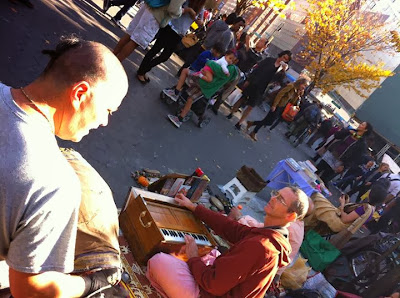
One girl named Jill from Connecticut, who studied art and psychology, enjoyed offering a candle to Damodar . . .
and then watching and listening to the kirtana party, and hearing a few words from me about psychology and the Bhagavad-gita.
Once on harinama, two girls played the instruments.
Motherly Chandra Mohini dd later embraced them.

It was often a bit cold in November, but when the sun was shining on you it was nice.
One couple positioned two chairs in the sunshine in front of the harinama party, right in the middle of the walkway, and closed their eyes and listened to the kirtana, undisturbed by all the people passing by!
Later that day Chandra Mohini and Janette danced very beautifully together for some time.
One Czech couple joined us for an hour or so. They had visited our Krishna camp at the Trutnov Open Air Music Festival (the Czech Woodstock) which I have attended for five years. They also knew about one of our Govinda’s restaurants in Prague.
I gave them the Czech mantra card and invitation to the Prague temple which I had in my money belt. At one point, the girl got into dancing.
Sometimes I would distribute pamphlets.
Visvambhar Prabhu of The Mayapuris came and played and sang for a couple hours on Govardhan Puja Day, sharing his enthusiasm for kirtana with us, to our great happiness. He was in town to do programs at local yoga centers and Rutgers University in New Jersey.
Experiencing the discomfort of the cold, he later expressed appreciation that we were chanting out there for six hours a day.
One 59-year-old lady who watched our chanting for an hour, said that except for our Union Square chanting, she had not encountered Hare Krishna since the 1970s. She was very happy to see the devotees chanting and to learn of Govinda’s Vegetarian Lunch in Brooklyn. She credited Hare Krishna with her becoming vegetarian at 17 years old.
One artist had written “DOG IS LOVE” on the pavement and was coloring in a picture of a dog.
He was complaining to a passerby how he only made $6 a day for all his endeavor. I was thinking that if I sat down and chanted Hare Krishna, people would give me more than $6! I wonder if he had written “GOD IS LOVE” and was coloring in a picture of Krishna how well he would do!
Once it rained, and we had to sit under umbrellas.

One devotee youth I knew from Alachua, Madhvacarya Prabhu, came by on occasion, here playing the gong.,
One time Jai Giridhari Prabhu, in a blissful mood, decided to lead the kirtana while dancing, and other devotees joined him (http://youtu.be/DFTLzE4rhVc):
Once when Michael Collins was leading a lively kirtana in the subway station,one young lady sat down in the middle of the floor against a pillar to take videos and to listen.
Chandra Mohini dd kindly gave her a cushion.
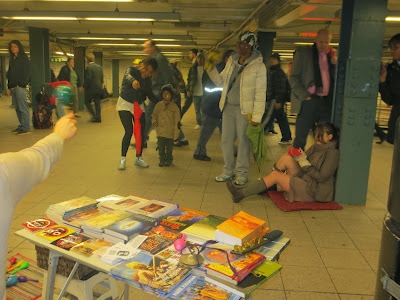
The crowd increased.
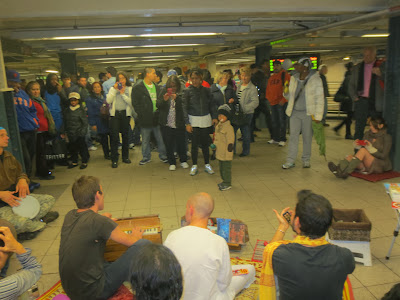
Prahladananda Swami came on harinama for over an hour and a half when we were chanting in the Union Square subway station because of the cold outside.
He seemed so joyful as he chanted, several people were attracted to listen, even during slow time in mid-afternoon.
One older man with gray hair clapped and smiled, moving with the beat of the music, for at least fifteen minutes.
I did not get a chance to talk with him, but he seemed very happy to encounter Prahladananda Swami and the chanting of Hare Krishna. Later that day more devotees came by and for the last hour we had fourteen devotees chanting in the subway.
At one point three people were looking at literature!

One girl named Julienne, who joined us chanting at Union Square once before and later attended a single Thursday evening kirtana at the Bhakti Center, saw us chanting in the subway station as she walked toward the L-train platform.
She stayed and chanted for over an hour, playing the instruments with a joyful expression on her face.
Govardhana Puja in Brooklyn
At Radha Govinda temple in Brooklyn, the hill of sweets celebrating Lord Krishna’s Govardhana Puja festival was awesome!
After the bathing ceremony for Giri Govardhan and circumambulation of the hill, we all got containers with lots of sweets. I was so busy eating the sweets, I devoured all the good looking and tasty sweets before I thought to take a picture of the whole container.
Lots of people, including Visvambhar, danced enthusiastically in kirtana.
The following Saturday I attended a Bengali nama-hatta program in Queens at the residence of Pankajanghri Prabhu where they celebrated Govardhana Puja also with great devotion.
Sacred Sounds at Rutgers
For the last six years, the Bhakti Yoga Club at Rutgers University, the State University of New Jersey at New Brunswick, has hosted a kirtana event called Sacred Sounds. Visvambhar, who has been going for six years, invited me to attend when he read my Facebook post lamenting missing a similar event he did in Tampa in October. After singing in Union Square for five hours on November 7, I took the train to New Brunswick for the evening event.
I ended up sitting next to a Rutgers professor of religion, Dr. Edwin Bryant, known to the Hare Krishna community as Advaita Prabhu. I had heard his name come up in discussions with devotee scholars like Hridayananda Dasa Goswami and Sadaputa Prabhu, and I was happy to finally meet him. I had heard he was famous for writing a book about the Aryan invasion theory, and I asked about it. He explained his strategy in the book was to present the arguments on both sides of the theory so that people could come to their own conclusions, and thus the publication was appreciated by the scholarly community. He also has written about the relationship between bhakti and Patanjali’s Yoga Sutras. I also met a student of his by the name of Chelsea, who I remembered from chanting Hare Krishna in the Times Square subway station during last year’s winter vacation. She mentioned that Advaita taught a course called Krishna, as well as several other interesting courses with topics related to the Hindu tradition. In fact, she decided to minor in religion in order to be permitted to take all the classes taught by Advaita Prabhu that she was interested in. I felt inspired by my contact with both this enthusiastic scholar of bhakti and his enthusiastic follower. Hopefully someday I will find some way to please Krishna with my natural talents.
Although the Sacred Sounds event was not attended by five hundred students as some of the past events, still over two hundred students were there. Many of the students got into singing and dancing with the kirtana.
The Hanumen consist of Benjy Wertheimer, John de Kadt, who is a poet, Purushartha Dasa, who plays the bass, and the lead singer, Gaura Vani.
The Mayapuris consisted of Visvambhar and Krishna Kishore, and Visvambhar’s sister, Gangi, who was happy to go on tour for a week and dance, and Kumari, a friend from Alachua, now living in New York City.
I took a few notes on what was said and on some of the songs:
Gaura Vani Prabhu:
[Gaura Vani later explained that he created the band, Hanumen, with artists from different spiritual traditions, to show the universality and the reality of sacred sound.]
When we put up our arms, we are asking for grace to enter into our lives.
Sankaracarya saw an old man in Varanasi on the point of death studying Sanskrit grammar, and he advised him “Bhaja Govinda, bhaja Govinda, mudha mate.—Just worship Govinda, you fool.” Life is meant for focusing on God, not improving your
situation in this world, especially at the time of death.
This song is dedicated to those chanters who have gone before us and learned how to turn their tragedy and grief into prayer and transcendence.
Lines from songs:
We all bleed blood, we all breathe air, we all break bread, we’ve all been there.
Home to my Lord and be free.
Krishna Kishore Prabhu: Wouldn’t it be nice to able to love fearlessly? That is possible by chanting the names of Govinda. Let’s give it a try.
Many volunteers helped with the event, including these two who are modeling the festival T-shirt they sold for the low, low price of $5.
The spiritual food was very good, and I fell victim to the jalebis, a tasty Indian sweet that one rarely gets, and which I had thirds on. I talked to Geoff, who remembered me from when he spent sometime volunteering with Back to Godhead magazine in Alachua over ten years before. One devotee lady offered to have me speak on one phone conference call lecture she arranges.
I thought $13 each way on the train to New Brunswick was too much, and so I was happy to get a ride back to Brooklyn with some devotee friends. I arrived at the locked Brooklyn temple at 2:00 a.m. on a cold November night and chanted in the warm subway station until the pujari came to wake the deities at 3:50 a.m. Although I had only slept an hour, I ended up singing the mangala-arati prayers as the person who did it usually did not show up. My visit to Sacred Sounds made for an intense and long day, but it was well worth it, and I hope to go again if I am in New York City when it happens in the future.
My Mother Wins Peace Award
My 89-year old mother, Pat Beetle, won an award for her peace activism in the year 2013, given by a New York State Capital District group called Women Against War. My sister said that our mom has been inviting her to go to these different awards programs from time to time and she had not gone, but she was going to go this time. I decided that as I was going go to Albany to visit my mother at some point I would go then too. My mother has helped me in many ways in addition to taking care of me as a child. She bought me a ticket to see my diksa guru, Satsvarupa Dasa Goswami, in Ireland, and to go to the Polish Woodstock, back in 2001. I liked the Woodstock so much I attended it for the last thirteen years. She has also helped contribute to my transatlantic airline tickets. She funded a trip that we took to South India, which culminated in her going to Mayapur. Thus I decided that in reciprocation it would be good to go to the meeting where she was honored.
In this picture, you see my mother on the extreme right, and my sister, Karen, next to her. I am in the back and on the left is Jun-San, a Buddhist monk and peace activist.
Jun-San chants that Buddhist mantra “Nam(u)-Myōhō-Renge-Kyō” at different peace rallies around the world for hours on end, usually with drum accompaniment. When she heard about our chanting Hare Krishna at Union Square for six hours every day of the year, she was impressed. Because Buddhists are famous for meditation, I asked her about meditation, and she replied that she hated meditation. That was the funniest thing I had heard recently—a Buddhist monk who hated meditation. Upon reflection, I took that to mean that she was such an activist that silent meditation was not so important for her.
There were three different posters made showing some of my mother’s activities:
One women named Maureen spoke about my mother’s career as an activist, and that my mother has been for forty years clerk of the peace and service committee in the Albany Friends Meeting, did service for the Capital Area Mediation Group, was founder of Peace Action, worked on the nuclear weapons freeze campaign, reminded people of the horrors of nuclear weapons on the anniversary of Hiroshima each year, and founded a group called Grannies for Peace, which got good publicity. Maureen concluded by appreciating her sisterhood, mentoring, and inspiration.
My mother spoke and told some other details about her life. “I thought more about peace when I became involved with the Albany Friends Meeting and joined the vigil protesting the Vietnam War. In 1976, I, along with my two teenage kids, joined the Continental Walk for Disarmament and Social Justice on the part from Albany to New York. I was involved with alternatives to violence programs in prisons which made me more concerned about criminal justice. I worked with an International Center women’s group, helping visiting and immigrant ladies from around the world, and also spent time helping refugees from Central America, and participating in the Women Peace Encampment of 1983. I visited Israel and Palestine to better understand the situation there, and I visited Cuba as well.”
After they honored my mother at the Women Against War meeting, climate change activist Rachel Smolker spoke, and I learned more about that issue.
Those who accept the Vedic wisdom know about the predictions of government corruption in this age, and Ms. Smolker gave some examples of that in her talk:
The military is exempt from both the reporting of and the regulations on carbon emissions and green house gasses.
The military is aware of the climate change issue and is investigating it, while at the same time contributing greatly to it. For example:
A B-52 bomber burns 86 barrels of oil per hour.
A F-4 Phantom fighter/bomber devours 40 barrels per hour.
One year for each $94 spent for the military just $1 was spent for climate change preparation. The next year for each $41 for spent for military $1 was spent for climate change preparation, a slight improvement.
The Vedic wisdom describes our disease as conditioned souls is that we want to imitate God. Ms. Smolker also discussed a whole new field of study dedicated to just that, synthetic biology.
In synthetic biology, they do things like create a genetic code for a yeast cell so it will digest cellulose and create a new energy source. In this field, the military is also trying to produce through genetic manipulation organisms that excrete explosive substances.
Other interesting points Ms. Smolker made in her talk included:
It is a myth that bioenergy has lower carbon emissions than fossil fuels.
Albert Einstein once said, “Peace cannot be kept by force; it can only be achieved by understanding.”
When asked, “Do you have any reason to be optimistic about the health the planet?”
She replied, “I do not feel optimistic, but our best chance is compassion and making a spiritual connection between ourselves and the earth.”
It is interesting that her only hope was in compassion and making spiritual connections.
Regarding the ecology and the military, she shared a humorous web page touching on those topics, a web page that no longer exists:
“Green War?
“War and violence have always caused major destruction and loss, but it does not have to be this way anymore. The sustainable military development company GreenWar can help make environmentally-friendly, energy-conserving, carbon-neutral, ecological conflicts. Go green with GreenWar and give ‘war’ a chance. A chance to do good. Good for Mother Nature, good for you!”
Prasadam Distribution in Albany
My main Krishna outreach in Albany is distribution of Krishna prasadam. I was fortunate to have the chance to cook for two potluck events in Albany in the three days I was there, the Women Against War meeting attended by about sixty people and the Friends Meeting lunch which my mother and I attended along with fifteen or twenty others. I made a beautiful carrot-coconut rice from Yamuna’s cookbook and mint coconut burfi for the Women Against War meeting. The rice was eaten almost entirely, and about half the coconut sweet, primarily due to competition with a variety of cakes and pies. Some of the people who remembered my coconut sweets from my previous visits to Albany made sure to take some despite the other desserts. For the Friends Meeting I made baked yams and laddus. The yams were completely finished, and half the laddus, only because I made enough for thirty-two people. I felt very successful because of the appreciation of the prasadam. I am thankful to my mother and sister for the raw ingredients and the kitchen facilities that were essential to my success.
For dinner at my sister’s place, I made kotfa balls following a recipe in Yamuna’s cookbook, and amazing they came out better than ever before. I prayed to Radharani and played a Badahari das Prabhu CD as usual while cooking in Albany. It was a real cooperative adventure with my mom buying the ingredients, my sister, Karen, grating the carrots for the kofta and making the spaghetti and the sauce, her boyfriend, Victor, grating the cabbages for the kofta, and myself making the batter for the koftas and cooking them.
Once day I brought a pot of soup for lunch to my guru, Satsvarupa Dasa Goswami, and his helpers, and after the meal, his longtime servant, Baladeva Vidyabhusana Prabhu, filled the same pot with all the ingredients for palak paneer as he knows my family likes it.
All I had to do was cook it and offer it to Krishna.It was great. They all loved it.
You can try his recipe. (That is 8 lbs. of spinach.)
Another day I brought a pot of soup for my friend, Peter Howard, and his family. Peter got to meet the devotees when Romapada Swami asked me if I knew where his sankirtana party could stay in the Albany area, and I suggested the farm belonging to Burt Howard, Peter’s father. Now Peter chants Hare Krishna on beads and attends the big Hare Krishna festival called Ratha-yatra in New York City each year. While visiting Peter, I played harmonium, and he and his girlfriend chanted the “Damodarastakam” in celebration of Karttika and some Hare Krishna mantras as well.
To see the pictures which I took but did not include in this journal, click on the link below or copy it to your web browser:
The unused pictures appear after the used ones in the folder of pictures.
Insights
Srila Prabhupada:
from Sri Caitanya-caritamrita, Madhya 9.362, purport:
“One who strictly follows the Vedic literature and chants the holy name of the Supreme Personality of Godhead will actually be situated in the transcendental disciplic succession. Those who want to attain life’s ultimate goal must follow this principle.”
from Srimad-Bhagavatam 6.19.4, purport:
“. . . a pure devotee will not ask anything from the Lord. He simply offers the Lord his respectful obeisances, and the Lord is prepared to accept whatever the devotee can secure to worship Him, even patram puspam phalam toyam [Bg. 9.26]—a leaf, flower, fruit or water. There is no need to artificially exert oneself. It is better to be plain and simple and with respectful obeisances offer to the Lord whatever one can secure. The Lord is completely able to bless the devotee with all opulences.”
from Sri Isopanisad, verse 13:
“Here also in Sri Isopanisad it is verified that one achieves different results by different modes of worship. If we worship the Supreme Lord, we will certainly reach Him in His eternal abode, and if we worship demigods like the sun-god or moon-god, we can reach their respective planets without a doubt. And if we wish to remain on this wretched planet with our planning commissions and our stopgap political adjustments, we can certainly do that also.”
“One who is in passion cannot become detached from material hankering, and one who is in ignorance cannot know what he is or what the Lord is. Thus when one is in passion or ignorance, there is no chance for self-realization, however much one may play the part of a religionist. For a devotee, the modes of passion and ignorance are removed by the grace of the Lord. In this way the devotee becomes situated in the quality of goodness, the sign of a perfect brahmana.Anyone can qualify as a brahmanaif he follows the path of devotional service under the guidance of a bona fide spiritual master.”
from Sri Isopanisad, verse 14:
“Material scientists and politicians are trying to make this place deathless because they have no information of the deathless spiritual nature. This is due to their ignorance of the Vedic literature, which contains full knowledge confirmed by mature transcendental experience. Unfortunately, modern man is averse to receiving knowledge from the Vedas, Puranas and other scriptures.”
from a lecture on The Nectar of Devotion:
If your mind is too agitated, it is better to sit in the temple and chant Hare Krishna until it becomes peaceful again, not that we unnecessarily remain in a state of lamentation.
Just by developing Krishna consciousness every member of society will become happy.
Some people say, “If everyone became Krishna conscious, how will the world go on?” But do we need the world to go on as it is, with the stealing of others property, etc.? Realistically there is not a danger of everyone becoming Krishna conscious.
Whether one acts according to Vedic direction or his own imagination, if he acts for the pleasure Krishna, he is rightly situated.
Chanting the Hare Krishna mantra cannot be checked. If you are poor, you can still chant Hare Krishna.
from lecture on Srimad-Bhagavatam 2.3.20 given on June 17, 1972 in Los Angeles:
“Just as a chaste woman is meant for her husband, a chaste tongue is meant for chanting Hare Krishna and tasting Krishna prasada.If you can simply engage your tongue in chanting Hare Krishna and tasting Krishna prasada,you become perfect. Simple thing. There is no difficulty. Whenever there is time, chant Hare Krishna. And when you feel hungry, take Krishna prasada.And live here peacefully. . . . By talking nonsense we allow our span of life to be diminished by the sunrise and sunset. But if we talk about Urugaya, the Supreme Personality of Godhead, then our life cannot be taken away. It cannot be decreased. It will be eternal–simply by doing these two things. If we engage the tongue in the transcendental loving service of the Lord, then we can see God eye to eye.”
from a letter to Satsvarupa Dasa, January 11, 1971:
“I want all our students to write articles for our transcendental magazine [Back to Godhead].”
from a letter to Hayagriva Dasa, July 12, 1969:
“Regarding articles for BTG,I have already issued instructions to all centers requesting my disciples to send articles every month, and I am going to repeat it again for the second time.”
Prahladananda Swami:
The more we hanker, the more we lament. When we are free from hankering and lamenting we are liberated. On the platform of Krishna consciousness, we hanker for Krishna and lament that we have not achieved Krishna.
If I want to be someone’s friend, I should think of how to give them Krishna. Krishna is what they are actually looking for. They are looking for a situation of eternal happiness, but that can only be achieved by attaining Krishna.
The body is not dying; it is already dead. As spiritual souls we leave the body. As souls we do not have to worry about dying but accepting many bodies and then leaving them.
As a baby all he can say is “googoo googoo.” His parents are impressed. They do not know in his last life he was a chemistry professor and he won the Nobel Prize, and now all he can say is “googoo googoo.”
As we hanker for the holy name and lament we do not have it, Krishna gradually reveals more and more to us about our spiritual situation and our relationship with Him.
My relationship with my husband, my wife, my children, my dog, my cat, my parakeet, can all be spiritual if we see them as souls and engage them in Krishna’s service. Help them all to be Krishna conscious as Caitanya Mahaprabhu advised.
Having a taste for hearing and chanting about Krishna means we like Krishna, and not having a taste for hearing and chanting about Krishna means we do not like Krishna, at least as much as we like other things. By engaging our propensities in the Lord’s service, we become purified and get a taste for hearing and chanting about Krishna, but if we are unwilling to engage our propensities in Krishna’s service, then we will not become purified and we will not get a taste for hearing and chanting about Krishna.
The great souls talk about how we can direct our energy so that we can experience Krishna.
One becomes satisfied when he is not exploiting others for his sense gratification nor disturbed by others attempting to exploit him for their sense gratification.
We cannot expect to have prema or love for Krishna if we still have lust, greed, and anger in our heart.
We can have taste for Krishna consciousness if our material desires are so minimized that they do not disturb our devotional service.
The symptom that we are still revolting against Krishna is that when Krishna says to do something, we do just the opposite.
From taste (ruci) wedevelop attachment for Krishna (asakti), feelings for Krishna (bhava), and finally love for Krishna (prema).
For the neophyte devotees, who are not liberated, hearing about how souls are suffering in illusion due to the external energy of the Lord is the topics of the Lord they need to hear.
Without experiencing transcendental pleasure within, it is not possible to renounce sense gratification without.
They did a study with rats on a box of shredded wheat to understand its nutritional value, but the rats ate the box and left the shredded wheat.
Because Gaurakisora dasa Babaji was absorbed in transcendental feelings of separation from Krishna he was detached from so many material things.
The soul has no real problem. His body has so many problems, and the problem of the soul is that he thinks he is the body, and therefore, he thinks he has so many problems.
Gaurakisora dasa Babaji was a perfect example of how we can solve all problems by completely dedicating ourselves to the activities of the soul.
Hong Kong is so expensive there are people who live in the sewer.
Our body is always changing, and so we can legitimately ask which body we are actually serving.
We should ask what is the purpose of having a material body. For one with a human body, our mission is to understand our relationship with God.
Our body is just the part that we are playing for this one life. We like to imagine that we are playing a very important role in the drama, but in actuality, we are simply struggling to survive.
Real progress in life to realize our spiritual identity.
Focus on our spiritual identity does not do much for the Gross National Product, and therefore, we are not trained in our educational systems to understand how to realize our spiritual identity.
People are in anxiety about what has happened to them so far, and in even more anxiety about what will happen to them in the future.
Everything is Krishna’s and when we forget that, we become covered by maya, or illusion. Krishna’s property should be used in Krishna’s service, and to understand how to do that we consult Bhagavad-gita and the spiritual master.
Satsvarupa Dasa Goswami:
Krishnahnika Kaumudi: The White Lotus of Radha-Krishna’s Daily Pastimes
by Kavi-karnapura Gosvami
Third Ray of Light
Forenoon Pastimes
Purvahna-lila 8:36–10:48 A.M.
Going to the Forest (continued)
“Whether close by or far away, all the cows
and boys receive the same affection from Krishna as they offer to Him.”
“As soon as they hear Govinda’s flute, the inert entities
start singing and the vocal entities fall silent.
River waves freeze and cease their movement;
immobile objects begin moving and solid objects turn to liquid.
Thus Krishna’s flute song reverses
the functions of nature. The world dances in wonderful ways when Sri Krishna presses His flute to His bimba-fruit lips.
The leaves of all the trees stand on
end. The birds tremble as tears glide down their wings.
Their jaws locked in paralysis, the animals stop chewing and stare
in astonishment. The mountains are covered with perspiration.”
Krishnahnika Kaumudi: The White Lotus of Radha-Krishna’s Daily Pastimes
by Kavi-karnapura Gosvami
Third Ray of Light
Forenoon Pastimes
Purvahna-lila 8:36–10:48 A.M.
Going to the Forest (continued)
“Syamasundara is that remarkable personality
with a dark complexion who sports
in the garden of love, who attracts
Cupid by His unsurpassed beauty
and who offers His love to all
with a smile from His reservoir of nectar.”
“Today’s drawing shows four
bhaktasdancing and chanting
with upraised arms.
Their faces are joyful
and their movements are
so graceful that they
attract many onlookers
to their harinama.
They are the greatest welfare
workers because they
are distributing love of
God in the form
of the holy names.
The people of the
world are bereft and hungry for
lack of Krishna-prema.
They are looking
for happiness
in illusory places.
But if they will stop
and listen to
the sound vibration
of these men
they will find
the answer to their prayers.”
Diary of a Traveling Sadhaka, Vol. 9, No. 20
By Krishna-kripa das
(October 2013, part two)
New York City Harinama Adventures
(Sent from New York City on November 9, 2013)
Where I Went and What I Did
I continued chanting on harinama six hours a day at Union Square in New York City with Rama Raya Prabhu’s party, and living in Radha Govinda Mandir in Brooklyn, cutting vegetables for their lunch program and Sunday feast. I also gave two evening lectures, one at Sunanda Prabhu’s Krishna Balarama temple Sunday program in Queens, and another at Atmanivedana Prabhu’s Saturday program at 26 Second Avenue.
I share insights from a Prabhupada lecture I heard, excerpts from Satsvarupa Dasa Goswami’s blog, mostly about the public chanting of the holy name, and notes I took on Yogesvara Prabhu’s (Joshua M. Greene’s) weekly Bhagavad-gita class at Jivamukti Yoga School in Manhattan. I also share a couple of interesting points from conversations.
Harinamas at Union Square
Lilah, a student at NYU, frequently walked past our chanting party at Union Square. Her mother remembered seeing the devotees chanting in the 1970s. Lilah decided to do a video story on the return of Hare Krishna chanting to the streets for a school project. Her friend Ronan was her cameraman. For hours she interviewed devotees involved in the harinama party and in the Brooklyn temple and produced this brief video (http://youtu.be/3eigSPP5w4Y):
Film majors taking video clips of our party is not uncommon,
but for journalism students to do a whole little documentary is rare.
Thanks so much to Lilah and Ronan for their nice service.
Some days we had many chanters at Union Square.
Sometimes many people were in the audience.
Tarun Prabhu, a Prabhupada disciple,
Once a young man, strolling with his friends, took time out to play his trumpet with us.
Sometimes people danced with us.
Often their faces show their joy.
Here an older lady, dressed colorfully like a hippie, dances with Janette.
Janette was so enthusiastic she even danced with this old Chinese lady who was not really the dancing type.
Here a lady dances while kids play instruments.
Here a lady dances while a guy plays a instrument.
Chandra Mohini dd would invite people to sit and play with us,
like the guy above, and the two girls below.
Here a guy played his guitar.
Here a kids holds five shakers at once.
Here a young lady reads a Krishna pamphlet while two guys play the shakers.
Sometimes when you see something far out,
you think “Only New York!”
Some days people brought so much prasadam for the harinama devotees, we could even distribute some to onlookers as well.
On the subway back to Brooklyn, a young adult asked if I was with the Hare Krishna people singing in Union Square. I said yes and explained we chant there from 2 to 8 p.m. each day. We conversed, and I learned the person was called Dustin and had gotten Science of Self-Realization and read almost all of it. Dustin personally believed that there is one God with many names, and hearing that, I gestured with the “thumbs up” of approval. Dustin does practices he has found from different traditions. Because the Brooklyn temple is closest, I gave Dustin an invitation card for its Sunday and Wednesday programs with free vegetarian meals, and gave my business card as well, saying, “If you go, let me know how you like.” We parted wishing each other well.
It is awesome spending Karttika in New York City. You can sing “Damodarastakam” and offer lamps at Union Square at 7:00 p.m. (or 6:00 p.m., now that daylight saving time has ended), at the Krishna-Balarama temple in Queens at 8:00 p.m., at the Bhakti Center in Manhattan at 8:15 p.m., or at the Radha Govinda temple in Brooklyn at 8:30 p.m. So many choices!
At Union Square, not only did the devotees offer lamps to Damodara, but Rama Raya Prabhu decided to allow anyone to, and Janette enthusiastically would invite anyone who walked by. She was hard to refuse.
This new girl is offering a lamp to Damodara for the first time.
This boy, who was just passing by, offered a lamp to Damodara and then joined the kirtana party, playing the shakers and begging from me a card with the words to the Hare Krishna mantra on it.
This girl did not know it is not proper etiquette to use your lamp to light your cigarette before offering the lamp to Lord Damodara. Phalguni Radhika dd is both amused by her behavior and amazed at the extent of the mercy of the Lord. It reminded me of the people at the Polish Woodstock that hold their beer cars in one hand and pull Lord Jagannatha with the other.
After that girl offered the lamp to Damodara, she did a nice dance before the altar for a few seconds, but I was not fast enough to photograph it.
We would invite people to pray when they offered a lamp, and some took it very seriously.
Michael Collins continuing leading lively kirtanas that attracted a lot of attention.
Here one friendly young yoga lady does a dance by swirling multicolored flags in time with the music.
On October 23, due to rain we chanted “Damodarastakam” in the subway station. Thanks to Zina for the photo.
It was a first for many of us. Unfortunately, due to regulations we could not offer the candles there, but Chandra Mohini dd and I did that later in Brooklyn.
On October 24, it was really cold, probably the low 50s F (11–13º C). On the Union Square harinama,Sofia, a Russian-speaking young devotee lady who is a regular, was mentioning how cold it was. I smiled and said, “But you must be used to cold. Where exactly are you from?” To my great surprise. She replied, “Siberia!” Then she explained that she had become conditioned to the warmer temperatures of New York.
Despite the cold, I had so many wonderful experiences:
Later we had six children from several different families playing instruments at once!
Apparently the cold temperatures did not dampen the public response to our chanting!
That day a French couple came up to me and asked if I was ever in Croatia. “Three times,” I replied, “2009, 2010, and 2011.” Then they asked if I was in Zadar in 2011, and it was true. I was there with the devotees who called their group, “Mediterranean Meets India”—two hours of harinama each morning and evening. I tell about it here:
It should be like this, wherever people go on vacation in the world they meet Hare Krishnas! Maybe they will even try chanting Hare Krishna some day!
Also the same day I met a 59-year old lady who remembered when we had a restaurant in the basement of our temple on 55thStreet 33 years ago. She recalled liking the stuffed zucchini. I told her about our Radha Krishna Temple, and Govinda’s Vegetarian Lunch in Brooklyn.
One little girl tried playing almost every instrument we had.
A man who has sat behind our chanting party for hours over the last few days described our singing as beautiful and even fantastic. He told me also that he felt my dancing added something to the singing. Later I was distracted from the dancing, giving “On Chanting Hare Krishna” pamphlets to all those who offered lamps to our Damodara picture in Union Square. Seeing this, the man told me to dance more, which I did, until I got talking with those offering lamps. When he left, he said he would have stayed longer had I kept dancing. I think Krishna is teaching me through this that my service of dancing is more important than I generally think it is.
One day a girl enjoyed dancing to our chanting, and I offered her an “On Chanting Hare Krishna” pamphlet as she passed by and told her we sing from 2 to 8 p.m. each day, inviting her to come by when she was in a dancing mood. She said she was visiting from London, and I told her about our afternoon harinamathere on Oxford Street, which leaves at 3:00 p.m. from in front of our restaurant at 10 Soho Street, which she copied the address of.
One day in Union Square, during the beginning of our chanting session when we had just five or six devotees participating, a young lady came by and asked if I knew where the “Hare Krishna” was. I had to restraint myself from laughing. We were singing Hare Krishna and had a sign with the Hare Krishna mantra written on it, and I was personally dressed in traditional Hare Krishna robes. I explained that we were the Hare Krishnas. Then she asked, “Where is everybody?” I explained that usually around 6:00 p.m. we have twenty people, but that we had just started and had only a few. Then she replied, “No, I mean where are all my friends?” Apparently her friends had all agreed to meet in Union Square at “the Hare Krishna,” and she did not have a clue about what the Hare Krishnas were! It was striking for me to learn from this that the Hare Krishnas are such a permanent fixture in Union Square that people plan to meet their friends at “the Hare Krishna.”
Another day a man who was watching our chanting at Union Square seemed so pleased I went to give him a pamphlet, but he said he already had one. In fact, he said he already had the Bhagavad-gita. He told me he just likes to stand and listen for awhile whenever he passes by. He said that now, in talking with his family and friends, he does not even call it Union Square anymore, but Hare Krishna Square instead!
One guy who lived in Dallas for part of his life, went to a festival there at which the devotees catered the vegan/vegatarian food. He played music with them and loved their food. Later he became a Christian, seeing that different prophecies in their scripture came to pass, but he had nice memories of being with the Hare Krishnas, and so he sat down in the middle of our chanting party and played the drum for half an hour.
One girl named Nicole from New Jersey, who works in Manhattan, was fascinated to see our chanting party. She knew of Hare Krishna because her father was a devotee and liked to watch Prabhupada videos, but she never saw the singing in public before. Her mom was a Catholic, but she felt closer to the Hindu views as she saw a broader description of the divinity—a God who could appear in many incarnations, and therefore, could appear to those in different traditions. Originally, being a skeptical New Yorker, she refused the cookie I offered her, but after our conversation she happily accepted it. She said she would tell her father about her encounter with us.
The two sisters playing the karatalas in these pictures are not the children of Hare Krishna devotees as I originally thought.
They have have just seen the devotees chant for almost two years in Union Square, and stopped by enough times to learn how to play the kalatalas and to do an impressive job of it.
One kid who played the shakers with us, was transporting a pumpkin in a stroller, a new sight for me.
As we were setting up our book display on Halloween, one young lady wearing a special robe for Halloween came up and noticing the Bhagavad-gita, asked its price. I said they were five dollars, and she immediately purchased one. I explain that we were setting up, and would be singing in a few minutes, continuing to 8:00 p.m., if she wanted to come back and hear. She made some comment like “if it is on my path,” and I just assumed we would never see her again. I was wrong. Later I saw her sitting in the center of our party and meditating on the sound of the kirtana, and afterward taking some prasadam.
Although Sad-hari Das has a turban like a Sikh, he has Vaishnava initiation from Bhakti Sundar Govinda Swami, successor of Srila Prabhupada’s godbrother, Sridhara Maharaja. He has many ISKCON devotee friends and comes several times a month to listen to the Union Square kirtana.
Alex, who calls himself Alex Vaisnava on Facebook, comes almost every evening for an hour or two, and often takes very beautiful pictures. Here he is taking pictures on Halloween.
Some costumed people danced in the kirtana.
Tarun’s instrument made him easy to recognize despite his mask.
Others offered lamps to Lord Damodara.
Thanks to Alex Vaisnava for the first photo.
One older devotee couple from South America comes to New York every year to visit their relatives, and each year they spend a few hours on the Union Square harinama.
One young lady offered a candle to Damodara and then seemed to really get into dancing to the kirtana. She teaches gardening at an alternative school in Harlem, but was very familiar with seeing the devotees as her boyfriend sells crystals at Union Square.
She must have danced at least half an hour with a very blissful, meditative mood!
To see the additional pictures I took but did not include in this blog, click on this link:
The pictures I did not use appear at the end of the album.
Insights
Srila Prabhupada:
from a lecture on Srimad-Bhagavatam 1.2.16, on August 19, 1972, in Los Angeles:
“Just like small children, a baby, he’s also appreciating, trying to stand up with his cymbal. Appreciating. From the very beginning of life, appreciating, ‘It is nice.’ He knows or does not know, it doesn’t matter. Simply appreciation is giving him a touch of spiritual life. It is so nice. Sraddha [faith]. If they do not go against, simply appreciate, ‘Oh, they are doing nice . . .’ So development of spiritual life means development of this appreciation, that’s all.”
“Whatever you want, especially in this human form of life, whatever you desire, Krishna will give you chance. It may be very unpalatable, but this is a fact. We have heard from authorities. That is why in Vrindavana there are so many hogs and monkeys and dogs. This is very mysterious thing. . . . Those who are executing devotional service, but at the same time cheating . . . Cheating means outwardly very devotional, inwardly doing all sinful activities. Such living entity is given the chance to become a hog and dog in Vrindavana so that the reaction of the sinful activities, they get this body; at the same time, due to their touch with the dust of Vrindavana, they become eliminated of all sinful activities and liberated. So these hogs and dogs, they’re also very important. They are not ordinary thing. But this is the explanation. . . . Therefore a devotee, when he’s punished in that way for the short time, they’ll be liberated. Undoubtedly.”
Satsvarupa Dasa Goswami:
from The Waves at Jagannatha Puri and Other Poems:
[a description of the Indian vacationers]
“I like their innocent do
nothingness, the no-ghetto-blaster mood,
the no fighting, no bikinis, no strutting,
and even though their visit is a karmi’s[materialist’s] vacation,
they go for darsana of
Lord Jagannatha.”
“Today’s drawing shows three
tilaked devotees dancing and chanting
with upraised arms.
Each is a unique individual:
The man on the right has
a pink head and an elongated neck.
The girl in the center is
brown-faced and the boy on the left
is bright-faced with a big smile. Devotees
come from different
cultural and ethnic backgrounds
with different psychophysical natures.
Prabhupada spoke of seeing ‘the
unity within the diversity and the
diversity within unity.’
There is no attempt to
squelch a person’s individuality
but all come forward
to cooperate in the
sacrifice of harinama sankirtana.”
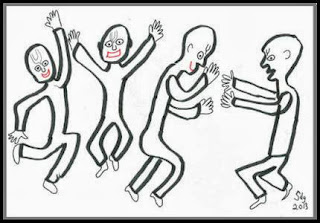
“Today’s drawing shows four bhaktasdancing and chanting
with upraised arms.
I drew with only a black pen
as a variety from the
multicolored sports clothes.
They are just as happy
as the colorful version
and vigorously dancing.
These men of mine compensate
for the fact that I no longer
can go out and
dance and chant. I
advocate that those
devotees who are fit and healthy should
go out in public and
chant and dance.
My disciple Krishna-kripa
always dances on harinama
because I asked him
to do it. It purifies
the atmosphere and
shows the people that
the Hare Krishna movement is alive and flourishing.”
Krishnahnika Kaumudiby Kavi-karnapura Gosvami
Second Ray of Light
Morning Pastimes (Pratah-lila) 6:00–8:36 A.M.
“Thus Radha cooks innumerable preparations
with enticing aromas for the pleasure of Krishna,
Balarama, Nanda and Yasoda.”
[It was striking to me that even Radha, Krishna’s most beloved, cooks for Krishna’s devotees, in addition to Krishna Himself.]
“Prabhupada
used to say the devotees were
not doing ordinary ‘ballroom
dancing.’It is a symptom of
transcendental ecstasy that when one
is chanting in kirtana he
spontaneously rises and starts
to dance. Prabhupada
was very pleased when the
first devotee got up to
dance. Soon we
were all doing it.
He taught us the ‘Swami Step’upstairs
in his room. Later
devotees began improvising
their own
sometimes
wild styles. Prabhupada
usually encouraged all kinds
of dancing because
he saw it as a sign of their enthusiasm.”
“Today’s drawing shows three
devotees dancing and
chanting with upraised arms.
This style of harinama
was introduced by Lord Caitanya
and His associates in
Navadvipa and Jagannatha Puri
over five hundred years ago.
The upraised arms
are a sign of surrender
to Krishna and an expression
of joy. The dancing
feet are a physical
response to an
inner feeling.
These three devotees,
a woman and two
men, are all smiling
out of natural happiness.
It is not a staged or
professional performance but
a pure movement of the soul.”
“Today’s drawing shows four
bhaktas dancing and chanting
with upraised arms.
Four men is a good enough
number to attract the
attention of passersby. They
may be startled or think
them crazy fellows. But
if they continue to pass by
daily they will be impressed by
the determination of the chanters. They may
begin to make out the words
of the mantra and even
find themselves repeating
it during the day.
A steadily appearing
harinama group
has the potency to
transform people’s
lives. It is pleasing
to guru and Gauranga,
and it certainly
purifies the hearts of the chanters.”
Yogesvara Prabhu:
[Yogesvara Prabhu (Joshua M. Greene) gives Bhagavad-gita class each Tuesday at 8 p.m. at Jivamukti Yoga School NYC, 841 Broadway 2nd Floor, New York, near Union Square]
I asked my teacher, Srila Prabhupada, “Why would some people want Krishna as a friend, some as a child, and some as a lover?”
He replied, “It is question of personal taste.”
It is good to have an altar. It is important to acknowledge the foundation.
Aratiis offering the elements of God’s creation back to God.
The Gita is a dialog which scholars later dividedinto chapters.
Krishna and Arjuna are lifelong friends.
Srila Prabhupada said, “If you are going to do something for Krishna, it is worth doing it right.”
Bhakti-yoga or what Srila Prabhupada called “Krishna consciousness” is that yoga that transforms every moment and act of your life into devotion to God.
Srimad-Bhagavatam gives the most knowledge about bhakti of the eighteen Puranas.
Anxiety is the result of thinking something is outside the will or control of God.
The first result of bhakti is freedom from anxiety because you know you are in good hands with Krishna.
The foundational understanding of Bhagavad-gita is: I am not the body. I am the soul. I am part of God. I can be satisfied only by connecting to God through the practice of devotion.
In a conversation with Professor Kotofsky, the professor made the point that there is always revolution in the world, thesis, antithesis, etc. Srila Prabhupada explained that when one comes to Krishna, that is the final revolution.
comment by Sharon Gannon, cofounder of Jivamukti: “Vallabhacarya says, ‘Spend one, or at most three, hours each day maintaining your existence in the world, but do not forget the Lord in that pursuit.’”
Two things you can learn from the Gita: The story is deeper than it seems, and you can do more than you think.
If we think in each situation “How can I serve here?”, that will greatly improve our experience of life.
One religious writer says ritual can be empty or it can be everything, all depending one’s mentality.
Whatever you have learned from your spiritual practice, find someone to share it with.
The book Bhagavad-gita is worshipable as the literary embodiment of the divinity. Just like in a Jewish synagogue there is an altar with the Torah on it that people bow to.
Karma is so complicated it is like untangling a large ball of twine. Krishna advises Arjuna not to try to unravel it, but to take the sword of knowledge and cut it.
I rather get one thing clear in these Tuesday Gita sessions rather than go prattling on about many things.
Sattva, goodness, is the doorway to transcendence, yet it is still material.
As you are reading Bhagavad-gita, read a few verses before and after to place a verse in its context.
The longer we reside in this material world, the more we come to believe that we are actually the body.
One you have desired something, you cannot make the material nature act in a certain way.
Don’t blame God for the results of your desires.
There are lot of Bhagavad-gita ideas in Plato.
The power of bhakti is that it elevates you above all actions and reactions of the material world.
When we are attracted to someone, our combination of the gunas (material qualities) is attracted to their combination of the gunas. A transcendentalist does not act on that attraction, and in particular, avoids the tendency toward exploitation, desiring to render service to the person instead.
I know many people who are miserable because they partnered with someone that their senses were attracted to, and not someone their intelligence selected.
In the transcendental position you engage your natural qualities in God’s service. You do not develop a completely different personality. You are also conscious of your weaknesses, and you understand what you are unable to engage in the Lord’s service and therefore must avoid altogether.
Donavan, a famous singer of the 1970s, met Srila Prabhupada. For a while Donavan just looked at Srila Prabhupada, not knowing exactly what to say. Srila Prabhupada quoted a verse from the Vedas that glorified music as the perfection of education, and that immediately put Donavan at ease. Then Srila Prabhupada explained how he had given George Harrison spiritual ideas to express through his songs, and he offered to do the same for Donavan.
Nanda-nandana Prabhu:
from a conversation:
I spent a whole month preaching with Srila Prabhupada’s godbrother, Krishna dasa Babaji. Krishna dasa Babaji would be chanting Hare Krishna practically all the time. He carried one bag with him that was just filled with slips of paper with “kirtaniya sada harih” [always chant Hari (a name of the Lord)] written on it in both Bengali and English. He would give these to everyone he met. Thus all he did was chant always and advise others to always chant.
Muslim man at a fragrance and oils shop in Brooklyn:
from a conversation:
Allah originally told Moses that he wanted His followers to offer prayers fifty times a day. Moses explained to the Lord that it was too much, and Allah reduced it to forty times a day. Moses said that it was still too much. Allah reduced it again. This continued until Allah reduced it down to offering prayers five times a day. When Moses said that it was still too much, Allah said that He was tired of changing it, and that if they would just offer prayers five times a day, it would count as if they had offered prayers fifty times a day.
—–
“The living entities ears are sacrifical openings. The tongue is a sacrifical ladle. The sound of Lord Krishna’s glories is charming sacrifical ghee. When the ladle of the tongue pours that ghee into the openings of the ears, the ghee enters the heart. In the heart the ghee adds fuel to the fire of ecstatic love. It makes that fire burn with great flames. The flames of that fire make the body tremble. They make the body’s hairs stand erect. Freed from sin in this way, the living entities dance. Salokya [attaining the same planet as the Lord] and the other kinds of liberation follow behind them. However, the living entities will not cast even a sidelong glance at liberation. Instead, tasting the sweet nectar of Lord Krishna’s glories, they joyfully dance. The Vaishnava acaryas [spiritual teachers] all perform this yajna [sacrifices]. Please know that sankirtana-yajna [the sacrifice of congregational chanting of the holy name] is the best of all yajnas.
(Caitanya Mangala, “Mahaprabhur Vividhavese Prema-vitarana [Lord Mahaprabhu’s Manifestation of Various Divine Forms and His Distribution Then of Ecstatic Spiritual Love],” verses 81–85)
Diary of a Traveling Sadhaka, Vol. 9, No. 19
By Krishna-kripa das
(October 2013, part one)
New York City
(Sent from New York City on October 22, 2013)
Where I Went and What I Did
Niranjana Swami encouraged me to support Rama Raya Prabhu’s program of chanting for hours each day in New York’s Union Square, and so I decided to do it for two months this year, October and November. Devotees chant on the southwest corner of Union Square, right in front of the subway entrance, from 2 p.m. to 8 p.m. every day, except Saturday when they try to begin at 10 a.m. and continue to 10 p.m.! On weekend evenings sometimes we would also have a walking chanting party in Times Square beginning at 8:30 p.m. Once we visited Tompkins Square Park. Also during the beginning of October, Karen, my sister, visited New York City for four days for a seminar, and I arranged she have three Krishna prasadam lunches.
The insights section includes quotes from my reading of Srila Prabhupada’s books and hearing his lectures, from reading Satsvarupa Dasa Goswami’s blog, and from hearing a recorded lecture by Niranjana Swami.
Harinama in Union Square
When I joined Rama Raya Prabhu’s harinama party in Union Square for a few days last April, the devotees would chant 4 hours a day and 6 hours on Saturday. Now they chant 6 hours a day and 12 hours on Saturday! That is an increase from 30 to 48 hours per week!
When we start at 2:00 p.m. we may have only 4 or 5 people chanting, playing the instruments, or dancing, but by 6:00 p.m. or so, we often have 20.
On three occasions over the last two weeks I counted over 27 people altogether.
Sometimes we attracted quite a crowd.
Perhaps 6 or 7 people in our group do not do any other Hare Krishna practice. They are local people who have just become attached to regularly taking part in the sankirtana in Union Square by playing instruments, clapping, dancing, and/or sometimes chanting.
Sally, the eldest of the regularly attending locals, is 78 years old and still works as a clinical psychologist.
She comes out almost every day and sits in a chair the party has provided for her.
She chants for an hour or so, puts a donation in our box, and goes on her way. I met her in November 2012 when I spent several days on the party. One of those days she spontaneously exclaimed, “This is the best thing that has happened in Union Square since I moved here over 40 years ago!” During my visit this time she surprised me by coming out twice in the same day. I asked her about it, and she said she likes to come because the chanting has a good effect on her mind. She explained that it has the unusual ability to make you feel both relaxed and energized at the same time. She said when she comes to Union Square to chant with us, if she had problems on her mind, when she leaves, she cannot remember what the problems were. She was thankful about that.
Our chanting party sets up in Union Square directly across East 14thStreet from a shop with a sign “FOREVER 21.”
The shop reminded me of a selection from Srila Prabhupada’s Bhagavad-gita As It Is, verse 4.6, purport, where he describes the transcendental nature of Lord Krishna’s body:
“And although His body does not deteriorate like a material body, it still appears that Lord Krishna grows from childhood to boyhood and from boyhood to youth. But astonishingly enough He never ages beyond youth. At the time of the Battle of Kurukṣetra, He had many grandchildren at home; or, in other words, He had sufficiently aged by material calculations. Still He looked just like a young man twenty or twenty-five years old. We never see a picture of Krishna in old age because He never grows old like us, although He is the oldest person in the whole creation — past, present, and future.”
In the spiritual world, which anyone can attain by pure chanting of the holy name of the Lord, all the residents have transcendental bodies like Krishna’s which are not subjected to aging, and it was wonderful to be reminded of that truth by seeing the shop sign.
I was discussing about “Forever 21” with our party leader Rama Raya Prabhu, in the presence of my sister, Karen, who was visiting. Having come on one harinama with me briefly in London in May during a stopover on her flight to South Africa, Karen pointed out that the Hare Krishnas also chant outside young adult clothing shops in the UK, a humorous similarity that I would have never noticed!
Our chanting set up includes an altar facing the singers for inspiration.
We have no dress code. Some devotees dress in dhotis and saris. Some were casual clothes. Some coming from or going to work, wear more formal Western clothes.
We bring lots of extra instruments for both the devotees and the onlookers to play.
Children especially like to play instruments.
Sometimes the parents get into it too.
Also the children would sometimes dance.
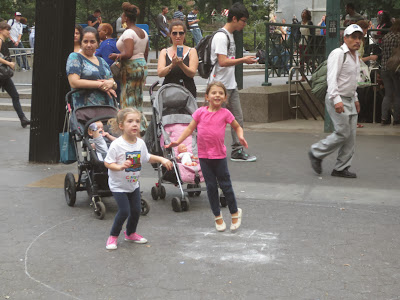
And adults would clap.
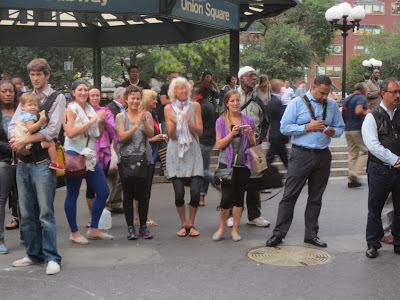
Guys often like to play the djembe, the one-headed African drum.
One guy plays that drum, while his daughter plays the shakers.
Some people bring their own instruments.
One man likes to drum with drum sticks on an inverted bucket.
Some people both play the instruments and dance.
One guy enjoyed dancing with us.
And then sat down to chant with us.
Srila Prabhupada’s books can attract even kids.
Often Lila Padma dd would make great cookies which Candra Mohini dd would distribute.
Sometimes locals would sweep before the party.
One danced and swept at the same time!
A local artist occasionally comes by
and makes a drawing of our party.
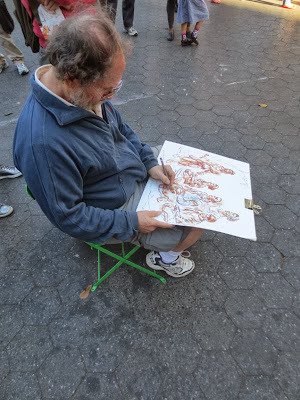
One evening on the Union Square harinamaI had a wonderful experience. One couple stood watching us for over an hour, smiling, singing, clapping, dancing, and ultimately playing the shakers. The lady came up to me and asked if I was in Rishikesh in March of 2012. I had been there assisting Navina Nirada Prabhu with “The Bhakti Experience,” a two-week program of gathering each noon with lots of chanting, a little talk about bhakti (the yoga of devotion), and spiritualized vegetarian food. She said that time in Rishikesh was the second time she met the Hare Krishnas, but the nearly two hours of chanting made it especially profound. She showed me the chanting beads she bought from us then and said she chants on them every day. She has been to our temple in her home country of Kazakhstan and has met B. B. Govinda Swami, our leader there. She told me she has a 15-year-old son and wanted to know of an ashram in the west where he could spend the summer doing harinamaevery day. I told her about Rama Raya Prabhu and the program in New York City, and I will tell her about the programs with regular harinamas in Soho, Bhaktivedanta Manor, and Ann Arbor, as well.

The next day she came back to Union Square to talk with Rama Raya and stayed to chant for a few minutes before her flight home, playing the personal set of karatalas she was traveling with. We always wonder about the effect of our outreach programs, especially when we and those attending them are from different countries and may never meet again, and so it was very inspiring for me to hear her story.
Another day at Union Square, an older man who was photographing the harinamaparty told me that he used to sing with the Hare Krishnas and the Swami in Tompkins Square Park. He said later he did a photo article on Prabhupada’s Palace for Lifemagazine.
Sara was wandering around New York City in a depressed state of mind, until she encountered the Harinama NYCchanting party in Union Square, and then her fortune changed. She was amazed to see so many happy people. She listened for several minutes, got a pamphlet “On Chanting Hare Krishna,” talked for quite a while with Rama Raya Prabhuand a another devotee, who liberally gave her a Gitaalthough she did not have the money. She was very grateful.

She told me her birthday was coming up on Wednesday, and she did not have any friends in New York City to celebrate it with. I invited her to celebrate it with us as we would be singing here at Union Square from 2 to 8 p.m. on Wednesday, and I said I would try to bring her a special sweet. She liked the idea and said she would come. Satya dd, wife of Ramabhadra Prabhu, temple president in Brooklyn, kindly donated a Hare Krishna T-shirt and a couple cupcakes as a gift, and I obtained some Radha-Govinda maha-sweets, but unfortunately Sara did not remember her plan to return to see the devotees at Union Square on her birthday. We keep the T-shirt with us, for her next appearance.
Michael Collins from Gainesville is one of my favorite singers.
Did you ever see a man with angel wings
dancing on harinama?
How about a guy in purple underwear?
What about a girl playing kalatalas
and eating an ice cream cone?
How about seeing all this in the same day?
That is Union Square!
When Rama Raya Prabhu was leading the chanting, the man with angel wings danced with the guy in purple underwear as you can see in this video (http://youtu.be/6vcoVRR2ltM):
One day when I was singing, Candra Mohini dd invited two girls to sit on the blanket next to her. She taught them to chant which they did for twenty minutes, and then they began to dance. After I finished I thanked them for dancing, and asked them about their experience with Hare Krishna. They said they had seen the chanting in Union Square many times but had never stopped before. That was the first time. They mentioned they were now thinking of going to the Sunday program at the Bhakti Center. They asked if there was early morning chanting in the park. I told them the Bhakti Center does chanting indoors at 6:30 a.m. The only outdoor morning chanting I know of is in Jacksonville Beach, Florida, near the pier at 7:00 a.m. on Sundays. They seemed very happy that they stopped and chanted and danced with the Hare Krishnas and got pamphlets and invitations, and I hope they come by again.
Two girls who are in a masters program in media studies had to record sound for a course project. One of the girls was born in Kolkata and attended our largest temple in Delhi, while getting her undergraduate degree there. As she regularly passed by the Union Square harinama, her school being nearby, there was no doubt about what sound she was going to record for her course! In addition to recording ten minutes of chanting with professional equipment, she and her American-looking friend got prasadam cookies, and her friend got the pamphlet “On Chanting Hare Krishna.”
Dustin, a new devotee from Canada, who comes twice a year to New York City to work with the Metropolitan Opera, joined us one day on the Union Square harinama. Although Dustin prefers to listen, considering kirtana to be another style of singing than his own, Rama Raya appreciating his booming, resonant voice, engaged him in leading a Hare Krishna tune, which turned out to be my favorite and I had a great time dancing to it. Many people were attracted to listen to his nice singing.
One girl in purple tights who came by, showing a little interest, explained that her dog was named Krishna.
One morning in our Brooklyn temple, I was surprised to encounter Citraratha dd, a Prabhupada disciple from Geneva, who I had once chanted Hare Krishna with on the Paris metro a few years ago. She is vacationing in New York City, desiring more association with Hare Krishna devotees than she gets in Geneva, where we do not have a temple. I told her about the Union Square harinama party, and she came out that very day. She sang the response and talked to people who appreciated the chanting. One lady she spoke with came from a Muslin background and then married a Christian man. As as result, neither had a spiritual practice for many years, and now they are on a spiritual search. Citraratha, after talking with the lady for several minutes, invited her to a Hare Krishna program in the local area and is hopeful that they will come.
Amazing enough, in the first half of October, we had only one rainy day. Then we chanted in a crowded, but very loud area of the Union Square subway station, just above the downtown 4, 5, and 6 trains.
To see the rest of the pictures I took, but which I did not use to illustrate this journal, most of which are of harinama at Union Square, go to this link:
Times Square is so crowded in the evenings it is a great place to share the chanting of the Hare Krishna mantra with people. Sunanda Prabhu, and his party from our Krishna Balarama temple in Queens, would join devotees from the Union Square harinama party, and chant from 8:30 p.m. onward.
Sometimes we would chant on the subway to Times Square.
Once Yadubara Prabhu, who produced the Following Prabhupada DVD series, as well as many other video and photographic Hare Krishna projects, came and sang with us at Times Square.
Some young people very much enjoyed clapping, dancing, and playing instruments with us.
Once in Times Square, one man exclaimed as the harinamaparty passed, “I thought they were extinct!”
Tompkins Square Park
Deva Madhava Prabhu, who comes from Michigan one week a month to chant in Union Square, describes an amazing experience he had at Tompkins Square Park, also in New York City, where Srila Prabhupada began outdoor chanting with his disciples back in 1966:
“These children are standing around ‘the Hare Krishna Tree’ in Tompkins Square Park in New York City, famous as the place Swami Prabhupada began singing Hare Krishna. Their teacher Deborah asked me, ‘Is their a spirit in this tree?’ While I assured her all tree’s have souls, I did let her known about the saint who had began his teachings their over 40 years before. Deborah has for the last 11 years been bringing her classes to the tree to sing ‘The Tree Song.’ They sing to the tree, hug the tree, draw the tree and even kiss the tree. October 9 is the anniversary of Swami Prabhupada’s first time chanting under the great elm. I could feel him there last Friday when I asked the teacher if the children would like to learn the song the saint sang under the same tree years ago, and as they chanted Hare Krishna Hare Krishna Krishna Krishna Hare Hare Hare Rama Hare Rama Rama Rama Hare Hare I remembered a miracle is not seeing that God has done one thing, but realizing that He does everything.”
On October 9, after finishing our chanting at Union Square, the harinama team came to celebrate the 47thanniversary of Srila Prabhupada and his followers first chanting in that park back on that day in 1966. Some of the devotees chanted in a procession there from Union Square.
We chanted as we circumambulated the park’s famous Hare Krishna tree, and then sat down and talked about spreading the chanting of the holy name and Srila Prabhupada’s mission.
My Sister Karen’s Prasadam Lunches
Karen, my sister, is a licensed mental health counselor living in Albany, and occasionally comes to New York City, as she did the second weekend in October, for a four-day seminar on counseling techniques for people working with refugees. The person giving the seminar was from India and incorporated ideas from different traditions in his course, including Ayur Veda and the conception of the subtle body.
Friday I met Karen and brought her salad, bread, koftas, and eggplant parmesan from Govinda’s Vegetarian Lunch, the restaurant run by Satya dd in the Radha Govinda temple in Brooklyn.
Saturday I saved some subji, rice, and dal from the temple breakfast for her lunch and she met me at the kirtana party at Union Square.
Sunday we went to the Doughnut Plant, a doughnut shop in Manhattan owned by Mark, a Hare Krishna devotee. Karen bought me a peanut butter and banana cream-filled doughnut as a belated birthday present and had a chocolate cake doughnut for herself. I also gave her some cheese cake that Satya dd gave me and a piece of pera and a tulasi leaf from Radha Govinda. All and all Karen did well taking lots of Krishna prasadam during her trip to New York!
Over meals, when discussing conflicts between those of different faiths, I happened to mention about the three levels of devotees mentioned in our Gaudiya Vaishnava tradition and their different qualities. The neophytes are those who recognize God and the saints only within their tradition but not beyond. The second level can identify God, the saints, the innocent, and the those averse to God by their qualities in whatever tradition or in whatever place they appear. People on this level serve the Lord with love, make friends with those devoted to Him, enlighten those open to spirituality, and avoid those antagonistic to spiritual life. Those on highest level see God in everything and in everyone, and so are very kind to every living being. My sister commented that it seemed practical that those on second level could make the distinctions needed to run the society so those on the highest level could be free to show kindness to everyone. That observation impressed me.
I live in our Brooklyn temple where I have the incredibly good fortune of seeing Radha Govinda for mangala-arati every day, as well as honoring their maha-prasadam, and doing service for Their restaurant.
They were the first Radha Krishna deities I ever saw, and when I was a new devotee in Their temple on 55th Street, I would transfer Their mangala-arati sweets.
Although not a tourist, I saw the famed Statue of Liberty in the distance, both from the air while arriving in New York and from the subway daily enroute to Union Square from Brooklyn.
Insights
Srila Prabhupada:
from Caitanya-caritamrita, Madhya 8.310, purport:
“All Vedic literatures declare that transcendental subjects cannot be understood simply by argument or logic. Spiritual matters are far above experimental knowledge. Only by Krishna’s mercy can one who is interested in His transcendental loving affairs understand them. If one tries to understand these transcendental topics simply by using one’s material brain substance, the attempt will be futile. Whether one is a prakrita-sahajiyaor a mundane opportunist or scholar, one’s labor to understand these topics by mundane means will ultimately be frustrated. One therefore has to give up all mundane attempts and try to become a pure devotee of Lord Vishnu. When a devotee follows the regulative principles, the truth of these talks will be revealed to him.”
fromSri Caitanya-caritamrita,Madhya 9.8, purport:
“The holy names of Krishna and Hari, or the chanting of the Hare Krishna maha-mantra,are so spiritually powerful that even today, as our preachers go to remote parts of the world, people immediately begin chanting Hare Krishna. Sri Caitanya Mahaprabhu was the Supreme Personality of Godhead Himself. There cannot be anyone who can compare to Him or His potencies. However, because we are following in His footsteps and are also chanting the Hare Krishna maha-mantra,the effect is almost as potent as during the time of Lord Caitanya Mahaprabhu. Our preachers mainly belong to European and American countries, yet by the grace of Lord Caitanya they have tremendous success wherever they go to open branches. Indeed, everywhere people are very seriously chanting Hare Krishna, Hare Krishna, Krishna Krishna, Hare Hare/ Hare Rama, Hare Rama, Rama Rama, Hare Hare.”
from a lecture on Srimad-Bhagavatam 1.2.14 on August 17, 1972, in Los Angeles:
“Krishna consciousness is so nice even those who are incorrigible can be delivered. This is mentioned in Srimad-Bhagavatam [2.4.18]:Kirata hunandhra pulinda pulasa.”
“If you say why are you interested to save the human society—that is Krishna’s business. Krishna wants, God wants that all these living entities they should back home back to Godhead. Why are they suffering? Therefore Krishna comes personally. . . . He wants, “Come back home. Dance with Me. Eat with Me.” . . . Because we are Krishna conscious, we are servants of God, therefore, it is our duty to save this civilization.”
from Srimad-Bhagavatam 6.17.29, purport:
“Those who are not narayana-para,pure devotees, must be disturbed by this duality of the material world, whereas devotees who are simply attached to the service of the Lord are not at all disturbed by it. For example, Haridasa Thakura was beaten with cane in twenty-two bazaars, but he was never disturbed; instead, he smilingly tolerated the beating. Despite the disturbing dualities of the material world, devotees are not disturbed at all. Because they fix their minds on the lotus feet of the Lord and concentrate on the holy name of the Lord, they do not feel the so-called pains and pleasures caused by the dualities of this material world.”
from Srimad-Bhagavatam 6.17.31, purport:
“One who engages in unalloyed devotional service to Vasudeva, Krishna, automatically becomes aware of this material world, and therefore he is naturally detached. This detachment is possible because of his high standard of knowledge. The speculative philosopher tries to understand that this material world is false by cultivating knowledge, but this understanding is automatically manifested in the person of a devotee, without separate endeavor.”
Satsvarupa Dasa Goswami:
Sri Radha-rasa-suddha-nidhi (The Book of Radha) by Srila Prabodhananda Sarasvati Gosvami Maharaja translated by Dasaratha Suta Prabhu
“(257) A Prayer to Sri Govinda for Bestowing Maidservice to Sri Radha
O Sri Govinda!
That crown jewel among all Vraja gopis
Her lotus feet’s sheer splendor and majesty
is supremely dear to You
even greater than millions upon millions of hearts
—Please accept me in Her maidservice
full of the most unique fresh new rasa—
Again and again—every moment, O Lord of lords!
I beg this of You with all my heart and soul!”
“(259) Krishna-bhajana as a Feature of Radha-dasya
Constantly meditating
on He who wears the peacock-feather crown
incessantly singing
His nama-sankirtana [congregational chanting of His name]
worshipfully serving
His lotus feet
chanting quietly
His best of mantras . . .
holding in my heart only the supremely cherished
eternal service to the lotus feet of Sri Radha.
When, O when, by His grace
will I become a participant
in Their extremely astonishing festival of divine love?”
with upraised arms.
Where are they located?
Are they with Rama-raya’s harinama party in Union Square?
Are they at the campus of
the University of Florida in Gainesville?
Are they in some remote
countryside with no one in sight?
Use your imagination
and place them where you will.
It’s bound to be auspicious
wherever Hare Krishna is sung.”
[This poem was striking to me because I chanted at the campus of the University of Florida in Gainesville in September, and I chanted with Rama-raya’s harinama party in Union Square in October, and my diksa-guru, Satsvarupa Dasa Goswami, mentioned both places in this poem!]
Niranjana Swami:
Visvanatha Cakravati Thakura says that Krishna does not consider maintaining a devotee who is fully dependent on Him to be a burden just as a family man does not consider taking care of his family a burden or a man does not consider carrying his lover a burden.
In his copy of Bhagavad-gita, Arjunacarya changedthe wordvahami to the word karomi in verse 9.22, because he did not think that Krishna personally provides for His devotee.
—–
krsir bhu-vacakah sabdo
naś ca nirvriti-vacakaḥ
tayor aikyaḿ paraḿ brahma
krishna ity abhidhiyate
“The word ‘krish’ is the attractive feature of the Lord’s existence, and ‘na’means spiritual pleasure. When the verb ‘krish’is added to the affix ‘na,’it becomes ‘Krishna,’ which indicates the Absolute Truth.” (Mahabharata,Udyoga-parva 71.4, quoted in Śri Caitanya-caritamrita,Madhya 9.30)
Diary of a Traveling Sadhaka, Vol. 9, No. 18
By Krishna-kripa das
(September 2013, part two)
North Florida and Ohio
(Sent from New York City on October 10, 2013)
Where I Went and What I Did
During the second half of September, I spent a week and a half at Krishna House in Gainesville, chanting at the Krishna Lunch, a football game, the corner of University Avenue and 13thStreet, and the farmers market and giving a few classes in Gainesville and one in Alachua. The class in Alachua was on Bhaktivinoda Thakura’s appearance day (click hereto hear it), and some devotees liked a selection of his teachings which I shared (click hereto see them). Brahmatirtha Prabhu and I spoke a few words [click hereto see mine] at the Alachua Sunday Feast about Sadaputa Prabhu, known to the academic world as Richard L. Thompson, who wrote several books on science and spiritual knowledge, and who passed away five years before. Sthita-dhi Muni Prabhu, his secretary, who went on to get a Ph.D. in History of Science, kindly helped sponsor the feast in Sadaputa’s honor. Prema Sindhu Prabhu, who I knew from Tampa and Jacksonville, moved to Columbus a while back, and he invited me to come there and do a four-day seminar on “How to Increase our Taste for Chanting the Holy Name” for the final four days of the month, which will ultimately be put on ISKCONDesire Tree. That was a challenge for me as I prefer to give single classes rather than a series, and also I do not feel myself to be such a great authority. One good feature was I was able to recite some beautiful verses glorifying the holy name, and at least that was undoubtedly beneficial for all to hear. Some of these appear at the end of the “Insights” section of this journal. I felt victorious in Columbus because I went on harinama for two to three hours each day I stayed there, once traveling to Athens to further spread the mercy of the holy name.
For insights I have excellent quotes from Srila Prabhupada’s books, a quote from a poem by Satsvarupa Dasa Goswami, some beautiful and practical devotional wisdom from Mahatma Prabhu, wonderful insights from Radha Jivan Prabhu from his life of devotional service, and notes by the senior and junior devotees giving classes in Gainesville, Alachua, and Jackonsville.
Chanting at University of North Florida
Dakota, who just met the devotees a few days before, spent five days at Krishna House following the Jacksonville Ratha-yatra. Afterward I drove him back to Jacksonville and introduced him to the devotees there. Amrita Keli dd engaged him in distributing flyers for our Jacksonville programs, and a couple of his friends, both singing majors, came by and chanted with us on the blanket before the Krishna Club meeting.
The three University of North Florida ladies in the foreground had never chanted the Hare Krishna mantra before. The one playing harmonium had never played before, but since she was studying singing and piano I taught her how to play the chords for the Prabhupada melody. Dakota, the young man, is pumping the harmonium for her and holding two mantra cards back-to-back so she and the lady on the right, also a singing major who took turns leading, could read the words. When Mit came by to play the drum, the kirtana ascended to a higher level.
Later Dakota got up and danced.
It was awesome to have such a wonderful kirtana with so many brand new people!
Thanks to Sonya, the girl sitting between Mit and the harmonium player in the first photo in the series above, for kindly taking the photos with me in them in addition to singing the response.
The girl who played the harmonium on the green came to our Krishna Club meeting, and enjoyed meditating on the sound of the kirtana there.
Tulasirani dd led the kirtana.
Although there were not as many people as on Radhastami, the previous week, it was still well attended.
Dorian, Jonah, Dakota, and I were the men who danced.
In the beginning, Mallory was the only girl dancing.
As before, Dorian was enthusiastic to do a kirtana after the prasadam, and at least ten people took part, almost all of them dancing, and it was truly beautiful to see.
We chanted Friday on the green.
You can see the devotees were really absorbed in it.
Here Rae Jeana, Krishna Club president, played the drum, and Dorian led with the karatalas.
A new girl, who was passing by and was on a spiritual quest, was happy to chant and read the Bhagavad-gita with us on the blanket.
We chanted 4½ hours on Friday, and Dorian was with us practically the whole time.
Chanting in Gainesville
I would chant daily for 2½ hours during Krishna Lunch. Days when Purusartha Prabhu would come out were always especially ecstatic. Among them Haridasa Thakura’s Disappearance Day was especially memorable as twelve people were chanting together on the blanket at one point.
We chanted at two farmers markets the second half of September, and Haridasa Thakura’s Disappearance Day again was the bigger day with at least sixteen people participating in some of it. Dakota was visiting us during that one, and he enjoyed dancing along with the kirtana.
One devotee girl, who was there with her family, enjoyed playing the shakers to the kirtana beat, even while playing with the hula hoop.
One young man played his own percussion instrument along with the kirtana.
The next week the stage band started early, so we had sing on the corner opposite the market.
Often while in Gainesville, I chant on Friday evening with the Alachua devotees at the corner of University Avenue and 13thStreet.
There are six University of Florida home football games each year, and devotees have been chanting in front of Gate 7 of the stadium for two hours before the games even before I moved to Alachua County nineteen years ago. I remember on one Radhastami, 36 devotees chanted at the football stadium! On September 21 there were fewer, but quite a mix of newer devotees and senior devotees, and children and adults.
Here a very little girl successfully distributes a devotional pamphlet.
Some of the fans, often drunk, dance with the devotees.
Here a devotee encourages the fans to chant the mantra.
Here two fans take turns holding the Hare Krishna maha-mantra sign.
Encounters with Visvambhara Prabhu of the Mayapuris
Visvambhara Prabhu of the Mayapuris happened to be in the temple room at Krishna House in Gainesville when I came down for our evening kirtana, so I invited him to sing. He was waiting for a ride, but said he would sing until his ride came, which happened to be after the half-hour kirtana was over. The Gauri Arati kirtana is always lively in Gainesville with usually between seven and fifteen devotees, and it was extra lively with Visvambhara singing.
It just got better and better, and the Nrsimha prayers at the end were really dynamic.
The next morning about 5 a.m. as I was in the line for security at the airport, I was pleasantly surprised to encounter Visvambhara again. He was enroute to San Francisco where he was doing two programs each day, beginning with a kirtana at Googlethat very day. He explained his awesome schedule of traveling Friday through Monday to different cities to do kirtana, attending classes in religion at University of Florida Tuesday and Thursday and teaching mrdangaon Wednesday. He said his university classes are from 3 to 6 p.m., ending just before the Gaura Arati, and I encouraged him to chant at least once a week when he is in Gainesville, and he was agreeable.
Although he does kirtana with many amazing personalities all over the world, he surprised me by saying his favorite kirtana was one he did with me alone at Krishna Lunch at the University of Florida. He sang, and I played the only beat I know on the drum, and we sang the same tune for the whole time. He said, “It did not go anywhere, nor did it have to go anywhere.” He says people ask him to teach them how to play many tunes on the harmonium and many beats on the drum, but actually one does not need such variety. The holy name is sufficient!
I told him I was invited to give a seminar on a getting a taste for chanting the holy name, and I asked him what he would say if he were to give such a seminar. He smiled broadly and thought for awhile and he told how at one gathering of devotees, he saw many senior devotees seriously chanting on beads with concentration, and how Radhanath Swami had a tear in his eye, and just being in that presence increased his conviction about the holy name. When I spoke in the evening, I discussed how by association with great devotees we can gain taste for the holy name, and used this example from Visvambhara.
Chanting in Columbus
While we were chanting at Ohio State, a young man asked if we were Hare Krishnas and what we believed. I said, “Yes. We understand there is one God. All living creatures are part of Him. Human life is special because we can develop our relationship with Him by chanting His names, especially the Hare Krishna mantra.” Then I gave him a mantra card. He said last Saturday he was in Gainesville and heard some Hare Krishnas chanting at the football game. I smiled and said, “I was one of them and that card I just gave you is for our Hare Krishna center there!” Perhaps by making him meet the devotees in two cities in the same week, Krishna is trying to give him some special mercy.
Prema Sindhu Prabhu, who invited me to Columbus, Prema Vilasa Prabhu, Nitai Gauranga Prabhu, Jagannath Prabhu, and I went on harinama before the Ohio State football game for over two hours. I think the Ohio football fans are even more wild than the Florida ones. Prema Vilasa Prabhu, although he likes harinama, had never been to a football game harinama, considering the event with all the drunken revelers to be scary, but he had a great time and is thinking of inviting other devotees to the game harinamas in the future. At least three fans took extensive video of us, one who was an acquaintance of Jagannath Dasa Prabhu, being a regular attender at the temple programs.
I do not always go on harinama on Sundays. I do in Newcastle but do not in Gainesville, but I think it is best to go out every day, and so before the Columbus Sunday feast, we chanted from the temple, through the university, to the front of Ohio State Student Union, where we sat down on the sidewalk, facing High Street. Different people were attracted, many taking pictures. One girl named Kristen, who often attends the temple Sunday program, took a little video (http://youtu.be/5taAzBBdHoY):
Three young Afro-American boys on their bicycles looked suspiciously at the oatmeal cookies we offered them, and one of them cautiously took one but did not eat it, and they rode off. Later they came back, each grabbing two or three cookies! I guess the cookies passed their taste test.
The last ten minutes we were in front of the Union, a young man sat on the wall separating the lawn from the sidewalk and listened intently. When we packed up to go, we gave him a cookie. He told us his name was Alex, and he was very familiar with Hare Krishna from his childhood in Sochi, Russia. He recalled the friendliness of the devotees, the joy of the chanting, and the taste of the prasadam, and he was happy to encounter them again. We invited him to the Sunday and Thursday programs at our Columbus center, and I hope he comes. Jagannath told him of a regular attender from Ukraine, also named Alex, to encourage him to come.
When Tulasirani dd heard I was going to Columbus, she encouraged me to do harinama at Ohio University in Athens, an hour and a half away, saying that the students are nicer there. The devotees have done college programs there for years, although not at present, and that is how she met the devotees. I asked Jagannath and Nitai Gauranga Prabhus, the two devotees living in the Columbus temple, about going to do harinama in Athens, and they also thought the students are nicer there, and Nitai Gauranga Prabhu kindly agreed to drive us. We settled on Monday, which turned out to be both Ekadasi and my fifty-fourth birthday. I made coconut burfi flavored with fresh mint for distribution to both the devotees and the students. In Vedic culture, traditionally people give gifts on their birthdays to purify their births rather than receive gifts, and when I have an opportunity, I make sweets to give away, as I was able to do this year.
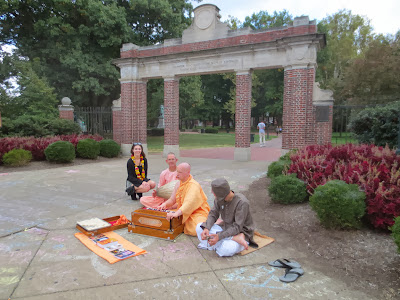
We did find the students to be more friendly in Athens, and we ended up distributing four books by chanting for 2½ hours with books and sweets on display. About fifty sweets were also distributed. Many people took pictures of us.
One girl named Mary was especially happy to see us, and she asked the boy she was with to take pictures of us, some with her in them. I asked Nitai Gauranga Prabhu to give her the garland he was wearing as she seemed the most enthusiastic person we were likely to encounter that day. She told me that she would keep the garland her whole life.
It seemed very rare indeed that someone would say that. I told her that because the garland was spiritual, if she did keep it her whole life, it would retain a pleasant fragrance. She also asked when we would be coming back to visit her school, but the devotees had no idea. After the harinama as we were walking back to the car, we met Mary again, and she was still wearing the garland. She said she had been smelling it from time to time all afternoon. When we first met Mary, she had passed up the coconut sweet having just eaten, but now she was willing to take one and liked it.
Turns out Mary was also interested in yoga, like many people who are on the way to Krishna.
We met a middle-aged man toward the end who was very happy to see Hare Krishna devotees and asked if we were from New Vrindavan. He knew the names of many devotees who had lived there years before including Bhaktipada, who was formerly in charge, and the man had visited there himself and been impressed with Prabhupada’s Palace.
All in all, we felt good that we went to Athens, despite traveling 3 hours to stay for 2½, and I think that now the Columbus devotees will go there more often.
The first 32 pictures are included in this blog and may look familiar but not those that follow.
Insights
Srila Prabhupada:
from Srimad-Bhagavatam 6.16.18–19, purport:
“Whenever we see Krishna, He is always full of ananda [spiritual bliss] in all circumstances. No one can make Him morose. Atmaramaya:He does not need to search for external enjoyment, because He is self-sufficient. Santaya:He has no anxiety. One who has to seek pleasure from other sources is always full of anxiety. Karmis, jnanisand yogis are full of anxiety because they want something, but a devotee does not want anything; he is simply satisfied in the service of the Lord, who is fully blissful.”
from Srimad-Bhagavatam 6.16.41, purport:
“If one advocates the Hindu religion, the Muslim religion, the Christian religion, this religion or that religion, there will be conflicts. History shows that the followers of religious systems without a clear conception of God have fought with one another. There are many instances of this in human history, but systems of religion that do not concentrate upon service to the Supreme are temporary and cannot last for long because they are full of envy. There are many activities directed against such religious systems, and therefore one must give up the idea of ‘my belief’ and ‘your belief.’ Everyone should believe in God and surrender unto Him. That is bhagavata-dharma.”
from Srimad-Bhagavatam 6.16.43, purport:
“The members of human society who strictly follow the principles of bhagavata-dharmaand live according to the instructions of the Supreme Personality of Godhead are called Aryans or arya.A civilization of Aryans who strictly follow the instructions of the Lord and never deviate from those instructions is perfect. Such civilized men do not discriminate between trees, animals, human beings and other living entities. Panditah sama-darsinah: [Bg. 5.18] because they are completely educated in Krishna consciousness, they see all living beings equally. Aryans do not kill even a small plant unnecessarily, not to speak of cutting trees for sense gratification. At the present moment, throughout the world, killing is prominent. Men are killing trees, they are killing animals, and they are killing other human beings also, all for sense gratification. This is not an Aryan civilization.”
from Srimad-Bhagavatam 6.16.44, purport:
“Sri Caitanya Mahaprabhu introduced this chanting of the holy name five hundred years ago, and now through the Krishna consciousness movement, the Hare Krishna movement, we are actually seeing that men who are considered to belong to the lowest class are being delivered from all sinful activities simply by hearing the holy name of the Lord.”
“From our present position, the Supreme Personality of Godhead can be personally seen as the Deity in the temple. The Deity of the Lord is not different from the Supreme Lord. Because we cannot see the Supreme Lord with our present blunt eyes, the Lord has kindly consented to come before us in a form we can see. Therefore the Deity in the temple should not be considered material. By offering food to the Deity and by decorating and serving the Deity, one gets the same result that one derives from serving the Lord personally in Vaikuntha.”
from Sri Caitanya-caritamrta,Madhya 8.300, purport:
“Being the eternal servant of Lord Ramacandra, Hanumanji has been respectfully worshiped for many hundreds and thousands of years. Here even Lord Sri Caitanya Mahaprabhu set the example in showing how one should offer respects to Hanumanji.”
from Sri Isopanisad, Verse 1, purport:
“The human race should take the Vedic wisdom ofSri Isopanisadand not quarrel over material possessions. One must be satisfied with whatever privileges are given to him by the mercy of the Lord. There can be no peace if the communists or capitalists or any other party claims proprietorship over the resources of nature, which are entirely the property of the Lord. The capitalists cannot curb the communists simply by political maneuvering, nor can the communists defeat the capitalists simply by fighting for stolen bread. If they do not recognize the proprietorship of the Supreme Personality of Godhead, all the property they claim to be their own is stolen. Consequently they will be liable to punishment by the laws of nature. Nuclear bombs are in the hands of both communists and capitalists, and if both do not recognize the proprietorship of the Supreme Lord, it is certain that these bombs will ultimately ruin both parties. Thus in order to save themselves and bring peace to the world, both parties must follow the instructions of Sri Isopanisad.”
from Sri Isopanisad, Verse 2, purport:
“Factually, no one has to do anything more than render devotional service to the Lord. However, in the lower stages of life one cannot immediately adopt the activities of devotional service, nor can one completely stop fruitive work. A conditioned soul is accustomed to working for sense gratification — for his own selfish interest, immediate or extended. An ordinary man works for his own sense enjoyment, and when this principle of sense enjoyment is extended to include his society, nation or humanity in general, it assumes various attractive names such as altruism, socialism, communism, nationalism and humanitarianism. These “isms” are certainly very attractive forms of karma-bandhana(karmic bondage), but the Vedic instruction of Sri Isopanisadis that if one actually wants to live for any of the above ‘isms,’ he should make them God-centered. There is no harm in becoming a family man, or an altruist, a socialist, a communist, a nationalist or a humanitarian, provided that one executes his activities in relation with isavasya, the God-centered conception.
from Sri Isopanisad, Verse 3, purport:
We are given this human form of life not to work hard like asses, swine and dogs but to attain the highest perfection of life. If we do not care for self-realization, the laws of nature force us to work very hard, even though we may not want to do so. Human beings in this age have been forced to work hard like the asses and bullocks that pull carts.
Hridayananda Goswami:
from a letter to Bhaktin Amy:
“Prabhupada once wrote to me that we do not engage in mental speculation but we can engage in philosophical speculation. He gave this example. In the Gita, Krishna says, ‘I am the taste in water.’ To speculate WHETHER this statement is true or not is mental speculation. If I accept Krishna’s words, and try to grasp HOW it is true, that is philosophical speculation, and I won’t get busted!”
Satsvarupa Dasa Goswami:
poem for September 17:
“Today’s drawing shows four
bhaktas dancing and
chanting with upraised arms.
Two are facing forward,
and two move to the side.
Mundane dancers can’t
feel the happiness
these men experience. They
are beyond the modes
of nature. It’s a liberated
dance done in love of Krishna.”
Kalakantha Prabhu:
There are many “gurus” who will take your material opulence, but not so many that will take your sinful reactions.
Two of the mahajanas, the great Vedic authorities on religious principles, namely Prahlada Maharaja and Bali Maharaja, were descendents of the great atheist, Hiranyakasipu, which shows that a person from any background can become a great devotee.
Pururava was wise in that he took responsibility for his own uncontrolled senses and did not blame his wife, Urvasi.
comment: by Tulasirani dd: It is good for men to make a plan how they will maintain their family if they choose to get married in the future, even if they are satisfied as brahmacaris now.
comment by Radhika Nagara Prabhu:
Kalakantha Prabhu has created a wonderful program with his forty year’s experience whereby people can take up Krishna consciousness at their own rate. I hope you can take full advantage of it and become inspired to spread Krishna House to all the cities of your country.
Mahatma Prabhu:
Saintly qualities are always interesting to discuss because they are so rarely seen.
Narada wanted Daksa to ask him to be forgiven for the offensive words Daksa had spoken to Narada so Daksa would be open to hear about bhakti.
Bhaktivinoda Thakura said that one who has love for God loves others. A humble person is compassionate because he does not want to cause others harm on his own account. He develops forgiveness.
Cleanliness helps develop God consciousness.
It foolish not to practice humility thinking because you do not feel humble it would be artificial and that you will become humble by your spiritual practice. It is like thinking that you do not want to take a shower artificially until by your spiritual practice you develop the quality of cleanliness.
We blame others for causing us to feel in a certain way, when in fact if we did not have certain needs, the others would not caused us to feel that way.
If you have many needs, you will definitely suffer.
In spiritual life, we have to monitor our qualities and see if we are developing the divine qualities of saint.
In an Amish community a man killed two daughters not his own and then killed himself. The parents of the girls who were killed came to the man’s wife saying they forgave her husband, and that if she was inconvenienced by not having her husband, she could live with them.
You have to realize that you are holding on to resentment, resentment is not holding on to you.
Q: How can we forgive?
A: I have a seventeen-hour seminar on forgiveness but here are some ideas:
If you think that what the person did to you is unforgivable, then you will never be able to forgive them.
If you do not forgive the person, it will harm you physically, mentally, and emotionally.
If you did the same thing the person did to you, you would want to be forgiven.
One writer said if you understand the secret history of the suffering of any individual person, you would not be bear any enmity to anyone.
Bhaktisiddhanta Sarasvati Thakura says that when we receive the fruits of our karma, we then blame our karma.
Patanjali advises to counteract envy by acting in the opposite way, as the well-wisher of the person you envy.
Q: Why do we have to practice these saintly qualities?
A: For millions of lives we have practiced just acting just the opposite. We can engage our nature in Krishna’s service but not our demonic qualities.
You may take the medicine for six months and see no result and stop. When you see the doctor in a year, he asks how you are. You say you are still sick and you stopped taking the medicine after six months because you saw no result, and he says that if you had taken it for a year you would be cured.
You are attracted to hearing about Krishna because you a spirit soul. You are attracted to chanting Hare Krishna because you are a spirit soul. You find that material happiness does not completely satisfy you because you a spirit soul.
We cannot be Krishna conscious without the association of devotees, even those we do not like. It is helpful to see how each devotee is engaged in devotional service.
Do not criticize people. Everyone has many faults, but it does not help you to criticize them.
One writer says that when you criticize someone it says more about your need to criticize than it does about the qualities of the person.
If I see something bad in someone, that discourages me, but if I see good qualities, it inspires me. So even just considering your own state of consciousness it is better to praise than criticize.
In my forgiveness workshop we have people praise those people they have difficulty forgiving. Sometimes it is difficult, but it does improve our opinion of the person and improve our relationship with the person also.
Where there is love, there is surrender. If we love Krishna, we will automatically surrender to Him.
If you were God, would you change your life? Is everything about your life perfect the way it is? You would change a few things, wouldn’t you? That is the difference between us and God. God does what He likes.
Everything is connected to Krishna. Only we are not because of our consciousness.
Q: What about the material activities we have to do in addition to our devotional activities?
A: You should link all your activities to Krishna, then you will have no material activities.
Q: Some devotees say I should just chant and do my service and my mind will clear up. Others say I have to work on it.
A: I learned from going to japaconferences, from the Buddhists, and other sources, when you are in your mind, you are not in your heart, and when you are in the heart, you are not in your mind. So try to be in your heart when you chant japa. Try to feel Krishna. Srila Prabhupada said you can feel Krishna in the holy name.
You can talk to your conditioned side.
It is always better to focus on what you want than to focus on what you don’t want.
One teacher says you should always aspire for something beyond what you think you can achieve. Then you can come to a higher level.
Instead we think, “I am not Radhanath Swami. I am just a fallen Alachua devotee. What can I achieve?” Thus we limit ourselves.
I have some bad news. What ever challenges you have in this life, if you do not resolve them, you will still them in your next life.
If you realize your mind was programmed by you in the last life, you can start reprogramming your mind now.
Once a devotee, maybe twenty-four years old, who had a wife with a one-year-old son wanted to take sannyasa. Srila Prabhupada asked the man to consider what effect that would have on his wife and son, and said that a devotee does not like to do anything that harms anyone.
Bhakti Vidya Purna Swami teaches his brahmacaris to become grhasthas. That accomplishes two purposes: the men who want to get married learn the nature of women and how to deal with them and thus become better husbands, and the men who think that is all too much can stay brahmacaris.
We do not have to act on the crazy ideas that appear in our mind. In the mode of goodness, those negative thoughts have no energy.
The macho husbands who tell their wives who are emotional, “Just get a hold of yourself,” are actually not self-controlled. Rather the husbands who patiently listen to their wives are actually self-controlled.
According Maha-samhita, a brahmana never berates himself.
A person who is self-pitying is like a person who falls in the mud, and just lies there, and says, “I fell in the mud, I am so unfortunate; it is so muddy; the mud even smells,” instead of getting out of the mud, and taking a shower, and going on with life.
A devotee told Bhakti Vidya Purna Swami, “I cannot forgive this devotee. What should I do?” His reply was “Forgive him because it is pleasing to Krishna.”
One person who trains counselors said, “The most effective counseling is a supportive spiritual community.”
Vallabha Sena Prabhu:
Narada realized that he could not instruct King Pracinbarhi directly so he told him a story about a king just like himself so he could realize his mistaken program of life. This is one strategy we can also use in our outreach.
Narada taught the king it is not sufficient just to aspire to heavenly enjoyment in the next life, rather one should endeavor for an eternal situation in the spiritual world.
Before I met the devotees, I hitchhiked all over America looking for the ideal situation for ultimate happiness, but no place was perfect.
from different Prabhupada disciples on a Following Prabhupadavideo:
Five boys from brahmana families in Vrindavan took initiation from Srila Prabhupada at the time of Krishna-Balarama installation ceremony. That was a great victory of Vaishnavism over Brahmanism.
I visited my parents before going to Vrindavan to see Srila Prabhupada. My mother asked if there was anything she could give me for Srila Prabhupada. I asked her if there was anything she would like to give him. She suggested she could make some guava jam as we had many fruit trees on our property. I agreed and so she did. I gave the jam to Prabhupada’s servant. For two days he was looking for me as Prabhupada wanted the name and address of my mother she he could write her a thank you letter. In the letter, he said that it was the best jam he received and it was like his mother used to make for him. He said not worry for your daughter and that he was making sure she was nicely engaged in the Lord’s service. I was amazed that despite all the things happenings regarding the Krishna Balarama temple installation ceremony, Prabhupada had time to reciprocate with my mother.
One devotee was told to start a gosala [a place where cows are kept],
Diary of a Traveling Sadhaka, Vol. 9, No. 17
By Krishna-kripa das
(September 2013, part one)
Dublin, Philly, and North Florida
(Sent from Gainesville, Florida, on September 25, 2013)
Where I Went and What I Did
I went to Ratha-yatra in Dublin and did harinama there the next day. Then I flew to Orlando, stopping at Philly to visit Fern, my niece, and Haryasva Prabhu at his Govinda’s vegetarian restaurant, very briefly as my flight was delayed. Then I spent time chanting in North Florida, in the cities of Gainesville, Tallahassee, and Jacksonville, which culminated in the Jacksonville Beach Ratha-yatra. Especially in Jacksonville, lots of students participated in our chanting, and that made me very happy. In the midst of all that I saw the bathing ceremony for small Radha Shyamasundara on Radhastami in Alachua.
I share insights from Srila Prabhupada’s books, an excerpt from a poem bySatsvarupa Dasa Goswami, notes on lectures by senior devotees speaking at Krishna House and New Raman Reti, notes on a great class by young lady from a devotee family, and a couple of devotional observations.
Thanks to Amrita Keli dd for taking the picture which includes me at the Krishna Club Radhastami program.
Itinerary
September 25–26: Gainesville
September 27–30: Columbus, Ohio
October 1–November 24: Union Square harinama, New York City
November 25: Tampa
November 26–February 19, 2014: Gainesville [except with 5 days / month in Tallahassee, one day per month in Tampa]
February 20: Orlando, Philadelphia
February 21: Dublin
February 25–April 20, 2014: Mayapur
Dublin Ratha-yatra
Earlier in the summer, when I saw the Dublin Ratha-yatra date of September 1, I was thinking it was just another Ratha-yatra I would miss out on, but I was wrong.
Somehow or other I found a flight from Dublin to Orlando that was $150 cheaper than those from London. Thus it was cheaper for me to fly from Dublin, even considering the $50 it takes to go between England and Ireland.
The weather was surprisingly good in Dublin. In other words, it was not raining. Lots of people watched, smiled, and photographed the procession of Lord Jagannatha and His brother and sister, being pulled by His devotees, along with lively singing and dancing.
Photo © 2013 Sebastian Rutkowski (sebrut@ymail.com).
The sound system had serious problems, although the devotees had spent 500 euros on a professional system. One year in Paris, they spent 4000 euros on a professional sound system that also failed.
In the middle of procession, I told Bhakti Vikasa Swami I liked this quote by Bhaktisiddhanta Sarasvati Thakura from the biography he had written: “Srinama-sankirtana[The congregational chanting of the holy name of the Lord] is the best sadhana [spiritual practice]. If other sadhanashelp us in Krishna-sankirtana, then they deserve to be called sadhana; otherwise they are simply impediments to sadhana.Sri-Krishna-nama-sankirtanais the emperor of sadhanas.It is the only infallible sadhanacapable of bringing us to siddhi [perfection].” I said it was the most powerful glorification of the congregational chanting of the holy name that I had ever heard. In response he taught me one verse: sadhya sadhana tattva ye kichu sakala/ harinama-sankirtane milibe sakala— “[Lord Caitanya said to Tapan Mishra:] ‘Everything is accomplished by the congregational chanting of the holy name of the Lord, including the goal of life (sadhya) and the means for its attainment (sadhana).’” (Sri Caitanya Bhagavata,Adi 14.143)

One young lady was very ambitiously taking photos during the Ratha-yatra, and I asked if she was with the Hare Krishnas or with the press. She explained that she was doing a report on minority religions in Ireland and happened to learn of the Ratha-yatra. What a wonderful coincidence! Later she interviewed different devotees including Bhakti Vikasa Swami, who gave her some maha-prasadam from Lord Jagannatha. When she interviewed me I told her about the festival on our Hare Krishna island for Radhastami that was coming up in a week and a half, in case she wanted another colorful Krishna festival to photograph.
The Ratha-yatra proceeded on a road frequented by tour buses thus giving many visitors to Dublin a chance to see the Jagannatha procession, hear the kirtana, and take photos.
A little devotee girl had her own little Ratha-yatra cart in the parade.
At the end of the parade, Lord Jagannatha was carried to the park.
There He, and His brother, Baladeva, and sister Subhadra also got to see the stage show.
At the stage show in the park, there were the usual mix of devotional music and Indian dances. There was a nice feast for the public, but just a single vegetable preparation for the devotees that was suitable for Ekadasi, and unfortunately it ran out before some people got it.
Manu Prabhu did a lively kirtana at the end.
Lots of devotees played instruments and danced on the stage.
In the audience, a Slovakian couple and a few devotees danced.
So did some girls from France and Spain.
Even some of the kids got into it.
The Slovakian couple was fortunate to get a personal interview with Bhakti Vikasa Swami, and the girl got his garland.
They were interested to hear when I told them I was chanting in their capital of Bratislava for three hours a day for three days last month, and that we have a daily chanting program there now.
The girls from France and Spain were working in Cork and came to Dublin for the weekend. They were very happy to hear when I told them that we have vegetarian food after our programs in Dublin, and they indicated they might drop by our program on a future weekend visit to Dublin.
For some really professional photos of the Dublin Ratha–
yatra, visit this website: http://rathayatra.ie/photo-video-gallery/dublin-2013
Dublin Harinama
On Monday, we chanted for two and a half hours in Dublin on the big street half a block from the temple. One girl was sitting down on the steps of a shop and smiling as she watched the harinama party. I came up to her and gave her an invitation, and she asked if I had any books. I had two books, and she already had one of them but she bought the other one for a donation of 1.63 euros. She continued sitting there listening and looking at the book she got and showing it to her boyfriend until we left. An Indian student we met on the same harinamaand invited to the Gitaclass actually came to the class that very evening. Now that doesn’t happen every day! After the class he told me how he wanted to do good for society but was worried about having no time for his spiritual life. I told him in that case he should do something for the spiritual good of society. “Have a Bhagavad-gita class at your college, and you will benefit society and your soul in one act.” He appeared to be a serious person, and I hope he takes my advice seriously, or at least corresponds with me about other spiritual alternatives.
I was happy to connect with my friendsin Dublin who love kirtanaand look forward to seeing them when I return in February enroute to India, for the Mayapur kirtana-mela.
Philly
I booked my flight with a four and a half hour layover in Philly so I could go with my niece Fern to my friend’s, Haryasva Prabhu’s, Hare Krishna restaurant, Govinda’s. Initially I thought the plan would work well when I found they did all the U.S. Customs in Dublin so there would be no wait in Philadelphia, but I was wrong. The people showed up so late to the airport in Dublin that with the delays in security and customs, the plane left an hour and fifteen minutes late. I was surprised that they chose to facilitate the people who arrived at the airport late rather than those of us who made it on time. Thus I just had fifteen minutes to spend with Fern and Haryasva at Govinda’s. I hope I have better luck during my stopover in the other direction in February.
Back Home to Gainesville
I was happy to return to Gainesville, and its Krishna House, Krishna Lunch, and all my old friends. I remembered some of the many positive features of my life there:
Enthusiastic singers chanting on the campus.
This semester managed by Ananta Prabhu, who is playing harmonium in the video clip below, is in charge of the program.
Chanting at the Farmers Market.
And people who love to sing the evening arati song.
I noticed on bulletin board the Krishna House Rules:
The devotees are very friendly at Krishna House, and took pleasure in celebrating the birthday of Rasaraj Prabhu, who has been around longer than many of its residents.
Rasaraj Prabhu also took pleasure in serving the prasadam cake he received.
Tallahassee Harinamas
This may well have been my favorite visit to Tallahassee, and as usual, it began with First Friday. First Friday was great as about fifteen devotees from Gainesville came up to chant at the Railroad Square Art Park while Daru Brahma Prabhu served prasadam. The lively kirtana of the devotees prompted inquiries, dancing, and photography. At one point the kirtana left the scene of the prasadam serve out as the had rain dampened business, and they circled around the whole area attracting a lot of additional dancers.
It turned out one of Daru’s workers quit at the last minute, and Sundari Gopi dd and Alexandra helped him with the serving out. During First Friday one young man came up to me and thanked me for introducing him to Krishna Lunch when I was on campus during the previous spring semester.
I made vegan oatmeal cookies from the recipe on the back of the oatmeal container, substituting vegetable oil for vegetable shortening, substituting 1½ tablespoons of either soy milk or water for each egg, substituting soy milk or water for the milk in equal amounts, and eliminating the chocolate chips. I had been wanting to be able make cookies that were soft, and I found that this recipe worked remarkably well. In fact, Daru offered to give me $10 for a batch for 30 cookies.
The next day we chanted at Wakulla Springs Park for the first time. It was a swimming excursion, and I was the only one chanting in the beginning. I chanted my sweetest tune and played the harmonium softly, so that we would not be seen as a disturbance and be stopped. Then Dvijamani Prabhu, a brahmacari book distributor joined me, and also sang a very sweet and melodious tune. As devotees finished swimming and had lunch they joined the chanting party.
As the day wore on, more people came to bathe at the springs. We saw several park rangers but none stopped our chanting. One group of several girls went by, half doing some dance steps to the music. Later another group of girls went by and one of them was very animated and smiling, and she asked, “What is this? What is this?” although her friends were completely indifferent to the chanting party.
A guy came up and danced with us.
Dvijamani Prabhu talked to him.
Then a friend of his also came up.
Then a couple of girls also came.
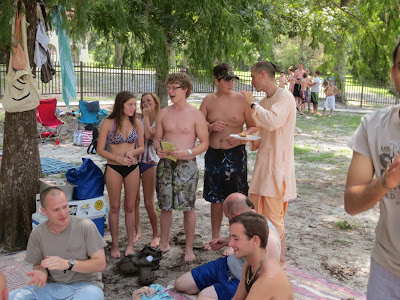
A boy who comes to Krishna Lunch in Tallahassee a couple times a week sat on a towel near the kirtana party for some time.
And very little girl enjoyed moving her arms to the music.
The devotees said that one girl even tried to chant along.
I had made cookies to distribute on harinama, and Sundari Gopi made cookies for the Gainesville devotees, and we distributed both to the people who were attracted by the chanting. To those who were most attracted we gave the pamplet, “On Chanting Hare Krishna,” and we easily distributed the four we brought out, and could have done five. We chanted with the portable harmonium as we walked back to the parking lot. Since we were leaving, no attempt was made to stop us.
We chanted in the parking lot as well.
We chanted two hours and forty-five minutes altogether, and I felt very victorious as lots of people heard the holy name, took prasadam, spiritual food, and some even literature. I was worried that we would stopped after just a few minutes, but Wakulla Springs Park turned out to be a great harinama location.
When we stopped for gas while returning to the temple, we saw some Christian bumper art with a great message:
On Sunday, I chanted at Lake Ella for two and a half hours. I invited one friend to come, and he invited two of his friends to come. Although he did not come himself, his friends did. One included a lady, perhaps in her thirties, who described herself as an ex-hippie, and who had sung with us six months before, when she played the djembe and bought Bhagavad-gita.
I chanted on the campus of Florida State University on Monday with a book table and vegan oatmeal cookies to distribute.
One guy named Sam, who had graduated recently, told how he loved the Krishna Lunch when he was going to school. Both days he came by my table, and while I talked with him, he encouraged people to take the cookies and invitations to the lunch program.
A guy named Alan did not know we had Krishna Lunch at Florida State. He had gone to Krishna Lunch at University of Florida and remembered Daru from there. Thus he was doubly surprised. Surprised we had Krishna Lunch at FSU, and surprised that Daru, who he knew from Gainesville in the mid-1990s, was in charge of it!
One day a girl walked by with a beautifully theistic T-shirt, and I asked to take her picture.
I noticed another student also wearing the same shirt, and I wonder if there is some Christian group promoting it.
Both days I chanted on the campus I found more vegans and vegetarians than I expected to and about 70% of them were unaware of the Krishna Lunch, so I felt I played a role in connecting people with Krishna prasadam during my Tallahassee visit.
Monday evening I attended Garuda Prabhu’s free yoga classes. He has the people chant Nitai Gaura as they do the sitting postures, and they said it so sweetly and innocently that I complimented them afterward. I distributed oatmeal cookie pieces to the nineteen people present. On Tuesday when I chanted on the campus, I met four of the people I had seen at Garuda’s place the night before. They were happy to get more of the cookies.
One of them was friends with the son of a devotee from the Alachua community.
Both days on the campus I collected emails of people interested in Bhagavad-gita classes, mantra meditation, and vegetarian cooking classes.
On Tuesday one boy named Mike came for the Bhagavad-gita class, bringing two friends, one named Darrin and a girl whose name I forgot. I demonstrated to the girl the karatala beat and then clapped my hands to that beat for five minutes, while I sang the popular Prabhupada tune, until she got the beat. Then I continued singing with the harmonium. I showed the Mike the open and closed sounds you can make on each end of the mrdanga drum, and told him to do a big boom on the third karatala beat. Darrin, who was not playing instruments, I told to lead the response, and the others could follow the best they could considering they were also learning the instruments. We chanted for twenty minutes, and I was just amazed how they learned to play the instruments in time and to sing the mantra which they had never sung before, all in such a short period. That experience revealed to me Srila Prabhupada’s genius in singing a simple tune anyone could follow in order to encourage people to chant. The students all stayed for the whole class and for iced tea and cake afterward. Mike, who is majoring in psychology, was fascinated with the empirical studies of Sabom and Stevenson on near-death experiences and past life memories, and he wrote down their names so he could research them.
Jacksonville Harinamas and Krishna Club Program
On Wednesday, many devotees chanted together on the green at the University of North Florida in Jacksonville. There were the three devotee ladies who are helping with the
Krishna Club, the student who is the president of the club, one boy who lived at Krishna House in Gainesville, three traveling book distributors, and myself, so it was very dynamic.
Despite spending the whole morning and early afternoon celebrating Radhastami in Alachua, we still chanted in Jacksonville almost an hour and a half, with Ekendra and Tulasi Priya, who kindly arranged that I could stay for the midday kirtana and feast in Alachua, and also chant in Jacksonville.
Our Krishna Club program on Radhastami was attended by over 40 students. Even the new room we were using was barely big enough. Tulasirani Dasi talked about Radharani and selfless love. Tulasi Priya Dasi sang a really lively tune and most everyone sang along. Many of them danced.
Amrita Keli dd put a video of it on Facebook, https://www.facebook.com/photo.php?v=10104096048148491&set=vb.2040949&type=2&theater, which is better than the copy below I put on YouTube:
Tulasirani and Hladini Dasi made tasty and sufficientprasadam for all. The students were so fired up a group of them started their own kirtana after the prasadam.
Such enthusiasm was beautiful to see! All the devotees who are involved with the club are youthful, enthusiastic, and friendly, and people are easily attracted.
On Friday, we chanted five hours at the University of North Florida and at one point four students joined us, one playing guitar and another didgeridoo. I asked the students if anyone remembered a Hare Krishna tune that they wanted to chant, and they recalled the tune from the previous evening’s Krishna Club meeting that Tulasi Priya had sung beautifully, and they all sang along, with two of the new students leading some of the time. Thanks to Jessica Starr for taking the video of it:
At one point I taught Jessica the chords to the Prabhupada melody, so she could play the harmonium. Ian assisted in pumping the instrument so she could focus on the chords. Youssef played excellently on the guitar, and Dorian played the karatalas. I played the drum, except when I took the picture below:
Hladini Dasi was always talking to students and inviting them to our Krishna programs.
I love the University of North Florida because the students are willing to sit down on the blanket and sing with us. I think during the whole afternoon nine different students joined us, including two who had never been to our Krishna club meetings. Those two told us they would definitely go to the Ratha-yatra on Jacksonville Beach the next day.
Jacksonville Beach Ratha-yatra
It was the first time I have been to Jacksonville Beach Ratha-yatra in many years. Now the Festival of India, with many of its exhibits on different spiritual activities sets up there by the Seawalk Pavillion near the beach. The weather was hot, and there was a lot of sun, so there were lots of people at the beach to encounter Lord Jagannatha’s mercy in the form of His vision, the chanting of His devotees, and the food that was offered to Him.
Some beach girls helped unload the Festival of India truck, including the musical instruments.
Devotees pulled the cart past sleeping beach goers.
The procession attracted the attention of many, like these below.
One couple had a great time dancing in the chanting party in front of the cart.
Some sportsmen enjoyed pulling the cart.
A guy prominently wearing a Christian cross did too.
And some girls also got into it.
My friend Pracarananda got my award for the most colorful shirt.
One couple followed the whole parade and took prasadam afterward. They had not encountered Hare Krishna before, but had a wonderful time at the festival.
Toward the end, a group of young people enjoyed dancing with the devotees in an impromptu kirtana led by Damodar Prasad Prabhu.
One young man named Dakota, with his arms raised on the left of the picture below, who had met the Dvijamani Prabhu on book distribution earlier in the week, came back with the devotees to Krishna House and stayed for five days.
Insights
Srila Prabhupada:
from The Nectar of Instruction, verse 5, purport:
“When a person realizes himself to be an eternal servitor of Krishna, he loses interest in everything but Krishna’s service. Always thinking of Krishna, devising means by which to spread the holy name of Krishna, he understands that his only business is in spreading the Krishna consciousness movement all over the world. Such a person is to be recognized as an uttama-adhikari, and his association should be immediately accepted according to the six processes (dadati pratigrihnati, etc.).”
The Nectar of Instruction, 6, purport:
“According to the statements of Srila Rupa Gosvami in this verse, an American gosvami and a gosvami in a family of acaryas are nondifferent. On the other hand, a devotee who has attained the title of gosvami but is not born of a brahmana father or of a gosvami in the family of Nityananda or Advaita Prabhu should not be artificially puffed up by thinking that he has become a gosvami. He should always remember that as soon as he becomes materially puffed up, he immediately falls down. This Krishna consciousness movement is a transcendental science, and there is no room for jealousy. This movement is meant for the paramahamsas who are completely free from all jealousy (paramam nirmatsaranam). One should not be jealous, whether he is born in a family of gosvamis
or has the title of gosvami awarded to him. As soon as anyone becomes envious, he falls from the platform of paramahamsa.”
An empowered person who is actually engaged in the confidential service of the Lord should not be treated as an ordinary human being, for it is stated that unless one is empowered by Krishna, one cannot spread the Krishna consciousness movement all over the world. When one thus criticizes a pure devotee, he commits an offense (vaishnava-aparadha) that is very obstructive and dangerous for those who desire to advance in Krishna consciousness. A person cannot derive any spiritual benefit when he offends the lotus feet of a Vaishnava. Everyone should therefore be very careful not to be jealous of an empowered Vaishnava, or a suddha-vaishnava. It is also an offense to consider an empowered Vaishnava an object of disciplinary action. It is offensive to try to give him advice or to correct him. One can distinguish between a neophyte Vaishnava and an advanced Vaishnava by their activities. The advanced Vaishnava is always situated as the spiritual master, and the neophyte is always considered his disciple. The spiritual master must not be subjected to the advice of a disciple, nor should a spiritual master be obliged to take instructions from those who are not his disciples. This is the sum and substance of Srila Rupa Gosvami’s advice in the sixth verse.”
from Srimad-Bhagavatam 6.16.26, purport:
“When Angira had first come to visit King Citraketu, he did not bring Narada with him. However, after the death of Citraketu’s son, Angira brought Narada to instruct King Citraketu about bhakti-yoga.The difference was that in the beginning Citraketu was not in a temperament of renunciation, but after the death of his son, when he was overwhelmed by his great plight, he was awakened to the platform of renunciation by instructions regarding the falsity of this material world and material possessions. It is only at this stage that bhakti-yoga can be instructed. As long as one is attached to material enjoyment, bhakti-yoga cannot be understood.”
“The Krishna consciousness movement is progressing successfully in the Western countries at the present moment because the youth in the West have reached the stage of vairagya,or renunciation. They are practically disgusted with material pleasure from material sources, and this has resulted in a population of hippies throughout the Western countries. Now if these young people are instructed about bhakti-yoga,Kṛṣṇa consciousness, the instructions will certainly be effective.”
from Srimad-Bhagavatam 6.16.34, purport:
“The Lord and the devotees both conquer. The Lord is conquered by the devotees, and the devotees are conquered by the Lord. Because of being conquered by one another, they both derive transcendental bliss from their relationship. The highest perfection of this mutual conquering is exhibited by Krishna and the gopis.The gopis conquered Krishna, and Krishna conquered the gopis.Thus whenever Krishna played His flute, He conquered the minds of the gopis, and without seeing the gopisKrishna could not be happy.”
“Pure devotees are described as sama-mati, which means that they never deviate from devotional service under any circumstances. It is not that devotees worship the Supreme Lord only when happy; they worship Him even when in distress. Happiness and distress do not hamper the process of devotional service. Therefore Srimad-Bhagavatam says that devotional service is ahaituky apratihata, unmotivated and uninterrupted. When a devotee offers devotional service to the Lord without any motive (anyabhilasita-sunyam[Bhakti-rasamrita-sindhu1.1.11], his service cannot be hampered by any material condition (apratihata). Thus a devotee who offers service in all conditions of life can conquer the Supreme Personality of Godhead.”
from Sri Caitanya-caritamrita 8.214, purport:
“Srimati Radharani and the gopisare not interested in their personal happiness derived from association with Krishna. Rather, they become happy by seeing one another associate with Krishna. In this way their dealings are further nourished by love of Godhead, and seeing this, Krishna is very pleased.”
from Sri Caitanya-caritamrita 8.215, purport:
“The lusty affairs of the gopisactually constitute the topmost love of Godhead because the gopisnever act for their own personal satisfaction. They are simply pleased by engaging other gopisin the service of the Lord. The gopisderive more transcendental pleasure from indirectly engaging other gopis in the service of Krishna than from engaging in His service themselves. That is the difference between material lust and love of Godhead. Lust applies to the material world, and love of Godhead applies only to Krishna.”
from The Nectar of Instruction, verse 7, purport:
“There are ten basic offenses, and if the devotee avoids these, he can glimpse the next stage, which is situated between offensive chanting and pure chanting. When one attains the pure stage, he is immediately liberated. This is called bhava-mahadavagni- nirvapanam. As soon as one is liberated from the blazing fire of material existence, he can relish the taste of transcendental life.”
“We are sending sankirtanaparties all over the world, and they are experiencing that even in the remotest part of the world, where there is no knowledge of Krishna, the Hare Krishna maha-mantra attracts thousands of men to our camp. In some areas, people begin to imitate the devotees by shaving their heads and chanting the Hare Krishna maha-mantra, only a few days after hearing the mantra. This may be imitative, but imitation of a good thing is desired. Some imitators gradually become interested in being initiated by the spiritual master and offer themselves for initiation.”
from The Nectar of Instruction, verse 8, purport:
“At first, remembrance of Krishna may be interrupted at intervals, but later remembrance proceeds uninterrupted. When remembrance is uninterrupted, it becomes concentrated and is called meditation. When meditation expands and becomes constant, it is called anusmriti.By uninterrupted and unceasing anusmritione enters the stage of samadhi,or spiritual trance. After smarana-dasaor samadhi has fully developed, the soul comes to understand his original constitutional position. At that time he can perfectly and clearly understand his eternal relationship with Krishna. That is called sampatti-dasa,the perfection of life.”
from Sri Caitanya-caritamrita Madhya 8.246, purport:
In the Itihasa-samuccaya,Narada tells Pundarika: “After many, many births, when a person realizes that he is the eternal servant of Vasudeva, he can deliver all the worlds.”
Satsvarupa Dasa Goswami:
from Vihara Bhavan, “Poem for September 13”:
“The
harinama process
is the easiest, fastest
and surest way
to attain love of God.”
Akuti Devi:
In our quest for the meaning of life we are blessed to have abundant guidance from the Vedic literature.
We are part of God, and as part of Him, we are meant to please Him, the whole. We are asking, “I am part of You. Please accept me back.”
We in this world are conditioned. Krishna has set the conditions, and one of them is that we must suffer.
Most of the people at the Ratha-yatra festival who I asked, “After this life, do you want to come back?” said “No, I want out of here.”
Although the mind is subtle, sometimes it seems really heavy.
Desiring freedom from mental disturbance people take shelter of intoxication, but that just increases their demonic qualities and saps their ambition for spiritual life.
We have to have a maha-cleanup [grand cleanup] of our mind. If we help each other clean our minds, very quickly we can be successful.
Krishna compares the steady mind to a lamp in a windless place. Thus we should go to a windless place. If you know you are going to be distracted by going to a place, then don’t go there.
Srila Prabhupada has created such a nice regulated program so we always know what to do. We just have to do it.
Prayer is helpful.
If people see that you are satisfied, they may become inclined to inquire why.
comment by Premananda Gaura: I know friend in Argentina that used to do flips through train cars and come out the other side. Once when he was about to do it, his girlfriend had a bad feeling and discouraged him, but he disregarded it and did four flips, getting so close to the train wheel that it brushed him, and landing with his face in a book that was on the ground. He put the book in his coat pocket, and his mother found it when she was cleaning the coat. She glanced at the book, Bhagavad-gita As It Is, and was impressed, and she encouraged him to read it. He and his whole family ended up becoming devotees.
comment by Dharmaraja Prabhu: Parjanya Maharaja told me how he became a devotee. The devotees came by his hotel with their Gita distribution program. He took one and read a few pages and fell asleep with the Gita on his chest. Some thieves came and stabbed him, but the knife went into the book on his chest instead of his body. Parjanya Maharaja awoke, and the thieves ran away. He decided that Krishna was protecting him, and so he became a devotee.
Batu Gopal Prabhu:
The living entity is designed from the bottom up for relationship with Krishna and is stimulated more and more by Krishna’s attractive qualities to serve Him. Therefore activities without Krishna in the center are superfluous, they don’t touch the self, and the soul derives no real benefit from them.
We do not have to worry about creating a relationship with Krishna. The relationship is already there.
We are insignificant in relationship with Krishna and thus what can we do to insult Him? Even if He was easily angered by nature, which He is not, we are too insignificant to disturb Him.
Krishna knows how to deal with anyone and everyone. Take Duryodhana, for example, how does Krishna deal with him? He expands as Lord Balarama and teaches him how to fight with a club.
We are here in this world not so much because of dealing with the Lord improperly as much as because of dealing with the Lord’s devotees improperly. Just as a teacher separates a student that is a troublemaker from the other students, so the Lord keeps the souls that cause trouble to others in the material world.
Sometimes we are discouraged because of our bad conditioning and may wonder how we can possibly go back to Godhead. But on the other hand, considering the unlimited mercy of Lord Caitanya and His representatives, we might think “How can we not go back to Godhead?”
We are not about to understand God anymore than an ant will understand a human being. It is not like two ants will say about a human being, “if we can just get him in the lab we will be able to understand him.”
We should be hesitant to criticize the actions of God because they are beyond our understanding.
Srila Prabhupada said that if we have a problem with another devotee, we should consider it is our fault. We might consider that “this devotee will be back in the spiritual world in a moment, who am I to criticize him?”
All those people who have taken prasadam at University of Florida for so many years, they are devotees. Lord Caitanya has their names.
Whatever your capacity, spread Krishna consciousness. You may not be able to spread it throughout a whole country, but you may be able to spread it throughout a household.
Diary of a Traveling Sadhaka, Vol. 9, No. 16
By Krishna-kripa das
(August 2013, part two)
Czech Woodstock, Prague, Berlin, The North of England
(Sent from Gainesville, Florida, on September 5, 2013)
Where I Went and What I Did
Upon leaving Bratislava I went to by bus to Vyskov via Brno to catch a ride to Trutnov with Dina Vatsala Prabhu. He showed us the temple his devotee friends are constructing in Nove Sady, where there is a community of several devotees. In Trutnov we did harinamas in the town and on the site and kirtanas on two stages during a period of three and a half days, encouraging the attendees to chant Hare Krishna and dance, and I had many nice experiences there. After Trutnov, I did harinama for a day each in Prague and Berlin. Then three days of harinama in the Newcastle area, and a weekend trip of harinamas and outreach programs in York on Saturday and Leeds on Sunday. Then four more days of harinama in the Newcastle area, including Janmastami and Srila Prabhupada’s Vyasa-puja Day. Then off to do harinama and an outreach program in Liverpool and more harinama Manchester, thus ending the month, and my stay in the UK for the summer. Then I took an exhausting but inexpensive train and overnight ship from Manchester to Dublin for the Ratha-yatra on September 1.
Again I was in mostly in places without morning lectures or where I gave the lectures, but I have some nice quotes from Srila Prabhupada’s books, the writings of Satsvarupa Dasa Goswami, notes on Guru Dasa Prabhu’s talks at the Czech Woodstock, on classes from a Prabhupada disciple named Jagatatma Prabhu, who preaches in the Manchester area, and on the Newcastle lectures of Ananta Nitai Prabhu, my harinama partner in Ireland and the UK. I finish up the insights with heartfelt words of appreciation for Srila Prabhupada on his Vyasa Puja day, which were very ecstatic to hear, by the devotees from our temple in Newcastle upon Tyne in England, my home base in the summer.
Thanks to Tobi for the Berlin pictures and Klara for the Prague pictures. To see the over 400 pictures I did not include in this blog, click on the URL below:https://picasaweb.google.com/103872792410945983719/TravelJournal916
Itinerary
September 5–6: Gainesville
September 6–10: Tallahassee
September 11–13: Jacksonville
September 14: Jacksonville Beach Ratha-yatra
September 15–26: Gainesville [except one day in Tampa]
September 27–30: Columbus, Ohio
October 1–November 25: Union Square harinama, New York City
November 26–February 19, 2014: Gainesville
[except with 5 days / month in Tallahassee, one day per month in Tampa]
February 25–April 20, 2014: Mayapur
Trutnov Open Air Music Festival (Czech Woodstock)
Like Przystanek Woodstock (or the Polish Woodstock), a much larger rock concert in Kostrzyn, Poland, the Trutnov Open Air Music Festival (Czech Woodstock) in Trutnov, Czech Republic, is also organized by someone who favors the Hare Krishna devotees by giving them place to set up a stage and distribute Krishna music and Krishna food. Martin, the main organizer, likes the face of Lord Jagannatha, who appears on the wrist bands, stages, and promotional material for the event.
What I like about the Czech festival is that it is smaller, and you get to know the people who come to our camp each day. This year I made three Facebook friends, two who came to Govindas in Prague for the first time.
Punya Palaka Prabhu, the organizer of our Krishna Camp for many years, said the first day, before I came, that there were six girls who were chanting “Krishna-kripa.” I did not know that there were six girls who knew my name. It was a bit humorous to hear.
There are regulars who like the kirtana and come each year, coming into our tent two or three times a day, or even more. People seem to know if they get burned out by the rest of the festival, they can come to the Krishna camp to recover.
The first night many people enjoyed chanting with us.
Shari Beri (right, below), who lives in Trutnov came every year since 2009, the first time I went, and regularly brings her friends to our camp.
She came back one night at 2:45 a.m., upset that we ended the chanting earlier that night, and asking us to play later the final night.
One man from Pardubice was very inquisitive, and asked questions for quite awhile.
We did harinama in Trutnov the first full day of the festival, and passed the devotee restaurant there called Baladeva.
Ssome people sang, clapped, and/or danced with us.
Some followed our party.
One couple saw us on harinama in the town at noontime, and then again near the end of the evening kirtana, perhaps at 1 a.m., and then the young lady was really singing the mantra.
One girl made a gesture that the kirtana was really great, so I gestured back that she might come in our temple and dance, so she entered our tent, learning my dance step, and dancing for half an hour, chanting the whole time.
Later she said her name was Anna, and she introduced me to her friend, Dominik.
They had heard about the Hare Krishna restaurant, Govinda, but they had never been. I told them about the chanting programs Wednesday evening at the restaurant so they could continue their interest in the chanting. Later she wrote me on Facebook that she went to Govinda.
Another girl who danced for half an hour, smiling the whole time, told me she already knew about the restaurant Govinda, in fact, at the end of the day, she would distribute the leftover Govinda’s prasadam to the homeless.Seeing her attraction to the chanting, I invited her to the Wednesday evening program at Govinda, which I was very surprised that she had not heard of.
It was amazing to see one guy who was wearing a “Dead Kennedys” shirt chant continuously for two hours.
Later he thanked me, saying that he was so tired he wanted to leave but my chanting and dancing inspired him to chant and to stay for two more hours. He commented on how the chanting gives you energy.
We do not have security persons to keep people off our stage, so sometime people from the crowd become inspired to join us on our stage during our chanting like the girl next to the mantra sign below. She was a regular who chanted every day.
These two horse headed personalities were also bold enough to join us on stage.
One man came in our tent, and began dancing, leaving his little girl sitting on the bench.
Klara felt sorry for the girl and danced with her.
At the end, when Klara left, both the man and daughter danced.
Guru Das Prabhu liked to talk about his relationship with George Harrison, George Harrison’s spiritual side, and his relationship with Hare Krishna. Drew, a musician friend of the devotees, played a few of the more spiritual George Harrison songs, like “Here Comes the Sun” and “My Sweet Lord.” I took some video of that.
Bhaktivaibhava Swami kindly came and sang for a couple hours on the last night, leaving the German kirtana mela to come there, which must have been a sacrifice for him. He sang great tunes to dance to.
We got more exposure being on the second stage three times this year instead of once or not at all.
Always a few fans would come up close.
Here is video of the last time we chanted on the second stage:
Over three-quarters of the people sitting on the grass listening to our music took temple/restaurant invitations with the mantra on them, some with great eagerness.
We would also do harinama to and from the stage, increasing our interactions with people even more. Here are some photos from those harinamas,
Some are from an outdoor pub we went through.
One lady joined us on the harinama, and returned to our camp to sing and dance.
We carried the Radha Krishna picture back from the stage.
Vendors appreciated the harinamas.
We would pass the devotee shops, one for the restaurant Govinda.
Another selling snacks made on the Czech Hare Krishna farm.

Here are some video clips I took of the chanting on our stage so you can get a feel for it.
Reflecting on the festival, I could see I was instrumental in some people at Trutnov happily participating in the chanting and also learning about more opportunities to connect with Krishna after it ended and that made me happy.
Prague Harinama
Antardwipa Prabhu, his wife, Klara, and Goura Karuna Prabhu did harinamawith me in Prague for two hours the final day, which was a sacrifice as we were tired from late nights at the music festival.
We followed the usual Prague harinama route through the tourist areas, including Old Town Square, where our Ratha-yatra is held.
Gaura Karuna Prabhu distributed books.
It rained, and we chanted under a covered section of a famous bridge. One guy danced with us.
Tour groups were stuck there listening to us because of the rain.
Between tunes I said a few words to them about the effect of the mantra. It was a memorable experience. My bus to Berlin was late, but I did not care as there is free wireless internet at Prague’s Florenc bus station.
I thank Klara, Antardwipa’s wife, who kindly took the pictures, as well as chanting the response, and once leading an attractive tune.
Berlin Harinama
I spent a day in Berlin, staying at the flat where Lord Jagannatha and His pujari, Hrdaya Gauranga Prabhu (on the left in the below picture) live, quite near the site of the old temple.
Hrdaya Gauranga Prabhu was happy to have another person to do the first half of the morning program with, and we were happy that Siddha Svarupa Prabhu joined us for the second half. In the class, I talked about Lord Balarama as it was His appearance day the next day, and I would miss it, because in England they observed it today. I told about how Balarama often plays the role of a mediator, and gave some examples such as when Duryodhana and Bhima were fighting and when the Kurus arrested Samba and the Yadus were upset. I also read Lord Balarama’s instructions on spiritual life which He gave to Queen Rukmini, His sister-in-law, on her wedding day.
The three of us went on harinama in the afternoon. After forty-five minutes, Paramatma Prabhu, along with a devotee boy, came and distributed books nearby for an hour or so, and then joined us for the end of the kirtana. When we had all five devotees chanting it was very dynamic. The little boy danced, jumping up and down, and attracting attention.
I was happy dancing and distributing invitations as usual.
One young photographer named Tobi who I later found was familiar with the devotees, stayed with us for an hour or so, taking pictures of us from time to time, especially when the kirtanabecame wild or when people interacted with us. I gave him my card, and asked him to send me the pictures which he did. Although the harinamawas a little slow in the beginning, it became a wonderful experience in the end.
Sunderland Harinama
Sunderland is one of the bigger cities around Newcastle, and we have developed a program of going there once a week and doing harinama, followed by prasadam and kirtana at Ramai and Vrinda Prabhus place there.
Satya Medha Gauranga Prabhu, who works in Sunderland and who distributed books and chanted there as a brahmacari, took his lunch hour when we were chanting there so he could join us. Thus we were wearing dhotis, casual dress, and formal dress, altogether on harinama.
Some boys came and played the tambourines and the gong with such intensity that a shop owner complained, and we learned that you cannot allow kids to play the gong or it will be way to loud
York Harinama and Program
We had our Janmastami program in York the Saturday before, and had about seven people for the harinama in York beforehand. Govardhan Dasi sings in public there every Saturday for two hours along with her husband, who distributes invitations, and she was happy to have many more devotees.
The nama-hatta program for Janmastami had variety, including kirtana, two dramas, and a song about Krishna’s pastimes. I also gave the first of four lectures on Krishna’s appearance, the others being in Leeds, Newcastle, and Liverpool. Twenty-four people came although the program has not been going more than a few months. Govardhan Dasi did a great job organizing it, and Ganesh Prabhu, Dennis, and others helped greatly.
Leeds Harinama
Caru Candra Prabhu was there for almost the entire three-hour harinama, and a couple ladies came near the end so we had three people for the last hour and four people for the last twenty minutes. The last twenty minutes we walked to the car, exposing people along the way to the chanting.
Chester-le-Street Harinama
Ananta Nitai Prabhu, Prema Sankirtana Prabhu, Malvika, Atul, and I went on harinama in Chester-le-Street. I think the residents there must have decided that they liked us when we came last time because the people were so favorable. A friendly older lady praised our singing, gave us a pound, and said she had heard us in Newcastle too. As we often do now, we brought tambourines for interested kids to play. First a girl played.
Then a boy and girl happily played, and the mom was happy to watch them and gave a donation.
People gave £22.63 ($35.28) in three hours, making probably it the most charitable place we have been in the Newcastle area, and we distributed about seven books.
Newcastle Harinamas
One day in Newcastle many people danced with us and/or played the instruments. It started out with a small girl who played tambourine for 10 or 15 minutes on two different occasions.
Her friend was not interested, but patiently waited on her bicycle, for her to finish. The girl played in time and seemed to have some taste for it.
Then one young lady came who was visiting from Leeds but had lived in Arab countries for many years. She loved to dance and play the tambourine, and stayed for an hour or so.
Then a boy danced.
And then a man.
Then a very energetic young lady.
It was inspiring to see the enthusiasm for participation in Lord Caitanya’s merciful sankirtana process.
During our Janmastami harinamain Newcastle, a jovial man gave us a pound, and accepted a Path of Perfection.Then he told a story: In the 1980s, when in his 20s, he was in Gainesville, Florida, and lost his passport, his green card, and his money. But the Hare Krishnas gave him something to eat, and he said he would never forget it! Krishna Lunch Gainesville ki, jaya!
Harinama on Vyasa Puja was a challenge for me. I am not used to living in temples where the Vyasa Puja feast is served at 5 p.m. so we had no choice but to try to do harinama from 6:00 to 9:00 p.m. Ananta Nitai Prabhu and I were ready to leave at 6:30 p.m., but we lost a lot of time waiting for people to take prasadam and then trying to convince them to come with us. We were unsuccessful in our attempts as many devotees either had still to complete their daily chanting on beads or needed to help with the cleanup, so we chanted by ourselves from 7:45 p.m. to 9:45 p.m.! Most of the shops close at 8:00 p.m., but we chanted across from a McDonalds that is open 24 hours a day. A lot of young people were hanging out with their friends outside the McDonalds. Several people danced with us for awhile, especially the girls and those of African descent. One drunk middle-aged man spoke favorably about us and played the tambourine with us for about five minutes. A couple girls danced for a couple minutes. I am sure because of going out at a time when we never go out, we encountered people who had not seen the devotees before nor heard the kirtana, and that was Srila Prabhupada’s mercy on his auspicious appearance day.
Since I was leaving the next day for Manchester and would not return till next spring, when Ayan began to drive us downtown for harinama, the devotees chanted Hare Krishna as a going away blessing.
Prema Sankirtana Prabhu even blocked the car.

In general, harinama in Newcastle went nicely for me this year. Prema Sankirtana Prabhu, who is full of enthusiasm, and great at getting people to interact with our party, especially by dancing and also by playing the tambourines, would often come out. Malvika, who has a beautiful voice and lots of enthusiasm, would almost always come out. Bhakta Rasa Prabhu, who has been doing outreach in Newcastle for over twenty years, would try to come out once a week. Ananta Nitai Prabhu, who I had done many, many harinamas in Ireland, kindly came to Newcastle for two weeks and went out almost every day. Satya Medha Gauranga Prabhu is almost always willing to chant in Sunderland during his lunch break, and on Saturday in Newcastle. Also last, but not least, Vrinda and Vishnu Priya periodically invite the harinama parties over to their places for lunch or dinner to serve and to inspire the devotees, which we are always grateful for. Thus Krishna inspired me by giving me a good group of people to chant with there in Newcastle, and I look forward to returning next year and doing harinama with my friends.
A Double Harinama Day
The coach from Newcastle to Liverpool was too expensive so I booked one to Manchester and found an advance purchase ticket on the train from there to Liverpool for £4. I thought of leaving my bags and getting some prasadam at the Manchester temple, but later decided to do harinama for an hour and a half or so with my friend, Gaura Das Prabhu, who does book distribution in Manchester on Fridays. Then in Liverpool before the monthly nama-hatta, I chanted for two and a half hours there. Several people gave donations, most not taking books. A Polish lady who regularly attends the nama-hatta program happened by and bought an Isopanisad and a music CD giving £5. At one point I was so tired from staying up late on Janmastami and Vyasa Puja, I was falling asleep, and I prayed to Lord Caitanya to keep me awake so I could sing. It worked, and I was thus able to continue.
Unexpected Manchester Harinama
Usually the last Saturday of the month we chant in Bolton, but everyone was wiped out from Janmastami and Vyasa Puja or else had other engagements so there were just three of us. Since two of us lived in Manchester, we convinced Vrajendralal Prabhu, our leader from Bolton, to come into Manchester and chant with us there. He brought another devotee, and ultimately more came, and we had eight or nine devotees singing for almost two hours in Manchester on a very beautiful day in a city filled with many people.
Our leader said we passed out more invitations than ever before, although we gave them only to people who showed some signs of interest. A couple of Muslim girls Jagatatma Prabhu gave cards to, chanted the mantra and followed us for a few minutes, a rarity. A few people danced with us, like the ones below.
People at outside cafes showed their appreciation.
I felt that I was instrumental in saving the harinama, which could have easily been canceled due to too few participants.
Insights
Srila Prabhupada:
from Sri Caitanya-caritamrita, Madhya 7.148, purport:
“Although Vasudeva Vipra was a leper and had suffered greatly, still, after Sri Caitanya Mahaprabhu cured him He instructed him to preach Krishna consciousness. Indeed, the only return the Lord wanted was that Väsudeva preach the instructions of Krishna and liberate all human beings. That is the process of the International Society for Krishna Consciousness. Each and every member of this Society was rescued from a very abominable condition, but now they are engaged in preaching the cult of Krishna consciousness. They are not only cured of the disease called materialism but are also living a very happy life. Everyone accepts them as great devotees of Krishna, and their qualities are manifest in their very faces. If one wants to be recognized as a devotee by Krishna, he should take to preaching work, following the advice of Sri Caitanya Mahaprabhu. Then one will undoubtedly attain the lotus feet of Sri Krishna Caitanya, Lord Krishna Himself, without delay.”
from Sri Caitanya-caritamrita, Madhya 8.38, purport:
So-called followers of Vedic principles simply accept the Vedas formally, but they act against Vedic principles. This is symptomatic of this Age of Kali. People claim to follow a certain type of religion, saying formally, “I am Hindu,” “I am Muslim,” “I am Christian,” “I am this or that,” but actually no one follows the principles enunciated in religious scriptures. This is the disease of this age. Therefore the merciful Sri Caitanya Mahaprabhu has simply advised us to chant the Hare Krishna maha-mantra:
harer nama harer nama harer namaiva kevalam [Cc. Adi 17.21].
The Lord can deliver anyone and everyone, even though one may have
fallen from the injunctions of revealed scriptures. This is Sri Caitanya
Mahäprabhu’s special mercy. Consequently He is known as patitapavana,
the deliverer of all fallen souls.
from Sri Caitanya-caritamrita, Madhya 8.83, purport:
Actually one can take shelter of such spiritual mellows only when one is completely uncontaminated by material attachment. When one is completely free from material attachment, the feelings of the transcendental mellows are awakened in the heart of the devotee. That is svarupa-siddhi, the perfection of one’s eternal relationship with the Supreme Lord. Svarupa-siddhi, the eternal relationship with the Supreme Lord, may be situated in any one of the transcendental mellows.
from The Nectar of Instruction, verse 3, purport:
One should not be impatient in Krishna consciousness. Indeed, this Krishna consciousness movement was started single-handedly, and in the beginning there was no response, but because we continued to execute our devotional activities with patience, people gradually began to understand the importance of this movement, and now they are eagerly participating. One should not be impatient in discharging devotional service, but should take instructions from the spiritual master and execute them with patience, depending on the mercy of guru and Krishna.
from The Nectar of Instruction, verse 4, purport:
“. . . by chanting the holy names of the Lord we can actually convert many people throughout the world to Krishna consciousness. Contributing or distributing the holy name of the Lord is a sublime example of contributing or giving charity (the dadati principle).”
Satsvarupa Dasa Goswami:
from his journal, Viraha Bhavan, “Poem for August 16”:
“The Divine Couple
are intoxicated by
Their love for
one another, and their pure devotees
share that happiness through service.”
from Japa Reform Notebook:
“Regarding your question, there is no such requirement that japa should be silently and chanting should be done differently. Loudly or silently, everything is all right. There is no such restriction. Only thing is that we should chant very attentively, hearing the vibration very distinctly.”
—Letter from Srila Prabhupada to Satsvarupa March 8, 1969
Guru Das Prabhu:
from talks at Trutnov, the Czech Woodstock:
We chant in the spirit of not expecting some result. We chant with a desire to serve Krishna.
Srila Prabhupada wrote eighty books answering the questions, “Who am I?”
“Where am I doing?” and “What am I doing?” While we were sleeping, he was writing.
Those of you who have chanted are taking part in the process. You are interacting not just believing or listening.
We have an individual relationship with Krishna. We want to think of Krishna day and night. When we sing Hare Krishna, Krishna is dancing on our tongue, and Krishna enters our heart, along with the cowherd boys and girls and the peacocks, in His beautiful form.
There are so many things to do and see here, but somehow Krishna has entered your heart, and you have come hear. It is very peaceful here.
When Krishna’s love develops in our heart, we love others.
This is a world of duality, but in Krishna consciousness, we can harmonize the duality. We can become transcendental.
There is no coming down once you experience this. You do not have to look around the corner for some substance.
In the 1960s, some of the leaders understood there is more to music festivals than getting together, hearing music, and getting high. It is to make progress on a spiritual search.
John Lennon and George Harrison chanted Hare Krishna for three days enroute to Morocco.
There is a regulative stage and then a spontaneous stage where life becomes an adventure that will even blow your own mind.
In the 1960s, we were searching for wisdom, American Indian, Buddhist, etc., and when we found it, we would live it. In San Francisco, they would wear their search.
In San Francisco, we put flowers in the policemen’s guns.
The Diggers, who were next to our temple, had free cloths, and they had a coat soaked in LSD, and people who knew would cut pieces off of it and trip all day.
The Be-ins were a place you could be yourself. Everything was free.
Srila Prabhupada taught there is a way to be high from what you have inside. There is a way to be high from plain living and high thinking.
I met the leaders of the counterculture but none were so personally compassionate to me as Srila Prabhupada.
In London, every day we would send something to the Beatles, the story of Prahlada Maharaja, a wind-up apple with Hare Krishna written on it, an apple pie with Hare Krishna written on it. Nothing worked. The Hells Angels planned to break up the Beatles’ office. Then George saw us, and said that he was so glad to finally meet us. We had a friendly relationship with the Hells Angels, and so they decided to desist from causing disturbance when they saw the Beatles were friendly to us.
George was funny. He liked one Monty Python joke. Two people are talking. One says, “We were so poor we slept on the floor.” The other replies, “You had a floor?”
Once George played the Govinda song on a ukulele and it sounded like an orchestra.
The song “Something in the Way She Moves Me” by George Harrison was actually written referring to Krishna, but George thought if he said “Something in the Way He Moves Me” people would have thought he was homosexual. Frank Sinatra says that song was the best love song ever written.
Here the people are willing to make the choice to change. Krishna has guided you here. Thank you for choosing to come here.
Love is Krishna. You always see Krishna with cows, peacocks, trees, etc.
There are two types of love: love where you expect something and love where you do not expect something.
Srila Prabhupada came to share that pure love in his old age, suffering two heart attacks crossing the sea, but he was not discouraged.
Diary of a Traveling Sadhaka, Vol. 9, No. 15
By Krishna-kripa das
(August 2013, part one)
Polish Woodstock, Harinamas in Germany and Bratislava
(Sent from Newcastle upon Tyne on August 26, 2013)
Where I Went and What I Did
The devotees of the Sri Harinama Mandir traveling party dropped me at the Krakow train station, and I took an overnight train, crowded with young people, to Kostrzyn for my thirteenth time at the Polish Woodstock. The Vaishnava youth European bus tour joined the many regulars who come each year to share Krishna music, food, dance, knowledge, and more, with many tens of thousands of people there at the Polish Woodstock. New kirtana leaders are always coming, this year, Amala Harinam Darling and Jahnavi Harrison, in particular, and they both did a great job. Jayatam Jaya Sila Prabhu had printed thousands of Polish mantra cards with contact information for the International Society for Krishna Consciousness in Poland which I distributed many of. Some of my friends chanted to the crowds waiting at the Kostrzyn train station the day after the Woodstock, and we got a good response as usual. I took another amazingly crowded train to Berlin, and shared a car with people going toward Kassel, to join Sadbhuja Prabhu and his van party, distributing books and doing harinama in different German cities, which culminated in the Ancient Trance festival in Taucha, near Leipzig. Then I shared a group ticket on the train to Berlin, to go on harinama with the devotees there, before taking an overnight bus to Slovakia’s capital of Bratislava to give the Sunday feast lecture. The next three days I remained there, doing three hours of harinama each day with a party lead by Gaura Keshava Prabhu, who was inspired by chanting three months in Union Square with Rama Raya Prabhu’s party, to start a daily harinama party in Bratislava. Next I went to Czech Republic for the Trutnov Open Air Music Festival, also known as the Czech Woodstock, for the fifth time.
As I was in places with no morning lectures such as the Polish Woodstock, or where I gave morning lectures such as Germany and Bratislava, I have very few notes on lectures, but lots of absolutely wonderful quotes from my personal reading of Srila Prabhupada’s books. In addition to those, there is a brief Prabhupada remembrance by Satsvarupa Dasa Goswami, a note from a class by Bhakti Sastri teacher, Adi Purusa Prabhu, and a reflection by myself on spiritual dress.
Itinerary
August 26–29: Newcastle upon Tyne and nearby towns
August 30: Liverpool
August 31: Bolton
September 1–2: Dublin
September 3: Dublin, Philadelphia, Orlando
September 4–6: Gainesville
September 6–10: Tallahassee
September 11–12: Jacksonville
September 13: Gainesville
September 14: Jacksonville Beach Ratha-yatra
September 15–26: Gainesville [except one day in Tampa]
September 27–30: Columbus, Ohio
October 1–November 25: Union Square harinama, New York City
November 26–February 19, 2014: Gainesville
[except with 5 days / month in Tallahassee, one day per month in Tampa]
February 25–April 20, 2014: Mayapur
The Train to the Polish Woodstock
I heard that PKP, the Polish train company, had scheduled many extra trains to come to the Polish Woodstock, and to return home, but I had never ridden one. Nor do I think I will ever ride one again!
Judging from the number of people waiting at the Krakow train station, I could understand the train would be crowded.
There are always people who are not afraid to dress differently at such events as Woodstock, like the girl below with the violet hair and feathered cap.
The train was first announced to be 25 minutes late, and then 40 minutes late, 60 minutes late, and lastly 80 minutes late.
It finally left Krakow 100 minutes late, and arrived in Kostrzyn 120 minutes late!
I have been on trains with people who stay up late, but not that late. In fact, there was no time when all the people were asleep and none of the people were drinking, smoking, and talking loudly.
I talked to a few interesting people, like a boy who wanted to go to India, and a another boy who sat next to me and meditated.
While I was waiting in between the cars of the trains, in a queue for the toilet, several young people chanted a few mantras with me.
Had I been willing to spend 30 euros each way from the UK, I could have brought my harmonium, and got more people into chanting.
At one point, I realized it would not be able to get any more real sleep, so I put my headphones on and played a Madhava kirtana at its full volume. Then I was smiling and moving to the music, and I was pretty blissful despite my lack of sleep and all the craziness around me. Some people looked at me and smiled, and I took the headphones from my own head, and one by one, put them on the heads of the four people who were watching me, so they could hear, and they would smile. One girl sat diagonally across from me, and I put the headphones on her. She said she liked the music, and I invited her to our Krishna village, saying that the singer on the recording would be performing in person there.
Polish Woodstock
The Polish Woodstock is a free rock concert organized by philanthropist Jurek Oswiak, who appeciates Indradyumna Swami’s work in Poland, and allows him space to a free Krishna festival with kirtana, prasadam, dance, drama, yoga, questions and answers tents, and much, much more. Thus many, many tens of thousands of people mostly from Poland, get a very positive experience of Krishna consciousness.
Joyful to see thousands of people experiencing Krishna kirtana, I have been coming to the Polish Woodstock for thirteen years.
The harinamathe first day attracted more people to sing and dance with us, and to follow us back to our camp than ever before, and it was beautiful to see.
My role on the harinamas and the Ratha-yatras was to distribute invitations to our Krishna’s Village of Peace.
At one point, it began raining, and the devotees and onlookers continued to chant and dancing, and Indradyumna Swami continued to photograph them. As I was getting wet, I was looking at our main tent, which was largely vacant, and wondering how many Hare Krishnas does it take to figure out we would be better off in the tent. I decided to suggest to Indradyumna Swami that we might chant in the tent, and he made a beeline for the tent, and everyone followed him, surprising the people who were taking prasadam there, and we chanted and danced in the tent ecstatically for some time.
At the Woodstock, during our lunch, Govinda Prabhu always share verses that we have learned over the year. I taught him the only about how everything becomes easy if one remembers Lord Caitanya, and he taught me the beautiful one about Lord Caitanya that appears at the end of this blog.
Some people who saw me distributing mantra cards at the Mantra Yoga tent remembered me from the train to Kostrzyn, and others from seeing me last year. One man remembers
me from Zary in 2002 or 2003, and comes by to say hello each year. One man excited showed me the picture he took of me on his mobile phone last year, and insisted on taking another picture this year.
I met a girl named Frances from Berlin who was spiritually inquisitive. It was as if she wanted to believe in God but had had too many years of atheistic association to make it easily possible. I encouraged her to explore our tradition, and to try the practice to see if she found any benefit in it.
The program in our main stage begins with chanting, and when I am free, I go there and dance, and in that way try to inspire others. One girl came up, wanting to learn my dance step. After following me a little while, I suggested that Jahnavi Harrison take over as her dance instructor, which she kindly did.
Caturatma Prabhu did questions and answers a lot as usual, here translated by Mandakini dd.
He also would dance like mad in the Ratha-yatra kirtana.
Many, many people enjoyed dancing in the Ratha-yatra.
These include the brahmacari, Jon, below, who is a friend from Gainesville.
We had great singers in the kirtana tent, which was named Mantra Yoga. These included B. B. Govinda Swami, Indradyumna Swami, Bada Haridas Prabhu, Madhava Prabhu, Amala Harinama, Jahnavi Harrison, Acyuta Gopi, and her brother, Ananta.
The last two days inMantra Yoga, Madhava Prabhu sang for three and a half hours and then B. B. Govinda Goswami sang for an hour and a half or two hours. It was awesome to see the number of people happily participating by chanting and dancing. I distributed many mantra cards. Somehow it seemed we had more people at the end when Madhava Prabhu would sing first and B. B. Govinda Swami later, and that is how we did it the last two nights.
During Madhava Prabhu’s kirtana one trio became so inspired that they really took up his instruction to chant with all their hearts. The girl read the mantra from a card I gave her.
The girl and two boys would chant during the lead, during the response, and during the instrumental interludes. They did not stop! They chanted loudly chanting with blissful smiles on their faces for over half an hour, and you sensed that Krishna must have been reciprocating with their enthusiasm.
I met a German girl from Bonn, and I wrote down for her the web page for the local temple in the adjacent city of Cologne as she expressed some interest.
A middle-aged German couple from Berlin asked me about Krishna consciousness, the husband translating what I said for his wife.
I met a girl from Poznan who came everyday to the kirtana for hours. I gave her the contact for the devotee in Poznan who occasionally arranges programs there.
Izabela, who I originally met on our festival tour in Kolobrzeg years ago, but whose family lives in Kostrzyn, came to our camp, bringing friends for prasadam as she does every year. She studied in Wroclaw, then graduated and moved there, and I gave her the contact information for our temple there. Later she and a boy came back to the kirtana tent, and chanted and danced like anything. I do not remember her dancing like that ever before!
One girl with a bandaged foot told me lived in a place where we had no temple or nama-hatta program, but she was beginning her studies in Warsaw at the university. I had no Warsaw temple invitations, so I gave her my card, saying I would sent her the contact information for the temple. She surprised me by writing me the very morning after the Woodstock festival was finished. The vast majority of people I give my cards to do not write.
One man with one leg who was on crutches was so inspired by Bada Haridas Prabhu’s kirtana that he danced as best as one could in that condition. It was awesome to see.
In Mantra Yoga tent people sometimes happily dance in a chain,
sometimes in a circle,
and sometimes forming a bridge, and passing beneath it.
Older people would dance.
And younger people would dance.
I was surprised to see entire Polish families come more than once to our Mantra Yoga tent and dance with the devotees.
Some people would try to follow the dancing of the devotee ladies.
On the last day, as the evening progressed, I saw greater interest in the mantra cards, decidedly more so than in previous years. I would give the new mantra cards, with the mantra and a brief description, to people as they came out of our kirtana tent, thinking that the joy they experienced dancing with us might generate some interest in the mantra. Others, standing outside the tent, would see me handing out the cards, and they would approach me asking for one. In several cases, they asked for two, three, four, or even five, for their friends! Often when I gave someone a card they would smile or fold their hands in gratitude. I found it difficult to remember who I gave the cards to, and sometimes I noticed I thought I remembered the people but I was wrong. A few cards were left on the ground, but I think much less than one percent.
Harinama at the Kostrzyn Train Station
We planned to chant at the train station the day after the Woodstock from 11 a.m. to 1 p.m., but even though we ended our program by 2 a.m. the night before, much earlier than usual, devotees slept in so late we ended up going out from 1:10 p.m. to 2:30 p.m. instead. We would have stayed out longer, but I had a train to catch at 3:11 p.m., and I wanted to honor the post-Woodstock feast before leaving. As it was, I reached the train two minutes before it left. We started out with just four devotees on the harinama, Syama Rasa Prabu on the accordion, Vishnu Puri Prabhu on the mrdanga, and Mathura-pati Prabhu on the karatalas, and me, dancing and distributing mantra cards. It was so ecstatic to just be out chanting again, sharing Lord Caitanya gift of unlimited good fortune through the medium of his holy names. There were people who expressed their joy in seeing us by smiling, moving with the music, taking photos and accepting mantra cards. One man with a bandaged foot chanted with us on two occasions, reading the mantra from the card I gave him. He also danced the best he could in that condition and got cards for his two associates.

Two girls shook small boxes of candy in each hand in time with the music. One boy tried singing the mantra along with us.
Another time several girls danced as we passed them.
A couple of guys, luggage in hand, sang and followed us. We were joined by four Indian-looking devotees who encountered our party while looking for a taxi to the green school and who stayed for half an hour or so. The wife of Subuddhi Prabhu, who does art on the tour, was happy to join us and danced for a similar length of time, while her husband purchased rail tickets. When we returned to the school that was our base the devotees were serving out the feast, and those waiting in line were happy to encounter the kirtana party. A guy joined with another mrdanga, two guys played kalatalas, and three young ladies danced with enthusiasm.
Harinama in Germany
I chanted a couple days in Erfurt, in the center of Germany, with Sadbhuja Prabhu (playing harmonium below) and his van party.
Once some kids who were bathing in playground delighted in dancing with us.
Thereafter we went to Taucha, northeast of Leipzig, for the annual Ancient Trance festival, where they set up a yurt and chant and tell Krishna stories late into the night during the three-day event. Apparently Sadbhuja Prabhu has known the organizers from even before he became a devotees. Pradyumna Prabhu from Leipzig, also does vegetarian catering at the ancient trance event, and his food was tasty, especially a soup I had seconds on. Last year another group did the catering, but the organizers wanted Pradyumna back this year because he had done a better job. I liked the ancient trance event and was sorry I had to go to Berlin to catch a bus to Bratislava.
The Berlin police foolishly told the devotees they could do their Ratha-yatra on the same day as they had previously allowed another group do to a large festival. Therefore, although the devotees had printed and distributed 4,000 flyers for the Ratha-yatra, they had to cancel the event, and replace it with a harinama.
The harinama only lasted an hour and a half, and which was attended by about twelve devotees. Still it was nice to go on the harinama, although it was brief.
Some guy danced to our music.
And a lady danced with us as well.
Harinama in Bratislava
While enroute from Berlin to Bratislava, I was grateful that I could proofread my guru’s journal using the free WiFi for adjacent buses at the Berlin terminal and using the WiFi at the Prague bus station, where we had an hour layover.
Jivananda Prabhu kindly picked me up from Bratislava bus station, although the bus was scheduled to arrive at 2:30 a.m. Such a sacrifice for him! I did not wish to come at that time, but my desires to go to the Berlin Ratha-yatra [which was later canceled], to speak at the Bratislava Sunday feast, to save money, and to have to time recover from the journey left only that one option.
When I saw Gaura Keshava Prabhu on Rama Raya’s harnama party in New York City in April, I had no idea that he would become so inspired that he would start a similar program in Bratislava when he returned three months later, and that I would join him there for three days in the summer. The Lord works in mysterious ways.
Although Adi Purusa Prabhu was teaching a Bhakti Sastri class attended by 30 devotees in the temple at the same time, we still had at least 6 people for most of our 3-hour harinamathe first day in Bratislava, and at one point we had 9 people! That is pretty fired up!
The red-haired girls had met the devotees previously at a festival.
Some people played the instruments,
and some danced with us, and some did both.
A group who was having a vegan dinner listened and ate some vegan halava we made just for them.
The second day, we chanted downtown.
A girl played the tambourine with us.
Adi Purusa Prabhu himself came out after his class, setting a good example.
The final night, we chanted by a statue.
Devotees came after the Bhakti Sastri class, and we had 14 devotees and three onlookers who joined our party.
Imagine if devotees from all the major cities of the world came to New York City, became inspired by Rama Raya Prabhu’s harinama, and returned to their own cities and started daily harinamas for three or four hours. That would give Lord Caitanya’s mission a big boost!
Thanks to nama-hatta.pl for their pictures of me at the Polish Woodstock, thanks to a German bhakta for pictures of me at Efurt, and thanks to Gaura Keshava Prabhu for his pictures of the harinamas in Bratislava. I have additional pictures I took which I did not include in this blog. If you want to see them, click on this link, or paste the URL into your web browser:
Insights
Srila Prabhupada:
from Srimad-Bhagavatam6.11.24:
“O my Lord, O Supreme Personality of Godhead, will I again be; able to be a servant of Your eternal servants who find shelter only at Your lotus feet? O Lord of my life, may I again become their servant so that my mind may always think of Your transcendental attributes, my words always glorify those attributes, and my body always engage in the loving service of Your Lordship?
“Purport:
“This verse gives the sum and substance of devotional life. One must first become a servant of the servant of the servant of the Lord (dasanudasa). Sri Caitanya Mahaprabhu advised, and He also showed by His own example, that a living entity should always desire to be a servant of the servant of the servant of Krishna, the maintainer of the gopis(gopi-bhartuḥ pada-kamalayor dasa-dasanudasaḥ). This means that one must accept a spiritual master who comes in the disciplic succession and is a servant of the servant of the Lord. Under his direction, one must then engage one’s three properties, namely his body, mind and words. The body should be engaged in physical activity under the order of the master, the mind should think of Krishna incessantly, and one’s words should be engaged in preaching the glories of the Lord. If one is thus engaged in the loving service of the Lord, one’s life is successful.”
from Srimad-Bhagavatam6.12.7, purport:
“Vritrasura encouraged Indra, saying, ‘Don’t be morose because of my victory. There is no need to stop fighting. Instead, you should go on with your duty. When Krishna desires, you will certainly be victorious.’ This verse is very instructive for sincere workers in the Krishna consciousness movement. We should not be jubilant in victory or morose in defeat. We should make a sincere effort to implement the will of Krishna, or Sri Caitanya Mahaprabhu, and we should not be concerned with victory and defeat. Our only duty is to work sincerely, so that our activities may be recognized by Krishna.”
from Srimad-Bhagavatam6.12.22, purport:
“A pure devotee is never attracted to any exalted position within this material world. He simply wants to associate with the Supreme Personality of Godhead like the inhabitants of Vrindavana—Srimati Radharani, the gopis, Krishna’s father and mother (Nanda Maharaja and Yasoda), Krishna’s friends and Krishna’s servants. He wants to associate with Krishna’s atmosphere of Vrindavana’s beauty. These are the highest ambitions of a devotee of Krishna.”
“Any material happiness is like water in a ditch, whereas the spiritual happiness eternally enjoyed in the spiritual world is like an ocean of nectar in which a devotee wants to swim.”
from The Nectar of Devotion, Chapter 48:
“It is to be understood that any person who is constantly engaged in chanting the holy names of the Lord—Hare Krishna, Hare Krishna, Krishna Krishna, Hare Hare/ Hare Rama, Hare Rama, Rama Rama, Hare Hare—has attained a transcendental affection for Krishna, and as such, in any condition of life, he remains satisfied simply by remembering the Lord’s name in full affection and ecstatic love.”
from Srimad-Bhagavatam6.15.2, purport:
“This world is temporary, but because of our previous karma we come here and accept bodies, creating temporary relationships in terms of society, friendship, love, nationality and community, which are all finished at death. These temporary relationships did not exist in the past, nor will they exist in the future. Therefore at the present moment the so-called relationships are illusions.”
The Nectar of Instruction preface:
“In all spiritual affairs, one’s first duty is to control his mind and senses. Unless one controls his mind and senses, one cannot make any advancement in spiritual life. Everyone within this material world is engrossed in the modes of passion and ignorance. One must promote himself to the platform of goodness, sattva-guna, by following the instructions of Rupa Gosvami, and then everything concerning how to make further progress will be revealed.”
from Letter of 2 August 1972:
“I sometimes remember that when I spoke in Portland, there were many Christians there, and they were very much favorable whenever we mentioned that we also are lovers of Christ. So you may preach in that way. We are not canvassing people to convert or criticize; we are canvassing that they should simply use their time for loving God by engaging in His devotional service, whether they are Christian, Catholic, Jew, or whatever. We are after God, that’s all. We are servants of God.
“So preach like that, very simply, and hold sankirtana all over the city, and distribute prasadam profusely, especially to the youth, then everything will be successful.”
from 73/08/26 London, lecture on Bhagavad-gita 2.21–22:
“But if you engage yourself in the service of Krishna, you’ll find new and new encouragement. That is spiritual. If you find it hackneyed, then you must know that you are not yet serving spiritually, you are serving materially. Formality, stereotype. But if you feel new and new energy, then you know that you are serving spiritually. This is the test. Your enthusiasm will increase, not decrease.
“So the test is within our hand. If during mangala-arati we feel laziness, that means I’m not yet spiritually advanced. And if one feels enthused, ‘Now it is time for mangala-arati,let me stand up, let me do this,’ then it is spiritual. Anyone can test.”
from Sri Caitanya-caritamrita,Madhya 7.82 verse and purport:
“Upon seeing the chanting and dancing of Lord Sri Caitanya Mahaprabhu, Lord Nityananda predicted that later there would be dancing and chanting in every village.
“Purport:
“This prediction of Sri Nityananda Prabhu’s is applicable not only in India but also all over the world. That is now happening by His grace. The members of the International Society for Krishna Consciousness are now traveling from one village to another in the Western countries and are even carrying the Deity with them. These devotees distribute
various literatures all over the world. We hope that these devotees who are preaching the message of Sri Caitanya Mahaprabhu will very seriously follow strictly in His footsteps. If they follow the rules and regulations and chant sixteen rounds daily, their endeavor to preach the cult of Sri Caitanya Mahaprabhu will certainly be successful.
The Nectar of Instruction, verse1, purport:
“As for the urges of the tongue, we all experience that the tongue wants to eat palatable dishes. Generally we should not allow the tongue to eat according to its choice, but should control the tongue by supplying prasada. The devotee’s attitude is that he will eat only when Krishna gives him prasada. That is the way to control the urge of the tongue.”
from Sri Caitanya-caritamrita,Madhya 7.101, purport:
“In order to become an empowered preacher, one must be favored by Lord Sri Caitanya Mahaprabhu or His devotee, the spiritual master. One must also request everyone to chant the maha-mantra. In this way, such a person can convert others to Vaishnavism, showing them how to become pure devotees of the Supreme Personality of Godhead.”
from Sri Caitanya-caritamrita,Madhya 7.129, purport:
“This is an opportunity for everyone. If one simply follows the instructions of Sri Caitanya Mahaprabhu, under the guidance of His representative, and chants the Hare Krishna mantra, teaching everyone as far as possible the same principle, the contamination of the materialistic way of life will not even touch him. It does not matter whether one lives in a holy place like Vrindavana, Navadvipa or Jagannatha Puri or in the midst of European cities, where the materialistic way of life is very prominent. If a devotee follows the instructions of Sri Caitanya Mahaprabhu, he lives in the company of the Lord. Wherever he lives, he converts that place into Vrindavana and Navadvipa. This means that materialism cannot touch him. This is the secret of success for one advancing in Krishna consciousness.”
from Sri Caitanya-caritamrita,Madhya 7.130, purport:
“At whosever house Sri Caitanya accepted His alms by takingprasadam, He would convert the dwellers to His sankirtanamovement and advise them just as He advised the brahmananamed Kurma.
“Purport:
“The cult of Sri Caitanya Mahaprabhu is explained here very nicely. One who surrenders to Him and is ready to follow Him with heart and soul does not need to change his location. Nor is it necessary for one to change his status. One may remain a householder, a medical practitioner, an engineer or whatever. It doesn’t matter. One only has to follow the instruction of Sri Caitanya Mahaprabhu, chant the Hare Krishna maha-mantra and instruct relatives and friends in the teachings of the Bhagavad-gita and Srimad-Bhagavatam. One has to learn humility and meekness at home, following the instructions of Sri Caitanya Mahaprabhu, and in that way one’s life will be spiritually successful.”
from Sri Caitanya-caritamrita,Madhya 7.132:
“While on His tour, Sri Caitanya Mahaprabhu would spend the night at a temple or on the roadside.While on His tour, Sri Caitanya Mahaprabhu would spend the night at a temple or on the roadside.”
comment by Krishna-kripa das: Spending the night at a temple or on the roadside me of traveling with Parasurama Prabhu. Then it was mostly on the roadside.
from Srimad-Bhagavatam 6.15.3:
“O King, as small particles of sand sometimes come together and are sometimes separated due to the force of the waves, the living entities who have accepted material bodies sometimes come together and are sometimes separated by the force of time.”
from Srimad-Bhagavatam 6.15.5, purport:
“A dream does not exist before one falls asleep, nor does it continue after one awakens. The period for dreaming exists only between these two, and therefore it is false in the sense that it is impermanent. Similarly, the entire material creation, including our own creation and those of others, is impermanent. We do not lament for the situation in a dream before the dream takes place or after it is over, and so during the dream, or during a dreamlike situation, one should not accept it as factual and lament about it. This is real knowledge.”
from Srimad-Bhagavatam 6.15.6, purport:
“The present chaotic conditions of the world are due to the ignorance of leaders who forget that they have been appointed to act by the Supreme Personality of Godhead. Because they have been appointed by the Lord, their duty is to consult the Lord and act accordingly. The book for consultation is Bhagavad-gita, in which the Supreme Lord gives directions. Therefore those who are engaged in creation, maintenance and annihilation should consult the Supreme Person, who has appointed them, and should act accordingly. Then everyone will be satisfied, and there will be no disturbances.”
from Srimad-Bhagavatam6.15.21–23:
“O King, owner of the state of Surasena, one’s wife, his house, the opulence of his kingdom, and his various other opulences and objects of sense perception are all the same in that they are temporary. One’s kingdom, military power, treasury, servants, ministers, friends and relatives are all causes of fear, illusion, lamentation and distress. They are like a gandharva-nagara,a nonexistent palace that one imagines to exist in the forest. Because they are impermanent, they are no better than illusions, dreams and mental concoctions.”
The disciples of Srila Prabhupada:
from Srimad-Bhagavatam11.7.39:
“A learned sage should take his satisfaction in the simple maintenance of his existence and should not seek satisfaction through gratifying the material senses. In other words, one should care for the material body in such a way that one’s higher knowledge is not destroyed and so that one’s speech and mind are not deviated from self-realization.”
Satsvarupa Dasa Goswami:
from his journal, Viraha Bhavan,“Poem for July 30”:
“Once I wrote to Prabhupada that
I had little Jagannathas, and he
wrote back that Jagannatha is neither big or small.”
Adi Purusa Prabhu:
Visvanatha Cakravarti says Chapter 7 of Bhagavad-gita describes six types of the devotees, the four mentioned in verse 7.16, the jnana-misra bhakta [whose devotion is mixed with desire for knowledge], and the pure devotee. All attain Vaikuntha, but it is a question of time. Those desiring sense gratification delay their success. Motive determines the speed we attain perfection.
Krishna-kripa das:
an observation:
“The superiors of Radharani do not like Krishna or His cowherd friends to associate with Her; therefore these friends sometimes clothe themselves in female dress so they can give Radharani a message from Krishna.” The above statement from The Nectar of Devotionis evidence that men and women dress differently in the spiritual world. This is contrary to a recent trend in the material world of women dressing as men do.
—–
sruyatam sruyatam nityam
giyatam giyatam muda
cintyatam cintyatam bhaktas
caitanya-caritamritam
“O devotees, may the transcendental life and characteristics of Sri Caitanya Mahaprabhu always be chanted and meditated upon with great happiness.” (Sri Caitanya-caritamrita, Antya-lila 12.1)
Diary of a Traveling Sadhaka, Vol. 9, No. 14
By Krishna-kripa das
(July 2013, part two)
London, Plymouth, Lithuania, Poland
(Sent from Trutnov, Czech Republic, on August 16, 2013)
Where I Went and What I Did
After the harinama and evening program in Sheffield, I went to London to do harinamas for a couple days, and go to with Parasurama Prabhu to the Plymouth Ratha-yatra on Saturday, July 20. On Sunday, I flew from Gatwick to Kaunas for the Baltic Summer Festival, a new Hare Krishna festival for me, where I could see, hear, serve, and inquire from my siksa guru, Niranjana Swami, and hear great lectures and kirtanas by other senior devotees. Then I traveled with the Nitai Gauranga Traveling Harinama Party for three days in Poland, before taking an overnight train to Kostrzyn for my thirteenth Polish Woodstock festival.
I have very exciting quotes from my personal reading of Srila Prabhupada’s books, and wonderful realizations from the senior devotees at the Baltic Summer Festival, such as Bhakti Caitanya Swami, Niranjana Swami, Bhakti Visrambha Madhava Swami, Dhirasanta Prabhu, and Sankarsana Prabhu. In particular, Niranjana Swami shares some details about his becoming a devotee that I never heard before, as does Dhirasanta Prabhu, and Bhakti Visrambha Madhava Swami does a good job of answering questions put to him. I have a beautiful selection by Satsvarupa Dasa Goswami discussing Srila Prabhupada’s prayer to Krishna, “Make me dance, make me dance, O Lord, make me dance as You like.” I had not heard Sankarsana Prabhu since he became a guru, and it was pleasing to hear his powerful conviction and logical presentation of the philosophy. Also I have notes from some of the lectures by Ananda Caitanya Prabhu from the traveling harinama party.
Thanks to Manorama Prabhu for the photo of the Plymouth bhajanas. Thanks to Rukmini for the picture of Ananda Seva Prabhu and I in Soho Square and thanks to the devotees who took pictures of me at the Baltic Summer festival, namely, Mathura Lilapriya dd, Ruslan Golubev, and Vladimiras Maksimkinas. Thanks to Patrycja Siva for the pictures of Bialystok, and the Sri Harinam Mandir Traveling Temple for their picture and video of our harinama in Warsaw.
Plymouth Ratha-yatra
When I knew I was flying out of London to Lithuania on Sunday, I decided to see come a day earlier and go with Parasurama Prabhu to the Plymouth Ratha-yatra. The name Plymouth, is famous in America because of the Pilgrims, and I had been to Plymouth, Massachusetts, but never before to the original Plymouth from which it got its name. I heard that Manorama Prabhu and his youth party, many from America, would come and it would be nice to see them, having traveled with them to Mexico one winter. Thus I planned to go to Plymouth Ratha-yatra, and return to London the next day to fly to Lithuania, while the others went on to do Ratha-yatra in Glastonbury.
In fact as it turned out, two days before the Plymouth Ratha-yatra, in London at our Soho temple, I encountered some of my Vaishnava youth friends, and my friend from Gainesville, Ananda Seva who surprised me by joining them for their tour. We went to the evening arati and took prasadam in Soho Square park together.
The weather was warm and sunny in Plymouth for the Ratha-yatra, and when I got there Amala Harinama was leading a great kirtana, followed by a devotee girl I recalled from Dallas, who also did a good job singing. At one point, Syamananda Prabhu, my brahmacari friend from Ireland, who lives at Radhadesh, and who joined the youth tour to assist with drama and cooking, in a characteristic humorous mood, began drumming a kitchen pot in time with the music.
Several of the devotee girls danced nicely in front of the stage, attracting people.
One of the girls engaging some of the children in the audience in dancing with her.
One older Plymouth woman, with her arm in a sling, danced with the kirtana for quite sometime. The whole Ratha-yatra route was within a pedestrian mall that was mostly closed to traffic. It was not so long in distance, but we stopped several place for a while, and it was crowded with people.
Manorama Prabhu played the bass during the procession, something you do not usually see, and was a nice addition to the kirtana.
I was happy to see my friend Ananda Seva Prabhu (in the center below) happily engaged in the Ratha-yatra procession. He has been working a lot recently and had missed such opportunities.
Some girls began following the procession and clapping to the music.
Later they joined with the devotee ladies in dancing in a circle.
One boy danced with us when we were stationary.
Then later got some friends together and danced in front of the Ratha-yatra procession.
Another group of ladies also enjoyed dancing in a circle with the devotees.
After the Ratha-yatra, there was a drama and a bharat-natyam dance, and a short final kirtana.
I felt the program, which ended by 4 p.m., was much too short. I am accustomed to New York City, where the post-Ratha-yatra festival goes to 7 p.m. In London, it is also short, ending at 5 p.m. but this was even shorter. Still a lot of mercy was flowing, and I was glad that my friends and I got to go.
13thAnnual Baltic Summer Festival in Lithuania
This year for the first time I came to the Baltic Summer Festival in Lithuania. How it happened is a long story. Recently I have been trying to regularly see Niranjana Swami and hear him speak and get guidance from him. He advised me to move into the New York temple during the time I had taken off from college 34 years ago. I was so attached to traveling with my friends to the West Coast, he said I was the hardest person he ever convinced to move in the temple and that he had to pray to Krishna. Thus I have concluded that he is a natural guru, someone who is a link between me and Krishna, as that is shown by his practical behavior. Some people have advised me to take sannyasa, the renounced order of life, and in order to do that I would need a sannyasa guru. He would be a logical person, as he is very exemplary in his own sannyasa, and has proved his ability to connect me with Krishna and increase my devotional service. Usually I would see him at the Ukraine festival, which I fell in love with, but now as he is encouraging me to help with Rama Raya Prabhu’s harinama in Manhattan, I have to return to the U.S.A. in September to have time to honor my commitments there. Thus I would miss seeing him in September in Ukraine, and knowing that he comes to this festival in Lithuania, I decided to come here. I have known several Lithuanian devotees in my life, especially from the Polish festival tour, and each year I meet more. Just within the last year, I got to meet Lithuanian devotees in London, Dublin, Newcastle, and at the kirtana-mela in Germany. Previously the Lithuanian festival would conflict with the Polish Woodstock festival, which I attended every year, but now that it is earlier, that is not a problem. Last year I made travel arrangements for my friend, Dhruva Prabhu, who traveled with me previous summers, to come to the Baltic festival. So Lithuania and this festival have been more and more on my mind each year, and thus I finally decided to come.
At the Kaunas airport I was greeted by my friend Lauris from Newcastle, who is originally from Lithuania, and also by some devotees the organizers had sent to get me, so I had a choice of rides. I went with Lauris, partially because he brought prasadam for me and also because I knew him better. During the festival, Lauris helped me out with transportation and connection to the internet, and I lent him my computer when his wireless did not work. I look forward to seeing the many pictures and the video he is making of the festival.
The festival is in Harmony Park, just south of Kaunas, perhaps an hour from the airport. This Harmony Park is run by people with religious ideas who want to facilitate people from all religions in an effort to create good will between different religious groups. Both the Hare Krishna devotees and those who run Harmony Park share a desire to benefit the world spiritually and have much mutual respect. This is the second year the festival has been at this location. The festival is four and a half days long, and for those willing to sleep in a common room on a mat, it is only 36 euros, plus an optional donation. I saw Kasturi Manjari from Lithuania, who has done the treasury for years on the Polish festival tour, handling the registration. At registration they asked if I wanted to do voluntary service, and I felt bad because I do so little service in general, so I said yes. I asked if I could serve meals to the senior devotees who were doing the presentations, and they said the person who usually did that service could not come and it would be a great help. Many of the presenters are from American and England, and I have friendly relationships with them, as I am almost their age and have been around for thirty years. Included among them, of course, is Niranjana Swami, who I especially wanted to see. Others I know included Bhakti Bringa Govinda Swami, Bhakti Caitanya Swami, Bhakti Visrambha Madhava Swami, Dhirashanta Prabhu, and Sankarshan Prabhu. There were also Bhakti Ananta Krishna Swami from Russia, who I have met before but do not know very well, and Bhakta Sharan Shanta Swami from Lithuania, who I met for the first time. One lady named Jamuna Pavani d.d. was in charge of cooking meals for the presenters. In particular, B. B. Govinda Swami was always very attentive to thank the ladies in the kitchen every day for the nice meals. Another benefit of serving the presenters is you get a greater variety of prasadam yourself. The downside is you have less time to catch up on your sleep, and you have to remain tired or sleep during the some of the presentations, the kirtanas, or the morning program.
I tended to compare the Baltic festival with the Ukraine festival which I am more familiar with. The Baltic festival has a one-hour chanting session before lunch in addition to the three hours of chanting in the evening which I thought was a pleasant break from hearing lectures. One devotee made the point that the evening kirtana in Lithuania begins sitting down, a feature he liked, while people stand up the whole time in Ukraine. It was amusing to me that I had not noticed that difference because I dance the whole time anyway in both places! In Ukraine the altar is elevated so it is easier to see the deities, and I told a few people about this in Lithuania so they might consider that change in the future. In Lithuania the festival is smaller so you can get to know the people better. The campus is spread out, and many devotees volunteered as drivers for a free taxi service to drive devotees from their residences to the temple hall and back. One devotee named Anton always seemed to be at the right place to give me rides, and he regularly gave me a ride to serve the presenters their breakfast. Sometimes in Ukraine, there have been long distances between some residences and the temple hall, and a taxi service would be a nice addition there. Recently there would be six different venues and four time periods in Ukraine so there were a lot more seminars to choose from. Generally, there was just the single venue in Lithuania. Apparently they do not schedule who leads the evening arati in Lithuania, and I developed a desire to do it. I stood near the front, and when no one else volunteered, they asked me to lead it.

Some of the devotees said they really liked it.
And they let me lead it the next day too.
At the festival, I met Yajna Purusa Prabhu (in white below), an Indradyumna Swami disciple from Lithuania I knew from Rupanuga Vedic College when I was there about ten years ago. We enjoyed dancing in the kirtana together.
Below, Gundica Prabhu (in white below), who I knew from the Polish festival tour and who I saw last year at the Cardiff Ratha-yatra, swings around with another devotee in the kirtana.
They had some special events for children at the festival. One was an oxcart ride that they seemed to really enjoy. One girl, riding a skateboard, grabbed the cart, and had it pull her.
I was the mrdanga player on the kids Ratha-yatra at the Baltic Summer Festival 2013. What an anomaly! I encouraged a boy to take over, but he declined. I did not know who to ask.
I asked Niranjana Swami, but he also declined, asking if I needed to stop. I replied no, but I just know one beat. He said I was doing OK, and so I played the drum the whole time.
Since much of my purpose was to associate with Niranjana Swami, and he has fewer managerial commitments in Lithuania, the devotees in general get much more of his association there. Since he told me to spend more time in fewer places, the timing of the Lithuanian festival is better for me as it is closer to the time of the other festivals I attend in Eastern Europe, so I lose less time from my UK presence. Thus I may well come back to the Baltic Summer Festival next year. Below under “Insights” you can see the many notes I took on the lectures there.
I talked to Niranjana Swami about his instruction to me that I go to just two or three places and encourage the devotees there, and the extent I progressed in that direction. I asked if by two or three places he meant temples or regions. For example, when I am in Newcastle, I go to York, Leeds, Sheffield, Manchester, Liverpool, and Bolton, all about two or three hours away, and when I am in Gainesville, I go to Tallahassee, Jacksonville, and Tampa, all a couple of hours away. He said that was quite alright as long as I was regularly seeing the same people and trying to develop relationships with them and benefit them. We also talked about an issue that came up last year regarding friendship in devotional service. I was reflecting that I have very few people who have the same interests as me and the same lifestyle as me and who I am friends with, although I have many acquaintances who I appreciate all over the world. Some devotees say one should spend 20% of the time with those you are learning from, 20% of the time with those you are teaching, and 60% of the time with your peers, and I felt I was really lacking in that. I mentioned how one devotee suggested I solve this problem by getting married and another suggested I solve it by becoming a siksa guru and developing spiritual relationships with people. Niranjana Swami said since I said I am more or less happy being a brahmacari and feel no great necessity to get married, I might focus more on developing friendships with the men in the regions where I stay, and that was his also intention when he advised me to go fewer places and stay longer, and so that is my direction for this year.
After his classes, Niranjana Swami would hand out cookies to the attendees. It reminded me of darsanas of gurus in the old days of ISKCON. It was a pleasant exchange and everyone enjoyed it. Gregory from Tampa, who is developing an interest in Krishna consciousness, is sitting to the left of Niranjana Swami in the picture below, and I am waiting impatiently in back for the line to get shorter.
Sri Harinam Mandir Traveling Temple
Once again I joined the Nitai Gauranga traveling harinama party, now known on Facebook as “Sri Harinam Mandir Traveling Temple.” I went through Poland like last year, but this time for three days going south from Lithuania instead of for one day going east from Germany. We stopped to have lunch in rural Poland.
We chanted to a medium-sized crowd in Bialystok for almost an hour and a half, with some people smiling, taking pictures, and moving with the music. Afterward we attended a public program the devotees organized. The schedule was half an hour kirtana, half an hour lecture, and an hour of kirtana. The second kirtana was so powerful with over twenty devotees from the tour plus the local devotees.
One old man, who did the Catholic sign of the cross when he entered, really got into the dancing. Here he dances with Ananda Caitanya Prabhu, a Lithuanian devotee, who intelligently learned Polish and could thus give lectures there.
Other new people also got into it. It was beautiful to see.
The feast had at least eight preparations and maybe more. It was in a public hall with free wireless internet so I could catch up on all my proofreading during the lecture which I could not understand as it was in Polish.
The best day as far as the harinama was concerned when we chanted in Warsaw for 3½ hours, mostly in a section called Stare Miasto (Old Town).
At one point a group of people was watching us and taking pictures.
The devotees took a video of our Warsaw harinama (http://www.youtube.com/watch?v=3jOPA5uj3Yg&feature=share&list=UUu2zlFjbb8HMP9MhounuI_g):
The last day we drove to Krakow, but we left late and the devotees stopped to go swimming, so we did not get there until 6:00 p.m. I had booked a train to go to the Woodstock for 6:30 p.m., thinking that we would chant no later than from 3 to 6 p.m. in Krakow, so I missed the harinama altogether. It would have been better if I did harinama in Warsaw with Krishna-kirtana Prabhu and any other devotees we could find, and taken a train from there.
Also traveling with the harinama tour was Gregory from Tampa, who is also in his fifties, and is interested in spiritual topics and appreciates the activities of the Hare Krishnas in Europe as being more progressive than the Christian church. He is married to a Lithuanian lady, and ended up coming to the Baltic Summer Festival and traveling with the harinama brahmacaris while his wife visited her all her relatives in Lithuania. I told him of some of our upcoming activities in Florida like Janmastami in Alachua and the Jacksonville Beach Ratha-yatra and hope to encounter him again there.
Other than dancing a bit and giving an insignificant donation of 5 British pounds, I was not able to contribute much to the party. No one specifically asked me to lead a kirtana or give a lecture so I just let those who were most ambitious do it. I am sure if I had known Russian, the language of the party, or Polish, the language of the country we were in, I would have had more opportunities. Still it was an chance to cultivate humility, or at least, to acknowledge my lack of it, and more positively, a chance to allow the younger people to play these roles and in that way encourage them. One devotee did ask me for my blessings that he could always be happy in Krishna consciousness, as I appeared to be so. I just told him the verse by Krishnadas Kaviraj Goswami, “Things that are very difficult to do become easy to execute if one somehow or other simply remembers Lord Caitanya Mahaprabhu. But if one does not remember Him, even easy things become very difficult. To this Lord Caitanya Mahaprabhu I offer my respectful obeisances.” (Sri Caitanya-caritamrita, Adi-lila 14.1) I also said that if he always remained in the association of devotees, it was just a matter of time before he attained the perfection of spiritual life. Krishna consciousness can deliver the most sinful of all sinners (Bg. 4.36), we just have to continue to practice it with faith. The secret is to never give up trying.
The best part of the tour for me, in addition to the Warsaw harinama, was seeing a lot of new devotees are getting a taste for sharing the holy name with the public in general. And that is a good sign for the future of Sri Caitanya Mahaprabhu’s movement. Ananda Vardhana Prabhu is to be commended for providing such a wonderful facility to encourage the devotees to share the holy name in a big way.
from Sri Caitanya-caritamrita, Madhya 4.87, purport:
“Our installation of Deities in America and in the wealthy countries of Europe should be carried out in terms of Sri Madhavendra Puri’s activities. All the servitors of the Deity must be strictly qualified as brahmanas and, specifically, must engage in the Vaishnava custom of offering as much prasadam as possible and distributing it to the devotees who visit the temple to see the Lord.”
from Sri Caitanya-caritamrita, Madhya 4.93, purport:
“The Krishna consciousness movement vigorously approves this practice of preparing food, offering it to the Deity and distributing it to the general population. This activity should be extended universally to stop sinful eating habits as well as other behavior befitting only demons. A demoniac civilization will never bring peace within the world. Since eating is the first necessity in human society, those engaged in solving the problems of preparing and distributing food should take lessons from Madhavendra Puri and execute the Annakuöa ceremony. When the people take to eating only prasadam offered to the Deity, all the demons will be turned into Vaishnavas. When the people are Krishna conscious, naturally the government will be so also. A Krishna conscious man is always a very liberal well-wisher of everyone. When such men head the government, the people will certainly be sinless. They will no longer be disturbing demons. It is then and then only that a peaceful condition can prevail in society.”
from Srimad-Bhagatavam 6.7.14, purport:
“Even if one does not accept Lord Krishna as the Supreme Personality of Godhead, His instructions are so exalted and beneficial for humanity that if one follows His instructions one will be saved.
from Srimad-Bhagatavam 6.7.38, purport:
“The word purah means ‘family,’ and hita means ‘benefit.’ Thus the word purohita indicates that the priest is the well-wisher of the family. Another meaning of the word purah is ‘first.’ A priest’s first duty is to see that his disciples benefit spiritually and materially by all means. Then he is satisfied. A priest should never be interested in performing Vedic rituals for his personal benefit.”
from The Nectar of Devotion, Chapter 30:
“Even if devotees are illusioned by some ghastly scene or by any accidental occurrence, they never forget Krishna. Even in the greatest danger they can remember Krishna. This is the benefit of Krishna consciousness: even at the time of death, when all the functions
of the body become dislocated, the devotee can remember Krishna in his innermost consciousness, and this saves him from falling down into material existence. In this way Krishna consciousness immediately takes one from the material platform to the spiritual world.”
“There is an authoritative statement in the Garuda Purana about mystic yogis who are under the direct shelter of the Supreme Personality of Godhead: ‘In all three stages of
their consciousness—namely wakefulness, dreaming and deep sleep—the devotees are absorbed in thought of the Supreme Personality of Godhead. Therefore, in their complete absorption in thought of Krishna, they do not sleep.’”
from Sri Caitanya-caritamrita, Madhya 4.111, purport:
“Diksha actually means initiating a disciple withtranscendental knowledge by which he becomes freed from all material contamination.”
from Srimad-Bhagavatam 3.25.25, purport:
“Simply by theoretical knowledge or study one cannot make any appreciable advancement. One must give up the association of materialistic persons and seek the association of devotees because without the association of devotees one cannot understand the activities of the Lord.”
from Srimad-Bhagatavam5.12.13, purport:
“This Krishna consciousness movement was started to engage people twenty-four hours daily in the service of the Lord and in His glorification. The students in this institution engage in the cultivation of Krishna consciousness from five in the morning to ten at night. They actually have no opportunity to waste their time unnecessarily by discussing politics, sociology and current events. These will go their own way. A devotee is concerned only with serving Krishna positively and seriously.”
from Srimad-Bhagatavam 6.8.33, purport:
“As a fire, although existing in one place, can expand its light and heat everywhere, so the omnipotent Lord, the Supreme Personality of Godhead, although situated in His spiritual abode, expands Himself everywhere, in both the material and spiritual worlds, by His various energies.”
from Sri Caitanya-caritamrita, Madhya 4.133, purport:
“Sri Caitanya Mahaprabhu therefore never publicly discussed Krishna’s dealings with the gopis. He used to discuss these dealings only with three confidential friends. He never discussed rasa-lila publicly, as the professional reciters do, although they do not understand Krishna or the nature of the audience. However, Sri Caitanya Mahaprabhu encouraged the public chanting ofthe holy name on a huge scale for as many hours as possible.”
“One who is engaged in unalloyed devotional service to the Lord is already situated in the spiritual world (brahma-bhuyaya kalpate). In all circumstances, his activities and dealings with Krishna are transcendental and thus not understandable by mundane moralists. It is therefore better not to discuss such activities among mundane people. It is better to give them the Hare Krishna maha-mantra so that they will be gradually purified and then come to understand the transcendental activities of Krishna.”
from The Nectar of Devotion, Chapter 34:
“No one, while remaining on the material platform, should discuss these different descriptions of bhava and anubhava by quoting different statements of transcendental literatures. Such manifestations are displays of the transcendental pleasure potency of the Lord. One should simply try to understand that on the spiritual platform there are many varieties of reciprocal love. Such loving exchanges should never be considered to be material. In the Mahabharata, Udyama-parva, it is warned that things which are inconceivable should not be subjected to arguments. Actually, the transactions of the spiritual world are inconceivable to us in our present state of life. Great liberated souls like Rupa Gosvami and others have tried to give us some hints of transcendental activities in the spiritual world, but on the whole these transactions will remain inconceivable to us at the present moment. Understanding the exchanges of transcendental loving service with Krishna is possible only when one is actually in touch with the pleasure potency of the Supreme Lord.”
from The Nectar of Devotion, Chapter 36:
“One devotee says, ‘My dear Lord, Your transcendental qualities attract even the liberated souls and carry them to the assembly of devotees where Your glories are constantly chanted. Even great sages who are accustomed to living in solitary places are also attracted by the songs of Your glory. And, observing all Your transcendental qualities, I have also become attracted and have decided to dedicate my life to Your loving service.’”
“A person who offers respect even to the ants engaged in the service of the Lord becomes eternally happy, so what is there to say of one who offers Krishna direct service?”
from Srimad-Bhagatavam 6.9.35 purport:
“In Bhagavad-gita Krishna says that He descends to this material world for two purposes, namely paritranaya sadhunam vinasaya ca duskritam [Bg. 4.8]—to relieve the devotees and kill demons or nondevotees. These two kinds of action are the same for the Absolute Truth. When the Lord comes to punish the demons, He bestows His favor upon them, and similarly when He delivers His devotees and gives them relief, He also bestows His favor. Thus the Lord bestows His favor equally upon the conditioned souls. When a conditioned soul gives relief to others he acts piously, and when he gives trouble to others he acts impiously, but the Lord is neither pious nor impious; He is always full in His spiritual potency, by which He shows equal mercy to the punishable and the protectable. The Lord is apapa-viddham; He is never contaminated by the reactions of so-called sinful activities. When Krishna was present on this earth, He killed many inimical nondevotees, but they all received sarupya; in other words, they returned to their original spiritual bodies. One who does not know the Lord’s position says that God is unkind to him but merciful to others. Actually the Lord says in Bhagavad-gita (9.29), samo ’ham sarva-bhutesu na me dvesyo ’sti na priyah. ‘I am equal to everyone. No one is My enemy, and no one is My friend.’ But He also says, ye bhajanti tu mam bhaktya mayi te teshu capy aham: ‘If one becomes My devotee and fully surrenders unto Me, I give him special attention.’”
from Srimad-Bhagatavam6.9.36, purport:
“In Vrindavana, the damsels of Vrajabhumi enjoy transcendental bliss in the company of the Supreme Personality of Godhead, Krishna, and they feel the same transcendental bliss in separation when Krishna and Balarama leave Vrindavana for Mathura. There is no question of material pains or pleasures for either the Supreme Personality of Godhead or His pure devotees, although they are sometimes superficially said to be distressed or happy. One who is atmarama is blissful in both ways.”
from Srimad-Bhagatavam 6.9.39:
“Therefore, O killer of the Madhu demon, incessant transcendental bliss flows in the minds of those who have even once tasted but a drop of the nectar from the ocean of Your glories. Such exalted devotees forget the tiny reflection of so-called material happiness produced from the material senses of sight and sound. Free from all desires, such devotees are the real friends of all living entities. Offering their minds unto You and enjoying transcendental bliss, they are expert in achieving the real goal of life. O Lord, You are the soul and dear friend of such devotees, who never need return to this material world. How could they give up engagement in Your devotional service?”
from Srimad-Bhagatavam 6.9.40, purport:
“The difference between sakama and akama devotees is that when sakama devotees, like the demigods, fall into difficulty, they approach the Supreme Personality of Godhead for relief, whereas akama devotees, even in the greatest danger, never disturb the Lord for material benefits. Even if an akama devotee is suffering, he thinks this is due to his past impious activities and agrees to suffer the consequences. He never disturbs the Lord.”
from Srimad-Bhagatavam 6.9.42, purport.:
“The Lord is present everywhere and knows the necessities of His devotees; consequently there is no need to disturb Him by asking Him for material benefits.”
from Srimad-Bhagatavam 6.9.47, purport:
“Impersonalists cannot be purified, for they do not offer personal prayers to the Supreme Personality of Godhead. Even though they sometimes offer prayers, the prayers are not directed toward the Supreme Person. Impersonalists sometimes show their incomplete knowledge by addressing the Lord as being nameless. They always offer prayers indirectly, saying, ‘You are this, You are that,’ but they do not know to whom they are praying. A devotee, however, always offers personal prayers. A devotee says, govindam adi-purusam tam aham bhajami: ‘I offer my respectful obeisances unto Govinda, unto Krishna.’ That is the way to offer prayers. If one continues to offer such personal prayers to the Supreme Personality of Godhead, he is eligible to become a pure devotee and return home, back to Godhead.’”
from The Nectar of Devotion, Chapter 37:
“One of the devotees of Lord Krishna once addressed Him in this manner: ‘My dear Lord, although You are not a professional dancer, by Your dancing You have so astonished us that we can understand that You are personally the master of all dancing. Certainly You must have learned this dancing art directly from the goddess of love.’”
from Srimad-Bhagatavam6.10.6, purport:
“At the present moment the entire world is in a dangerous position under the spell of a godless civilization. The Krishna consciousness movement needs many exalted, learned persons who will sacrifice their lives to revive God consciousness throughout the world. We therefore invite all men and women advanced in knowledge to join the Krishna consciousness movement and sacrifice their lives for the great cause of reviving the God consciousness of human society.”
from Srimad-Bhagatavam6.10.12, purport:
“The bhakti-yogi always thinks of Krishna, and therefore at the time of death he can very easily transfer himself to Krishnaloka, without even perceiving the pains of death.”
Sometimes Prabhupada says Deity
worship is for neophytes
and sometimes he says it is essential. It is essential to me
to fix my mind on Radha and Krishna. Prabhupada says
the Deities are nondifferent from the original Lord.
I worship Them
in faith and pleasure
drinking in Their nectarean darsana.
The madhurya rasa They represent
is the highest thing there
is, and I want it in my life.
I’m grateful They
accept my simple incense
and reside with me in my bhajana-kutira.
from Prabhupada Meditations, Vol. IV:
“One of my favorite lines from the few poems that Prabhupada wrote is, ‘Make me dance, make me dance, O Lord, make me dance as You like.’ Prabhupada declared himself a puppet in the hands of Krishna, and he asked Krishna to please fulfill the actual meaning of the name Bhaktivedanta. That poem wasn’t written as the musings of a reclusive scholar. It was written onboard the Jaladuta, a freighter with one Indian-style passenger cabin. The one passenger, Bhaktivedanta Swami, had no money, yet he was striking out for America. The poem was written by a preacher, who, although fearless, appeared to be momentarily overcome by his first sight of an American city. Even Lord Krishna hesitated when He faced the Aghasura demon. Srila Prabhupada didn’t hesitate in his purpose or waver in his determination, but he realized and admitted his helpless situation to Krishna, his friend.
“Prabhupada was always turning to Krishna, but it is natural for a devotee to turn even more to Krishna when he is in a difficult situation. Nanda Maharaja also did this. When Nanda Maharaja was returning from Mathura, he began to fear that something may have happened to Krishna, his baby in Gokula, so he began to think of Krishna very intensely and chant the holy names. Similarly, Prabhupada’s Krishna consciousness was intensified on that boat-crossing as he suffered heart attacks and seasickness. He expressed himself intimately to his spiritual master and to Krishna in poems.
“The cry, ‘Please make me dance,’ is from the heart. Just as a poor man cries out, ‘Give me money,’ so the preacher who is faced with the tremendous task of preaching to foreigners, to people who have demoniac habits, also cries out, ‘Please make me dance. Please fulfill the purport of my name: devotion and knowledge.’ It took an extraordinary combination of devotion and knowledge to make even the slightest impression on these proud and dirty-minded Americans whom Prabhupada saw that day with his first glimpse of Boston, Massachusetts.
“How would he do it? Prabhupada found the clue in the Srimad-Bhagavatam. In his poem, he selected several verses describing in a systematic way the Lord’s working within the heart of every conditioned soul for his betterment. This takes place, according to Srimad-Bhagavatam, when one hears the glories of Krishna. The modes of nature which grip each person’s heart is then broken up, and liberation is possible. By recalling these verses, Prabhupada took heart for the task of preaching in America. He gathered his determination just before officially entering the country through immigration in New York City when the boat docked at its final destination. Although outwardly he may have appeared to be an immigrant, lost in the foreignness of a new country, inwardly he had gained resolve, as expressed in his poem. He was already fully surrendered to the task and awaiting Krishna to direct his steps.
“‘Make me dance!’ This is not only a desperate cry; there seems to be celebration in his voice. He wants to dance in ecstasy for Krishna! He wants to be Krishna’s puppet. Lord Krishna did make Prabhupada dance in America. We saw his stately kirtana steps in the storefront at 26 Second Avenue and his dancing in Tompkins Square Park, his ‘Swami step’ before the students at Stanford University and in Golden Gate Park in San Francisco, at Ohio State University, and in public halls in London. He danced along with the energetic steps of his disciples in the hand-to-hand rings of bounding hippies at Golden Gate Park. Actually, all the dancing during ISKCON kirtanas was but a response to Prabhupada’s hand gesture inviting them, ‘Get up and dance!’
“Also, if we think of the word dance in a broader sense, as ecstatic, spontaneous celebration, as movement with rhythm and grace, then we can see that Krishna made Prabhupada dance in many ways. His writing is a dance of the spirit liberated from matter. His expressions were filled with lightheartedness or with the heaviness of guru that only a pure devotee can deliver. Krishnadasa Kaviraja also used the image of dancing when referring to his writing. He said that his words were like dolls under the puppet master, and that they had danced to their full satisfaction throughout the chapters of Caitanya-caritamrta.
“It is also significant that Prabhupada referred to his work as a ‘movement.’ This doesn’t refer to political agitation with lobbying and marches on the Capitol; it refers to the dancing in kirtana in the streets, and the movement of gathering numbers of disciples all over the world to create a favorable eddy against the current of Kali-yuga disasters. Prabhupada’s movement is like the dance of a young cowherd boy upon the many, many hoods of the poisonous serpent. Prabhupada is still engaged in his movement, still dancing for you and me, and waiting for us to join the dance. To hold back during this dance means to miss the whole purpose of human existence. Prabhupada is gesturing, ‘Get up and dance, just surrender to Krishna, do as I am doing. Do the “Swami step” back to the spiritual world with me.” Let us take courage in Prabhupada’s words, ‘If You have brought me here to dance, then please make me dance as You like.’”
Bhakti Caitanya Swami:
The advanced devotee can be in any extreme condition of material existence and be unaffected.
I have written a book on Govardhana Hill subtitled The Hill that Fulfills All Desires.
When Krishna invited Radha to come with Him to the material world, He said, “I am going there. Don’t you want to come with Me?”
Radha said, “Well if Vrindavan is not there, if the river Yamuna is not there, and particularly if Govardhan is not there, I am not going, even if You are there.”
Mathura is only 15 km from Vrndavana, but Vrndavana is so transcendentally wonderful that its residents did not even consider going the 3 or 4 hour walk to Mathura to see Krishna because it would mean leaving their beloved Vrindavan.
While Govardhan Hill is present and the Ganges is present, Kali-yuga will never really set in.
The story of Pulasta Muni cursing Govardhana Hill to diminish in size is in the Puranas. Rupa Goswami said that Radharani was sad in separation from Krishna and that Govardhana Hill is becoming reduced in height out of sympathy for Her.
Devotees do not wear peacock feathers.
Govardhana is glorified both as a form of Krishna and the best devotee of Krishna.
All the forms of the Lord other than Krishna worship Lord Krishna because They all know that it is more blissful to be a devotee of Lord Krishna than to be God Himself!
Krishna was greatly blissful being served so nicely by His devotees, but then He observed that His devotees were happier serving Him than He was being served by them. In fact, some gopis were ten times happier than Krishna, other gopis were a hundred times happier, Lalita was a thousand times happier than Krishna, and Srimati Radharani was ten million times happier than Krishna. Krishna considered, “This is not fair. I want to taste this happiness.” Thus He appeared as His own devotee.
Govardhana Hill’s grasses are like hairs on his body standing up in ecstasy, and the rivulets of water the tears of ecstasy from his eyes.
Generally snakes like sandalwood trees, but the sandalwood trees on Govardhana Hill have no snakes. If a snake does come, Govardhana arranges that it is not poisonous. If a poisonous snake does come, Govardhana arranges that the poison has no effect. These are some of the services Govardhana Hill personally performs.
All the rocks on Govardhana Hill are transcendental gem stones, like diamonds, rubies, emeralds, sapphires, and crystals.
Visvanatha Cakravarti tells a pastime in which Radha is avoiding Krishna because She did not appreciate His behavior. Govardhana Hill manifested a cobra which frightened Radharani so much, she turned around and embraced Krishna for protection. She was looking over Krishna’s shoulder, away from the snake, and the snake winked at Krishna, and Krishna gestured approvingly.
I like to talk about the lectures that Srila Prabhupada gave on Queen Kunti’s prayers during the beginning of 1973. I did not hear the lectures in person, but I received a recording of one of them soon afterward.
Diary of a Traveling Sadhaka, Vol. 9, No. 13
By Krishna-kripa das
(July 2013, part one)
The North of England
(Sent from Bratislava, Slovakia, on August 11, 2013)
Where I Went and What I Did
I spent the first half of July at my base in Newcastle, with a day trip to York in the middle, and a journey south at the middle of the month to Manchester, Stockport, Hazel Grove, and Sheffield, enroute to London, ultimately to catch a flight to Lithuania for the summer festival. I would go on harinama everyday, either alone or with friends. The first week I chanted in Newcastle mostly, except to go to Sunderland, which Janananda Goswami calls Syamasunderland, and which is one of the largest cities nearby and which I like to go to once a week. The second week we also chanted in Chester-le-Street and Durham.
I have many great insights from Prabhupada’s books, some from lectures by Janananda Goswami, a couple from the journal of Satsvarupa Dasa Goswami, a few from recorded lectures by different swamis, and a few from Back to Godhead articles by Jayadvaita Swami and Caitanya Carana Prabhu.
Itinerary
August 12–14: Bratislava, Slovakia
August 15–18: Trutnov Open Air Music Festival (Czech Woodstock)
August 19: Prague
August 20: Berlin
August 21–23: Newcastle
August 24: York
August 25: Leeds
August 26–29: Newcastle
August 30: Liverpool
August 31: Bolton
September 1–2: Dublin
September 4–6: Gainesville
September 6–10: Tallahassee?
September 11–26: Gainesville
September 27–30: Columbus?
October 1–November 25: Union Square harinama, New York City
November 26–February 19, 2014: Gainesville
[except five days per month in Tallahassee and one day per month in Tampa]
February 24–April 22, 2014: Mayapur
Harinama in Newcastle
One day Bhakti Rasa and Prema Sankirtana Prabhu joined me on Northumberland Street. Some passersby joined in the dancing.
One young lady really got into playing the tambourine and dancing with pleasure.
A jovial extroverted lady who has joined us previously in Newcastle also came by, playing the tambourine and dancing.
Sometimes she induces her friends or even people she does not know to participate. Once when I was singing alone, she came by, and sang and danced for a while. At one point, she encouraged some little girls sitting on the bench to take interest. They came over and their mom took pictures of them with us, gave a donation, and ended up taking a book.
Once on harinama in Newcastle a woman gave a donation. When I offered her a book, she agreed to take one, saying, “Whenever I talk to you people, I always feel more comfortable afterward.”
Another lady gave 50 pence. She told me she really liked that fact that if people do not have any money, they can eat at our restaurants in exchange for an hour of service. I offered her a book, but she felt her donation was not sufficient. I told her that she gave enough and should take a book. She took a small book, which really did cost about 50 pence, and gave a five-pound note on top of her 50 pence, thus giving over $8 for a small book.
Once Malvika surprised me by playing the karatalas while she held Prema Sankirtana Prabhu’s child, Giya, something I had never seen before.
One day was mixed on harinama.A middle-aged man gave me £1 to go toward “my next singing lesson.” A young man spit something at the back of my sweater as I was chanting back to the temple. But on the bright side, one middle-aged lady gave a donation, and when I offered her a book, she said I gave her one last week. I asked if she read it, and she said she was reading it and liked it, and her friend visited our web page. Such are the daily dualities of outreach. The guy who spit at me almost got hit by two different vehicles in the next minute or two afterward. And I noticed it was hard for me to not wish something bad would happen to him, but perhaps not that bad! Later in the day I found the sweet rice I made for the evening kirtanaprogram came out really good, so that minimized the previous unpalatable events!
A Day in York
Just this year devotees began a weekly program in York on Saturday evening. Govardhan Dasi, a Prabhupada disciple, and her husband, come out early, and she plays the harmonium and sings for two hours, while her husband talks to people and passes out invitations. The day I went, she was willing to increase her program by chanting for three hours. I played the drum for her when she sang, and she played the drum for me. She chants in a crowded pedestrian area, so many people heard the chanting. Next to London, devotees say that York is the biggest tourist location in England, and tour groups came by, including one from Italy. Two boys from that group, perhaps ten or twelve years old, happily danced with us for fifteen minutes on two different occasions, playing tambourines as well. Govardhan Dasi, who knows some Italian spoke to them.
I told Govardhan Dasi I like to speak on four topics: Krishna consciousness as a science, bhakti as the universal religious principle, the chanting of the holy name as the primary act of devotion, and the necessity of daily spiritual practice, and I asked her to choose one. She said they were all good topics and that I should speak on all of them, and so I did. Several people liked the lecture which I uploaded to ISKCON Desire Tree:
Indre, who met the devotees in Newcastle, but who now lives in Scunthorpe, came with another devotee from Scunthorpe, and had a good time.
Ganesh Prabhu kindly provided transportation, prasadam, and a place to stay in York to make my journey convenient.
I liked my experience at York, chanting in another city, and being a small addition to an existing chanting party, so I decided to go to York one Saturday a month when I am in the Newcastle area.
Harinama in Chester-le-Street
Last year, Prema Sankirtana and I did a memorable harinama in Chester-le-Street, a town equidistant between Newcastle and Sunderland. One devotee, Atul, lives there and was happy to have us chant there last year, so we decided to do it again. This year a new devotee, Mark, also a resident of Chester-le-Street, joined us. Although only associating with the devotees for a few months, Mark has transcended the fear of being seen as a Hare Krishna devotee in his home town. Malvika, who is between education and employment, also joined us. As Chester-le-Street is a small town where we rarely sing, we attracted a lot of attention. Some school students had a great time singing and dancing with us and taking pictures of their friends singing and dancing with us. One slightly intoxicated man and his dog followed us the length of the town and stayed with us for a while at the end. We collected a few donations and distributed a few books, and the devotees were very positive about the experience.
Harinama in Durham
Durham is a college town where Rohit from India and Malvika from Malaysia studied for several years, finally graduating this year. The last couple of years they had Krishna programs there each Friday. Now after completing their university education they decided to move into the Newcastle temple, and on the day we went to Durham to collect their belongings, we decided to do harinama there. Mark, our new devotee friend from Chester-le-Street who was also off work that day joined us. We chanted on a bridge in the middle of the town for a while.
Then we walked from one end of the town to the other, at one point engaging a construction crew in participating with us.
Later we chanted in a central square in front of the HSBC bank.
Harinama on the Beach in Sunderland
On the way to Sunderland, I encountered a sign that was humorous for me as an American. Apparently there is a town called Washington that is part of the city of Sunderland. The sign upon entering the town says, “Welcome to the Original WASHINGTON.” According to Wikipedia, the ancestors of George Washington, who Washington, D.C., is named after, lived in this town in England which bears the family name:
Aside from the beaches in Florida and Poland, I rarely do harinama on the beaches, but the weather was so excellent, a rarity in The North of England, that Lauris and Malvika suggested that we chant at the Roker Beach in Sunderland. Diya decided to join us, even though she is a little shy to chant in her hometown, and we were very happy she came.
We started by chanting to the end of one pier.
Some kids who were fishing complained that our singing was scaring the fish away. A few people were happy for the entertainment, but many did not know what to make of us. Two kids were intrigued and took video of us for about half the length of the pier. Diya sang very well for someone who had slept 45 minutes the night before and had just got off a several-hour Megabus ride from Scotland.
After the pier, we chanted on the sidewalk by the beach.
It was low tide, and we went out on the beach so far the sand was very moist. One young lady came running up to us when Malvika was singing, and began dancing.
She must have danced at least fifteen minutes. She did not know about Hare Krishna, but she was the kind of person who did not miss an opportunity to dance. Her friends left her at one point, disappearing out of sight, but she did not care and went on dancing with us anyway.
Lauris also got into a mood of performance.
We gave the dancing lady an invitation to our Wednesday and Sunday programs in Newcastle and hope she will continue her interest in dancing with the Hare Krishnas. You can see her enthusiastic dancing in this video (http://youtu.be/LqfGk76Lmnc).
Thanks to Diya who took the above video of us chanting on Roker Beach.
Later, as we were getting in the car to leave for the day, some preteenage boys earnestly asked us to play one more song before going thus showing their appreciation.
Manchester Monthly Harinama
I try to participate in the monthly Manchester harinama at least once a year.
Now they do it on the second Sunday after the kirtana and the lecture, and before the feast, for those who do not mind eating a little later. It is just short of two hours, otherwise the parking fees become ridiculous. They are planning to get a van to reduce the parking costs so they can stay out longer. There are lots of people, especially in outdoor cafes, and many people hear the chanting, and some people are attracted. Thanks to Agi Holland for the picture of me at the event.
A Day in Hazel Grove
I planned to chant with Gaura and Gaura Gopala Prabhus in Manchester one afternoon, but unexpectedly chanted for three hours in Hazel Grove by myself instead. Gaura Prabhu left in the morning to distribute books, while I proofread the Back to Godhead magazineabove Matchless Gifts, the Hare Krishna charity shop and alternative therapy center run by Jagadatma Prabhu in Hazel Grove. When I left to join Gaura in Manchester, I could not get the key to lock the door behind me, and his instruction “to fiddle with it” was not sufficient for success. I tried moving the key in and out, up and down, and left and right while I turned it, and I tried chanting and offering a few prayers, but nothing seemed to work. I gave up in frustration after 40 minutes and decided Krishna wanted me to chant in Hazel Grove. The traffic was loud and smelly, and there were just a few people on the street. One vegan lady who really liked George Harrison came by, and of all the people, she was the most happy to see someone chanting Hare Krishna in Hazel Grove. She thought it was really progressive. I showed her Chant and Be Happy, and suggested that since she liked George Harrison she might like the book, but she was low on cash till payday. I gave her an invitation to our Thursday program there, but she was from a distance away. So in three hours no one gave any donations or took any books. A few drivers waiting for the stoplight, with windows rolled down, gave expressions or gestures of appreciation. Still when Jagadatma Prabhu returned and heard I chanted Hare Krishna for three hours in front of the shop, he told me that if I stayed there and chanted there every day, he would take care of my needs and find a way to send me to Mayapur each year. I am committed to Newcastle, Gainesville, and New York, so I will not do it, but the next time I go to Sheffield for their Wednesday program, I will go to the Hazel Grove area and chant for three hours and advertize and attend his program on Thursday. And when I visit Manchester for their monthly harinama, I may spend two or three days chanting around Hazel Grove.
After my chanting session, since the Hazel Grove library was closed, I sat in little park nearby to see if I could pick up an unsecured wireless signal to proofread my guru’s blog and check my email. I noticed that Huffy’s next door had a secured wireless connection, and not wanting to wander all over the town looking for a free one, I decided to ask if I could use their connection since the library was closed. The waitress said they usually like you to buy something. When I asked for the cheapest item, an older man standing at the bar overhearing our conversation offered to buy me whatever I wanted. I just took a ginger ale and found a Krishna pamphlet in my computer bag to give the man, and he shook my hand. Later, before he left, he stopped by my table. He encouraged me to “spread the word,” gave me a 5-pound note as a donation, and thinking I was following a path from the East, he made a comment that he was in Vietnam for six years and that it had more culture than the West. I smiled as I reflected on what he said, and he shook my hand again, as he left. It was a surprise to have such a pleasant encounter in Huffy’s Bar in Hazel Grove.
A Wonderful Wednesday
Gaura Prabhu and I chanted in Stockport for 45 minutes before my train to Sheffield. One young man with a beard sat on his skateboard about 13 feet (4 meters) from us, and listened while he ate his lunch. We told him that we had a regular Thursday program in Hazel Grove, and gave him an invitation, as he said that he was from there. After happily listening for fifteen minutes or so, when he left, he smiled and thanked us for coming there, saying he would see us on Thursday. Other people seemed happy to see us and gave donations. The security guard for the mall we were in front of came out a couple times, and must have heard and seen us, but by the grace of the Lord, he did not ask us to move, unlike the one two days before. It was a pleasant, though brief, chanting session, and it was very encouraging to encounter someone in Stockport who wanted to come to the program.
In Sheffield, I chanted for an hour and a half myself before the other devotees joined me for harinama. During that time, two young Indian ladies, one who was beginning her final year at the university and another who was a working lady, both asked me about Hare Krishna programs in Sheffield, and I took down their emails for our mailing list, and gave them the phone number of Kay, our local leader. I love connecting people who are attracted to Krishna with our local programs.
After the other devotees arrived, a lady perhaps in her fifties or sixties came by and asked about what we were doing, and we gave her a mantra card, and she chanted along for about 15 minutes. A friend of Geoff, a member of our harinama party came by, and he explained to her what we were doing, and she also took a mantra card and sang along with us for sometime. While those two ladies were singing, a teenaged girl and a kid then came and watched the chanting with curiosity. Later they sat on a nearby bench with an older woman, who I thought was their mother but who turned out to be the girl’s grandmother and who explained that the girl’s mother was a Hare Krishna devotee in Birmingham. It was beautiful to see all these people engaging in Lord Caitanya’s sankirtana process by coming in touch with our modest little harinama party in Sheffield.
Radha, the daughter of Kay, who has been aware of Krishna her whole life, has a nice voice and nice enthusiasm, and it was great to have her sing part of the time on both the harinama and the evening program.
Insights
Srila Prabhupada:
lecture on Sri Caitanya-caritamita, Madhya-lila 20.98–99, July 4, 1976, in Washington, D.C.:
“The moving power of the body is the spirit soul. We are repeatedly trying to convince people of this simple truth.”
from Srimad-Bhagavatam 6.4.24, purport:
“Madhvacarya quotes the following verse from the Skanda Purana:
yatha rajñaḥ priyatvam tu
bhritya vedena catmanah
tatha jivo na yat-sakhyam
vetti tasmai namo ’stu te
‘As the various servants in the different departments of big establishments cannot see the supreme managing director under whom they are working, the conditioned souls cannot see the supreme friend sitting within their bodies. Let us therefore offer our respectful obeisances unto the Supreme, who is invisible to our material eyes.’”
from Srimad-Bhagavatam 6.4.27–28:
“The Supersoul is realized when one is eager for liberation from the unlimited varieties of material life. One actually attains such liberation when he engages in the transcendental loving service of the Lord and realizes the Lord because of his attitude of service. The Lord may be addressed by various spiritual names, which are inconceivable to the material senses. When will that Supreme Personality of Godhead be pleased with me?”
from Srimad-Bhagavatam 6.4.27–28, purport:
“When a devotee is eager to see the Supreme Personality of Godhead, he prays to the Lord:
ayi nanda-tanuja kinkaram
patitaḿ mam visame bhavambudhau
kripaya tava pada-pankaja-
sthita-dhuli-sadrisaḿ vicintaya
‘O son of Maharaja Nanda [Krishna], I am Your eternal servitor, yet somehow or other I have fallen into the ocean of birth and death. Please pick me up from this ocean of death and place me as one of the atoms at Your lotus feet.’ Being pleased with the devotee, the Lord turns all his material impediments into spiritual service.”
from The Nectar of Devotion, Chapter 19:
“There are many societies and associations of pure devotees, and if someone with just a little faith begins to associate with such societies, his advancement to pure devotional service is rapid.”
“In the Narada-pancaratra Lord Shiva therefore tells Parvati, ‘My dear supreme goddess, you may know from me that any person who has developed the ecstasy of love for the Supreme Personality of Godhead, and who is always merged in transcendental bliss on account of this love, cannot even perceive the material distress or happiness coming from the body or mind.’”
“This relishing of transcendental mellow in discharging devotional service cannot be
experienced by all classes of men, because this sweet loving mood is developed only from one’s previous life’s activities or by the association of unalloyed devotees. . . . In other words, this transcendental bliss is not to be enjoyed by any common man unless he is so extraordinarily fortunate as to be in association with devotees or to be continuing his previous birth’s devotional activities.”
from The Nectar of Devotion,Chapter 24:
“Any person who is reliable in all circumstances is called dependable. In this connection Rupa Gosvami says that even the demons were relying upon the dependability of Krishna, because they were confident that Krishna would never attack them without due
cause. Therefore, with faith and confidence, they used to live with their doors wide open. And the demigods, although afraid of the demons, were confident of the protection of Krishna. Therefore, even in the midst of danger they were engaged in sportive activities. Persons who had never undergone the reformatory ritualistic ceremonies of the Vedas were confident that Krishna would accept only faith and devotion, and so they were engaged in Krishna consciousness and were freed from all anxieties. In other words, all kinds of men, from the demigods down to the uncultured, canrely on the causeless mercy of the Supreme Lord.”
from The Nectar of Devotion,Chapter 25:
“When a devotee is never tired of executing devotional service and is always engaged in Krishna conscious activities, constantly relishing the transcendental mellows in relationship with Krishna, he is called perfect.”
“Anyone who becomes exhilarated by hearing of the pastimes of Lord Krishna when He was present on this earth with His associates is to be understood as nitya-siddha,
eternally perfect.”
from a lecture of Srimad-Bhagavatam 1.2.7 given in New Delhi on November 13, 1973:
Krishna is explaining Himself personally in Bhagavad-gita. He is accepted by all the big, big stalwart acaryas [great spiritual teachers]for hundreds of years. Everyone accepts Krishna is God. And this rascal is searching out what is God. See the rascaldom! God is here, and he is searching after God.
from a lecture on Srimad-Bhagavatam 1.2.6 on September 5, 1972 in New Vrindavan:
When a scientist dies, we can easily understand the body is not the scientist, the soul is the scientist.
Ayurveda is based on very simple principles, knowing the situation of the bile, mucous, and air in the body, based on feeling the pulse. The doctor understands the situation and asks patient if he is feeling like this to confirm his investigation. Then the medicine is prescribed.
Krishna talks with a bona fide person not any nonsense person. Just as a big man in human society does not talk with just anyone.
The greatest symptom of his love is that the devotee wants to see the Lord’s name, fame, etc., becomes widespread.
If Krishna gives you intelligence from within, who can excel you? Krishna can give you intelligence if you always engage in His service with love.
To select the path back to Godhead or to select the path to hell is up to us.
When I understand I am spiritual, my occupational duty changes to bhakti.
Without religion, it does not matter which religion, one is an animal for animals have no religion. One cannot be happy by imitating the animals. We should not decline to animal life. We should progress.
As if we have a good car, we have a more comfortable ride, if we have a good body we have a comfortable life. Once we have a attained a particular type of body, we get a certain level of comfort. That cannot be changed. Whatever God has given you, be satisfied with that, and use your time to endeavor for spiritual advancement.
Bhaktiis not checked by an material condition. Not that “I was very sick so I could not chant.”
from a lecture on Srimad-Bhagavatam1.2.7 given on April 21, 1974, in Hyderabad:
“Practice bhakti-yogaand be Krishna conscious, and make your life successful. That is our mission. We are teaching. It is not a business, that ‘Give me some money; I will teach you.’ It is open. We are asking everyone, ‘Chant Hare Krsna mantra.’ What is the difficulty? There is no loss. You haven’t got to pay anything.”
“And why should you go to see dancing elsewhere? Dance at home. Make family organization in that way. You will be happy. Then you will understand what is your position.”
“This bhakti-yoga process is polishing the mirror of your heart, and when it is nicely polished, you will see what is your position, what you are, what is your business, how you shall be happy. Everything will come out.”
from Sri Caitanya-caritamrita, Madhya 4.79, purport:
“Within the [Krishna consciousness] society we must try to serve the predecessors by preaching Caitanya Mahaprabhu’s cult and spreading His name and fame all over the world. If we attempt this seriously within the society, it will be successfully done. There is no question of estimating how this will happen in the mundane sense. But without a doubt, it happens by the grace of Krishna.”
from Srimad-Bhagavatam 6.5.36, purport:
“The Vedic civilization therefore enjoins that at the end of one’s fiftieth year one must give up household life [to pursue spiritual realization]. This is compulsory. However, because modern civilization is misled, householders want to remain in family life until death, and therefore they are suffering. In such cases, the disciples of Narada Muni advise all the members of the younger generation to join the Krishna consciousness movement immediately. There is nothing wrong in this.”
from Srimad-Bhagavatam 6.5.41, purport:
“It is not a fact that because material enjoyment involves so many painful conditions one will automatically become detached. One needs the blessings of a devotee like Narada Muni. Then one can renounce his attachment for the material world. The young boys and girls of the Krishna consciousness movement have given up the spirit of material enjoyment not because of practice but by the mercy of Lord Sri Caitanya Mahaprabhu and His servants.”
from lecture on Srimad-Bhagavatam5.5.2:
Although a devotee is harassed in many ways, he never becomes angry. If he does, he falls down.
Tolerance and compassion are the principal qualifications of a sadhu (saint).
from Srimad-Bhagavatam 4.8.48, purport:
“The Krishna consciousness movement has been started especially to create qualified brahmanasto broadcast spiritual knowledge all over the world, for thus people may become very happy.”
Janananda Goswami:
We are singing the glories of the mundane for no ultimate benefit. Better we use our human form to sing the glories of God and attain the ultimate benefit and the supreme security.
One can say that Durga is represented in the Panca-tattva, because as the external energy, she is an expansion of the internal energy, Gadadhara Pandit.
Srivasa Thakura and his wife were practically second parents of Lord Caitanya and Lord Nityananda.
After Sri Caitanya Mahaprabhu took initiation from Isvara Puri he began the congregational chanting at Srivasa Thakura’s house. Lord Caitanya was very selective in allowing only pure devotees to participate in the kirtana there. Even before that, the Vaishnavas would gather and glorify the Lord at Srivasa Thakura’s house. Vaishnavas were a minority at that time, while the shaktas were in the majority, and there were threats on Srivasa Thakura’s life. Advaita Acarya was very angry at this situation, and thus he appealed for Lord Krishna to appear.
When Gopala Capala was suffering from leprosy, he approached Lord Caitanya to deliver him from his physical misery but not from his material life. Because he insulted Srivasa Thakura, Lord Caitanya did not immediately deliver him.
When Srivasa Thakura’s son died and the women were lamenting, Srivasa Thakura said to them, “If your crying disturbs Lord Caitanya, I will give up my life.”
Srivasa Thakura had so much faith in the fact the Krishna would maintain him, he told Lord Caitanya, “If three days go by and the Lord does not send us anything, I will jump in the Ganges.” Lord Caitanya was very pleased to hear of his faith in the Lord.
The sankirtana party arranged by Lord Caitanya to protest the Muslim Kazi’s prohibition of the public chanting, was said to be so large you could not count the people. Some accounts say millions of people.
One brahmanawas not allowed to enter the kirtanas at Srivasa Thakura’s house, and out of anger he cursed Lord Caitanya to be bereft of all material happiness. For a shakta [one who worships Goddess Durga for material blessings] that is a curse worse than death, but Lord Caitanya was in ecstasy.
Jayadvaita Swami:
from Back to Godhead, Vol. 47, No. 5, pp. 15–16:
“Vedic sages say, I am not my body. I am the spark of consciousness within the body. This way of thinking is not merely theoretical. It has consequences, social, political, economic, and personal.”
Even my body—which I certainly say is mine—is mine only for some time. And even then, I can’t fully control it. I can’t, for example, stop it from getting old, nor from dying. So finally the grave or the funeral pyre takes it and says, “It’s mine.”
Niranjana Swami:
from a recorded lecture on Srimad-Bhagavatam given in Boston in June 2013:
We want to establish a relationship with Krishna, so we establish a relationship with Krishna’s holy name. There is no difference between Krishna and His holy name.
Radhanatha Swami:
The verse trnad api encapsulates the entire culture of devotional service.
Sacinandana Swami:
Bhaktivinoda Thakura gave great inspiration to Vaishnavas by discovering the birthplace of Sri Caitanya Mahaprabhu. Now we can all come to Mayapur to be spiritually uplifted.
Satsvarupa Dasa Goswami:
Syama told me not to be
worried that my poem to Radha-Govinda
is repetitious.
Pujari service is the same, but there is always
variety of dresses, ornaments,
flowers andprasadam.
Even the sameness
is a steadying influence
as we get to know
Them better every day. In
the spiritual world
Radha and Krishna play the same sports
in Their asta-kaliya
lila throughout the hours of the day and night.
But there are always newer and ever-fresh rasas as experienced by Them.
I don’t want any extraordinary change.
I just want to see Them as
They are. As I grow in devotion,
the change will take place in my heart.
Everyone should make himself
a submissive
hearer of Srimad-Bhagavatam and pass his
days in enlightened hearing.
Jagadatma Prabhu:
As it is amazing to the materialistic the wonderful descriptions of the Lord’s incarnations and features of his creation, it is amazing to the devotees that the materialists can think their pleasures which are like those of the animals are the ultimate goal of life.
Devotees must have some direct experience otherwise it would not be possible for them to continue to engage in devotional service.
Both people who are highly intelligent and people who are simple and who admit their ignorance can surrender to the Lord.
A blind person may inquire how to see the sun, but what possibility is there that he can see the sun?
The human being is equipped with the ability to come in contact with God through the process of yoga.
Materialists accuse the devotees of convincing themselves of a certain way of viewing the world, but materialists have to convince themselves that to work hard from nine to five and get money to enjoy sense gratification will give them ultimate satisfaction.
Materialists challenge, “Show me God, and I will believe in Him.” and Krishna says, “Believe in Me, and I will reveal myself to you.”
Krishna reveals Himself to the devotee in such a way that he cannot deny Him.
Srila Prabhupada said that if someone gives one penny, Krishna will never forget him. He will think, “This man has given Me one penny.”
A man sees what he wants to see. So when they want to see God they will see Him.
Once someone said to Srila Prabhupada, “You must have to give up a lot to become a Hare Krishna devotee.” Srila Prabhupada replied, “You only have to give up your misery.” The inquirer was shocked and could not ask a further question.
Sometimes I think that if I had as much faith in Krishna as the materialists do in materialism I would already have Krishna prema.
In Melbourne the devotees asked Srila Prabhupada if reading his books is enough, and he replied no, they must be personally trained by someone who had understood his books. He explained that just as there are medical books at the market place, one cannot become a doctor simply by reading them. One must be trained by a doctor.
Even in psychology they understand that the desire to control is the root cause of all other material desires.
A group of devotees from Australia visited one of Prabhupada’s godbrothers. Srila Prabhupada asked who authorized the visit. He then asked what his godbrother said. They replied, “It is good that you are chanting Hare Krishna. In your next life, as a result, you will take birth in India.” Prabhupada said that by hearing from him they were ruined. Prabhupada greatly opposed this artificial distinction made between Indian and Western devotees.
Several devotees have told me that toward the end of his life, Prabhupada said, “My only regret is that I could not personally train you. I was so busy organizing the society.”
I asked one Russian lady who read auras to read mine. She explained that the Hare Krishna devotees have special characteristics in their auras. They always have a blue-violet effulgence around the throat, and instead of being protected by one or two spiritual guides, they are all protected by hundreds.
Caitanya Carana Prabhu:
from Back to Godhead, Vol. 45, No. 5, p. 37:
“Just as a blazing fire can provide far greater warmth than a tiny spark, the Supreme Lord can provide far greater warmth of love for our hearts than any worldly person.”
—–
yac-chaktayo vadatam vadinam vai
vivada-samvada-bhuvo bhavanti
kurvanti caisaḿ muhur atma-moham
tasmai namo ’nanta-gunaya bhumne
“Let me offer my respectful obeisances unto the all-pervading Supreme Personality of Godhead, who possesses unlimited transcendental qualities. Acting from within the cores of the hearts of all philosophers, who propagate various views, He causes them to forget their own souls while sometimes agreeing and sometimes disagreeing among themselves. Thus He creates within this material world a situation in which they are unable to come to a conclusion. I offer my obeisances unto Him.” (Srimad-Bhagavatam6.4.31)
Diary of a Traveling Sadhaka, Vol. 9, No. 12
By Krishna-kripa das
(June 2013, part two)
More English Adventures
(Sent from Erfurt, Germany, on August 6, 2013)
Where I Went and What I Did
After two days in Brighton, Janananda Goswami and the world harinama sankirtana party, along with Mahavishnu Swami, came to Croydon for their third Ratha-yatra. Then I returned to Newcastle, desiring to be there for three days of Janananda Goswami’s visit, before I returned to the London area to go with Parasurama Prabhu to the Stonehenge Solstice festival, with its seven hours of kirtana,for the fourth time. After the Stonehenge event was the Birmingham Twenty-Four Hour Kirtan, which I also attended for the fourth time. Then back to Newcastle, my base in the summer, to spend the last week of the month. Janananda Goswami canceled some of his engagements to rest up and to catch up on his work, and we were blessed that he decided to stay in Newcastle. Even though resting up, one day he took us to three towns for harinama!
In Newcastle we did not often have morning classes, and when we did I gave a lot of them, so I do not have so many lecture notes, but my daily reading program of fifteen minutes each from Bhagavad-gita, Srimad-Bhagavatam, Sri Caitanya-caritamrita, and The Nectar of Devotion has yielded many beautiful insights from Srila Prabhupada which I am very happy to share. Beyond that there are excellent realizations by Sacinandana Swami and Janananda Goswami. I include my notes on Sacinandana Swami in the section where I describe the Birmingham kirtan, while those of Janananda Goswami are in the insights section.
Thanks to Vidyapati Prabhu for the videos of the Croydon Ratha-yatra and the Stonehenge Solstice Festival and its Ratha-yatra. Thanks to Vishnujana Prabhu for his pictures of the Stonehenge event, and to Mickey Shah for his pictures of Sacinandana Swami and Madhava Prabhu at the Birmingham Twenty-Four Hour Kirtan.
Croydon Ratha-yatra
Different impressions stuck out in my mind regarding the Croydon Ratha-yatra. I had a desire to go to it since last year when I advertised it by chanting three hours and passing out invitations the day before. I could not go because I previously committed to do a program in the Leeds the same day, but the desire was there, and Krishna fulfilled it this year. Lord Jagannatha did His usual pastime of starting the parade with sprinkles of rain but ending it with a beautiful sunny day. A city official, wearing a flower garland, gave a short speech, and impressively swept the streets for Lord Jagannatha, following in the footsteps of Maharaja Prataparuda of Lord Caitanya’s time.
Mahavishnu Swami was there, with his unlimited energy and enthusiasm for kirtana, and that made it all the more festive. Janananda Goswami was there to encourage us to dance for the Lord with arms in the air. Many devotees came from Soho St. temple for the festival. Yuka, who became interested in Hare Krishna while studying near Newcastle, but who moved to Bristol, surprised me by showing up at the Croydon Ratha-yatra, in addition to the ones in Bath and London.
Both devotee and local onlooker photographers stood on benches to get good shots.
I found some people of Indian backgrounds did not know we had Hare Krishna programs in the Croydon area, so the Ratha-yatra served the purpose of educating them about that.
One common laborer type named Ralph who was slightly intoxicated, found the kirtana to be more intoxicating, and enjoyed it very much. He participated during the end of the parade and during the kirtana in the park where the festival was held. He had friendly talks with devotees, and went on the harinama from the festival site to the van with the devotees who were returning to Soho. It was wonderful to see a regular sort of local guy come appreciate the happiness of the chanting of the holy names.
One young happy and peaceful couple I talked to was attracted to the Ratha-yatra, and they were happy to hear of the festival in the park and the local Croydon programs.
I was happy seeing that the Ratha-yatra reached out and touched people in different ways, what to speak of all the benefit people got from seeing the form of the Lord, hearing the name of the Lord, associating with the devotees of the Lord, and imbibing the food first offered to the Lord.
As usual I could not just be absorbed in the kirtana because I wanted to give out invitations to people who looked interested and to take a few pictures as well.
Vidyapati Prabhu recorded a rather lengthy video of the whole event for those of you who have time to watch (http://www.youtube.com/watch?v=3p3xJIg0CZ8&feature=share&list=UU14VMd3QqNZb10NSE2gVwGA):
Stonehenge Solstice Festival
This was my fourth and favorite visit to the Stonehenge Solstice festival. Nearly thirty thousand people come to Stonehenge on the longest day of the year, and Parasurama Prabhu serves out several thousand plates of prasadam, while devotees chant Hare Krishna from midnight on June 21 until 7:00 a.m. When there is good weather, like this year, he has Ratha-yatra at midnight for two hours.
Vidyapati Prabhu shared some video of the midnight Ratha-yatra this year (http://www.youtube.com/watch?v=ZGgp5vfimrQ&feature=share&list=UU14VMd3QqNZb10NSE2gVwGA):
\
Turns out this year the day leading up to the solstice was nirjala Ekadasi, a great day for staying up all night and chanting Hare Krishna, and I think a few more devotees came because of that.
Because Janananda Goswami, my spiritual authority for my summer base in Newcastle, in the North of England, was visiting Newcastle, I decided to stay there as long as possible before coming south to Bhaktivedanta Manor to travel with Parasurama Prabhu to the festival. Thus I booked a train to London which takes three hours to make the journey instead of the six and a half for the bus although it costs 28.50 GBP instead of the 8.50 GBP. Because a train in front of mine struck a person, my train was delayed by 52 minutes, and Parasurama Prabhu had to leave without me to get to the Stonehenge by midnight. Thus after spending an hour on the internet looking for cheap buses, had to spend 36.20 GBP on a train to Salisbury and 6 GBP on a bus to the Stonehenge site. I arrived at 2:30 a.m., missing the midnight Ratha-yatra, but catching most of the chanting afterward. The East Coast train company, to their great credit, gave me train vouchers with 28.50 GBP value which are good for one year, since I said I was delayed over an hour in reaching my final destination.
There are many alternative people who come to Stonehenge on the solstice day, and many people loved listening to our chanting, some in prayerful meditation, like these girls below:
The one on the right also took pleasure in spinning around in circles several times on a couple occasions.
Many people enjoyed dancing with us, and many enjoyed playing their instruments, like djembes [African drums].
The devotees were kind to let me lead the kirtana at one point, and it was wonderful to see the enthusiasm of the devotees and the onlookers. Several devotees made positive comments afterward, and I considered, despite the difficulty because of the delayed train, that Krishna had arranged that I come and sing. Recently I have been praying to the previous spiritual masters in our line, like Rupa Goswami and Bhaktivinoda Thakura, to chant purely, and I am sure that helped. Janananda Goswami had previously advised that I go to the Stonehenge festival, though it meant leaving his association in Newcastle, and that very morning he gave me 50 GBP, which it turned out I needed to take the train to Salisbury.
Mahavishnu Swami (playing the accordion below)
Saksi Gopala Prabhu, and Vidyapati Prabhus were very lively kirtana leaders. Devotees said that more people followed our chanting party than in other years. I was so happy to see the many people smiling, dancing, and even chanting along with us.
Some stayed for hours. Some said they chanted with us at the Stonehenge every year. Once a lady held the mike of her personal amplifier to the mouth of Mahavishnu Swami so more people could hear.
One young lady, playing the big karatalas in the above picture, danced with us as we were walking to the parking lot. She later took prasadam, and told how she had seen the devotees chanting in London. I gave her the temple invitation for London and told her of the Saturday harinama which leaves the temple at 7:45 p.m. as she liked to dance with us.
Vishnujana, Gaura Karuna, Syama Rasa, and Harinamananda Prabhu, the devotees comprising a world harinama party, shared their kirtana enthusiasm with the people, with Gaura Karuna selling a good number of books. They were a great addition to the festival.
And there was this clip by CBS with the devotees chanting in the background and me holding Mahavishnu Swami’s danda (http://youtu.be/7DQFdclc6Is):
Birmingham Twenty-Four-Hour Kirtan
Birmingham Twenty-Four-Hour Kirtan is an annual event that has been going on for fourteen years and is regularly attended by Sacinandana Swami
and Madhava Prabhu.
Different dignitaries spoke at the beginning of it, and I noted some things they said. The only Hindu chaplin for UK prisons begged us for Bhagavad-gitas for the prisons. A leader of Hindu youth said he came for thirteen times and he felt Krishna was present. He said that the Hindu population of prisons is the lowest of any group, and activities like our kirtana program are beneficial for the youth.
Sacinandana Swami:
To praise Krishna is to give attention to Krishna.
We must pray, “For so many years I have forgotten you. Now I am your sincere and seriousservant.”
Once we understand that direct connection with the Krishna is the goal, we must become inquisitive to know the means to attain this goal. The holy name is that means.
What is the use of going to churches, temples, and mosques if the heart is filled with inauspicious qualities like envy, etc.
Srila Prabhupada said that Krishna consciousness is meant to purify the impure heart.
Of all the qualities of God, mercy is the most powerful.
Love of God is the highest gift because it is the most powerfully transformational on the heart.
The holy name is like the sun. We are joyful to greet the sun but when the sun is covered by clouds and mist, that is not possible. The offenses in chanting are the clouds and mist.
We have turned away from Krishna since time immemorial and thus that bad habit can attack us at any time. We must bring the mind back to the holy name, and we will find the kirtana to be the most spiritual experience.
I got a letter from a Bedouin in the desert in Arabia who wrote to say he and his camels were listening to the Birmingham 24-hour kirtana [on the Internet] and singing along.
Haridasa Thakura prays, “Be merciful and appear on my tongue in the holy name.”
Today break the habit of inattention.
Regarding habits, I tell one story. In Hamburg, in the north of Germany, some person drove his car into the harbor. Upon investigation, the reason was found to be he was habituated to following his GPS and he was encouraged by his wife to do so. Even though the GPS was sending him straight for the water, he continued following it. Germans are accustomed to obeying authorities, for better or for worse.
I request you give up the world of your own mind and to sing from the heart. You are in the association of devotees, and that will help you.
One devotee of Lord Rama heard that the Lord has appeared in Kali-yuga in Jagannatha Puri on a bluish hill, Nilacala. Eager to see the Lord, he traveled to Puri to see the Lord in the temple, but he was dejected when he saw the blackish form of Jagannatha on the altar, and Lord Rama was not to be seen. He walked some distance and took rest under a tree in disappointment. Subhadra told Lord Jagannatha, “You promise to maintain anyone who takes shelter of you, but this devotee has left your temple hungry.” Lord Jagannatha thanked Subhadra for reminding Him of his promise. In the form of a brahmana boy, He stole His own maha-prasadam and brought it to the devotee of Rama, saying that “Lord Rama has sent me to you to bring His own maha-prasadam.” The devotee was surprised because he had not see Lord Rama in the temple, and the Lord in the form of the brahmana boy advised him to look more closely. The devotee returned to the Jagannatha temple, and this time when he viewed the Deity, He saw the form of Lord Rama, greenish in color and carrying a bow.
The Goswamis taught the whole world to cry out for the Lord, “Where are you?”
—–
The kirtana was great. Some of my favorite singers were Sacinandana Swami, Madhava Prabhu, Manu Prabhu, Radha Londonisvara Prabhu, Gopibhava dd, and the Vaishnava youths, Amala, Nadiya, and Jahnavi.
The kirtanawas at a new venue, and I was very happy because there was much more room to dance. Many of my friends from Newcastle danced so hard their bodies ached the day after, such as Lauris below.
I do not dance that hard any more. Some of my friends from Sheffield also danced with my Newcastle friends.
Parasurama Prabhu wanted me to get a bunch of people to dance during his singing slot, and I told my Newcastle friends, and he was pleased with their performance.
I did not know about any sleeping accommodation at the site. I saw a tapestry of Jagannatha hanging from the balcony, and decided that if I took a nap behind, I could be in the presence of the kirtana, get some sleep, and not be noticed by others. I took three naps of about 45 minutes each. I also dozed off for about ten minutes after lunch while sitting cross legged on the floor and leaning against the wall. There was a shower in the prasadam hall, but with only cold water, a minor austerity. Thus I tried to spend as much time in the kirtana as possible, and I think it was an increase since last year. The next night I slept just five hours at the Birmingham temple, and walked 50 minutes to the downtown and took a six and a half hour Megabus to Newcastle and did harinama for three hours that afternoon, without noticeable exhaustion. Kirtana gives you energy. I recall that during the bus ride home I felt a void without the constant kirtana, and that I felt the three hours I did on harinama that afternoon in Newcastle to be not so much at all because of chanting the entire previous day.
Harinamas with Janananda Goswami in the Newcastle Area
Janananda Goswami canceled his travels to catch up on his health and his correspondence, but fortunately for us, he stayed in Newcastle, going out on harinama a few days, once to three towns, Byker, Wallsend, and North Shields. These towns see only one harinama per year, so it is an unusual experience for them. In Byker people at an outside cafe looked at us,
and a couple ladies on the street tried chanting the mantra.
In Wallsend, a couple guys danced with us.
And a couple of ladies took pictures of it.
North Shields was best because it had a crowded central location in front of a mall of shops near the train station. When we came down one street, two girls siting on a bench began clapping in time to the music as we approached them. Seeing they appreciated, we stayed there chanting, and all at once, three respectably dressed men took pictures of our party, with the clapping girls behind us. I could not take pictures as I was leading and playing the harmonium, which was a little frustrating for me. Prema Sankirtana Prabhu did well in North Shields, inducing many people to dance and selling books. I hope to go back to North Shields again, my favorite of the three places.
In Newcastle, we have a two-hour kirtana program every Wednesday. Once the devotees surprised me by serving a feast afterward with four desserts, an event that does not happen every day.
Insights
Srila Prabhupada:
from The Nectar of Devotion, Chapter 5:
“One must be very vigilant to remember that he is the part and parcel of the transcendental body of Krishna, and that it is his duty as part and parcel to give service to the whole, or Krishna. If we do not render service to Krishna then again we fall down.”
“In this connection Srila Rupa Gosvami gives evidence from Srimad-Bhagavatam, Eleventh Canto, Twenty-first Chapter, verse 2, in which Lord Krishna says to Uddhava, ‘The distinction between qualification and disqualification may be made in this way: persons who are already elevated in discharging devotional service will never again
take shelter of the processes of fruitive activity or philosophical speculation. If one sticks to devotional service and is conducted by regulative principles given by the authorities and acaryas, that is the best qualification.’”
“This is confirmed also in the Eleventh Canto of Srimad-Bhagavatam, Eleventh Chapter, verse 32, in which the Lord says to Uddhava, ‘My dear Uddhava, any person who takes shelter of Me in complete surrender and follows My instructions, giving up all occupational duties, is to be considered the first-class man.’”
from The Nectar of Devotion, Chapter 7:
“In the Eleventh Canto of Srimad-Bhagavatam, Third Chapter, verse 21, Prabuddha tells Maharaja Nimi, ‘My dear King, please know for certain that in the material world there is no happiness. It is simply a mistake to think that there is happiness here, because this place is full of nothing but miserable conditions. Any person who is seriously desirous of achieving real happiness must seek out a bona fide spiritual master and take shelter of him by initiation. The qualification of a spiritual master is that he must have realized the conclusion of the scriptures by deliberation and arguments and thus be able to convince others of these conclusions. Such great personalities who have taken shelter of the Supreme Godhead, leaving aside all material considerations, are to be understood as bona fide spiritual masters. Everyone should try to find such a bona fide spiritual master in order to fulfill his mission of life, which is to transfer himself to the plane of spiritual bliss.’”
from Sri Caitanya-caritamrita,Madhya 1.218, purport:
“The spiritual master initiates the disciple to deliver him, and if the disciple executes
the order of the spiritual master and does not offend other Vaishnavas, his path is clear.”
“One who is envious of the success of a Vaishnava is certainly not a Vaishnava himself but is an ordinary, mundane man. Envy and jealousy are manifested by mundane people,
not by Vaishnavas. Why should a Vaishnava be envious of another Vaishnava who is successful in spreading the holy name of the Lord? An actual Vaishnava is very pleased to accept another Vaishnava who is bestowing the Lord’s mercy. A mundane person in the dress of a Vaishnava should not be respected but rejected. This is enjoined in the sastra (upeksha). The word upeksha means neglect. One should neglect an envious person. A preacher’s duty is to love the Supreme Personality of Godhead, make friendships with Vaishnavas, show mercy to the innocent and reject or neglect those who are envious or jealous. There are many jealous people in the dress of Vaishnavas in this Krishna consciousness movement, and they should be completely neglected. There is no need to serve a jealous person who is in the dress of a Vaishnava.”
from Srimad-Bhagavatam4.29.46, purport:
“Because the Supreme Personality of Godhead dictates to the pure devotee from within, the devotee is saved from all material activities.”
“A pure devotee of the Supreme Personality of Godhead is always thinking of how fallen, conditioned souls can be delivered. The Supreme Personality of Godhead, influenced by the merciful devotees’ attempt to deliver fallen souls, enlightens the people in general from within by His causeless mercy. If a devotee is blessed by another devotee, he becomes free from karma-kandaand jnana-kanda activities.”
from The Nectar of Devotion, Chapter 9:
“Those who are less intelligent want to worship different demigods for some material gain rather than worship Krishna. But here it is stated that a devotee who is always engaged in offering prayers to the Lord is worshipable even by the demigods themselves. The pure devotees have nothing to ask from any demigod; rather, the demigods are anxious to offer prayers to the pure devotees.”
“The devotees who come to visit and offer respects to the Deity take three drops of caranamrita [the water used to bathe the deities] very submissively and feel themselves happy in transcendental bliss.”
from The Nectar of Devotion, Chapter 10:
“The beginning of Krishna consciousness and devotional service is hearing, in Sanskrit called sravanam. All people should be given the chance to come and join devotional parties so that they may hear. This hearing is very important for progressing in Krishna
consciousness. When one links his ears to give aural reception to the transcendental vibrations, he can quickly become purified and cleansed in the heart. Lord Caitanya has affirmed that this hearing is very important. It cleanses the heart of the contaminated soul so that he becomes quickly qualified to enter into devotional service and
understand Krishna consciousness.”
“In the Fourth Canto of Srimad-Bhagavatam,Twenty-ninth Chapter, verse 40, the importance of hearing of the pastimes of the Lord is stated by Sukadeva Gosvami to Maharaja Pariksit: ‘My dear King, one should stay at a place where the great acaryas
[holy teachers] speak about the transcendental activities of the Lord, and one should give aural reception to the nectarean river flowing from the moonlike faces of such great personalities. If someone eagerly continues to hear such transcendental sounds, then certainly he will become freed from all material hunger, thirst, fear and lamentation, as well as all illusions of material existence.’”
“Some way or other, if someone establishes in his mind his continuous relationship with Krishna, this relationship is called remembrance.”
from The Nectar of Devotion, Chapter 11:
“Srila Rupa Gosvami describes one who is fit for becoming engaged in devotional service. He says that persons who are neophytes and who have developed a little love of Godhead are not interested in the activities of sense gratification, in proportion to their devotion. But if there is still some attraction for sense gratifying activities, then the result of such activities should be offered to Krishna. This is also called engagement in the service of the Lord, with the Lord as the master and the worker as the servant.”
“Srila Bhaktivinoda Thakura has sung a nice song in this connection. While offering himself as a fully surrendered soul, he said, ‘My mind, my household affairs, my body, whatever is in my possession, my dear Lord, I offer to You for Your service. Now You can do with them as You like.’”
“In the Narada-pancaratra there is a statement of how one can act in all spheres of life for the satisfaction of the Lord. It is stated there that a person who is actually in devotional service must be engaged in all kinds of activities—those prescribed in the revealed scriptures and also those which are accepted for livelihood. In other words, not only should a devotee engage himself in the prescribed duties of devotional service which are mentioned in the revealed scriptures, but he should also perform the duties of his practical life in Krishna consciousness.”
“In the Hari-bhakti-vilasa there is the following statement about self-surrender: ‘My dear Lord, a person who has surrendered himself unto You, who is in firm conviction that he is Yours, and who actually acts in that way by his body, mind and words, can actually relish transcendental bliss.’”
“In the Skanda Purana there is another statement about tulasi, as follows: ‘Tulasi is auspicious in all respects. Simply by seeing, simply by touching, simply by remembering, simply by praying to, simply by bowing before, simply by hearing about or simply by sowing this tree, there is always auspiciousness. Anyone who comes in touch with the tulasi tree in the above-mentioned ways lives eternally in the Vaikuntha world.’”
from Srimad-Bhagavatam4.29.51:
“One who is engaged in devotional service has not the least fear in material existence. This is because the Supreme Personality of Godhead is the Supersoul and friend of everyone. One who knows this secret is actually educated, and one thus educated can become the spiritual master of the world. One who is an actually bona fide spiritual master, representative of Krishna, is not different from Krishna.”
from a lecture on Srimad-Bhagavatam 1.1.2 given on Feb. 23, 1975 in Caracas, Venezuela:
Just as one must accept the law of the state whether or not he has faith in it, so it is with the law of God.
If you want to have real peace, try to understand what is God and what is your relationship with God, and act accordingly.
You cannot see your mind or intelligence although you have mind and intelligence. They are very subtle.
If we think of dog at the time of death, we attain a dog’s body. If we think of God at the time of death, we attain a spiritual body like God.
We have scattered our love between so many things in this world. We have to correct this and transfer our love to God.
from a lecture on Srimad-Bhagavatam 1.1.3 given on Feb. 24, 1975 in Caracas, Venezuela:
We can change our religious faith, but we cannot change our dharma of rendering service. In material life we have so many objects of service, but in spiritual life we serve the Supreme Lord.
If the husband does not please even one of the family members, so much disruption in family life is there, so in reality the husband is the servant of his family members, although he is thinking he is the master.
If we do not have sufficient engagement in the service of God, we will keep a dog and serve that.
The India, the Mayavadis recommend to worship any demigod and the result is the same. This is false religion.
from The Nectar of Devotion, Chapter 12:
“A similar statement is in the Third Canto, Seventh Chapter, verse 19, of Srimad-Bhagavatam: ‘Let me become a sincere servant of the devotees, because by serving them one can achieve unalloyed devotional service unto the lotus feet of the Lord. The service of devotees diminishes all miserable material conditions and develops within one a deep devotional love for the Supreme Personality of Godhead.’”
“A similar statement is found in the First Canto, Nineteenth Chapter, verse 33, of Srimad-Bhagavatam: ‘There is no doubt about one’s becoming freed from all reactions to sinful activities after visiting a devotee or touching his lotus feet or giving him a sitting place. Even by remembering the activities of such a Vaishnava, one becomes purified, along with one’s whole family. And what, then, can be said of rendering direct service to him?’”
“The same thing is confirmed in the Adi Purana by Krishna. While addressing Arjuna He says, ‘Anyone who is engaged in chanting My transcendental name must be considered to be always associating with Me. And I may tell you frankly that for such a devotee I become easily purchased.’”
“Rupa Gosvami has stated that five kinds of devotional activities—namely residing in Mathura, worshiping the Deity of the Lord, reciting Srimad-Bhagavatam, serving a devotee and chanting the Hare Krishna mantra—are so potent that a small attachment for any one of these five items can arouse devotional ecstasy even in a neophyte.”
from The Nectar of Devotion, Chapter 13:
“In the Eleventh Canto, Twentieth Chapter, verse 9, of Srimad-Bhagavatam, the Lord Himself says, ‘One should execute the prescribed duties of varna and asrama as long as he has not developed spontaneous attachment for hearing about My pastimes and activities.’”
from The Nectar of Devotion, Chapter 14:
“Actually, the cultivation of knowledge or renunciation, which are favorable for achieving a footing in Krishna consciousness, may be accepted in the beginning, but ultimately they may also come to be rejected, for devotional service is dependent on nothing other than the sentiment or desire for such service. It requires nothing more than sincerity.”
from The Nectar of Devotion, Chapter 16:
Spontaneous love of Krishna as exhibited by the Vrishnis and the denizens of Vrindavana is eternally existing in them. In the stage of devotional service where regulative principles are followed, there is no necessity of discussing this love, for
it must develop of itself at a more advanced stage. . . . We must always remember, however, that such eagerness to follow in the footsteps of the denizens of Vraja (Vrindavana) is not possible unless one is freed from material contamination. . . . Sometimes someone is found imitating such devotional love, but factually he is not freed from anarthas, or unwanted habits. It has been seen that a so-called devotee proclaims himself a follower of Nanda, Yasoda or the gopis, while at the same time his abominable attraction for mundane sex life is visible. Such a manifestation of divine love is mere imitation and has no value. When one is actually spontaneously attracted to the loving principles of the gopis, there will be found no trace of any mundane contamination in his character.”
“According to the regulative principles, there are nine departmental activities, as described above, and one should specifically engage himself in the type of devotional service for which he has a natural aptitude. For example, one person may have a particular interest in hearing, another may have a particular interest in chanting, and another may have a particular interest in serving in the temple. So these, or any of the other six different types of devotional service (remembering, serving, praying, engaging in some particular service, being in a friendly relationship or offering everything in one’s possession), should be executed in full earnestness. In this way, everyone should act according to his particular taste.”
from The Nectar of Devotion, Chapter 18:
“Emperor Bharata provides a typical example of detachment. He had everything enjoyable in the material world, but he left it. This means that detachment does not mean artificially keeping oneself aloof and apart from the allurements of attachment. Even in the presence of such allurements, if one can remain unattracted by material attachments, he is called detached. In the beginning, of course, a neophyte devotee must try to keep himself apart from all kinds of alluring attachments, but the real position of a mature devotee is that even in the presence of all allurements, he is not at all attracted.”
“Asabandha means to continue to think, ‘Because I’m trying my best to follow the routine principles of devotional service, I am sure that I will go back to Godhead, back to home.’”
from The Nectar of Devotion, Chapter 19:
“In the Narada-pancaratra it is clearly stated that when lust is completely transferred to the Supreme Godhead and the concept of kinship is completely reposed in Him, such is accepted as pure love of God by great authorities like Bhisma, Prahlada, Uddhava and Narada. Great authorities like Bhisma have explained that love of Godhead means completely giving up all so-called love for any other person. According to Bhisma, love means reposing one’s affection completely upon one person, withdrawing all affinities for any other person. This pure love can be transferred to the Supreme Personality of Godhead under two conditions—out of ecstasy and out of the causeless mercy of the Supreme Personality of Godhead Himself.”
“An example of such extraordinary mercy is given in the Eleventh Canto, Twelfth Chapter, verse 7, of Srimad-Bhagavatam, wherein Lord Krishna tells Uddhava, ‘The gopis in Vrindavana did not study the Vedas to achieve Me. Nor had they ever been in holy places of pilgrimage. Nor did they devoutly execute any regulative principle. Nor did they undergo any kind of austerity. It is simply by My association that they have attained the highest perfection of devotional service.’”
from Sri Caitanya-caritamrita,Madhya 2.32:
“The nectar from the lips of Lord Krishna and His transcendental qualities and characteristics surpass the taste of the essence of all nectar, and there is no fault in tasting such nectar. If one does not taste it, he should die immediately after birth, and his tongue is to be considered no better than the tongue of a frog.”
from Sri Caitanya-caritamrita,Madhya 2.38:
“If by chance such a moment comes when I can once again see Krishna, then I shall worship those seconds, moments and hours with flower garlands and pulp of sandalwood and decorate them with all kinds of jewels and ornaments.”
from Sri Caitanya-caritamrita,Madhya 2.48:
“Even though I do not see the moonlike face of Krishna as He plays on His flute, and although there is no possibility of My meeting Him, still I take care of My own body. That is the way of lust. In this way, I maintain My flylike life.”
from Sri Caitanya-caritamrita,Madhya 2.49:
“Unalloyed love of Krishna is like an ocean of happiness. If someone gets one drop of it, the whole world can drown in that drop. It is not befitting to express such love of Godhead, yet a madman must speak. But even though he speaks, no one believes him.”
from Srimad-Bhagavtam4.29.68, purport:
“Narottama dasa Thakura advises everyone to stick to the principle of carrying out the orders of the spiritual master. One should not desire anything else. If the regulative principles ordered by the spiritual master are followed rigidly, the mind will gradually be trained to desire nothing but the service of Krishna. Such training is the perfection of life.”
“‘As the embodied soul continually passes, in this body, from boyhood to youth to old age, the soul similarly passes into another body at death. The self-realized soul is not bewildered by such a change.’ (Bg. 2.13) Unless all human society understands this important verse in Bhagavad-gita, civilization will advance in ignorance, not in knowledge.”
from a lecture on Srmad-Bhagavatam 1.2.6 given on April 18, 1974, in Hyderabad, India:
Why are people not interested in God? Because they are sinful.
It does not matter if you do this business or that business, you are successful if you have some money. Similarly it does not matter if you follow this religion or that religion, you are successful if you develop your love for God.
Janananda Goswami:
notes from a Bhagavatam class in London:
On the spiritual plane, the past and future enhance the enjoyment of the present.
The gopis wish that Krishna would return to Vrindavana not because they want to enjoy with Him, but because they know that He cannot enjoy anywhere but Vrindavana.
Srila Prabhupada says that Krishna performs so many pastimes so His devotees can enjoy recounting them.
Our sadhana [spiritual practice] is the order of our guru [spiritual master].
Somehow we must bring some of the conditioned souls to Krishna for His pleasure.
Sankirtana is meant to bring us from the platform of “what I want” to the platform of “what gives pleasure to Krishna.”
The djembe [the African drum] should serve the mrdanga [the traditional drum used in G
Diary of a Traveling Sadhaka, Vol. 9, No. 11
By Krishna-kripa das
(June 2013, part one)
Adventures in England
(Sent from Newcastle upon Tyne, England, on July 8, 2013)
Where I Went and What I Did
Because I was in London to see my sister, I learned of the Bath Ratha-yatra and had the opportunity to go to that and the wild London Saturday night harinama that evening. Then on to Leeds for an afternoon program, with harinama before and after, the one before having five people. Then three days in Newcastle and back to London for the UK Brahmacari Conference, a Camden harinama, another London Saturday night harinama, the London Ratha-yatra, and a few days of harinama, with Vishnujana, Gaura Karuna, and Syama-rasa Prabhus, old friends from the Polish Woodstock, who are traveling all over the world doing harinama, along with Harinamananda Prabhu. Then those harinama devotees and I joined Janananda Goswami in his visit to Brighton, where we did harinamas and a stage show at People’s Day, along with Mahavishnu Swami.
I share quotes from Srila Prabhupada’s books and notes from his lectures. I also share a quote from the second volume of the autobiography of Satsvarupa Dasa Goswami. While at the UK Brahmacari Conference at Bhaktivedanta Manor I heard nice lectures by Jayadvaita Swami, Atmanivedana Swami, Kadamba Kanana Swami, and Dayananda Swami, and senior devotees like Uttamasloka Prabhu, and I share notes from these.
Thanks to the devotees who took pictures of me at the Bath Ratha-yatra, and to Vidyapati and Sandipani Muni Prabhus who took videos in Brighton.
Bath Ratha-yatra
Parasurama Prabhu likes to do Ratha-yatras all over England, and when I offered to speak at his Friday program in Kings Cross when I came to London to meet my sister, he invited me to the Bath Ratha-yatra the next day. Because I like to dance for Lord Jagannatha at as many Ratha-yatras as possible I accepted his invitation.
The weather was sunny and warm. We spent at least half an hour of the two-hour parade (or carnival as they say in the UK) at one square in the city so lots people got exposure to the event. Lots of people watched, many took photos,
a few danced, like this boy and his mom below,
and some even chanted with us. Some, like the couple below, joined the procession to the park where we chanted for another half hour and had prasadam.
Kids seeing our kirtana party began to dance.
The Bath Hindu Community members helped with the prasadam. Parasurama Prabhu was very liberal and let me lead at least a quarter of the time.
Yuka, a new devotee from a Japanese background who we knew from Newcastle, now works in Bristol, half an hour from Bath, and it was awesome to see her love for chanting and dancing in the kirtana.
I took nine video clips of the Bath Ratha-yatra and the picnic in the park, and placed them in the following YouTube playlist:
London Saturday Night Harinamas
Parasurama Prabhu was so enthusiastic to go to the Saturday night harinama that as prasadam was being served out after the Bath Ratha-yatra, he was packing up the cart to return to the Manor, normally a two-hour drive away, so he could drop off the cart and then go to Central London, a forty-five minute drive, for the harinama.
The next week I was also in London and brahmacaris from the conference at the Manor joined the many lively singers, dancers, and distributors of flyers and books who weekly go on that Saturday harinama in London.
At one point we danced in front of a theater showing Singin’ in the Rain. Fortunately for us, although we were in London, there was no rain to sing in that night!
Devotees took pleasure encouraging others to dance in our harinama procession.
Among them a group of roller skaters, who danced in a circle,
Seeing the dancing brahmacaris,
they imitated their moves.
Newcastle Harinamas
I had couple austere days chanting by myself in Newcastle that week between my London trips, but I always put out a collection basket and give out a few books, so in that sense it was an increase. The first day back I got 21 British pounds ($32.50) even before I set out my basket. Robert, a former attender at the temple, donated two bananas and a person who was tired of hearing me sing, donated a cup of water as a farewell gift. That was an unusual day.
Newcastle Eight-Hour Kirtana
Seeing an enthusiasm for kirtana among the youth I suggested we have a twelve-hour kirtana, like we did the previous year. They recalled that the first few hours of that kirtana, practically no one came, so we decided to do an eight-hour kirtana instead. We chose Ekadasi as it is a good day to increase our hearing and chanting about Krishna.
It still got off to a slow start. I sang first to get things going. Then Satya Medha Gauranga Prabhu chanted, but there were still not many people.
Later Satya Medha’s little boy, Bhanu, was inspired by the others to begin playing on his little drum.
Diya, who has a powerful and beautiful voice, led with a larger group of responders.
Malvika led such a fired-up kirtana that a bunch of men danced.
Ekachakranath Prabhu then led a lively kirtana, getting several ladies up dancing.
The weather was unusually good for Newcastle, sunny and not too cool, so for the last two hours we sang in the park across the street from the temple.
A group of boys, and later, a lady danced with us. I took some great pictures of the boys dancing, but they wanted me to delete the pictures from my camera while they watched, perhaps afraid that their parents or friends might see them. I did so, but was amazed by such fear among boys perhaps ten or twelve years old. The devotees enthusiastically cooked some great Ekadasi prasadam for the event as you can see below:
Camden Harinama

At noon each Saturday a van load of devotees (about seventeen) from Bhaktivedanta Manor chants in public at a different locations in the London vicinity. The party goes out even in the winter, but has about half the number of people. The day before the London Ratha-yatra, I went with them to Camden and helped out by leading kirtana and distributing Ratha-yatra invitations.
Many people danced, like this mom and daughter,
Many also took pictures of our party. Devotees distributed books and prasadam sweets and packets of dried fruit. On the ride home we had purisand tea. It was a pleasant experience.
London Ratha-yatra
London Ratha-yatra is big with three large carts and lots of devotees. For London the weather was good. In other words, it did not rain and it was not too cold. Many new people were happy to encounter the devotees and see the Jagannatha carts and hear the kirtana. Many people took pictures. There were two kirtana parties before Lord Jagannatha, and of course, other kirtana parties before the other deities. In recent years, I have been thinking my goal in life is to sing and dance for Lord Jagannatha as far as Ratha-yatra is concerned, Thus after seeing Baladeva’s and Subhadra’s carts pass by, I stayed singing and dancing in front of Lord Jagannatha the rest of the time. I did not take many pictures, but if you look, you can find many on the the Internet. I was happy just chanting and dancing for Lord Jagannath, my eternal master and the Lord of the Universe. I would invite people who seemed very interested in the procession to the festival at Trafalgar Square afterward. The prasadam cooked by Parasurama Prabhu and his team was excellent as usual. The sabji with curd in it, and the srikhand were high points for me, and I had thirds on the sabjiand seconds on the srikhand instead of thirdsonly because they ran out. The prasadam was sponsored by the Hinduja Foundation in honor of Dharam Hinduja. Paola, one young lady who came to Ratha-yatra for the first time last year, and who later came to our food distribution at Stonehenge a few days later, was happy when I reminded her of this year’s festival and was very happy to come again.
People danced along with the stage show.
The traveling harinama party did a little harinama by the carts, something that I do not recall was done before.
On the way back to Soho Street temple, we did harinama and some people enjoyed dancing with us.
After we arrived at Soho Street, Vidyapati Prabhu was in such a festive mood from the Ratha-yatra that he continued chanting in the brahmacariashram, as devotees took some maha-prasadam from Lord Jagannatha, as you can see in the video below:
London Daily Harinamas
It was my great fortune that my friends who travel around the world doing harinama decided to stay in London between the London Ratha-yatra and the Stonehenge Solstice Festival. Another young man from the near Manor, and three young devotee ladies who are friends also decided to spend the week following Ratha-yatra in London, so we had lots of people to go chanting. We had different experience. A costumed man posed with our drum.
A couple of young ladies joined our party, dancing for some time.
One day we encountered a school group visiting London from a town two or three hours away.
The kids were fascinated with kirtana, and almost all took part enthusiastically as you can see in the video:
People seeing the harinamas often seem to be attracted to dancing in a circle, like the group in this video below:
Another day, when we chanted at Piccadilly Circus, we had three wonderful experiences. One was another group of people danced with us all at once in a circle, and they all had a great time, as you can see from this video:
Another was I saw one young woman trying to sing the mantra with an expression of great delight on her face. I came over to her and gave her a mantra card, which she was very grateful for. I asked her if she had met the Hare Krishna devotees before, and to my surprise, she said this was her first encounter with them. She continued singing during both the lead and the response with a blissful smile on her face which amazed me. She told me her name was Irena and she was from a small town in Spain but that Victor, the young man she was traveling with was from Madrid, where I had said we had a center. I hope she continues her interest in chanting the Hare Krishna maha-mantra. Judging from the joy with which she chanted the mantra, as seen in her expression in the picture below, she must have done some devotional service in a past life.
One Indian lady joined the harinama party and chanted with us for quite a while at Piccadilly and then came back to the Soho temple. She asked to see the temple room, and ended up attending the last forty-five minutes of the japa class that replaces the Bhagavad-gita class on Wednesday night. Then she stayed for the evening arati. After the arati, recognizing her from the harinama, I spoke to her, and she told me the most amazing story. Recently she had been in India and doing pilgrimage to Benares, Hardwar, and Rishikesh. At Rishikesh in the Ganges she found I deity that she did not recognize, and later she learned it was a deity of Jagannatha, a form of Lord Krishna, who she had not encountered before. Although from India, she had never seen Lord Jagannatha worshiped in a temple, and after finding that deity, she developed the desire to see Him worshiped on the altar. That afternoon, immediately after she came out of a movie theater, she saw and joined our harinama party and came back to the temple, and ultimately saw Lord Jagannatha blissfully smiling on the altar. He had fulfilled her desire to see Him worshiped in a temple! She had not known there was a Hare Krishna temple in London. I invited her to next week’s Croydon Ratha-yatra, but she told me she would not be in town and that she lived in Manchester. She did not know we had a Hare Krishna temple in Manchester, so I gave her the address and told her of the web site, and the Friday and Sunday programs there. I also told her that we would be having a Ratha-yatra in Manchester later in the summer.
Norwood Program
Louise, a devotee who attends our Soho Street temple, started a program at Norwood Junction, near where she lives. When Sandipani Muni Prabhu and I exited the Norwood Junction station, a well dressed man, who looked to be in his fifties expressed surprise to see Hare Krishnas at Norwood Junction. I explained that we had just started a program there that met on Thursday evenings. He said he had a friend who had been involved with the Hare Krishnas, and that it did him a world of good. He asked if we accepted donations, and I said we did, so he gave us a five-pound note. I offered him a Bhagavad-gita I had in my pocket, but he declined it because he said he would not read it. It was positive to be greeted with such enthusiasm for Hare Krishna on my first visit to Norwood Junction, and to hear a man report of a positive experience his friend had had with the devotees.
Brighton Harinamas and People’s Day
We got to Brighton by the special mercy of Krishna. I wanted to do harinama in London as long as possible before taking the coach to Brighton. I allowed an extra ten minutes to get to the coach station, but the bus we took there got stuck in traffic, taking an extra fifteen minutes for the journey. We dashed the two blocks between the bus and coach stations, arriving about three minutes after the scheduled departure to see the bus just pulling out of the gate. We banged on the glass and waved to the driver. Janananda Goswami, who was more experienced than us and had arrived much earlier, saw us. He told the bus driver to stop and let us board which he kindly did. And thus despite our gambling, we made the bus. Thus we saw our dependence on the mercy of Krishna and His devotee in our practical life, and we resolved to allow more time to catch the coaches in the future.
Our party included seven people and thus the vehicle sent to pick up Janananda Goswami could not accommodate us. Thus we did harinamato the Brighton temple.
Janananda Goswami describes Brighton as abounding with ex-hippies and their offspring, and so the crowd was more open-minded and receptive than most.
We got good responses as we passed the cafes,
and on the sidewalks as well.
Harinamananda Prabhu swung an onlooker about.
We also did harinama from the temple to the evening program. As we passed a park, a whole family took interest in our kirtana.
They began dancing themselves.
Even swinging their kids.
Even the grandmother swung around.
Then next day Janananda Goswami joined the harinama.
Mahavishnu Swami also did harinama, as you can see below,
even going into shops, like this costume shop,
Later in the day we performed on the stage at an event called People’s Day. The host was pleased with us and did a few dance steps herself. Mahavishnu Swami led a wild kirtana on the stage, and Janananda Goswami encouraged people to dance in front of the stage. In addition, Mahavishnu Swami paraphrased Srila Prabhupada’s explanation of the Hare Krishna mantra and added music to it. Here is some video of the event:
Insights
Srila Prabhupada:
from a lecture on Srimad-Bhagavatam 5.5.1 given in New Delhi on November 28, 1975:
The Krishna consciousness movement is just to teach people not to be attracted by the false reality.
The love in this world is like a reflection. It is like a mirage in the desert.
We are hunting after pleasure, but we do not know that the real pleasure is in relationship with Krishna.
from Srimad-Bhagavatam4.29.32, purport:
“To get rid of one miserable condition, we have to put ourselves in another kind of miserable condition. A poor man suffers for want of money, but if he wants to become rich, he has to struggle in so many ways. Actually that is not a valid counteracting process but a snare of the illusory energy. If one does not endeavor to counteract his situation but is satisfied with his position, knowing that he has obtained his position through past activities, he can instead engage his energy to develop Krishna consciousness. This is recommended in all Vedic literature.. . . Actually the material condition cannot be improved. The process of improvement means accepting another miserable condition. However, if we endeavor to improve our Krishna consciousness, the distresses of material life will disappear without extraneous endeavor.”
from Srimad-Bhagavatam4.29.34:
“One can counteract a dream only by awaking. Similarly, our material existence is due to our ignorance and illusion. Unless we awaken to Krishnaconsciousness, we cannot be relieved of such dreams.”
from Srimad-Bhagavatam4.29.35, purport:
“The Vedas therefore enjoin that one should factually understand that he is not material, but is actually Brahman (aham brahmasmi). This understanding cannot be fully realized unless one is engaged in Brahman activities, namely devotional service. To get free from the material conditions, one has to take to Krishna consciousness. That is the only remedy.”
from Srimad-Bhagavatam4.29.38, purport:
“Simply by hearing of the glories of the Lord, one is elevated to the transcendental position.”
from Srimad-Bhagavatam4.29.3–40, purport:
“A Krishna conscious person is never disturbed by the bodily necessities — namely eating, sleeping, mating and defending.”
from Sri Caitanya-caritamrita, Madhya 1.126, purport:
Being absolute in all circumstances, Lord Jagannatha’s person, form, picture and kirtanaare all identical. Therefore when Caitanya Mahaprabhu heard the chanting of the holy name of the Lord, He was pacified. Previously, He had been feeling very morose due to separation from Jagannatha. The conclusion is that whenever a kirtana of pure devotees takes place, the Lord is immediately present. By chanting the holy names of the Lord, we associate with the Lord personally.
from Sri Caitanya-caritamrita, Madhya 1.170 :
“Even a Muslim king could understand Sri Caitanya Mahaprabhu’s transcendental position as a prophet; therefore he ordered the local magistrate not to disturb Him but to let Him do whatever He liked.”
from a lecture on the teachings of Prahlada Maharaja, Srimad-Bhagavatam7.6.5:
People waste years of their lives not realizing the importance of this human form of life.
The Vedic social divisions are not divisions of caste but divisions of culture with the brahmanas having the topmost spiritual culture. Aryansare those advanced in spiritual culture.
Madhukari means begging door-to-door for the bare necessities of life. Rupa Goswami did that, but not with a plan to sell the surplus rotis [a kind of flat Indian bread].
Without reading the books like The Nectar of Devotion, we will misunderstand Radha-Krishna.
We should not imitate prema-bhakti [devotional service in spontaneous love] without going through the practice of vidhi-bhakti [devotional service in practice].
Not that just because we have come to Vrindavan that we have become advanced.
The body changes from material to spiritual when we are in constant touch with Krishna consciousness.
Prahlada Maharaja advises us not to waste years of our lives without spiritual cultivation.
Narottama Dasa Thakura songs are as good as Vedic evidence.
Life can be finished at any time.
Every moment we are living we are actually dying. Thus we are mudha, bewildered.
As the expert geologist is required to find out gold in the soil. A spiritual expert is required to find the soul within the body.
This movement cannot be understood unless one understands what I am. But Caitanya Mahaprabhu’s movement is so nice that if one chants and dances, someday he will be able to understand.
Comments by Parividha Prabhu:
One thing I always notice is that Srila Prabhupada’s classes are short because he wanted devotees to do a lot of service.
Those who enjoy life, either spiritually or materially, find sleep to be a waste of time.
Jayadvaita Swami:
from a program in Harrow organized by the Pandava Sena devotees:
Q: What about persons who are homosexual and want to be Krishna conscious?
A: They will have to change their lifestyle because homosexual sex can not be engaged in Krishna’s service. If they can self controlled enough, they can be celibate and live in an ashram, but that may not be possible.
Q: What do we see so much religious terrorism?
A: Governments have found it a convenient way to mask their own activities. The Gulf War is a clash of economics interests not a clash between Islamic groups. The real clash is between the demoniac and the divine. And the demoniac are more numerous in this age. There is a grabbing for sense gratification without regard for suffering caused to others. Tobacco companies target 13 to 16-year-olds to get them hooked on their brand for life.
Q: If a brahmana-initated devotee breaks the regulative principles does the guru suffer for his karma and can the disciple go back to Godhead?
A: Of course, the guru suffers from the embarrassment. One should take vows seriously, but if one makes a mistake and rectifies himself, he could go back to Godhead.
Q: To what extent does Krishna consciousness condone capital punishment?
A: 100%. For one thing, it eliminates the problem of repeat offenders. And the Bhagavatam states that for the criminal, he is purified by such punishment and will not have to suffer in the future.
Q: What about the problem of someone receiving capital punishment who is later found to be innocent?
A: Such mistakes are possible, and if there is not capital punishment, one may be released and kill 40 people. We cannot govern based on exceptions.
There was a case in a hotel in a Muslim country where guests found something missing and accused the hotel staff, and the hotel staff member lost his hand for it. Then the guests found they had not lost the thing after all, and they lost their own hand for the false accusation. Thus justice must be administered carefully, especially in a Muslim country.
Q: Some people chant and quickly and attain perfection, but others do not for a long time even after performing devotional service. Why?
A: Everyone has the chance to attain Krishna consciousness, but not everyone takes the chance.
One may free from more sinful activities than he can commit by chanting Hare Krishna, but he should stop committing sinful activities.
Q: How do we prove that Krishna exists?
A: It is difficult to prove anything. Still we have to ask the question, what is the source of everything? Everything comes from nothing. Everything comes from a source which is devoid of varieties. Do these ideas make any sense?
The idea of chance denies the law of cause and effect. Sadaputa Prabhu, a mathematician, explained to us that chance does not cause anything, it just explains a certain observation. Chance means you do not have the slightest idea. Karma means there are reasons for events, and that is what we experience.
Q: How can we present Krishna consciousness as a superior philosophy?
A: Read the books again and again. One definition of a first-class devotee is he who knows all the arguments and can defeat anyone. Do your best. Sometimes you may do better than others. Learn by doing. If you wait to preach until your arguments are ideal you may wait until your own cremation. No one says I will wait until I am a perfect husband and then I will get married.
Q: What about Dr. Nayak?
A: His arguments are not very good. He cites different opinions within Hinduism as an excuse to reject it, but his Islam is not devoid of internal disagreements between the different groups.
If you want to avoid conflict, you are out of luck. Even in the spiritual world, there are two groups of gopis which disagree. Among the devotees, we should try to avoid needless dispute.
Q: How much respect do we give Lord Shiva? Is he just a deva or a great personality?
A: Just a deva? How much respect do we give the Queen in this country, and she is just the Queen. Shiva and the devas are given respect but not to the extent that Lord Vishnu is. Even Shiva says that Vishnu worship is the best.
After having been successful in expanding his Krishna consciousness movement, Srila Prabhupada explained that faith in the words of the Lord and in the instructions of his spiritual master were the reason for his success.
Chanting the holy name is also called prema-sankirtana. In the beginning it is done out of obedience and later out of love.
Srila Prabhupada said the chanting should be sweet and melodious.
The perfection of chanting is not a musical perfection but a perfection of devotion.
Srila Prabhupada was pleased with the enthusiastic chanting of Hare Krishna and distribution of the glories of the Lord.
The pleasure of chanting the holy name comes from the spiritual world.
By chanting Hare Krishna we are serving Radha Krishna perfectly.
Q (by Govinda Prabhu): During Srila Prabhupada’s time and Lord Caitanya’s time there was a lot of public chanting, but now there is not. Is that a problem or the way it is?
A: That is a problem and the way it is. If there is book distribution going on that is also public glorification of the Lord. But if there is neither public chanting or book distribution, then what is there?
The result of chanting among the devotees should be that the devotees desire to go out and chant for the public. Just like we do not just take prasadam ourselves, but we also distribute it to the public.
Sometimes we get focused on solving our own problems, but distributing Krishna consciousness to the public automatically solves so many of our own problems.
Q: What about going to other Gaudiya groups to learn sweet and melodious tunes?
A: In Prabhupada’s days, tunes were simple and melodious. Once Srila Prabhupada deprecated a kirtana for being simply clanging and banging. So I am all for people going to Gaudiya groups to get sweet and melodious tunes, if they do not bring back too much else.
In the beginning we are trained and then it becomes automatic. If we are not trained what we do automatically will be rubbish.
Q: Did Prabhupada like the chanting of the name of Radha?
A: Yes. Srila Prabhupada very much liked the name of Radha. The word Hare in the Hare Krishna mantra refers to Radha, and it is repeated eight times. That is eight out of the sixteen words.
In Vrindavana once Srila Prabhupada was displeased with the kirtana. He explained to Hari
Diary of a Traveling Sadhaka, Vol. 9, No. 11
By Krishna-kripa das
(June 2013, part one)
Adventures in England
(Sent from Newcastle upon Tyne, England, on July 8, 2013)
Where I Went and What I Did
Because I was in London to see my sister, I learned of the Bath Ratha-yatra and had the opportunity to go to that and the wild London Saturday night harinama that evening. Then on to Leeds for an afternoon program, with harinama before and after, the one before having five people. Then three days in Newcastle and back to London for the UK Brahmacari Conference, a Camden harinama, another London Saturday night harinama, the London Ratha-yatra, and a few days of harinama, with Vishnujana, Gaura Karuna, and Syama-rasa Prabhus, old friends from the Polish Woodstock, who are traveling all over the world doing harinama, along with Harinamananda Prabhu. Then those harinama devotees and I joined Janananda Goswami in his visit to Brighton, where we did harinamas and a stage show at People’s Day, along with Mahavishnu Swami.
I share quotes from Srila Prabhupada’s books and notes from his lectures. I also share a quote from the second volume of the autobiography of Satsvarupa Dasa Goswami. While at the UK Brahmacari Conference at Bhaktivedanta Manor I heard nice lectures by Jayadvaita Swami, Atmanivedana Swami, Kadamba Kanana Swami, and Dayananda Swami, and senior devotees like Uttamasloka Prabhu, and I share notes from these.
Thanks to the devotees who took pictures of me at the Bath Ratha-yatra, and to Vidyapati and Sandipani Muni Prabhus who took videos in Brighton.
Bath Ratha-yatra
Parasurama Prabhu likes to do Ratha-yatras all over England, and when I offered to speak at his Friday program in Kings Cross when I came to London to meet my sister, he invited me to the Bath Ratha-yatra the next day. Because I like to dance for Lord Jagannatha at as many Ratha-yatras as possible I accepted his invitation.
The weather was sunny and warm. We spent at least half an hour of the two-hour parade (or carnival as they say in the UK) at one square in the city so lots people got exposure to the event. Lots of people watched, many took photos,
a few danced, like this boy and his mom below,
and some even chanted with us. Some, like the couple below, joined the procession to the park where we chanted for another half hour and had prasadam.
Kids seeing our kirtana party began to dance.
The Bath Hindu Community members helped with the prasadam. Parasurama Prabhu was very liberal and let me lead at least a quarter of the time.
Yuka, a new devotee from a Japanese background who we knew from Newcastle, now works in Bristol, half an hour from Bath, and it was awesome to see her love for chanting and dancing in the kirtana.
I took nine video clips of the Bath Ratha-yatra and the picnic in the park, and placed them in the following YouTube playlist:
London Saturday Night Harinamas
Parasurama Prabhu was so enthusiastic to go to the Saturday night harinama that as prasadam was being served out after the Bath Ratha-yatra, he was packing up the cart to return to the Manor, normally a two-hour drive away, so he could drop off the cart and then go to Central London, a forty-five minute drive, for the harinama.
The next week I was also in London and brahmacaris from the conference at the Manor joined the many lively singers, dancers, and distributors of flyers and books who weekly go on that Saturday harinama in London.
At one point we danced in front of a theater showing Singin’ in the Rain. Fortunately for us, although we were in London, there was no rain to sing in that night!
Devotees took pleasure encouraging others to dance in our harinama procession.
Among them a group of roller skaters, who danced in a circle,
Seeing the dancing brahmacaris,
they imitated their moves.
Newcastle Harinamas
I had couple austere days chanting by myself in Newcastle that week between my London trips, but I always put out a collection basket and give out a few books, so in that sense it was an increase. The first day back I got 21 British pounds ($32.50) even before I set out my basket. Robert, a former attender at the temple, donated two bananas and a person who was tired of hearing me sing, donated a cup of water as a farewell gift. That was an unusual day.
Seeing an enthusiasm for kirtana among the youth I suggested we have a twelve-hour kirtana, like we did the previous year. They recalled that the first few hours of that kirtana, practically no one came, so we decided to do an eight-hour kirtana instead. We chose Ekadasi as it is a good day to increase our hearing and chanting about Krishna.
It still got off to a slow start. I sang first to get things going. Then Satya Medha Gauranga Prabhu chanted, but there were still not many people.
Later Satya Medha’s little boy, Bhanu, was inspired by the others to begin playing on his little drum.
Diya, who has a powerful and beautiful voice, led with a larger group of responders.
Malvika led such a fired-up kirtana that a bunch of men danced.
Ekachakranath Prabhu then led a lively kirtana, getting several ladies up dancing.
The weather was unusually good for Newcastle, sunny and not too cool, so for the last two hours we sang in the park across the street from the temple.
A group of boys, and later, a lady danced with us. I took some great pictures of the boys dancing, but they wanted me to delete the pictures from my camera while they watched, perhaps afraid that their parents or friends might see them. I did so, but was amazed by such fear among boys perhaps ten or twelve years old. The devotees enthusiastically cooked some great Ekadasi prasadam for the event as you can see below:
Camden Harinama

At noon each Saturday a van load of devotees (about seventeen) from Bhaktivedanta Manor chants in public at a different locations in the London vicinity. The party goes out even in the winter, but has about half the number of people. The day before the London Ratha-yatra, I went with them to Camden and helped out by leading kirtana and distributing Ratha-yatra invitations.
Many people danced, like this mom and daughter,
Many also took pictures of our party. Devotees distributed books and prasadam sweets and packets of dried fruit. On the ride home we had purisand tea. It was a pleasant experience.
London Ratha-yatra
London Ratha-yatra is big with three large carts and lots of devotees. For London the weather was good. In other words, it did not rain and it was not too cold. Many new people were happy to encounter the devotees and see the Jagannatha carts and hear the kirtana. Many people took pictures. There were two kirtana parties before Lord Jagannatha, and of course, other kirtana parties before the other deities. In recent years, I have been thinking my goal in life is to sing and dance for Lord Jagannatha as far as Ratha-yatra is concerned, Thus after seeing Baladeva’s and Subhadra’s carts pass by, I stayed singing and dancing in front of Lord Jagannatha the rest of the time. I did not take many pictures, but if you look, you can find many on the the Internet. I was happy just chanting and dancing for Lord Jagannath, my eternal master and the Lord of the Universe. I would invite people who seemed very interested in the procession to the festival at Trafalgar Square afterward. The prasadam cooked by Parasurama Prabhu and his team was excellent as usual. The sabji with curd in it, and the srikhand were high points for me, and I had thirds on the sabjiand seconds on the srikhand instead of thirdsonly because they ran out. The prasadam was sponsored by the Hinduja Foundation in honor of Dharam Hinduja. Paola, one young lady who came to Ratha-yatra for the first time last year, and who later came to our food distribution at Stonehenge a few days later, was happy when I reminded her of this year’s festival and was very happy to come again.
People danced along with the stage show.
The traveling harinama party did a little harinama by the carts, something that I do not recall was done before.
On the way back to Soho Street temple, we did harinama and some people enjoyed dancing with us.
After we arrived at Soho Street, Vidyapati Prabhu was in such a festive mood from the Ratha-yatra that he continued chanting in the brahmacariashram, as devotees took some maha-prasadam from Lord Jagannatha, as you can see in the video below:
London Daily Harinamas
It was my great fortune that my friends who travel around the world doing harinama decided to stay in London between the London Ratha-yatra and the Stonehenge Solstice Festival. Another young man from the near Manor, and three young devotee ladies who are friends also decided to spend the week following Ratha-yatra in London, so we had lots of people to go chanting. We had different experience. A costumed man posed with our drum.
A couple of young ladies joined our party, dancing for some time.
One day we encountered a school group visiting London from a town two or three hours away.
The kids were fascinated with kirtana, and almost all took part enthusiastically as you can see in the video:
People seeing the harinamas often seem to be attracted to dancing in a circle, like the group in this video below:
Another day, when we chanted at Piccadilly Circus, we had three wonderful experiences. One was another group of people danced with us all at once in a circle, and they all had a great time, as you can see from this video:
Another was I saw one young woman trying to sing the mantra with an expression of great delight on her face. I came over to her and gave her a mantra card, which she was very grateful for. I asked her if she had met the Hare Krishna devotees before, and to my surprise, she said this was her first encounter with them. She continued singing during both the lead and the response with a blissful smile on her face which amazed me. She told me her name was Irena and she was from a small town in Spain but that Victor, the young man she was traveling with was from Madrid, where I had said we had a center. I hope she continues her interest in chanting the Hare Krishna maha-mantra. Judging from the joy with which she chanted the mantra, as seen in her expression in the picture below, she must have done some devotional service in a past life.
One Indian lady joined the harinama party and chanted with us for quite a while at Piccadilly and then came back to the Soho temple. She asked to see the temple room, and ended up attending the last forty-five minutes of the japa class that replaces the Bhagavad-gita class on Wednesday night. Then she stayed for the evening arati. After the arati, recognizing her from the harinama, I spoke to her, and she told me the most amazing story. Recently she had been in India and doing pilgrimage to Benares, Hardwar, and Rishikesh. At Rishikesh in the Ganges she found I deity that she did not recognize, and later she learned it was a deity of Jagannatha, a form of Lord Krishna, who she had not encountered before. Although from India, she had never seen Lord Jagannatha worshiped in a temple, and after finding that deity, she developed the desire to see Him worshiped on the altar. That afternoon, immediately after she came out of a movie theater, she saw and joined our harinama party and came back to the temple, and ultimately saw Lord Jagannatha blissfully smiling on the altar. He had fulfilled her desire to see Him worshiped in a temple! She had not known there was a Hare Krishna temple in London. I invited her to next week’s Croydon Ratha-yatra, but she told me she would not be in town and that she lived in Manchester. She did not know we had a Hare Krishna temple in Manchester, so I gave her the address and told her of the web site, and the Friday and Sunday programs there. I also told her that we would be having a Ratha-yatra in Manchester later in the summer.
Norwood Program
Louise, a devotee who attends our Soho Street temple, started a program at Norwood Junction, near where she lives. When Sandipani Muni Prabhu and I exited the Norwood Junction station, a well dressed man, who looked to be in his fifties expressed surprise to see Hare Krishnas at Norwood Junction. I explained that we had just started a program there that met on Thursday evenings. He said he had a friend who had been involved with the Hare Krishnas, and that it did him a world of good. He asked if we accepted donations, and I said we did, so he gave us a five-pound note. I offered him a Bhagavad-gita I had in my pocket, but he declined it because he said he would not read it. It was positive to be greeted with such enthusiasm for Hare Krishna on my first visit to Norwood Junction, and to hear a man report of a positive experience his friend had had with the devotees.
Brighton Harinamas and People’s Day
We got to Brighton by the special mercy of Krishna. I wanted to do harinama in London as long as possible before taking the coach to Brighton. I allowed an extra ten minutes to get to the coach station, but the bus we took there got stuck in traffic, taking an extra fifteen minutes for the journey. We dashed the two blocks between the bus and coach stations, arriving about three minutes after the scheduled departure to see the bus just pulling out of the gate. We banged on the glass and waved to the driver. Janananda Goswami, who was more experienced than us and had arrived much earlier, saw us. He told the bus driver to stop and let us board which he kindly did. And thus despite our gambling, we made the bus. Thus we saw our dependence on the mercy of Krishna and His devotee in our practical life, and we resolved to allow more time to catch the coaches in the future.
Our party included seven people and thus the vehicle sent to pick up Janananda Goswami could not accommodate us. Thus we did harinamato the Brighton temple.
Janananda Goswami describes Brighton as abounding with ex-hippies and their offspring, and so the crowd was more open-minded and receptive than most.
We got good responses as we passed the cafes,
and on the sidewalks as well.
Harinamananda Prabhu swung an onlooker about.
We also did harinama from the temple to the evening program. As we passed a park, a whole family took interest in our kirtana.
They began dancing themselves.
Even swinging their kids.
Even the grandmother swung around.
Then next day Janananda Goswami joined the harinama.
Mahavishnu Swami also did harinama, as you can see below,
even going into shops, like this costume shop,
Later in the day we performed on the stage at an event called People’s Day. The host was pleased with us and did a few dance steps herself. Mahavishnu Swami led a wild kirtana on the stage, and Janananda Goswami encouraged people to dance in front of the stage. In addition, Mahavishnu Swami paraphrased Srila Prabhupada’s explanation of the Hare Krishna mantra and added music to it. Here is some video of the event:
Insights
Srila Prabhupada:
from a lecture on Srimad-Bhagavatam 5.5.1 given in New Delhi on November 28, 1975:
The Krishna consciousness movement is just to teach people not to be attracted by the false reality.
The love in this world is like a reflection. It is like a mirage in the desert.
We are hunting after pleasure, but we do not know that the real pleasure is in relationship with Krishna.
from Srimad-Bhagavatam4.29.32, purport:
“To get rid of one miserable condition, we have to put ourselves in another kind of miserable condition. A poor man suffers for want of money, but if he wants to become rich, he has to struggle in so many ways. Actually that is not a valid counteracting process but a snare of the illusory energy. If one does not endeavor to counteract his situation but is satisfied with his position, knowing that he has obtained his position through past activities, he can instead engage his energy to develop Krishna consciousness. This is recommended in all Vedic literature.. . . Actually the material condition cannot be improved. The process of improvement means accepting another miserable condition. However, if we endeavor to improve our Krishna consciousness, the distresses of material life will disappear without extraneous endeavor.”
from Srimad-Bhagavatam4.29.34:
“One can counteract a dream only by awaking. Similarly, our material existence is due to our ignorance and illusion. Unless we awaken to Krishnaconsciousness, we cannot be relieved of such dreams.”
from Srimad-Bhagavatam4.29.35, purport:
“The Vedas therefore enjoin that one should factually understand that he is not material, but is actually Brahman (aham brahmasmi). This understanding cannot be fully realized unless one is engaged in Brahman activities, namely devotional service. To get free from the material conditions, one has to take to Krishna consciousness. That is the only remedy.”
from Srimad-Bhagavatam4.29.38, purport:
“Simply by hearing of the glories of the Lord, one is elevated to the transcendental position.”
from Srimad-Bhagavatam4.29.3–40, purport:
“A Krishna conscious person is never disturbed by the bodily necessities — namely eating, sleeping, mating and defending.”
from Sri Caitanya-caritamrita, Madhya 1.126, purport:
Being absolute in all circumstances, Lord Jagannatha’s person, form, picture and kirtanaare all identical. Therefore when Caitanya Mahaprabhu heard the chanting of the holy name of the Lord, He was pacified. Previously, He had been feeling very morose due to separation from Jagannatha. The conclusion is that whenever a kirtana of pure devotees takes place, the Lord is immediately present. By chanting the holy names of the Lord, we associate with the Lord personally.
from Sri Caitanya-caritamrita, Madhya 1.170 :
“Even a Muslim king could understand Sri Caitanya Mahaprabhu’s transcendental position as a prophet; therefore he ordered the local magistrate not to disturb Him but to let Him do whatever He liked.”
from a lecture on the teachings of Prahlada Maharaja, Srimad-Bhagavatam7.6.5:
People waste years of their lives not realizing the importance of this human form of life.
The Vedic social divisions are not divisions of caste but divisions of culture with the brahmanas having the topmost spiritual culture. Aryansare those advanced in spiritual culture.
Madhukari means begging door-to-door for the bare necessities of life. Rupa Goswami did that, but not with a plan to sell the surplus rotis [a kind of flat Indian bread].
Without reading the books like The Nectar of Devotion, we will misunderstand Radha-Krishna.
We should not imitate prema-bhakti [devotional service in spontaneous love] without going through the practice of vidhi-bhakti [devotional service in practice].
Not that just because we have come to Vrindavan that we have become advanced.
The body changes from material to spiritual when we are in constant touch with Krishna consciousness.
Prahlada Maharaja advises us not to waste years of our lives without spiritual cultivation.
Narottama Dasa Thakura songs are as good as Vedic evidence.
Life can be finished at any time.
Every moment we are living we are actually dying. Thus we are mudha, bewildered.
As the expert geologist is required to find out gold in the soil. A spiritual expert is required to find the soul within the body.
This movement cannot be understood unless one understands what I am. But Caitanya Mahaprabhu’s movement is so nice that if one chants and dances, someday he will be able to understand.
Comments by Parividha Prabhu:
One thing I always notice is that Srila Prabhupada’s classes are short because he wanted devotees to do a lot of service.
Those who enjoy life, either spiritually or materially, find sleep to be a waste of time.
Jayadvaita Swami:
from a program in Harrow organized by the Pandava Sena devotees:
Q: What about persons who are homosexual and want to be Krishna conscious?
A: They will have to change their lifestyle because homosexual sex can not be engaged in Krishna’s service. If they can self controlled enough, they can be celibate and live in an ashram, but that may not be possible.
Q: What do we see so much religious terrorism?
A: Governments have found it a convenient way to mask their own activities. The Gulf War is a clash of economics interests not a clash between Islamic groups. The real clash is between the demoniac and the divine. And the demoniac are more numerous in this age. There is a grabbing for sense gratification without regard for suffering caused to others. Tobacco companies target 13 to 16-year-olds to get them hooked on their brand for life.
Q: If a brahmana-initated devotee breaks the regulative principles does the guru suffer for his karma and can the disciple go back to Godhead?
A: Of course, the guru suffers from the embarrassment. One should take vows seriously, but if one makes a mistake and rectifies himself, he could go back to Godhead.
Q: To what extent does Krishna consciousness condone capital punishment?
A: 100%. For one thing, it eliminates the problem of repeat offenders. And the Bhagavatam states that for the criminal, he is purified by such punishment and will not have to suffer in the future.
Q: What about the problem of someone receiving capital punishment who is later found to be innocent?
A: Such mistakes are possible, and if there is not capital punishment, one may be released and kill 40 people. We cannot govern based on exceptions.
There was a case in a hotel in a Muslim country where guests found something missing and accused the hotel staff, and the hotel staff member lost his hand for it. Then the guests found they had not lost the thing after all, and they lost their own hand for the false accusation. Thus justice must be administered carefully, especially in a Muslim country.
Q: Some people chant and quickly and attain perfection, but others do not for a long time even after performing devotional service. Why?
A: Everyone has the chance to attain Krishna consciousness, but not everyone takes the chance.
One may free from more sinful activities than he can commit by chanting Hare Krishna, but he should stop committing sinful activities.
Q: How do we prove that Krishna exists?
A: It is difficult to prove anything. Still we have to ask the question, what is the source of everything? Everything comes from nothing. Everything comes from a source which is devoid of varieties. Do these ideas make any sense?
The idea of chance denies the law of cause and effect. Sadaputa Prabhu, a mathematician, explained to us that chance does not cause anything, it just explains a certain observation. Chance means you do not have the slightest idea. Karma means there are reasons for events, and that is what we experience.
Q: How can we present Krishna consciousness as a superior philosophy?
A: Read the books again and again. One definition of a first-class devotee is he who knows all the arguments and can defeat anyone. Do your best. Sometimes you may do better than others. Learn by doing. If you wait to preach until your arguments are ideal you may wait until your own cremation. No one says I will wait until I am a perfect husband and then I will get married.
Q: What about Dr. Nayak?
A: His arguments are not very good. He cites different opinions within Hinduism as an excuse to reject it, but his Islam is not devoid of internal disagreements between the different groups.
If you want to avoid conflict, you are out of luck. Even in the spiritual world, there are two groups of gopis which disagree. Among the devotees, we should try to avoid needless dispute.
Q: How much respect do we give Lord Shiva? Is he just a deva or a great personality?
A: Just a deva? How much respect do we give the Queen in this country, and she is just the Queen. Shiva and the devas are given respect but not to the extent that Lord Vishnu is. Even Shiva says that Vishnu worship is the best.
After having been successful in expanding his Krishna consciousness movement, Srila Prabhupada explained that faith in the words of the Lord and in the instructions of his spiritual master were the reason for his success.
Chanting the holy name is also called prema-sankirtana. In the beginning it is done out of obedience and later out of love.
Srila Prabhupada said the chanting should be sweet and melodious.
The perfection of chanting is not a musical perfection but a perfection of devotion.
Srila Prabhupada was pleased with the enthusiastic chanting of Hare Krishna and distribution of the glories of the Lord.
The pleasure of chanting the holy name comes from the spiritual world.
By chanting Hare Krishna we are serving Radha Krishna perfectly.
Q (by Govinda Prabhu): During Srila Prabhupada’s time and Lord Caitanya’s time there was a lot of public chanting, but now there is not. Is that a problem or the way it is?
A: That is a problem and the way it is. If there is book distribution going on that is also public glorification of the Lord. But if there is neither public chanting or book distribution, then what is there?
The result of chanting among the devotees should be that the devotees desire to go out and chant for the public. Just like we do not just take prasadam ourselves, but we also distribute it to the public.
Sometimes we get focused on solving our own problems, but distributing Krishna consciousness to the public automatically solves so many of our own problems.
Q: What about going to other Gaudiya groups to learn sweet and melodious tunes?
A: In Prabhupada’s days, tunes were simple and melodious. Once Srila Prabhupada deprecated a kirtana for being simply clanging and banging. So I am all for people going to Gaudiya groups to get sweet and melodious tunes, if they do not bring back too much else.
In the beginning we are trained and then it becomes automatic. If we are not trained what we do automatically will be rubbish.
Q: Did Prabhupada like the chanting of the name of Radha?
A: Yes. Srila Prabhupada very much liked the name of Radha. The word Hare in the Hare Krishna mantra refers to Radha, and it is repeated eight times. That is eight out of the sixteen words.
In Vrindavana once Srila Prabhupada was displeased with the kirtana. He explained to Harikesa Maharaja that the devotees should sing the guru pranama mantra,the Panca-tattva mantra, and the Hare Krishna maha-mantra. Later Harikesa sang a kirtana that began like that and then went into “Radhe Radhe.” And Srila Prabhupada had a expression of anger on his face, and Harikesa realized he made a mistake. Prabhupada was serious about what he wanted.
Q: How to be focused on the guru’s instruction?























































